His Divine Grace A.C. BHAKTIVEDANTA SWAMI PRABHUPAD,'\
Founder-Acarya of the International Society for Krishna Consciousness
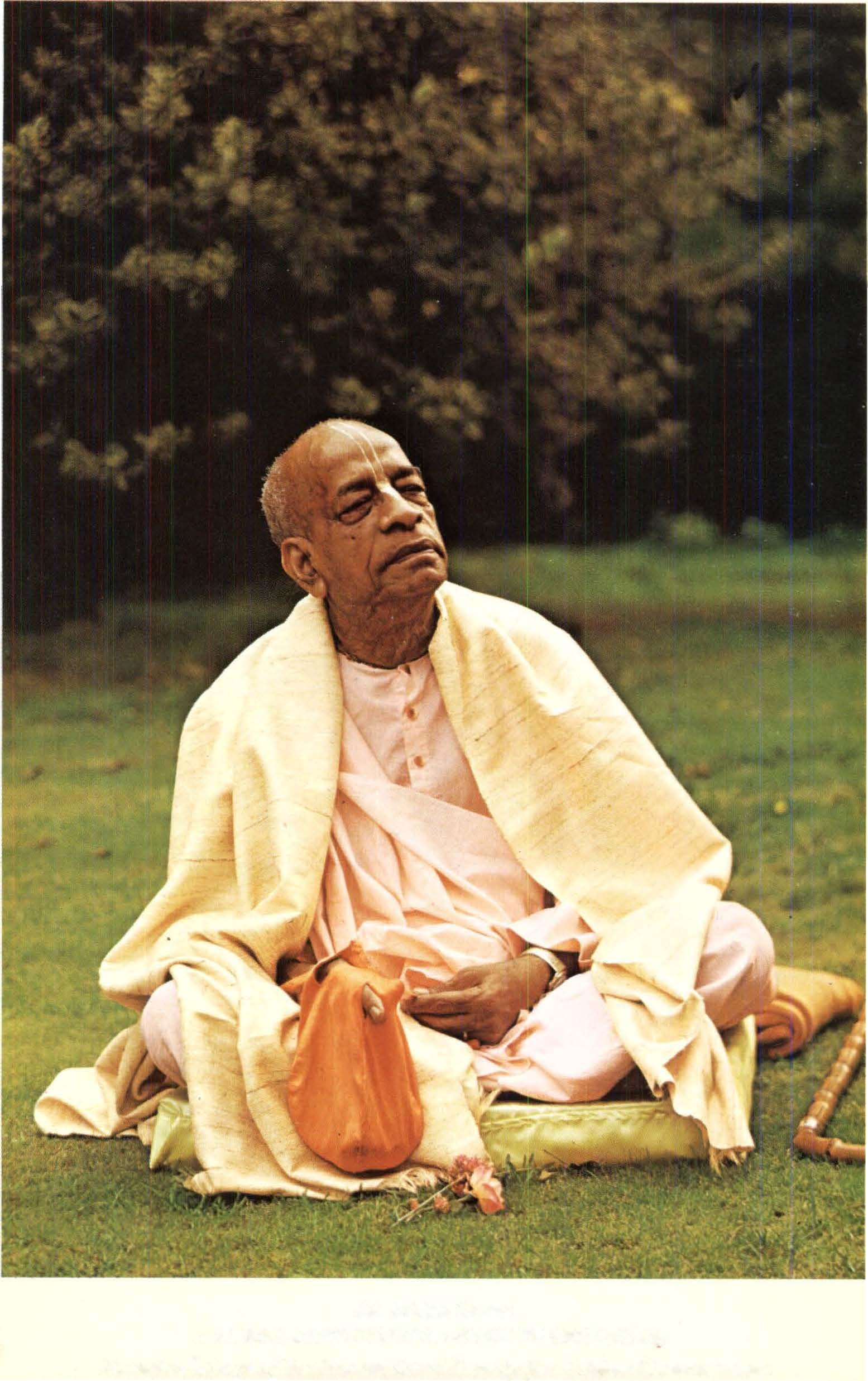
The great saint Narada became very compassionate upon the King and decided to instruct him about s irituallife.

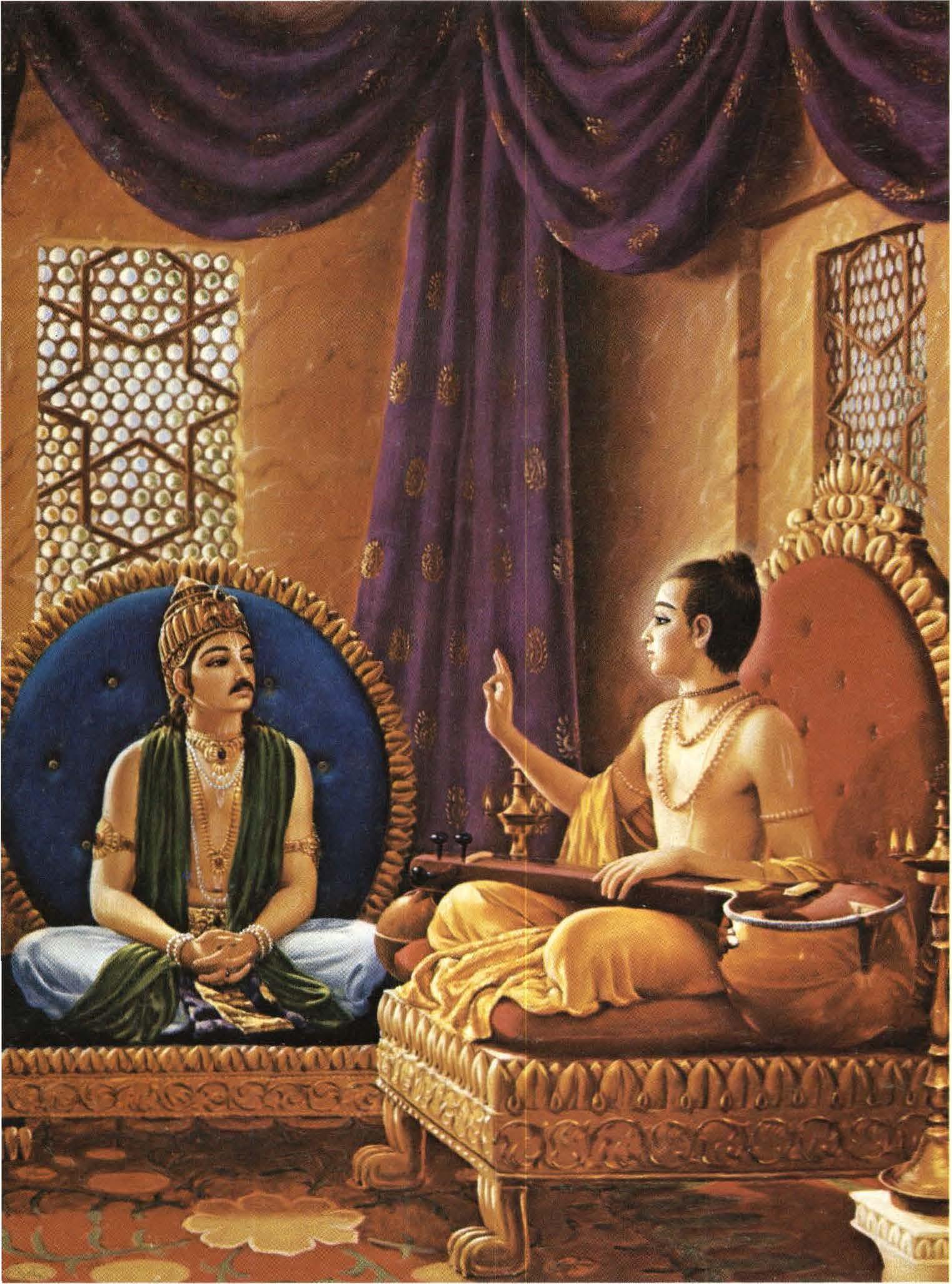
 Plate 1
a e 1135
Plate 1
a e 1135
Plate 2 Lord Kr�qa imparted the imperishable science ofyoga to the sun-god, Vivasvan, who instructed it to Manu, the father of mankind, who in turn instructed it to lk�vaku. (page 1323)





1358
Plate 3 The Supreme Lord is the Su reme S irit the Su ersoul. a e


 Plate 4
The perfect result of an education is the fixing of one's mind on the lotus feet of Ky�qa. (page 1428)
Plate 4
The perfect result of an education is the fixing of one's mind on the lotus feet of Ky�qa. (page 1428)

 Plate 5 Consulting a bona fide spiritual master is the same as consulting the Supreme Person ality of Godhead personally. (page 1430
Plate 5 Consulting a bona fide spiritual master is the same as consulting the Supreme Person ality of Godhead personally. (page 1430

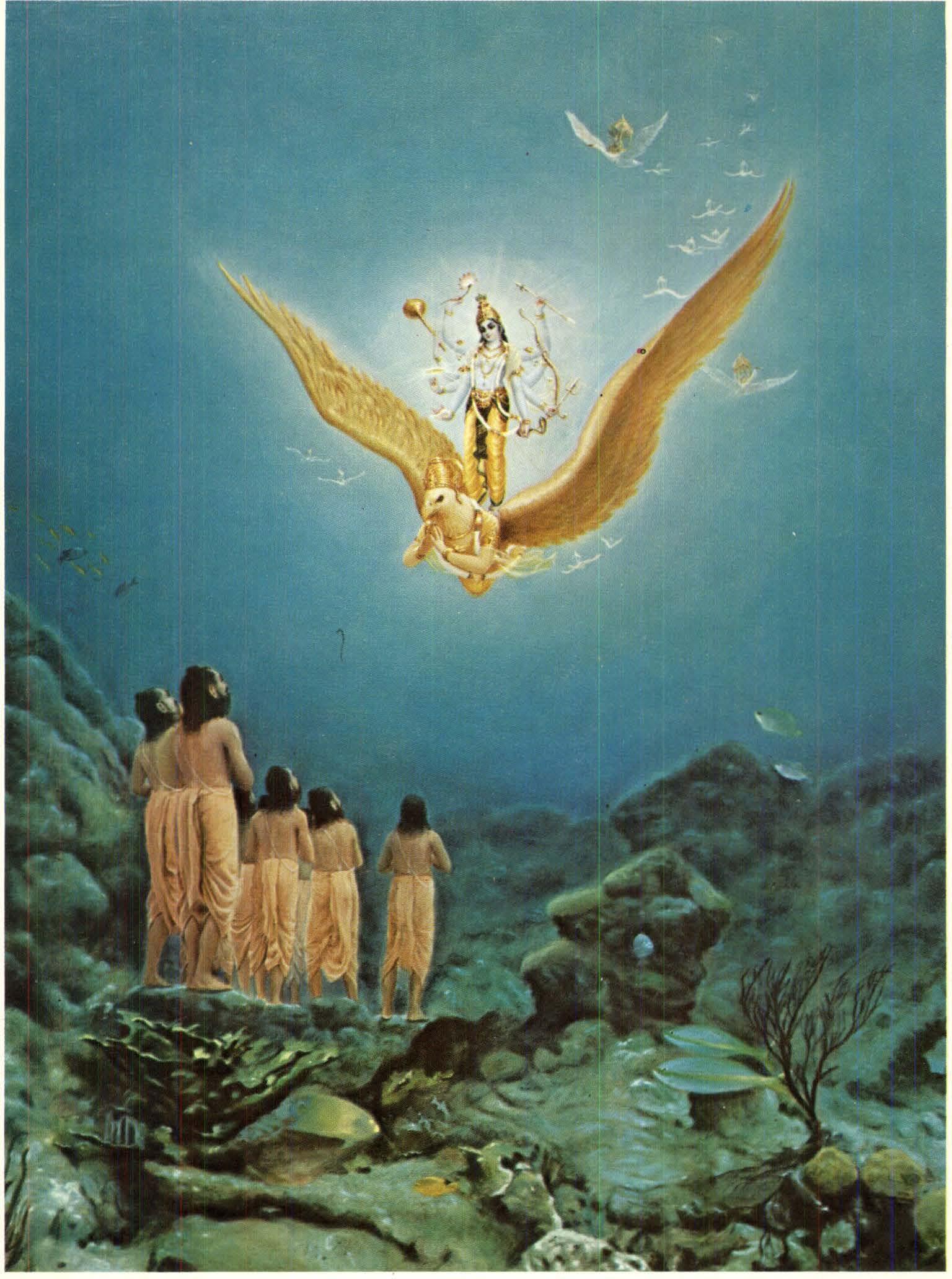
 Plate 6 The Personality of Godhead, appearing on the shoulder of Garuda, dissipated all the darkness of the universe. a e 1491
Plate 6 The Personality of Godhead, appearing on the shoulder of Garuda, dissipated all the darkness of the universe. a e 1491
Plate 7
The remaining trees, being very much afraid of the Pracetas, immediately delivered their daughter at the advice of Lord Brahma. (page 1548)


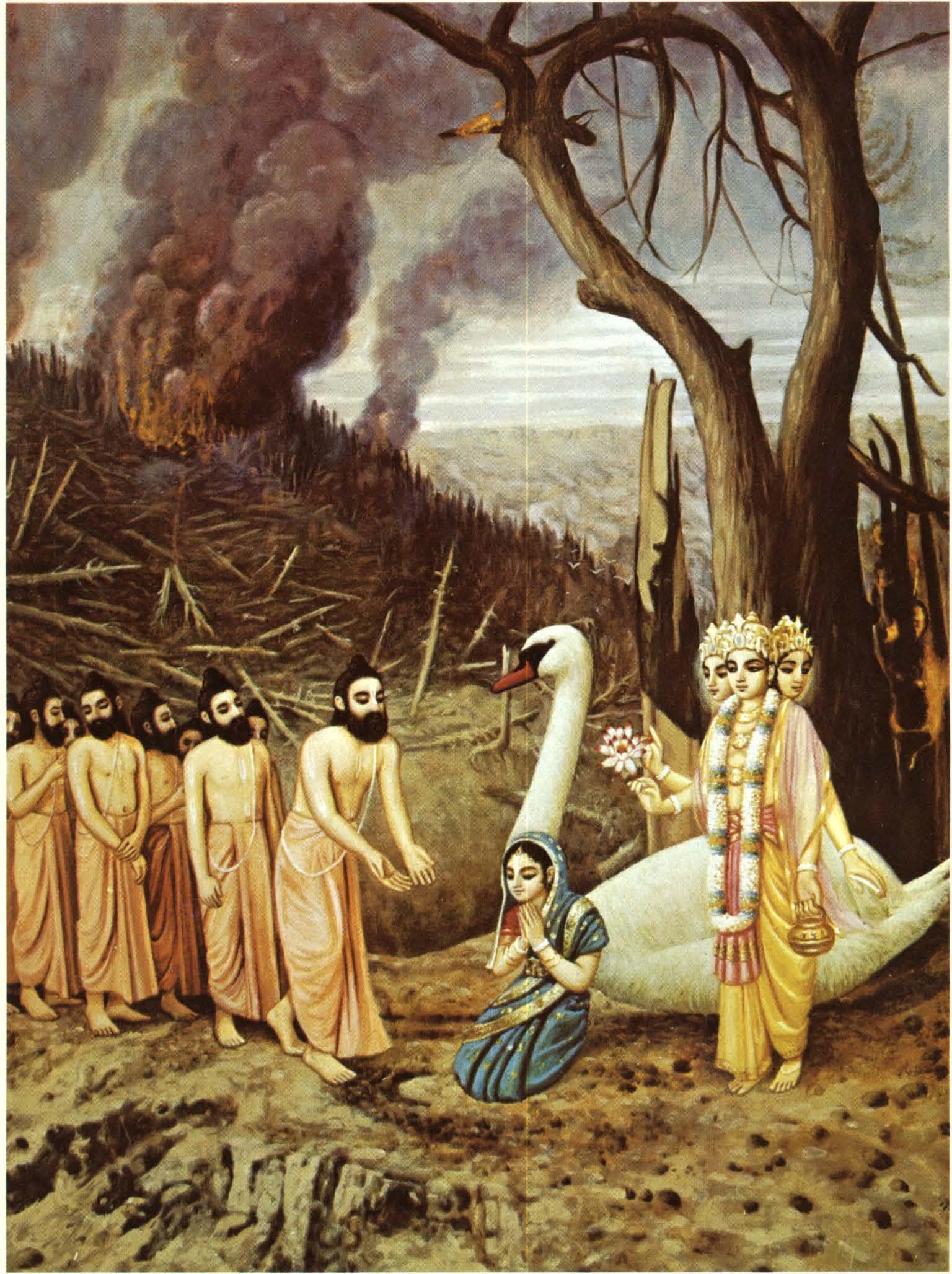

Srlmad-Bhagavatam of K�SNA-DVAIPAYANA VYASA
3JN � *41�+tl"i'4�l� �@ I �+tf �qf;q�;pn+tlft'R�iRJ: II�� II
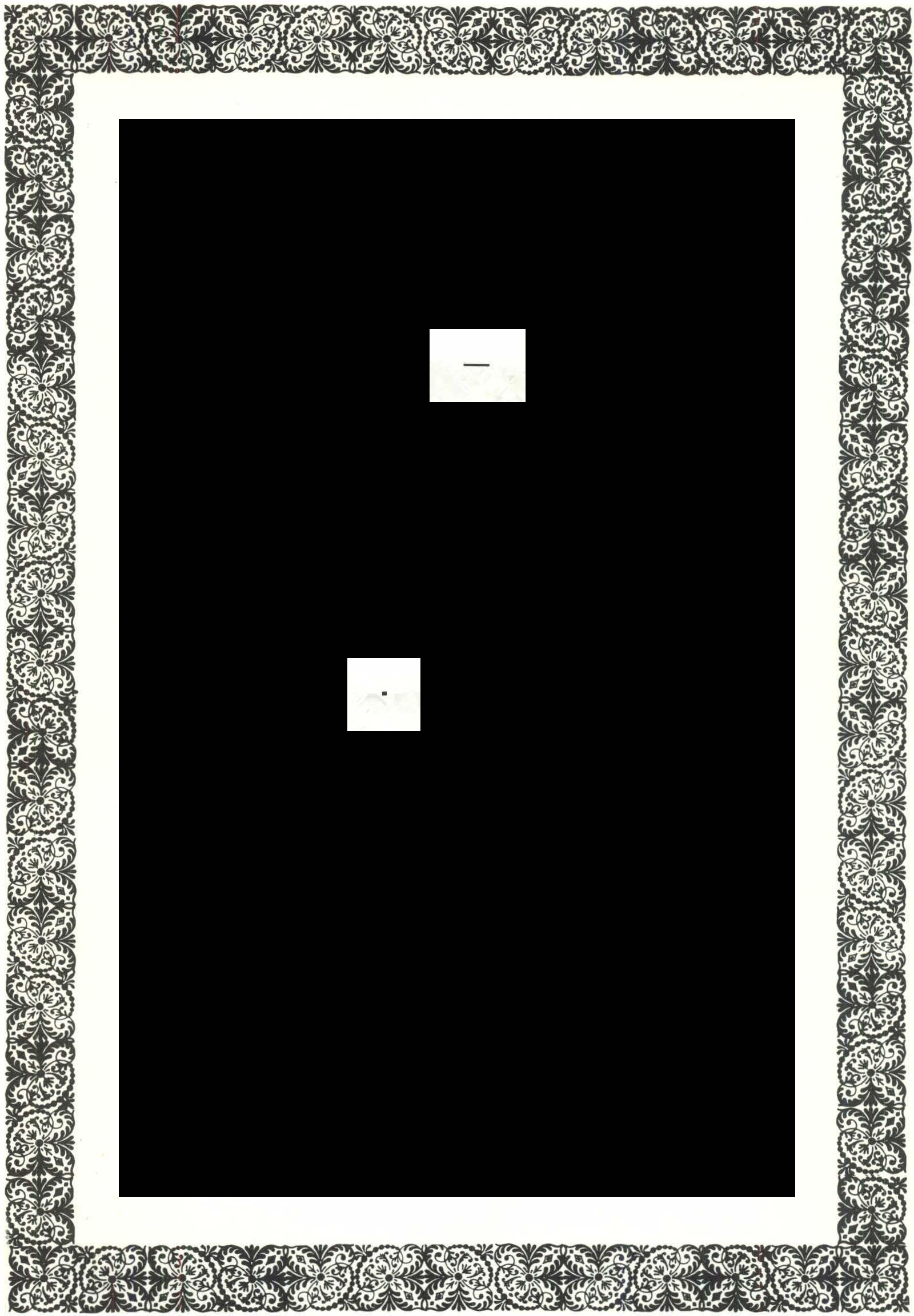
api smarasi ciitmiinam avijriiita-sakham sakhe hitvii miim padam anvicchan
bhauma-bhoga-rato gata� (p. 1348)

ALLGLORYTO5RTGURUANDGAURANGA
BOOKS by His Divine Grace A.C. Bhaktivedanta swami Prabhupada
Bhagavad-gita As It Is Srimad-Bhagavatam, Cantos 1-4 (13 Vols.)

Sri Caitanya-caritamrta (3 Vols.)
Teachings of Lord Caitanya
The Nectar of Devotion
Sri Tsopani�ad
Easy Journey to Other Planets
Kr�ra Consciousness: The Topmost Yoga System
Kn>ra. The Supreme Personality of Godhead (2 Vols.)
Transcendental Teachings of Prahlad Maharaja
Transcendental Teachings of Caitanya Mahaprabhu
Kr�ra. the Reservoir of Pleasure
The Perfection of Yoga
Beyond Birth and Death
On the Way to Kn;ra
Raja-vidya: The King of Knowledge
Elevation to Kr�ra Consciousness
Lord Caitanya in Five Features
Back to Godhead Magazine (Founder)
International Society for Krishna Consciousness
3764 Watseka Avenue
Los Angeles, California 90034
A complete catalogue is available upon request.
Srlmad-Bhagavatam
Fourth Canto
"The creation of the Fourth Order"
<Part Four-Chapters 25-31>

With the Original Sanskrit Text, Its Roman Transliteration, Synonyms, Translation and Elaborate Purports by His Divine Grace
A.C. Bhaktivedanta swami Prabhupada
Founder-Acarya of the International Society for Krishna Consciousness

THE BHAKTIVEDANTA BOOK TRUST New York ·Los Angeles·London· Bombay
Readers interested in the subject matter of this book are invited by the International Society for Krishna Consciousness to correspond with its Secretary.

International Society for Krishna Consciousness
3764 Watseka Avenue Los Angeles, California 90034

© 1974 the Bhaktivedanta Book Trust
All Rights Reserved
Library of Congress Catalogue Card Number: 7 5-189067
International Standard Book Number: 0912776-49-8
Printed in the United States of America

TABLE OF CONTENTS CHAPTER TWENTY-FIVE • The Descriptions of the Characteristics of King Purar\jana 1133 Narada Has Compassion on King Pracinabarhi�at 1135 Those Interested in a So-called Beautiful Life 1140 Narada Narrates the History of King Puraiijana 1143 King Purai'ijana Has Unlimited Material Desires 1150 Description of the City of Nine Gates 1153 King Purai'ijana Meets a Beautiful Woman 1159 King Purai'ijana Addresses the Woman 1164 Puraiijana Introduces Himself as a Great Hero 1170 The Girl Speaks to the King 1174 Happiness of a Householder's Life 1181 The King and the Woman Enter the City 1186 Description of the Nine Gates 1188 The King Fulfills All the Desires of His Queen 1198 The King Becomes Cheated in His Whole Existence
TWENTY-SIX King Purar\jana Goes to the forest to Hunt, and His Queen Becomes Angry The Departure of the King for the Forest The King Kills Many Innocent Animals A Person Who Acts Whimsically Falls Down After Killing, the King Becomes Tired v 1202 1205 1206 1211 1215 1221
CHAPTER


The King Becomes Captivated by Cupid A Good Wife Gives Good Intelligence The King Praises the Beauty of His Wife CHAPTER TWENTY- SEVEN Attack by CaQc;Javega on the City of King 1225 1230 1238 Puraruana� the Character of Kalakanya 1245 King Puranjana Enjoys with His Wife 1245 The King Becomes Deviated from His Good Sense 1249 The King Begets 1,100 Sons in the Womb of His Wife 1254 The King Gets His Sons and Daughters Married 1257 King Puranjana Worships the Demigods 1262 There Is a King Named Cap.�avega 1276 The King and His Friends Become Anxious 1271 Narada Cursed by the Daughter of Time 1276 The King of the Yavanas Addresses Kalakanya 1282 CHAPTER TWENTY- EIGHT Purarljana Becomes a woman in the Next Life 1287 Dangerous Soldiers Attack the City of Puranjana 1288 The King Loses All His Beauty and Opulence 1292 The King's City Is Smashed by Kalakanya 1296 The Serpent Wishes to Leave the City 1300 The King Worries About His Family Members 1304 Yavana-raja Comes to Arrest the King 1310 The King Is Unable to Remember Supersoul 1314 Puranjana Takes Birth as the Daughter of a King 1318 The Children of King Malayadhvaja 1322 King Malayadhvaja Retires·to a Solitary Place 1326 King Malayadhvaja Conquers All Relativities 1330

King Malayadhvaja Attains Perfect Knowledge 1334 Queen Vidarbhl Remains Engaged in Her Husband's Service 1337 The Queen Laments the Death of Her Husband 1341 A Bnihmapa Pacifies the Queen 1345 Supersoul Is the Most Intimate Friend 1348 The Soul Is Hidden in the City of the Body 1354 The Factual Position of the Soul and the Supersoul 1358 CHAPTER TWENTY-NINE Talks Between Narada and King PracTnabarhi 13 n Transmigration of the Living Entity 1373 Description of the Senses 1379 The Eyes Engage in Seeing Forms 1383 The Mind Is Affected by the Modes of Nature 1388 The Body's Life Span Is Gradually Reduced 1393 The Living Entity Gets Different Bodies 1397 The Living Entity Is Exactly Like a Dog 1402 The Ultimate Solution to All Problems 1407 The Culture of Kr�I)a Consciousness 1412 Demigod Worship Does Not Help One Understand Understand the Lord 1418 Vedic Rituals Are Not the Goal of Life 1422 Devotional Service Is the Only Way to Please The Lord 1426 Spiritual Master Is Not Different from Kr�I)a 1429 The Precarious Position of Family Life 1434 Even Great Sages Are Bewildered About the Goal of Life 1441 The Subtle Body Always Remains 1444 The Living Being Executes His Mental Concoctions 1448 Vll

The Mind Indicates Past and Future Bodies 1454 The Devotee Observes the Cosmos Just as the Lord Does 1458 Transmigration of the Soul 1465 The Living Being Entrapped as a Conditionerl Soul 1471 King Practnabarhi Leaves Home 1474 This Narration Sanctifies the Material World 1478 CHAPTER THIRTY The Activities of the Pracetas 1485 The Pracetas Satisfy Lord Vi�l)U 1488 Description of the Body of the Lord 1491 The Lord Addresses the Pracetas 1494 The Daughter Born of Pramloca and Kal)<;iu 1500 Special Facilities Given to the Pracetas 1504 Devotees Feel Fresh and New in Their Activities 1510 Prayers of the Pracetas 1513 The Lord's Existence Is Completely Independent 1516 The Lord Is the Witness of All Activities 1520 The Deity Expansion of the Lord 1522 The Lord Is Celebrated by the Name Ananta 1526 Association with Pure Devotees 1530 Devotees Purify Places of Pilgrimage 1535 The Lord Is Known as Vasudeva 1543 The Pracetas Wish to Make the Earth Treeless 1547 The Birth of Dak�a 1549 CHAPTER THIRTY- ONE Narada Instructs the Pracetas The Pracetas Leave Home Narada Comes to See the Pracetas vm 1555 1555 1559


Narada's Instructions to the Pracetas 1563 Three Kinds of Human Births 1566 The Goal of All Auspicious Activities 1572 Everything Emanates from the Supreme Lord 1576 The Lord Is the Supersoul of All Beings 1582 The Lord Relishes the Activities of the Devotees 1586 The Pracetas Go Back to Godhead 1589 lX
CHAPTER TWENTY-FIVE
The DescriptionsoftheCharacteristics ofKingPuraruana
TEXT I ij��
�(lK�� �:I
� (M�911Uii ((af41Rt(� �: II � II
maitreya uvaca iti sandisya bhagavan barhi�adair abhipujita�
pasyatarh raja-putrii�Jarh tatraivantardadhe hara�
majtreyaft uvaca-the great sage Maitreya continued to speak; iti-thus; sandisya-giving instruction; bhagavan-most powerful lord; barhi§adaift- by the sons of King Barhi�at; abhipujitaft-being worshiped; pasyatam-while they were looking on; riija-putn"i!liim-the sons of the King; tatra- there; eva-certainly; antardadhe-became invisible; haralt-Lord Siva.
TRANSLATION
The great sage Maitreya continued speaking to Vidura: My dear Vidura, in this way Lord Siva instructed the sons of King Barhi�at. The sons of the King also worshiped Lord Siva with great devotion and respect. Finally, Lord Siva became invisible to the princes.
PURPORT
This chapter contains a great lesson concerning the monarchical kingdom in the days of yore. When King Barhi�at was considering retiring from the royal duties, he sent his sons to perform austerities in order to become perfect kings for the welfare of the citizens. At the same time King Barhi�at 1133

was being instructed by the great sage Narada about the material world and the living entity who wants to enjoy it. It is therefore very clear how the kings and princes were trained to take charge of a kingdom. Welfare activitiesfor the benefit of the citizenswere aimed at understandingthe Supreme Personality of Godhead. The human form of life is especially meant for understanding God, our relationship with Him and our activities in His service. Because the kings took charge of the spiritual education of the citizens, both the king and the citizens were happy in Kr�l).a consciousness. In this regard, we should remember that the monarchical hierarchy of Pracinabarhi�at comes from Maharaja Dhruva, a great devotee of the Lord and the most celebrated disciple of Narada Muni. King Pracinabarhi�at was then too much engaged in fruitive activities due to performing different types of yajiias. One can actually be promoted to higher planetary systems or to the heavenly kingdoms by performing various yajiias, but there is no question of liberation or going back home, back to Godhead. When the great sage Narada saw that a descendant of Maharaja Dhruva was being misled by fruitive activities, he took compassion upon him and personally came to instruct him about the ultimate benediction of life, bhakti-yoga. How Narada Muni indirectly introduced the bhakti-yoga system to King Pracinabarhi�at is very interestingly described in this Twenty-fifth Chapter.
TEXT2

� ll1FRJ: � � �: I
rudra-gztam bhagavataf:l, stotram sarve pracetasaf:l, japantas te tapas tepur var�iirtiim ayutam jale
rudra-gitam-the song sung by Lord Siva; bhagavata{l-of the Lord; stotram-prayer;sarve-all;pracetasa{l-the princes known as the Pracetas; japanta{l-reciting; te-all of them; tapa[t-austerity; tepu{l-executed; var§ii[uim-of years;ayutam-lO,OOO;jale- within the water.
TRANSLATION
All the Praceta princes simply stood in the water for ten thousand years and recited the prayers given to them by Lord Siva.
1134 Srimad-Bhagavatam [Canto 4, Ch. 25
\ijq;ij� ijq�fi'lian¥twt
� II � II
PURPORT
Of course in the modern age one may be amazed how the princes could stand in the water for ten thousand years. However, living within air or living within water is the same process; one simply has to learn how to do it. The aquatics live within water for their whole life span. Certain favorable conditions are created to enable them to live within water. In those days, however, people used to live for 100,000 years. Out of so many years, if one could spare ten thousand years for the sake of austerity, he would be assured of success in his future life. This was not very astonishing. Although such a feat is impossible in this age, it was quite possible in Satya-yuga.
TEXT3 �: d(ql(1'ffi¥Uwt6( I
wtiOOSiiCII€41ij+i4itU �:sr�it'll'(� II � II
priici:nabarhi�am k§attafi, karmasv iisakta-miinasam niirado 'dhyiitma-tattva-jiia(t krpiilufi. pratyabodhayat

priicinabarhi§am-unto King Pracinabarhi�at; k§attafi.-0 Vidura; karmasu-in fruitive activities; iisakta- attached; miinasam-with this mentality; niirada�-the great sage Narada ; adhyiitma-spiritualism ; tattva-jiia�one who knows the truth; krpiilu�-being compassionate; pratyabodhayatgave instructions.


TRANSLATION
While the princes were undergoing severe austerities in the water, their father was performing different types of fruitive activities. At this timethe great saint Narada, master and teacher of all spiritual life, became very compassionate upon the King and decided to instruct him aboutspiritual life.
PURPORT
As pointed out by Prabodhananda Sarasvati Thakura, a great devotee of Lord Caitanya, kaivalya, or merging into the Brahman effulgence, is just like going to hell. He similarly states that elevation to the upper planetary systems for the enjoyment of heavenly life is just so much phantasmagoria.
Text3] The Characteristics of King Puraiijana 1135
This means that a devotee does not give any importance to the ultimate goal of the karmis and jiitinis The ultimate goal of the karmis is promotion to the heavenly kingdom, and the ultimate goal of the jiiiinis is merging into the Brahman effulgence. Of course the jiiiinis are superior to the karmis, as confirmed by Lord Caitanya: koti-karmani�tha-madhye eka 'jiiani' srestha. "One jiiant, or impersonalist, is better than many thousands of fruitive actors." (Cc. Madhya 19.14 7) Therefore a devotee never enters upon the path of karma, or elevation by fruitive activities. Narada Muni took compassion upon King Pracinabarhi�at when he saw the King engaged in fruitive activity. In comparison to mundane workers, however, those whoare tryingto be elevatedto the higher planetary systems byperforming yajiias are undoubtedly superior.In pure devotional service, however, both karma and jiiana are considered to be bewildering features of the illusory energy. TEXT4

sreyas tvarh katamad rajan karmar-atmana Thase dufi,kha-hanifi, sukhavaptifi, sreyas tan neha ce�yate
sreya[l-ultimate benediction; tvam-you; katamat-what is that; riijan0 King; karmaT)ii- by fruitive activities; iitmana[l-of the soul; ihas e- you desire; du�kha-hani{l- disappearance of all distresses; sukha-avapti"{lattainment of all happiness; sreya[l- benediction; tat- that; na- never; ihain this connection; ca-and; i§yate- is available.
TRANSLATION
Narada Muni asked King Pracinabarhi�at: My dear King, what do you desire to achieve by performing these fruitive activities? The chief aim of life is to get rid of all miseries and enjoy happiness, but these two things cannot be realized by fruitive activity.
PURPORT
In this material world there is a great illusion which covers real intelligence. A man in the mode of passion wants to work very hard to derive
1136 Srimad-Bhagavatam [Canto4, Ch. 25
� CM'Is0i31(� (WI t:�:ij((ti':UriC: ��(6�( � II\1II
some benefit, but he does not know that time will never allow him to enjoy anything permanently. Compared to the work one expends, the gain is not so profitable. Even if it is profitable, it is not without its distresses. If a man is not born rich, and he wants to purchase a house, cars and other material things, he has to work hard day and night for many years in order to possess them. Thus happiness is not attained without undergoing some distress.
Actually pure happiness cannot be had within this material world. If we wish to enjoy something, we must suffer for something else. On the whole, suffering is the nature of this material world, and whatever enjoyment we are trying to achieve is simply illusion. After all, we have to suffer the miseries of birth, old age, disease and death. We may discover many fine medicines, but it is not possible to stop the sufferings of disease or death. Actually medicine is not the counteracting agent for either disease or death. On the whole there is no happiness in this material world, but an illusioned person works very hard for so-called happiness. Indeed, this process of working hard is actually taken for happiness. This is called illusion.
Therefore Narada Muni asked King Pracinabarhi�at what he desired to attain by performing so many costly sacrifices. Even if one attains a heavenly planet, he cannot avoid the distresses of birth, old age, disease and death. Someone may argue that even devotees have to undergo many distresses in executing austerities and penances connected with devotional service. Of course for the neophytes the routine of devotional service may be very painful, but at least they have the hope that they will ultimately be able to avoid all kinds of distresses and achieve the highest perfectional stage of happiness. For the common karmis, there is no such hope because even if they are promoted to the higher planetary systems, they are not guaranteed freedom from the miseries of birth, old age, disease and death. Even Lord Brahma, who is situated in the highest planetary system (Brahmaloka), has to die. Lord Brahma's birth and death may be different from an ordinary man's, but within this material world he cannot avoid the distresses of birth, old age, disease and death. If one is at all serious about attaining liberation from these miseries, he must take to devotional service. This is confirmed by the Lord Himself in Bhagavad-gitii:
janma karma ca me divyam
evam yo vetti tattvata�
tyaktvii deham punar janma

naiti miim eti so 'rjuna
"One who knows the transcendental nature of My appearance and activities does not, upon leaving the body, take his birth again in this
Text 4] The Characteristics of King Puraiijana 1137
materialworld,but attains Myeternalabode, 0 Arjuna." (Bg. 4.9)

Thus after attaining full Kr�l).a consciousness, the devotee does not return to this material world after death. He goes back home, back to Godhead. That isthe perfect stage of happiness,unblemished by any trace ofdistress.
TEXTS rntm
WI � � -R I �it�� lr.f�dt¥r: 11�11

riijoviica na jiiniimi mahii-bhiiga pararh karmiipaviddha-dh"i� bruhi me vimalarh jiiiinarh yena mucyeya karmabhi�
riijii uviica- the King replied; na-not; jiiniimi-1 know; mahii-bhiiga-0 greatsoul; param-transcendental; karma- byfruitiveactivities; apaviddhabeing pierced; dh'i[!.-my intelligence; briihi-please tell; me-to me; vimalam-spotless; jiiiinam-knowledge; yena-by which; mucyeya-1 can get relief; karmabh*- from the fruitive activities.
TRANSLATION
The King replied: 0 great soul, Narada, my intelligence is entangled in fruitive activities; therefore I do not know the ultimate goal of life. Kindly instruct me in pure knowledge so that I can get out of the entanglement of fruitive activities.
PURPORT
SriNarottama dasa Thakura hassung:

sat-sanga chii�i' kainu asate viliisa te-kiirap,e liigila ye karma-bandha-phiinsa
As long as a person is entangled in fruitive activities, he is bound to accept one body after another. This is called karma-bandha-phiinsaentanglement in fruitive activities. It does not matter whether one is engaged in pious or impious activities, for both are causes for further
1138 Srimad-Bhagavatam [Canto 4, Ch. 25
entanglement in material bodies. By pious activities one can take birth in a rich family and get a good education and a beautiful body, but this does not mean that the distresses of life are ultimately eliminated. In the Western countries it is not unusual for one to take birth in a rich aristocratic family, nor is it unusual for one to have a good education and a very beautiful body, but this does not mean that Westerners are free from the distresses of life. Although at the present moment the younger generation in Western countries has sufficient education, beauty and wealth, and although thereis enoughfood,clothing andfacilities for sensegratification, they are in distress. Indeed, they are so distressed that they become "hippies," and the laws of nature force them to accept a wretched life. Thus they go about unclean and without shelter or food, and they are forced to sleep in the street. It can be concluded that one cannot become happy bysimply performing pious activities. It is not a fact that thosewho are born with a silver spoon in their mouths are free from the material miseries of birth, old age, disease and death. The conclusion is that one cannot be happy by simply executing pious or impious activities. Such activities simply cause entanglement and transmigration from one body to another. Narottama dasa Thakura calls this karma-bandha-phansa.
King Pracinabarhi�at admitted this fact and frankly asked Narada Muni how he could get out of this karma-bandha-phansa, entanglement in fruitive activities. This is actually the stage of knowledge indicated in the first verse of Vediinta-sutra: athiito brahma-jijniisii (Vs. 1.1.1). When one actually reaches the platform of frustration in an attempt to discharge karma-bandha-phansa, he inquires about the real value of life, which is called brahma-jijiiasii. In order to inquire about the ultimate goal of life, the Vedas enjoin: tad vijiianiirtharh sa gumm eviibhigacchet (Mur-{iaka Up. 1.2.12). "In order to understand the transcendental science, one must approach a bona fide spiritual master."



King Pracinabarhir?at found the best spiritual master, Narada Muni, and he therefore asked him aboutthat knowledge by which one can get out of the entanglement of karma-bandha-phiinsa, fruitive activities. This is the actual business of human life. .Ttvasya tattva-jijniisii niirtho yas ceha karmabhi� (Bhiig. 1.2.10). As stated in the Second Chapter of the First Canto of Snmad-Bhiigavatam, a human being's only business is inquiring from a bona fide spiritual-master about extrication from the entanglement of karma-bandha-phiinsa .

Text 6] The Characteristics of King Puraiijana 1139
TEXT6 m iM!I , WI qt � ��4(11(\:t� II� II
Srimad-Bhagavatam
grhe�u kii.ta-dharme�u
putra-dara-dhaniirtha-dhl{!
na param vindate mu{lho
bhriimyan samsiira-vartmasu
g,rhe§U- in family life; ku,ta-dharme,su-in false occupational duties; putra -sons; dara-wife; dhana-wealth; artha-the goal of life; dhi�-one who considers; na-not; pa ram- transcendence ; vindate-achieves; mu!ihaftrascal; bhramyan-wandering ; sarhsara-of material existence; vartmasu-on the paths.
TRANSLATION
Those who are only interested in a so-called beautiful life-namely remaining as a householder entangled by sons and a wife and searching after wealth-think that such things are life's ultimate goal. Such people simply wander in different types of bodies throughout this material existence without finding out the ultimate goal of life.
PURPORT

Those who are too much attached to family life-which consists of entanglement with wife, children, wealth and home-are engaged in ku.tadharma, pseudo-duties. Prahlada Maharaja has likened these pseudo occupational duties to a dark well (andha-kiipa). Prahlada has purposefully spoken of this dark well because if one falls into this well, he will die. He may cry for help, but no one will hear him or come to rescue him.
The words bhriimyan samsiira-vartmasu are significant. In Caitanyacaritiimrta, Sri Caitanya Mahaprabhu very clearly explains: brahmiir4a bhramite kona bhiigyavan jiva (Cc. Madhya 19.151). All living entities are wandering in different types of bodies throughout different planets, and if, in the course of their wanderings, they come in contact with a devotee bythe direction of the SupremePersonalityof Godhead,their lives become successful. Even though King Pracinabarhi�at was engaged in fruitive activity, the great sage Niirada appeared before him. The King was very fortunate to be able to associate with Narada, who enlightened him in spiritual knowledge. It is the duty of all saintly persons to follow in the footsteps of Narada Muni and travel all over the world to every country and village just to instruct illusioned persons about the goal of life and to save them from the entanglement of karma-bandha, fruitive activity.
1140
[Canto 4, Ch. 25
��:�����'
4�i�ijl��('lflf'l�� �: II \9 II
ncirada uvaca bho bho{l, praja-pate rajan pasun pasya tvayadhvare samjnapitan jiva-sanghan nirghrflena sahasrasa{l,
narada{l, uvaca-the great sage Narada replied; bho{l, bho[l,-hello ; praja-pate-0 ruler of the citizens; rajan-0 King; pasiln- animals; pasyaplease see; tvaya-by you; adhvare-in the sacrifice; sarhjiiapitan- killed; jiva-sanghan-groups of animals; nirghrflena-without pity; sahasrasa{l,-in thousands.
TRANSLATION
The great saint Narada said: 0 ruler of the citizens, my dear King, please see in the sky those animals which you have sacrificed without compassion and without mercy in the sacrificial arena.
PURPORT
Because animal sacrifice is recommended in the Vedas, there are animal sacrifices in almost all religious rituals. However, one should not be satisfied simply by killing animals according to the directions of the scriptures. One should transcend the ritualistic ceremonies and try to understand the actual truth, the purpose of life. Narada Muni wanted to instruct the King about the real purpose of life and invoke a spirit of renunciation in his heart. Knowledge and the spirit of renunciation (jniina-vairiigya) are the ultimate goal of life. Without knowledge, one cannot become detached from material enjoyment, and without being detached from material enjoyment, one cannot make spiritual advancement. Karm"is are generally engaged in sense gratification, and for this end they are prepared to commit so many sinful activities. Animal sacrifice is but one such sinful activity. Consequently, by his mystic power Narada Muni showed King Praclnabarhi�at the dead animals which he had sacrificed.

Text7] The Characteristics of King Puraiijana TEXT7 <=tW;
�
1141
TEXTS �ro�����
ij+q'(ij+ctt:-�fw�W&f�ij+t;:tt;;u II � II

ete tvam sampratik§ante smaranto vaisasam tava samparetam aya�-ku.tais chindanty utthita-manyava�
ete-all of them; tvam- you; samprattk�ante-are awaiting; smaranta�remembering; vaiSasam-injuries; tava-of you; samparetam-after your death; aya�- made of iron; kutai{t-by the horns; chindanti-pierce; utthita-enlivened; manyava�-anger .
TRANSLATION
All these animals are awaiting your death so that they can avenge the injuries you have inflicted upon them. After you die, they will angrily pierce your body with iron horns.
PURPORT
Niirada Muni wanted to draw King Priicinabarhi�at's attention to the excesses of killing animals in sacrifices. It is said in the siistras that by killing animals in a sacrifice, one immediately promotes them to human birth. Similarly, by killing their enemies on a battlefield, the k�atriyas who fight for a right cause are elevated to the heavenly planets after death. In Manu-samhita it is stated that it is necessary for a king to execute a murderer so that the murderer will not suffer for his criminal actions in his next life. On the basis of such understanding, Niirada Muni warns the King that the animals killed in sacrifices by the King await him at his death in order to avenge themselves. Niirada Muni is not contradicting himself here. Niirada Muni wanted to convince the King that overindulgence in animal sacrifice is risky because as soon as there is a small discrepancy in the execution of such a sacrifice, the slaughtered animal may not be promoted to a human form of life. Consequently the person performing sacrifice will be responsible for the death of the animal, just as much as a murderer is responsible for killing another man. When animals are killed in a slaughterhouse, six people connected with the killing are responsible for the murder. The person who gives permission for the killing, the person who kills, the
1142 Srimad-Bhagavatam [Canto 4, Ch. 25
person who helps, the person who purchases the meat, the person who cooks the flesh and the person who eats it, all become entangled in the killing. Narada Muni wanted to draw the King's attention to this fact. Thus animal killing is not encouraged even in a sacrifice.
TEXT9

3N � �(lijwwl( 1 �($9\� � � � �11�11
atra te kathayi�ye 'mum itihiisarh puriitanam puranjanasya caritarh nibodha gadato mama
atra-herewith; te-unto you; kathayi�ye-I shall speak; amum-on this subject matter; itihiisam-history; puriitanam-very old; puranjanasya-in the matter of Puraiijana; caritam-his character; nibodha-try to understand; gadata� mama-while I am speaking.


TRANSLATION
In this connection I wish to narrate an old history connected with the character of a king called Puraiijana. Please try to hear me with great attention.
PURPORT
The great sage Narada Muni turned toward another topic-the historyof King Puraiijana. This is nothing but the his�ory of King Praci'nabarhi�at told in a different way. In other words, this is an allegorical presentation. The word puranjana means "one who enjoys in a body." This is clearly explained in the next few chapters. Because a person entangled in material activities wants to hear stories of material activities, Narada Muni turned to the topics of King Puraiijana, who is none other than King Praci'nabarhi�at. Narada Muni did not, however, deprecate the value of performing sacrifices in which animals are sacrificed. Lord Buddha, however, directly rejected all animal sacrifice. Sri'la Jayadeva Gosvami' has stated: nindasi yajna-vidher ahaha sruti-jiitam. The word sruti-jiitam indicates that in the Vedas animal sacrifice is recommended, but Lord Buddha directly denied Vedic authority in order to stop animal sacrifice. Consequently Lord Buddha is not accepted by the followers of the Vedas.
Text 9) The Characteristics of King Puraiijana 1143
Because he does not accept the authority of the Vedas, Lord Buddha is depicted as an agnostic or atheist. The great sage Narada cannot decry the authority of the Vedas, but he wanted to indicate to King Pracinabarhi�at that the path of karma-ka[lt;la is very difficult and risky.
Foolish persons accept the difficult path of karma-ka[lt;la for the sake of sense enjoyment,and those who aretoo much attached to sense enjoyment are called miit;lhas (rascals). It is very difficult for a miit;lha to understand the ultimate goal of life. In the propagation of the Kr�r:ta consciousness movement, we actually see that many people are not attracted because they are miit;lhas engaged in fruitive activity. It is said: upade5o hi murkharJiim prakopiiya na siintaye (Hitopadesa). If good instructions are given to a foolish rascal, he simply becomes angry and turns against the instructions instead of taking advantage of them. Because Narada Muni knew this very well, he indirectly instructed the King by giving him the history of his entire life. In order to wear a gold or diamond nose pin or earring, one has to pierce the ear or nose. Such pain endured for the sake of sense gratification is endured on the path of karma-kii[lt;la, the path of fruitive activity. If one wishes to enjoy something in the future, he has to endure trouble in the present. If one wants to become a millionaire in the future and enjoy his riches, he has to work very hard at the present moment in order to accumulate money. This is karma-kii[l{iiya. Those who are too much attached to such a path undergo the risk anyway. Niirada Muni wanted to show King Pracinabarhi�at how one undergoes great troubles and miseries in order to engage in fruitive activity. A person who is very much attached to material activity is called vi�ayi:. A vi§ayi: is an enjoyer of vi�aya, which means eating, sleeping, mating and defending. Narada Muni is indirectly indicating through the story of King Purafijana that eating, sleeping, mating and defending are troublesome and risky.
The words itihasam (history)and puratanam (old) indicate that although a living entity lives within the material body, the history of the living entity within the material body is very old. In this regard, Srila Bhaktivinoda fhakura has sung: anadi karama-phale, pat;li' bhavarrwva-jale, taribare nii dekhi upiiya. "Due to my past fruitive activities I have fallen into the water of material existence, and I cannot find any way to get out of it." Every living entity is suffering in this material existence from past activities; therefore everyone has a very old history. Foolish material scientists have manufactured their own theories of evolution, which are simply concerned with the material body. But actually this is not the real evolution. The real evolution is the history of the living entity, who is puranjana, living within the body. Sri Narada Muni will explain this evolutionary theory in a different way for the understanding of sane persons.

1144 Srimad-Bhagavatam [Canto 4, Ch. 25
TEXT 10 311�fk�$w1l ;m{ 00�«��1!41: ij�if?tilll€1;ji+Ussm�<CIIf?t�i�: II� oil

asit puranjano nama raja rajan brhac-chrava{t tasyavijnata-namlisit sakhavijniita-ce§.tita{t
asit- there was; puraiijana� - Puraiijana; nama-named; riijii-king; riijan0 King; brhat-sravii{t-whose activities were great; tasya- his; avijiiiita-the unknown one;niimii-of the name; iistt-there was; sakha- friend; avijniitaunknown; ce , stita�- whose activities.

TRANSLATION
My dear King, once in the past lived a king named Puraiijana, who was celebrated for his great activities. He had a friend named Avijiiata [the unknown one]. No one could understand the activities of Avijiiata.
PURPORT
Every living entity is puranjana. The word puram means within this body, within this form, and jana means living entity. Thus everyone is puranjana. Every living entity is supposed to be the king of his body because the living entity is given full freedom to use his body as he likes. He usually engages his body for sense gratification, because one who is in the bodily conception of life feels that the ultimate goal of life is to serve the senses. This is the process of karma-kart{la. One who has no inner knowledge, who does not know that he is actually the spirit soul living within the body, who is simply enamored by the dictation of the senses, is called a materialist. A materialistic person interested in sense gratification can be called a puranjana. Because such a materialistic person utilizes his senses according to his whims, he may also be called a king. An irresponsible king takes the royal position to be hispersonal property and misuses his treasury for sense gratification.
The word b,rhac-chraviil) is also significant.The word srava{t means fame. The living entity is famous from ancient times, for, as stated in Bhagavadg"itii, na jiiyate mriyate vii (Bg. 2.20). "The living entity is never born and never dies." Because he is eternal, his activities are eternal, although they are performed in different types of bodies. Na hanyate hanyamiine sarire
Text 10] The
of
Characteristics
King Purafijana
1145
(Bg. 2.20). "He does not die, even after the annihilation of the body." Thus the living entity transmigrates from one body to another and performs various activities. In each body the living entity performs so many acts. Sometimes he becomes a great hero-just like HiraJ;J.yakasipu and Kamsa, or in the modern age Napoleon or Hitler. The activities of such men are certainly very great,but as soon as their bodies are finished, everything else is finished. Then they remain in name only. Therefore a living entity may be called brhac-chrava{!; he may have a great reputation for various types of activities. Nonetheless, he has a friend whom he does not know. Materialistic persons do not understand that God is present as the Supersoul and situated within the heart of every living entity. Although the Paramatma sits beside the jiviitmii as a friend, the jiviitmii, or living entity, does not know it. Consequently he is described as avijniita-sakha, meaning "one who has an unknown friend." The word avijnata-ce§!ita{! is also significant because a living entity works hard under the direction of the Paramatma and is carried away by the laws of nature. Nonetheless, he thinks himself independent of God and independent of the stringent laws of material nature. It is stated in Bhagavad-gitii:

acchedyo 'yam adahyo 'yam
akledyo 'so§ya eva ca nitya{! sarva-gata{! sthiirwr acalo 'yam sanatana{!
"This individual soul is unbreakable and insoluble and can be neither burned nor dried. He is everlasting, all-pervading, unchangeable, immovable and eternally the same." (Bg. 2.24)
The living entity is saniitana, eternal. Because he cannot be killed by any weapon, burnt into ashes by fire, soaked or moistened by water, nor dried up by air, he is considered to be immune to material reactions. Although he is changing bodies, he is not affected by the material conditions. He is placed under the material conditions, and he acts according to the directions of his friend, the Supersoul. As stated in Bhagavad-gitii:
sarvasya caharh hrdi sannivi§.to
matta{! smrtir jfianam apohanarh ca
vedais ca sarvair aham eva vedyo vedanta-krd veda-vid eva caham
"I am seated in everyone's heart, and from Me come remembrance, knowledge and forgetfulness. By all the Vedas am I to be known; indeed I am
1146 Srimad - Bhagavatam [Canto 4, Ch. 25
the compiler of Vedanta, and I am the knower of the Vedas. (Bg. 15.15)
Thus the Lord as Paramatma is situated in everyone's heart, and He gives directions to the living entity to act in whatever way the living entity desires. In this life and in his previous lives the living entity does not know that the Lord is giving him a chance to fulfill all kinds of desires. No one can fulfill any desire without the sanction of the Lord. All the facilities given by the Lord are unknown to the conditioned soul.
TEXT11

so 'nve§ama[!alt sara[!arh babhrama prthivirh prabhult nanuruparh yadavindad abhut sa vimana iva
salt-that King Puraiijana; anve§amaf!alt-searching after; sara[!amshelter; babhrama-traveled over; prthivim-the whole planet earth; prabhult-to become an independent master; na-never; anurupam-to his liking; yada-when; avindat-he could find; abhut-became; salt-he; vimanalt-morose; iva-like.
TRANSLATION
King Puraiijana began to search for a suitable placetolive, and thus he traveled all over the world. Even after a great deal of traveling, he could not find a place just to his liking. Finally he became morose and disappointed.
PURPORT
The travelings of Puraiijana are similar to the travelings of the modern hippies. Generally hippies are sons of great fathers and great families. It is not that they are always poor. But some way or another they abandon the shelter of their rich fathers and travel all over the world. As stated in this verse, the living entity wants to become a prabhu, or master. The word prabhu means master, but actually the living entity is not a master; he is the eternal servant of God. When the living entity abandons the shelter of God, Kr�q.a, and tries to become a prabhu independently, he travels all over the creation. There are 8,400,000 species of life and millions and millions and trillions of planets within the creation. The living entity
Text 11] The Characteristics of King Puraiijana 1147
({ts.-�tt+tiUI:� iOiml 'lf?.m q: I "fl�cf � m.n �II��II
wanders throughout these various types of bodies and throughout different planets, and thus he is like King Purafijana, who travels all over the world loo�ng for a suitable place to live.
Sii Narottama dasa Thakura has sung: karma-kiir-!la, jfiiina-kar-!Ia, kevala vi§era bhii[!!la. "The path of karma-kii[!!la [fruitive activities] and the path of jfiiina-kiir-!la [speculation] are just like strong pots of poison." Amrta baliyii yebii khiiya, niinii yoni sada phire: "A person who mistakes this poison to be nectar and drinks it travels in different species of life." Kadarya bhak�a[!a kare: "And, according to his body, he eats all types of abominable things." For instance, when the living entity is in the body of a hog, he eats stool. When the living entity is in the body of a crow, he eats all kinds of refuse, even pus and mucus, and enjoys it. Thus Narottama dasa Thakura points out that the living entitytravels in different types of bodies and eats all kinds of abominable things. When he does not become ultimately happy, he becomes morose or takes to the ways of hippies.

Thus in this verse it is said (na anuriipam) that the King could never find a place suitable for his purposes. This is because in any form of life and on any planet in the material world, a living entity cannot be happy because everything in the material world is unsuitable for the spirit soul. As stated in this verse, the living entity independently wants to become a prabhu, but as soon as he gives up this idea and becomes a servant of God, Kr�IJ.a, his happiness immediately begins. Therefore Srila Bhaktivinoda 'fhakura sings: (miche) miiyiira vase, yiiccha bhese', khiiccha hiibu!Iubu, bhiii. "My dear living entity, why are you being carried away by the waves of maya?"
As stated in the Bhagavad-gitii:
isvara[l sarva-bhiitamirh
hrd-dese 'rjuna ti§thati bhramayan sarva-bhiitani
yantriiru!Ihani mayaya
"The Supreme Lord is situated in everyone's heart, 0 Arjuna, and is directing the wanderings of all living entities, who are seated as on a machine, made of the material energy." (Bg. 18.61)
The living entity is carried in the machine of the body through so many species of life on so many planets. Therefore Bhaktivinoda Thiikura asks the living entity why he is being carried away in these bodily machines to be placed in so many different circumstances. He advises that one surmount the waves of miiyii by surrendering unto Kg>l).a. (}iva) krfir-a-diisa, e viSviisa, karle ta' ara du[lkha niii. As soon as we confront Kt�l).a, Knl).a advises:
1148 Srimad-Bhagavatam [Canto 4, Ch. 25
The Characteristics of KingPuraiijana
sarva-dharmiin parityajya
miim ekarh sara[Larh vraja aham tviirh sarva-piipebhyo mok§ayi§yiimi mii suca[l.
"Abandon all var1ehes of religion and just surrender unto Me. I shaLl deliver you from all sinful reaction. Do not fear." (Bg. 18.66)
Thus we are immediately relieved from traveling from one body to another and from one planet to another. Sri Caitanya Mahaprabhu says: brahmiirp;la bhramite kona bhagyavan jiva (Cc. Madhya 19.151). If, while traveling, a living entity becomes fortunate enough to become blessed by the association of devotees and to come to K���a consciousness, his real life actually begins. This Kr�qa consciousness movement is giving all wandering living entities a chance to take to the shelter of Kr�qa and thus become happy.
In this verse the words vimanii iva are very significant. In this material world even the great King of heaven is also full of anxiety. If even Lord Brahma is full of anxiety, what of these ordinary living entities who are working within this planet? Bhagavad-gitii confirms:
iibrahma-bhuvaniil lokii[l. punar iivartino 'rjuna
"From the highest planet in the material world down to the lowest, all are places of misery wherein repeated birth and death take place." (Bg. 8.16) In the material world a living entity is never satisfied. Even in the position of Brahma or in the position of lndra or Candra, one is full of anxiety simply because he has accepted this material world as a place of happiness.
TEXT12 ;J���m�i��:�:

na siidhu mene tii[l. sarvii bhiitale yiivati[l. pura[l. kaman kamayamano 'sau tasya tasyopapattaye
na-never; siidhu-good; mene -thought; ta[l.-them; sarvii[l.-all; bhutale-onthisearth; yavati[l-allkinds of;pura[l.-residential houses; kiimiin-
Text12]
1149
1
� ��44't14 II��II
��Jq:qqt;fls«f
objects for sense enjoyment; kamayamana�-desiring; asau-that King; tasya-his; tasya-his; upapattaye-for obtaining.
TRANSLATION
King Purarijana had unlimited desires for sense enjoyment; consequently he traveled all over the world to find a place where all his desires could be fulfilled. Unfortunately he found a feeling of insufficiency everywhere.
PURPORT
Srila Vidyapati, a great Vai�l).ava poet, has sung:
tatalasaikate, varibindu-sama, suta-mita-ramar-t-samaje
Material sense gratification, with society, friendship and love, is herein compared to a drop of water falling on a desert. A desert requires oceans ofwater to satisfyit, and if only a drop of water is supplied, what is its use? Similarly, the living entity is part and parcel of the Supreme Personality of Godhead, who, as stated in the Vedanta-sutra, is anandamayo 'bhyasat, full of enjoyment. Being part and parcel of the Supreme Personality of Godhead, the living entity is also seeking complete enjoyment. However, complete enjoyment cannot be achieved separate from the Supreme Personality of Godhead. In his wanderings in the different species of life, thelivingentitymaytastesome type of enjoyment in one body or another, but full enjoyment of the senses cannot be obtained in any material body. Thus Puraiijana, the living entity, wanders in different types of bodies but everywhere meets frustration in his attempt to enjoy. In other words, the spiritual spark covered by matter cannot fully enjoy the senses in any circumstance in material life. A deer may become absorbed in the musical sounds vibrated by the hunter, but the result is that it loses its life. Similarly, a fish is very expert in gratifying its tongue, but when it eats the bait offered by the fisherman, it loses its life. Even the elephant, who is so strong, is captured and loses its independence while satisfying its genitals with a female elephant. In each and every species of life, the living entity gets a body to satisfy various senses, but he cannot enjoy all his senses at one time. In the human form of life he gets an opportunity to enjoy all his senses pervertedly, but the result is that he becomes so harassed in his attempted sense gratification that he ultimately becomes morose. As he tries to satisfy his senses more and more, he becomes more and more entangled.

1150 Srimad-Bhagavatam [Canto 4, Ch. 25
TEXT 13

sa ekadii himavato
dak§i[le§v atha siinu§u dadar5a navabhir dviirbh*
puram lak§ita-lak§artiim
sa[l-that King Puraiijana; ekadii-once upon a time; himavata[l-of the Himalayan Mountains; dak§i!le§u- southern; atha-after this; siinu§u-on the ridges; dadarsa-found; navabh*-with nine; dviirbh*-gates; purama city; lak§ita-visible; lak . sa !liim- having all auspicious facilities.
TRANSLATION
Once while wandering in this way, he saw on the southern side of the Himalayas, in a place named Bharata-var�a [India], a city that had nine gates all about and was characterized by all auspicious facilities.
PURPORT
Thetractof land south of the Himalayan Mountains is the land of India, which was known as Bhluata-var�?a. When a living entity takes birth in Bharata-var�?a he is considered to be most fortunate. Indeed, Caitanya Mahaprabhu has stated:
bharata-bhumite haila manu§ya-janma yara janma sarthaka kari' kara para-upakara (Cc. Adi 9.41)
Thus whoever takes birth in the land of Bharata-var�a attains all the facilities of life. He may take advantage of all these facilities for both material and spiritual advancement and thus make his life successful. After attaining the goal of life, one may distribute his knowledge and experience all overthe worldforhumanitarianpurposes. In other words, one whotakes birth in the land of Bharata-var�?a by virtue of his past pious activities gets full facility to develop the human form of life. In India, the climatic condition is such that one canlive very peacefully without being disturbed by material conditions. Indeed, during the time of Maharaja Yudhi�thira or Lord Ramacandra, people were free from all anxieties. There was not

Text 13) The Characteristics of King Puraiijana
1151
even extreme cold or extreme heat. The three kinds of miserable conditions-adhyiitmika, adhibhautika, adhidaivika (miseries inflicted by the body and mind itself, those inflicted by other living entities, and naturaldisturbances)-wereallabsent during the reign of Lord Ramacandra or Maharaja Yudhi�thira. But at present, compared to other countries on earth, India is artificially disturbed. Despite these material disturbances, however, the country's culture is such that one can easily attain the goal of life-namely salvation, or liberation from material bondage. Thus in order to take birth in India one must perform many pious activities in a past life.
In this verse the word lak§ita-lak§a"{liim indicates that the human body attained in Bharata-var�a is very auspicious. Vedic culture isfull of knowledge, and a person born in India can fully take advantage of Vedic cultural knowledge and the cultural system known as var'{liisrama-dharma. Even at the present time, as we travel all over the world, we see that in some countries human beings have many material facilities but no facilities for spiritual advancement. We find everywhere the defects of one-sided facilities and a lack of full facilities. A blind man can walk but not see, and a lame man cannot walk but can see. Andha-pmigu-nyiiya. The blind man may take the lame man over his shoulder, and as he walks the lame man may give ·him directions. Thus combined they may work, but individually neither the blind man nor the lame man can walk successfully. Similarly, this human form of life is meant for the advancement of spiritual life and for keeping the material necessities in order. Especially in the Western countries there are ample facilities for material comforts, but no one has any idea of spiritual advancement. Many are hankering after spiritual advancement, but many cheaters come, take advantage of their money, bluff them and go away. Fortunately the Kri'!IJ.a consciousness movement is there to give all facilities for both material and spiritual advancement. In this way people in the Western countries may take advantage of this movement, and in India any man in the villages, unaffected by the industrial cities of India, can still live in any condition and make spiritual advancement.
The body has been called the city of nine gates, and these nine gates include twoeyes, twoears, two nostrils, one mouth, a genital and a rectum. When the nine gates are clean and working proper�y, it is to be understood that the body is healthy. In India these nine gates are kept clean by the villagerswho rise early in the morning, bathe in the well or rivers, go to the temples to attend ma�igaliirati, chant the Hare Kr��a mahii-mantra and take prasiida. In this way one can take advantage of all the facilities of human life. We are gradually introducing this system in different centers

1152 Srimad-Bhagavatam [Canto 4, Ch. 25
in our society in the Western countries. One who takes advantage of it becomes more and more enlightened in spiritual life. At the present moment, India may be compared to the lame man and the Western countries to the blind man. For the past two thousand years India has been subjugated to the rule of foreigners, and the legs of progress have been broken. In the Western countries the eyes of the people have become blind due to the dazzling glitter of material opulence. The blind man of the Western countries and the lame man of India should combine together in this Kr§Qa consciousness movement. Then the lame man of India can walk with the help of the Westerner, and the blind Westerner can see with the help of the lame man. In short, the material advancement of the Western countries and the spiritual assets of India should combine for the elevation of all human society.
TEXT 14

priikiiropavanii.t.tiilaparikhair ak§a-tora[!ai[t svar[!a-raupyiiyasai[t spigai[l. saTikuliim sarvato grhai[l.
prakara- walls; upavana-parks; a.t.tala-towers; parikhai[l.- with trenches; ak§a-windows; tora[!ai[l.-with gates; svar[!a- gold ; raupya - silver; ayasai[l.made of iron; srngai�-with domes; saTikuliim-congested ; sarvata[l.-everywhere ; g,rhai[l.-with houses.
TRANSLATION
That city was surrounded by walls and parks, and within it were towers, canals, windows and outlets. The houses there were decorated with domes made of gold, silver and iron.
PURPORT
The body is protected by walls of skin. The hairs on the body are compared to parks, and the highest parts of the body, like the nose and head, are compared to towers. The wrinkles and depressions on different parts of the body are compared to trenches or canals, the eyes are compared to
Text 14] The Characteristics of King Purafijana 1153
��:I ��(1Qu�6:sft: �� ��: 11 � \lll
windows, and the eyelids are compared to protective gates. The three types of metal-gold, silverand iron-represent the three modes of material nature. Gold represents goodness, silver passion, and iron ignorance. The body is also sometimes considered to be a bag containing three elements (tri-dhatu): mucus, bile and air (kapha, pitta and viiyu ). Yasyiitma-buddh* kurtape tri-dhatuke (Bhiig. 10.84.13). According to Bhagavatam, one who considers this bag of mucus, bile and air to be the self is considered no better than a cow or an ass.
TEXT 15
eftc_;sw.f«�t4U'ffil44(ihltl�: filt(+4(4Ji�
ntla-spha_tika-vaiduryamuktii-marakatiirurtai[l. k]pta-harmya-sthaltni dtptiirh sriyii bhogavattm iva
nfla-sapphires; spha. tika-crystal; vaidurya-diamonds; muk tii-pearls; marakata-emeralds; arurtai[l.- with rubies; k]pta-bedecked; harmyasthaltm-the floors of the palaces; di"ptiim-lustrous; sriyii-with beauty; bhogavatim-the celestial town named Bhogavati; iva-like.
TRANSLATION
The floors of the houses in that city were made of sapphire, crystal, diamonds, pearls, emeralds and rubies. Because of the luster of the houses in the capital, the city wascomparedtothe celestial town named Bhogavati.
PURPORT
In the city of the body, the heart is considered to be the capital. Just as the capital of a state is especially gorgeously filled with various high buildings and lustrous palaces, the heart of the body is filled with various desires and plans for material enjoyment. Such plans are sometimes compared to valuable jewels such as sapphires, rubies, pearls and emeralds. The heart becomes the center for all planning for material enjoyment.
TEXT 16

1154 Srimad-Bhagavatam [Canto 4, Ch. 25
�··�«till�
mt
I
����II
«+tl'it€CI((Uil�Hlthl'6l�d;uqfil: I 4�•1lif'31qdl4il�Wf?ra+t�fa.flr: II� �II
The Characteristics of King Puraiijana
sabhii-catvara-rathyiibhir iikrt{iiiyataniiparwi[l caitya-dhvaja-patiikiibhir yuktiirh vidruma-vedibhi[l.
sabhii-assembly houses; catvara-squares; rathyiibhi[l.-by streets; tikn!Jaiiyatana- gambling houses; iipar;a*-by shops; caitya-resting places; dhvaja-patiikiibhi[t-with flags and festoons; yuktiim-decorated; vidrumawithout trees; vedibh*-with platforms.
TRANSLATION
In that city there were many assembly houses, street crossings, streets, restaurants, gambling houses, markets, resting places, flags, festoons and beautiful parks. All these surrounded the city.
PURPORT
In this way the capital is described. In the capital there are assembly houses and many squares, many street crossings , avenues and streets, many gambling places, markets and places of rest, all decorated with flags and festoons. The squares are surrounded with railings and are devoid of trees. The heart of the bodycan be compared to the assembly house, for the living entity is within the heart along with the Paramiitmii, as stated in Bhagavad-gttii:
sarvasya ciiharh hrdi sannivifi.to matta[t smrtir jniinam apohanarh ca vedais ca sarvair aham eva vedyo vediinta-krd veda-vid eva ciiham

"I am seated in everyone's heart, and from Me come remembrance, knowledge and forgetfulness. By all the Vedas am I to be known; indeed I am the compiler of Vedanta, and I am the knower of the Vedas." (Bg. 15.15)
The heart isthe center of all remembrance, forgetfulness and deliberation. In the body the eyes, ears and nose are different places of attraction for sense enjoyment, and the streets for going hither and thither may be compared to different types of air blowing within the body. The yogic process for controlling the air within the body and the different nerves is called SU§Umnti, the path of liberation. The body is also a resting place because when the living entity becomes fatigued he takes rest within the body. The palms and soles of the feet are compared to flags and festoons.
16]
Text
1155
puryiis tu biihyopavane divya-druma-latiikule nadad-vihangiili-kulakoliihala-jaliisaye
purya�-of that town; tu-then ; biihya-upavane-in an outside garden; divya-very nice; druma-trees; lata-creepers; iikule-filled with; nadatvihrating; vihanga-birds; ali-bees ; kula - groups of; kolahala-humming; jala-iisaye-with a lake.



TRANSLATION
On the outskirts of that city were many beautiful trees and creepers encircling a nice lake. Also surrounding that lake were many groups of birds and bees that were always chanting and humming.
PURPORT
Since the body is a great city, there must he various arrangements such as lakes and gardens for sense enjoyment. Of the various parts of the body, those which incite sexual impulses are referred to here indirectly. Because the body has genitals, when the living entity attains the right age-he he man or woman-he becomes agitated by the sex impulse. As long as one remains a child, he is not agitated by seeing a beautiful woman. Although the sense organs are present, unless the age is ripe there is no sex impulse. The favorable conditions surrounding the sex impulse are compared here to a garden or a nicesolitarypark.When one seesthe opposite sex, naturally the sex impulse increases. It is said that if a man in a solitary place does not become agitated upon seeing a woman, he is to be considered a brahmaciirt. But this practice is almost impossible. The sex impulse is so strong that even by seeing, touching or talking, coming into contact with, or even thinking of the opposite sex-even in so many subtle ways-one becomes sexually impelled. Consequently a brahmacart or sannyast is prohibited to associatewithwomen,especially in a secret place. The sastras enjoin that one should not even talk to a woman in a secret place, even if she happens to be one's own daughter, sister or mother. The sex impulse is

ll56
Srimad-Bhagavatam TEXT 17 � fa:ot�a+t0d11i� 1 ;r;:fbwr��*"�•wiii�N•�
[Canto 4, Ch. 25
so strong that even if one is very learned, he becomes agitated in such circumstances. If this is the case, how can a young man in a nice park remain calm and quiet after seeing a beautiful young woman?
TEXT 18

hima-nirjhara-viprufimatkusumakara-vayuna calat-pravala-v(tapanalini-ta.ta-sampadi
hima-nirjhara-from the icy mountain waterfall; viprufi-mat- carrying particles of water; kusumakara- springtime; vayuna- by the air; calatmoving; pravala-branches; v(tapa- trees; nalini-ta_ta-on the bank of the lake with lotus flowers; sampadi-opulent.
TRANSLATION
The branches of the trees standing on the bank of the lake received particles of water carried by the spring air from the falls coming down from the icy mountain.
PURPORT
In this verse the word hima-nirjhara is particularly significant. The waterfall represents a kind of liquid humor or rasa (relationship). In the body there are different types of humor, rasa or mellow. The supreme mellow (relationship) is called the sexual mellow (adi-rasa). When this adi-rasa or sex desire comes in contact with the spring air moved by Cupid, it becomes agitated. In other words, all these are representations of riipa, rasa, gandha, sabda and sparsa. The wind is sparsa, or touch. The waterfall is rasa, or taste. The spring air (kusumakara) is smell. All these varieties of enjoyment make life very pleasing, and thus we become captivated by material existence.


Text 19] The Characteristics of King Puraiijana 1157
TEXT 19 -wr-wi(W44ftltU3(wtltll� �: I 3I1Ff � qpU � ttilfiMsttaffl: ����II
ncincirartya-mrga-vrcitair ancibcidhe muni-vratai[l
cihutam manyate piintho yatra kokila-kujitai[l
nana-various; ararya-forest; mrga-animals; vratai[l-with groups; anabadhe-in the matter of nonviolence; muni-vratai[l-like the great sages; ahUtam- as if invited; manyate-thinks; piintha[l- passenger; yatra- where; kokila-of cuckoos; kujitai[l-by the cooing.
TRANSLATION
In such an atmosphere even the animals of the forest became nonviolent and nonenvious like great sages. Consequently the animals did not attack anyone. Over and above everything was the cooing of the cuckoos. Any passenger passing along that path was invited by that atmosphere to take rest in that nice garden.
PURPORT
A peaceful family with wife and children is compared to the peaceful atmosphere of the forest. Children are compared to nonviolent animals. Sometimes, however, wives and children are called svajanakhya-dasyu, burglars in the name of kinsmen. A man earns his livelihood with hard labor, but the result is that he is plundered by his wife and children exactly as a person in a forest is attacked by some thieves and burglars who take his money. Nonetheless in family life the turmoil of wife and children appears to be like the cooing of the cuckoos in the garden of family life. Being invited by such an atmosphere, the person who is passing through such a blissful family life desires to have his family with him at all costs.
TEXT 20
yadrcchaya-all of a sudden, without engagement;ligatlim-arrived;tatrathere; dadar5a-he saw; pramada-one woman; uttamam- very beautiful;

1158
Srimad-Bhagavatam
[Canto 4, Ch. 25
:qt'€0:qass•Rti ij'S( �sttit:}t'l¥41¥( 1 ��(lqi'Rft�chcti�Rtwtl:q�: II� c. If yadrcchayagatam tatra dadarsa pramadottamam bhrtyair dasabhir ayantim ekaika-sata-nayakai[l
bhrtyai� -surrounded by servants; dasabh*-ten in number; iiyiintimcoming forward; eka-eka-each one of them; sata-of hundreds; niiyaka*the leaders.
TRANSLATION
While wandering here and there in that wonderful garden, King Puraiijana suddenly came in contact with a very beautiful woman who was walking there without any engagement. She had ten servants with her, and each servant had hundreds of wives accompanying him.
PURPORT
The body has already been compared to a beautiful garden. During youth the sex impulse is awakened, and the intelligence, according to one's imagination, is prone to contact the opposite sex. In youth a man or woman is in search of the opposite sex by intelligence or imagination, if not directly. The intelligence influences the mind, and the mind controls the ten senses. Five of these senses gather knowledge, and five work directly. Each sense has many desires to be fulfilled. This is the position of the body and the owner of the body, puraiijana, who is within the body.
TEXT 21

q311:ijl,tff.:t1 mlf std'i(I�UI �: Cfil+l�[qufh(

paiica-sir§iihinii guptiim pratihiirerta sarvata� anve§amiirtiim !§abham aprau!lhiim kiima-riipi[tfm
pafica-five; Sir§a-heads; ahinii-by a snake; guptiim-protected; pratihiirerta-by a bodyguard; sarvata�-all around; anve§amiirtiim-one who is searching after; !§abham-a husband; aprau!lhiim-not very old; kiimariipirtim-very attractive to fulfill lusty desires.


TRANSLATION
The woman was protected on all sides by a five-hooded snake. She was very beautiful and young, and she appeared very anxious to find a suitable husband.
Text 21] The Characteristics of King Puraiijana 1159
II��II
PURPORT
The vital force of a living entity includes the five kinds of air working within the body, which are known as priirw, apiina, vyiina, samiina, and udiina. The vital force is compared to a serpent because a serpent can live by simply drinking air. The vital force carried by the air is described as the pratihiira, or the bodyguard. Without the vital force one cannot live for a moment. Indeed, all the senses are working under the protection of the vital force.
The woman, who represents intelligence, was searching after a husband. This indicates that intelligence cannot act without consciousness. A beautiful woman is useless unless protected by the proper husband. Intelligence must always be very fresh; therefore the word aprau!lha (very young) is used here. Material enjoyment means utilizing the intelligence for the sake of riipa, rasa, gandha, sabda and sparsa, or form, taste, smell, sound and touch.
TEXT 22

suniisiim sudatim biiliim sukapoliim vaninaniim sama-vinyasta-karr-iibhyiim bibhratim kur-!lala-sriyam
su-nasam-very beautiful nose; su-da tim-very beautiful teeth; biilamtheyoung woman;su-kapoliim-niceforehead; vara-ilnaniim-beautiful face; sama-equally; vinyasta-arranged; kar7Jabhyiim-both ears; bibhratimdazzling; kur!lala-sriyam-having beautiful earrings.
TRANSLATION
The woman's nose, teeth and forehead were all very beautiful. Her ears were equally very beautiful and were bedecked with dazzling earrings.
PURPORT
The body of intelligence enjoys the objects of sense gratification that cover it, such as smell, vision and hearing. The word sunasiim (beautiful nose) indicates the organ for acquiring knowledge by smell. Similarly, the
ll60 Srimad-Bhagavatam [Canto 4, Ch. 25
u;mrt �;rmWM)�f'Hiwtwtll(I 6ttfitrii�Efi1Jit+11ffihm�����II
mouth is the instrument for acquiring knowledge by taste, for by chewing an object and touching it with the tongue we can understand its taste. The word sukapolam (nice forehead) indicates a clear brain capable of understanding things as they are. By intelligence one can set things in order. The earrings set upon the two ears are placed there by the work of the intelligence. Thus the ways of acquiring knowledge are described metaphorically.
TEXT 23
fq�Jt;ft4f

pisanga-nivim susror-tm syamam kanaka-mekhalam padbhyam kvar-adbhyam calantim nupurair devatam iva
pisanga-yellow; nivim-garment; su-sror-im-beautiful waist; syamamblackish; kanaka-golden ; mekhalam- belt ; padbhyam-with the feet; kvar-adbhyam-tinkling; calantim-walking ; nupurai[z-with ankle bells; devatam-a denizen of the heavens; iva-like.

TRANSLATION
The waist and hips of the woman were very beautiful. She was dressed in a yellow sari with a golden belt. While she walked, her ankle bells rang. She appeared exactly like a denizen of the heavens.
PURPORT
This verse expresses the joyfulness of the mind upon seeing a woman with raised hips and breasts dressed in an attractive sari and bedecked with ornaments.
TEXT 24

� 044fitij�nt1 tt+tr.Jt f.two1
Pt•l��•M•nlllwft'( 11�\111
stanau vyafijita-kaisorau
sama-vrttau nirantarau
Text 24] The Characteristics of King Puranjana ll61
��'61��(Ciel'( 1 � 'fiUI� �Wl,��iiHflfltl!f ����II
vastriintena niguhantini
vriqayii gaja-giiminim
stanau- breasts; vyanjita- indicating; kaiSorau- new youth; sama-vrttauequally round; nirantarau-fixed close, side by side; vastra-antenaby the end of the sari; niguhantim- trying to cover ;vriflayii- out ofshyness; gaja-giiminim-walking just like a great elephant.
TRAN S LATION
With the end of her sari the woman was trying to cover her breasts, which were equally round and well-placed side by side. She again and again tried to cover them out of shyness while she walked exactly like a great elephant.
PURPORT
The two breasts represent attachment and envy. The symptoms of raga and dve�a (attachment and envy) are described in Bhagavad-gitii:
indriyasyendriyasyiirthe riiga-dve�au vyavasthitau
tayor na vasam iigacchet tau hy asya paripanthinau
"Attraction and repulsion for sense objects are felt by embodied beings, but one should not fall under the control of senses and sense objects because they are stumbling blocks on the path of self-realization." (Bg. 3.34) These representatives of attachment and envy are very much unfavorable for advancement in spiritual life. One shouldnot be attracted by the breasts of young women. The great saint Sarikaracarya has described the breasts of women, especially young women, as nothing but a combination of muscles and bl9od, so one should not be attracted by the illusory energy of raised breasts with nipples. They are agents of miiya meant to victimize the opposite sex. Because the breasts are equally attractive, they are described as sama-vrttau. The sex impulse remains in an old man's heart also, even up to the point of death. To be rid of such agitation, one must be very much advanced in spiritual consciousness, like Yamunacarya, who said:

yadavadhi mama ceta[l k[§[W-padaravinde
nava-nava-rasa-dhtimany udyatani rantum asit
tadavadhi bata nari-sangame smaryamar-e
bhavati mukha-vikara[l su§Jhu ni�.thivanarh ca
1162
Srimad-Bhagavatam
[Canto 4, Ch. 25
"Since I have been engaged in the transcendental loving service of 1\.r�l).a, realizing ever new pleasure in Him, whenever I think of sex pleasure, I spit at the thought, and my lips curl with distaste."

When one is spiritually advanced he can no longer be attracted by the lumps of flesh and blood which are the breasts of young women. The word nirantarau is significantbecausealthough the breastsare situated in different locations, the action is the same. We should not make any distinction between attachment and envy. As described in Bhagavad-gtta, they are both products of rajo-gu[ta:
sribhagavanuvaca
kama e�a krodha e,sa rajogu[ta-samudbhava[t mahasanomaha-papma viddhyenamihavairirtam
"The Blessed Lord said: It is lust only, Arjuna, which is born of contact with the material modes of passion and later transformed into wrath, and which is the all-devouring, sinful enemy of this world." (Bg. 3.37)
The word nigiihantim (trying to cover) indicates that even if one is tainted by kama, lobha, krodha, etc., they can be transfigured by Kt�l).a consciousness. In other words, one can utilize kama (lust) for serving 1\.r�l).a. Being impelled by lust, an ordinary worker will work hard day and night; similarly a devotee can work hard day and night to satisfy 1\.r�l).a. Just as karmis are working hard to satisfy kama-krodha, a devotee should work in the same way to satisfy Kt�l).a. Similarly, krodha (anger) can also be used in the service of 1\.r�l).a when it is applied to the nondevotee demons. Hanumanj1 applied his anger in this way. He was a great devotee of Lord Ramacandra, and he utilized his anger to set fire to the kingdom of Riival).a, a nondevotee demon. Thus kiima (lust) can be utilized to satisfy Kr�qa, and krodha (anger) can be utilized to punish the demons. When both are used for 1\.r�qa's service, they lose their material significance and become spiritually important.
tam aha lalitam vira[t savri!Za-smita-sobhanam
Text 25) The Characteristics of King Purafijana 1163
TEXT 25 � � �:eJ\�Mij�R�twtl'( 1 Ril•il;r•q•�iwt m: �4it¥(¥tct�' ������
snigdheniipiinga-punkhena spr§.ta� premodbhramad-bhruvii
tiim-unto her; aha-addressed; lalitam-very gently; vira�- the hero; sa-vri�a- with shyness; smita-smiling; sobhaniim- very beautiful; snigdhena-by sex desire; apiinga-punkhena-by the arrow of glancing; spntah - thus pierced; prema-udbhramat -exciting love; bhruvii-by the eyebrows.

TRANSLATION
Purarijana, the hero, became attracted by the eyebrows and smiling face of the very beautiful girl and was immediately pierced by the arrows of her lusty desires. When she smiled shyly, she looked very beautiful to Purarijana, who, although a hero, could not refrain from addressing her.
PURPORT
Every living entity is a hero in two ways. When he is a victim of the illusory energy, he works as a great hero in the material world, as a great leader, politician, businessman, industrialist, etc., and his heroic activities contribute to the material advancement of civilization. One can also hecome a hero by being master of the senses, a gosviimi. Material activities are false heroic activities, whereas restraining the senses from material engagement is great heroism. However great a hero one may be in the material world, he can be immediately conquered by the lumps of flesh and blood known as the breasts of women. In the history of material activities there are many examples, like the Roman hero Antony, who became captivated by the beauty of Cleopatra. Similarly, a great hero in India named Bajirao became a victim of a woman during the time of Mahiirii!?trian politics, and he was defeated. From his story we understand that formerly politicians used to employ beautiful girls who were trained as vi§a-kanyii. These girls had poison injected into their bodies from the beginning of their lives so that in due course of time they would become so immune to the poison and so poisonous themselves that simply by kissing a person they could kill him. Thus these poisonous girls were engaged to see an enemy and kill him with a kiss. Thus there are many instances in human history of heros who have been curbed simply by women. Being part and parcel of Krfll).a, the living entity is certainly a great hero, but due to his own weakness he becomes attracted to the material features.
k!§T}a-bahirmukha hanii bhoga-vlinchii kare
nika_ta-stha mtiyti tiire jiipa_tiyti dhare
1164 Srimad-Bhagavatam [Canto 4, Ch. 25
It is said in the Prema-vivarta that when a living entity wants to enjoy material nature, he is immediately victimized by the material energy. A living entity is not forced to come into the material world. He makes his own choice, being attracted by beautiful women. Every living entity has the freedom to be attracted by material nature or to stand as a hero and resist that attraction. It is simply a question of the living entity's being attracted or not being attracted. There is no question of his being forced to come into contact with material energy. One who can keep him· self steady and resist the attraction of material nature is certainly a hero and deserves to be called a gosviimi. Unless one is master of the senses, he cannot become agosviimi. The living entity can take one of two positions in this world. He may become a servant of his senses or he may become master of them. By becoming a servant of the senses, one becomes a great material hero, and by becoming master of the senses,he becomes agosviimi, or spiritual hero.
TEXT 26

kii tvam kanja-paliisiik§i kasyiisiha kuta[l. sati imiim upa purim bhiru kim cikir§asi samsa me
kii-who; tvam-you;kanja-paliisa-likethe petals ofthe lotus;ak§i-eyes; kasya-whose; asi-you are; iha-here; kuta[l.-wherefrom; sati-0 chaste one; imiim-this; upa-near; purim-city; bhiru-0 timid one; kim-what; cikir§asi-you are trying to do; s·amsa-kindly explain; me-unto me.
TRANSLATION
My dear lotus-eyed, kindly explain to me where you are coming from, who you are, and whose daughter you are. You appear very chaste. What is the purpose of your coming here? What are you trying to do? Please explain all these things to me.
PURPORT
The first aphorism in the Vediinta-siltra is athiito brahma-jijniisii. In the human form of life one should put many questions to himself and to his intelligence. In the various forms of life lower than human life the intelli·
Text 26) The Characteristics of King Puraiijana 1165
��qq�1�1fiJi$�141$0�:�I � � �·Mi PtEfll�fij ��������
gence does not go beyond the range of life's primary necessities-namely, eating, sleeping, mating and defending. Dogs, cats and tigers are always busy trying to find something to eat or a place to sleep, trying to defend and have sexual intercourse successfully. In the human form of life, however, one should be intelligent enough to ask what he is, why he has come into the world, what his duty is, who is the supreme controller, what is the difference between dull matter and the living entity, etc. There are so many questions, and the person who is actually intelligent should simply inquire about the supreme source of everything: athato brahma-jijiiiisii. A living entity is always connected with a certain amount of intelligence, but in the human form of life the living entity must inquire about his spiritual identity. This is real human intelligence. It is said that one who is simply conscious of the body is no better than an animal, even though he be in the human form. In Bhagavad-gitii Sri KJ:f:!Q.a says:
sarvasya ciiham hrdi sannivi�Jo matta� smrtir jiiiinam apohanam ca vedai.S ca sarvair aham eva vedyo vediinta-krd veda-vid eva ciiham

"I am seated in everyone's heart, and from Me come remembrance, knowledge and forgetfulness. By all the Vedas am I to be known; indeed I am the compiler of Vedanta and I am the knower of the Vedas." (Bg. 15.15)
In the animal form the living entity is completely forgetful of his relationship with God. This is called apohanam, or forgetfulness. In the human form of life, however, consciousness is more greatly developed, and consequently the human being has a chance to understand his relationship with God. In the human form one should utilize his intelligence by asking all these questions, just as Puraiijana, the living entity, is asking the unknown girl where she has come from, what her business is, why she is present, etc. These are inquiries about iitma-tattva-self-realization. The conclusion is that unless a living entity is inquisitive about self-realization he is nothing but an animal.
ka ete 'nupathii ye ta ekiidasa mahii-bha,tiifl,
1166 Srimad-Bhagavatam [Canto 4, Ch. 25
TEXT 27 � �� lt ij ����� +l'l�l�H I ���:��asft::�:�: ���\SII
etii vii lalanii� subhru
ko 'yam te 'h* pura�-sa ra �
ke-who; ete-all these;anupathii�-followers;ye-they who;te-your; ekiidasa-eleven; mahii-bha_tii�-very powerful bodyguards; etii�-all of these;vii-also;lalanii�-women;su-bhru-0 beautiful-eyed one;kaft.-who; ayam-this;te-your;ah*-the snake;pura�-in front;sara�-going.



TRANSLATION
My dear lotus-eyed, who are those eleven strong bodyguards with you, and who are those ten specific servants? Who are those women following the ten servants, and who is the snake that is preceding you?
PURPORT
The ten strong servants of the mind are the five working senses and the five knowledge-gathering senses. All these ten senses work under the aegis ofthe mind. The mind and theten senses combine to become eleven strong bodyguards. The hundreds of women under the jurisdiction of the senses are addressed here as lalanii�. The mind works under the intelligence, and under the mind are the ten senses, and under the ten senses are innumerable desires to be fulfilled. All these, however, depend on the vital life force,which is here represented by the snake. As long as the vital life force is there, the mind works, and under the mind the senses work, and the senses give rise to so many material desires. Actually the living entity, known as puranjana , is embarrassed by so much paraphernalia. All this paraphernalia simply constitutes different sources of anxiety, but one who is surrendered unto the Supreme Personality of Godhead, who leaves all business to Him, is freed from such anxieties. Therefore Prahlada Maharaja advises a person who has taken to the materialistic way of life, which is never permanent but always temporary, to take shelter of the Supreme Personality of Godhead and leave aside all his so-called responsibilities in order to get free from all anxieties.

Text 28] The Characteristics of King Puraiijana 1167
TEXT 28 � CfUI� qft NM;:qij\ ft aPtctd1 � 1 �C(·�*Iil'flftij'f(U*filfl 'li q'l.t: .; ql(IJII( ����II
tvam hrir bhaviiny asy atha vag ramii patim vicinvati kim munivad raho vane

tvad-anghri-kiimiipta-samasta-kiimam kva padma-kosa� patita� kariigriit
tvam-you; hri�-shyness; bhaviini-the wife of Lord �iva; asi-are; atha-rather; viik-Sarasvatr, the goddess of learning; rama-the goddess of fortune; patim-husband; vicinvati-searching after, thinking of; kim-are you; muni-vat-like a sage; raha� -in this lonely place; vane-in the forest; tvat-anghri-your feet; kama-desiring; iipta-achieved; samasta-all; kiimam-desirable things; kva-where is; padma-kosa� -the lotus flower; patita� - fallen; kara-of the hand; ag riit-from the front portion, or palm.
TRANSLATION
My dear beautiful girl, you are exactly like thegoddess of fortune, or the wife of Lord Siva, or the goddess of learning, the wife of Lord Brahma. Although you must be one of them, I see that you are loitering in this forest. Indeed, you are as silent as the great sages. Is it that you are searching after your own husband? Whoever your husband may be, simply by understanding that you are so faithful to him, he will come to possess all opulences. I think you must be the goddess of fortune, but I do not see the lotus flower in your hand. Therefore I am asking you where you have thrown that lotus.
PURPORT
Everyone thinks that his intelligence is perfect. Sometimes one employs his intelligence in the worship of Uma, the wife of Lord Siva, in order to obtain a beautiful wife. Sometimes, when one wants to become as learned as Lord Brahmii, he employs his intelligence in the worship of the goddess of learning, Sarasvati. Sometimes, when one wishes to become as opulent as Lord Viijii).U, he worships the goddess of fortune, Lakt>mi. In this verse all these inquiries are made by King Purafljana, the living entity who is bewildered and does not know how to employ his intelligence. Intelligence should be employed in the service of the Supreme Personality of Godhead. As soon as one uses his intelligence in this way, the goddess of fortune automatically becomes favorable to him. The goddess of fortune, Lak�mi, never remains without her husband, Lord Viijii).U. Consequently, when one worships Lord Vi�I).U he automatically obtains the favor of the goddess of fortune. One should not, like Riival).a, worship the goddess of fortune alone, for she cannot remain long without her husband. Thus her other name is
1168 Srimad-Bhagavatam [Canto 4, Ch. 25
Caiicala, or restless. In this verse it is clear that Puraiijana is representing our intelligence while he is talking with the girl. He not only appreciated the shyness of the girl, but he actually became more and more attracted by that shyness. He was actually thinking of becoming her husband and consequently was asking her whether she was thinking of her prospective husband or whether she was married. This is an example of bhoga-icchtithe desire for enjoyment. One who is attracted by such desires becomes conditioned in this material world, and one who is not so attracted attains liberation. King Puraiijana was appreciating the beauty of the girl as if she were the goddess of fortune, but at the same time he was careful to understand that the goddess of fortune cannot be enjoyed by anyone except Lord Vigm. Since he doubted whether the girl was the goddess of fortune, he inquired about the lotus flower she was not holding. The material world is also the goddess of fortune because the material energy works under the direction of Lord Vi�J)u. As stated in Bhagavad-gitti:
mayiidhyakfiera prakrt*
suyate sa-cariicaram hetuniinena kaunteya jagad viparivartate
"This material nature is working under My direction, 0 son of Kunti, and it is producing all moving and unmoving beings. By its rule this manifestation is created and annihilated again and again." (Bg. 9.10)
The material world cannot be enjoyed by any living entity. If one so desires to enjoy it, he immediately becomes a demon like Raval)a, Hiral).yakasipu or Kamsa. Because Raval).a wanted to enjoy the goddess of fortune, Sftadevi, he was vanquished with all his family, wealth and opulence. One can, however, enjoy that miiyii bestowed upon the living entity by Lord Vi�l).u. The satisfaction of one's senses and desires means enjoying miiyti, not the goddess of fortune.


Text 29] The Characteristics of King Puraiijana 1169
TEXT 29 -mU ctil�;:qij'll �tlfil'li i!(l(CI�Ul � I 31(�\'SCti'l(W-11 itct 'It lll'trof • II�� II
nasiim varorv anyatama bhuvi-sprk purim imam vira-vare.na siikam
arhasy alankartum adabhra-karmar-ii
lokam param srir iva yajiia-pumsa
na-not; iisiim-of these; varoru-0 most fortunate one; anyatama-anyone; bhuvi-sprk-touching the ground; purim -city; imiim-this; vira-vare[ta -the great hero; siikam-along with; arhasi-you deserve; alankartum-to decorate; adabhra-glorious; karma[tii-whose activities; lokam-world; param-transcendental; sri�-the goddess of fortune; iva-like; yaj na-punisa -with the enjoyer of all yajiias.
TRANSLATION

0 greatly fortunate one, it appears that you are none of the women I have mentioned because I see that your feet are touching the ground. But if you are some woman of this planet, you can, like the goddess of fortune who, accompanied by Lord Vif?l,lU, increases the beauty of the Vaiku1,1tha planets, also increase the beauty of this city by associating with me.You should understand that I am a great hero and a very powerful king on this planet.
PURPORT
There is a difference between demoniac mentality and devotional mentality. Devotees know perfectly well that the goddess of fortune, who is the constant companion of Vi!;ll,lU or Naraya1,1a, cannot be enjoyed by a living entity. This higher sense of understanding is called l<.f!;Jl,la consciousness. Nonetheless, everyone wants to become happy by imitating the prosperity of Narayar_1a. In this verse Purafijana states that the girl appears to be an ordinary woman. However, since he is attracted by her, he requests that she become as happy as the goddess of fortune by associating with him. Thus he introduces himself as a great king with great influence so that she might accept him as her husband and be as happy as the goddess of fortune. To desire to enjoy this material world as a subordinate of the Supreme Personality of Godhead is godly. The demons, however, want to enjoy this material world without considering the Supreme Personality of Godhead. This is the difference between a demon and a demigod.
The word bhuvi-sprk mentioned in this verse is very significant. When the demigods sometimes come to this planet, they do not touch the ground. Puraiijana could understand that this girl did not belong to the transcendental world or the higher planetary system because her feet were touching
1170 Srimad-Bhagavatam
[Canto 4, Ch. 25
the ground. Since every woman in this world wants her husband to be very influential, rich and powerful, Puraiijana, to seduce the girl, introduced himself as such a personality. In the material world, whether one be a man or a woman, one wants to enjoy. A man wants to enjoy a beautiful woman, and a woman wants to enjoy a powerful, opulent man. Every living entity who possesses such material desires is called puru§a, an enjoyer. Superficially it appears that the woman is the enjoyed andthe man is the enjoyer, but internally everyone is an enjoyer. Consequently everything in this material world is called miiyii.
TEXT 30
yad epa miipiinga-vikhar4itendriyarh savrtf}a-bhiiva-smita-vibhramad-bhruvii tvayopasr§�O bhagaviin mano-bhava.h prabiidhate 'thiinug[hii[W sobhane


yat-because; e§a� -this; mii-me; apiinga-by your glances; vikhar-flitaagitated; indriyam-whose senses or mind; sa-vrtf}a-with shyness; bhiivaaffection; smita-smiling; vibhramat-bewildering; bhruvii-with eyebrows; tvayii-by you; upasr§ta�-being influenced; bhagavan-the most powerful; mana�-bhava�-Cupid ; prabadhate-is harassing; atha-therefore; anugrhar-a -be merciful; sobhane-0 very beautiful one.

TRANSLATION
Certainly your glancing upon me today has very much agitated my mind. Your smile, which is full of shyness but at the same time lusty, is agitating the most powerful cupid within me. Therefore, 0 most beautiful, I ask you to be merciful upon me.
PURPORT
Everyone has lusty desires within, and as soon as one is agitated by the movement of a beautiful woman's eyebrows, the cupid within immediately
Text 30] The Characteristics of King Puraiijana ll71
� +tNltft4(f4fo:s�� ����I �:q')qqil l"'+lwft�fcl: Sfiii��S�I�l(IUI � ll�ott
throws his arrow at the heart. Thus one is quickly conquered by the eyebrows of a beautiful woman. When one is agitated by lusty desires, his senses are attracted by all kinds of v4aya (enjoyable things like sound, touch, form, smell and taste). These attractive sense objects oblige one to come under the control of a woman. In this way the conditional life of a living entity begins. Conditional life means being under the control of a woman, and certainly the living entity is always at the mercy of a woman or a man. Thus living entities live in bondage to one another,and thus they continue this conditional material life illusioned by miiyii.

TEXT 31

tvad-iinanarh subhru sutiira-locanarh

vyalambi-nilii.laka-vrnda-samvrtam unniya me dadaya valgu-vacakarh
yad vrt!layii niibhimukharh suci-smite
tvat-your; iinanam-face; s�.�rbhru-having nice eyebrows; su-tiira-with nice pupils; locanam-eyes; vyiilambi-scattered; ntla-bluish; alaka-vrndaby locks of hair; sarhvrtam-surrounded; unniya-having raised; me-unto me; darsaya- show ; valgu-viicakam-having words very sweet to hear ; yatwhich face; vrtpayii-by shyness; na-not; abhimukham-face to face; sucismite-0 woman with lovely smiles.
TRANSLATION
My dear girl, your face is so beautiful with your nice eyebrows and eyes and with your bluish hair scattered about. In addition, very sweet sounds are coming from your mouth. Nonetheless you are so covered with shyness that you do not see me face to face. I therefore request you, my dear girl, to smile and kindly raise your head to see me.
PURPORT
Such a speech is typical of a living entity attracted by the opposite sex. This is called bewilderment occasioned by becoming conditioned by
1172 Srimad-Bhagavatam [Canto 4, Ch. 25
;ft�I�CQ;a:(itij(I
il�'6ill
W·cd(q�
�G.Iwt� � ijijl(el"-44
� lr �
�
II��II
material nature. When thus attracted by the beauty of the material energy, one becomes very eager to enjoy. This is elaborately described in this instance of Puraiijana's becoming attracted by the beautiful woman. In conditional life the living entity is attracted by a face, eyebrows, or eyes, a voice or anything. In short, everything becomes attractive. When a man or a woman is attracted by the opposite sex, it doesn't matter whether the opposite sex is beautiful or not. The lover sees everything beautiful in the face of the beloved and thus becomes attracted. This attraction causes the living entity to fall down in this material world. This is described in Bhagavad-gita:
iccha-dve§a-samutthena dvandva-mohena bhiirata sarva-bhiitani sarhmohani sarge yanti parantapa
"0 scion of Bharata [Arjuna), 0 conquerer of the foe, all living entities are born into delusion, overcome by the dualities of desire and hate." (Bg. 7.27)
This condition of life is called avidya. Opposed to this avidya is real knowledge. Sri lsopani§ad distinguishes between vidya and avidya, knowledge and ignorance. By avidya (ignorance) one becomes conditioned, and by vidya (knowledge) one becomes liberated. Puraiijana admits herein that he is attracted by avidya. Now he wishes to see the complete feature of avidya and so requests the girl to raise her head so that he can see her face to face. He thus wishes to see the various features that make avidya attractive. TEXT

Text 32] The Characteristics of KingPuraiijana 1173
�� � � ;oft �loq'llwt'llit«(( I 3fliqWI;((<I a rftt �� � � II��II mirada uvaca ittharh puraiijanarh niiri yiicamanam adhiravat abhyanandata tam viram hasanti vira mohitii
32
niirada[l uviica-the great sage Narada continued to speak; ittham- upon this; puranjanam- unto Puraiijana; niiri-the woman; yiicamiinam- begging; adhira-vat- being too impatient; abhyanandata-she addressed; tam-him; viram-the hero; hasanti-smiling; vira-0 hero; mohitii- being attracted by him.
TRANSLATION
Narada continued: My dear King, when Puraiijana became so attracted and impatient to touch the girl and enjoy her, the girl also became attracted by his words and accepted his request by smiling. By this time she was certainly attracted by the King.
PURPORT
By this incident we can understand that when a man is aggressive and begins to woo a woman, the woman becomes attracted to the man. This process is described in the Bhiigavatam as purhsa[l striyii mithuni-bhiivam etam (Bhiig. 5.5.8). This attraction is enacted on the platform of sexual life. Thus the sex impulse is the platform of material engagement. This conditional life, the platform of material sense enjoyment, is the cause of forgetfulness of spiritual life. In this way a living entity's original Kr�ma consciousness becomes covered or converted into material consciousness. Thus one engages in the business of sense gratification.
TEXT 33

;r � c1li 6+4Ett«\{ �I
�llfq(�IA�fur ;n1l=it'ft€tet'( ����II
navidiimavayarhsamyak
kartiirarhpurufiarfiabha
iitmanascaparasyiipi
gotrarhnamacayat-krtam
na-do not; vidiima-know; vayam-1; samyak-perfectly; kartiirammaker; purufia-nabha-0 best of human beings; iitmana/l-of myself; caand; parasya-of others; api-also; gotram-family history; niima-name; ca-and ; yat- krtam- which has been made by whom.
TRANSLATION
The girl said: 0 best of human beings, I do not know who has begotten me. I cannot speak to you perfectly about this. Nor do I know the names or the origin of the associates with me.
1174 Srimad-Bhagavatam [Canto 4, Ch. 25
The living entity is ignorant of his origin. He does not know why this material world was created, why others are working in this material world, and what the ultimate source of this manifestation is. No one knows the answers to these questions, and this is called ignorance. By researching into the origin of life, important scientists are finding some chemical compositions or cellular combinations, but actually no one knows the original source of life within this material world. The phrase brahma-jijiiiisii is used to indicate an inquisitiveness to know the original source of our existence inthis material world. No philosopher,scientist or politician actually knows wherefrom we have come, why we are here struggling so hard for existence and where we will go. Generally people are of the opinion that we are all here accidently and thatas soonas thesebodies are finished all our dramatic activities will be finished and we will become zero. Such scientists and philosophers are impersonalists and voidists. Inthisverse the girl is expressing the actual position of the living entity. She cannot tell Puraiijana her father's name because she does not know from where she has come. Nor does she know why she is present in that place. She frankly said that she did not know anything about all this. This is the position of the living entity in the material world. There are so many scientists, philosophers and big leaders, but they do not know wherefrom they have come, nor do they know why they are busy within this material world to obtain a position of so-called happiness. In this material world we have many nice facilities for living, but we are so foolish that we do not ask who has made this world habitable for us and has arranged it so nicely. Everything is functioning in order, but people foolishly think that they are produced by chance in this materialworldand that after death they will become zero. They think that this beautiful place of habitation will automatically remain.
TEXT 34

ro'-1 �ei¥tk¥tlef ���:�I
� �ffl cfR � : ����II
ihiidya santam iitmiinarh vidiima na tata{l param yeneyarh nirmitii vira puri sara!lam iitmana{l
iha-here; adya- today; santam-existing; iitmiinam-living entities; vidama-that much we know; na-not ; tata{l param-beyond that; yena-


Text 34) The Characteristics of King Puraiijana 1175
PURPORT
by whom; iyam-this; nirmita-created; vira-0 great hero; puri-city; sara[lllm-resting place;atmana�-of all living entities.
TRANSLATION
0 great hero, we only know that we are existing in this place. We do not know what will come after. Indeed, we are so foolish that we do not care to understand who has created this beautiful place for our residence.
PURPORT
This lack of Krsna consciousness is called ignorance. In SrimadBhtigavatam it is called parabhavas tavad abodha-jiita� ( Bhtig. 5.5.5.). Everyone is born ignorant. The Bhagavatam therefore says that we are all born ignorant within this material world. In our ignorance we may create nationalism, philanthropy, internationalism, science, philosophy and so many other things. The basic principlebehind allthese is ignorance. What thenisthevalue of allthis advancement of knowledge if the basic principle is ignorance? Unless a person comes to Kt�qa consciousness, all of his activities are defeated. This human form of life is especially meant to dissipate ignorance, but without understanding howto dissipate ignorance people are planning and building many things. After death, however, all of thisis finished.
TEXT 35

ete sakhtiyafl. sakhyo me narii niiryas ca miinada suptiiyiim mayi jiigarti niigo 'yam piilayan purim
ete-all these;sakhayafl.-male friends;sakhya{l.-femaleassociates;memy;nara[t-men;ntirya[t-women;ca-and;miina-da-0 very respectful one; suptayam-while sleeping;mayi-I am;jiigarti-keeps awake;niiga[l-snake; ayam-this;palayan-protecting;purim-thiscity.
TRANSLATION
My dear gentleman, all these men and women with me are known as my friends, and the snake, who always remains awake, protects this city even during my sleeping hours. So much I know. I do not know anything beyond this.
1176 Srimad-Bhagavatam [Canto 4, Ch. 25
��;mwwt�� I mwrt��;wftSl(���l��ll
� �:
Purafijana inquired from the woman about those eleven men and their wives as wellasthe snake. The woman gave a brief description of them. She was obviously without full knowledge of her surrounding men and women and the snake. As stated before, the snake is the vital force of the living being. This vital force always remains awake even when the body and the senses become fatigued and do no work. Even in the state of unconsciousness, when we sleep, the snake or the life force remains intact and awake. Consequentlywedreamwhen we sleep. When the living entity gives up this material body, the vital force still remains intact and is carried to another material body. That is called transmigration, or change of the body, and we have come to know this process asdeath. Actually, thereis no death. The vital force always exists with the soul, and when the soul is awakened from so-called sleep, he can see his eleven friends, or the active senses and the mind with their various desires (wives). The vital life force remains. Even during our sleeping hours we can understand by virtue of our breathing process that the snake lives by eating the air that passes within this body. Air is exhibitedin the form of breathing, and as long as breath is there, one can understandthat a sleeping man is alive. Thus even when the gross body is asleep the vital force remains active and alive to protect the body. Thus the snake is described as living and eating air to keep the body fit for life.
TEXT 36

�SStt\ftsftr��
as;;f(qttf'l �st ('Eiifw-�d(�q������
di§tyiigato 'si bhadrarh te griimyiin kamiin abhipsase
udvahifiyiimi tiirhs te 'ham
sva-bandhubhir arindama
di§tyii-fortunately for me; iigata� asi-you have come here; bhadram- all auspiciousness; te-unto you; griimyiin-sensual; kaman-desired enjoyable objects; abhipsase-you want to enjoy; udvahi§yiimi-I shall supply; tanall of them; te-unto you; aham-I; sva-bandhubhi�-with all my friends; arindama-0 killer of the enemy.





TRANSLATION
0 killer of the enemy, you have somehow or other come here. This is certainly great fortune for me. I wish all auspicious things for you. You
Text 36] The Characteristics of King Purafijana 1177
PURPORT
have a great desire to satisfy your senses, and all my friends and I shall try our best in all respects to fulfill your desires.
PURPORT

The living entity comes down into this material world for sense gratification, and his intelligence, represented by the woman, gives him the proper direction by which he can satisfy his senses to their best capacity. In actuality, however, intelligence comes from the Supersoul, or the Supreme Personality of Godhead, and He gives full facility to the living entity who has come down to this material world. As stated in Bhagavad-gitii:
vyavasiiyiitmikii buddhir ekeha kuru-nandana bahu-siikhii hy anantiis ca buddhayo 'vyavasiiyiniim
"Those who are on this path are resolute in purpose, and their aim is one. 0 beloved child of the Kurus, the intelligence of those who are irresolute is many-branched." (Bg. 2.41)
When a devotee is advancing toward spiritual realization, his only aim is the service of the Supreme Personality of Godhead. He doesn't care for any other material or spiritual activity. King Puraiijana represents the ordinary living entity, and the woman represents the ordinary living entity's intelligence. Combined, the living entity enjoys his material senses, and the intelligence supplies all paraphernalia for his enjoyment. As soon as he enters the human form, the living entity is entrapped by a family tradition, nationality, customs, etc. These are all supplied by the miiyii of the Supreme Personality of Godhead. Thus the living entity, under the bodily conception of life, utilizes his intelligence to his best capacity in order to satisfy his senses.
imiim tvam adhiti§�hasva purfm nava-mukhfm vibho
mayopanitiin grh[tiina�
kiima-bhogiin satani samii�
1178 Srimad-Bhiigavatam [Canto 4, Ch. 25
� � � "'�Q<cif �I
�'lr.l��: 11�\911
TEXT 37
+{t()q;ftijj'{�:
imam-this;tvam-your good self;adhitifi.thasva-just remain;purim-in the city; nava-mukhtm-with nine gates; vibho-0 my lord;maya-by me; upanttan-arranged; grhrtana�-taking; kama-bhogan-the materials for sense gratification;satam-a hundred; sama�-years.
TRANSLATION
My dear lord, I have just arranged this city of nine gates for you so that you can have all kinds of sense gratification. You may live here for one hundred years, and everything for your sense gratification will be supplied.
PURPORT
Dharmartha-kama-mokfianam dhara� samprapti-hetava�. The wife is the cause of all kinds of success in religion, economic development, sense gratification, and ultimately salvation. When one accepts a wife, it is to be understood that he is being helped in his progressive march toward liberation. In the beginning of life a person is trained as a brahmactirt and is then allowed to marry a suitable girl and become a householder. If one is thoroughly trained in household life, he finds all facilities for human lifeeating, sleeping, mating and defending. Everything is there if it is executed according to regulative principles.
TEXT
I 31(1JQ(iillntfl�4i��

kam nu tvad-anyam ramaye hy arati-jnam akovidam
asampartiytibhimukham

asvastana-vidam pasum
kam-unto whom;nu-then;tvat-than yourself;anyam- other ; ramaye -1 shall allow to enjoy;hi-certainly; arati-jnam-without knowledge of sex enjoyment;akovidam-therefore almost foolish;asampartiya-without knowledge of the next life;abhimukham-looking forward;asvastana-vidam -one who does not know what is happening next;pasum-like animals.
TRANSLATION
How can I expect to unite with others who are neither conversant about sex nor capable of knowing how to enjoy life while living or after death?
Text 38) The Characteristics of King Puraiijana 1179
tadij!li¥\��G\4(
38 � � � �
�����
Such foolish persons are like animals because they do not know the process of sense enjoyment in this life and after death.
PURPORT
Since there are 8,400,000 species of life, there are also many different living conditions. In the lower grades of life (in plant and tree life) there is no system for sexual intercourse. In the upper grades (in the life of birds and bees) there is sex, but the insects and animals do not know how to actually enjoy sex life. In the human form of life, however, there is full knowledge of how to enjoy sex. Indeed, there are many so-called philosophers who give directions on how to enjoy sex life. There is even a science called kiima-siistra, which is the science of sex. In human life there are also such divisions as brahmacarya, grhastha, viinaprastha, and sannyiisa. There is no sex life except in the grhastha or householder iisrama. The brahmaciirt is not allowed any sex, a viinaprastha voluntarily refrains from sex, and the sannyiisi is completelyrenounced.The karmis do not practice brahmacarya, viinaprastha or sannyiisa life, for they are very much interested in grhastha life. In other words, a human being is very much materially inclined. Indeed, all living entities are materially inclined. They prefer grhastha life because there is concession for sex. The karmts think the other statuses of life are worse than animal life, for animals also have sex, whereas the brahmaciiri, viinaprastha and sannyiisi completely give up sex. The karmis, therefore, abhor these orders of spiritual life.
TEXT 39 � �q1 ::q SJ;jf"R�� q: I
dharmo hy atriirtha-kiimau ca prajiinando 'mrtarh yasaQ.
lokii visokii virajii yiin na kevalino vidufl.
dharmafl.-religious ritual;hi-certainly;atra-here in thisgrhastha-iisrama, or householder life; artha-economic development; kiimau-sense gratification; ca-and; prajii-imandafl.-the pleasure of generations; amrtam-the results of sacrifice; yasafl.-reputation; lokiifl.-planetary systems; visokiifl.without lamentation; virajiifl.-without disease; yiin-which; na-never; kevalinafl.-the transcendentalists; vidufl.-know.

1180 Srimad-Bhagavatam [Canto 4, Ch. 25
���Ff��ll�WI �qre;(t�:ll ��II
The woman continued: In this material world, a householder's life brings all kinds of happiness in religion, economic development, sense gratification and in the begetting of children, sons and grandsons. After that, one may desire liberation as well as material reputation. The householder can appreciate the results of sacrifices, which enable him to gain promotion to superior planetary systems. All this material happiness is practically unknown to the transcendentalists. They cannot even imagine such happiness.
PURPORT
According to Vedic instructions, there are two paths for human activities. One is called pravrtti-miirga, and the other is called nivrtti-miirga. The basic principle for either of these paths is religious life. In animal life there is only pravrtti-miirga. Pravrtti-miirga means sense enjoyment, and nivrttimiirga means spiritual advancement. In the life of animals and demons, there is no conception of nivrtti-miirga, nor is there any actual conception of pravrtti-miirga. Pravrtti-miirga maintains that even though one has the propensityfor sense gratification, he can gratify his senses according to the directions of the Vedic injunctions. For example, everyone has the propensity for sex life, but in demoniac civilization sex is enjoyed without restriction. According to Vedic culture, sex is enjoyed under Vedic instructions. Thus the Vedas give direction to civilized human beings to enable them to satisfy their propensities for sense gratification.
In the nivrtti-miirga, however, on the path of transcendental realization, sex is completely forbidden. The social orders are divided into four partsbrahmacarya, grhastha, viinaprastha and sannyii�a-and only in the householder life can the pravrtti-miirga be encouraged or accepted according to Vedicinstructions. In the orders of brahmacarya, viinaprastha and sannyiisa, there are no facilities for sex.
In this verse the woman is advocating pravrtti-miirga only and is discouraging the path of nivrtti-miirga. She clearly says that the yatis, the transcendentalists who are concerned only with spiritual life (kaivalya), cannot imagine the happiness of pravrtti-miirga. In other words, the man who follows the Vedic principles enjoys the materialistic way of life not only by becoming happy in this life, but also in the next life by being promoted to the heavenly planets. In this life such a person gets all kinds of material opulences, such as sons and grandsons, because he is always engaged in various religious functions. The material distresses are birth, old age, disease and death, but those who are interested in pravrtti-miirga hold

Text 39] The Characteristics of King Puraiijana 1181
TRANSLATION
various religious functions at the time of birth, old age, disease and death. Without caring for the distresses of birth, old age, disease and death, they are addicted to performing the special functions according to the Vedic ritualistic ceremonies.
Factually, however, pravrtti-marga is based on sex life. As stated in Srimad-Bhtigavatam, yan maithunadi- grhamedhi-sukham hi tuccham (Bhiig. 7.9.45). A householder who is too much addicted to pravrtti-marga is actually called a grhamedhi, not a grhastha. Although the grhastha desires sense gratification, he acts according to Vedic instructions. The grhamedhi, however, who is interested only in sense gratification, does not follow any Vedic instruction. The grhamedhi engages himself as an advocate of sex life and also allows his sons and daughters to engage in sex and to be deprived of any glorious end in life. A grhastha enjoys sex life in this life as well as in the next, but a grhamedhi does not know what the next life is about because he is simply interested in sex in this life. On the whole, when one is too much inclined towards sex, he does not care for the transcendental spiritual life. In this age of Kali especially, no one is interested in spiritual advancement. Even though it is sometimes found that one may be interested in spiritual advancement, he is most likely to accept a bogus method of spiritual life, being misguided by so many pretenders.
TEXT40
���lAS���: ll�oll
pitr-devar§i-martyanam
bhiitanam atmanas ca ha
k§emyam vadanti sarartam

bhave 'smin yad grhasramaft
pitr-forefathers; deva-dernigods; r.si-sages; martyiiniim-of humanity in general; bhiitiiniim-of the infinite living entities; atmana[t-of oneself; ca-also; ha-certainly; k§emyam-beneficial; vadanti-they say; sarartamshelter; bhave-in the material world; asmin-this; yat-that which; grhaiisramaft-householder life.
TRANSLATION
The woman continued: According to authorities, the householder life is pleasing not only to oneself but to all the forefathers, demigods, great
1182 Srimad-Bhagavatam [Canto4, Ch. 25
�R'i�wtf
\ijiW\I'ik'iwtlf � I
sages, saintly persons and everyone else. A householder life is thus beneficial.
PURPORT
According to the Vedic system, when one is born in this material world he has manyobligations.He has obligations tothe demigods-the demigods of the sun and moon, King lndra, Varu1,1a, etc.-because they are supplying the necessities of life. We receive heat, light, water and all other natural amenities through the mercy of the demigods. We are also indebted to our forefathers who have given us these bodies, paternal property, intelligence, society, friendship and love. Similarly, we are indebted to the general publicfor politics and sociology,and we are also indebted to lower animals such as horses, cows, asses,dogs and cats.Inthis way,as soon as oneisborn in this material world as a human being, he has so many obligations and is bound to repay all these obligations. If he does not repay them, he is further entangled in the process of birth and death. The grhamedhi, however, who is overly addicted to material things, does not know that if he simply takes shelter at the lotus feet of Mukunda, he is immediately freed from all obligations to others. Unfortunately a grhamedhi does not have any interest in Kt�r,:ta consciousness. Prahlada Maharaja says: matir na kr�!le parata� svato va mitho 'bhipadyeta grhavrattintim (Bhtig. 7.5.30). A grhavrata is the same as a grhamedhi. One who takes sex life to be supreme finds action in Kr�1,1a consciousness confusing. Either due to his own personal consideration, or due to his having taken instructions from others or conferring with them, he becomes addicted to sexual indulgence and cannot act in Ktfllla consciousness.
TEXT4l CfiT

kti nama vira vikhyiitarit vadtinyarit priya-darsanam na VJ[tita priyarit prtiptarit madrsi tvadrsarit patim
kii-who; nama-indeed; vira-my dear hero; vikhytitam-famous; vadtinyam- magnanimous; priya-darsanam-beautiful ; na-not; V[[tz1awould accept; priyam- easily; prtiptam-gotten; mti-drst-like me; tviidrsam-like you; patim-husband.
Text41] The Characteristics of King Puraiijana ll83
;n1l tW��ttidtf�fitt�a:�lwt'( I
TJJRrfWi3J1li�
II�� II
WI
��
0 my dear hero, who in this world will not accept a husband like you? You are so famous, so magnanimous, so beautiful and so easily gotten.
PURPORT
Every husband is certainly a great hero to his wife. In other words, if a woman loves a man, that man appears very beautiful and magnanimous. Unless one becomes beautiful in the eyes of another, one cannot dedicate his whole life to another. The husband is considered very magnanimous because he gives as many children to the wife as she likes. Every woman is fondofchildren;therefore any husband who can please his wife by sex and give her children is considered very magnanimous. Not only does the husband become magnanimous by begetting children, but by giving his wife ornaments, nice food and dresses, he keeps her completely under submission. Such a satisfied wife will never give up the company of her husband. Manu-sarh.hitii recommendsthattokeep awife satisfied a husband shouldgive her someornamentsbecause women aregenerally fond of home, ornaments, dresses, children, etc. In this way the woman is the center of all material enjoyment.
In this regard, the word vikhyiitam is very significant. A man is always famous for his aggression toward a beautiful woman, and such aggression is sometimes considered rape. Although rape is not legally allowed, it is a fact that a woman likes a man who is very expert at rape.
TEXT42

� � � �filil•l�: ftro ;r (1-Ni���Cl«
kasya manas te bhuvi bhogi-bhogayo[l
striya na sajjed bhujayor maha-bhuja
yo 'natha-vargadhim alam ghrrwddhata
smitavalokena caraty apohitum
kasya[l- whose; mana[l-mind; te-your; bhuvi-in this world; bhogibhogayo[l-like the body of a serpent; striyii[l-of a woman; na-not; sajjet
1184 Srimad-Bhagavatam [Canto4, Ch. 25
TRANSLATION
I �� ��-
Mdlii4il�
*HWcftKd¥.( ����II
-becomes attracted; bhujayo[l,-by the arms; mahii-bhuja-0 mighty-armed; ya[l,-one who; aniitha-vargii-of poor women like me; adhim-distresses of the mind; alam-able; ghr.nii-uddhata-by aggressive mercy; smitaavalokena-by attractive smiling; carati-travels; apohitum-to dissipate.
TRANSLATION
0 mighty-armed, who in this world will not be attracted by your arms, which are just like the bodies of serpents? Actually you relieve the distress of husbandless women like us by your attractive smile and your aggressive mercy. We think that you are traveling on the surface of the earth just to benefit us only.
PURPORT
When a husbandless woman is attacked by an aggressive man, she takes his action to be mercy. A woman is generally very much attracted by a man's long arms. A serpent's body is round, and it becomes narrower and thinner at the end. The beautiful arms of a man appear to a woman just like serpents, and they very much desire to be embraced by such arms.
The word aniitha-vargii is very significant in this verse. Niitha means husband, and a means without. A young woman who has no husband is called aniitha, meaning one who is not protected. As soon as a woman attains the age of puberty, she immediately becomes very much agitated by sexual desire. It is therefore the duty of the father to get his daughter married before she attains puberty. Otherwise she will be very much mortified by not having a husband. Anyone who satisfies her desire for sex at that age becomes a great object of satisfaction. It is a psychological fact that when a woman at the age of puberty meets a man and the man satisfieshersexually, she willlove thatman for the rest of her life, regardless who he is. Thus so-called love within this material world is nothing but sexual satisfaction.

Text43 ] The Characteristics of King Purai'i.jana 1185
TEXT43 � iJ<1R �m�� � m f'P-J: 1 �� � �151W'ijf1((1ij � �: mHII niirada uviica iti tau dam-patt tatra samudya samayam mitha[l,
ttirh pravisya purirh rtijan mumudtite satarh samti�

ntirada� uvtica-the great sage Narada spoke; iti-thus; tau-they; dampati-husband and wife; tatra-there; samudya-being equally enthusiastic; samayam-accepting one another; mitha�-mutually; ttim-in that place; praviSya-entering; purim-in that city; rtijan-0 King; mumudtite-they enjoyed life;satam-one hundred; samti�-years.
TRANSLATION
The great sage Narada continued: My dear King, those two-the man and the woman-supporting one another through mutual understanding, entered that city and enjoyed life for one hundred years.
PURPORT
One hundred years is significant in this connection because every human being is given the concession to live up to a hundred years. The span of life is different on different planets, according to the planet's distance from the sun. In other words, one hundred years on this planet is different from one hundred years on another planet. Lord Brahma lives for one hundred years according to time on the Brahmaloka planet, but one day of Brahma is equal to millions of years on this planet. Similarly, the days on the heavenly planets are equal to six months on this planet. On every planet, however, the span of life for a human being is roughly one hundred years. According to the life spans on different planets, the standards of living also differ.
TEXT44
upagiyamtino lalitarh
tatra tatra ca gtiyaka* krit}an parivrta� stribhir
hradinim tiviSac chucau
upagiyamtina�-being sung about; lalitam-very nicely; tatra tatra-here and there; ca-also; gtiyaka*-by the singers; krit;Ian-playing; parivrta�surrounded;stribhi�-by women; hradinfm-in the water of the river; avisat -entered; sucau-when it was too hot.
1186 Srimad-Bh.agavatam
[Canto 4, Ch. 25
aq•ft�+tt;i\ � (I;J (I;J � �: 1
��:(flfllifa:wfl+tiN�IW� ������
TRANSLATION
Many professional singers used to sing about the glories of King Puraiijana and his glorious activities. When it was too hot in the summer, he used to enter a reservoir of water. He would surround himself with many women and enjoy their company.
PURPORT
A livingbeing has different activities in different stages of life. One stage is called jiigrat, or the life of awakening, and another is called svapna, or the life of dream. Another stage is calledsusupti, or life in an unconscious state, and still another stage occurs after death. In the previous verse the life of awakening was described; that is, the man and the woman were married and enjoyed life for one hundred years. In this verse life in the dream state is described, for the activities Puraiijana accomplished during the day were also reflected at night in the dream state. Puraiijana used to live with his wife for sense enjoyment, and at night this very sense enjoyment was appreciated in different ways. A man sleeps very soundly when he is greatly fatigued, and when a rich man is greatly fatigued he goes to his garden house with many female friends and there enters the water and enjoys their company. Such is the tendency of the living entity within this material world. A living entity is never satisfied with a woman unless he is trained in the system of brahmacarya. Generally a man's tendency is to enjoy many women, and even at the very end of life the sex impulse is so strong that even though one is very old he still wants to enjoy the company of young girls. Thus because of the strong sex impulse the living entity becomes more and more involved in this material world.
TEXT45

� �m: �{a@tl�i 31\:1: 1
'Nfiq't:q••�tl" � :q-: Cli�: ll'd�ll
saptopari k;ta dviira[t
puras tasyiis tu dve adhaft
prthag-vi§aya-gaty-artham
tasyiim ya[t kascanesvara[t
sapta-seven;upari-up;krta[t-made;dvara[t-gates; pura[t-of the city; tasya[t-that;tu-then;dve-two;adha[t-down;prthak-different; vi§ayato places; gati-artham-for going; tasyam-in that city; ya[l,-one who; kascana-whoever;isvarafl.-governor.
Text45] The Characteristics of King Purafijana 1187
TRANSLATION
Of the nine gates in that city, seven were on the surface and two were subterranean. A total of nine doors were constructed, and these led to different places. All the gates were used by the city's governor.
PURPORT
The seven gates of the body that are situated upward are the two eyes, two nostrils, two ears and one mouth. The two subterranean gates are the rectum and the genitals. The king, or the ruler of the body, who is the living entity, uses all these doors to enjoy different types of material pleasures. The system of opening different gates to different places is still evident in old Indian cities. Formerly a capital was surrounded by walls, and one passed through various gates to go to various cities or towards specific directions. In old Delhi there are still remnants of surrounding walls and various gates known as the Kasmiri Gate, the Lahori Gate, etc. Similarly, in Ahmedabad there is a Delhi Gate. The point of this simile is that the living entity wants to enjoy different types of material opulences, and to this end nature has given him various holes in his body that he can utilize for sense enjoyment. TEXT46
paiica dviiras tu paurastyii dak§ir-aikii tathottarii pascime dve amii§iirh te niimiini nrpa varr-aye
paiica-five; dviira[l.-doors; tu-then; paurastyii[l.-facing the eastern side; dak§ir-ii-southern; ekii-one; tathii-also; uttarii-one towards the north;pascime-similarly, on thewestern side;dve-two;amil§iim-ofthem; te-unto you;niimiini-names;nrpa-0 King; varr-aye-I shall describe.

TRANSLATION
My dear King, of the nine doors, five led toward the eastern side, one led toward the northern side, one led toward the southern side, and two led toward the western side. I shall try to give the names of these different doors.
1188 Srimad-Bhagavatam [Canto4, Ch. 25
� � .(1(�1�·�I qflfit i 3f1rri � ;mnf;r Wf' � II\l�II
PURPORT
Of the seven doors on the surface-namely the two eyes, two ears, two nostrils and one mouth-five look forward, and these are described as the doors facing the eastern side. Since looking forward means seeing the sun, these are described as the eastern gates, for the sun rises in the east. The gate on the northern side and the gate on the southern side represent the two ears, and the two gates facing the western side represent the rectum and genitals. All the doors and gates are described below.
TEXT 47

khadyotavirmukht ca prag dvar.av ekatra nirmite
vibhrajitarit jana-padarit yati tabhyarit dyumat-sakha�
khadyota-of the name Khadyota; avirmukhi-of the name Avirmukhi; ca- also; prak-toward the eastern side; dviirau-two gates; ekatra-in one place; nirmite-were constructed; vibhriijitam-of the name Vibhrajita; jana-padam-city; yati-used to go; tiibhyiim-by them; dyumat-of the name Dyumiin; sakhaft-with his friend.
TRANSLATION
The two gates named Khadyota and Avirmukhfwere situated facing the eastern side, but they were constructed in one place. Through those two gates the King used to go to the city of Vihhrajita accompanied by a friend whose name was Dyuman.
PURPORT
The two names Khadyota andAvirmukhimean "glowworm" and "torchlight." This indicates that of the two eyes, the left eye is less powerful in its ability to see. Although both eyes are constructed in one place, one is stronger than the other in the power to see. The king, or the living entity, uses these two gates to see things properly, but he cannot see unless accompanied by a friend whose name is Dyuman. This friend is the sun. Although the two eyes are situated in one place, they have no power to see withoutthe sunlight. Vibhrajitarit jana-padam. If one wants to see something
Text 47] The Characteristics of King Purafijana 1189
<.CIW61SSFJi�cft � 311'1_9\i(i�Efi'SIf;tflRr I RJtTM<f�(qffif�Wttt1<.'U 11\l\911
very clearly (vibhrajitam), he must see it with two eyes and the assistance of his friend the sunlight. Within this body everyone is a king because he uses his different gates according to his own will. Although he is very much proud of his power to see or hear, he is nonetheless dependent on the assistance of nature.
TEXT 48

nalint nalini ca prag dvarav ekatra nirmite avadhilta-sakhas tabhyarh vi§ayarh yati saurabham
nalini-of the name Nalin:l; niilini-of the name Nalin:l; ca-also; priikeastern; dviirau-two gates; ekatra-in one place; nirmite- constructed; avadhiita-of the name Avadhiita; sakha[l.-with his friend; tiibhyiim-by those two gates; vi�ayam-place; yiiti-used to go; saurabham-of the name Saurabha.
TRANSLATION
Similarly in the east there were two sets of gates named Nalini and Niilini, and these were also constructed in one place. Through these gates the King, accompanied by a friend named Avadhiita, used to go to the city of Saurabha.
PURPORT
The two gates named Nalini and Nalini are the two nostrils. The living entity enjoys these two gates with the help of different avadhiitas, or airs, which constitute the breathing process. Through these gates the living entity goes to the town of Saurabha, or aroma. In other words, the nostrils, with the help of their friend the air, enjoy various aromas in the material world. Nalini and Nalini are the pipes of the nostrils through which one inhales and exhales, enjoying the aroma of sense pleasure.
1190 Srimad-Bhagavatam [Canto 4, Ch. 25
��lf€s;ft :q sti•UU0�4ril� I ��Cf(ijiRft
� �
f�
11\l�ll
TEXT 49 p11T wm1 ��ssqUI'I(�;ft I � � �ettt�qunr;�Ht: 11\lQ..II
mukhya nama purastad dvas tayapar;w-bahUdanau vi§ayau yati pura-ra{i rasajiia-vipartanvita�
mukhya-the chief;nama-called;purastat-on the eastern side;dva�gate; taya-by that;aparta-of the name Apa!J.a;bahudanau-of the name Bahudana;vi;5ayau-two places;yati-used to go;pura-ra.t-the King of the city (Puraiijana); rasa-jiia-of the name Rasajiia;vipa;:a-of the name VipaQ.a; anvita�-along with.
TRANSLATION
The fifth gate situated on the eastern side was named Mukhya, or the chief. Through this gate, accompanied by his friends named Rasajiia and Vipal).a, he used to visit two places named Bahiidana and Apal).a.
PURPORT
The mouth is here described as the chief or the most important gate. The mouth is a very important entrance because one has two functions to conduct with the mouth. One function is eating, and the other is speaking. Our eating is done with the friend Rasajiia, by whom the tongue can taste so many different types of foods. The tongue is also used for speaking, and it can speak of either material sense enjoyment or Vedic knowledge. Of course, here material sense enjoyment is stressed. Therefore the word Rasajiia is used.
TEXT 50

pitrhiir nrpa purya dvar
dak§irtena puraiijana�
ra§tram dak§irta-paiicalarh
yati sruta-dharanvita�
pitrhii�-of the name Pitrhu;nrpa-0 King;purya�-of the city;dva[l.gate;dak§irtena-on the southern side; puraiijana[l.- King Puraiijana;ra§tram -country; dak§irta-southern; paiicalam-of the name Paiicala;yati-used to go;sruta-dhara-anvitafi.-along with his friend Srutadhara.
Text 50] The Characteristics of King Purafijana
1191
(qctriq � �� �: I uj � qtRr �$J((l�<J: 11'-\oll
TRANSLATION
The southern gate of the city was known as Pit�hu, and through that gate King Puraiijana used to visit the citynamed D�l_la-paiicala accompanied by his friend Srutadhara.
PURPORT
The right ear is used for karma-kiir-!ltya, or fruitive activities. As long as one is attached to the enjoyment of material resources, he hears from the right ear and uses the five senses to elevate himself to the higher planetary systems like Pit�loka. Consequently the right ear is here described as the Pitrhu gate.
TEXT

devahur nama purya dva uttarer-a puraiijana� ra§tram uttara-paiiciilarh yati sruta-dhariinvita�
devahu�-of the name Devahu; niima-as it was called; puryii�-of the city; dvii�-gate; uttarer-a-on the northern side; puraiijanalJ-King Puraiijana; ra§tram-country ; uttara-northern; paiiciilam-of the name Paiicala; yiiti-used to go; sruta-dhara-anvita�-with his friend Srutadhara.
TRANSLATION
On the northern side was the gate named Devahu. Through that gate, King Puraiijana used to go with his friend Srutadhara to the place known as Uttara-paiicala.
PURPORT
The two ears are situated on the northern side and the southern side. The ear on the southern side is very strong and is always anxious to hear about sense enjoyment. The ear on the northern side, however, is used for taking initiation from the spiritual master and for gaining promotion to the spiritual sky. The right ear, or the ear on the southern side, is called Pitrhu, which indicates that it is used for attaining the higher planetary systems known as Pitrloka, but the left ear, which is known as Devahu, is
1192 Srimad-Bhagavatam [Canto 4, Ch. 25
�(l{;q6:
51 �ctr-thl � 1:1 � �: I (lft'ij<'t!iiR� �
II��II
utilized for hearing about even higher planetary systems such as Maharloka, Tapoloka and Brahmaloka-or yet even higher planets situated in the spiritual universe, where one becomes more inclined to be permanently situated. This is explained in Bhagavad-gitii:
yiinti deva-vratii deviin
pittn yiinti pitr-vratii� bhUtiini yiinti bhutejyii
yiinti mad-yiijino 'pi miim
"Those who worship the demigods will take birth among the demigods; those who worship ghosts and spirits will take birth among such beings; those who worship ancestors go to the ancestors; and those who worship Me will live with Me." (Bg. 9.25)
One who is interestedin being happy on this planet as well as after death generally wants to be elevated to the Pitrlokas. Such a person can use the right ear for hearing Vedic instructions. However, one who is interested in going to Tapoloka, Brahmaloka, the VaikuQ.t}la planets or Kr�Q.aloka may take initiation from the spiritual master in order to beelevated to such lokas.
TEXT 52

tr!IF{
iisuri niima pasciid dviis tayii yiiti puraiijana� gnimakam niima vifiayam durmadena samanvitafi.
iisuri-of the name Asuri; nama-called; pa.Scat-on the western side; dviifi.-gate; tayii-by which;yiiti-used to go;puraiijana�-King Puranjana; griimakam-of the name Gramaka; nama-called; vi§ayam-the city of sense enjoyment; durmadena-by Durmada;samanvitafi.-accompanied.
TRANSLATION
On the western side was a gate named Asuri. Through that gate King Puranjana used to go to the city of Gramaka, accompanied by his friend Durmada.
Text 52] The Characteristics of King Purafijana 1193
� �
���:I � � � � ��: ����II
PURPORT



The gate on the western side of the city was known as Asuii because it was especially meant for the asuras. The word asura refers to those who are interested in sense gratification, specifically in sex life, to which they are overly attracted. Thus Puraiijana, the living entity, enjoys himself to his greatest satisfaction by means of the genitals. Consequently he used to go to the place known as Gramaka. Material sense gratification is also called gramya, and the place where sex life is indulged in to a great extent is called Griimaka. When going to Gramaka, Puraiijana used to be accompanied by his friend Durmada. The word vi§aya refers to the four bodily necessities of life-eating, sleeping, mating and defending. The word durmadena may be analyzed in this way: dur means du§_ta, or sinful, and mada means madness. Every living entity who is in contact with material nature iscalled mada, or mad. Itis said:pisiicipiiile yena mati-cchanna haya/ miiyii-grasta jivera haya se-bhiiva udaya. When a person is haunted, he becomes practically insane. When one is in an insane condition, he speaks all kinds of nonsense. Thus to become engaged in sense gratification, one has to accept a friend who is durmada, or badly affected by the material disease.
The words iisuri nama pasciid dviift are significant in another sense. The sunrise is first visible from the eastern side-the Bay of Bengal-and gradually it progresses toward the west. It is practically ex erienced that people in the West are more addicted to sense gratification. riCaitanya Mahaprabhu Himself has certified: pascimera loka saba mii{iha anaciira (Cc. Adi 10.89). The more one goes to the western side, the more he will find people disinterested in spiritual life. He will find them behaving against the Vedic standards. Because of this, people living in the West are more addicted to sense gratification. In this Bhagavatam it is confirmed: iisuri namapa5ciid dviift. In other words, the population on the western side is interested in an asuric civilization, that is, a materialistic way of life. Lord Caitanya consequently wanted this Kr�Q.a consciousness movement to be preached on the western side of the world so that people addicted to sense gratification might be benefited by His teachings.
1194 Srimad-Bhagavatam [Canto 4, Ch. 25
TEXT 53 f.!lstlMwtt¥1'fill! �tnftr �: 1 mt ;mt � �� �� 11'-\�11
The Characteristics of King Purafijana
nirrtir nama pascad dvas
taya yati puraiijana�
vaisasarh nama vi§ayarh
lubdhakena samanvita�
nirrti�-of the name Niqti; nama-called; pas ciit-western; dviib. - gate; taya- by which; yiiti -used to go; puranjanab.- King Purailjana; vaisasamof the name Vai.Sasa; nama-called; vi§ayam-to the place; lubdhake na- by the friend named Lubdhaka; samanvitaft-accompanied.
TRANSLATION
Another gate on the western side was known as Niqti. Puraiijana used to go through this gate to the place known as Va:i.Sasa, accompanied by his friend Lubdhaka.
PURPORT
This is a reference to the rectum. The rectum is supposed to be situated on the western side of the eyes, nose and ears. Thisgateis especially meant for death. When an ordinary living entity abandons his present body, he passes through the rectum. It is therefore painful. When one is called by nature to evacuate, one also experiences pain.The friend of the living entity who accompanies him through this gate is named Lubdhaka, which means greed. Due to our greed, we eat unnecessarily, and such gluttony causes pain at the time of evacuation. The conclusion is that the living entity feels well if he evacuates properly. This gate is known as Niqti, or the painful gate.
TEXT 54

��MttW<iij\i)ijit£.0 I
�1R4ijl+tfttqRf(ija44rl��=it 11�\lll
andhav am(sarh paura!l-arh
nirvak-pesaskrtav ubhau
ak.sar-vatam adhipatis
tabhyarh yati karoti ca
andhau-blind; ami§am-among those; paurii!J,am-of the inhabitants; nirvak-of the name Nirvak; pesaskrtau -of the name Pesaslq-t; ubhauboth of them; ak.sar--vatam-of the people who possessed eyes; adhipatifi.-
54]
Text
1195
ruler;tabhyiim-with both of them;yati-used to go;karoti-used to act; ca-and.
TRANSLATION
Of the many inhabitants of this city, there are two persons named Nirvak and Pesas�t. Although King Puraiijana was the ruler of citizens who possessed eyes, he unfortunately used to associate with these blind men. Accompanied by them, he used to go here and there and perform various activities.
PURPORT
This is a reference to the arms and legs of the living entity. The two legs do not speak, and they are blind. If a person simply trusts his legs to take him walking, he is likely to fall into a hole or to bump into something. Thus led by the blind legs, one's life may be placed in jeopardy.
Of the senses that are working, the hands and legs are very important, but they have no eyes to see. This means that in the hands and legs there are no holes. In the head there are many holes-two eyes, two nostrils, two ears and one mouth-but lower down, in the arms and legs, there are no holes. Consequently the arms and legs have been described as andha, blind. Although theliving entityhas manyholes in his body,he nonetheless has to work with his hands and arms. Although the living entity is the master of many other senses, when he has to go somewhere, do something or touch something, he has to use his blind legs and hands.
TEXT 55

� �;:ij:� At�1�Q+c�: I mt !fm� riqr �\iii41€+1Jl'Aiit( 11'-\'-\11
sa yarhy anta�pura-gato vi§ilcina-samanvita�
moham praslidam har§arh vii
yliti jliylitmajodbhavam
sa�-he;yarhi-when;anta�-pura-tohisprivate home;gata�-used to go; vi§ilcina-by the mind; samanvita�-accompanied; moham- illusion; praslidam-satisfaction; har§am-happiness; va-or; yliti-used to enjoy; jliyli-wife;litma-ja-children;udbhavam-produced by them.
11% Srimad-Bhagavatam [Canto 4, Ch. 25
Sometimes he used to go to his private home with one of his chief servants, the mind, who was named Vi�iicina. At that time, illusion, satisfaction and happiness used to be produced from his wife and children.

PURPORT
According to the Vedic conclusion, one's self is situated within the heart. As stated in Vedic language, hrdy ayam iitmii prati§thita�: the self is situated within the heart. In the material condition, however, the spirit soul is covered by the material qualities-namely goodness, passion and darkness-and within the heart these three qualities react. For instance, when one is in goodness, he feels happiness; when one is in passion, he feels satisfaction through material enjoyment; and when one is in darkness, he feelsbewilderment. All these activities areof themind, and they function on the platform of thinking, feeling and willing.
When the living entity is encircled by wife, children and home, he acts on the mental plane. Sometimes he is very happy, sometimes he is very much satisfied, sometimes he is not satisfied, and sometimes he is bewildered. Bewilderment is called moha, illusion. lllusioned by society, friendship and love, the living entity thinks that his so-called society,friendship and love, nationality, community, society, etc., will give him protection. He does not know that after death he will be thrown into the hands of a very strong material nature that will force him to accept a certain type of body according to his present work. This body may not even be a human body. Thus the living entity's feeling of security in this life in the midst of society, wife and friendship is nothing but illusion. All living entities encaged in various material bodies are illusioned by the present activities of material enjoyment. They forget their real business, which is to go back home, back to Godhead.
Everyone who is not in Kt�qa consciousness must be considered to be in illusion. One's so-called feelings of happiness and satisfaction resulting from material things are also illusions. Factually neither society, friendship, love nor anything else can save one from the onslaught of the external energy, which is symptomized by birth, death, old age and disease. To get even one living entity out of the illusory condition is very difficult; therefore Lord K{�l).a says in Bhagavad-gitii:
daivi hy e§ii gur-amayi mama miiyii duratyayii
Text 55] The Characteristics of King Purafijana 1197
TRANSLATION
miim eva ye prapadyante miiyiim etiim taranti te
"This divine energy of Mine, consisting of the three modes of material nature, is difficult to overcome. But those who have surrendered unto Me can easily cross beyondit." (Bg. 7.14)
Therefore, unless one surrenders completely at the lotus feet of Krr;;Q.a, he cannot get out of the entanglement of the three modes of material nature.
TEXT 56

evam karmasu samsakta{t kiimiitmii vaiicito 'budha{t mahifii yad yad iheta tat tad eviinvavartata
evam-thus; karmasu-in fruitive activities; samsakta{t-being too much attached; kiima-iitmii-lusty; vaiicita{t-cheated; abudha{t-less intelligent; mahi�i-the Queen; yat yat-whatsoever; iheta-she would desire; tat tatall of that; eva-certainly; anvavartata-he followed.
TRANSLATION
Being thus entangled in different types of mental concoction and engaged in fruitive activities, King Purafijana came completely under tl,.e control of material intelligence and was thus cheated. Indeed, he used to fulfill all the desires of his wife, the Queen.
PURPORT
When a living entityis in such bewilderment that he is under the control of his wife, or material intelligence, he has to satisfy the intelligence of his so-called wife and act exactly according to her dictates. Various siistras advise that for material convenience one should keep his wife always satisfied by giving her ornaments and by following her instructions. In this way there will be no trouble in family life. Therefore for one's own social benefit, one is advised to keep his wife satisfied. In this way, when one becomes the servant of his wife, he must act according to the desires of his
1198 Srimad-Bhagavatam [Canto 4, Ch. 25
� �
�
�: 'fil+tl€¥11(f!a«!s�: I
4tla.'\t(f (f'Et(�u·ctctJ(f ������
wife. Thus one becomes moreand moreentangled. In Bengal it is said that if one becomes an obedient servant of his wife, he loses all reputation. However,the difficulty is that unless one becomes a most obedient servant of his wife, family life becomes disturbed. In the Western countries this disturbance gives rise to the divorce law, and in Eastern countries like India there is separation. Now this disturbance is confirmed by the new introduction of the divorce law in India. Within the heart, the mind is acting, thinking, feeling and willing, andfalling under thecontrol of one's wife is the same as falling under the control of material intelligence. Thus onebegets children byhiswife and becomes entangledin so manyactivities anrl mental concoctions.
TEXTS 57-61
�tq'l�trtfq;ffir�¥«d4ce:1
3f��smfa'���11'-\\SII
•�swtRI�fft�����
ffi�(ij�f��iiiCN�Iq��11'-\�11
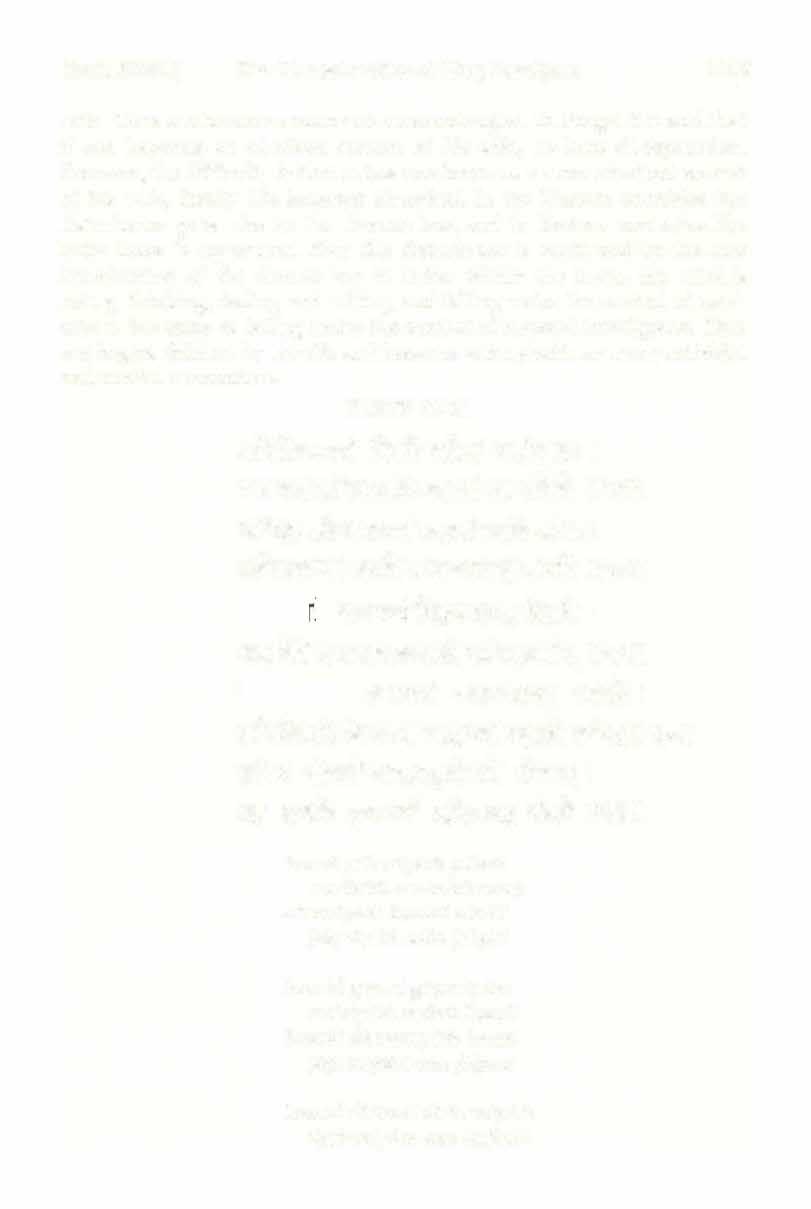
��ct�fRta�•¥4��1
q��41'1NI¥4;ql�tti�C(Iijffll{11'-\�11
•Pl'l)�rnRI sazoctR4tq��·q� �1
ffiMNcN�NtN'*4i��R4f��II� o II ��iilltllq��n:cc��, ����ttl UR61q��II��II
kvacit pibantyarh pibati madirarh mada-vihvalaft



asnantyarh kvacid asnati
jakfiatyiirh saha jakfiiti
kvacid gayati gayantyam
rudatyiirh rudati kvacit
kvacid dhasantyarh hasati
jalpantyam anu jalpati
kvacid dhavati dhavantyarh
tifi.thantyam anu ti�.thati

Texts 57-61] The Characteristics of King Purafijana ll99
Srimad-Bhagavatam
anu sete sayanayam
anvaste kvacid asatim
kvacic chnwti srr�vantyarh
pasyantyam anu pasyati
kvacij jighrati jighrantyarh sprsantyarh sprsati kvacit
kvacic ca socatirh jayam anu socati dinavat anu hr§yati hr§yantyarh muditam anu modate
kvacit-sometimes; pibantyam-while drinking; pibati-he drank; madiram-liquor; mada-vihvala[l.-being intoxicated; asnantyam-while she was eating; kvacit-sometimes; asnati-he ate; jak�atyam-while she was chewing; saha-with her; jak§iti-he chewed; kvacit-sometimes; giiyatihe used to sing; giiyantyiim-while his wife was singing; rudatyiim-when the wife was crying; rudati-he also cried; kvacit-sometimes; kvacit-sometimes; hasantyiim-while she was laughing; hasati-he also laughed; jalpantyiim-while she was talking loosely; anu-following her; jalpati-he also talked loosely; kvacit-sometimes; dhiivati-he also used to walk; dhavantyam-when she was walking; ti§thantyiim-while she was standing silently; anu-following her; ti§thati-he used to stand; anu-following her; sete-he used to lie down; sayaniiyiim-while she was lying on the bed; anu-following her; aste-he also used to sit; kvacit-sometimes; iisatimwhile she was sitting; kvacit-sometimes; srrwti-he used to hear; snwantyam-while she was engaged in hearing; pasyantyam-while she was seeing something; anu-following her; pasyati-he also used to see; kvacit-sometimes; jighrati-he used to smell; jighrantyam-while his wife was smelling; sprsantyam-while the wife was touching; sprsati-he was also touching; kvacit-at that time; kvacit ca-sometimes also; socatimwhen she was lamenting; jayam-his wife; anu-following her; socati-he was also lamenting; dina-vat-like a poor man; anu-following her; hr§yatihe used to enjoy; h[§yantytim-while she was feeling enjoyment; muditamwhen she was satisfied; anu-following her; modate-he felt satisfaction.
TRANSLATION
When the Queen drank liquor, King Puraiijana also engaged in drinking. When the Queen dined, he used to dine with her, and when she chewed,

1200
[Canto 4, Ch. 25
King Puraiijana used to chew along with her. When the Queen sang, he also sang. Similarly, when the Queen cried, he also cried, and when the Queen laughed, he also laughed. When the Queen talked loosely, he also talked loosely, and when the Queen walked, the King walked behind her. When the Queen would stand still, the King would also stand still, and when the Queen would lie down in bed, he would also follow and lie down with her. When the Queen sat, he would also sit, and when the Queen heard something, he would follow her to hear the same thing. When the Queen saw something, the King would also look at it,and when the Queen smelled something, the King would follow her to smell the same thing. When the Queentouched something,the King would also touch it,and when the dear Queen was lamenting, the poor King also had to follow her in lamentation. In the same way, when the Queen felt enjoyment, he also enjoyed, and when the Queen was satisfied, the King also felt satisfaction.
PURPORT


The mind is the place where the self is situated, and the mind is conducted by the intelligence. Thelivingentity, situated withintheheart, follows the intelligence. The intelligence is herein depicted as the Queen, and the soul, under mental control, follows the material intelligence just as the King follows his wife. The conclusion is that material intelligence is the cause of bondage for the living entity. The point is thatone has to take to spiritual intelligenceto come out of this entanglement.
In the life of Maharaja Ambari�a, we find that the great Maharaja first engaged his mind on the lotus feet of Kr�I;la. In this way his intelligence became purified. Maharaja Ambari�a also used his other senses in the service of the Lord. He engaged his eyes inseeing the Deity in the temple nicely decorated with flowers. He engaged his sense of smell by smelling the flowers, and he engaged his legs by walking to the temple. Hishands were engaged in cleansingthetemple,andhisearswere engagedinhearing aboutKr�Qa.Histongue wasengagedin two ways: in speaking about Kr�Qa and in tasting prasiida offered to the Deity. Materialisticpersons,who are under the full control of material intelligence, cannot perform all these activities. Thus, consciously or unconsciously, they become entangledby thedictationsofmaterial intelligence.Thisfactissummarized inthefollowingverse.
Text 62] The Characteristics of King Purafijana 1201
TEXT 62 fcbtS&\41 +tfM� e4sttRtctfirn: I it'60'11��:i&tU�4��1'!40� II��II
vipralabdho mahinaivarh sarva-prakrti-vaiicita� necchann anukaroty ajiia� klaibyat kri{lti-mrgo yatha
vipralabdha�- captivated;mahifya-by theQueen;evam-thus; sarva-all; prakrti-existence; vaiicita�-being cheated; na icchan- without desiring; anukaroti-used to follow and imitate; ajiia�- the foolish King; klaibyiitby force; kri�a-mrga�-a pet animal;yatha-just like.
TRANSLATION
In this way, King Puraiijana was captivated by his nice wife and was thus cheated. Indeed, he became cheated in his whole existence in the material world. Even against that poor foolish King's desire, he remained under the control of his wife, just like a pet animal that dances according to the order of its master.
PURPORT
The word vipralabdha� is very significant inthis verse. Vi means "specifically," and pralabdha means "obtained." Just to satisfy his desires, the King got the Queen, and thus he became cheated by material existence. Although he was not willing to do so, he remained as a pet animal under the control of material intelligence. Just as a pet monkey dances according to the desires of its master,the King danced according to the desires of the Queen.In Srtmad-Bhagavatam it is said: mahat-seviirh dviiram iihur vimukte� (5.5.2). If one associates with a saintly person, a devotee, his path of liberation becomes clear. But if one associates with a woman, or with a person who is too much addicted to a woman,his path of bondagebecomes completely clear.

On the whole,for spiritual advancement, one must give up the company of women. This is what is meant by the order of sannyasa, the renounced order. Before taking sannyasa, or completely renouncing the material world, one has to practice avoiding illicit sex. Sex life, licit or illicit, is practically the same, but through illicit sex one becomes more and more captivated. By regulating one's sex life there is a chance that one may eventually be able to renounce sex or renounce the association of women. If this can be done, advancement in spiritual life comes very easily.
How one becomes captivated by the association of one's dear wife is explained in this chapter by Narada Muni. Attraction for one's wife means
1202
Srimad-Bhagavatam
[Canto 4, Ch. 25
attraction for the material qualities. One who is attracted by the material quality of darkness is in the lowest stage of life, whereas one who is attracted by the material quality of goodness is in a better position. Sometimes we see that when a person is on the platform of material goodness, he is attracted more or less by the cultivation of knowledge. This is, of course, a better position, for knowledge gives one the preference to accept devotional service. Unless one comes to the platform of knowledge, the brahma-bhuta stage, one cannot advance in devotional service. As Kr�l).a says in Bhagavad-gita:
brahma-bhuta� prasannatmii na socati na kiink§ati sama� sarve§u bhute§u mad-bhaktirh labhate param
"One who is thus transcendentally situated at once realizes the Supreme Brahman. He never laments nor desires to have anything; he is equally disposed to every living entity. In that state he attains pure devotional service unto Me." (Bg. 18.54)
The platform of knowledge is advantageous because it is a means by which one may come to the stage of devotional service. However, if one takes to devotional service directly, knowledge is revealed without separate endeavor. This is confirmed in Srimad-Bhagavatam: vasudeve bhagavati bhakti-yogal} prayojital;,/ janayaty asu vairiigyarit jnanarh ca yad ahaitukam (1.2.7). Devotional service automatically reveals actual knowledge of our material existence. One who is sufficiently intelligent immediately attains the stage of renunciation of so-called society, family and love as well as other things. As long as we are attached to society, family and love of the material world, there is no question of knowledge. Nor is there a question of devotional service. By directly taking to devotional service, however, one becomes filled with knowledge and renunciation. In this way one's life becomes successful.
Thus end the Bhaktivedanta purports ofthe Fourth Canto, Twenty-fifth Chapter, of the Srimad-Bhagavatam, entitled "The Descriptions of the Characteristics of King Puranjana."

Text 62] The Characteristics of King Puraiijana 1203
CHAPTER TWENTY-SIX

ncirada uvaca
sa ekada mahefivtiso
ratham pancasvam asugam dvi§am dvi-cakram ektikfiam
tri-ver-um panca-bandhuram
eka-rasmy eka-damanam
eka-niflam dvi-kiibaram
panca-praharar-am sapta
variitham panca-vikramam
haimopaskaram iiruhya
svarr-a-varmtikfiaye_sudhifl. ekadasa-camiinatha�
panca-prastham agad vanam
l-3 �� � � +i�ltfl�CI�'EI+iiU•I( I twft;rsJ� �Cl9iil•�II�II l(4W:�«¥4Wiir�i �«(I qtUII(Ui � qjjNifl+i(II �II iaiN�(¥41� (.Ciufct+it��!!l\J:I
KingPuraruanaGoestotheForesttoHunt, andHisQueenBecomesAngry TEXTS
1205
niiradafl uviica-Niirada said; saft-K.ing Purafijana;ekadii-once upon a time; mahe.sviisafl-carrying his strong bow and arrows;ratham-chariot; panca-asvam-five horses; iisu-gam-going very swiftly; dvi{sam-two arrows;dvi-cakram-twowheels;eka-one;ak.sam-axle;tri-three;vepumflags;panca-five;bandhuram-obstacles;eka-one;rasmi-rope, rein;ekaone; damanam-chariot driver; eka-one; nipam-sitting place; dvi-two; kubaram-poststowhichtheharnesses are fixed;panca-five;praharapamweapons; sapta-seven; varutham-coverings or ingredients of the body; panca-five; vikramam-processes;haima-golden;upaskaram-ornaments; aruhya-riding on; svar!'la-golden; varma-armor; ak§aya-inexhaustible; i_sudhifl-quiver; ekiidasa-eleven;camu-niithafl-commanders;panea-five; prastham-destinations, objectives;agiit-went;vanam-to the forest.
TRANSLATION

The great sage Narada continued: My dear King, once upon a time King Purafijana took up his great bow, and, equipped with golden armor and a quiver of unlimited arrows and accompanied by eleven commanders, he sat on his chariot driven by five swift horses and went to the forest named Paiica-prastha. He took with him in that chariot two explosive arrows. The chariot itself was situated on two wheels and one revolving axle. On the chariot were three flags, one rein, one chariot driver, one sitting place, two poles to which the harness was fixed, five weapons and seven coverings. The chariot moved in five different styles, and five obstacles lay before it. All the decorations of the chariot were made of gold.
PURPORT
These three verses explain how the material body of the living entity is under the control of the three qualities of the external energy. The body itself is the chariot, and the living entity is the owner of the body, as explained in Bhagavad-gita: dehino 'smin yatha dehe (Bg. 2.13). The owner of the body is called the dehi, and he is situated within this body, specifically within the heart. The living entity is driven by one chariot driver. The chariot itself is made of three gu!'las, three qualities of material nature, as confirmed in Bhagavad-gita: yantriiriiphani mayayii (Bg. 18.61). The word yantra means carriage. The bodyis given by material nature, and the driver of that body is Paramatma, the Supersoul. The living entity is seated within the chariot. This is the actual position.
The living entityis always being influenced bythe three qualities-sattva (goodness), raja[!. (passion) and tamal]. (ignorance). This is also confirmed in Bhagavad-gitii:
1206 Snmad-Bhagavatam [Canto 4, Ch. 26
Texts 1-3] King Puraiijana Goes to the Forest to Hunt tribhir gurwmayair bhiivair

"Deluded by the three modes [goodness,passion and ignorance], the whole world does not know Me, who am above the modes and inexhaustible."
(Bg. 7.13)
The living entity is thus bewildered by the three qualities of material nature. These three qualities are described in this verse as three flags. By a flag, one can come to know who the owner of the chariot is; similarly, by the influence of the three qualities of material nature, one can easily know the direction in which the chariot is moving. In other words, one who has eyes to see can understand how the body is being driven, influenced by the particular type or quality of material nature. In these three verses the activity of the living entity is described to prove how the body becomes influenced by the quality of ignorance, even when a person wants to be religious. Niirada Muni wanted to prove to King Priicinabarhi�at that the King was being influenced by the tamo·gu[!a, the quality of ignorance, even though the King was supposed to be very religious.
According to karma-kii[!t)iya, the process of fruitive activities, a person performs varioussacrifices directed by the Vedas, and in all those sacrifices animal killing, or experimenting on the life of animals to test the power of Vedic mantras, is enjoined. Animal killing is certainly conducted under the influence of the mode of ignorance. Eventhough one may be religiously inclined, animal sacrifice is nonetheless recommended in the siistras, not only in the Vedas but even in the modern scriptures of other sects. These animal sacrifices are recommended in the name of religion, but actually animal sacrifice is meant for persons in the mode of ignorance. When such people kill animals, they can at least do so in the name of religion. However,when the religious system is transcendental, like the Vaig1ava religion, there is no place for animal sacrifice. Such a transcendental religious system is recommended by Kr��a in Bhagavad-gitii:
sarva-dharmiin parityajya
miim ekam sararwm vraja aham tviim sarva-piipebhyo
mok§ayi§yiimi mii suca�
"Abandon all varieties of religion andjust surrender unto Me. I shall deliver you from all sinful reaction. Do not fear." (Bg. 18.66)
1207
ebh* sarvam idam jagat mohitam niibhijiiniiti miim ebhya� param avyayam
Because KingPracinaharhi�at was engaged inperforming various sacrifices in which animals were killed, Narada Muni pointed out that such sacrifices are influenced by the mode of ignorance. From the very beginning of Srtmad-Bhiigavatam it is said: dharma[l projjhita-kaitavo 'tra (L 1.2). All kinds of religious systems that are involved in cheating are completely kicked out of Srimad-Bhiigavatam. In the bhagavad-dharma, the religion dealing with one's relationship with the Supreme Personality of Godhead, animal sacrifice is not recommended. In the performance of smikirtanayajiia- Hare Kr��a, Hare Kr��a, Kr��a Kr��a, Hare Hare/ Hare Rama, Hare Rama, Rama Rama, Hare Hare-there is no recommendation for animal sacrifices.
In these three verses, King Purafijana's going to the forest to kill animals is symbolic of theliving entity's being driven bythe mode of ignorance and thus engaging in different activities for sense gratification. The material body itself indicates that the living entity is already influenced by the three modes of material nature and that he is driven to enjoy material resources. When the body is influenced by the mode of ignorance, its infection becomes very acute.When it is influenced by the mode ofpassion, the infection is at the symptomatic stage. However, when the body is influenced by the mode of goodness, the materialistic infection becomes purified. The ritualistic ceremonies recommended in religious systems are certainly on the platform of goodness, hut because within this material world even the mode of goodness is sometimes polluted by the other qualities (namely passion and ignorance), a man in goodness is sometimes driven by the influence of ignorance.
It is herein described that King Purafijana once went to the forest to kill animals.This means that he, the living entity, came under the influence of the mode of ignorance. The forest in which King Purafijana engaged in hunting was named Pafica-prastha. The word paiica means five, and this indicates the objects of the five senses. The body has five working senses, namely, the hands, the legs, the tongue, the rectum and the genitals. By taking full advantage of these working senses, the body enjoys material life. The chariot is driven by five horses, which represent the five sense organs-namely, the eyes, ears, nose, skin and tongue. These sense organs are very easily attracted by the sense objects. Consequently the horses are described as moving swiftly. On the chariot King Purafijana kept two explosive weapons, which may be compared to ahankiira, or false ego. This false ego is typified by two attitudes: "I am this body" (ahantii), and "Everything in my bodily relationships belongs to me" (mamatii).

1208 Srimad-Bhagavatam [Canto 4, Ch. 26
The two wheels of the chariot may be compared to the two moving facilities-namelysinful life and religious life. The chariot is decorated with three flags, which represent the three modes of material nature. The five kinds of obstacles, or uneven roads, represent the five kinds of air passing within the body. These are priir-a, apiina, udiina, samiina and vyiina. The body itself is covered by seven coverings, namely, skin, muscle, fat, blood, marrow, bone and semen. The living entity is covered by three subtle material elements and five gross material elements. These are actually obstacles placed before the living entity on the path of liberation from material bondage.
The word rasmi (rope) in this verse indicates the mind. The word ni!Za is also significant, for ni!Za indicates the nest where a bird takes rest. In this case ni!la is the heart where the living entity is situated. The living entity sits in one place only. The causes of his bondage are two: namely lamentation and illusion. In material existence the living entity simply hankers to get something he can never get. Therefore he is in illusion. As a result of being in this illusory situation, the living entity is always lamenting. Thus lamentation and illusion are described herein as dvi-kiibara, the two posts of bondage.
The living entity carries out various desires through five different processes,which indicate the working of the five workingsenses. The golden ornaments and dress indicate that the living entity is influenced by the quality of rajo-gur-a, passion. One who has a good deal of money or riches is especially driven by the mode of passion. Being influenced by the mode of passion, one desires so many things for enjoyment in this material world. The eleven commanders represent the ten sensesand the mind. The mind is always making plans with the ten commanders to enjoy the material world. The forest named Paiica-prastha,where the Kingwent to hunt,is the forest of thefive sense objects: form, taste, sound, smell and touch. Thus in these three verses Narada Muni describes the position of the material body and the encagement of the living entity within it.

Text4) King Puraiijana Goes to the Forest to Hunt 1209
TEXT4 � � � ���·�:1 fctm �l�l+liji(G_l 't41044(1Wf�R��t:II�II
caciira mrgayiim tatra drpta iittefiu-kiirmukaft
caciira-executed ; mrgayiim-hunting ; tatra-there; drpta[!,-being proud; iitta-having taken;(su-arrows; kiirmuka[l,-bow; vihaya-giving up; jayiimhis wife; a-tat-arhiim-although impossible; mrga-hunting; vyasana-evil activities; liilasa[l,-being inspired by.

TRANSLATION
It was almost impossible for King Purafijana to give up the company of his Queen even for a moment. Nonetheless, on that day, being very much inspired by the desire to hunt, he took up his bow and arrow with great pride and went to the forest, not caring for his wife.
PURPORT
One form of hunting is known as woman-hunting. A conditioned soul is never satisfied with one wife. Those whose senses are very much uncontrolled especially try to hunt for many women. King Puraiijana's abandoning the company of his religiously married wife is representative of the conditionedsoul's attempt to hunt for many women for sense gratification. Wherever a king goes, he is supposed to be accompanied by his queen, but when the king, or conditioned soul, becomes greatly overpowered by the desire for sense gratification, he does not care for religious principles. Instead, with great pride, he accepts the bow and arrow of attachment and hatred. Our J::Onsciousness is always working in two ways-the right way and the wrong way. When one becomes too proud of his position, influenced by the mode of passion, he gives up the right path and accepts the wrong one. Kfiatriya kings are sometimes advised to go to the forest to hunt ferocious animals just to learn how to kill, but such forays are never meant for sense gratification. Killing animals to eat their flesh is forbidden for human beings.
1210 Srimad-Bhagavatam vihtiya jiiyiim atad-arhiim mrga-vyasana-liilasa[l, [Canto 4, Ch. 26
TEXTS ���-it(lt+llM(�S((: I i41titf1t�a;ciUl<iit! '4itift"i'40-t II � II iisurirh vrttim iisritya ghoriitmii niranugraha[l.
asurim-demoniac;vrttim-occupation;asritya-taken shelter of;ghorahorrible; atma-consciousness, heart; niranugraha�-without mercy; nyahanat-killed;nisita*-by sharp; bartai�-arrows; vaneflu-in the forests; vana-gocaran-the forest animals.
TRANSLATION
At that time King Puraiijana was very much influenced by demoniac propensities. Because of this, his heart became very hard and merciless, and with sharp arrows he killed many innocent animals in the forest, taking no consideration.
PURPORT

When a man becomes too proud of his material position, he tries to enjoy his senses in an unrestricted way, being influenced by the modes of passion and ignorance. He is thus described as asuric, or demoniac. When people are demoniac in spirit, they are not merciful toward the poor animals. Consequently they maintain various animal slaughterhouses. This is technically called suna or hirhsa, which means the killing of living beings. In Kali-yuga, due to the increase of the modes of passion and ignorance, almost all men are asuric or demoniac; therefore they are very much fond of eating flesh, and for this end they maintain various kinds of animal slaughterhouses.
In this age of Kali the propensity for mercy is almost nil. Consequently there is always fighting and wars between men and nations. Men do not understand that because they unrestrictedly kill so many animals, they also must be slaughtered like animals in big wars. This is very much evident in the Western countries. In the West, slaughterhouses are maintained without restriction, and therefore every fifth or tenth year there is a big war in which countless people are slaughtered even more cruelly than the animals. Sometimes during war, soldiers keep their enemies in concentration camps and kill them in very cruel ways. These are reactions brought about by unrestricted animal killing in the slaughterhouse and by hunters in the forest. Proud, demoniac persons do not know the laws of nature, nor do they know the laws of God. Consequently they unrestrictedly kill poor animals, not caring for them at all. In this Kr�!Ja consciousness movement animal killing is completely prohibited. One is not accepted as a bona fide student in this movement unless he promises to follow the four regulative principles:
Text 5] King Puraiijana Goes to the Forest to Hunt
1211
nyahanan nisitair bartair vaneflu vana-gocaran
no animal killing, no intoxication, no illicit sex, and no gambling. This Kr�l).a consciousness movement is the only means by which the sinful activities of men in this Kali-yuga can be counteracted.
TEXT6

� .!,; � � qWf_ tffll
�· � �riCIRRt Mtl"'.lij II � II
tirthe.su pratidr§te�u riijii medhyiin pasun vane yiivad-artham alam lubdho hanyiid iti niyamyate
tirthe§u-in holy places; pratidr§�e§u -according to the direction of the Vedas; riijii-a king; medhyiin-fit for sacrifice; pasiin-animals; vane-in the forest; yavat-so much as; artham- required; alam-not more than that; lubdha[l. - being greedy; hanyiit-one may kill; iti- thus ; niyamyateit is regulated.
TRANSLATION
If a king is too attracted to eating flesh, he may, according to the directions ofthe revealed scriptures on sacrificial performances, go to the forest andkill some animals that are recommended for killing. One is not allowed to kill animals unnecessarily or without restrictions. The Vedas regulate animal killing to stop the extravagance of foolish men influenced by the modes of passion and ignorance.
PURPORT
The question may be raised why a living being should be restricted in sense gratification. If a king, to learn how to kill, may go to the forest and kill animals, why should a living entity, who has been given senses, not be allowed unrestricted sense gratification? At the present moment this argument is put forward even by so-called sviimis and yogis who publicly say thatbecausewehavesenseswe must satisfy them by sense gratification. These foolish sviimis and yogis, however, do not know the injunctions of the siistras. Indeed, sometimes these rascals come out to defy the siistras. They even publicly announce that there should be no more siistras, no more books. "Just come to me," they say, "and Ishall touch you, and you will become immediately spiritually advanced."
1212 Srimad-Bhagavatam [Canto 4, Ch. 26
Because demoniac people want to be cheated, so many cheaters are present to cheat them. At the present moment in this age of Kali-yuga, the entire human society has become an assembly of cheaters and cheated. For this reasonthe Vedic scriptures have given us the proper directions for sense gratification. Everyone is inclined in this age to eat meat and fish, drink liquor, and indulge in sex life, but according to the Vedic injunctions, sex is allowed only in marriage, meat-eating is allowed only when the animal is killed and offered before the goddess Kal'i, and intoxication is allowed only in a restricted way. In this verse the word niyamyate indicates that all these things-namely, animal killing, intoxication and sex-should be regulated.
Regulations are meant for human beings, not for animals. The traffic regulations on the street, telling people to keep to the right or the left, are meant for human beings, not for animals. If an animal violates such a law, he is never punished, but a human being is punished. The Vedas are not meant for the animalsbut for the understanding of human society. A person who indiscriminately violates the rules and regulations given by the Vedas is liable to be punished. One should therefore not enjoy his senses according to his lusty desires but should restrict himself according to the regulative principles given in the Vedas. If a king is allowed to hunt in a forest, it is not for his sense gratification. We cannot simply experiment in the art of killing. If a king, being afraid to meet rogues and thieves, kills poor animals and eats their flesh comfortably at home, he may lose his position.
Because in this age kings have such demoniac propensities, monarchy is abolished by the laws of nature in every country. People have become so degraded in this age that on the one hand they restrict polygamy and on the other hand they hunt for women in so many ways. Many business concerns publicly advertise that topless girls are available in this club or in that shop. Thus women have become instruments of sense enjoyment in modern society. The Vedas enjoin, however, that if a man has the propensity to enjoy more than one wife-as is sometimes the propensity for men in the higher social order, such as the brahmartas, k§atriyas and the vaisyas, and even sometimes the sudras- he is allowed to marry more than one wife. Marriage means taking complete charge of a woman and living peacefully without debauchery. At the present moment, however, debauchery is unrestricted. Nonetheless, society makes a law that one should not marry more than one wife. This is typical of a demoniac society.

Text 7] King Puraiijana Goes to the Forest to Hunt 1213
TEXT7 ��d����:l ����WI�������
ya evarh karma niyatarh
vidvan kurvita manava�
karmar-a tena rajendra
jiianena na sa lipyate
ya�-anyone who; evam-thus; karma-activities; niyatam- regulated; vidvan-learned; kurvita-should perform; manava�-a human being; karmar-a-bysuchactivities; tena-bythis; raja-indra- 0 King; jiianena-by advancementofknowledge; na-never ; sa�-he; lipyate-becomesinvolved.
TRANSLATION
Narada Muni continued to speak to King Pracinabarhi�at: My dear King, any person who works according to the directions of the Vedic scriptures does not become involved in fruitive activities.

PURPORT
Justasagovernmentmayissuetradelicensesinorderforitscitizensto actinacertainway,the Vedas containinjunctionsthatrestrainandregulate allofourfruitiveactivities.Alllivingentitieshavecomeintothismaterial worldtoenjoythemselves.Consequentlythe Vedas aregiven toregulate sense enjoyment. One who enjoys his senses underthe Vedicregulative principles does notbecomeentangledintheactionsandreactionsofhis activities.Asstatedin Bhagavad-gita:
yajiiarthat karmar-o 'nyatra loko 'yarh karma-bandhana� tad-artharh karma kaunteya mukta-smiga� samacara
"Workdoneas asacrificeforVigm hastobeperformed,otherwisework bindsonetothismaterialworld.Therefore, 0 sonofKunti,performyour prescribed duties for His satisfaction, and in that way you will always remainunattachedandfreefrombondage."(Bg.3.9)
Ahumanbeingisespeciallymeanttoattainliberationfromthebondage ofbirth, death,oldageanddisease. HeisthereforedirectedbytheVedic regulativeprinciplestoworkinsuch awaythathemay fulfillhisdesires forsensegratificationandatthesametimegraduallybecomefreedfrom material bondage.Actionaccordingtosuchprinciplesiscalledknowledge. Indeed,theword veda meansknowledge.Thewords jiianena na sa lipyate
1214 Srimad-Bhagavatam
[Canto 4, Ch. 26
indicate that by following the Vedic principles, one does not become involved in the actions and reactions of his fruitive activities.
Everyone is therefore advised to act in terms of the Vedic injunctions and not irresponsibly. When a person within a state acts according to the laws and licenses of the government, he does not become involved in criminal activities. Man-made laws, however, are always defective because they are made by men who are prone to committing mistakes, being illusioned, cheating and having imperfect senses. The Vedic instructions aredifferentbecause they do not have these four defects. Vedic instructions are not subject to mistakes. The knowledge of the Vedas is knowledge received directly from God, and there is consequently no question of illusion, cheating, mistakes or imperfect senses. All Vedic knowledge is perfect because it is received directly from God by the paramparii disciplic succession. In Srimad-Bhiigavatam it is said: tene brahma hrda ya iidi-kavaye (Bhiig. 1.1.1). The original creature of this universe, known as the iidi-kavi, or Lord Brahmii., was instructedby Kr�9-a through the heart. After receiving these Vedic instructions from Lord Kr�9-a Himself, Brahmii. distributed the knowledge by the paramparti system to Narada, and Narada in turn distributed the knowledge to Vyasa. In this way Vedic knowledge is perfect. If we act according to Vedic knowledge, there is no question of being involved in sinful activities.

anyathii karma kurvtirto miiniiruflho nibadhyate
gurw-praviiha-patito
na.s{a-prajno vrajaty adha[t
anyathti-otherwise; karma- fruitive activities; kurvti[ta[l-while acting; mtina-iiruflha[l-being influencedby falseprestige; nibadhyate-one becomes entangled; gu[ta-pravtiha-by the influence of the material qualities; patita[l-fallen; na§ {a-prajna� -bereft of all intelligence; vrajati-thus he goes; adha[l-down .

TRANSLATION
Otherwise a person who acts whimsically falls down due to false prestige. Thus he becomes involved in the laws of nature, which are composed of
Text 8) King Purafijana Goes to the Forest to Hunt 1215
the three qualities [goodness, passion and ignorance]. In this way a living entity becomes devoid of his real intelligence and becomes perpetually lost in the cycle of birth and death. Thus he goes up and down from a microbe in stool to a high position in the Brahmaloka planet.
PURPORT
There are many important words in this verse. The first is anyathii, "otherwise," which indicates one who does not care for the Vedic rules andregulations. Therules and regulations laid down in the Vedas are called siistra-vidhi. Bhagavad-gttii clearly states that one who does not accept the siistra-vidhi, or rules and regulations mentioned in the Vedic scriptures, and acts whimsicallyor puffed up with false pride, never attains perfection in this life, nor does he attain happiness or liberation from the material condition.
ya� siistra-vidhim utsrjya vartate kiima-kiirata� na sa siddhim aviipnoti
na sukham na pariirh gatim
"He who discards scriptural injunctions and acts according to his own whims attains neither perfection, nor happiness, nor the supreme destination."
(Bg. 16.23)

Thus one who is deliberately transgressing the rules and regulations of the siistras is simplyinvolving himself more and more inmaterial existence in the three modes of material nature. Human society should therefore follow the Vedic principles of life, which are summarized in Bhagavad-gitti Otherwise life in material existence will continue. Foolish persons do not know that the soul is passing through 8,400,000 species of life. By the gradual process of evolution, when one comes to the human form of life, he is supposed to follow the rules and regulations laid down in the Vedas.
Sri Caitanya Mahaprabhusaysthattheliving entity, since time immemorial, is suffering the threefold miseries of material nature due to his demoniac attitude, which is his spirit of revolt against the Supreme Personality of Godhead. Kg;l).a also confirms this in Bhagavad-gttii:
mamaiviirhso jtva-loke
jtva-bhilta� saniitana� mana� fiafithiinindriyii[!i prakrti-sthiini karfiati
1216 Srimad-Bhagavatam [Canto 4, Ch. 26
"The living entities in this conditioned world are My eternal, fragmental parts. Due to conditioned life, they are struggling very hard with the six senses, which include the mind." (Bg. 15.7)
Every living entity is part and parcel of God. There is no reason for the living entity's being put into the miserable threefold condition of material existence but that he voluntarily accepts material existence on the false pretext of becoming an enjoyer. To save him from this horrible condition, the Lord has given all the Vedic literatures in His incarnation ofVyasadeva. It is therefore said:
krrr;a bhuli' sei jfva aniidi-bahirmukha ataeva miiyii tiire deya samsiira-du�kha
"By forgetting Kr�f.la, the living entity has become materialistic since time immemorial. Therefore the illusory energy of Kr�f.la is giving him different types of miseries in material existence." (Cc. Madhya 20.117)
miiyii-mugdha jfvera niihi svata� kn1Ja-jniina
jivere krpiiya kailii k!§IJa veda-pun17Ja
"When a living entity is enchanted by the external energy,he cannot revive his original Kr�f.la consciousness independently. Due to such circumstances, Kr�f.la has kindly given him the Vedic literatures, such as the four Vedas and eighteen Puriir-as." (Cc. Madhya 20.122)
Everyhumanbeing shouldthereforetake advantage of the Vedic instructions; otherwise one will be bound by his whimsical activities and will be without any guide.
The word miiniiru{lha� is also very significant in this verse. Under the pretext of becoming great philosophers and scientists, men throughout the whole world are working on the mental platform. Such men are generally nondevotees, due to not caring for the instructions given by the Lord to the first living creature, Lord Brahma. The Bhiigavatam therefore says:

hariiv abhaktasya kuto mahad-gur-ii
mano-ratheniisati dhiivato bah* (Bhiig. 5.18.12)
A person who is a nondevotee has no good qualifications because he acts onthe mentalplatform. Onewho acts onthe mentalplatform has to change his standard of knowledge periodically. We consequently see that one philosopher may disagree with another philosopher, and one scientist may
Text 8) King Puraiijana Goes to the Forest to Hunt 1217
put forward a theory contradicting the theory of another scientist. All of this is due to their working on the mental platform without a standard of knowledge. In the Vedic instructions, however, the standard of knowledge is accepted, even though it may sometimes appear that the statements are contradictory. Because the Vedas are the standard of knowledge, even though they may appear contradictory, they should be accepted. If one does not accept them, he will be bound by the material conditions.
The material conditions are described in this verse as gur;ta-praviiha, the flowing of the three modes of material nature. Srila Bhaktivinoda 'fhakura therefore says in a song, (miche) miiyiira vase, yiiccha bhese', khiiccha hlibu�ubu, bhai: "Why are you suffering? Why are you sometimes being drowned in the waves of material nature and sometimes coming to the surface?" (]iva) knrJ.a-diisa, e visviisa, karle ta' iira du�kha niii: "Please therefore accept yourself as the servant of Kr�p.a. Then you will be freed from all miseries." As soon as one surrenders to Kr�Q.a and accepts the perfect standard of knowledge, which is Bhagavad-gitii as it is, he then comes out of the material modes of nature and does not fall down and lose his knowledge.
Na§ta-prajfia�. The word prajfia means "perfect knowledge," and na§taprajfia means "one who has no perfect knowledge." One who does not have perfect knowledge has only mental speculation. By such mental speculation one falls down and down into a hellish condition of life. By transgressing the laws laid down in the siistras, one cannot become pure in heart. When one's heart is not purified, one acts according to the three material modes of nature. These activities are very nicely explained in verses 1-6 of the Seventeenth Chapter of Bhagavad-gitii. Bhagavad-gttii further explains:
traigu[tya-vi§ayii vedii
nistraigu[tyo bhavarjuna
nirdvandvo nitya-sattva-stho
niryoga-k§ema iitmavan

"The Vedas mainly deal with the subject of the three modes of material nature. Rise above these modes, 0 Arjuna. Be transcendental to all of them. Be free from all dualities and from all anxieties for gain and safety, and be established in the Self." (Bg. 2.45)
The entire world and all material knowledge is within the three modes of material nature. One has to transcend these modes, and to attain that platform of transcendence one must follow the instruction of the Supreme Personality of Godhead and thus become perfect in life. Otherwise one will be knocked down by the waves of the material nature's three modes. This
1218 Srimad-Bhagavatam [Canto 4, Ch. 26
is further explained in Srimad-Bhagavatam in the words of Prahlada Maharaja:

matir na kn'f!e parata� svato vti
mitho 'bhipadyeta grha-vrattintim
adtinta-gobhir visattirh tamisrarh
puna� punas carvita-carvar-antim (Bhtig. 7.5.30)
Materialistic persons who are too much engaged in materialenjoyment and who do not know anything beyond their material experiences are carried by the whims of material nature. They livealifecharacterizedby chewing the chewed,andtheyarecontrolledbytheiruncontrolledsenses. Thustheygodownto thedarkestregionsofhellish life.
tatra nirbhinna-gtitrar-arh citra-vtija* silt-mukha*
viplavo 'bhud du�khittintirh du�saha� karur-atmantim
tatra-there; nirbhinna-being pierced; gtitrar-am- whose bodies; citravtija*-with variegated feathers; silt-mukha*-by the arrows; viplava�destruction; abhiit-was done; du�khittintim-of the most aggrieved; du�saha�- unbearable; karuTJa-titmantim-forpersonswhoareverymerciful.
TRANSLATION
When King Puraiijana was hunting in this way, many animals within the forest lost their lives with great pain, being pierced by the sharp arrowheads. Upon seeing these devastating, ghastly activities performed by the King, all the people who were merciful by nature became very unhappy. Such merciful persons could not tolerate seeing all this killing.
PURPORT
When demoniac persons engage in animal killing, the demigods, or devotees of the Lord, are very much afflicted by this killing. Demoniac civilizations in this modern age maintain various typesofslaughterhouses
1219
Text9] King Puraiijana Goes to the Forest to Hunt
�tii'IIOii
TEXT9 ijSf
M'l�t�: fu�Ti�: I ��:R(4etlwti�:�:�uu�+twtl'{ II � II
all over the world. Rascal svtimis and yogts encourage foolish persons to go on eating flesh and killing animals and at the same time continue their so-called meditation and mystical practices. All these affairs are ghastly, and a compassionate person, namely a devotee of the Lord, becomes very unhappy to see such a sight. The hunting process is also carried on in a different way, as we have already explained. Hunting women, drinking differenttypes ofliquor,becomingintoxicated, killinganimals and enjoying sex all serve as the basis of modern civilization. Vai�!J.avas are unhappy to see such a situation in theworld,and therefore they are very busyspreading this Kr�t:la consciousness movement.
The devotees are pained to see the hunting and killing of animals in the forest, the wholesale slaughter of animals in the slaughterhouses, and the exploitation of young girls in brothels that function under different names as clubs and societies. Being very much compassionate upon the killing of animals in sacrifice, the great sage Narada began his instructions to King Pracinabarhi�at.In theseinstructions, Narada Muni explainedthat devotees like him are very much afflicted by all the killing that goes on in human society. Not only are saintly persons afflicted by this killing, but even God Himself is afflicted and therefore comes down in the incarnation of Lord Buddha. Jayadeva Gosvami therefore sings: sadaya-hrdaya-darsitapasu-ghtitam. Simply to stop the killing of animals, Lord Buddha compassionately appeared. Some rascals put forward the theory that an animal has no soul or is something like dead stone. In this way they rationalize that there is no sin in animal killing. Actually animals are not dead stone, but the killers of animals are stone-hearted. Consequently no reason or philosophy appeals to them. They continue keeping slaughterhouses and killing animals in the forest. The conclusion is that one who does not care for the instructions of saintly persons like Narada and his disciplic succession surely falls into the category of na§ta-prajiia and thus goes to hell.
sasiin variihiin mahi§iin gavayiin ruru-salyakiin

medhyan anyams ca vividhiin
vinighnan sramam adhyagtit




1220 Srimad-Bhagavatam [Canto 4, Ch. 26
��¥i�IW{����@.4�1W{I AA$:lfof_ �¥4¥4�··1({II� 0 II
TEXT 10
susan-rabbits; varahan-boars; mahi�an-buffaloes; gavayan-bisons; ruru-black deer; salyakan-porcupines; medhyan-game animals; anyanothers;ca-and; vividhiin-various; vinighnan-bykilling; sramam adhyagatbecame very tired.
TRANSLATION
In this way King Purafijana killed many animals, including rabbits, boars, buffaloes, bisons, black deer, porcupines and other game animals. After killing and killing, the King became very tired.
PURPORT

A person in the mode of ignorance commits many sinful activities. In the Bhakti-rasamrta-sindhu, Srila Rupa Gosviiml explains that a man becomes sinful out of ignorance only. The resultant effect of sinful life is suffering. Those who are not in knowledge, who commit violations of thestandard laws,are subjecttobe punished under criminal laws. Similarly, thelaws of nature areverystringent. If a childtouchesfirewithoutknowing the effect, he must be burned, even though he is only a child. If a child violates the law of nature, there is no compassion. Only through ignorance does a person violate the laws of nature, and when he comes to knowledge he does not commit any more sinful acts.
The King became tired after killing so many animals. When a man comes in contact with a saintly person, he becomes aware of the stringent laws of nature and thus becomes a religious person. Irreligious persons are like animals, but in this Kr�J}.a consciousness movement such persons can come to a sense of understanding things as they are and abandon the four principles of prohibited activities-namely, illicit sex life, meat-eating, gambling and intoxication. This is the beginning of religious life. Those who are so-called religious and indulge in these four principles of prohibited activities are pseudo-religionists. Religious life and sinful activity cannot parallel one another. If one is serious in accepting a religious life, or the path of salvation, he must adhere to the four basic rules and regulations. However sinful a man may be, if he receives knowledge from the proper spiritual master and repents his past activities in his sinful life and stops them, he immediately becomes eligible to return home, back to Godhead. This is made possible just by following the rules and regulations given by the sastra and following the bona fide spiritual master.
At present the whole world is on the verge of retiring from a blind materialistic civilization, which may be likened to hunting animals in the
Text 10) King Puraiijana
to the Forest to Hunt 1221
Goes
forest. People should take advantage of this Kr�l)a consciousness movement and leave their troublesome life of killing. It is said that the killers of animals should neither live nor die. If they live only to kill animals and enjoy women, life is not very prosperous. And as soon as a killer dies, he enters the cycle of birth and death in the lower species of life. That also is not desirable. The conclusion is that killers should retire from the killing business and take to this Kr�l)a consciousness movement to make life perfect. A confused, frustrated man cannot get relief by committing suicide because suicide will simply lead him to take birth in the lower species of life or to remain as a ghost, unable to attain a gross material body. Therefore the perfect course is to retire altogether from sinful activities and take up Kr�l)a consciousness. In this way one can become completely perfect and go back home, back to Godhead.
TEXT ll

tata� k§ut-trt-parisrdnto nivrtto grham eyivan krta-snanocitahara� samvivesa gata-klama�
tata�-thereafter; k§ut-by hunger; trt-thirst; parisrdnta[t -being too fatigued; nivrtta�-having ceased; grham eyivdn-came back to his home; krta-taken; sndna-bath; ucita-1ihdra�-exactly required foodstuffs; samvivesa-took rest ; gata-klama{l-freed from all fatigue.

TRANSLATION
After this, the King, very much fatigued, hungry and thirsty, returned to his royal palace. After returning, he took a bath and had dinner. Then he took rest and thus became freed from all restlessness.
PURPORT
A materialistic person works throughout the whole week very, very hard. He is always asking, "Where is money? Where is money?" Then, at the end of the week, he wants to retire from these activities and go to some secluded place to rest. King Purai'ijana returned to his home because he was very much fatigued from hunting animals in the forest. In this way
1222 Srimad-Bhagavatam [Canto 4, Ch. 26
his conscience came to stop him from committing further sinful activities and make him return home. In Bhagavad-gitii materialistic persons are described as du§krtina�, which indicates those who are always engaged in sinful activities. When a person comes to his senses andunderstands how he is engaging in sinful activities, he returns to his conscience, which is herein figuratively described as the palace. Generally a materialistic person is infected by the material modes of passion and ignorance. The results of passion and ignorance are lust and greed. In the life of a materialist, activity means working in lust and greed. However, when he comes to his senses, he wants to retire. According to Vedic civilization, such retirement is positively recommended, and this portion of life is called viinaprastha. Retirement is absolutely necessary for a materialist who wants to become free from the activities of a sinful life.

King Puraiijana's coming home, taking bath and having an appropriate dinner indicate that a materialistic person must retire from sinful activities and become purified by accepting a spiritual master and hearing from him about the values of life. If one would do this, he would feel completely refreshed, just as one feels after taking a bath. After receiving initiation from a bona fide spiritual master, one must abandon all kinds of sinful activities, namely, illicit sex, intoxication, gambling and meat-eating.
The word ucitiihiira used in this verse is important. Ucita means appropriate. One must eat appropriately and not take after food like hogs take after stool. For a human being there are eatables described in Bhagavad-gitii (Bg. 17.8) as siittvika-fihiira, or food in the mode of goodness. One should not indulge in eating food in the modes of passion and ignorance. This is called ucitiihiira, or appropriate eating. One who is always eating meat or drinking liquor, which is eating and drinking in passion and ignorance, must give these things up so that his real consciousness may be awakened. In this way one may become peaceful and refreshed. If one is restless or fatigued, one cannot understand the science of God. As stated in SrimadBhiigavatam (1.2.20):
evarh prasanna-manaso
bhagavad-bhakti-yogata�
bhagavat-tattva-vijfiiinarh
mukta-sangasya jiiyate
Unless one can become free from the influence of passion and ignorance, he cannot be pacified, and without being pacified, one cannot understand the science of God. King Puraiijana's returning home is indicative of man's
Text ll] King Puraiijana Goes to the Forest to Hunt 1223
returning to his original consciousness, known as Kr�rta consciousness. Kr�rta consciousness is absolutely necessary for one who has committed a lot of sinful activities, especially killing animals or hunting in the forest.
TEXT 12

311€411.,+4 I
+4�1+41�� �: ����\\
iitmiinam arhayiifi cakre
dhiipalepa-srag-iidibhift
stidhv-alankrta-sarviingo
mahinam iidadhe mana�
atmiinam-himself; arhayiim-as it ought to be done; cakre-did; dhUpa-incense; alepa-smearing the body with sandalwood pulp; srakgarlands; adibhi�- beginning with; sadhu -saintly, beautifully; alankrtabeing decorated; sarva-a1iga�-all over the body; mahiflyiim- unto the Queen; adadhe-he gave; manajl-mind.
TRANSLATION
After this, King Purafijana decorated his body with suitable ornaments. He also smeared scented sandalwood pulp over his body and put on flower garlands. In this way he became completely refreshed. After this, he began to search out his Queen.
PURPORT
When a man comes into good consciousness and accepts a saintly person as a spiritual master, he hears many Vedic instructions in the form of philosophy, stories, narrations about great devotees and transactions between God and His devotees. In this way a man becomes refreshed in mind, exactly like a person who smears scented sandalwood pulp all over his body and decorates himself with ornaments. These decorations may be compared to knowledge of religion and the self. Through such knowledge one becomes detached from a materialistic way of life and engages himself in always hearing Srimad-Bhtigavatam, Bhagavad-gitli and other Vedic literatures. The word stidhv-alankrta used in this verse indicates that one must be absorbed in knowledge gathered from the instructions
1224 Srimad-Bhagavatam [Canto 4, Ch. 26
��)
of saintly persons. Just as King Puraftjana began to search out his better half, the Queen, one who is decorated with knowledge and instructions from saintly persons should try to search out his original consciousness, Kr�I]a consciousness. One cannot return to Kr�I]a consciousness unless he is favored by the instructions of a saintly person. Therefore Srila Narottama dasa ':fhakura sings: stidhu-stistra-guru-vtikya, cittete kariyti aikya. If we want to become saintly persons, or if we want to return to our original Kr�l)a consciousness, we must associate with stidhu (a saintly person), stistra (authoritative Vedic literature), and guru (a bona fide spiritual master). This is the process.
TEXT 13

trpto hr§talJ. sudrptas ca kandarptik!§ta-mtinasa� na vyaca.sta vartirohtirh grhi�Jirh grha-medhinim
trpta[t-satisfied; hr§(alJ.-joyful; su-drpta!J.-being very proud; ca-also ; kandarpa-by Cupid; akr§ta-attracted; mtinasa[t-his mind; na-did not; vycca�.ta-try; vartirohtim-higher consciousness; grhi[lim- wife; grhamedhinim-one who keeps her husband in material life.
TRANSLATION
After taking his dinner and having his thirst and hunger satisfied, King Puraiijana felt some joy within his heart. Instead of being elevated to a higher consciousness, he became captivated by Cupid, and was moved by a desire to find his wife, who kept him satisfied in his household life.
PURPORT
This verse is very significant for those desiring to elevate themselves to a higher level of Kr�!la consciousness. When a person is initiated by a spiritual master,he changes his habits and does not eat undesirable eatables or engage intheeatingof meat, the drinkingofliquor,illicitsex orgambling. Siittvika-iihiira, foodstuffs in the mode of goodness, are described in the
Text 13] King Puraiijana Goes to the Forest to Hunt 1225
ol �: �� ��lt!+li'ie: I ;r �:qt! qmm �urr ������,,
siistras as wheat, rice, vegetables, fruits, milk, sugar, and milk products. Simple food like rice, dahl, chapatis, vegetables, milk and sugar constitute a balanced diet, but sometimes it is found that an initiated person, in the name of prasada, eats very luxurious foodstuffs. Due to his past sinful life he becomes attracted by Cupid and eats good food voraciously. It is clearly visible that when a neophyte in Kr�rta consciousness eats too much, hefalls down. Insteadof being elevated to pure Kn;rta consciousness, he becomes attracted by Cupid. The so-called brahmacari becomes agitated by women, and the viinaprastha may again become captivated into having sex with his wife. Or he may begin to search out another wife. Due to some sentiment, he may give up his own wife and come into the association of devotees and a spiritual master, but due to his past sinful life he cannot stay. Instead of being elevated to Kr�rta consciousness, he falls down, being attracted by Cupid, and takes to another wife for sex enjoyment. The fall of the neophyte devotee from the path of Kr�rta consciousness down to material life is described in Srimad-Bhagavatam by Narada Muni.
tyaktva sva-dharmarh cararuimbujarh harer
bhajann apakvo 'tha patet tato yadi
yatra kva vabhadram abhud amu�ya kim ko vartha apto 'bhajatarh sva-dharmataft
(Bhag. 1.5.17)
This indicates that although a neophytedevotee may fall down from the path of Kr�rta consciousness due to his immaturity, his service to Kr��a never goes in vain. However, a person who remains steadfast in his family duty or so-called social or family obligation but does not take to Krgta consciousness receives no profit. One who comes to Krf?l').a consciousness must be very cautious and refrain from prohibited activities, as defined by Rupa Gosvami in his Upadesamrta:

atyaharaft prayasas ca prajalpo niyamagrahaft
jana-sangas ca laulyarh ca �a�bhir bhaktir vinasyati
A neophyte devotee should neither eat too much nor collect more money than necessary. Eating too much or collecting too much is called atyahara. For such atyahara one must endeavor very much. This is called prayasa. Superficially one may show himself to be very much faithful to the rules
1226 Srimad - Bhagavatam[Canto 4, Ch. 26
and regulations but at the same time not to be fixed in the regulative principles. This is called niyamtigraha. By mixing with undesirable persons or jana-smiga, one becomes tainted with lust and greed and falls down from the path of devotional service.
TEXT 14

3l��r:�d��lS'l'P;;0�Wfl
� � I
31fq ;r: �� @IT: �� � � II�\lll
anta�pura-striyo 'prcchad vimanti iva vedi§at api va� kusalarh rtimti� sesvari[ttirh yathti purti
anta�pura-household; striya�- women; aprcchat-he asked; vimanti�being too much anxious; iva-Like; vedi§at-0 King Pracinabarhi; apiwhether; va�-your; kusalam-good fortune; rtimti�-0 you beautiful women; sa-isvari[ttim-with your mistress;yathti-as; purti-before .
TRANSLATION
At that time King Puraiijana was a little anxious, and he inquired from the household women: My dear beautiful women, are you and your mistress all very happy like before, or not?
PURPORT
In this verse the word vedi§at indicates King Pracinabarhi. When a man becomes refreshed by association with devotees and awakes to Kr�!la consciousness, he consults the activities of his mind-namely, thinking, feeling and willing-and decides whether he should again return to his material activities or stay steady in spiritual consciousness. The word kusalam refers to that which is auspicious. One can make his home perfectly auspicious when he engages in devotional service to Lord Vi�!lU· When one is engaged in activities other than vi§[tu-bhakti, or in other words when one is engaged in material activities, he is always filled with anxieties. A sane man should consult his mind, its thinking, feeling and willing processes, and decide how these processes should be utilized. If one always thinks of Kr�!la, feels how to serve Him and wills to execute the order of Kr�!la, it should be known that he has taken good instruction from his intelligence,
Text 14) King Puraiijana Goes to the Forest to Hunt 1227
whichis calledthemother.AlthoughtheKingwas refreshed,he nonetheless inquired about his wife. Thus he was consulting, thinking and willing how he could again return to his steady good consciousness. The mind may suggest that by vi�aya-bhoga, or sense enjoyment, one canbecome happy, butwhen onebecomes advanced inKr�!la consciousness,hedoes not derive happiness from material activities. This is explained in Bhagavad-gitii:
vi�ayii vinivartante
niriihiirasya dehina� rasa-varjarh raso 'py asya pararh dr�.tvii nivartate
"The embodied soul may be restricted from sense enjoyment, though the taste for sense objects remains. But, ceasing such engagements by experiencing a higher taste, he is fixed in consciousness." (Bg. 2.59)
One cannot be artificially unattached to the sense objects unless he finds better engagement in devotional service. Pararh dr�tvti nivartate. One can cease from material activities only when one actually engages in devotional service.
na tathaitarhi rocante grhe�u grha-sampada(l. yadi na syiid grhe miitii patni vii pati-devatii vyange ratha iva priijfia(l. ko niimiisita dinavat
na-not; tathii-like before; etarhi-at this moment; rocante-become pleasing; grhe�u-at home; grha-sampada(l.-all household paraphernalia; yadi-if; na-not; syiit-there is; grhe-at home; miitii- mother; patniwife ; vii- or; pati-devatii-devoted to the husband; vyange-without wheels; rathe-in a chariot; iva-like; priijfia(l.-learned man; ka(l.-who is that; nama-indeed;iisita-would sit; dina-vat-like a poverty-stricken creature.

1228 Srimad-Bhagavatam [Canto 4, Ch. 26
TEXT 15 ;r � u�;ij �� •JM4+qi(: 1 � ;r ��� lffit1 qit qr qf�qm I � ���: �-mnm �������
King Puraiijana said: I do not understand why my household paraphernalia does not attract me as before. I think that if there is neither a mother nor devoted wife at home, the home is like a chariot without wheels. Where is the fool who will sit down on such an unworkable chariot?
PURPORT

The great politician Cap.akya Pa!J.�ita said:
mata yasya grhe nasti bharya ca priya-viidini araryam tena gantavyam yathararyam tatha grham
"If a person has neither a mother nor a pleasing wife at home, he should leave home and go to the forest, because for him there is no difference between the forest and home." The real miitii, or mother, is devotional service to the Lord, and the real patni, or devoted wife, is a wife who helps her husband execute religious principles in devotional service. These two things are required for a happy home.
Actually, a woman is supposed to be the energyof the man. Historically, in the background of every great man there is either a mother or a wife. One's household life is very successful if he has both a good wife and mother. In such a case, everything about household affairs and all the paraphernalia inthehousebecomeverypleasing.LordCaitanyaMahaprabhu had both a good mother and pleasing wife, and He was very happy at home. Nonetheless, for the benefit of the whole human race, He took sannyasa and left both His mother and wife. In other words, it is essential that one have both a good mother and wife in order to become perfectly happy at home. Otherwise home life has no meaning. Unless one is religiously guided by intelligence and renders devotional service unto the SupremePersonalityofGodhead, his home can never become very pleasing to a saintly person. In other words, if a man has a good mother or a good wife, there is no need of his taking s annyasa- that is, unless it is absolutely necessary, as it was for Lord Caitanya Mahaprabhu.

Text 16] King Puraiijana Goes to the Forest to Hunt 1229
TRANSLATION
Srimad-Bhagavatam
kva vartate sa lalana majjantarh vyasanarr-ave ya mam uddharate prajnarh dipayanti pade pade
kva-where;vartate-isnowstaying;sa-she;lalana-woman; majjantamwhile drowning; vyasana-arr-ave-in the ocean of danger; ya-who ; mamme; uddharate-delivers; prajniim-good intelligence; dipayanti:enlightening;pade pade-in every step.
TRANSLATION

Kindly let me know the whereabouts of that beautiful woman who always saves me when I am drowning in the ocean of danger. By giving me good intelligence at every step, she always saves me.
PURPORT
There is no difference between a good wife and good intelligence. One who possesses good intelligence can deliberate properly and save himself from many dangerous conditions. In material existence there is danger at every step. In Srimad-Bhtigavatam it is said: padarh padarh yad vipadarh na te§am (Bhtig. 10.14.58). This material world is not actually a place of residence for an intelligentperson or a devotee because here there is danger at every step. Vaikuptha is the real home for the devotee, for there is no anxiety and no danger. Good intelligence means becoming Kr�11a conscious. In the Caitanya-caritamrta it is said: kr§TJ.a ye bhaje se bafla catura. Unless one is Kr�r:ta conscious, he cannot be called an intelligent person.
Herein we see that King Purafijana was searching after his good wife, who always helped him out of the dangerous situations that always occur in material existence. As already explained, a real wife is dharma-patni. That is, a woman accepted in marriage by ritualistic ceremony is called dharma-patnt, which signifies that she is accepted in terms of religious principles. Children born of dharma-patnt, or a woman married according to religious principles,inherit the property of the father, but children born of a woman who is not properly married do not inherit the father's property.The word dharma-patnt also refers to a chaste wife. A chaste wife is one who never had any connection with men before her marriage. Once a woman is given the freedom to mingle with all kinds ofmen in her youth, itis very difficultforher to keep chaste.She generallycannotremainchaste.
1230
[Canto 4, Ch. 26
When butter is brought into the proximity of fire, it melts. The woman is like fire, and man is like the butter. But if one gets a chaste wife, accepted through a religious marriage ritual, she can be of great help when one is threatened by the many dangerous situations of life. Actually such a wife can become the source of all good intelligence. With such a good wife, the family's engagement in the devotional service of the Lord actually makes a home a grhastha..fisrama, or household dedicated to spiritual cultivation.
TEXT 17

riimii ucu� nara-niitha na jiinimas tvat-priyii yad vyavasyati bhutale niravastiire sayiiniirh pasya satru-han
riimii� ucu�-the women thus spoke; nara-niitha-0 King; na jiinima�we do not know; tvat-priyii-your beloved; yad vyavasyati-why she has taken to this sort of life; bhu-tale-on the ground; niravastiire-without bedding; sayiiniim-lying down; pasya-look; satru-han-0 killer of the enemies.
TRANSLATION
All the women addressed the King: 0 master of the citizens, we do not know why your dear wife has taken on this sort of existence. 0 killer of enemies, kindly look! She is lying on the ground without bedding. We cannot understand why she is acting this way.
PURPORT
When a person is devoid of devotional service, or vi�rtu-bhakti, he takes to many sinful activities. King Puraiijana left home, neglected his own wife, and engaged himself in killing animals. This is the position of all materialistic men. They do not care for a married chaste wife. They take the wife only as an instrument for sense enjoyment, not as a means for devotional service. To have unrestricted sex life, the karmis work very hard.
Text 17) King Puraiijana Goes to the Forest to Hunt 1231
i:ii'3: �WI �'I�"WU ��Rf I � J;t���� �trAt qw ��11�\911
{11fT
They have concluded that the best course is to have sex with any woman andsimplypaythepriceforher, asthoughshewere amercantile commodity. Thus they engage their energy in working very hard for such material acquisitions. Such materialistic people have lost their good intelligence. They must search out their intelligence within the heart. A person who does not have a chaste wife accepted by religious principles always has a bewildered intelligence.
The wife of King Puraiijana was lying on the ground because she was neglected by her husband. Actually the woman must always be protected by her husband. We always speak of the goddess of fortune as being placed on the chest of Narayav.a. In other words, the wife must remain embraced by her husband. Thus she becomes beloved and well protected. Just as one saves his money and places it under his own personal protection, one should similarly protect his wife by his own personal supervision. Just as intelligence is always within the heart, so a beloved chaste wife should always have her place on the chest of a good husband. This is the proper relationship between husband and wife. A wife is therefore called ardhaftgant, or half of the body. One cannot remain with only one leg, one hand or only one side of the body. He must have two sides. Similarly, according to nature's way, husband and wife should live together. In the lower species of life, among birds and animals, it is seen that by nature's arrangement the husband and wife live together. It is similarly ideal in human life for the husband and wife to live together. The home should be a place for devotional service, and the wife should be chaste and accepted by a ritualistic ceremony. In this way one can become happy at home.
TEXT 18

6fflf.1..-+tfiaa$Jl.tl
narada uviica
puranjanaft sva-mahi_strh
nirtk.syavadhutarh bhuvi
tat-saftgonmathita-jnano
vaiklavyarh paramarh _yayau
narada(l. uvac a-the greatsage Naradaspoke; puraiijana{l.- King Purafijana; sva-mahi§im-his own Queen; nirikfiya-after seeing; avadhutiim- appearing
1232 Srimad-Bhagavatam [Canto 4, Ch. 26
�� ��: �1ff �f:JT� m-
1
� � �;it
II��II
like a mendicant; bhuvi-on the ground; tat-her; sanga- by association; unmathita-encouraged; piiinab--whose knowledge; vaiklavyam- bewilderment;paramam-supreme; yayau-obtained .
TRANSLATION
The great sage Narada continued: My dear King Pracinabarhi, as soon as King Puraiijana saw his Queen lying on the ground, appearing like a mendicant, he immediately became bewildered.
PURPORT
In this verse the word avadhutiim is especially significant, for it refers to a mendicant who does not take care of his body. Since the Queen was lying on the ground without bedding and proper dress, King Puraiijana became very much aggrieved. In other words, he repented that he had neglected his intelligence and had engaged himself in the forest in killing animals. In other words, when one's good intelligence is separated or neglected, he fully engages in sinful activities. Due to neglecting one's good intelligence, or Kr��a consciousness, one becomes bewildered and engages in sinful activities. Upon realizing this, a man becomes repentant. Such repentance is described by Narottama dasa 'Jbakura: hari hari viphale janama goniiinu/ manu�ya-janama piiiyii, riidhii-kr.srw nii bhajiyii, jiiniyii suniyii vi�a khiiinu. Narottama dasa Thakura herein says that he repents for having spoiled his human life and knowingly drunk poison. By not being Kr�l}.a conscious, one willingly drinks the poison of material life. The purport is that one certainly becomes addicted to sinful activities when he becomes devoid of his good chaste wife, or when he has lost his good sense and does not take to Kr�l}.a consciousness.
TEXT 19

m-�� qr;n � �ffl I
iN�:i((i(++tfetf(I�Pl�����II
siintvayan slak§r-ayii viicii hrdayena viduyatii
preyasyii[l sneha-samrambhalingam iitmani niibhyagiit
santvayan-pacifying; slak§[wyii-by sweet; viicii-words; hrdayena-with a heart; viduyatii-regretting verymuch; preyasyii�-of his beloved; sneha-
Text 19] King Puraiijana Goes to the Forest to Hunt 1233
from affection; samrambha-of anger; liligam-symptom; iitmani-in her heart; na-did not; abhyagiit- arouse.

TRANSLATION
The King, with aggrieved mind, began to speak to his wife with very pleasing words. Although he was filled with regret and tried to pacify her, he could not see any symptom of anger caused by love within the heart of his beloved wife.
PURPORT
The King very much regretted having left his Queen and having gone to the forest to execute sinful activities. When a person regrets his sinful activities, the abandoning of Kr�l}.a consciousness and good intelligence, his path of deliverance from the path of material clutches is opened. As stated in Srimad-Bhiigavatam: pariibhavas tiivad abodha-jiito yiivan na jijniisata iitma-tattvam (Bhiig. 5.5.5). When a person loses his Kr�l}.a consciousness and loses interest in self-realization, he must engage in sinful activities. All one's activities in a life devoid of Kr�l}.a consciousness simply lead to defeat and misuse of one's life. Naturally one who comes to Kr�l}.a consciousness regrets his previous sinful activities in the human form. Only by this process can one he delivered from the clutches of nescience or ignorance in materialistic life.
TEXT 20

anuninye 'tha sanakair
vtro 'nunaya-kovidaft
pasparsa piida-yugalam
iiha cotsanga-liilitiim
anuninye-began to flatter; atha-thus; sanakaift-gradually ; vtra . h-the hero; anunaya-kovidaft-one who is very expert in flattery; pasparsatouched; piida-yugalam-both the feet; iiha-he said; ca-also; utsanga-on his lap; liilittim- thus being embraced.
TRANSLATION
Because the King was very expert in flattery, he began to pacify his Queen very slowly. First he touched her two feet, then embraced her nicely, seating her on his lap, and began to speak as follows.
1234 Srimad-Bhagavatam [Canto 4, Ch. 26
�ms?JiitteilNa>:1 -
:;fue�·etM61¥(1l�oll
���
One has to awaken his Kr�I).a consciousness by first regretting his past deeds. Just as King Purafijana began to flatter his Queen, one should, by deliberate consideration, raise himself to the platform of Kr�I).a consciousness. To attain such an end, one must touch the lotus feet of the spiritual master. Kr�I).a consciousness cannot be achieved by self-endeavor. One must therefore approach a self-realized Kr�I).a conscious person and touch his lotus feet. Prahlada Maharaja therefore said:
nai�arh matis tavad urukramanghrirh sprsaty anarthapagamo yad-artha�
mahiyasarh pada-rajo 'bhi�ekarh
ni�kincananarh na vrr-ita yavat
(Bhag. 7.5.32)
One cannot come to the precincts of Kr11I).a consciousness unless he touches the dust of the lotus feet of a person who has become a mahatma, a great devotee. This is the beginning of the surrendering process. Lord Kr�I).a wants everyone to surrender unto Him, and this surrendering process begins when one touches the lotus feet of a bona fide spiritual master. By sincerely rendering service to a bona fide spiritual master, one begins his spiritual life in Kr�I).a consciousness. Touching the lotus feet of a spiritual master means giving up one's false prestige and unnecessarily puffed up position in the material world. Those who remain in the darkness of material existence due to their falsely prestigious positions-so-called scientists and philosophers-are actually atheists. They do not know the ultimate cause of everything. Although bewildered, they are not ready to surrender themselves to the lotus feet of a person who knows things in their properperspective. In other words, one cannotarouse Kr�I).a consciousness simply by his own mental speculation. One must surrender to a bona fide spiritual master. Only this process will help him.

Text 21] King Puraiijana Goes to the Forest to Hunt 1235
PURPORT
21 � \RR il!i ��ij!�M��(1:�I ����Ri�lfiJ"41<ofWI� II��II
TEXT
puranjana uviica
niinarh tv akrta-pu[!yiis te bhrtyii ye.sv isvarii[t subhe
puranjana� uvii c a -Puraiijana said; nunam-certainly; tu-then; akrtapupyii�-those who are not pious; te - such; bhrtyiift-servants; ye§u-unto whom; iSva riift -the masters; subhe-0 most auspicious one; krta-iigaftsuhaving committed an offense; iitmasiit-accepting as their own; krtviidoing so; sik§ii-instructive; da�flam-punishment; na yunjate-do not give.
TRANSLATION
King Puraiijana said: My dear beautiful wife, when a master accepts a servant as his own man but does not punish him for his offenses, the servant must be considered unfortunate.
PURPORT

According to Vedic civilization, domestic animals and servants are treated exactly like one's own children. Animals and children are sometimes punished not out of vengeance but out of love. Similarly, a master sometimes punishes his servant, not out of vengeance but out of love, to correct him and bring him to the right point. Thus King Puraiijana took his punishment dealt by his wife, the Queen, as mercy upon him. He considered himself the most obedient servant of the Queen. She was angry at him for his sinful activities-namely, hunting in the forest and leaving her at home. King Puraiijana accepted the punishment as actual love and affection from his wife. In the same way, when a person is punished by the laws of nature, by the will of God, he should not be disturbed. A real devotee thinks in this way. When a devotee is put into an awkward position, he takes it as the mercy of the Supreme Lord.
tat te 'nukampiim su-samik§amiirw bhuiijiina euiitma-krtam vipiikam
hrd-viig-vapurbhir vidadhan namas te jiveta yo mukti-pade sa diiya-bhiik (Bhiig. 10.14.8)
This verse states that the devotee accepts a reversal of his position in life as a benediction by the Lord and consequently offers the Lord more obeisances and prayers, thinking that the punishment is due to his past misdeeds and that the Lord is punishing him very mildly. The punishment
1236 Srimad-Bhagavatam krtiiga�sv iitmasiit krtvii sik§ii-dapflam na yunjate [Canto 4, Ch. 26
awarded by the state or by God for one's own faults is actually for one's benefit. In the Manu-sarhhitii it is said that the king should be considered merciful when he condemns a murderer to death because a murderer punished in this life becomes freed from his sinful activity and in the next life takes birth cleared of all sins. If one accepts punishment as a reward dealt by the master, he becomes intelligent enough not to commit the same mistake again.
TEXT 22

paramo 'nugraho da[!(io bhrtyefiu prabhu[!iirpita� biilo na veda tat tanvi bandhu-krtyam amar.sa[!a�
parama�-supreme; anugraha�-mercy; da[l(ia �-punishment ; bhrtye§uupon the servants; prabhu[!ii-by the master; arpita�-awarded; biila�foolish; na-does not; veda-know; tat-that; tanvi-0 slender maiden; bandhu-krtyam-the duty of a friend; amar§a[!a�-angry.
TRANSLATION
My dear slender maiden, when a master chastises his servant, the servant should accept this as great mercy. One who becomes angry must be very foolish not to know that such is the duty of his friend.
PURPORT
It is said that when a foolish man is instructed in something very nice, he generally cannot accept it. Indeed, he actually becomes angry. Such anger is compared to the poison of a serpent, for when a serpent is fed milk and bananas, its poison actually increases. Instead of becoming merciful or sober, the serpent increases its poisonous venom when fed nice foodstuffs. Similarly, when a fool is instructed, he does not rectify himself, but actually becomes angry.
Text 22] King Puraiijana Goes to the Forest to Hunt 1237
q(¥fls�� " !ICUII"': I � ef � �;{ �Ptifii'ill: II� �II
sii tvarh mukharh sudati subhrv anuriiga-bhiiravriljii-vilamba-vilasad-dhasitiivalokam niliilakiilibhir upaskrtam unnasarh na[l, sviiniirh pradarsaya manasvini valgu-viikyam

sa-that (you, my wife); tvam-you; mukham-your face; su-dati-with beautiful teeth; su-bhru-with beautiful eyebrows; anuriiga-attachment; bhiira-loaded by; vriljii-feminine shyness; vilamba-hanging down; vilasat-shining; hasita-smiling; avalokam-with glances; nila-bluish; alaka-with hair; alibhi[l,-bee-like; upaskrtam-thus being beautiful; unnasam-with a raised nose; na[l,-to me; sviiniim-who am yours; pradarsaya-please show; manasvini-0 most thoughtful lady; valguviikyam-with sweet words.

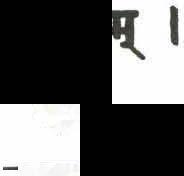
TRANSLATION
My dear wife, your teeth are very beautifully set, and your attractive features make you appear very thoughtful. Kindly give up your anger, be merciful upon me, and please smile upon me with loving attachment. When I see a smile on your beautiful face, and when I see your hair, which is as beautiful as the color blue, and see your raised nose and hear your sweet talk, you will become more beautiful to me and thus attract me and oblige me. You are my most respected mistress.
PURPORT
An effeminate husband, simply being attracted by the external beauty of his wife, tries to become her most obedientservant. Sripiida Sankariiciirya has therefore advised that we not become attracted by a lump of flesh and blood. The story is told that at one time a man, very much attracted to a beautiful woman, wooed the woman in such a way that she devised a plan to show him the ingredients of her beauty. The woman made a date to see him, and before seeing him she took a purgative, and that whole day and
1238 Srimad-Bhagavatam TEXT 23 9t ��p ' I ..WSBCWfeM�\1J<IU'i14 �: [Canto 4, Ch. 26 ��'4wt�Ptit(!tjttlfl�
II��II
night she simply passed stool, and she preserved that stool in a pot. The next night, when the man came to see her, she appeared very ugly and emaciated. When the man inquired from her about the woman with whom he had an engagement, she replied, "I am that very woman." The man refused to believe her, not knowing that she had lost all her beauty due to the violent purgative that caused her to pass stool day and night. When the man began to argue with her, the woman said that she was not looking beautiful because she was separated from the ingredients of her beauty. When the man asked how she could be so separated, the woman said, "Come on, and I will show you." She then showed him the pot filled with liquid stool and vomit. Thus the man became aware that a beautiful woman is simply a lump of matter composed of blood, stool, urine and similar other disgusting ingredients.This is the actual fact, but in a state of illusion, man becomes attracted by illusory beauty and becomes a victim of maya.
King Puraiijana begged his Queen to return to her original beauty. He tried to revive herjust as a living entity tries to revive his original conscious· ness, Kr�r;ta consciousness, which is very beautiful. All the beautiful features of the Queen could be compared to the beautiful features of Kr§l!la con· sciousness. When one returns to his original Kr�!la consciousness, he actually becomes steady, and his life becomes successful.
TEXT 24

�S;:tt=:4
tasmin dadhe damam aharh tava vtra-patni
yo 'nyatra bhusura-kultit krta-kilbifias tam
pasye na vita-bhayam unmuditam tri-lokytim
anyatra vai mura-ripor itaratra dtistit
tasmin-unto him; dadhe-shall give; damam-punishment; aham-I; tava-to you; vira-patni-0 wife of the hero; ya�-one who; anyatrabesides; bhu-sura-kultit-from the group of demigods on this earth, (the brtihmarws); krta-done; kilbi§a�- offense; tam- him; pasye -I see; na-not; vita-without; bhayam-fear; unmuditam-without anxiety; tri-lokyiimwithin the three worlds; anyatra-elsewhere; vai-certainly; mura-ripo�-of
Text 24] King Puraiijana Goes to the Forest to Hunt 1239
ij,.�� � � �
\tl&eRi61\Mttfti( I � Wf� f?tilflt-
� �cdNtR6('34� 11�\lll
the enemy of Mura (l<.r�J;ta); itaratra-on the other hand; dasat-than the servant.
TRANSLATION
0 hero's wife, kindly tell me if someone has offended you. I am prepared to give such a person punishment as long as he does not belong to the brahmap.a caste. But for the servant of Muraripu [Krwa], I excuse no one within or beyond these three worlds. No one can freely move after offending you, for I am prepared to punish him.
PURPORT
According to Vedic civilization, a briihmar_ta, or one who is properly qualified to understand the Absolute Truth-that is, one belonging to the most intelligent social order-as well as the devotee of Lord Kr�IJ.a, who is known as Muradvi�a, enemy of a demon named Mura, is not subject to the rules and regulations of the state. In other words, upon breaking the laws of the state, everyone can be punished by the government except the bnihma[las and Vai�J;tavas. Brahma[tas and Vai�J;tavas never transgress the laws of the state or the laws of nature because they know perfectly well the resultant reactions caused by suchlaw-breaking. Even though they may sometimes appear to violate the laws, they are not to be punished by the king. This instruction was given to King Pracinabarhi�at by Narada Muni. King Puranjana was a representative of King Pracinabarhi�at, and Narada Muni was reminding King Pracinabarhi�at of his forefather, Maharaja J>rthu, who never chastised a briihma[la or a Vai�J;tava.
One's pure intelligence, or pure Kr�l).a consciousness, becomes polluted by material activities. Pure consciousness can again be revived by the process of sacrifice, charity, pious activities, etc., but when one pollutes his l<f�p.a consciousness by offending a briihmalJa or a Vai�J;tava, it is very difficult to revive. Sri Caitanya Mahaprabhu has described the va�r;zavaapartidha, or offense to a Vai�J;tava, as "the mad elephant offense." One should be very careful not to offend a Vai�p.ava or a brahmal)a. Even the great yogi Durvasa was harassed by the Sudarsana cakra when he offended the Vai�J;tavaMaharaja Ambari{;a, who was neither a brahmalJa nor a sannyiisi but an ordinary householder. Maharaja Ambari�a was a Vai�p.ava, and consequently Durvasa Muni was chastised.
The conclusion is that if l<f�p.a consciousness is covered by material sins, one can eliminate the sins simply by chanting the Hare Kr�IJ.a mantra, but if one pollutes his Kr�IJ.a consciousness by offending a brahma[la or a Vai�p.ava, one cannot revive it until one properly atones for the sin by

1240 Srimad-Bhagavatam [Canto 4, Ch. 26
pleasing the offended Vai�p.ava or brahmar-a. This was the course that Durvasa Muni had to follow, for he surrendered unto Maharaja Ambari�a. A vai§r-ava-aparadha cannot be atoned for by any means other than by begging the pardon of the offended Vai�p.ava.

TEXT 25

vaktram na te vitilakam malinam vihar§am samrambha-bhimam avimr.s.tam apeta-riigam
pasye stanav api sucopahatau sujatau bimbadharam vigata-kunkuma-panka-riigam
vaktram-face; na-never; te-your; vitilakam-without being decorated; malinam-unclean; vihar§am-morose; sarhrambha-with anger; bhtmamdangerous; avimr§tam-without luster; ape ta- riigam-without affection; pasye-I have seen; stanau-your breasts; api-also; suca-upahatau-wet because of your tears; su-jiitau-so nice; bimba-adharam-red lips; vigatawithout; kunkuma-panka-saffron; ragam-color.

TRANSLATION
My dear wife, until this day I have never seen your face without tilaka decorations, nor have I seen you so morose and without luster or affection. Nor have I seen your two nice breasts wet with tears from your eyes. Nor have I ever before seen your lips, which are ordinarily as red as the bimba fruit, without their reddish hue.
PURPORT
Every woman looks very beautiful when decorated with tilaka and vermillion. A woman generally becomes very attractive when her lips are colored with reddish saffron or vermillion. But when one's consciousness and intelligence are without any brilliant thoughts about Kr�l).a, they become morose and lusterless, so much so that one cannot derive any benefit despite sharp intelligence.
Text 25] King Puranjana Goes to the Forest to Hunt 1241
m ;r �
� � ((19\I�N �*"q�6i � f?c•rd�l+iqt(l•rt( 11�'-\11
ARte� ilfe;t
I
� � � �ij¥41��··
N(l(�tff(ilfl�Ri\;J�� ����II
tan me prasida suhrda� krta-kilbi§asya
svairarh gatasya mrgayiirh vyasaniiturasya

kii devararh vasa-gatarh kusumiistra-vega
visrasta-paurhsnam usati na bhajeta krtye
tat-therefore;me-unto me; prastda- be kind; su-hrda�-intimatefriend; krta-kilbi§asya-having committedsinfulactivities; svairam- independently; gatasya-who went; mrgayiim-hunting; vyasana-iiturasya- being influenced by sinful desire; kii-what woman; devaram-the husband; vasa-gatamunder her control; kusumiistra-vega-pierced by the arrow of Cupid; visrasta-scattered; paurhsnam-his patience; usatt- very beautiful; nanever; bhajeta-would embrace; krtye - in proper duty.
TRANSLATION
My dear Queen, due to my sinful desires I went to the forest to hunt without asking you. Therefore I must admit that I have offended you. Nonetheless,thinking of me as your most intimate subordinate, you should still be very much pleased with me. Factually I am very much bereaved, but being pierced by the arrow of Cupid, I am feeling lusty. But where is the beautiful woman who would give up her lusty husband and refuse to unite with him?
PURPORT
Both man and woman desire one another; that is the basic principle of material existence. Women in general always keep themselves beautiful so that they can be attractive to theirlustyhusbands. Whenalustyhusband comes before his wife, the wife takes advantage of his aggressive activities and enjoys life. Generally when a woman is attacked by a man-whether her husband or some other man-she enjoys the attack, being too lusty. In other words, when one's intelligence is properly utilized, both the intellect and the intelli�ent person enjoy one another with great satisfaction. As stated in Srimad-Bhtigavatam: yan maithuniidi grhamedhi-
1242 Srimad-Bhagavatam
���=��
[Canto 4, Ch. 26
TEXT 26
�· . �����it���
sukharit hi tuccharit kar-f[uyanena karayor iva du{tkha-du{tkham (Bhiig. 7.9.45). The actual happiness of the karmis is sex life. They work very hard outside the home, and to satiate their hard labor, they come home to enjoy sex life. King Puraiijana went to the forest to hunt, and after his hard labor he returned home to enjoy sex life. If a man lives outside the home and spends a week in a city or somewhere else, at the end of the week he becomes very anxious to return home and enjoy sex with his wife. This is confirmed in Srimad-Bhtigavatam: yan maithuniidi grhamedhisukharit hi tuccham. Karmis work very hard simply to enjoy sex. Modern human society has improved the materialistic way of life simply by inducing unrestricted sex life in many different ways. This is most prominently visible in the Western world.
Thus end the Bhaktivedanta purports of the Fourth Canto, Twenty-sixth Chapter, of the Srimad-Bhii.gavatam, entitled "King Purafijana Goes to the Forest to Hunt, and His Queen Becomes Angry."

Text 26] King Puraiijana Goes to the Forest to Hunt 1243
CHAPTER TWENTY-SEVEN
AttackbyCaQ(javega
nilrada uviica itthani puraiijanani sadhryag vasamiiniya vibhramai� puraiijani mahii-riija
reme ramayatipatim
niirada� uviica-Nii.rada said;ittham-thus;puraiijanam-King Puraiijana; sadhryak-completely;va§amaniya- bringing under her control;vibhramai� -by her charms;puraiijani-the wife of King Puraiijana; mahii-raja-0 King; reme-enjoyed;ramayati-giving all satisfaction;patim-to her husband.

TRANSLATION
The great sage Narada continued: My dear King, after bewildering her husband in different ways and bringing him under her control, the wife of King Puranjana gave him all satisfaction and enjoyed sex life with him.
PURPORT
After hunting in the forest, King Puraiijana returned home, and after refreshing himself by taking a bath and eating nice food, he searched for his wife. When he saw her lying down on the ground without a bed, as if neglected, and devoid of any proper dress, he became very much aggrieved.
ontheCityofKingPurar(jana; theCharacterofKalakanya
l
� � �W.C4fd4414Ttr �: I �� qumr � � ��1�11
TEXT
'ifrrq �
1245
He then became attracted to her and began to enjoy her company. A living entity is similarly engaged in the material world in sinful activities. These sinful activities maybe compared to KingPuraiijana's hunting in theforest. A sinful life can be counteracted by various processes of religion such as yajiia, vrata and dana-that is, the performance of sacrifices, the taking of a vow for some religious ritual, and the giving of charity. In this way one may become free from the reactions of sinful life and at the same time awaken his original Kr�l).a consciousness. Bycoming home, taking his bath, eating nice foodstuffs, getting refreshed and searching out his wife, King Puraiijana came tohis good consciousness in his familylife. In otherwords, a systematic family life as enjoined in the Vedas is better than an irresponsible sinful life. If a husband and wife combine together in Kr�IJ.a consciousness and live together peacefully, that is very nice. However, if a husband becomes too much attracted by his wife and forgets his duty in life, the implications of materialistic life will again resume. Srila Riipa Gosvami has therefore recommended anasaktasya vi�ayan (Bh.r.s. 1.2.255). Without being attached by sex, the husband and wife may live together for the advancement of spiritual life. The husband should engage in devotional service, and the wife should be faithful and religious according to the Vedic injunctions. Such a combination is very good. However, if the husband becomes too much attracted to the wife due to sex, the position becomesverydangerous.Women ingeneral are verymuch sexuallyinclined. Indeed,itissaidthatawoman'ssex desireisninetimesstronger thanaman's. It istherefore aman's dutyto keep awomanunder hiscontrol by satisfying her, giving her ornaments, nice food and clothes, and engaging her in religious activities. Of course a woman should have a few children and in this way not be disturbing to the man. Unfortunately, if the man becomes attracted to thewoman simplyfor sexenjoyment,then familylife becomes abominable.
The great politician Cii.I).akya Pal).c;l.ita has said: bharya rupavati satrul].-a beautiful wife is an enemy. Of course every woman in the eyes of her husband is verybeautiful. Others may see her as not verybeautiful,but the husband, beingverymuch attracted toher,sees heralways as verybeautiful. If the husband sees the wife as very beautiful, it is to be assumed that he is too much attracted to her. This attraction is the attraction of sex. The whole world is captivated by the two modes of material nature rajo-gufJ.a and tamo-gufJ.a, passion and ignorance. Generally women are very much passionateandareless intelligent;therefore somehow orother aman should not be under the control of their passion and ignorance. However, by performing bhakti-yoga, or devotional service, a man can be raised to the

1246 Srimad-Bhagavatam [Canto 4, Ch. 27
platform of goodness. If a husband situated in the mode of goodness can control his wife, who is in passion and ignorance, the woman is benefited. Forgetting her natural inclination for passion and ignorance, the woman becomesobedientand faithful to her husband, who is situated ingoodness. Such a life becomes very welcome. The intelligence of the man and woman may then work very nicely together, and they can make a progressive march towards spiritual realization. Otherwise, the husband, coming under the control of the wife, sacrifices his quality of goodness and becomes subservient to the qualities of passion and ignorance. In this way the whole situation becomes polluted.
The conclusion is that a household life is better than a sinful life devoid of responsibility, but if in the household life the husband becomes subordinate to the wife, involvement in materialistic life again becomes prominent. In this way a man's material bondage becomes enhanced. Because of this, according to the Vedic system, after a certain age a man is recommended to abandon his family life for the stages of viinaprastha and sannyiisa.

sa riijii mahi�im riijan susniitiim ruciriinaniim krta-svasty-ayaniim trptiim abhyanandad upiigatiim
sal]-he; rajii- the King; mahi�im-the Queen; riijan-0 King; su-sniitiimnicely bathed; rucira-iinaniim-attractive face; k,rta-svasti-ayaniim-dressed with auspicious garments and ornaments; trptiim- satisfied; abhyanandathe welcomed; upiigatiim- approached.
TRANSLATION
The Queen took her bath and dressed herself nicely with all auspicious garments and ornaments. After taking food and becoming completely satisfied, she returned to the King. Upon seeing her beautifully decorated attractive face, the King welcomed her with all devotion.
Text 2] Attack by Cal}c;lavega on the City of Purarijana 1247
TEXT 2 6mt1lfrn Uar.{�\6f:q(IW1Wil'( I i6((4\fltf.lwti C[81'l+l1Wi��ql•l<:tl'( II � II
PURPORT
A woman is generally accustomed to dress herself nicely with fine garments and decorativeornaments. Shemayevensometimes wearflowers in her hair. Women especially dress themselves up in the eveningbecause the husband comes home in the evening after working hard all day. It is the duty of the wife to dress herself up very nicely so that when her husband returns home he becomes attracted by her dress and cleanliness and thus becomes satisfied. In other words, the wife is the inspiration of all good intelligence. Upon seeing one's wife dressed nicely, one can think very soberly about family business. When a person is too anxious about family affairs, he cannot discharge his family duties nicely. A wife is therefore supposed to be an inspiration and should keep the husband's intelligence in good order so that they can combinedly prosecute the affairs offamilylife without impediment. TEXT3
tayopagilqhal-J, parirabdha-kandharo raho 'numantrair apakr:�ta-cetanal-J, na kiila-rarhho bubudhe duratyayarh divii niseti pramadii-parigrahal-J,

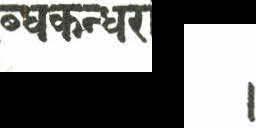

tayii-by the Queen; upagilqhal-J,-was embraced; parirabdha-embraced; kandharal-J,-shoulders; rahal-J,-in a solitary place; anumantrail-J,-by joking words; apakr�ta-cetanal;t- having degraded consciousness; na-not; kiilararhhal-J,- the passing of time; bubudhe-was aware of; duratyayamimpossible to overcome; divii- day; nisii-night;iti-thus; pramadii- by the woman; parigraha�-captivated.
Queen Puraiijani embraced the King, and the King also responded by embracing her shoulders. In this way, in a solitary place, they enjoyed

1248 Srimad-Bhagavatam [Canto 4, Ch. 27
��: ���qte�tr.�: i{ �te{� m � � � !llfi(NRII�:
�
II
II
TRANSLATION
joking words. Thus King Puraiijana became very much captivated by his beautiful wife and deviated from his good sense. He forgot that the passing of days and nights meant that his span of life was being reduced without profit.
PURPORT
The word pramada in this verse is very significant. A beautiful wife is certainly enlivening to her husband but at the same time is the cause of degradation. The word pramada means enlivening as well as maddening. Generally a householder does not take the passing of days and nights very seriously. A person in ignorance takes it as the usual course that days come, and, after the days, the nights come. This is the law of material nature. But a man in ignorance does not know that when the sun rises early in the morning it begins to take away the balance of his life. Thus day after day the span of one's life is reduced, and, forgetting the duty of human life, the foolish man simply remains in the company of his wife and enjoys her in a secluded place. Such a condition is called apakr§tacetana, or degraded consciousness. Human consciousness should be used for elevation to K��l)a consciousness. But when a person is too much attracted to his wife and family affairs, he does not take Kr�l)a consciousness very seriously. He thus becomes degraded, not knowing that he cannot buy back even a second of his life in return for millions of dollars. The greatest loss in life is passing time without understanding K��J)a. Every moment of our lives should be utilized properly, and the proper use of life is to increase devotional service to the Lord. Without devotional service to the Lord, the activities of life become simply a waste of time. Srama eva hi kevalam. Simply by becoming "dutiful" we do not make any profit in life. As confirmed in Srimad-Bhagavatam:
dharma(l svanu§thita� purhsiim vi§vaksena-kathasu ya/J. notpadayed yadi ratim srama eva hi kevalam

"Duties [dharma] executed by men, regardless of occupation, are only so much useless labor if they do not provoke attraction for the message of the Supreme Lord." (Bhag. 1.2.8)
If after performing one's occupational duty very perfectly, one does not make progress in Kr�l)a consciousness, it should be understood that he has simply wasted his time in valueless labor.
Text 3) Attack by Cal}�avega on the City of Puraiijana 1249
¥4iilt<tctq ¥lft1f'br.Jlq�: I
� cft'U � -rt ���Wf��=i{� II \111
sayiina unnaddha-mado mahii-manii mahiirha-talpe mahi�i-bhujopadhiq tiim eva viro manute param yatas tamo-'bhibhuto na nijam param ca yat

sayiinaq-lying down; unnaddha-madaq-increasingly illusioned; mahiimaniiq- advanced in consciousness; mahii-arha-talpe-on a valuable bedstead; mahi�i-of the Queen; bhuja- arms; upadhi�-pillow; tam-her; evacertainly; viraq- the hero; manute-he considered;param-the goal of life; yata�-from which; tama�-by ignorance; abhibhuta�- overwhelmed; nanot; nijam-his actual self; param-the Supreme Personality of Godhead; ca-and; yat-what.
TRANSLATION
In this way, increasingly overwhelmed by illusion, King Puraiijana, although advanced in consciousness, remained always lying down with his head on the pillow of his wife's arms. In this way he considered woman to be his ultimate life and soul. Becoming thus overwhelmed by the mode of ignorance, he could not understand the meaning of self-realization, of his self, or of the Supreme Personality of Godhead.
PURPORT
Human life is meant for self-realization. First of all one has to realize his own self, which is described in this verse as nijam. Then he has to understand or realize the Supersoul or Paramatma, the Supreme Personality of Godhead. However, when one becomes too much materially attached, he takes a woman to be everything. This is the basic principle of material attachment. In such a condition, one cannot realize his own self or the Supreme Personality of Godhead. In Srimad-Bhiigavatam it is therefore said: mahatseviim dviiram iihur vimuktes tamo-dviiram yo�itiim sarigi-sarigam (Bhiig. 5.5.2). If one associates with mahiitmiis, or devotees, his path of liberation
1250 Srimad-Bhagavatam [Canto4, Ch. 27
TEXT4 � i34t(¥((t ¥4iil'lwtl
is opened. But if one becomes too much attached to women or to persons who are also attached to women-that is, attached to women directly or indirectly-he opens the tamo-dviiram, the door to the darkest region of hellish life.
King Puraiijana was a great soul, highly intellectual and possessed of advancedconsciousness,but due to his beingtoo much addicted to women, his whole consciousness was covered. In the modern age the consciousness of people is too much covered by wine, women and flesh. Consequently people are completely unable to make any progress in self-realization. The first step of self-realization is to know oneself as spirit soul apart from the body. In the second stage of self-realization one comes to know that every soul, every individual living entity, is part and parcel of the Supreme Soul, Paramiitma, or the Supreme Personality of Godhead. This is confirmed in Bhagavad-gitii:
mamaiviirnso jiva-loke jiva-bhiital]. saniitanal]. mana!]. �a§thiinindriyii1Ji prakrti-sthiini kar�ati

"The living entities in this conditioned world are My eternal, fragmental parts. Due to conditioned life, they are struggling very hard with the six senses, which include the mind." (Bg. 15.7)
All living entities are partand parcelofthe Supreme Lord. Unfortunately in this present civilizationboth men andwomen are allowed tobe attracted to one another from the very beginning of life, and because of this theyare completely unable to come to the platform of self-realization.They do not know thatwithout self-realization theysufferthe greatestlossinthehuman form of life. Thinking of a woman always within one's heart is tantamount to lying down with a woman on a valuable bedstead. The heart is the bedstead, and it is the most valuable bedstead. When a man thinks of women and money, he lies down and rests on the arms of his beloved woman or wife. In this way he overindulges in sex life and thus becomes unfit for self-realization.
Text 5] Attack by Car;uj.avega on the City of Purarijana 1251
TEXTS � ��:UOI� llhl'l*Mii��(l�H I t)UII�fitq��Mrtii;dwR �: II � II
ramamii�]asya kiima-kasmala-cetasal].
tayaivani
Srimad-Bhagavatam
k�al}iirdham iva riijendra
tayii-with her; evam-in this way; ramamii�Jasya-enjoying; kama-full of lust; kasmala-sinful; cetasa�-his heart; k.sa�Ja-ardham-in half a moment; iva-like; riija-indra-0 King; vyatikriintam-expired; navamnew; vaya�-life.
TRANSLATION
My dear King Pracinabarhi�at, in this way King Puraiijana, with his heart full of lust and sinful reactions, began to enjoy sex with his wife, and in this way his new life and youth expired in half a moment.
PURPORT
SrTia Govinda dasa Thakura has sung:


e-dhana, yauvana, putra, parijana, ithe ki ache parattti re kamala-dala-jala, jivana .talamala, bhaja hun hari-pada niti re
In this verse Srila Govinda dasa actually says that there is no bliss in the enjoyment of youthful life. In youth a person becomes very lusty to enjoy all kinds of sense objects. The sense objects are form, taste, smell, touch and sound. The modern scientific method, or advancement of scientific civilization, encourages the enjoyment of these five senses. The younger generation is very pleased to see a beautiful form, to hear radio messages of material news and sense gratificatorysongs, to smell nice scents, nice flowers, and to touch the soft body or breasts of a young woman and gradually touch the sex organs. All of this is also very pleasing to the animals; therefore in human society there are restrictions in the enjoyment of the five sense objects. If one does not follow, he becomes exactly like an animal.
Thus in this verse it is specifically stated, kiima-kaimala-cetasal],: the consciousness of King Puraiijana was polluted by lusty desires and sinful activities. In the previous verse it is stated that Puraiijana, although advanced in consciousness, lay down on a very soft bed with his wife. This indicates that he indulged too much in sex. The words navam vayal], are also significant in this verse. They indicate the period of youth from age sixteen to thirty. These thirteen or fifteen years of life are years in which one can very strongly enjoy the senses. When one comes to this age he

1252
4, Ch. 27
vyatikriintam navam vayal], [Canto
thinks that life will go on and that he will simply continue enjoying his senses, but "time and tide wait for no man." The span of youth expires veryquickly.Onewhowastes his life simply by committing sinful activities in youth immediately becomes disappointed and disillusioned when the brief period of youth is over. The material enjoyments of youth are especially pleasing to a person who has no spiritual training. If one is trained only according to the bodily conception of life, he simply leads a disappointed life because bodily sense enjoyment finishes within forty years or so. After forty years, one simply leads a disillusioned life because he has no spiritual knowledge. For such a person, the expiration of youth occurs in half a moment.Thus King Puraiijana's pleasure, which he took in lying down with his wife, expired very quickly.
Kiima-kasmala-cetasah also indicatesthatunrestricted sense enjoyment is not allowed in the human form of life by the laws of nature. If one enjoys his senses unrestrictedly, he leads a sinful life. The animals do not violate the laws of nature. For example, the sex impulse in animals is very strong during certain months of the year. The lion is very powerful. He is a flesheater and is very strong, but he enjoys sex only once in a year. Similarly, according to religious injunctions a man is restricted to enjoy sex only once in a month, after the menstrual period of the wife, and if the wife is pregnant,he is not allowed sex life at all.That is the law for human beings. A man is allowed to keep more than one wife because he cannot enjoy sex when the wife is pregnant. If he wants to enjoy sex at such a time, he may go to another wife who is not pregnant. These are laws mentioned in the Manu-samhitii and other scriptures.
These laws and scriptures are meant for human beings. As such, if one violates these laws, he becomes sinful. The conclusion is that unrestricted sense enjoyment means sinful activities. Illicit sex is sex that violates the laws given in the scriptures. When one violates the laws of the scriptures, or the Vedas, he commits sinful activities. One who is engaged in sinful activities cannot change his consciousness. Our real function is to change ourconsciousnessfrom kasmala, sinfulconsciousness, toKr!?qa, thesupreme pure, as confirmed in Bhagavad-gitii: param brahma param dhiima pavitram paramam bhavan: "You are the Supreme Brahman, the ultimate, the supreme abode and purifier." (Bg. 10 .12)
Kr!?Qa is the supreme pure, and if we change our consciousness from material enjoyment to Kr&qa, we become purified. This is the process recommended by Lord Caitanya Mahiiprabhu as the process of cetodarpa'}a-miirjanam, cleansing the mirror of the heart.

Text 5] Attack by Ca1,1�avega on the City of Purarijana 1253
TEXT 6



6�1'151'1���1-t���t �: I ���
No�mrfts�•��·n( 11 � 11
tasyiim ajanayat putriin puranjanyiim puranjana� satiiny ekiidasa viriiq iiyu�o 'rdham athatyagiit
tasyiim-within her; ajanayat-he begot;putriin-sons; puranjanyiim-in Puraiijani; puranjana�- King Puraiijana; satiini- hundreds; ekiidasa- eleven; viriit-0 King; iiyu�a�-of life; ardham-half; atha-in this way; at yagat-he passed.
TRANSLATION
Thegreatsage Naradathen addressed King Pracinabarhi�at: 0 one whose life span is great [virat], in this way King Puraiijana begot 1,100 sons withinthe womb of his wife Puraiijani. However, in this business he passed away half ofhis life span.
PURPORT
In this verse there are several significant words, the first of which is ekiidasa satiini. Puraiijana had begotten 1,100 sons within the womb of his wife, and thus passed away half of his life. Actually every man follows a similar process. If one lives for one hundred years at the utmost, in his family life he simply begets children up to the age of fifty. Unfortunately at the present moment people do not live evena hundred years; nonetheless they beget children up to the age of sixty. Another point is that formerly people used to beget one hundred to two hundred sons and daughters. As will be evident from the next verse, King Puraiijana not only begot 1,100 sons but also llO daughters. At the present moment no one can produce such huge quantities of children. Instead, mankind is very busy checking the increase of population by contraceptive methods.
We do not find in Vedic literatures that they ever used contraceptive methods, although they were begetting hundreds of children. Checking population by a contraceptivemethodis another sinful activity, butin this age of Kali people have become so sinful that they do not care for the resultant reactions of their sinful lives. King Puraiijana lay down with his
1254 Srimad-Bhagavatam [Canto 4, Ch. 27
wife Puraiijani and begot a large number of children, and there is no mention in these verses that he used contraceptive methods. According to the Vedic scriptures the contraceptive method should be restraint in sex life. It is not that one should indulge in unrestricted sex life and avoid children by using some method to check pregnancy. If a man is in good consciousness, he consults with his religious wife, and as a result of this consultation, with intelligence, one advances in his ability to estimate the value of life. In other words, if one is fortunate enough to have a good conscientious wife, he can decide by mutual consultation that human life is meant for advancing in Kr�l).a consciousness and not forbegetting a large number of children. Children are called parirJiima, or by-products, and when one consults his good intelligence he can see that his by-products should be the expansion of his Kr�l).a consciousness.

TEXT 7

duhitfr dasottara-satam pitr-miitr-yasaskaril]. Silaudiirya-gurJOpetal]. pauranjanyal), prajii-pate
duhitfl].- daughters; dasa-uttara-ten more than; satam-one hundred; p it r-like the father; miitr- and mother; yasaskartl].- glorified ; Stla-good behavior; audarya- magnanimity; guf!a-good qualities; upetiil].- possessed of; pauranjanyal].-daughters of Puraii.jana; prajii-pate-0 Prajapati.
TRANSLATION
0 Prajapati, King Pracinabarhi�at, in this way King Puraiijana also begot no daughters. All of these were equally glorified like the father and mother. Their behavior was gentle, and they possessed magnanimity and other good qualities.

PURPORT
Children begotten under the rules and regulations of the scriptures generally become as good as the father and mother, but children born
Text 7) Attackby Car;u}.avega onthe City ofPuranjana 1255
fqt¥i'V4��:
1 ��1�,¢gunq�n: m;:q: �m u \911
illegitimately mainly become var"fla-sarikara. The var'la-sarikara population is irresponsibleto thefamily, community and even to themselves. Formerly the var"fla-sarikara population was checked by the observation of the reformatory method called garbhiidhiina-samskiira, a child-begetting religious ceremony. In this verse we find that although King Puranjana had begotten so many children, they were not var"fla-sarikara. All of them were good, well-behaved children, and they had good qualities like their father and mother.
Even though we may produce many good children, our desire for sex that is beyond the prescribed method is to be considered sinful. Too much enjoyment of any of the senses (not only sex) results in sinful activities. Therefore one has to become a sviimi or a gosviimi at the end of his life. One may beget children up to the age of fifty, but after fifty, one must stop begetting children and should accept the viinaprastha order. In this way he must leave home and then become a sannyiisi. A sannyiisi's title is sviimi or gosviimi, which means that he completely refrains from sense enjoyment. One should not accept the sannyiisa order whimsically; he must be fully confident that he can restrain his desires for sense gratification. King Puraiijana's family life was, of course, very happy. As mentioned in these verses, he begot 1,100 sons and 110 daughters. Everyone desires to have more sons than daughters, and since the number of daughters was less than the number of sons, it appearsthat King Puraiijana's family life was very comfortable and pleasing.
TEXTS
� �ilh?NM: �Tif. f'ffl:�fi44�otti{ I
ctit: 6�WU+tltt ��: ��: II (; II
sa panciila-patil]. putriin pitr-vamsa-vivardhaniin diirail]. samyojayiim iisa duhittl]. sadrsair varail].
sa�-he; pancala-pat*-King of Pancala; putriin- sons; pitr-vamsapaternal family; vivardhaniin-increasing; diiro*-with wives; samyojayam iisa- married; duhit[�- daughters; sadrsa*- qualified; varai�- with husbands.

1256 Srimad-Bhagavatam [Canto 4, Ch. 27
After this, King Puranjana, King of the Panciila country, in order to increase the descendants of his paternal family, married his sons with qualified wives and married his daughters with qualified husbands.
PURPORT
According to the Vedic system, everyone should marry.One has to accept a wife because a wife will produce children, and the children in their turn will offer foodstuffs and funeral ceremonies so that the forefathers, wherever they may live, will be made happy. The offering of oblations inthe name of Lord Vi�I).U is calledpi�qodaka, and it is necessary that the descendants of a family offer pir;trJa to the forefathers.
Not only was Puranjana, the King of Paii.ciila, satisfied in his own sex life, but he arranged for the sex life of his 1,100 sons and llO daughters. In this way one can elevate an aristocratic family to the platform of a dynasty. It is significant in this verse that Puraiijana got both sons and daughters married. It is the duty of a father and mother to arrange for the marriage of their sons and daughters. That is the obligation in Vedic society. Sons and daughters should not be allowed freedom to intermingle with the opposite sex unless they are married. This Vedic social organization is very good in that it stops the promulgation of illicit sex life, or var�a-sa�ikara, which appears under different names in this present day. Unfortunately in this age although the father and mother are anxious to get their children married, the children refuse to get married by the arrangement of the parents. Consequently the number of var�a-salikara has increased throughout the world under different names.
TEXT9
putrii�iim ciibhavan putrii ekaikasya satam satam yair vai pauraiijano vamsa� paiiciile�u samedhital],

Text 9] Attack by Ca94avega on the City of Purarijana 1257
TRANSLATION
� �HN(�II("� �6 �I � t(t(§t;i1 �: q� eil�: II � II
putriiT]Jim-of the sons;ca-also;abhavan-were produced;putra�-sons; eka-ekasya-of each one;satam-hundred;satam-hundred;yai�-by whom; vai-certainly; pauralijana�-of King Puraiijana; vanisa�-family; paliciile�u -in the land of Paiicala; samedhita�-greatly increased.

TRANSLATION
Ofthese manysons, each produced hundreds and hundreds of grandsons. In this way the whole city of Paiicala became overcrowded by these sons and grandsons of King Puraiijana.
PURPORT
We must remember that Puraiijana is the living entity, and the city Paiicala is the body. The body is the field of activity for the living entity, as stated in Bhagavad-gitii: k�etra-k�etrajlia (Bg. 13.27). There are two constituents: one is the living entity (k�etra-jlia), and the other is thebody of the living entity (k�etra). Any living entity can know that he is covered by the body if he only contemplates the body a little bit. Just with a little contemplation he can come to understand that the body is his possession. One can understand this by practical experience and by the authority of the siistras. In Bhagavad-gitii it is said: dehino 'smin yathii dehe (Bg. 2.13). The proprietorof the body, the soul, is within the body. The body is taken as the paliciila-desa, or the field of activities wherein the living entity can enjoy the senses in their relationship to the five sense objects-namely, gandha, rasa, riipa, sparsa and sabda-that is, sense objects made out of earth, water, fire, air and sky. Within this material world covered by the material body of subtle and gross matter, every living entity creates actions and reactions, which are herein known allegorically as sons and grandsons. There are two kinds of actions and reactions-namely, pious and impious. In this way our materialexistence becomes coated by different actions and reactions. In this regard, Srila Narottama dasa Thakura states:
karma-kiif!cJa, jiiiina-kiif!cJa, kevala vi�era bhiif!qa, amr:ta baliyii yebii khiiya
niinii yoni sadii phire, kadarya bhak�af!a kare, tiira janma adhal}-piite yiiya
"Fruitive activities and mental speculation are simply cups of poison. Whoever drinks of them, thinking them to be nectar, must struggle very hard life after life, in different types of bodies. Such a person eats all kinds
1258 Srimad-Bhagavatam [Canto 4, Ch_ 27
of nonsense and becomes condemned by his activities of so-called sense enjoyment."
Thus the field of action and reactions, by which one's descendants are increased, begins with sex life. Puraiijana increased his whole family by begetting sons who in their turn begot grandsons. Thus the living entity, being inclined toward sexual gratification, becomes involved in many hundreds and thousands of actions and reactions. In this way he remains within the material world simply for the purpose of sense gratification and transmigrates from one body to another. His process of reproducing so manysons andgrandsons results inso-called societies, nations, communities and so on. All these communities, societies, dynasties and nations simply expand from sex life. As stated by Prahliida Maharaja: yan maithuniidi gr:hamedhi-sukharh hi tuccham (Bhiig. 7.9.45). A gr:hamedhi is one who wants to remain within this material existence. This means that he wants to remain within this body or society and enjoy friendship, love and community. His only enjoyment is in increasing the number of sex enjoyers. He enjoys sex and produces children, who in their turn marry and produce grandchildren. The grandchildren also marry and in their turn produce great-grandchildren. In this way the entire earth becomes overpopulated,and thensuddenly there are reactionsprovoked by material nature in the form of war, famine, pestilence and earthquakes, etc. Thus the entire population is again extinguished simply to be recreated. This process is explained in Bhagavad-gitii:

bhuta-griimal]. sa eviiyarh bhutvii bhiitvii praliyate riitry-iigame 'vasal]. piirtha prabhavaty ahar-iigame


"Againandagainthe day comes, and this host ofbeings is active, and again the night falls, 0 Pii.rtha, and they are helplessly dissolved." (Bg. 8.19)
Due to a lack of Kp�I).a consciousness, all this creation and annihilation is going on under the name of human civilization. This cycle continues due to man's lack of knowledge of the soul and the Supreme Personality of Godhead.
Text 10] Attack by Cal}«}.avega on the City of Purarijana 1259
TEXT 10 " ij�(l�! � •Jffiil\na�! 1 f€4tAcq;q"WRf II � o II
Srimad-Bhagavatam
te�u tad-riktha-hiire�u gr:ha-kosiinujivi�u niriit}hena mamatvena vi�aye�v anvabadhyata
te�u-to them; tat-riktha-hare�u-the plunderers of his money; grhahome; kosa-treasury; anujiv4 u-to the followers; nirut}he na-deep -rooted; mamatvena-by attachment; v4aye�u-to sense objects; anvabadhyatabecame bound.


TRANSLATION
These sons and grandsons were virtually plunderers of King Puraiijana's riches, including his home, treasury, servants, secretaries and all other paraphernalia. Puraiijana's attachment for these things was very deeprooted.

PURPORT
In this verse the word riktha-hiire�u, meaning plunderers of wealth, is very significant. One'ssons, grandsons and other descendants are ultimately plunderers of one's accumulated wealth. There are many celebrated businessmen and industrialists who produce great wealth and are highly praised by the public, but all their money is ultimately plundered by their sons and grandsons. In India we have actually seen one industrialist, who, like King Purailj ana, was very much sexually inclined and had a half dozen wives. Each of these wives had a separate establishment that necessitated the expenditure of several thousands of rupees. When I was engaged in talking with him, I saw that he was very busy trying to secure money so that all his sons and daughters would get at least 500,000 rupees each. Thus such industrialists, businessmen or karmis are called mu<J.has in the siistras. They work very hard, accumulate money, and are satisfied to see that this money is plundered by their sons and grandsons. Such people do not want to return their wealth to its actual owner. As stated in Bhagavad-gitii:
bhoktiiram yajiia-tapasiim
sarva-loka-mahesvaram
suhrdam
sarva-bhatiiniim
jiiiitvii miim siintim rcchati
"The sages, knowing Me as the ultimate purpose of all sacrifices and austerities, the Supreme Lord of all planets and demigods and the benefactor and well-wisher of all living entities, attain peace from the pangs of material miseries." (Bg. 5.29)
1260
[Canto 4, Ch. 27
The real proprietor of all wealth is the Supreme Personality of Godhead. He is the actual enjoyer. So-called earners of money are those who simply know tricks by which they can take away God's money under the guise of business and industry. After accumulating this money, they enjoy seeing it plundered by their sons and grandsons. This is the materialistic wayoflife.Inmaterialistic life one is encaged within the body and deluded by false egoism. Thus one thinks, "I am this body. I am a human being. I am an American. I am an Indian." This bodily conception is due to false ego. Being deluded by false ego, one identifies himself with a certain family,nationor community.In this way one's attachment for the material world grows deeper and deeper. Thus it becomes very difficult for the living entity to extricate himself from his entanglement. Such people are graphically described in theSixteenth Chapterof Bhagavad-gWi in this way:
idam adya mayii labdham

imam priipsye manoratham idam astidam api me bhavi�yati punar
asau mayii hata� satrur hani�ye ciipariin api iSvaro 'ham aham bhogi
siddho 'ham balaviin sukht
iiflhyo 'bhijanavan asmi ko 'nyo 'sti sadrso mayii yak�ye diisyiimi mod�ya ity ajliiina-vimohitiil;t
"The demoniac person thinks: 'So much wealth do I have today, and I will gain more according to my schemes. So much is mine now, and it will increase in the future, more and more. He is my enemy, and I have killed him; and my other enemy will also be killed. I am the lord of everything, I am the enjoyer, I am perfect, powerful and happy. I am the richest man, surrounded by aristocratic relatives.There is none so powerful and happy as I am. I shall perform sacrifices, I shall give some charity, and thus I shall rejoice.' In this way, such persons are deluded by ignorance." (Bg. 16.13-15)
In this way people engage in various laborious activities, and their attachment for body, home, family, nation and community becomes more and more deep-rooted.
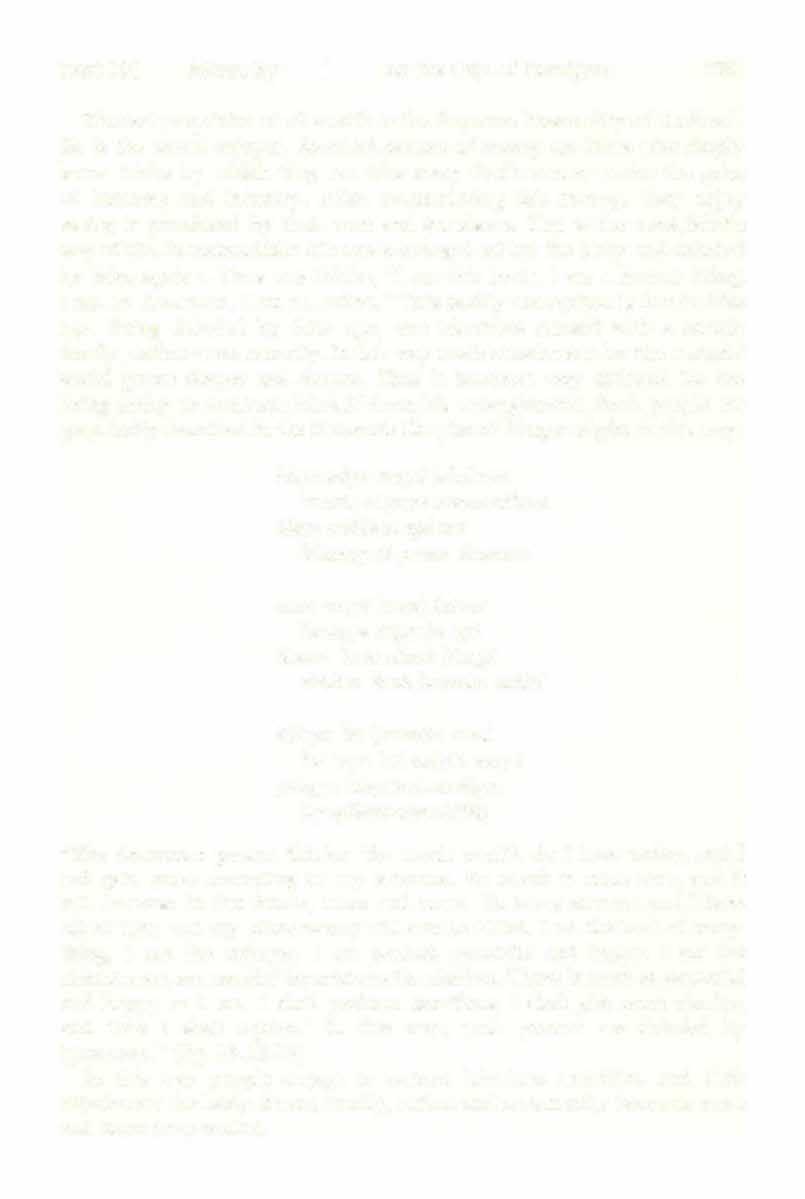
Text 10] Attack by Car,u;J.avega on the City of Purarijana 1261
dhanam
TEXT 11

� � iti«f��: q;gql(�:I
�f���q�'ltlwtl41illtm�ll��II
ije ca kratubhir ghorair dik�ita� pasu-miirakai�
deviin pitfn bhiita-patin
niinii-kiimo yathii bhaviin
ije- he worshiped; ca-also; kratubhi�-by sacrifices; ghorai�-ghastly ; dik�ita�-inspired;pasu-miirakai�-whereinpooranimalsarekilled; deviinthe demigods; pitfn- forefathers; bhUta-patin-great leaders of thehuman society;niinii-various;kiima�-having desires; yathii- like; bhaviin- you.
TRANSLATION
The great sage Narada continued: My dear King Pracinabarhi�at, like you King Puraiijana also became implicated in so many desires. Thus he worshiped demigods, forefathers and social leaders with various sacrifices, which were all very ghastly because they were inspired by the desire to kill animals.
PURPORT
In this verse the great sage Narada discloses that the character of Puraiijana was being described to give lessons to King Priicinabarhi�at. Actually the entire descriptionwasfigurativelydescribingtheactivitiesof King PriicinabarhiliJat. In this verse Niirada frankly says "like you" (yathii bhaviin ), which indicates that King Puraiijana is none other than King Priicinabarhi�at himself. Being a great Vai�l}ava, Niirada Muni wanted to stop animal killing in sacrifices. He knew that if he tried to stop the King from performing sacrifices, the Kingwouldnot hear him. Therefore he is describing the life of Purafijana. But in this verse he first discloses the intention, although not fully, by saying "like you." Generally the karmis, who are attached to increasing descendants, have to perform so many sacrifices and worship so many demigods for future generations, as well as to satisfy so many leaders, politicians, philosophers and scientists to make things go on properly for future generations. The so-called scientists are very eager to see that future generations will live very comfortably, and assuchtheyaretryingtofind
1262 Srimad-Bhagavatam [Canto 4, Ch. 27
�
different means of generating energy to drive locomotives, cars, airplanes and so on. Now they are exhausting the petroleum supply. These activities are described in the Bhagavad-gitii.
vyavasiiyiitmikii buddhir
ekeha kuru-nandana
bahu-siikhii hy anantiis ca buddhayo 'vyavasayiniim
"Those who are on this path are resolute in purpose, and their aim is one. 0 beloved child of the Kurus, the intelligence of those who are irresolute is many-branched." (Bg. 2.41)
Actually those who are in knowledge of everything are determined to execute K:r�r:ta consciousness, but those who are rascals (muqhii�), sinners (du.skrtina�) and the lowest of mankind (nariidhamii� ), who are bereft of all intelligence (miiyayiipah,rta-jniinii�) and who take shelter of the demoniac way of life (iisuram bhiivam iisritiil},), are disinterested in Kt�r:ta consciousness. As such they become implicated and take on so many activities. Most of these activities center around the killing of animals. Modern civilization is centered around animal killing. Karmis are advertising that without eating meat, their vitamin value or vitality will be reduced; so to keep oneself fit to work hard, one must eat meat, and to digest meat, one must drink liquor, and to keep the balance of drinking wine and eating meat, one must have sufficient sexual intercourse to keep fit to work very hard tike an ass.
There are two ways of animal killing. One way is in the name of religious sacrifices. All the religions of the world-except the Buddhistshave a program for killing animals in places of worship. According to Vedic civilization, the animal-eaters are recommended to sacrifice a goat in the temple of goddess Kiili under certain restrictive rules and regulations and eat the flesh. Similarly, they are recommended to drink wine by worshiping the goddess Ca�;u;lika. The purpose is restriction. People have given up all this restriction. Now they are regularly opening wine distilleries and slaughterhouses and indulging in drinking alcohol and eating flesh. A Vai�l).ava iiciirya like Narada Muni knows very well that persons engaged in such animal killing in the name of religion are certainly becoming involved in the cycle of birth and death, forgetting the real aim of life: to go home, back to Godhead.
Thus the great sage Narada, while instructing Srimad-Bhiigavatam to Vyasa Muni, condemned the karma-kiir:uJa (fruitive) activities mentioned in the Vedas. Narada told Vyasa:

Text ll] Attack by Cat}-4avega on the City of Purarijana 1263
jugupsitam dharma-kr:te 'nusiisata�
sva-bhiiva-raktasya mahiin vyatikrama�
yad-viikyato dharma ititara� sthito na manyate tasya niviiraT}am jana�

"The people in general are naturally inclined to enjoy, and you have encouraged them in that way in the name of religion. This is verily condemned and is quite unreasonable. Because they are guided under your instructions, they will accept such activities in the name of religion and will hardly care for prohibitions." (Bhiig. 1.5.15)

Srila Narada Muni chastised Vyasadeva for compiling so many Vedic supplementary scriptures, which are all intended for guiding the peoplein general. Narada Muni condemned these scriptures because they do not mention direct devotional service. Under Niirada's instructions, direct worship of the Supreme Personality of Godhead, as described in the Srimad-Bhiigavatam, was set forth by Vyasadeva. The conclusion is that neither the Supreme Personality of Godhead Vi�QU nor His devotee ever sanctions animal killing in the name of religion. Indeed, Kt�qa incarnated Himself as Lord Buddha to put an end to animal killing in the name of religion. Animal sacrifice under the name of religion is conducted by the influence of tamo-guiJa (the mode of ignorance), as indicated in the Eighteenth Chapter of Bhagavad-gitii.
yayii dharmam adharmam ca kiiryam ciikiiryam eva ca ayathiivat prajiiniiti
buddh* sii piirtha riijasi
adharmam dharmam iti yii manyate tamasiivrtii sarviirthiin viparitiims ca buddh* sii piirtha tiimasi
"And that understanding which cannot distinguish between the religious way of life and the irreligious, between action that should be done and action that should not be done-that imperfect understanding, 0 son of Pttha, is in the mode of passion. That understanding which considers irreligion to be religion and religion to be irreligion, under the spell of illusion and darkness, and strives always in the wrong direction, 0 Partha, is in the mode of ignorance." (Bg. 18.31-32)
1264 Srimad-Bhagavatam [Canto 4, Ch. 27
Those who are involved in the modeof ignorance manufacture religious systems for killing animals. Actually dharma is transcendental. As Lord Sri Kr�J).a teaches,wemust give up all other systems ofreligionand simply surrender unto Him (sarva-dharmiin parityajya). Thus the Lord and His devotees and representatives teach thetranscendental dharma, whichdoes not allow animal killing at all. At the present moment it is the greatest misfortune that in India many so-called missionary workers are spreading irreligion in the name of religion. They claim an ordinary human being to be God and recommend meat-eating for everyone, including so-called sannyiisis.
TEXT
yukte�v evani pramattasya kutumbiisakta-cetasal), iisasiida sa vai kiilo yo 'priyal), priya-yo�itam
yukte�u-to beneficial activities; evam-thu s; pramattasya-being inattentive; kutumba- to kith and kin; asakta-attached; cetasa�-consciousness; asasada-arrived; sa[l-that; vai-certainly; kala[l - time; ya[lwhich; apriya[l-not very pleasing; priya-yo�itam-for persons attached to women.
TRANSLATION
Thus King Puraiijana, being attached to fruitive activities [karmakfu,lcJiyaJ as well as kith and kin, and being obsessed with polluted consciousness, eventually arrived at that point not very much liked by those who are overly attached to material things.
PURPORT
In this verse the words priya-yo�itiim and apriyal), are very significant. The word yo�it means woman, and priya means dear or pleasing. Death is not very much welcome for those who are too much attached to material enjoyment, which culminates in sex. There is an instructive story in this connection. Once when a saintlyperson was passing on his way, he met a prince, the son of a king, and he blessed him, saying, "My dear

Text 12] Attack by Cal}cJavega on the City of Purarijana 1265
!f� tii.,..itt'ffi���u 1
12 ��4
31�����S�*'I:fil*'l�f't�i'(ll����
prince, may you live forever." The sage next met a saintly person, and he said to him, "You may either live or die." Eventually the sage met a brahmaciin devotee, and he blessed him, saying, "My dear devotee, you may die immediately." Finally the sage met a hunter, and he blessed him, saying, "Neither live nor die." The point is that those who are very sensual and are engaged in sense gratification do not wish to die. Generally a prince has enough money to enjoy his senses; therefore the great sage said that he should live forever, for as long as he lived he could enjoy life, but after his death he would go to hell. Since the brahmaciiri devotee was leading a life of severe austerities and penances in order to be promoted back to Godhead, the sage said that he should die immediately so that he need not continue to labor hard and could instead go back home, back to Godhead. A saintly person may either live or die, for during his life he is engaged in serving the Lord, and after his death he also serves the Lord. Thus this life and the next are the same for a saintly devotee, for in both he serves the Lord. Since the hunter lives a very ghastly life due to killing animals, and since he will go to hell when he dies, he is advised to neither live nor die.





King Puraiijana finally arrived at the point of old age. In old age the senses lose their strength, and although an old man desires to enjoy his senses and especially sex life, he is very miserable because his instruments of enjoyment no longer function. Such sensualists are never prepared for death.They simply want to live on and on and extend their life by so-called scientific advancement. Some foolish Russian scientists also claim that they are going to make man immortal through scientific advancement. Under the leadership of such crazy fellows, civilization is going on. Cruel death, however, comes and takes all of them away despite their desire to live forever. This type of mentality was exhibited by Hirat;�yakasipu, but when the time was ripe, the Lord personally killed him within a second.

1266 Srimad-Bhagavatam [Canto 4, Ch. 27
TEXT 13 lii4%�·· � � I � �: tte��(fdijst�¥(������ carJqa-vega iti khyiito gandharvadhipatir nrpa gandharviis tasya balinal], �a�ty-uttara-sata-trayam
calJ-cJ.a-ve ga�- Cai).c)avega; iti-thus; khyiita�-celebrated; gandharvabelongingtotheGandharvaloka;adhipati�-king;nr:pa-0 King;gandharvii� -other Gandharvas; tasya- his; balina�-very powerful soldiers; ,5a�tisixty; utta ra- surpassing; s'ata- hundred; t rayam-three.
TRANSLATION
0 King! In Gandharvaloka there is a king named Cat;tc)avega. Under him there are 360 very powerful Gandharva soldiers.
PURPORT

Time is figuratively described here as Cat;tQ.avega. Since time and tide wait for no man, time is herein called Cat;tQ.avega, which means "very swiftly passing away." As time passes, it is calculated in terms of years. One year contains 360 days, and the soldiers of CaJ)Q.avega herein mentionedrepresentthesedays.Timepassesswiftly;Cat;tQ.avega'spowerful soldiers of Gandharvaloka very swiftly carry awayallthedaysofour life. AB the sun rises and sets, it snatches away the balance of our life span. Thus as each day passes, each one of uslosessomeoflife'sduration.It is therefore said that the duration of one's life cannot be saved. But if one is engaged in devotional service, his time cannot be taken away by the sun. As stated in Snmad-Bhiigavatam: iiyur harati vai pumsiim udyann astam ca yann asau (Bhiig. 2.3.17). The conclusionisthat if one wants to make himself immortal, he shouldgiveupsensegratification.Byengaging oneself in devotional service, one can gradually enter into the eternal kingdom of God.
Mirages and other illusory things are sometimes calledGandharvas.Our losing our life span is taken as advancement of age. This imperceptible passing away of the days of life is figuratively referred to in this verse as Gandharvas. As explained in later verses, such Gandharvas are both male and female. This indicates that both men and women lose their life span imperceptiblyby theforce of time,which is herein describedasCaJ)Q.avega.
Text 14) Attack by Cal}4avega on the City of Purarijana 1267
TEXT 14 �-4�.,����m�: 1 qR'rtl�(tt.I¥4NPtf4<11¥{ II� \?II gandharvyas tiidr:sir asya maithunyas ca sitiisitii�
pariVT:ttyii vilumpanti

gandharvya�-Gandharvis; tiidrsi�-similarly; asya-of Cal}qavega; maith unya�-companions for sexual intercourse; ca-also; sita-white ; asitii�-black; parivrttyii-by surrounding; vilumpanti-they plundered; sarva-kiima-all kinds of desirable objects; vinirmitiim-manufactured.
TRANSLATION
Along with Cal}.�avega were as many female Gandharv'is as there were soldiers, and all of them repetitively plundered all the paraphernalia for sense enjoyment.
PURPORT

The days have been compared to the soldiers of Car:t<;lavega. Night is generally a time for sex enjoyment. Days are considered to be white, and nights are considered to be black, or, from another point of view, there are two kinds of nights-black nights and white nights. All these days and nights combine to pass away our span of life and everything we manufacture for sense gratification. Material activity means manufacturing things for sense gratification. Scientists are conducting research to find out how we can satisfy our senses more and more elaborately. In this Kali-yuga, the demoniac mentality is employed in manufacturing various machines to facilitate the process of sense gratification. There are so many machines for ordinaryhousehold activities. There are machines for washing dishes, cleansing the floor, shaving, clipping hair-today everything is done by machine. All these facilities for sense gratification are described in this verse as sarva-kiima-vinirmitam. The time factor, however, is so strong that not only is our span of life being expended, but all the machines and facilities for sense gratification are deteriorating. Therefore in this verse the word vilumpanti (plundering) is used. Everything is being plundered from the very beginning of our lives.
This plundering of our possessions and life span begins with the day of our birth. One day will come when death will finish everything, and the living entity will have to enter another body to begin another chapter of life and again begin the cycle of material sense gratification. Prahlada Maharaja describes this process as puna� punas carvita-carva1Jiiniim (Bhag. 7.5.30). Materialistic life means chewing the chewed again and again. The central point of material life is sense gratification. In different types of bodies, the living entity enjoys various senses, and through
1268
Srimad-Bhagavatam
[Canto 4, Ch. 27
sarva-kiima-vinirmitiim
creating various types of facilities, he chews the chewed. Whether we squeeze sugar out of the sugar cane with our teeth or a machine, the result is the same-sugar cane juice. We may discover many ways to squeeze the juice out of the sugar cane, but the result is the same.
TEXT 15

te caT}qa-veganucarii� purarijana-purani yadii hartum iirebhire tatra pratya�edhat prajagaral),
te-all ofthem; ca1J.4a-vega-of Cal).«;lavega; anucaral]-followers ;purarijana -of King Puraiijana; puram- city ; yada-when ; hartum-to plunder; iirebhire-began ; tatra-there ; pratya�edhat- defended ; prajagaral]- the big serpent.
TRANSLATION
When King Gandharva-raja [Cal)."avega] and his followers began to plunder the city of Puraiijana, a snake with five hoods began to defend the city.
PURPORT
When one is sleeping, the life air remains active in different dreams. The five hoods of the snake indicate that the life air is surrounded by five kinds of air known as priir,ta, apana, vyiina, udiina and samiina. When the body is inactive, the priir,ta, or the life air, is active. Up to the age of fifty one can actively work for sense gratification, hut after the fiftieth year one's energy decreases, although one can with great strain work for two or three more years-perhaps up to the fifty-fifth year. Thus the fifty-fifth year is generally taken by government regulations as the final year for retirement. The energy, which is fatigued after fifty years, is figuratively described herein as a serpent with five hoods. TEXT
Text 16] Attack by Car�uJavega on the City of Purarijana 1269
�� � ���I 3Rm�SII$IIIIO
ij-�o;g�·����u:
II��II
� �:������:t g($91�� � tRtT������
16
Srimad-Bhagavatam
sa saptabhi� satair eko vinisatya ca satani sama�
puraiijana-puradhyak.�o gandharvair yuyudhe bali
sal]- he; saptabhil]-with seven; sataiq -hundred; eka�-alone; vinisatyawith twenty; ca-also; satam- hundred; s amaq -years; puraiijana-of King Puraiijana; pura-adhyak�aq -superintendent of the city; gandharvail),- with the Gandharvas; yuyudhe- fought; balf-very valiant.





TRANSLATION
The five-hooded serpent, the superintendent and protector of the city of King Puraiijana, fought with the Gandharvas for one hundred years. He fought alone, with all of them, although they numbered 720.
PURPORT
The 360 days and 360 nights combine to become the 720 soldiers of Car;u_lavega (time). One has to fight these soldiers throughout one's lifespan, beginning with birth and ending with death. This fight is called the struggle for existence. Despite this struggle, however, the living entity does not die. As confirmed in Bhagavad-gita, the living entity is eternal:
na jayate mriyate va kadacin
nayani bhiitva bhavita va na bhuyal;t
ajo nityaf:t sasvato 'yani purar;o
na hanyate hanyamane sarire
"For the soul there is never birth nor death. Nor, having once been, does he ever cease to be. He is unborn,eternal, ever-existing, undying and primeval. He is not slain when the body is slain." (Bg. 2.20) Actually the living entity does not take birth nor does he die, but he has to fight with the stringent laws of material nature throughout the entire span of his lifetime. He must also face different kinds of miserable conditions. Despite all this, the living entity, due to illusion, thinks that he is well situated in sense gratification.

1270
[Canto 4, Ch. 27
TEXT 17 ·� i(ttiM\� I � qti �·n•uJ: 11�""
k�iyam'ii7Je sva-sambandhe
ekasmin bahubhir yudh'ii
cintani parani jagamarta�
sa-ra�tra-pura-bandhava�
k�iyam'iil}e-when he became weak; sva-sambandhe-his intimate friend; ekasmin-alone;bahubhi�-with many warriors;yudha-bybattle; cintamanxiety;pariim-very great;jagama-obtained; arta�-being aggrieved; saalong with;ra�tra-of the kingdom;pura-of the city;bandhavary,-friends and relatives.
TRANSLATION
Because he had to fight alone with so many soldiers, all of whom were great warriors, the serpent with five hoods became very weak. Seeing that his most intimate friend was weakening, King Puranjana and his friends and citizens living within the city all became very anxious.
PURPORT
Theliving entityresides within the bodyand struggles for existence with the limbs of the body, which are referred to here as citizens and friends. One can struggle alone with many soldiers for some time, but not for all time. The living entity within the body can struggle up to the limit of a hundred years with good luck, but after that it is not possible to prolong the struggle. Thus the living entity submits and falls victim. In this regard, Srila Bhaktivinoda Thakura has sung: vr;ddha kala aola saba sukha bhagala. When one becomes old,it becomes impossible to enjoy material happiness. Generally people think that religion and piety come at the end of life, and at this time one generally becomes meditative and takes to some so-called yogic process to relax in the name of meditation. Meditation, however, is simply a farce for those who have enjoyed life in sense gratification. As described in the Sixth Chapter of Bhagavad-gUii, meditation (dhyiina, dhiirar;tii) is a difficult subject matter that one has to learn from his very youth. To meditate, one must restrain himself from all kinds of sense gratification. Unfortunately, meditation has now become a fashion for thosewho areoverlyaddictedtosensual things. Such meditationisdefeated by the struggle for existence.Sometimes such meditative processes passfor transcendental meditation. King Puraiijana, the living entity, being thus victimized by the hard struggle for existence, took to transcendental meditation with his friends and relatives.

Text 17] Attack
by Cat;t�avega on the City of Puraiijana
1271
TEXT 18


� � � �� �qati�: 1 mRiil�m.;t�it II t �II
sa eva puryiim madhu-bhuk paiiciile�u sva-piir�adai� upanitam balim g�hr,tan stri-jito niividad bhayam
sal].- he; eva-certainly; puryiim-within the city; madhu- bhuk-enjoying sex life; pmicale�u-in the kingdom of Paricala (five sense objects); svapar�adail].-along with his followers; upanitam-brought; balim-taxes; grh1J.an- accepting; stri-jita� -conquered by women; na-did not; avidatunderstand; bhayam-fear of death.

TRANSLATION
King Puraiijana collected taxes in the city known as Panciila and thus was able to engage in sexual indulgence. Being completely under the control of women, he could not understand that his life was passing away and that he was reaching the point of death.
PURPORT
Governmentmen-includingkings, presidents,secretaries and ministersare in a position to utilize taxes collected from the citizens for sense gratification. It is stated in Srimad-Bhiigavatam that in this Kali-yuga government men (riijanyas) and those connected with the government, as well as exalted government ministers, secretaries and presidents, will all simply collect taxes for sense gratification. The government is top-heavy, and without increasing taxes the government cannot maintain itself. When taxesare collected, they are utilized for the sensegratification of the governmental officials. Such irresponsible politicians forget that there is a time when death will come to take away all their sense gratification. Some of them are convinced that after life everything is finished. This atheistic theory was conceived long ago by a philosopher called Ciirviika. Ciirvaka recommended that man should live very opulently by either begging, borrowing or stealing. He also maintained that one should not be afraid of death, the next life, the past life, or an impious life because after the body is burned to ashes, everything is finished. This is the philosophy of
1272 Srimad-Bhagavatam [Canto 4, Ch. 27
those who are too much materially addicted. Such philosophizing will not save one from the danger of death, nor will it save one from an abominable afterlife.
TEXT 19

II��II
kiilasya duhitii kiicit
tri-lokim varam icchati
paryatanti na barhi�man
pratyanandata kaicana
kiilasya-of the formidable Time; duhitii-the daughter; kiicit-someone; tri-lokim-within the three worlds; varam-husband; icchati-desirihg; paryatanti-traveling all over the universe; na-never; barhi�man-0 King Pracinabarhi1;3at; pratyanandata- accepted her proposal; kascana- anyone.
TRANSLATION
My dear King Pracinabarhi�at, at this time the daughter of formidable Time was seeking her husband throughout the three worlds. Although no one agreed to accept her, she came.
PURPORT
In due course of time, when the body becomes old and practically invalid, it is called jarii, subject to the sufferings of old age. There are four basic kinds of suffering-birth, old age, disease and death. No scientist or philosopher has ever been able to make a solution of these four miserable conditions. The invalidity of old age known as jarii is figuratively explained here as the daughter of Time. No one likes her, but she is very much anxious to accept anyone as her husband. No one likes to become old and invalid, but this is inevitable for everyone.
Text 20) Attack by Ca�u;J.avega on the City of Puraiijana 1273
���f.l1Jl4ifiif(flt�I q�;ffl WI il�iSl€44wt��P�*R
20 ��htt;�wtl€¥\.0��ffl� m t m � � Q ®1�1�\(% � ll�o-11
TEXT
Srimad-Bhagavatam
daurbhiigyeniitmano lake visrutii durbhageti sii yii tu�tii riijar�aye tu vr:tiidiit purave varam
daurbhiigyena-on account of misfortune; iitmana�-of herself; loke-in the world; visrutii-celebrated; durbhagii-most unfortunate; iti-thus; sashe; yii-who; tu�fii-being satisfied; riija-naye-unto the great king; tubut; vrta-being accepted; adat-delivered; purave-unto King Piiru; varam-benediction.
TRANSLATION
The daughter of Time [jara] was very unfortunate. Consequently she was known as durbhaga [ill-fated]. However, she was once pleased with a great king, and because the king accepted her, she granted him a great benediction.
PURPORT
As Bhaktivinoda Thakura sings: saba sukha bhiigala. AU kinds of happiness disappear in old age. Consequently no one likes old age, or jarii. Thus jara, as the daughter of Time, is known as a most unfortunate daughter. She was, however, at one time accepted by a great king, Yayati. Yayati was cursed by his father-in-law Sukracarya to accept her.When Sukracarya's daughter was married to King Yayiiti, one of her friends named Sarmi�tha went with her. Later King Yayiiti became very much attached to Sarmi�thii, and Sukriiciirya's daughter complained to her father. Consequently Sukriiciirya cursed King Yayiiti to become prematurely old. King Yayiiti had five youthful sons, and he begged all his sons to exchange their youth for his old age. No one agreed except the youngest son, whose name was Piiru. Upon accepting Yayiiti's old age, Puru was given the kingdom. It is said that two of Yayiiti's other sons, being disobedient to their father, were given kingdoms outside of India, most probably Turkey and Greece. The purport is that one can accumulate wealth and all kinds of material opulences, but during old age one cannot enjoy them. Although Puru attained his father's kingdom, he could not enjoy all the opulence because he had sacrificed his youth. One should not wait for old age in order to become Kr�l').a conscious. Due to the invalidity of old age, one cannot make progress in Kr�l').a consciousness, however opulent he may be materially.

1274
[Canto 4, Ch. 27
rr�I
��� 'It ij �'T II��II

kadiicid atamiinii sii
brahma-lokiin mahim gatam
vavre br:had-vratarh miim tu jiinati kiima-mohitii
kadacit-once upon a time; atamanii-traveling; sa-she; brahma-lokatfrom the Brahmaloka, the highest planet; mahim-on the earth; gatamhavingcome; vavre-she proposed; brhat-vratam-avowed brahmaciirl.; mam -untome; tu-then; janati-knowing; kama-mohitii-being illusionedbylust.







TRANSLATION
When I once came to this earth from Brahmaloka, the highest planetary system, the daughter of Time, wandering over the universe, met me. Knowing me to be an avowed brahmacari, she became lusty and proposed that I accept her.
PURPORT
The great sage Narada Muni was a nai§thika-brahmaciirt-that is, he never had sex life. He was consequently an ever-green youth. Old age, jarii, could not attack him. The invalidity of old age can overcome an ordinary man, but Narada Muni was different. Taking Narada Muni to be an ordinary man, the daughter of Time confronted him with her lusty desire. It requires great strength to resist a woman's attraction. It is difficult for old men, and what to speak of young. Those who live as brahmaclirts must follow in the footsteps of the great sage Narada Muni, who never accepted the proposals of jarii. Those who are too much sexually addicted become victims of jarii, and very soon their life span is shortened. Without utilizing the human form of life for Kr��a consciousness the victims of jarii die very soon in this world.
Text 22] Attack by Car,u.J.avega on the City of Purarijana
TEXT 21 €6G>IR((I!q-r;n m
1275
TEXT 22 � � ��\1¥4G>1�01if �:�I �a �� � ������
Srimad-Bhagavatam
mayi sanirabhya vipulamadac chiipani sudu}].saham sthatum arhasi naikatra mad-yiicriii-vimukho mune
mayi-unto me; sanirabhya-having become angry; vipula-unlimited; madiit-out of illusion; siipam-curse ; su-du}].saham-unbearable ; sthatum arhasi-you may remain; na-never; ekatra-in one place; mat-my; yacriiirequest; vimukha�-having refused; mune-0 great sage.
TRANSLATION
The great sage Narada continued: When I refused to accept her request, she became very angry at me and cursed me severely. Because I refused her request, she said that I would not be able to stay in one place for a long time.
PURPORT
The great sage Narada Muni has a spiritual body; therefore old age, disease, birth and death do not affect him. Narada is the most kind devotee of the Supreme Lord, and his only business is to travel all over the universe and preach God consciousness. In other words, his business is to make everyone a Vai�!J.ava. Under the circumstances, there is ordinarily no need for him to stay in one place for more than the time he requires to preach. Since by his own free will he is already traveling all over the universe, the curse of the Kalakanya is described as fortunate. Like Narada Muni, many other devotees of the Lord are engaged in preaching the glories of the Lord in different places and in different universes. Such personalities are beyond the jurisdiction of material laws.
TEXT

1276
[Canto 4, Ch. 27
23 mit N®�ti!�tt �� ��I 'P{t�� � iflm � td'ij1{_ II��II tato vihata-smikalpii kanyakii yavanesvaram mayopad4tam iisadya vavre niimnii bhayani patim
tata�-thereafter; vihata-smikalpii-being disappointed in her determination; kanyakii-the daughter of Time; yavana-tsvaram-unto the king of the untouchables; mayii u padi� tam- indicated by me; iisadya-having approached; vavre-accepted; niimnii-of the name; bhayam-fear; patim-as her husband.
TRANSLATION
Mter she was thus disappointed by me, with my permission she approached the King of the Yavanas, whose name was Bhaya, or fear, and she accepted him as her husband.
PURPORT
Being the most perfect V ai�p.ava, Sri Niirada Muni is always willing to do good to others, even to one who curses him. Although Kiilakanyii., the daughter of Time, was refused by Narada Muni, she was given a shelter. Of course no one could give her shelter, but a V ai�p.ava gives shelter somewhere to such an unfortunate girl. When jarii, or old age, attacks, everyone dwindles and deteriorates. In one stroke Niirada Muni gave shelter to Kiilakanyii and counterattacked the ordinary karmts. If one accepts the instructions of Niirada Muni, the ocean of fear (bhaya) can be very quickly removed by the grace of that great V ai�rava.
TEXT 24

�����t�Wf�II�YII
r;�abhani yavaniiniini tviini
vr:11e virepsitani patim
saTikalpas tvayi bhiitiiniini
krta� kila na r4yati
r:�abham-the best; yavaniiniim-of the untouchables; tvam- you ; vrl]e1 accept; vira-0 great hero; ipsitam-desired; patim-husband; saTikalpa�the determination; tvayi-unto you; bhiltcmiim-of all living entities; k_rta�if done; kila-certainly; na-never; ri_syati-becomes baffled.
Text 24) Attackby Cal}c}avega on the City of Puraiijana 1277
�t�ii4wwlwwim �q')�ftijd qfij� 1
TRANSLATION
Approaching the King of the Yavanas, Kalakanya addressed him as a great hero, saying: My dear sir, you are the best of the untouchables. I am in love with you, and I want you as my husband. I know that no one is baffled if he makes friends with you.
PURPORT
The words yavaniiniim r§abham refer to the King of the Yavanas. The Sanskrit words yavana and mleccha apply to those who do not follow the Vedic principles. According to the Vedic principles, one should rise early in the morning, take bath, chant Hare 1\r�p.a, offer marigala-iirati to the Deities, study Vedic literature, take prasiida, and engage in dressing and decorating the Deities. One must also collect money for the temple expenditures, or if one is a householder he must go to work in accordance with the prescribed duties of a briihmar;w, k§atriya, vaisya or sudra. In this way one should live a life of spiritual understanding, and this is the Vedic way of civilization. One who does not follow all these rules and regulations is called a yavana or mleccha. One should not mistakenly think that these words refer to certain classes of men in other countries. There is no question of limitation according to nationalism. Whether one lives in India or outside of India, he is called a yavana or mleccha if he does not follow the Vedic principles. One who does not actually follow the hygienic principles prescribed in the Vedic rules and regulations will be subjected to many contagious diseases. Because the students in this Kr�l).a consciousness movement are advised to follow the Vedic principles, they naturally become hygienic.
If a person is Kr�p.a conscious, he can work like a young man even if he is seventy-five or eighty years old. Thus the daughter of Kala (time) cannot overcome a Vai�p.ava. Srila Kr�p.adasa Kaviraja Gosvami engaged in writing Caitanya-caritiimrta when he was very old, yet he presented the most wonderful literature of the activities of Lord Caitanya. Srila Riipa Gosvami and Sanatana Gosvami began their spiritual lives at a very old age, that is, after they retired from their occupations and family lives. Yet they presented many valuable literatures for the advancement of spiritual life. This is confirmed by Snla Srinivasa Acarya, who praised the Gosvam"'is in this way:

ntinii-siistra-viciirarJaika-nipurJaU sad-dharma-samsthiipakau
lokiiniim hita-kiirirJaU tri-bhuvane miinyau sararJyiikarau
1278 Srimad-Bhagavatam [Canto 4, Ch. 27
Text 25) Attack by Car,u}avega on the City of Puraiijana
mattiilikau
"I offer my respectful obeisances unto the six Gosvamis, namely Sri" Sanatana Gosviimi, Sri Rupa Gosviimi, Sri Raghuniitha Bhaga Gosviimi", Sri Raghunatha dasa Gosvami, Sri Jiva Gosvami and Sri Gopala Bhatta Gosvami, who are very expert in scrutinizingly studying all the revealed scriptures with the aim of establishing eternal religious principles for the benefit of all human beings. Thus they are honored all over the three worlds, and they are worth taking shelter of because they are absorbed in the mood of the gopiS and are engaged in the transcendental loving service of Radha and Kr�IJa."
Thus jarii, the effect of old age, does not harass a devotee. This is because a devotee followsthe instructions and the determination of Narada Muni. All devotees are in the disciplic succession stemming from Narada Muni because they worship the Deity according to Narada Muni's direction, namely the Niirada-paiicariitra or the piiiicariitrika-vidhi. A devotee follows the principles of piincariitrika-vidhi as well as bhiigavata-vidhi. Bhiigavatavidhi includes preaching work-srava�arh ktrtanarh vigw�- the hearing and chanting of the glories of Lord Vi��u, the SupremePersonality of Godhead. The piiiicariitrika-vidhi includes arcanani vandanarh dasyani sakhyam iitmanivedanam. Because a devotee rigidly follows the instructions of Narada Muni, he has no fear of old age, disease or death. Apparently a devotee may grow old, but he is not subjected to the symptoms of defeat experienced by a common man in old age. Consequently old age does not make a devotee fearful of death, as a common man is fearful of death. When jarii, or old age, takes shelter of a devotee, Kiilakanyii diminishes the devotee's fear. A devotee knows that after death he is going hack home, back to Godhead; therefore he has no fear of death. Thus instead of depressing a devotee, advanced age helps him become fearless and thus happy.

TEXT 25

dviiv imiiv anusocanti baliiv asad-avagrahau
yal loka-siistropanatam. na riiti na tad icchati
1279
riidhii-kr�TJ-a-padaravinda-bhajaniinandena
vande rilpa-saniitanau raghu-yugau sri-jtva-gopalakau
dvau-two kinds; imau-these; anusocanti-they lament; balau-ignorant; asat-the foolish; avagrahau-taking the path of; yat-that which; loka-by custom; siistra-byscripture; upanatam-presented; na-never; riiti-follows; na-neither; tat-that; icchati-desires .
TRANSLATION
One who does not give charity according to the customs or injunctions of the scriptures and one who does not accept charity in that way are considered to be in the mode of ignorance. Such persons follow the path of the foolish. Surely they must lament at the end.
PURPORT
It is herein stated that one should strictly follow the scriptures if one actually wants an auspicious life. The same is explained in Bhagavad-gitii.
ya� siistra-vidhim utsrjya
vartate kiima-kiirata� nasa siddhim aviipnoti
na sukham na pariim gatim
"But he who discards scriptural injunctions and acts accordingto his own whims attains neither perfection, nor happiness, nor the supreme destination." (Bg. 16.23)
One who does not strictly follow the terms of the Vedic injunctions never attains success in life or happiness. And what to speak of going home, back to Godhead.
One siistricinjunction holdsthat ahouseholder,a k§atriya, or an administrativehead shouldnotrefuse to accept a woman if she voluntarilyrequests to become a wife. Since Kiilakanyii, the daughter of Time, was deputed by Narada Muni to offer herself to Yavana-raja, the King of the Yavanas could not refuse her. All transactions must he performed in light of the siistric injunctions. The siistric injunctions are confirmed by great sages like Niirada Muni. As stated by Narottama diisa Thakura: siidhu-siistraguru-vakya, cittete kariyii aikya. One should follow the principles of saintly persons, scriptures and the spiritual master. In this way one is sure to attain success in life. Kiilakanyii, the daughter of Time, presented herself before the King of the yavanas precisely in terms of siidhu, siistra and guru. Thus there was no reason for not accepting her.

1280 Srimad-Bhagavatam [Canto 4, Ch. 27
TEXT 26


������it��
I 'WCJfel� � �iwt��q�11'��11
atho bhajasva miini bhadra bhajantirh me dayiini kuru etiiviin pauru�o dharmo yad iirtiin anukampate
atho-therefore; bhajasva-accept; miim-me; bhadra-0 gentle one; bhajantim-willing to serve; me-to me; dayiim-mercy; kuru-do; etiiviinsuch ameasure;pauru.safi,-for any gentleman; dharmafi, - religious principle; yat-that;iirtiin-to the distressed; anukampate-is compassionate.
TRANSLATION
Kalakanya continued: 0 gentle one, I am now present before you to serve you. Please accept me and thus show me mercy. It is a gentleman's greatest duty to be compassionate upon a person who is distressed.
PURPORT
Yavana-riija, the King of the Yavanas, could also refuse to accept Kiilakanya, daughter of Time, but he considered the request due to the order of Narada Muni. Thus he accepted Kiilakanya in a different way. In other words, the injunctions of Niirada Muni, or the path of devotional service, can be accepted by anyone within the three worlds, and certainly by the King of the Yavanas. Lord Caitanya Himself requested everyone to preach the cult of bhakti-yoga all over the world, in every village and town. Preachers in the Kr��a consciousness movement have actually experienced that even the yavanas and mlecchas have taken to spiritual life on the strength of Narada Muni's paiicariitrika-vidhi. When mankind follows the disciplic succession, as recommended by Caitanya Mahiiprabhu, everyone throughout the world will benefit.
Text 27] Attack by Cal}4avega on
City of Puraiijana
the
1281
27 Efil€5�lf4:6q:ql � q�: I PlEtlR� ij" m� �« ���\911
TEXT
Srimad-Bhagavatam
kiila-kanyodita-vaco nisamya yavanesvarah
cikir�ur deva-guhyani sa sasmitani tiim abhii�ata
kiila- kanyii- by the daughter of Time; udita-expressed; vacaft-words; nisamya-hearing; yavana-tsvaraft-the King of the Yavanas; ciktr�u�desiring to execute; deva-of providence ; guhyam-confidential duty; sa!Jhe; sa-smitam-smilingly ; tam- her; abhii§ata-addressed.
TRANSLATION
After hearing the statement of Kiilakanya, daughter of Time, the King of the Yavanas began to smile and devise a means for executing his confidential duty on behalf of providence. He then addressed Kiilakanyii as follows.
PURPORT
In Caitanya-caritamrta it is said:
ekale tsvara knFJa, iira saba bhrtya yare yaiche niiciiya, se taiche kare nrtya
(Cc. Adi 5.142)
Actually the supreme controller is the Personality of Godhead, Kr�t;ta, and everyone is His servant. Yavana-raja, the King of the Yavanas, was also a servant ofKr�t;ta. Consequently he wanted to execute the purpose of Kr�t;ta through the agency of Kalakanya. Although Kalakanya means invalidity or old age, Yavana-raja wanted to serve Kr�t;ta by introducing Kalakanya everywhere. Thus a sane person, by attaining old age, will become fearful of death. Foolish people engage in material activities as if they will live forever and enjoy material advancement, but actually there is no material advancement. Under illusion people think that material opulence will save them, but although there has been much advancement in material science, the problems of human society-birth, death, old age.and diseaseare still unsolved. Nonetheless foolish scientists are thinking that they have advanced materially. When Kiilakanya, the invalidity of old age, attacks them, they become fearful of death, if they are sane. Those who are insane simply don't care for death, nor do they know what is going to happen after death. They are under the wrong impression that after death there is no life, and consequently they act very irresponsibly in this life

1282
[Canto 4, Ch. 27
and enjoy unrestricted sense gratification. For an intelligent person, the appearance of old age is an impetus to spiritual life. People naturally fear impending death. The King of the Yavanas tried to utilize Kiilakanyii for this purpose.
TEXT 28


maya nirupitas tubhyam patir iitma-samiidhinii niibhinandati loko 'yam tviim abhadriim asammatiim
mayii-by me; niriipital].-settled; tubhyam-for you; patil].-husband; iitma-of the mind; samiidhinii-by meditation; na-never; abhinandatiwelcome; lokal].-the people; ayam-these; tviim-you; abhadriim-inauspicious; asammatiim-unacceptable.
TRANSLATION
The King of the Yavanas replied: After much consideration, I have arrived at a husband for you. Actually, as far as everyone is concerned, you are inauspicious and mischievous. Since no one likes you, how can anyone accept you as his wife?
PURPORT
After much consideration, the King of the Yavanas decided to make the best use of a bad bargain. Kiilakanyii was a bad bargain, and no one liked her, but everything can be used for the service of the Lord. Thus the King of the Yavanas tried to utilize her for some purpose. The purpose has already been explained-that is, Kiilakanyii as jarii, the invalidity of old age, can be used to arouse a sense of fearin people sothat they will prepare for the next life by engaging in Kr�IJ.a consciousness.
Text 29] Attack by Cal}cJavega on the City of Purarijana 1283
'Nl
�� mrm'ffi�, ift�¥<::RI�eit��{(+t�+te++tijt4( ������
���I �ir 'l<lift9a'ffit51� srlit�Wtf« ������
TEXT 29
Srimad-Bhagavatam
tvamavyakta-gatir bhutik�va
lokam karma-vinirmitam
yii hi me prtanii-yuktii
prajii-nasam prarJe�yasi
tvam-you; avyakta-gati}J-whose movement is imperceptible; bhwik$va -enjoy; lokam-this world; karma-vinirmitam-manufactured by fruitive activities; yii-one who; hi-certainly; me-my; prtanii-soldiers; yuktiihelped by; praja-niisam-annihilation of the living entities; prarJe�yasi- you shall carry out without any hindrance.

TRANSLATION
This world is a product of fruitive activities. Therefore you may imperceptibly attack people in general. Helped by my soldiers, you can kill them without opposition.
PURPORT
The word karma-vinirmitam means "manufactured by fruitive activities." This entire material world, especially in these days, is the result of fruitive activities. Everyone is fully engaged in decorating the world by highways, motor cars, electricity, skyscrapers, industries, businesses, etc. All this appears very nice for those who are simply engaged in sense gratification and who are ignorant of spiritual identity. As described in SrimadBhiigavatam:
nunam pramattal; kurute vikarma yad indriya-pritaya iiprrwti
na siidhu manye yata iitmano 'yam asann api klesada iisa dehal; (Bhiig. 5.5.4)
Those without knowledge of the spirit soul are mad after materialistic activities, and they perform all kinds of sinful activities simply for sense gratification. According to :(t�abhadeva, such activities are inauspicious because they force one to accept an abominable body in the next life. Everyone can experience that although we try to keep the body in a comfortable position, it is always giving pain and is subjected to the threefold miseries. Otherwise, why are there so many hospitals, welfare boards and insurance establishments? Actually in this world there is no happiness. People are simply engaged trying to counteract unhappiness. Foolish people accept unhappiness as happiness; therefore the King of the Yavanas
1284
[Canto 4, Ch. 27
decided to attack such foolish people imperceptibly by old age, disease, and ultimately death. Of course, after death there must be birth; therefore Yavana·raja thought it wise to kill all the karmis through the agency of Kiilakanya andthus try to makethem awarethatmaterialistic advancement is not actually advancement. Every living entity is a spiritual being, and consequently without spiritual advancement the human form of life is ruined.
TEXT 30

prajviiro 'yam mama bhr'iitii tvam ca me bhagini bhava cariimy ubhiibhyiim loke 'sminn avyakto bhima-sainikal].
prajviiral].-named Prajvara; ayam-this; mama-my; bhratii-brother; tvam-you;ca-also;me-my;bhagini-sister;bhava-become;cariimi-I shall go about; ubhabhyiim-by both of you; loke-in the world; asmin-this; avyaktal].-without being manifest; bhima-dangerous; sainikal].-with soldiers.
TRANSLATION
The King of the Yavanas continued: Here is my brother Prajvara. I now accept you as my sister. I shall employ both of you,aswell as my dangerous soldiers, to act imperceptibly within this world.
PURPORT
Kiilakanya was sent by Narada Muni to Y avana-raja so that she might become his wife, but instead of accepting her as his wife, Y avana-raja accepted her as his sister. Those who do not follow the Vedic principles are unrestricted as far as sex life is concerned. Consequently they sometimes do not hesitate to have sex with their sisters. In this age ofKali there are many instances of such incest. Although Y avana-raja accepted the request of Narada Muni to show respect to him, he was nonetheless thinking of illicit sex. This was due to his being the King of the yavanas and mlecchas.
The word prajviiral]. is very significant, for it means "the fever sent by Lord Vigm." Such a fever is always set at 107 degrees, the temperature
Text 30] Attack by Caf}f,iavega on the City ofPurarijana 1285
���mm��lt��� ��ilifisMostott:ffil+fht«f.lfti: 1 � o 1
at which aman dies. Thus the King of the mlecchas and yavanas requested the daughter of Time, Kalakanya, to become his sister. There was no need to ask her to become his wife because the yavanas and mlecchas do not make distinctions as far as sex life is concerned. Thus one may outwardly be a sister, mother or daughter and still have sex. Yavana-raja's brother was Prajvara, and Kalakanya was invalidity itself. Combined and strengthened by the soldiers of Yavana-raja-namely non-hygienic conditions, illicit sex and ultimately a high degree of temperature to bring on death-they would be able to smash the materialistic way of life. In this connection it is significant that just as Narada was immune to the attack of jar'ii, or invalidity, similarly, jara, orthe destructiveforce, cannot attack anyfollower of Narada Muni or a pure Vai�I).ava.
Thus end the Bhaktivedanta purports of the Fourth Canto, Twentyseventh Chapter, ofthe Srimad-Bhagavatam, entitled "Attack by Ca[!-pavega on the City of King Puraiijana; the Character of Kalakanya."

1286 Srimad-Bhagavatam [Canto 4, Ch. 27
CHAPTER TWENTY- EIGHT

mirada uvtica sainikii bhaya-ntimno ye barhi§man di§ta-kiirirw� prajviira-ktila-kanyabhyam vicerur avanim imam
niiradal]. uviica-the great sage Narada continued to speak; sainikiil].- the soldiers; bhaya-niimnal].-of Bhaya (fearfulness); ye-all of them who; barhi�man-0 King Pracinabarhi�at; di§ta-kiiriryal].-the order carriers of death; prajviira-with Prajvara; kiila-kanyiibhyiim-and with Kalakanya; viceru[l-traveled ; avanim-on earth; imiim- this.
TRANSLATION
The great sage Narada continued: My dear King Pracinabarhi�at, after· wards, the King of the Yavanas, whose name is fear itself, as well as his soldiers, Prajvara and Kalakanya, began to travel all over the world.
PURPORT
The period of life just prior to death is certainly very dangerous because usually at this time people are attacked by the weakness of old age as well as many kinds of disease. The diseases that attack the body are compared here to soldiers. These soldiers are not ordinary soldiers, for they are
1287
�tt•uit
;cfNWJ.f4:e¥tRuu 1 st6'41(¥te�t¥4i ��(i(ctiftfft'fl(
Purai1janaBecomesawoman intheNextLife TEXT 1 ��"1 R
�
II�II
guided by the King of the Yavanas, who acts as their commander-in-chief. The word di�ta-kiiriTJa� indicates that he is their commander. When a man is young, he does not care for old age but enjoys sex to the best of his satisfaction, not knowing that at the end of life his sexual indulgence will bring on various diseases, which so much disturb the body that one will pray for immediate death. The more one enjoys sex during youth, the more he suffers in old age.
ta ekadii tu rabhasii puraiijana-purim n_rpa rurudhur bhauma-bhogaP,hyam jarat-pannaga-piilitiim

te-they; ekadii-once upon a time; tu-then; rabhasii-with great force; puraiijana-purim-the cityof Puraiijana; nrpa-0 King; rurudhuQ.-encircled ; bhauma-bhoga-iitJ.hyiim-full of sense enjoyments; jarat-old; pannaga- by the serpent; piilitiim-protected.
TRANSLATION
Once the dangerous soldiers attacked the city of Puraiijana with great force. Although the city was full of paraphernalia for sense gratification , it was being protected by the old serpent .
PURPORT
As one's body engages in sense gratification, it becomes weaker and weaker daily. Finally the vital force becomes so weak that it is herein compared to a weak serpent. The life air has already been compared to the serpent. When the vital force within the body becomes weak, the body itself also becomes weak. At such a time the death symptoms-that is, the dangerous soldiers of death's superintendent, Yamariija-begin to attack very severely. According to the Vedic system, before coming to such a stage one should leave home and take sannyiisa to preach the message of God for the duration of life. However, if one sits at home and is served by his beloved wife and children, he certainly becomes weaker and weaker
1288 Srimad-Bhagavatam [Canto 4, Ch.28
� � � � �(�'1�(f � I ���l•ll@lf 1$1(c:q¥Jt•Nl�<tl'(II�II
TEXT2
due to sense gratification. When death finally comes, one leaves the body devoid of spiritual assets. At the present time, even the oldest man in the family does not leave home, being attracted by wife, children, money, opulence, dwelling, etc. Thus at the end of life one worries about how his wife will be protected and how she will manage the great family responsibilities. In this way a man usually thinks of his wife before death. According to Bhagavad-gitii: yam yam viipi smaran bhiivam
tyajaty ante kalevaram tam tam evaiti kaunteya sada tad-bhava-bhavita�
"Whatever state of being one rememners when he quits his body, that state he will attain without fail." (Bg. 8.6)
At the end of life, a person thinks of what he has done throughout his whole life; thus he gets another body (dehiintara) according to his thoughts and desires at the end of life. One overly addicted to life at home naturally thinks of his beloved wife at the end of life. Consequently in the next life he gets the body of a woman, and he also acquires the results of his pious or impious activities. In this chapter the acceptance of a woman's body by King Puraiijana will be thoroughly explained.
kiila-kanyiipi bubhuje puranjana-puram baliit yayabhibhuta/;1 puru�a/;1 sadyo ni/;lsiiratiim iyiit
kiila-kanyii-the daughter of Kala; api- also; bubhuje-took possession of; puranjana-puram-the city of Puraiijana; balat-by force; yayii-by whom; abhibhuta�-being overwhelmed; puru�al]-a person; sadya/;1-immediately; nil]siiratiim-uselessness; iyat- gets.

TRANSLATION
Gradually Kiilakanya, with the help of dangerous soldiers, attacked all the inhabitants of Purafijana's city and thus rendered them useless for all purposes.
Text3] Puraiijana Becomes a Woman in the Next Life 1289
ftil�fti;:qlfq � �(!4Wl�� � I ��: �: � f.\"�(fl«ttlll�l(II � II
TEXT3
PURPORT
At the fag end of life, when the invalidity of old age attacks a man, his body becomes useless for all purposes. Therefore Vedic training dictates that when a man is in his boyhood he should be trained in the process of brahmacarya, that is, he should be completely engaged in the service of the Lord and should not in any way associate with women. When the boy becomes a young man, he marries between the ages of twenty and twentyfive. When he is married at the right age, he can immediately beget strong healthy sons. Now female descendants are increasing because young men are very weak sexually. A male child will be born if the husband is sexually stronger than the wife, but if the female is stronger, a female child will be born. Thus it is essential to practice the system of brahmacarya if one wishes to beget a male child when one is married. When one reaches the age of fifty, he should give up family life. At that time one's child should be grown up so that the father can leave the family responsibilities to him. The husband and wife may then go abroad to live a retired life and travel to different places of pilgrimage. When both the husband and wife lose their attachment for family and home, the wife returns home to live under the care of her grown-up children and to remain aloof from family affairs. The husband then takes sannyiisa to render some service to the Supreme Personality of Godhead.

This is the perfect system of civilization. The human form of life is especially meant for God realization. If one is unable to take to the process of Knu:ta consciousness from the very beginning of life, he must he trained to accept these principles at the fag end of life. Unfortunately, there is no training even in childhood, nor can one give up his family life even at the end. This is the situation with the city of Puraiijana, figuratively described in these verses.
tayopabhujyamanani vai yavanal;l. sarvato-disam dvarbhil;l. pravisya subhrsani prardayan sakalani purim
taya-by Kalakanya; upabhujyamiiniim-being taken possession of; vaicertainly; yavaniil]-the Yavanas; sarvatal]-disam-from all sides; dvarbhil]-

1290 Srimad-Bhagavatam [Canto 4, Ch. 28
through the gates; pravisya- having entered; su-bhrsam-greatly; priirdayan -giving trouble; sakaliim- all over; purTm-the city.
TRANSLATION
When Kalakanya, daughter of Time, attacked the body, the dangerous soldiers of the King of the Y avanas entered the city through different gates. They then began to give severe trouble to all the citizens.
PURPORT
The body has nine gates-the two eyes, two nostrils, two ears, mouth, rectum and genitals. When one is harassed by the invalidity of old age, various diseases manifest at the gates of the body. For example, the eyes become so dim that one requires spectacles, and the ears become too weak to hear directly, and therefore one requires hearing aids. The nostrils are blocked by mucus, and one has to always sniff a medicinal bottle containing ammonia. Similarly, the mouth, too weak to chew, requires false teeth. The rectum also gives one trouble, and the evacuation process becomes difficult. Sometimes one has to take enemas and sometimes use asurgical nozzle to accelerate the passing of urine. In this way the city of Puranjana was attacked at various gates by the soldiers. Thus in old age all the gates of the body are blocked by so many diseases, and one has to take help from so many medicines.
TEXTS
�cnci\�N"tft6NI'l� ��: II� II
tasyiim prapitJyamiiniiyiim abhimiinT puranjanal;t aviiporu-vidhiims tiipiin kutumbr mamatiikulal;t
tasyiim- when the city; prapTcJyamiiniiyiim-was put into different difficulties; abhimiinT-too much absorbed; purarijanal;t- King Purarijana; aviipa-achieved; uru-many; vidhiin-varieties; tiipiin-pains; kutumbrfamily man; mamatii-iikulal],- toomuchaffectedwith attachment to family.

Text 5] Purarijana Becomes a Woman in the Next Life 1291
m!f��:l
TRANSLATION
When the city was thus endangered by the soldiers and Kiilakanya, King Purarijana, being overly absorbed in affection for his family, was placed in difficulty by the attack of Yavana-riija and Kiilakanya.
PURPORT
When we refer to the body, we include the external gross body with its various limbs, as well as the mind, intelligence and ego. In old age these all become weak when they are attacked by different diseases. The proprietor of the body, the living soul, becomes very sad at not being able to use the field of activities properly. In Bhagavad-gitii it is clearly explained that the living entity is the proprietor of this body (k�etra-jria) and that the body is the field of activities (k�etra). When a field is overgrown with thorns and weeds, it becomes very difficult for the owner to work it. That is the position of the spirit soul when the body itself becomes a burden due to disease. Extra burdens are placed on the body in the form of anxiety and general deterioration of the bodily functions.
TEXT6


kanyopagufj.ho na�ta-Sri�
krpar . vi§ayatmaka�
na�ta-prajrio hrtaisvaryo
gandharva-yavanair balat
kanyii-by the daughter of Time; upagufj.hal;l.-being embraced; na�tasri�-bereft of all beauty; krpa7Jal;l.-miser; v(saya-atmakal;l.-addicted to sense gratification; na��a-prajrialf-bereft of intelligence; hr;ta-aisvarya�bereft of opulence; gandharva-by the Gandharvas; yavanaitt - and by the Yavanas; baliit-by force.
TRANSLATION
When King Purarijana was embraced by Kiilakanya, he gradually lost all his beauty. Having been too much addicted to sex, he became very poor in intelligence and lost all his opulence. Being bereft of all possessions, he was conquered forcibly by the Gandharvas and the Yavanas.
1292 Srimad-Bhagavatam [Canto 4, Ch. 28
Efi;:c(N•til cr!'Jfi: � fetqqf€¥4if\: I � �,.m �qq�aiet((ll� ll
PURPORT
When a person is attackedby the invalidity of old age and is still addicted to sense gratification,he graduallyloses all his personal beauty, intelligence and good possessions. He thus cannot resist the forceful attack of the daughter of Time.
TEXT
viiin:uim sva-purirh vik�ya pratikulan anadrtan putran pautranugamatyafi jayam ca gata-sauh.rdiim
viiir T.Iiim-scattered; sva-purim-his own town; vik�ya-seeing; pratikuliin -opposing elements; aniidrtiin-being disrespectful; putran-sons; pautragrandsons; anuga- servants; amiityiin- ministers;jiiyam-wife;ca-and; gatasauhrdiim- indifferent.

TRANSLATION
King Puraiijana then saw that everything in his town was scattered and that his sons, grandsons, servants and ministers were all gradually opposing him. He also noted that his wife was becoming cold and indifferent.
PURPORT
When one becomes an invalid, his senses and organs are weakened. In other words, they are no longer under one's control. The senses and sense objectsthen beginto opposehim.When aperson is in a distressed condition, even his family members-his sons, grandsons and wife-become disrespectful. They no longer are under the command of the master of the house. Just as we wish to use our senses for sense gratification, the senses also require strength from the body in reciprocation. A man keeps a family for enjoyment, and similarly family members demand enjoyment from the head of the family. When they do not receive sufficient money from him, they grow disinterested and ignore his commands or desires. This is all due to one's being a k.rpal).a (miser). This word k.rpal).a, used in the sixth verse, is in opposition to the word briihma'.la. In the human form of life one should become a briihma'.la, which means that one should understand the
Text 7] Puraiijana Becomes a Woman in the Next Life 1293
.n��mP.tf�
7 �4ftu� �� � stf6te19f9flt61( I �
il(f�@/(11{_11 \9 ''
constitutional position of the Absolute Truth, Brahman, and then engage in His service as a Vai�J')ava. We get this facility in the human form of life, but if we do not properly utilize this opportunity, we become a krpar_ta, miser. A miser is one who gets money but does not spend it properly. This human form of life is especially meant for understanding Brahman, for becoming a briihma1Ja, and if we do not utilize it properly, we remain a krpar_ta. We can actually see that when one has money but does not spend it, he remains a miser and is never happy. Similarly, when one's intelligence is spoiled due to sense gratification, he remains a miser throughout his life.
TEXT 8

iitmiinam kanyayii grastarh paiiciilan ari-dii§itiin duranta-cintiim iipanno na lebhe tat-pratikriyiim
iitmiinam-himself; kanyayii-by Kalakanya; grastam-being embraced; pa liciiliin- Paiicala; ari-du�itiin- infected by the enemies; duranta- insurmountable; cintiim- anxiety; iipannal]-having obtained; na- not ; lebheachieved; tat-of that; pratikriyiim- counteraction .
TRANSLATION
When King Puraiijana saw that all his family members, relatives, followers, servants, secretaries and everyone else had turned against him, he certainly became very anxious. But, he could not counteract the situation because he was thoroughly overwhelmed by Kalakanya.
PURPORT
When a person becomes weak from the attack of old age, the family members, servants and secretaries do not care for him. He is then unable to counteract this. Thus he becomes more and more anxious and laments his frightful condition.
1294 Srimad-Bhagavatam [Canto 4, Ch. 28
an€¥1•4�m "�'�"•R\ftt61'(1 §:Qd�;{!l'lrq'll ;r �� �qf(tfs\ittl�II � II
Text 10) Purarijana Becomes a Woman in the Next life
TEXT9
4'1¥11wtfllett;(iwilttR1tt1¥ti� � I Hiiijk¥fil��(: �SC�ldlf CiSICiStt-lll � "
kamiin abhila�an dino yiita-yiimiims ca kanyayii vigatiitma-gati-snehal} putra-diiriims ca lalayan
kiimiin-objects of enjoyment; abhila�an-always lusting after; dinahthe poor man; yiita-yiimiin-stale; ca-also; kanyayii-by the influence of Kalakanya; vigata-lost; iitma-gati-reai purpose of life; sneha�-attachment to; putra-sons; diiriin-wife; ca- and; l.iilayan-affectionately maintaining.
TRANSLATION
The objects of enjoyment became stale by the influence of Kalakanya. Due to the continuance of his lusty desires, King Purarijana became very poor in everything. Thus he did not understand the aim of life. He was still very affectionate toward his wife and children, and he worried about maintaining them.

PURPORT
This is exactly the position of present civilization. Everyone is engaged in maintaining the body, home and family. Consequently everyone becomes confused at the end of life, not knowing what spiritual life and the goal of human life are. In a civilization of sense gratification, there cannot be spiritual life because a person only thinks of this life. Although the next life is a fact, no information is given about it.
TEXT
gandharva-yavaniikriintiim kiila-kanyopamarditiim hiitum pracakrame riijii tiim purim anikiimataly,
1295
� �
10 �tt44wtl¥c;6i 41CiSRq¥f�ijP{_ I
� ��(hcf.IEiii¥46:II�oil
gandharva-by the Gandharva soldiers; yavana-and by the Yavana soldiers; iikriintiim-overcome; kiila-kanyii-by Kalakanya (the daughter of . Time); upamarditiim-being smashed; hiitum-to give up; procakrameproceeded; riijii-KingPurarijana; tiim-that;purim-the city; anikiimata�unwilling.
TRANSLATION
The city of King Puraiijana was overcome by the Gandharva and Yavana soldiers, and although the King had no desire to leave the city, he was circumstantially forced to do so, for it was smashed by Kalakanya.
PURPORT

The living entity, separated from the association of the Supreme Personality of Godhead, tries to enjoy this material world. He is given a chance to enjoy it in a particular type of body, beginning with the body of a Brahma down to that of the microbe. From the Vedic history of creation we can understand that the first living creature was Lord Brahmii, who created the seven great sages and other prajiipatis to increase the universal population. Thus every living entity, according to karma, his past desires and activities, gets a particular type of body, from that of Brahmii to that of a microbe or germ in stool. Due to long association with a particular type of material body and also due to the grace of Kiilakanyii and her miiyii, one becomes overly attached to a material body, although it is the apode of pain. Even if one tries to separate a worm from stool, the worm will be unwilling to leave. It will again return to the stool. Similarly, a hog generally lives in a very filthy state, eating stool, but if one tries to separate it from its condition and give it a nice place, the hog will be unwilling. In this way if we study each and every living entity, we will find that he will defy offers of a more comfortable position. Although King Puraiijana was attacked from all sides, he was nonetheless unwilling to leave the city. In other words, the living entity-whatever his condition-does not want to give up the body. But he will be forced to give it up because, after all, this material body cannot exist forever.
The living entity wishes to enjoy the material world in different ways, and therefore by nature's law he is allowed to transmigrate from one body to another, exactly as a person transmigrates from the body of an infant, to a child, to a boy, to a youth, to a man. This process is constantly going on. At the last stage, when the gross body becomes old and invalid, the living entity is reluctant to give it up, despite the fact that it is no longer usable. Although material existence and the material body are not comfort-

1296 Srimad-Bhagavatam [Canto 4, Ch. 28
able, why does the living entity not want to leave? As soon as one gets a material body, he has to work very hard to maintain it. He may engage in different fields of activity, hut whatever the case, everyone has to work very hard to maintain the material body. Unfortunately, society has no information of the soul's transmigration. Because the living entity does not hope to enter the spiritual kingdom of eternal life, bliss and knowledge, he wants to stick to his present body, even though it may he useless. Consequently the greatest welfare activityin this material world is the furthering of this l<.f�qa consciousness movement.
This movement is giving human society information about the kingdom of God. There is God, there is l<.f�qa, and everyone can return to God and live eternally in bliss and knowledge. A l<.f�qa conscious person is not afraid of giving up the body because his position is always eternal. A Kr�qa conscious person engages in the transcendental loving service of the Lord eternally; therefore as long as he lives within the body, he is happy to engagein the loving service of the Lord, and when he gives up the body, he is alsopermanentlysituatedin the service of the Lord. The saintly devotees are always free and liberated, whereas the karmis, who have no knowledge of spiritual life or the transcendental loving service of the Lord, are very much afraid of giving up the rotten material body.
TEXT 11

�if•Utnstllit m� �: SMAqRaia:I ����q:fiiq�Eft�iII��II
bhaya-niimno 'grajo bhriitii prajviira� pratyupasthita� dadiiha tam purim krtsniim bhriitutt priya-cikir§ayii
bhaya-niimnal}-of Bhaya (fearfulness);agra-jal}-elder; bhriitii- brother; prajviiral}-named Prajvara; pratyupasthital}- being present there;dadiihaset fire; tiim-to that; purim- city; krtsniim- wholesale; bhriitul}-his brother;priya-cikir�ayii-in order to please.
TRANSLATION
Under the circumstances the elder brother of Yavana-raja, known as Prajvara, set fire to the city to please his younger brother, whose other name is fear itself.
Text 11) Puraiijana Becomes a Woman in the Next Life 1297
PURPORT
According to the Vedic system, a dead body is set on fire, but before death there is another fire or fever, which is called prajviira, or v4f!ujviira. Medical science verifies that when one's temperature is raised to 107 degrees, a man immediately dies. This prajviira, or high fever, at the last stage of life places the living entity in the midst of a blazing fire.
TEXT 12 m �iG\�'lMI4i ��: �q�: I �:fi{'�aq����FA:������
tasyiim sandahyamiiniiyiim sapaural;l. saparicchadal;l. kautumbikal;l. kutumbinyii upiitapyata sanvayal;l.

tasyiim-when that city; sandahyamiiniiyam-was ablaze; sa-paural;l.along with all the citizens; sa-paricchada�-along with all servants and followers; kautumbikafi--the King, having so many relatives; kutumbinyiialong with his wife; upiitapyata-began to suffer the temperature of the fire; sa-anvayal]-along with descendants.
TRANSLATION
When the city was set ablaze, all the citizens and servants of the King, as well as all family members, sons, grandsons, wives and other relatives, were within the fire. King Purarijana thus became very unhappy.
PURPORT
There are many parts of the body-the senses, the limbs, the skin, the muscles, blood, marrow, etc.-and all these are considered here figuratively as sons, grandsons, citizens and dependents. When the body is attacked by the vi��u-jviira, the fiery condition becomes so acute that sometimes one remains in a coma. This means that the body is in such severe pain that one becomes unconscious and cannot feel the miseries taking place within the body. Indeed, the living entity becomes so helpless at the time of death, that, although unwilling, he is forced to give up the body and enter another. In Bhagavad-gitii it is stated that man may, by scientific advancement,
1298 Srimad- Bhagavatam [Canto 4, Ch. 28
improve the temporary living conditions but that he cannot avoid the pangs of birth, old age, disease and death. These are under the control of the Supreme Personality of Godhead through the agency of material nature. A foolish person cannot understand this simple fact. Now people are very busy trying to find petroleum in the midst of the ocean. They are very anxious to make provisions for the future petroleum supply, but they do not make any attempts to ameliorate the conditions of birth, old age, disease and death. Thus not knowing anything about his own future life, a person in ignorance is certainly defeated in all his activities.
TEXT 13

yavanoparuddhiiyatano grasttiytim kala-kanyaya purytim prajvtira-sarhsHtal:t pura-ptilo 'nvatapyata
yavana-by the Yavanas; uparuddha-attacked; iiyatanal],- his abode; grastayiim-when seized;kiila-kanyayii-by the daughter of Time;puryiimthe city;prajviira-samsr�tal].-being approached by Prajvara;pura-piilal].-the city superintendent; anvatapyata- become also very much aggrieved.
TRANSLATION
The city's superintendent of police, the serpent, saw that the citizens were being attacked by Kiilakanya, and he became very aggrieved to see his own residence set ablaze after being attacked by the Yavanas.
PURPORT
The living entity is covered by two different types of bodies-the gross body and the subtle body. At death we can see that the gross body is finished, but actually the living entity is carried by the subtle body to another gross body. The so-called scientists of the modern age cannot see how the subtle body is working in carrying the soul from one body to another. This subtle body has been figuratively described as a serpent, or the city's police superintendent. When there is fire everywhere, the police superintendent cannot escape either. When there is security and an absence
Text 13] Puraiijana Becomes a Woman in the Next Life 1299
�
qq;(N(i(PRtwil Sl�lqf ���qr.=qql I
Slli!!41(4qe: �(ql�'ls;q�eq«11��11
of fire in the city, the police superintendent can impose his authority upon the citizens, but when there is an all-out attack on the city, he is rendered useless. As the life air was ready to leave the gross body, the subtle body also began to experience pain.
TEXT 14

W1 � Qb�d ij'Sf �'flfl(i�q�: I
q;'{\-'S'Ef�
�uwtt:sH(11� \lll
na seke so 'vitum tatra puru-k_rcchroru-vepathul), gantum aicchat tato v_rk�akotanid iva sanalat
na-not; s'eke-was able; salf-he; avitum-to protect; ta tra-there; puruvery much; krcchra-difficulty; uru-great; vepathul),-suffering; gantum-to go out; aicchat-desired; tata�-from there; vrk�a- of a tree; kotariit-from the hollow; iva- like; sa-analiit-on fire.


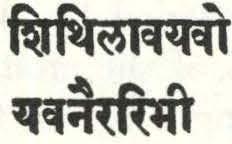
TRANSLATION
As a serpent living within the cavity of a tree wishes to leave when there is a forest fire, so the city's police superintendent, the snake, wished to leave the city due to the fire's severe heat.
PURPORT
It becomes very difficult for snakes to leave a forest when there is a fire. Other animals may flee due to their long legs, but serpents, only being able to crawl, are generally burned in the fire. At the last stage, the limbs of the body are not as much affected as the life air.
TEXT 15 � ���ijwft(itt: I
(l�;:aq(t4) � � II��II
sithilavayavo yarhi
gandharvair h_rta-pauru�al;t
1300 Srimad-Bhagavatam [Canto 4, Ch. 28
yavanair aribhi riijann uparuddho ruroda ha
sithila-slackened; avayava�-his limbs; yarhi- when; gandharvai�-by the Gandharvas; hrta-defeated; pauru�a�-his bodily strength; yavanai�by the Yavanas; aribhi�-by the enemies; riijan- 0 King Priicinabarhi�at; uparuddha�- being checked; ruroda-cried loudly; ha-indeed.
TRANSLATION
The limbs of the serpent's body were slackened by the Gandharvas and Yavana soldiers, who had thoroughlydefeated his bodily strength.When he attempted to leave the body, he was checked by his enemies. Being thus baffled in his attempt, he began to cry loudly.
PURPORT
At the last stage of life, the different gates of the body are choked by the effects of disease, which are caused by an imbalance of bile, mucus and air. Thus the living entity cannot clearly express his difficulties, and surrounding relatives hear the sound "ghura ghura" from a dying man. In his Mukunda-miilii-stotra, King Kulasekhara states:

knT}a tvadtya-pada-parikaja-paiijarantam adyaiva me visatu manasa-riija-hamsa� priiT}a-prayiiT}a-samaye kapha-viita-pittai� kaT}thavarodhana-vidhau smaraT}am kutas te
"My dear Kt�Q.a, please help me die immediately so that the swan of my mind may be encircled by the stem of Your lotus feet.Otherwise at the time of my final breath, when my throat is choked up, how will it be possible for me to think of You?" The swan takes great pleasure in diving within water andbeingencircled bythestem of thelotusflower. This entanglement is sporting joy. If, in our healthy condition, we think of the lotus feet of the Lord and die, it is most fortunate. In old age, at the time of death, the throat sometimes becomes choked with mucus or blocked by air. At such a time the sound vibration of Hare Kt�Q.a, the mahii-mantra, may not come out. Thus one may forget Kr�Q.a. Of course those who are strong in Kr�Q.a consciousness cannot possibly forget Kr�Q.a at any stage because they are accustomed to chanting the Hare Kr�Q.a mantra, especially when there is a signal from death.
Text 15] Puraiijana Becomes a Woman in the Next Life
1301
TEXT 16

��''
duhi(f� putra-pautnirns ca jami-jamat.r-par�adan svatvavasi§tam yat kincid grha-kosa-paricchadam
duhitr�- daughters; putra-sons; pautriin-grandsons; ca-and; fiimidaughters-in-law; jiimiitr-sons-in-law; par�ad iin -associates; svatvaproperty; avasi�tam-remaining; yat kincit-whatever; grha- home; kosaaccumulation of wealth; paricchadam- household paraphernalia.
TRANSLATION
King Puraiijana then began to think of his daughters, sons, grandsons, daughters-in-law, sons-in-law, servants and other associates as well as his house, his household paraphernalia and his little accumulation of wealth..
PURPORT
It is not infrequent for a person overly attached to the material body to request a physician to prolong his life at least for some time. If the so-called scientific physician is able to prolong one's life for a few minutes through the use of oxygen or other medicines, he thinks that he is very successful in his attempts, although ultimately the patient will die. This is called the struggle for existence. At the time of death both patient and physician still think of prolonging life, although all the constituents of the body are practically dead and gone.
TEXT
aham mameti svik.rtya
g_rhe�u kumatir grhi
dadhyau pramadaya dino
viprayoga upasthite
1302 Srimad-Bhiigavatam [Canto 4, Cll. 28
�: ��� iiiltf'ciiilt•u<tqt4C(t\
1 (Ci�wRJQ!��flllt•zaEf1l�qf("*'�'
�
17 3ft• (((\�� m f'tf6te\ 1
� � AJic(til aqm�llt"ll
aham-I; mama-mine; iti-thus; su-krtya-accepting; gr:he�u-in the home; ku-matil],-whose mind is full of obnoxious thoughts; grhi-the householder; dadhyau-turn his attention to; pramadayii-with his wife; dinal],-very poor; viprayoge-when separation;upasthite-occurred.


TRANSLATION
King Puraiijana was overly attached to his family and conceptions of "I" and "mine." Because he was overly attracted to his wife, he was already quite poverty-stricken. At the time of separation, he became very sorry.

PURPORT
It is clear in this verse that at the time of death thoughts of material enjoyment do not go away. This indicates that the living entity, the soul, is carried by the subtle body-mind, intelligence and ego. Due to false ego, the living entity still wants to enjoy the material world, and for want of material enjoyment he becomes sorry or sad. He still makes intellectual plans to further his existence, and therefore,although he gives up the gross body, he is carried by the subtle body to another gross body. The transmigration of the subtle body is never visible to material eyes; therefore when one gives up the gross body, we think that he is finished. Plans for material enjoyment are made by the subtle body, and the gross body is the instrument for enjoying these plans. Thus the gross body can be compared to the wife, for the wife is the agent for all kinds of sense gratification. Because of long association with the gross body, the living entity becomes very sad to be separated from it.The mental activityof the living entity obliges him to accept another gross body and continue his material existence.
The Sanskritwordstrimeans "expansion."Throughthewife one expands his various objects of attraction-sons, daughters, grandsons, and so on. Attachment to family members becomes very prominent at the time of death. One often sees that just before leaving his body a man may call for his beloved son to give him charge of his wife andother paraphernalia. He may say, "My dear boy, I am being forced to leave. Please take charge of the familyaffairs."He speaks in this way,not evenknowing his destination.
Text 18) Puraiijana Becomes a Woman in the Next Life 1303
TEXT 18 8MMJ� � 'IU4Wllt0 t!fl:il;ft I � mt'll�••ww�it'ii46T ������
Srimad-Bhagavatam

lokantaram gatavati
mayy anatha kutumbini
varti§yate katham tv e§a
balakan anusocati
loka-antaram-into a different life; gatavati mayi- when I am gone; aniithii-bereft of husband; ku.tumbini-surrounded by all family members; vart4yate-will exist; katham-how; tu-then; e�ii-this woman; biilakiinchildren; anusocati-lamenting about.
TRANSLATION
King Purafijana was anxiously thinking, "Alas, my wife is encumbered by so many children. When I pass from this body, how will she he able to maintain all these family members? Alas, she will he greatly harassed by thoughts of family maintenance."
PURPORT
All these thoughts of one's wife indicate that the King was overly engrossed with the thoughts of woman. Generally a chaste woman becomes a very obedientwife. This causes a husband to become attached to his wife, and consequently he thinks of his wife very much at the time of death. This is a very dangerous situation, as is evident from the life of King Purarijana. If one thinks of his wife instead of Kr�r_1a at the time of death, he will certainly not return home, back to Godhead, but will be forced to accept the body of a woman and thus begin another chapter of material existence.
TEXT
na mayy anasite bhurikte nasnate snati mat-para mayi ru�te susantrasta bhartsite yata-viig bhayat
na-never; mayi- when I; aniisite-had not eaten; bhurikte-she would eat; na-never; asniite-had not taken bath; sniiti-she would take her bath; mat-para-always devoted to me; mayi-when I; ru� te-was angry; su-
1304
[Canto 4, Ch. 28
19 ;r ttUIWIIf\1�g�a ttmt I
�� U4Sf\ijl��II��II
santrastii-very much frightened; bhartsite-when I chastised; yata-viikfully controlled of words; bhayiit- out of fear.
TRANSLATION
King Puraiijana then began to think ofhis past dealings with his wife. He recalled that his wife would not take her dinner until he had finished his, that she would not take her bath until he had finished his, and that she was always very much attached to him, so much so that if he would sometimes become angry and chastise her, she would simply remain silent and tolerate his misbehavior.
PURPORT
A wife is always supposed to be submissive to her husband. Submission, mild behavior and subservience are qualities in a wife which make a husband very thoughtful of her. For family life it is very good for a husband to be attached to his wife, but it is not very good for spiritual advancement. Thus Kr�l).a consciousness must be established in every home. If a husband and wife are very much attached to one another in Kr�l).a consciousness, they will both benefit because Kr�l).a is the center of their existence. Otherwise, if the husband is too much attached to his wife, he becomes a woman in his next life. The woman, being overly attached to her husband, becomes a man in her next life. Of course, it is an advantage for a woman to become a man, but it is not at all advantageous for the man to become a woman.
TEXT 20

Wt'444f6 �- � il+f'Efif{lijl I
��
•z«it� 41«((N � ll�oll
prabodhayati mavijiiarh
VJU§ite soka-karsita
vartmaitad grha-medhiyam
vira-sur api ne§yati
prabodhayati-gives good counsel; mii-unto me; avijiiam-foolish; vyu�ite-at the time of my being away; soka-by aggrievement; karsitiibeing aggrieved and thus dried up; vartma- path; etat-this;gr;ha-medhtyam -of household responsibilities; vira-siiq-the mother of great heroes; apialthough; neuati-will she be able to execute.
Text 20) Puraiijana Becomes a Woman in the Next Life 1305
King Puraiijana continued thinking how, when he was in a state of bewilderment, his wife would give him good counsel and how she would become aggrieved when he was away from home. Although she was the mother of so many sons and heroes, the King still feared that she would not be able to maintain the responsibility of household affairs.
PURPORT
At the time of death King Purarijana was thinking of his wife, and this is called polluted consciousness. As Lord K_r�l)a explains in Bhagavad-gitii:
mamaiviirhso jiva-loke jiva-bhutal). saniitanal). manal). �a�thiinindriyiiT}i prakrti-sthiini kar�ati
"The living entities in this conditioned world are My eternal, fragmental parts. Due to conditioned life, they are struggling very hard with the six senses, which include the mind." (Bg. 15.7)
The living entity is, after all, part and parcel of the Supreme Spirit, K_r�l)a. In other words, Kr�Qa's constitutionalposition andthe living entity's constitutional position are the same qualitatively. The only difference is that the living entity is eternally an atomic particle of the Supreme Spirit. Mamaiviirhso jiva-loke jiva-bhutal). saniitanal).. In this material world of conditional life, the fragmental portion of the Supreme Lord, the individual soul, is struggling due to his contaminated mind and consciousness. Aspart andparcelofthe Supreme Lord,aliving entity issupposedtothink of Kr�l).a, but here we see that King Purarijana (the living entity) is thinking of a woman. Such mental absorption with some sense object brings about the living entity's struggle for existence in this material world. Since King Puraiijana is thinking of his wife, his struggle for existence in the material world will not be ended by death. As revealed in the following verses, King Purarijana had to accept the body of a woman in his next life due to his being overly absorbed in thoughts of his wife. Thus mental absorption in social, political, pseudo-religious, national and communal consciousness is cause for bondage. During one's lifetime one has to change his activities inorder to attain release from bondage. This is confirmed inBhagavad-gitii:
yajiiiirthiit karmaT}O 'nyatra loko 'yam karma-bandhanal).

1306 Srimad-Bhagavatam [Canto 4, Ch. 28
TRANSLATION
tad-artham karma kaunteya mukta-sa�igal;t samacara
"Work done as a sacrifice for Vigm has to be performed, otherwise work binds one to this material world. Therefore, 0 son of Kunti, perform your prescribed dutiesfor His satisfaction, and in thatway you will always remain unattached and free from bondage." (Bg. 3.9) lf we do not change our consciousness in this life, whatever we do in the name of social, political, religious or communal and national welfare willbethe cause of our bondage. This means we have to continue in material conditional life. When the mind and senses are engaged in material activities, one has to continue his material existence and struggle to attain happiness. In each and every life, one is engaged in the struggle to become happy. Actually no one in this material world is happy, but the struggle gives a false sense of happiness. A person must work very hard, and when he attains the result of his hard work, he thinks himself happy. In the material world people do not know what real happiness is. Real happiness is to be attained by transcendental senses.
yatroparamate cittam
niruddhani yoga-sevaya yatra caivatmanatmanam pasyann atmani tu�yati
sukham atyantikam yat tad

buddhi-grahyam atindriyam vetti yatra na caivayam sthitas calati tattvatal;t
yam labdhva caparam liibham manyate nadhikam tatal;t yasmin sthito na dul;tkhena guru7Jripi vicalyate
tam vidyad dul;tkha-samyogaviyogam yoga-samjiiitam
"In the stage of perfection called trance, or samiidhi, one's mind is completely restrained from material mental activities by practice of yoga. This is characterized by one's ability to see the self by the pure mind and to relish and rejoice in the self. In that joyous state, oneis situated in boundless transcendental happiness and enjoys himself through transcendental senses. Established thus, one never departs from the truth, and upon gaining this
Text 20] Purarijana Becomes a Woman in the Next Life
1307
he thinks there is no greater gain. Being situated in such a position, one is never shaken, even in the midst of greatest difficulty. This indeed is actual freedom from all miseries arising from material contact." (Bg. 6.20-23)
Thus real happiness must be appreciated by one's transcendental senses. Unless one is purified, the transcendental senses are not manifest; therefore to purify the senses one must take to Kr�va consciousness and engage the senses in the service of the Lord. Then there will be real happiness and liberation.
It is stated in Bhagavad-gita :
sariram yad avapnoti yac capy utkramatiSvara[l. grhitvaitani samyati vayur gandhan ivasayat
"The living entity in the material world carries his different conceptions of life from one body to another as the air carries aromas." (Bg. 15.8)
If the wind passes over a garden of roses, it will carry the aroma of roses, and if it passes over a filthy place, it will carry the stench of obnoxious things. Similarly, King Puraiijana, the living entity, now passes the air of his life over his wife, a woman; therefore he has to accept the body of a woman in his next life.
TEXT 21

�� � (r.n �mii4tq(a�un: 1
ctM"4� � � N'l•Ui!f �11��II
katham nu daraka dina darakir vaparayal)-alJ, varti§yante mayi gate bhinna-nava ivodadhau
katham-how; nu-indeed; diirakiil].-sons; diniil].-poor; darak�daughters;vii-or;apariiyal]iil].-havingno one else to depend on; vart�yante -will live; mayi-when I; gate-gone from this world; bhinna-broken; naval].-boat;iva-like;udadhau-in the ocean.
TRANSLATION
King Puraiijana continued worrying: "Mter I pass from this world, how will my sons and daughters, who are now fully dependent on me, live and
1308 Srimad-Bhagavatam [Canto 4, Ch. 28
continue their lives? Their position will be similar to that of passengers aboard a ship wrecked in the midst of the ocean."
PURPORT
At the time of death every living entity worries about what will happen to his wife and children. Similarly, a politician also worries about what will happen to his country or his political party. Unless one is fully Kr�l).a conscious, he has to accept a body in the next life according to his particular state of consciousness. Since Puraiijana is thinking of his wife and children and is overly engrossed in thoughts of his wife, he will accept the body of a woman. Similarly, a politician or so-called nationalist who is inordinately attached to the land of his birth will certainly be reborn in the same land after ending his political career. One's next life will also be affected by the acts one performs during this life. Sometimes politicians act most sinfully for their own sense gratification. It is not unusual for a politician to kill the opposing party. Even though a politician may be allowed to take birth in his so-called homeland, he still has to undergo suffering due to his sinful activities in his previous life.
This science of transmigration is completely unknown to modern scientists. So-called scientists do not like to bother with these things because if they would at all consider this subtle subject matter and the problems of life, they would see that their future is very dark. Thus they try to avoid considering the future and continue committing all kinds of sinful activities in the name of social, political and national necessity.
TEXT 22 � «&'i"l�l � �"iitRI+(ijf((OI(I
� te.'fftt.f ll�:rti+U+=ttqtte.����II
evam krpaT).ayiibuddhyii
socantam atad-arhaT).am
grahitum krta-dhirenam
bhaya-niimiibhyapadyata
evam- thus; krpaT}ayii- by miserly; buddhyii-intelligence; socantamlamenting; a-tat-arhaT}am-on whichheshould not have lamented; grahilum -in order to arrest; krta-dhi�- the determined King of the Yavanas; enamhim; bhaya-niimii-whose name was fear; abhyapadyata- came there immediately.


Text 22] Purarijana Becomes a Woman in the Next Life 1309
Although King Puraiijana should not have lamented over the fate of his wife and children, he nonetheless did so due to his miserly intelligence. In the meantime, Yavana-raja, whose name was fear itself, immediately drew near to arrest him.
PURPORT

Foolish people do not know that every individual soul is responsible for his own actions and reactions in life. As long as a living entity in the form of a child or boy is innocent, it is the duty of the father and mother to lead him into a proper understanding of the values of life. When a child is grown, it should be left up to him to execute the duties of life properly. The parent, after his death, cannot help his child. A father may leave some estate for his children's immediate help, but he should not be overly absorbed in thoughts of how his family will survive after his death. This is the disease of the conditioned soul. Not only does he commit sinful activities for his own sense gratification, but he accumulates great wealth to leave behind so that his children may also gorgeously arrange for sense gratification.
In any case, everyone is afraid of death, and therefore death is called bhaya, or fear. Although King Puraiijana was engaged in thinking of his wife and children, death did not wait for him. Death does not wait for any man; it will immediately carry out its duty. Since death must take away the living entitywithout hesitation, it is the ultimateGod realizationof the atheists, who spoil their lives thinking of country, society and relatives, to the neglect of God consciousness. In this verse the word atad-arhal'}am is very significant, for it means that one should not be overly engaged in welfare activities for one's family members, countrymen, society and community. None of these will help a person to advance spiritually. Unfortunately, in present day society so-called educated men have no idea what spiritualprogress is. Although theyhave theopportunityinthehumanform of life to make spiritual progress, they remain misers. They use their lives improperly and simply waste them thinking about the material welfare of their relatives,countrymen, society and so on. One's actual duty is to learn how to conquer death. Lord l<.f�IJ.a states the process of conquering death in Bhagavad-gita:
janma karma ca me divyam evarit yo vetti tattvatal}

tyaktva deharit punar janma
naiti miim eti so 'rjuna
1310 Srimad-Bhagavatam [Canto 4, Ch. 28
TRANSLATION
"One who knows the transcendental nature of My appearance and activities does not, upon leaving the body, take his birth again in this material world, but attains My eternal abode, 0 Arjuna." (Bg. 4.9)
After giving up this body, one who is fully Kt�IJ.a conscious does not accept another material body but returns home, back to Godhead. Everyone should try to attain this perfection. Unfortunately, instead of doing so, people are absorbed in thoughts of society, friendship, love and relatives. This Kt�IJ.a consciousness movement, however, is educating people throughout the world and informing them how to conquer death. Harini vinii na srtirh taranti One cannot conquer death without taking shelter of the Supreme Personality of Godhead.
TEXT 23

pasuvad yavanair e§a niyamiina� svakani k§ayam anvadravann anupathii� socanto bhrsam iiturii�
pasu-vat-like an animal; yavanai[l-by the Yavanas; e . saft-Puraftjana; riiyamana�- being arrested and taken away ; svakam-to their own; k§ayamabode; anvadravan-followed;anupatha�- his attendants; socan ta�- lamenting; bhrsam-greatly; atura{t-being distressed.
TRANSLATION
When the Yavanas were taking King Puraiijana away to their place, binding him like an animal, the King's followers became greatly aggrieved. While they lamented, they were forced to go along with him.
PURPORT
When Yamaraja and his assistants take a living entity away to the place of judgment, the life, life air and desires, being followers of the living entity, also go with him. This is confirmed in the Vedas. When the living entity is taken away or arrested by Yamaraja (tam utkriimantam), the life air also goes with him (prii1JO 'niltkriimati), and when the life air is gone (prii7Jam

Text 23] Puraiijana Becomes a Woman in the Next Life 1311
q�f!ltl€1�� 41�+uwt: � � t 3fw'iil"q"��: �ft:q;:ffl ��+tlij(t:����"
aniitkriimantam),all the senses (saroe priif!iil}) also go along (aniitkriimanti). When the living entityand the life air are gone, the lump of matter produced of five elements-earth, water, air, fire and ether-is rejected and left behind. The living entity then goes to the court of judgment, andYamaraja decides what kind of body he is going to get next. This process is unknown to modern scientists. Every living entity is responsible for his activities in this life, and after death he is taken to the court ofYamaraja, where it is decided what kind of body he will take next. Although the gross material body is left, the living entity and his desires, as well as the resultant reactions of his past activities, go on. It isYamaraja who decides what kind of body one gets next in accordance with one's past actions.
TEXT 24




purini vihiiyopagata uparuddho bhujarigama� yadii tam eviinu puri viiir1.1ii prakrtirh gatii
purfm-the city; vihiiya-having given up; upagata{t-gone out; uparuddhaft -arrested; bhujarigama�-the serpent; yadii-when; tam-him; eva-certainly; anu-after; puri- the city; viSirpii-scattered; prakrtim-matter;gatii- turned into.
TRANSLATION
The serpent, who had already been arrested by the soldiers of Yavanaraja and was out of the city, began to follow his master along with the others. As soon as they all left the city, it was immediately dismantled and smashed to dust.
PURPORT
When the living entity is arrested, all his followers-namely the life air, the senses and sense objects-immediately leave the lump of matter, the body. When the living entity and his companions leave, the body no longer works but turns into basic material elements-earth, water, fire, air and ether. When a city attacked by enemies is vacated by its inhabitants, the enemy immediately takes advantage of that city and bombards it to smash
1312 Srimad-Bhagavatam [Canto 4, Ch. 28
A(t�q•t6
� ��Fctitolt 3lifa' tRIT
if
� �: I
11�\/11
the whole thing to dust. When we say, "Dust thou art, and unto dust thou shall return," we refer to the body. When a city is attacked and bombarded by enemies, the citizens generally leave, and the city ceases to exist.
It is a foolish person who engages in improving the condition of a city without caring for the citizens or inhabitants. Similarly, a living entity who is not properly enlightened in spiritual knowledge simply takes care of the external body, not knowing that the spirit soul is the principal factor within the body. When one is advanced in spiritual knowledge, the spirit soul is saved from eternal transmigration. The Bhiigavatam considers those who are attached to their bodies to be like cows and asses (sa eva go-kharal].). The cow is a very innocent animal, and the ass is a beast of burden. One who labors under the bodily conception simply works like an ass and does not know his self-interest. It is therefore said:
yasyiitma-buddhil]. kuJ]-ape tri-dhiituke sva-dhil]. kalatriidi�u bhauma ijya-dhil]. yat-tirtha-buddhil]. salile na karhicij jane�v abhijne�u sa eva go-kharal].

"A human being who identifies this body made of three elements with his self, who considers the by-products of the body to be his kinsmen, who considers the land of birth as worshipable, and who goes to the place of pilgrimage simply to take a bath rather than meet men of transcendental knowledge there, is to be considered like an ass or a cow." (Bhiig. 10.84.13)
Human civilization devoid of Kr�qa consciousness is simply a civilization of lower animals. Sometimes such a civilization may study the dead body and consider the brain or the heart. However, no part of the body is important unless the spirit soul is present. In a modern civilization of cows and asses, scientists try to search out some value in the brain or heart of a dead man.
vik.r�yamiir:ta/:t prasabham
yavanena baliyasii
niivindat tamasiivi�ta/:t
sakhiiyam suh.rdam pura/:t
Text 25) Purarijana Becomes a Woman in the Next Life 1313
I
TEXT 25 Nt'4¥UOI: SRPi � "i1�'"0�""'ij'"'l
itlf4W(\1¥1ijiSSAf!:���: 11�'-\11
viknyamiil)a[l.-being dragged; prasabham- forcibly; yavanena- by the Yavana; baliyasa- who was very powerful; na avindat-could not remember; tamasii-by darkness of ignorance; iivi�ta�- being covered; sakhayam-his friend; suhrdam- always a well-wisher;pura{t-from the very beginning.
TRANSLATION
When King Puraiijana was being dragged with great force by the powerful Yavana, out of his gross ignorance he still could not remember his friend and well-wisher, the Supersoul.
PURPORT



In Bhagavad-gitii Lord Kr�qa says:

bhoktiiram yajiia-tapasiim sarva-loka-mahesvaram suhrdam sarva-bhiitiiniim jiiiitvii miim siintim rcchati
"The sages, knowing Me as the ultimate purpose of all sacrifices and austerities, the Supreme Lord of all planets and demigods and the benefactor and well-wisher of all living entities, attain peace from the pangs of material miseries." (Bg. 5.29)
A person can be in full Kr�qa consciousness and become happy and satisfied if he knows but three things-namely, that the Supreme Lord Kr�qa is the enjoyer of all benefits, that He is the proprietor of everything, and that He is the supreme friend of all living entities. If one does not know this and functions instead under the bodily conception, he is always harassed by the tribulations offered by material nature. In actuality, the Supreme Lord is sitting by the side of everyone.
iSvaral]. sarva-bhutiiniim hrd-dese 'rjuna ti�(hati
bhriimayan sarva-bhutiini yantriiruqhiini miiyayii
"The Supreme Lord is situated in everyone's heart, 0 Arjuna, and is directing the wanderings of all living entities, who are seated as on a machine, made of the material energy." (Bg. 18.61)
The living entity and the Supersoul are sitting side by side in the same tree, but despite being harassed by the laws of material nature, the foolish
1314 Srimad-Bhagavatam [Canto 4, Ch. 28
living entity does not turn toward the Supreme Personality of Godhead for protection. However, he thinks that he is able to protect himself from the stringent laws of material nature. This, however, is not possible. The living entity must turn toward the Supreme Personality of Godhead and surrender unto Him. Only then will he be saved from the onslaught of the powerful Yavana, or Yamariija.
The word sakhiiyam (friend) is very significant in this verse because God is eternally present beside the living entity. The Supreme Lord is also described as suhrdam (ever well-wisher). The Supreme Lord is always a wellwisher, just like a father or mother. Despite all the offenses of a son, the father and mother are always the son's well-wisher. Similarly, despite all our offenses and defiance of the desires of the Supreme Personality of Godhead, the Lord will give us immediate relief from all the hardships offered by material nature if we simply surrender unto Him. Lord l<.rf?q.a also confirms this in Bhagavad-gitii:
daivi hy e�ii gulJamayi
mama miiyii duratyayii
miim eva ye prapadyante
miiyiim etiim taranti te
"This divine energy of Mine, consisting of the three modes of material nature, is difficult to overcome. But those who have surrendered unto Me can easily cross beyond it." (Bg. 7.14)
Unfortunately, due to our bad association and great attachment for sense gratification, we do not remember our best friend, the Supreme Personality of Godhead.
TEXT 26

� :q(lq�(tsir.f -�G:'III€-11I
�f�: �: 4i(;:fflstftct'1������II
tam yajna-pasavo 'nena samjnaptii ye 'dayiilunii
kuphiirais cicchidul;t kruddhiil;t smaranto 'mivam asya tat
tam-him; yajna-pasaval;t-the sacrificial animals; anena-by him; samjnaptiil;t-killed; ye-all of them who; adayalunii-by the most unkind; kuthiirai/;1.-by axes; cicchidufl.-pierced to pieces; kruddha/;1.-being very
Text 26] Puraiijana Becomes a Woman in the Next Life 1315
angry; smarantal;t- remembering; amivam- sinful activity; asya- ofhim; tatthat.


TRANSLATION

That most unkind king, Puraiijana, killed many animals in various sacrifices. Now, taking advantage of this opportunity, all these animals began to pierce him with their horns. It was as though he were being cut to pieces by axes.
PURPORT


Those who are very enthusiastic about killing animals in the name of religion or for food must await similar punishmentafter death. The word mamsa (meat) indicates that those animals whom we kill will begiven an opportunity to kill us. Although in actuality no living entity is killed, the pains of being pierced by the horns of animals will be experienced after death. Not knowing this, rascals unhesitatingly go on killing poor animals. So-called human civilization has opened many slaughterhouses for animals in the name of religion or food. Those who are a little religious kill animals in temples, mosques or synagogues, and those who are more fallen maintain various slaughterhouses. Just as in civilized human society the law is a life for a life, similarly, no living entity can encroach upon another living entity as far as the Supreme Lord is concerned. Everyone should be given freedomtoliveatthecostoftheSupreme Father, and animal killing-either for religion or for food-is always condemned by the Supreme Personality of Godhead. In Bhagavad-gitii Lord K{�qa says:
tiin aham dvi�ata� kruriin samsiire�u nariidhamiin
k�ipiimy ajasram asubhiin iisur�v eva yoni�u
"Those who are envious and mischievous, who are the lowest among men, are cast by Me into the ocean of material existence, into various demoniac species of life." (Bg. 16.19)
The animal killers (dvi�ata�), envying other living entities and the Supreme Personality of Godhead, are placed in darkness and cannot understand the theme and objective of life. This is further explained in the following verses.
1316 Srimad-Bhiigavatam [Canto 4, Ch. 28
TEXT 27 311C"{'NI\� � ICt�Rt: �: I � Sl'li:Jel1f't�u 11�\911
Becomes a Woman in the Next Life
ananta-piire tamasi magno na�ta-smrtil). samiil). siisvatir anubhiiyiirtim pramadii-saTiga-dil�ital).
ananta-piire- unlimitedly expanded; tamasi-in the material existence of darkness; magnal).-being merged; na�_ta-smrtil).-bereft of all intelligence; samiil).-for many years; sasvatil]- practically eternally; anubhilya- experiencing; iirtim-the threefold miseries; pramadii-of women; sanga-by association; du�ital).-being contaminated.
TRANSLATION
Due to his contaminated association with women, a living entity like King Puraiijana eternally suffers all the pangs of material existence and remains in the dark region of material life bereft of all remembrance for many, many years.
PURPORT

This is a description of material existence. Material existence is experienced when onebecomes attached to a woman andforgets his real identity asthe eternalservant of J<.r�qa (na�ta-smrtil] ) . In thisway, in one body after another, the living entity perpetually suffers the threefold miseries of material existence. To save human civilization from the darkness of ignorance,thismovement was started.Themainpurpose ofthe Kr�qaconsciousness movement isto enlighten theforgetful living entityand remind him of his original J<.r�qa consciousness. In this way the living entity can be saved from the catastrophe of ignorance as well as bodily transmigration. As Srila Bhaktivinoda 'fhakura has sung:
aniidi karama-phale, pacji' bhaviir1Java-jale, taribare na dekhi upaya
e v4aya-haliihale, diva-nisi hiyii jvale, mana kabhu sukha niihi piiya
"Because of my past fruitive activities, I have now fallen into an ocean of nescience. I cannot find any means to get out of this great ocean, which is indeed like an ocean of poison. We are trying to be happy through sense enjoyment, but actually that so-called enjoyment is like food that is too hot and causes burning in the heart. I feel a burning sensation constantly, day and night, and thus my mind cannot find satisfaction."
Text 27)
Puraiijana
1317
Material existence is always full of anxiety. People are always trying to find many ways to mitigate anxiety, but because they are not guided by a real leader, they try to forget material anxiety through drink and sex indulgence. Foolish people do not know that by attempting to escape anxiety by drink and sex, they simply increase their duration of material life. It is not possible to escape material anxiety in this way.
The word pramadii-sariga-dil�ita� indicates that apart from all other contamination, if one simply remains attached to a woman, that single contamination will be sufficient to prolong one's miserable material existence. Consequently, in Vedic civilization one is trained from the beginning to give up attachment for women. The first stage of life is brahmaciiri, the second stage grhastha, the third stage viinaprastha, and the fourth stage sannyiisa. All these stages are devised to enable one to detach himself from the association of women.
TEXT 28



tiim eva manasa grhTJan babhuva pramadottamii anantaram vidarbhasya riija-simhasya vesmani
tiim-her; eva-certainly; manasii-by the mind; g h n- accepting; babhilva-became; pramadii-woman ; uttamii-highly situated; anantaramafter death; vidarbhasya-of Vidarbha; riija-simhasya-of the most powerful king; vesmani- at the house.
TRANSLATION
King Puraiijana gave up his body while rem�mbering his wife, and consequently in hisnext life he became a very beautiful and well-situated woman. He took his next birth as the daughter of King Vidarbha in the very house of the King.
PURPORT
Since King Puraiijana thought of his wife at the time of death, he attained the body of a woman in his next birth. This verifies the following verse in Bhagavad-gitii:
1318 Srimad-Bhagavatam [Canto 4, Ch. 28
� 'liRn � �( Sl¥t(hlitll � f?t�.W. ��Me:� �f.lll����
Puraiijana Becomes a Woman in the Next life
yam yam viipi smaran bhiivam
tyajaty ante kalevaram tam tam evaiti kaunteya sadii tad-bhiiva-bhiivital],
"Whatever state of being one remembers when he quits his body, that state he will attain without fail." (Bg. 8.6)
When a living entity is accustomed to think of a particular subject matter or become absorbed in a certain type of thought, he will think of that subject at the time of death. At the time of death, one will think of the subject that has occupied his life while he was awake, lightly sleeping or dreaming, or while he was deeply sleeping. After falling from the association of the Supreme Lord, the living entity thus transmigrates from one bodily form to another according to nature's course, until he finally attains the human form. If he is absorbed in materialthoughts and ignorant of spiritual life, and if he does not take shelter under the lotus feet of the Supreme Personality of Godhead, Govinda, who solves all questions of birth and death, he will become a woman in the next life, especially if he thinks of his wife. As stated in Srtmad-Bhiigavatam: karmarJii daivanetrel'}a. A living entity acts piously and impiously, and sometimes in both ways. All actions are taken into account, and the living entity is offered a new body by his superiors. Although King Puraiijana was overly attached to his wife, he nonetheless performed many pious fruitive activities. Consequently, although he took the form of a woman, he was given a chance to be the daughter of a powerful king. As confirmed in Bhagavadgltii:
priipya pu[tya-krtiim lokiin u�itvii siisvattl), samiil), suctniim srimatiim gehe yoga-bhra�to 'bhijiiyate
"The unsuccessful yogi, after many, many years of enjoyment on the planets of the pious living entities, is born into a family of righteous people, or into a family of rich aristocracy." (Bg. 6.41)
If a person falls from the path of bhakti-yoga, God realization, due to attachment to fruitive activity, philosophical speculation or �ystic yoga, he is given a chance to take birth in a high and rich family. The higher authorities appointed by the Supreme Personality of Godhead thus render justice to the living entity according to the living entity's desires. Although King Puraiijana was overly absorbed in thoughts of his wife and thus became a woman, he nonetheless took birth in the family of a king

28)
Text
1319
due to his previous pious activities. The conclusion is that all our activities are taken into consideration before we are awarded another body. Narada Muni therefore advised Vyasadeva to take to l<flll}a consciousness, devotional service, and abandon all ordinary occupational duties. This advice was also given by Lord l<f!lqa Himself. Although a devotee may fall from the path of spiritual consciousness, he will nonetheless attain a human body in the home of a devotee or a rich man. In this way one can resume his devotional service.
TEXT 29




�F-\llE44(liilt4411�:
upayeme virya-parpini vaidarbhini malaya-dhvajal). yudhi nirjitya nijanyan pa1pjyal). para-puranjayal).
upayeme-married; vtrya-of valor or prowess; par-am-the prize; vaidarbhim-daughter of Vidarbha;malaya-dhvajah- Malayadhvaja;yudhiin the fight; nirjitya-after conquering;riijanyan- other princes ; piil]-qyal]best of the learned, or born in the country known as Pa�u;lu; para-transcendental; puram-city; jayal]-conqueror.
TRANSLATION
It was fixed that Vaidarbhi, daughter of King Vidarbha, was to be married to a very powerful man, Malayadhvaja, an inhabitant of the PaJ;u;lu country. Mter conquering other princes, he married the daughter of King Vidarbha.
PURPORT
It is customary among k�atriyas for a princess to be offered under certain conditions. For instance, Draupadi was offered in marriage to one who could pierce a fish with an arrow simply by seeing the reflection of that fish. l<fflqa married one of His queens after conquering seven strong bulls. The Vedic system is for a daughter of a king to be offered under certain conditions. Vaid�bhi, the daughter of Vidarbha, was offered to a great
1320 Srimad-Bhagavatam [Canto 4, Ch. 28
� ift�qorf � +R�4ENU I
qq($4: ����II
devotee and powerful king. Since King Malayadhvaja was both a powerful king and great devotee, he fulfilled all the requirements. The name Malayadhvaja signifies a great devotee who stands as firm as Malaya Hill, and, through his propaganda, makes other devotees similarly as firm. Such a mahii-bhiigavata can prevail over the opinions of all others. A strong devotee makes propaganda against all other spiritual conceptions-namely jfiiina, karma and yoga. With his devotional flag unfurled, he always stands fast to conquer other conceptions of transcendental realization. Whenever there is an argument between a devotee and a nondevotee, the pure, strong devotee comes out victorious.
The word pii'!iJya comes from the word pa'!iJii meaning knowledge. Unless one is highlylearned, he cannotconquer nondevotional conceptions. The word para means transcendental, and pura means city. The para-pura is Vaikui;ttha, the kingdom of God, and the word jaya refers to one who can conquer. This means that a pure devotee, who is strong in devotional service and who has conquered all nondevotional conceptions, can also conquer the kingdom of God. In other words, one can conquer the kingdom of God, Vaikui;ttha, only by rendering devotional service. The Supreme Personality of Godhead is called ajita, meaning that no one can conquer Him, but a devotee, by strong devotional service and sincere attachment to the Supreme Personality of Godhead, can easily conquer Him. Lord Kr�f.la is fear personified for everyone, but He voluntarily agreed to fear the stick of mother Yasoda. Kr�l)a, God, cannot be conquered by anyone but His devotee. Such a devotee kindly married the daughter of King Vidarbha.
TEXT 30

m � iifWAl!R' 31l�atl¥tM�ijUli'( I
�: Q � Q �: ll�oll
tasyiim sa janayiin cakra iitmajiim asitek�ar_tiim yaviyasa� sapta sutiin
sapta dravipa-bhubhrta�
tasyiim- through her; sa�-the King; janayiim cakre--begot; iitma-jiimdaughter; asita-blue or black; ik�aryiim- whose eyes; yaviyasa� -younger, very powerful; sapta- seven ; sutiin-sons; sapta-seven; draviCJa- province of Dravi<).a or south India; bhu-of the land; bhrta�-kings.
Text 30] Purarijana Becomes a Womanin the Next Life 1321
TRANSLATIO N
King Malayadhvaja fathered one daughter, who had very black eyes. He also had seven sons, who later became rulers of that tract of land known as Dravic;la. Thus there were seven kings in that land.
PURPORT


King Malayadhvajawas a greatdevotee,and afterhemarriedthe daughter of King Vidarbha, he gave her one nice daughter, whose eyes were black. Figuratively this means that the daughter of King Malayadhvaja was bestowed also with devotional service, for her eyes were always fixed on Kr�l}a. A devotee has no vision in his life other than Kr�l}a. The seven sons are the seven processes of devotional service-hearing, chanting, remembering, offering worship, offering prayers, rendering transcendental loving service and serving the lotus feet of the Lord. Of the nine types of devotional service, only seven were immediately given. The balancefriendship and surrendering everything-were to be developed later. In other words, devotional service is divided into two categories-namely vidhi-miirga and riiga-miirga. The process of becomingfriends withthe Lord and sacrificing everything for Him belong to the category of riiga-miirga, the stage of developed devotional service. For the neophyte, the important processes are those of hearing and chanting (sravaT}am ktrtanam), remembering Kr�l}a, worshiping the Deity in the temple, offering prayers and always engaging in the service of the Lord, and worshiping the lotus feet of the Lord.
The word yavtyasa� indicates that these processes are very powerful. Mter a devotee engages in the processes of srava1J-mh ktrtanarh vi§IJO� smaraT}ani piida-sevanam arcanani vandanani diisyam, and is able to secure these processes, he can later become a devotee capable of rendering spontaneous devotional service-namely sakhyam and iitma-nivedanam. Generally the great iiciiryas who preach devotional service all over the world belong to the category of sakhyam iitma-nivedanam. A neophyte devotee cannot actually become a preacher. The neophyte is advised to execute devotional service in the seven other fields (sravaT}arh ktrtanam, etc.). If one can successfully execute the preliminary seven items, he can in the future be situated on the platform of sakhyam atma-nivedanam.
The specific mention of Dravic;la-desa refers to the five Dravi«;la-desas in south India. All are very strong in rendering the preliminary devotional processes (srava�Jarh kirtanam). Some great acaryas, like Ramanujaciirya and Madhvacarya,also camefromDravi«;la-desaandbecame great preachers. These were all situated on the platform of sakhyam atma-nivedanam.
1322 Srimad-Bhagavatam [Canto 4, Ch. 28
TEXT 31 .,.a.�l'lq.a'li(liil'tiGO'l«'( I � qo(�t4(� ij;:itw:ij( 'R'(II��II

ekaikasyabhavat te�ani
rajann arbudam arbudam
bhok�yate yad-vanisa-dharair
mahi manv-antarani param
eka-ekasya-of each one;abhavat-therebecame; te�iim-ofthem; rajan0 King;arbudam-ten million;arbudam-ten million; bhok�yate-is ruled; yat-whose; vanisa-dharai�-by descendants;mahi-thewholeworld; manuantaram-up to the end of one Manu;param-and afterwards.
TRANSLATION
My dear King Pracinabarhi�at, the sons of Malayadhvaja gave birth to many thousands and thousands of sons, and all of these have been protecting the entire world up to the end of one Manu's life span and even afterwards.
PURPORT
There are fourteen Manus in one day of Brahma. A manvantara, the life span of one Manu, is given as 7l multiplied by 4,320,000 years. Mter one such Manu passes on, another Manu begins his life span. In this waythelifecycleofthe universe is going on. As one Manu follows another, the cult of l(r�l).a consciousness is being imparted, as confirmed in Bhagavad-gita:
sri bhagavan uvaca
imani vivasvate yogani
proktavan aham avyayam
vivasvan manave praha
manur ik§vtikave 'bravit
"The Blessed Lord said: I instructed this imperishable science of yoga to the sun-god, Vivasvan, and Vivasvan instructed it to Manu, the father of mankind, and Manu inturninstructed it to Ik�vaku." (Bg. 4.1)
Vivasvan, the sun-god, imparted Bhagavad-gita to one Manu, and this Manu imparted it to his son, who impartedit to yet anotherManu. In this way the propagation of l(r�l).a consciousness is never stopped. No one
Text 31] Puranjana
Becomes a Woman in the Next Life
1323
should think that this K{�t;J.a consciousness movement is a new movement. As confirmed by Bhagavad-gttii and Sr'imad-Bhiigavatam, it is a very, very old movement, for it has been passing down from one Manu to another.





Among Vai�t;J.avas there may be some difference of opinion due to everyone's personal identity, but despite all personal differences, the cult of K{�t;J.a consciousness must go on. We can see that under the instructions of Srila Bhaktivinoda fhakura, Srna Bhaktisiddhanta Sarasvati Gosvami Maharaja began preaching the K{�t;J.a consciousness movement in an organized way within the past hundred years. The disciples of Srila Bhaktisiddhanta Sarasvati Gosvami Maharaja are all Godbrothers, and although there are some differences of opinion, and although we are not acting conjointly, still every one of us is spreading this K{�t;J.a consciousness movement according to his own capacity and producing many disciples to spread it all over the world. As far as we are concerned, we have already started the International Society for Krishna Consciousness, and many thousands of Europeans and Americans have joined this movement. Indeed, it is spreading like wildfire. This cult of K{�t;J.a consciousness, based on the nine principles of devotional service (sraval)am kirtanam vi§T)o� smaral)am piida-sevanam/ arcanam vandanam diisyam sakhyam iitma-nivedanam), will never be stopped. It will go on without distinction of caste, creed, color or country. No one can check it.

The word bhok�yate is very important in this verse. Just as a king gives protection to his citizens, these devotees, following the principles of devotional service, will give protection to all the people of the world. The people of the world are very much harassed by so-called religious principled sviimis, yogis, karmis and jniinis, but none of these can show the right way to become elevated to the spiritual platform. There are primarily four parties spreading devotional service all over the universe. These are the Ramanuja-sampradaya, the Madhva-sampradaya, the V�t;J.usviimisampradaya and the Nimbarka-sampradaya. The Madhva-Gaugiyasampradaya in particular comes from Lord Caitanya·Mahaprabhu. All these devotees are spreading this Kr�t;J.a consciousness movement very widely and giving protection to innocent people who are being so much embarrassed by pseudo-avatiiras, sviimis, yogis and others.

1324 Srimad-Bhagavatam [Canto 4, Ch. 28
TEXT 32 �: Sw(f(ij(fi�� 'l�HHII(I ��it iijRJ uf.l:II��II
Purarijana Becomes a Woman in the Next Life agastya� priig duhitaram
upayeme dhrta-vratiim yasyiim drf)ha-cyuto jiita idhma-viihiitmajo mun*
agastya�-the great sage Agastya Muni; prak-first; duhitaram-daughter; upayeme-married; dhrta-vratam-taken to vows; yasyam- through whom; drcJha-cyuta� -named Dglhacyuta; jiita�-was born; idhma-viiha-named Idhmavaha; iitma-ja�-son; muni� _: the great sage.
TRANSLATION
The great sage named Agastya married the first-born daughter of Malayadhvaja, the avowed devotee of Lord Kr�IJa. From her one son was born, whose name was Drc.lhacyuta, and from him another son was born, whose name was Idhmavaha.
PURPORT

The name of Agastya Muniis very significant. The word agastya indicates that his senses do not act independently, and the w.ord muni means "mind." The mind is the center of all the senses, and in the case of Agastya Muni, the senses could not work independent of the mind. When the mind takes to the cult of bhakti, it engages in devotional service. The cult of bhakti (bhakti-latii) is the first daughter of Malayadhvaja, and, as previously described, her eyes are always upon Kr�IJa (asitek§ar;tiim). One cannot render bhakti to any demigod. Bhakti can be rendered only to Vi�:r)u (sravar;tarh kirtanam vi§r;to�). Thinking the Absolute Truth to be without form, the Mayavadis say that the word bhakti can apply to any form of worship. If this were the case, a devotee could imagine any demigod or any godly form and worship it. This, however, is not the real fact. The real fact is that bhakti can only be applied to Lord Vi�l).U and His expansions. Therefore bhakti-latii is drf)ha-vrata, the great vow, for when the mind is completely engaged in devotional service, the mind does not fall down. If one tries to advance by other means-by karma-yoga or jniina-yoga-one will fall down, but if one is fixed in bhakti, he never falls down.
Thus from bhakti-latii the son Dr�hacyuta is born, and from Dr�acyuta the next son, Idhmavaha, is born. The word idhma-viiha refers to one who carries wood for burning in a sacrifice when approaching a spiritual master. The point is that bhakti-latii, the cult of devotion, fixes one in his
Text
32)
1325
spiritual position. One so fixed never comes down, and he begets children who are strict followers of the sastric injunctions. As said in the Vedas:
tad vijniiniirthani sa gurum eviibhigacchet samifrpiir-* srotriyani brahma-ni§tham
In the line of devotional service,thosewho are initiated are strict followers of the Vedic scriptural injunctions.
TEXT 33


�Elwt�;q:� u�fil��'�: 1
anmt\4PIS: �sui� ii11111l f(U'4��������
vibhajya tanayebhya}_t k§miini riijar§ir malaya-dhvaja}_t aririidhayi§ulJ krsrtam sa jagiima kuliicalam
vibhajya-having divided; tanayebhyal].-amongst his sons;k�mam-the whole world; riija-r�il].-great saintly king; malaya-dhvaja}_t- named Malayadhvaja; ariradhay�uf!,-desiring to worship; kr�T}am- Lord Kr�Q.a; sal].-he;jagiima-went;kuliicalam-unto Kulacala.
TRANSLATION
Mter this, the great saintly king Malayadhvaja divided his entire kingdom amongst his sons. Then, in order to worship Lord K!�Q.a with full attention, he werit to a solitary place known as Kulacala.
PURPORT
Malayadhvaja, the great king, was certainly a maha-bhagavata, topmost devotee. By executing devotional service, he begot many sons and disciples for propagating the bhakti cult (sravar-am ktrtanani v(sr-olt) Actually, the entire world should be divided amongst such disciples. Everyone should be engaged in preaching the cult of Kr�Q.a consciousness. In other words, when disciples are grown up and are able to preach, the spiritual master should retire and sit down in a solitary place to write and execute nirjana-bhajana. This means sitting silently ina solitary place and executing devotional service. This nirjana-bhajana, which is the silent
1326 Srimad-Bhagavatam [Canto 4, Ch. 28
worship of the Supreme Lord, is not possible for a neophyte devotee. Srila Bhaktisiddhanta Sarasvati Thakura never advised a neophyte devotee to go to a solitary place to engage in devotional service. Indeed, he has written a song in this connection:
du§ta mana, tumi kisera vai§r;tava? prati§thiira tare, nirjanera ghare, tava hari-niima kevala kaitava
"My dear mind,what kind of devotee are you? Simply for cheap adoration yousitin a solitaryplaceandpretend tochantthe Hare Kr�J)a mahii-mantra, but this is all cheating."Thus BhaktisiddhantaSarasvatiThakura advocated that every devotee, under the guidance of an expert spiritual master, preach the bhakti cult, Kr�J)a consciousness, all over the world. Only when one is mature can he sit in a solitary place and retire from preaching allover theworld. Following thisexample,thedevoteesof the International Societyfor KrishnaConsciousnessnowrenderserviceaspreachers invarious parts of the world. Now they can allow the spiritual master to retire from active preaching work. In the last stage of the spiritual master's life, the devotees of the spiritual master should take preaching activities into their own hands. In this way the spiritual master can sit down in a solitary place and render nirjana-bhajana.
TEXT 34

�����¥t�l�l
31-"�
q1G01�iii41��'4 �;ft!iti(t{II�'till
hitvii grhiin sutiin bhogiin vaidarbhi madirekw!la
anvadhavata paT}f[yesarh jyotsneva rajani-karam
hitvii-giving up; grhiin-home; sutiin-children; bhogiin-material happiness; vaidarbhi-the daughter of King Vidarbha; madira-ik�aT}ii-with enchanting eyes; anvadhii vata- followed; piil]f/.ya-iSam- KingMalayadhvaja; jyotsnii iva-like the moonshine; rajani-karam-the moon.
TRANSLATION
Just as the moonshine follows the moon at night, immediately after King Malayadhvaja departed for Kulacala, his devoted wife, whose eyes
Text 34] Puraiijana Becomes a Woman in the Next Life 1327
were very enchanting, followed him, giving up all homely happiness, despite family and children.
PURPORT

Just as in the viinaprastha stage the wife follows the husband, similarly when the spiritual masterretires for nirjana-bhajana, some of hisadvanced devotees follow him and engage in his personal service. In other words, those who are very fond offamily lifeshould comeforwardin theservice of the spiritual master and abandon so-called happiness afforded by society, friendship and love. A verse by Srila Visvanatha Cakravarti Thiikura in his Gurv-a§taka is significant in this regard. Yasya prasiidiid bhagavat-prasiida�. A disciple should alwaysremember that by serving the spiritual master he can easily advance in Kr�Q.a consciousness. All the scriptures recommend that it is by pleasing the spiritual master andserving him directlythat one can attainthe highest perfectional stage ofdevotional service.
The word madirek§aT}ii is also significant in thisverse. Srfla Jiva Gosvami has explained in his Sandarbha that the word madira means intoxicating. If one's eyes become intoxicated upon seeing the Deity, he may be called madirek§a7Ja. Queen Vaidarbhi's eyes were very enchanting, just as one's eyes are madirek�a'!-a when engaged in seeing the temple Deity. Unless one is an advanced devotee, he cannot fixhis eyeson the Deity in the temple.


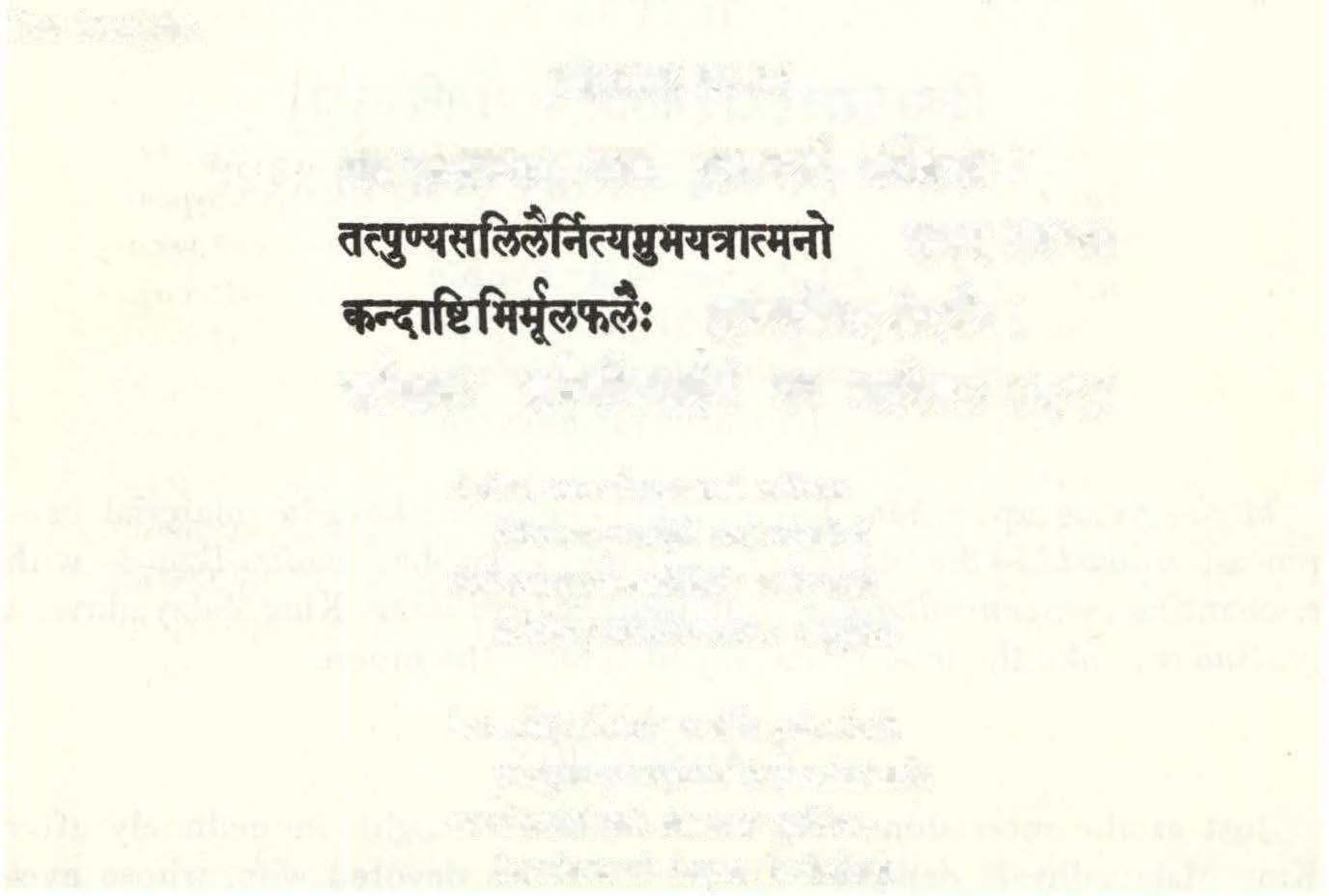
TEXTS 35-36

� ��CIQI ;nq �iliJiqaff ctil�€61 I
�11�'-\11
�q�un��: 1



�: ta�•li'l€6ti-t � �: ������
tatra candra-vasii niima tiimra-parT}i vatodakii tat-puT}ya-salilair nityam
ubhayatriitmano m,rjan
kandii�tibhir miila-phalail). pu�pa-parT}ais t,r[!-odakai[l. vartamiinaQ. sanair giitrakarsanam tapa iisthital).


1328 Srimad-Bhagavatam [Canto 4, Ch. 28
tatra-there; candra-vasii-the Candravasa River; nama-named; tiimraparr{i-the TamraparJJ.i River; vatodakii-the Vatodaka River;tat-of those rivers;pu�Jya-pious;salilail]-with the waters; nityam-daily;ubhayatrain both ways;atmana�-of himself;�rjan-washing;kanda-bulbs; a�(ibhi/.1 -and by seeds;mula-roots;phalail]-and byfruits;pu�pa-flowers;par�Jail] -and by leaves;troii-grass;udakail]-andby water;vartamiinal]-subsisting; sanai/.1-gradually; giitra-his body; karsanam-rendering thin; tapa�austerity;iisthital]-he underwent.



TRANSLATION
In the province of Kulacala, there were rivers named Candravasa, Tamrapartft and Vatodaka. King Malayadhvaja used to go to those pious rivers regularly and take his bath there. Thus he purified himself externally and internally. He took his bath and ate bulbs, seeds, leaves, flowers, roots, fruits and grasses and drank water. In this way he underwent severe austerities. Eventually he became very skinny.
PURPORT
We can definitely see that to advance in Kr�JJ.a consciousness one must control his bodily weight. If one becomes too fat, it is to be assumed that he is not advancing spiritually. SrTia Bhaktisiddhanta Sarasvati Thakura severely criticized his fat disciples. The idea is that one who intends to advance in Kr�JJ.a consciousness must not eat very much. Devotees used to go to forests, high hills or mountains on pilgrimages, but such severe austerities are not possible in these days. One should instead eat only prasada and no more than required. According to the Vai�JJ.ava calendar, there are many fasts, such as EkadaSiand the appearance and disappearance days of God and His devotees. All of these are meant to decrease the fat within the body so that one will not sleep more than desired and will not become inactive and lazy. Overindulgence in food will cause a man to sleep more than required. This human form of life is meant for austerity, and austerity means controlling sex, food intake, etc. In this way time can be saved for spiritual activity, and one can purify himself both externally and internally. Thus both body and mind can be cleansed.

Text 37] Puraiijana Becomes a Woman in the Next Life 1329
TEXT 37 td\6\cua"'<t""ifUruftltqae f!rqff'JA 1 u�:@ �RI n�\911
Srimad-Bhagavatam

Sito��a-vata-var�a�i k�ut-pipase priyapriye sukha-du�khe iti dvandvany ajayat sama-darsana�


Sita-cold; U�l]-a-heat; viita-wind; var�ii'!i-and rainy seasons; k�uthunger;pipiise-and thirst;priya-pleasant;apriye-and unpleasant;sukhahappiness; du�khe-and distress;iti-thus;dvandviini-dualities;ajayat-he conquered;sama-darsanal}-equipoised.
TRANSLATION
Through austerity, King Malayadhvaja in body and mind gradually became equal to the dualities of cold and heat, happiness and distress, wind and rain, hunger and thirst, the pleasant and the unpleasant. In this way he conquered all relativities.
PURPORT

Liberationmeansbecomingfree fromthe relativities ofthe world. Unless oneis self-realized,hehasto undergothe dual struggle ofthe relativeworld. In Bhagavad-gita Lord Kr�va advises Arjuna to conquer all relativities through tolerance. Lord Kr�va points out that it is the relativities like winter and summerthat giveustrouble in the material world.Inthe winter we do not like taking a bath, but in the summer we wish to take a bath twice, thrice or more a day. Thus Kr�va advises us not to be disturbed by such relativities and dualities when they come and go.
The common man has to undergo much austerity to become equipoised before dualities. One who becomes agitated by the relativities of life has accepted a relative position and must therefore undergo the austerities prescribed in the sastras to transcend the material body and put an end to material existence. King Malayadhvaja underwent severe austerities by leaving his home,going to Kulacala, taking his bath in the sacred rivers and eating only vegetables like stems, roots, seeds, flowers and leaves, avoiding any cooked food or grains. These are very, very austere practices. In this age it is very difficult to leave home and go to the forest or the Himalayas to adopt the processes of austerity. Indeed, it is almostimpossible. If one is even advised to give up meat-eating, drinking, gambling and illicit sex, one will fail to do so. What, then, would a person do if he went to the Himalayas or Kulacala? Such acts of renunciation are not possible inthis age;therefore Lord Kr�qa has advised usto acceptthebhakti-yoga process.
1330
[Canto 4, Ch. 28
Bhakti-yoga will automatically liberate a person from the dualities of life. In bhakti-yoga, Kr�J).a is the center, and Kr�J).a is always transcendental. Thus in order to transcend dualities, one must always engage in the service of the Lord, as confirmed by Bhagavad-gitii:
miim ca yo 'vyabhiciirel)a bhakti-yogena sevate sa gul)iin samatityaitiin brahma-bhiiyiiya kalpate
"Onewho engages in full devotional service,who does not fall down in any circumstance, at once transcends the modes of material nature and thus comes to the level of Brahman." (Bg. 14.26)
If one is factuallyengaged in the service ofthe Lord, bhakti-yoga, he will automatically control his senses, his tongue and so many other things. Once engaged in the bhakti-yoga process with all sincerity, one will have no chance of falling down. Even if one falls down, there is no loss. One's devotional activities may be stunned or choked for the time being, but as soon as there is another chance, the practitioner begins from the point where he left off.
TEXT 38

rnu mm q•wt•cit M41���: I
� iiG11RfkiiR R�<t1Qif.ler.a41: ������
tapasii vidyayii pakvaka�iiyo niyamair yamai�
yuyuje brahma7Jy iitmiinani
vijitiik�iiniliisaya�
tapasii-by austerity; vidyayii-by educatio n;pakva- burned up ; ka�aya� -all dirty things; niyamail].-by regulative principles; yamail]. - by self. control; yuyuje-hefixed up; brahmaf!i-in spiritualrealization; iitmiinamhis self; vijita-completely controlled; ak�a-senses; anila-life; iisaya�consciousness.
TRANSLATION
By worshiping, executing austerities and following the regulative principles, King Malayadhvaja conquered his senses, his life and his con-
Text 38] Purarijana Becomes a Woman in the Next Life 1331
sciousness. Thus he fixed everything on the central point of the Supreme Brahman [Kr��a].
PURPORT
Whenever the word brahman appears, the impersonalists take this to mean the impersonal effulgence, the brahmajyoti. Actually, however, Parabrahman, the Supreme Brahman, is K_r�q.a, Vasudeva. As stated in Bhagavad-gitii, viisudevafl. sarvam iti: Vasudeva extends everywhere as the impersonal Brahman. One cannot fixone's mind uponan impersonal "something." Bhagavad-gitii therefore says, kleso 'dhikataras te�iim avyaktiisaktacetasiim: "For those whose minds are attached to the unmanifested, impersonal feature of the Supreme, advancement is very troublesome." (Bg. 12.5) Consequently when it is said herein that King Malayadhvaja fixed his mind on brahman, "brahman" means the Supreme·Personality of Godhead, Vasudeva.
TEXT 39


iiste sthiirJur ivaikatra divyani var�a-satani sthira� viisudeve bhagavati niinyad vedodvahan ratim
iiste-remains; sthii�;tu�- immovable; iva-like; ekatra-in one place; divyam-of the demigods; var� a-years; satam-one hundred; sthira[l.-steady; vasudeve-unto Lord K.f�q.a; bhagavati-the Supreme Personality of Godhead; na-not; anyat-anything else; veda-did know; udvahan-possessing; ratim-attraction.
TRANSLATION
In this way he stayed immovable in one place for one hundred years by the calculations of the demigods. After this time, he developed pure devotional attraction for ���a, the Supreme Personality of Godhead, and remained fixed in that position.
PURPORT
bahuniim janmaniim ante jfiiinaviin miini prapadyate
1332 Srimad-Bhagavatam [Canto 4, Ch. 28
� �·u�R���•
�� �
�: I
;u�(a:1a:t-t� 11�'11
viisudeva� sarvam iti sa mahiitmii sudurlabha�
"After many births and deaths, he who is actually in knowledge surrenders unto Me, knowing Me to be the cause of all causes and all that is. Such a great soul is very rare." (Bg. 7.19)
Vasudeva, the Supreme Personality of Godhead, Kr�J).a, is everything, and one who knows this is the greatest of all transcendentalists. It is stated in Bhagavad-gitii that one realizes this after many, many births. This is also confirmed in this verse with the words divyarh var§a-satam (one hundred years according to the calculations of the demigods). According to the calculations of the demigods, one day (twelve hours) is equal to six months on earth. A hundred years of the demigods would equal 36,000 earth years. Thus King Malayadhvaja executed austerities and penances for 36,000 years. After this time, he became fixed in the devotional service of the Lord. To live on earthfor so many years, one has to take birth many times. This confirms the conclusion of Kr�J).a. To come tothe conclusion of Kr�J).a consciousness and remain fixed in the realization that Kr�J).a is everything, as well as render service unto Kr�J).a, are characteristics of the perfectional stage. As said in Caitanya-caritiimrta: krflre bhakti kaile sarva-karma krta haya (Cc. Madhya 22.62). When one comes to the conclusion that Kr�J).a is everything by worshiping or by rendering devotional service unto Krwa, one actually becomes perfect in all respects. Not only must one come to the conclusion that Kr�J).a is everything, but he must remain fixed in this realization. This is the highest perfection of life, and it is this perfection that King Malayadhvaja attained at the end.
TEXT 40

ij'
� � �qjq�(ilf'4uf FmN. 11\loll

sa vyiipakatayiitmiinarh vyatiriktatayiitmani vidviin svapna iviimarsasiik§ir.wrh virariima ha
sa�- King Malayadhvaja; vyiipakatayii- by all-pervasiveness; iitmiinamthe Supersoul; vyatiriktatayii-by differentiation; iitmani-in his own self; vidviin- perfectly educated; svapne-in a dream; iva-like; amarsa-of
Text 40) Puraiijana Becomes a Woman in the Next Life 1333
oqrqffiij44i�oqfttf«fiij41�f.r I
deliberation; siik�iryam-the witness; virarama-became indifferent; hacertainly.
TRANSLATION
King Malayadhvaja attained perfect knowledge by being able to distinguish the Supersoul from the individual soul. The individual soul islocalized, whereas the Supersoul is all-pervasive. He became perfect in knowledge that the material body is not the soul but that the soul is the witness of the material body.
PURPORT


The conditioned soul is often frustrated in trying to understand the distinctions between the material body, the Supersoul and the individual soul. There are two types of Mayavadi philosophers-the followers of the Buddhist philosophy and the followers of the Sankara philosophy. The followers of Buddha do not recognize that there is anything beyond the body;the followers of Sari.kara conclude that there is no separate existence of the Paramatma,the Supersoul. The Sankarites believe that the individual soul is identical with the Paramatma in the ultimate analysis. But the Vai�Qava philosopher, who is perfect in knowledge, knows that the body is made of the external energy and that the Supersoul, the Paramatma, the Supreme Personality of Godhead, is sitting with the individual soul and is distinct from him. As Lord Kr�Qa states in Bhagavad-gita:
k§etrajnam capi marit viddhi sarva-k§etre§u bharata

k§etra-k§etrajnayor jiianam yat taj jnanam matam mama
"0 scion of Bharata, you should understand that I am also the knower in all bodies, and to understand this body and its owner is called knowledge. That is My opinion." (Bg. 13.3)
The body is taken to be the field, and the individual soul is taken to be the worker in that field. Yet there is another, who is known as the Supersoul, who, along with the individual soul, simply witnesses. The individual soul works and enjoys the fruits of the body, whereas the Supersoul simply witnesses the activities of the individual soul but does not enjoy the fruits of those activities. The Supersoul is present in every field of activity, whereas the individual soul is present in his one localized body. King Malayadhvaja attained this perfection of knowledge and was able to distinguish between the soul and the Supersoul and the soul and the material body.
1334 Srimad-Bhiigavatam [Canto 4, Ch. 28
�t(&ICC6t:ffiwt � man -l'f I fit?AUlwt<i'qwt � fif'lf�( mHII
sak�ad
siik�iit-directly; bhagavatii-by the Supreme Personality of Godhead; uktena-instructed; gururyii- the spiritual master; hariryii-by Lord Hari; nrpa-0 King; viSuddha-pure; jiiana-knowledge; dtpena- by the light of; sphuratii- enlightening; visvatal].-mukham-all angles of vision.
TRANSLATION
In this way King Malayadhvaja attained perfect knowledge because in his pure state he was directly instructed by the Supreme Personality of Godhead. By means of such enlightening transcendental knowledge, he could understand everything from all angles of vision.
PURPORT
In this verse the words sak�ad bhagavatoktena gururtii harirtii are very significant. The Supreme Personality of Godhead speaks directly to the individual soul when the devotee has completely purified himself by rendering devotional service to the Lord. Lord Kr�:qa confirms this also in Bhagavad-gitii:
te�iim satata-yuktiiniini
bhajatiim priti-pilrvakam
dadiimi buddhi-yogam tam

yena miim upayiinti te
The Lord is the Supersoul seated in everyone's heart, and He acts as the caitya-guru, the spiritual master within. However, He gives direct instructions only to the advanced pure devotees. In the beginning,when a devotee isserious and sincere, the Lord gives him directions from within toapproach a bona fide spiritual master. When one is trained by the spiritual master according to the regulative principles of devotional service and is situated
Text 41] Purafijana
Becomes a Woman in the Next Life TEXT 41
gurur;a hari!la
sphurata visvato-mukham 1335
bhagavatoktena
n,rpa visuddha-jnana-dipena
"To those who are constantly devoted and worship Me with love, I give the understanding by which they can come to Me." (Bg. 10.10)
on the platform of spontaneous attachment for the Lord (riiga-bhakti), the Lord also gives instructions from within. Te§arh satata-yuktanani bhajatarh priti-purvakam. This distinct advantage is obtained by a liberated soul. Having attained this stage, King Malayadhvaja was directly in touch with the Supreme Lord and was receiving instructions from Him directly.

TEXT42


pare brahmar;i catmanani pararh brahma tathatmani vik§amar;o vihayek§am asmad upararama ha
pare-transcendental;brahmar;i-in the Absolute; ca-and;atmanam-the self; param-the supreme; brahma-Absolute; tatha-also; atmani-in himself; vik�amaT}al].- thus observing;vihiiya- giving up;ik�iim-reservation; asmiit-from this process; uparariima-retired; ha-certainly.
TRANSLATION
King Malayadhvaja could thus observe that the Supersoul was sitting by his side, and that he, as the individual soul, was sitting by the side of the Supersoul. Since both were together, there was no need for separate interests; thus he ceased from such activities.
PURPORT
In the advanced stage of devotional service, the devotee does not see anything separate between his own interests and those of the Supreme Personality of Godhead. Both interests become one, for the devotee does not act for a separate interest. Whatever he does, he does in the interest of the Supreme Personality of Godhead. At that time he sees everything in the Supreme Personality of Godhead and the Supreme Personality of Godhead in everything. Having attained this stage of understanding, he sees no distinction between the spiritual and material worlds. In perfect vision, the material world becomes the spiritual world due to its being the external energy of the Supreme Lord. For the perfect devotee, the energy and the energetic are nondifferent. Thus the so-called material world becomes

1336 Srimad-Bhagavatam [Canto 4, Ch. 28
.rt
N(�awt411§>'4«1q ' ������
QfQ("41€¥414qt q �� I fft�
spiritual (sarvam khalv idam brahma). Everything is intended for theservice of the Supreme Lord, and the expert devotee can utilize any so-called material thing for the Lord's service. One cannot serve the Lord without being situated on the spiritual platform. Thus if aso-called material thing is dovetailed in the service of the Lord, it is no longer to be considered material. Thus the pure devotee, in his perfect vision, sees from all angles.
TEXT43


patim parama-dharma-jnam vaid rbhi malaya-dhvajam preml)ii paryacarad dhitvii bhogiin sii pati-devatii
patim-her husband; paroma-supreme; dharma-jnam-knower of religious principles; vaidarbhi-the daughter of Vidarhha; malaya-dhvajamnamed Malayadhvaja; premr;u'i-with love and affection; paryacarat-served in devotion; hitvii- giving up; bhogii n-sense enjoyments; sii-she; patidevatii- accepting her husband as the Supreme Lord.
TRANSLATION
The daughter of King Vidarhha accepted her husband all in all as the Supreme. She gave up all sensual enjoyment and in complete renunciation followed the principles of her husband, who was so advanced. Thus she remained engaged in his service.
PURPORT
Figuratively, King Malayadhvaja is the spiritual master, and his wife, Vaidarbhi, is the disciple. The disciple accepts the spiritual master as the Supreme Personality of Godhead. As stated by Visvanatha Cakravarti Thakura in Gurv-a�taka, siik�iid-dharitvena: "One directly accepts the guru, the spiritual master, as the Supreme Personality of Godhead." One should accept the spiritual master not in the sense that the Mayavadi philosophers do hut in the way recommended here. Since the spiritual master is the most confidential servant of the Lord, he should he treated exactly like the Supreme Personality of Godhead. The spiritual master
Text43] Puraiijana Becomes a Woman in the Next Life 1337
m q(+t�+W � 'la44'4iil4(1 ����'�Ttnot. m qf�mHII
should never be neglected or disobeyed, like an ordinary person.
If a woman is fortunate enough to be the wife of a pure devotee, she can serve her husband without any desire for sense gratification. If she remains engaged in the service of her exalted husband, she will automatically attain the spiritual perfections of her husband. If a disciple gets a bona fide spiritual master, simply by SJtisfying him, he can attain a similar opportunity to serve the Supreme Personality of Godhead.
TEXT44



�qfij�ftronW<tfileU'1ctSI(II\lijll


cira-vasa vrata-k�ama
ve�Jibhuta-siromha
babhav upa patirh santa sikha santam ivanalam
cira-oosii-wearing old garments; vrata-k�iimii-lean and thin on account of austerities; ve7JibhUta-entangled; siroruhii-her hair; babhau-she shone; upa patim-near the husband; santa-peaceful; sikha-flames; santamwithout being agitated; iva-like; analam- fire.
TRANSLATION
The daughter of King Vidarbha wore old garments, and she was lean and thin because of her vows of austerity. Since she did not arrange her hair, it became entangled and twisted in locks. Although she remained always near her husband, she was as silent and unagitated as the flame of an undisturbed fire.
PURPORT
When one begins to burn firewood, there is smoke and agitation in the beginning. Although there are so many disturbances in the beginning, once the fire is completely set, the firewood burns steadily. Similarly, when both husband and wife follow the regulative principles of austerity, they remain silent and are not agitated by sex impulses. At such a time both husband and wife are benefited spiritually. One can attain this stage of life by completely giving up a luxurious mode of life.
In this verse the word cira-vasa refers to very old torn garments. The wife especially should remain austere, not desiring luxurious dresses and living
1338 Srimad-Bhagavatam [Canto4, Ch. 28
��HIT
lf� �
standards. She should accept only the bare necessities of life and minimize her eating and sleeping. There should be no question of mating. Simply by engaging in the service of herexalted husband,whomust be a pure devotee, the wife will never be agitated by sex impulses. The vanaprastha stage is exactly like this. Although the wife remains with the husband, she undergoes severe austerities and penances so that although both husband and wife live together, there is no question of sex. In this way both husband and wife can live together perpetually. Since the wife is weakerthan thehusband, this weakness is expressed in this verse with the words upa patim. Upa means "near to," or "almost equal to." Being a man, the husband is generally more advanced than his wife. Nonetheless, the wife is expected to give up all luxurious habits. She should not even dress nicely or comb her hair. Hair combing is one of the main businesses of women. In the vanaprastha stage the wife should not take care of her hair. Thus her hair will become tangled in knots. Consequently the wife herself will no longer be agitated by seximpulses. In this way both husband and wife can advance in spiritual consciousness. This advanced stage is called the paramaharhsa stage, and once it is obtained, both husband and wife can be actually liber· ated from bodily consciousness. If thedisciple remainssteady in the service of the spiritual master, he need no longerfear falling down into the clutches of maya.
TEXT 45

ajanati priyatamarh
yadoparatam a�igana
susthirasanam asadya

yatha-pilrvam upiicarat
ll'd�ll
ajanati-without any knowledge; priya-tamam-her dearmost husband; yada -when; uparatam-passed away; a�iganii-the woman; su-sthira-fixed up; iisanam-on the seat; asiidya- going up to; yatha-as; purvam- before; upiicarat-went on serving him.
TRANSLATION
The daughter of King Vidarbha continued as usual to serve her husband, who was seated in a steady posture, until she could ascertain that he had passed away from the body.
Text 45] Purarijana Becomes a Woman in the Next life 1339
�(Jq;�t I �lql'q(�
PURPORT
It appears that the Queen did not even talkto her husbandwhile serving. She would simplyperform her prescribed duties without talk. Thus she did not stop rendering service until she could ascertain that her husband had passed from the body.
yadii nopalabhetiilighriiv u�miiT}ani patyur arcati iisit sanivigna-hrdayii yutha-bhra�tii mrgi yathii
yadii-when; na-not; upalabheta-could feel; ahghrau-in the feet; ii�miiT}am-heat; patyul].- of her husband; arcati-while serving; iisu-she became; sanivigna-anxious; hrdayii- at heart; yutha -bhra�tii-bereft of her husband; mrgi- the she deer; yathii-as.


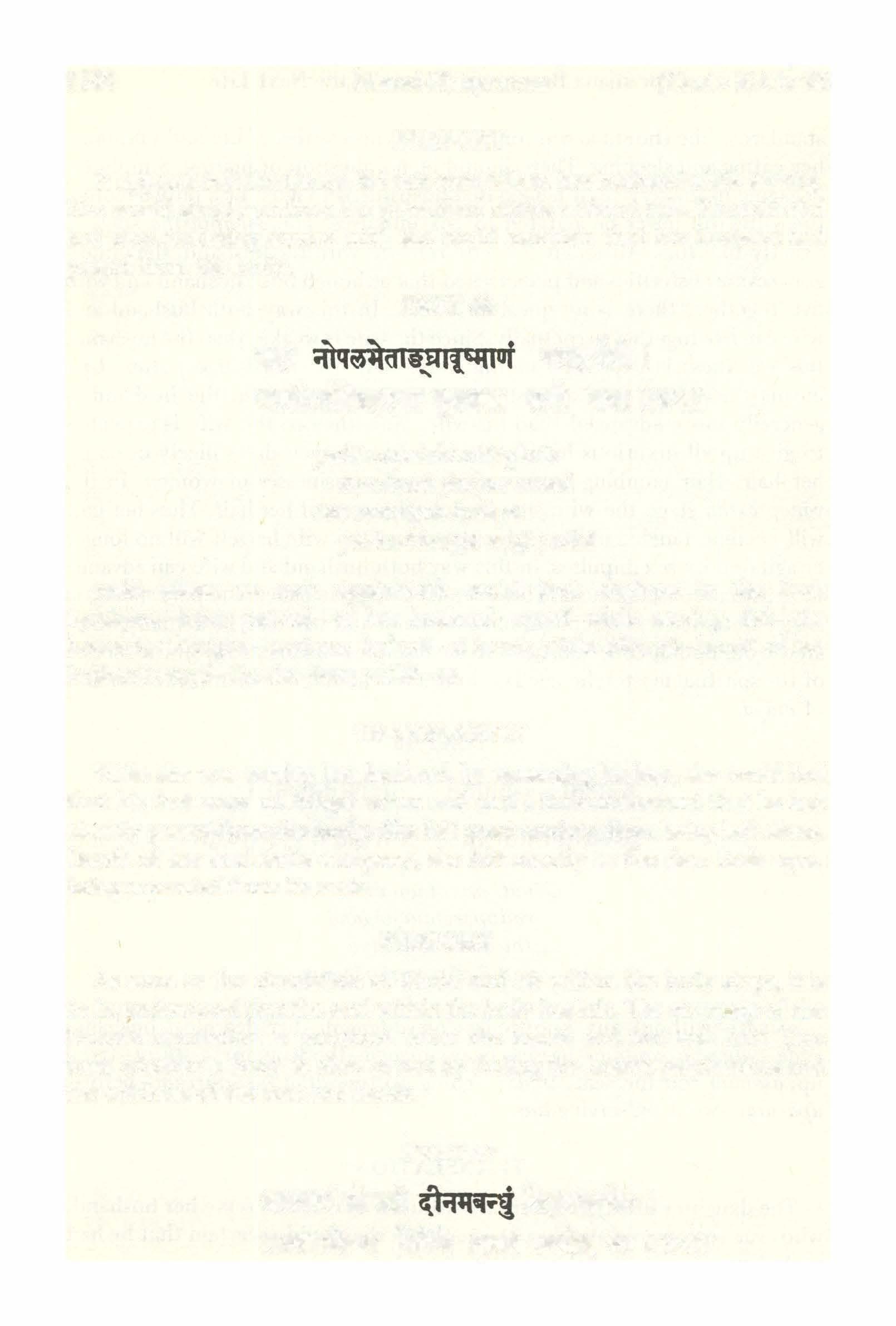
TRANSLATION
While she was serving her husband by massaging his legs, she could feel that his feet were no longer warm and could thus understand that he had already passed from the body. She felt great anxiety upon being left alone. Bereft of her husband's company, she felt exactly as the deer feels upon being separated from its mate.
PURPORT
As soon as the circulation of blood and air within the body stops, it is to be understood thatthe soulwithinthebodyhas left.The stoppage of the blood's circulation is perceived when the hands and feet lose heat. One tests whether a body is alive or not by feeling the heart's palpitations and the coldness of the feet and hands.
TEXT47
(6W11'41m+A4

1340 Srimad-Bhagavatam [Canto4, Ch. 28
q�._..t�
TEXT46 �
I
3(Rfu��� � � 11\ll\11
311�14� �: I
� � �� m ll\1\sll
iitmiinam socati dinam abandhum viklaviisrubhil,l. staniiv iisicya vipine susvaram praruroda sii
iitmiinam-about herself;socati-lamenting; dinam-wretched; abandhum -without a friend; viklava-brokenhearted; asrubh*-by tears; stanauher breasts; iisicya-wetting; vipine-in the forest; su-svaram- loudly ; praruroda- began to cry; sii-she.
TRANSLATION
Being now alone and a widow in that forest, the daughter of Vidarhha began to lament, incessantly shedding tears, which soaked her breasts, and crying very loudly.
PURPORT
Figuratively the Queen is supposed to he the disciple of the King; thus when the mortal body of the spiritual master expires, his disciples should cry exactly as the Queen cries when the King leaves his body. However, the disciple and spiritual master are never separated because the spiritual master always keeps company with the disciple as long as the disciple follows strictly the instructions of the spiritual master. This is called the association of vii�i (words). Physical presence is called vapul;t. As long as the spiritual master is physically present, the disciple should serve the physical body of the spiritual master, and when the spiritual master is no longer physicallyexisting, the disciple should serve the instructions of the spiritual master.
TEXT 48

i3M8\Rlg ui'i �"QRf'"-f�(<4�t� I
�: ��� .f« ll'd<=ll
utti�thotti�tha riijar�e
imiim udadhi-mekhalam dasyubhyal;t k�atra-bandhubhyo bibhyatim piitum arhasi
utti�tha-please get up; uttifitha- please get up; raja-r�e- 0 saintlyking; imam-this earth; udadhi-by the ocean ; mekhalam-surrounded ; dasyu-
Text 48) Puraiijana Becomes a Woman in the Next Life
1341
bhya{l- from the rogues; k.satra-bandhubhya{l-from the unclean kings; bibhyatim-very much afraid; patum- to protect; arhasi- you ought.
TRANSLATION
0 best of kings, please get up! Get up! Just see this world surrounded by water and infested with rogues and so-called kings. This world is very much afraid, and it is your duty to protect her.
PURPORT


Whenever an acarya comes, following the superior orders of the Supreme Personality of Godhead or His representative, he establishes the principles of religion, as enunciated in Bhagavad-gita. Religion means abiding by the orders of the Supreme Personality of Godhead. Religious principles begin from the time one surrenders to the Supreme Personality of Godhead. It is the acarya's duty to spread a bona fide religious system and induce everyone to bow down before the Supreme Lord. One executes the religious principles by rendering devotional service, specifically the nine items like hearing, chanting and remembering. Unfortunately, when the aciirya disappears, rogues and nondevotees take advantage and immediately begin to introduce unauthorized principles in the name of so-called sviimis, yogis, philanthropists, welfare workers and so on. Actually human life is meant for executing the orders of the Supreme Lord, and this is stated in Bhagavadgita:
man-mana bhava mad-bhakto mad-yajl: miim namaskuru miim eva4yasi yuktvaivam atmanam mat-paraya!'-a/;1.
"Engage your mind always in thinking of Me and become My devotee. Offer obeisances and worship Me. Being completely absorbed in Me, surely you will come to Me." (Bg. 9.34)
The main business of human society is to think of the Supreme Personality of Godhead at all times, to become His devotees, to worship the Supreme Lord and to bow down before Him. The acarya, the authorized representative of the Supreme Lord, establishes these principles, but when he disappears, things once again become disordered. The perfect disciples of the acarya try to relieve the situation by sincerely following the instructions of the spiritual master. At the present moment practically the entire world is afraid of rogues and nondevotees; therefore this Knt:!a
1342 Srimad-Bhagavatam [Canto 4, Ch. 28
consciousness movement is started to save the world from irreligious principles. Everyone should cooperate with this movement in ord r to bring about actual peace and happiness in the world.
TEXT49


�f4�q;:Jt ��1 �� �I qffin � ��� 11\1�11
evam vilapanti bala
vipine 'nugata patim
patita padayor bhartil rudaty asriir.ty avartayat
evam-thus; vilapanti- lamenting; biilii-the innocent woman; vipin -in the solitary forest; anugatii-strictly adherent; patim-unto her hus nd; patitii-fallen down; piidayory-at the feet; bhartury-of her husband; r dati -while crying; asriir.ti-tears; avartayat-she shed.
TRANSLATION
That most obedient wife thus fell down at the feet of her dead hus and and began to cry pitifully in that solitary forest. Thus the tears rolled wn from her eyes.
PURPORT
Just as a devoted wife becomes afflicted at the passing away o her husband, when a spiritual master passes away, thedisciple becomes sim arly bereaved.
TEXT 50
M�'ffl�ffictHf��:fh�O:H4( I
au�'lQ( 'ql�(lif R�qw:ffl �;ft� u�vu
citim darumayini citva
tasyam patyu/;l kalevaram
adipya canumaraiJe
vilapanti mano dadhe
citim-funeral pyre; diiru-mayim-made with wood; cituii- having iled up; tasyiim-on that; patyul),-of the husband; kalevaram-body; adiJ ya-
Text 50) Puranjana Becomes a Woman in the Next Life 1343
after igniting; ca-also; anumaral)e-to die along with him; vilapantilamenting; mana�- her mind;dadhe-fixed.


TRANSLATION
She then prepared a blazing fire with firewood and placed the dead body of her husband upon it. When this was finished, she lamented severely and prepared herself to perish in the fire with her husband.
PURPORT

It is the long-standing tradition of the Vedic system that a faithful wife diesalongwith her husband. This is called saha-maral)a. In India this system wasprevalenteven to the date ofBritish occupation. At that time, however, awifewhodidnotwish to die with herhusbandwas sometimes forced to do sobyher relatives. Formerlythatwasnotthecase.The wife usedto enterthe fire voluntarily. The British government stopped this practice, considering it inhuman. However, from the early history of India we find that when Maharaja PaQ.gu died, he was survived by two wives-Madri and Kunti. The question was whether both should die or one should die. After the death of Maharaja Pal).9,u, his wives settled that one should remain and the other should go. Madri would perish with her husband in the fire, and Kunti would remain to take charge of the five P��ava children. Even as late as 1936 we saw a devoted wife voluntarily enter the fire of her husband. This indicates that a devotee's wife must be prepared to act in such a way. Similarly, a devoted disciple of the spiritual master would rather die with thespiritual master than fail to execute the spiritual master's mission. As the Supreme Personality of Godhead comes down upon this earth to reestablish the principles of religion, so his representative, the spiritual master, also comes to reestablish religious principles. It is the duty of the disciples to take charge of the mission of the spiritual master and execute it properly. Otherwise the disciple should decide to die along with the spiritual master. In other words, to execute the will of the spiritual master, the disciple should be prepared to lay down his life and abandon all personal considerations.

1344 Srimad-Bhagavatam [Canto 4, Ch. 28
TEXT 51 �� �: �� ilmiiJ 3lt� I (11��'l�IDRHfl��� ����II
Becomes a Woman in the Next life
tatra purvataral], kascit
sakhii briihmaiJ-a iitmaviin
siintvayan valgunii siimnii
tiim iiha rudatim prabho
tatra-in that place; purvataralJ,- previous; kascit- someone; sa hiifriend; briihmaiJ-a/1.-a briihmaiJ-a; iitmaviin-very learned scholar; siintt yan -pacifying; valgunii-by very nice; siimnii-mitigating words; tiim unto her; iiha-he said; rudatim-while she was crying;prabho-my dear Ki g.

TRANSLATION
My dear King, one brahma�a, who was an old friend of King Pura came to that place and began to pacify the Queen with sweet words.
PURPORT
The appearance of an old friend in the form of a briihmara is very significant. In His Paramatma feature, Kr�J}.a is the old friend of ever one. According toVedic injunction, Kr�J}.a is sitting with the living entity si e by side. According to the sruti-mantra (dvii suparra sayujii sakh iiyii ),the Lord is sitting within the heart of every living entity as suhrt, the best f ·end. The Lord is always eager to have the living entity come home, ba k to Godhead. Sitting with the living entity as witness, the Lord gives h. all chances to enjoy himself materially, but whenever there is an opport nity, the Lord gives good counsel and advises the living entity to ab don trying to become happy through material adjustment and instead turn his face toward the Supreme Personality of Godhead and surr nder unto Him. When one becomes serious to follow the mission of the sp itual master, his resolution is tantamount to seeing the Supreme Personal y of Godhead. As explained before, this means meeting the Supreme Perso ality of Godhead in the instruction of the spiritual master. This is techn cally called viiT}i-seva. Srila ViSvanatha Cakravarti'fhakurastates in his Bh vadgttii commentary on theverse vyavasayatmikii buddhir ekeha kuru-na dana (Bg. 2.41) that one should serve the words of the spiritual master The disciple must stick to whatever the spiritual master orders. Simp by following on that line, one sees the Supreme Personality of Godhead.
The Supreme Personality of Godhead, Paramatma, appeared befo the Queen as a briihmar-a, but why didn't He appear in His original form s Sri Kr�J}.a? Srila Visvanatha CakravartiThlikura remarks that unless one i very highly elevated in loving the Supreme Personality of Godhead, one c nnot
Text 51)
Puranjana
345
see Him as He is. Nonetheless, if one sticks to the principles enunciated by the spiritual master, somehow or other he is in association with the Supreme Personality of Godhead. Since the Lord is in the heart, He can advise a sincere disciple from within. This is also confirmed in Bhagavad-gWi:
te�iim satata-yuktiiniim bhajatiim pn'"li-purvakam dadiimi buddhi-yogam tam yena miim upayiinti te
"To those who are constantly devoted and worship Me with love, I give the understanding by which they can come to Me." (Bg. 10.10)
In conclusion, if a disciple is very serious to execute the mission of the spiritual master, he immediately associates with the Supreme Personality of Godhead by vii[li or vapu�. This is the only secret of success in seeing the Supreme Personality of Godhead. Instead of being eager to see the Lord in some bush of Vrndavana while at the same time engaging in sense gratification, if one instead sticks to the principle of following the words of the spiritual master, he will see the Supreme Lord without difficulty. Srna Bilvamarigala Thakura has therefore said:

bhaktis tvayi sthiratarii bhagavan yadi syiid daivena na� phalati divya-kiSora-murt* mukti� svayarh mukulitiiiijali sevate 'smiin dharmiirtha-kiima-gataya� samaya-pratlk�ii�

"If I am engaged in devotional service unto You, my dear Lord, then very easily can I perceive Your presence everywhere. And as far as liberation is concerned, I think that liberation stands at my door with folded hands, waiting to serve me-and all material conveniences of dharma [religiosity] , artha [economic development] and kiima [sense gratification] stand with her." (Kmw-karr;u'imrta 107) If one is very highly advanced in devotional service, he will have no difficulty in seeing the Supreme Personality of Godhead. If one engages in the service of the spiritual master, he not only sees the Supreme Personality of Godhead but attains liberation. As far as material conveniences are concerned, they automatically come, just as the maidservants of a queen follow the queen wherever she goes. Liberation is no problem for the pure devotee, and all material conveniences are simply awaiting him at all stages of life.

1346 Srimad-Bhagavatam [Canto 4, Ch. 28
TEXT 52 ifflHUT � ����qp;f���l ii�Rlfu�� ��������II

brahmar:w uvtica

ka tvam kasyasi ko vtiyam
saytino yasya socasi
janasi kim sakhtiyam mam yentigre vicacartha ha
brahma{la/t uva ca- the learned brahma{la said; ka-who; tvam-you; kasya-whose; asi-are you; kal]-who; va-or; ayam-this man; sayanal;tlying down; yasya-for whom; socasi-you are lamenting;jtintisi kim-do you know; sakhiiyam-friend; mtim-Me; yena- with whom;agre-formerly; vicacartha-you consulted; ha-certainly.
TRANSLATION
The brahm�a inquired as follows: Who are you? Whose wife or daughter are you? Who is the man lying here? It appears you are lamenting for this dead body. Don't you recognize Me? I am your eternal friend. You may remember that many times in the past you have consulted Me.
PURPORT
When a person's relative dies, renunciation is automatically visible. Consultation with the Supersoul seated within everyone's heart is possible only when one is completelyfree from the contamination of material attachment. One who is sincere and pure gets an opportunity to consult with the Supreme Personality of Godhead in His Paramatma feature sitting within everyone's heart. The Paramatma is always the caitya-guru, the spiritual master within, and He comes before one externally as the instructor and initiator spiritual master. The Lord can reside within the heart, and He can also come out before a person and give him instructions. Thus the spiritual master is not different from the Supersoul sitting within the heart. An uncontaminated soul or living entity can get a chance to meet the Paramatma face to face. Just as one gets a chance to consult with the Paramatma within his heart, he also gets a chance to see Him actually situated before him.
Text 52] Puranjana
Becomes a Woman in the Next Life
Then one can take instructions from the Supersoul directly. This is the duty of the pure devotee: to see the bona fide spiritual master and consult with the Supersoul within the heart.
When the briihmarw asked the woman who the man lying on the floor was, she answered that he was her spiritual master and that she was perplexed about what to do in his absence. At such a time the Supersoul immediatelyappears,provided the devotee is purified in heart byfollowing the directions of the spiritual master. A sincere devotee who follows the instructions of the spiritual master certainly gets direct instructions from his heart from the Supersoul. Thus a sincere devotee is always helped directly or indirectly by the spiritual master and the Supersoul. This is confirmed in Caitanya-caritiimrta: guru-knl)a-prasiide piiya bhakti-latiibija. If the devoteeserves hisspiritual master sincerely,l<{�I)a automatically becomes pleased. Yasya prasadiid bhagavad-prasiida�. By satisfying the spiritual master, one automatically satisfies Kr�I)a. Thus the devotee becomes enriched by both the spiritual master and l<{�I)a. The Supersoul is eternally the friend of the living entity and always remains with him. The Supersoul has always been ready to help the living entity, even before the creation of this material world. It is therefore stated here: yenagre vicacartha. The word agre means "before the creation." Thus the Supersoul has been accompanying the living entity since before the creation.
TEXT 53



3fft � "qi€¥41'1+4�� �I
�+if�+if��'Rm�: ������
api smarasi ctitmiinam
avijiiiita-sakham sakhe
hitvti mtim padam anvicchan
bhauma-bhoga-rato gata�
api smarasi- do you remember; ca-also; iitmiinam-the Supersoul; avijiiiita-unknown; sakham-friend; sakhe-0 friend; hitvii- giving up; miim-Me; padam-position; anvicchan- desiring; bhauma- material; bhoga-enjoymen!; rata�-attached to; gata{l.-you became.
TRANSLATION
The brahmat:ta continued: My dear friend, even though you cannot immediately recognize Me, can't you remember that in the past you had a
1348 Srimad-Bhagavatam [Canto 4,Ch.28
very intimate friend? Unfortunately, you gave up My company and accepted a position as enjoyer of this material world.
PURPORT
As stated in Bhagavad-gitii:
icchii-dve§a-samutthena dvandva-mohena bhiirata sarva-bhiitiini sammoham sarge yiinti parantapa
"0 scion of Bharata [Arjuna], 0 conquerer of the foe, all living entities are born into delusion, overcome by the dualities of desire and hate." (Bg. 7.27)
This is an explanation of how the living entity falls down into this material world.In the spiritual world there is no duality, nor is there hate. The Supreme Personality of Godhead expands Himself into many. In order to enjoybliss more and more,the Supreme Lord expands Himself in different categories. As mentioned in the Variiha Puriir;w, He expands Himself in vi§T)U-tattva (the sviimsa expansion) and in His marginal potency (the vibhinniimsa, or the living entity). These expanded living entities are innumerable, just as the minute molecules of sunshine are innumerable expansions of the sun. The vibhinniimsa expansions, the marginal potencies of the Lord, are the living entities. When the living entities desire to enjoy themselves, they develop a consciousness of duality and come to hate the service of the Lord. In this way the living entities fall into the material world. In the Prema-vivarta it is said:

k[§T)a-bahirmukha hafiii bhoga-viificii kare nikata-stha miiyii tiire jiipatiyii dhare
The natural position of the living entity is to serve the Lord in a transcendental loving attitude. When the living entity wants to become Kr�l).a Himself or imitate Kr�l).a, he falls down into the material world. Since Kr�l).a is the Supreme Father, His affection for the living entity is eternal. When the living entity falls down into the material world, the Supreme Lord, through His sviimsa expansion (Paramatma), keeps company with the living entity. In this waythe living entity may some day return home, hack to Godhead.
By misusing his independence, the living entity falls down from the service of the Lord and takes a position in this material world as an enjoyer. That is to say, the living entity takes his position within a material body.
Text 53) Puraiijana Becomes a Woman in the Next Life 1349
Wanting to take a very exalted position, the living entity instead becomes entangled in a repetition of birth and death. He selects his position as a human being, a demigod, a cat, a dog, a tree, etc. In this way the living entityselects a body out of the 8,400,000 forms and tries to satisfyhimself by a variety of material enjoyment. The Supersoul, however, does not like him to do this. Consequentlythe Supersoul instructs him to surrender unto the Supreme Personality of Godhead. The Lord then takes charge of the living entity. But unless the living entity is uncontaminated by material desires, he cannot surrender to the Supreme Lord. In Bhagavad-gitii the Lord says:

bhoktiirarh yajria-tapasiirh
sarva-loka-mahesvaram
suhrdam sarva-bhiitiiniirh
jiiiitvii miirh siintim rcchati
"The sages, knowing Me as the ultimate purpose of all sacrificesand austerities, the Supreme Lord of all planets and demigods and the benefactor and well-wisher of all living entities, attain peace from the pangs of material miseries." (Bg. 5.29)
The Supreme Lord is the supreme friend of everyone; however, no one can take advantage of the supreme friend's instructions while making his own plans to become happy and entangling himself in the modes of material nature. When there is creation, the living entities take on different forms according to past desires. This means that all the species or forms of life are simultaneously created. Darwin's theory stating that no human being existed from the beginning but that humans evolved after many, many years is simply a nonsensical theory. From Vedic literature we find that the first creature within the universe is Lord Brahma. Being the most intelligent personality, Lord Brahma could take charge of creating all the variety found within this material world. TEXT
hamsiiv aham ca tvarh ciirya

sakhiiyau manasayanau


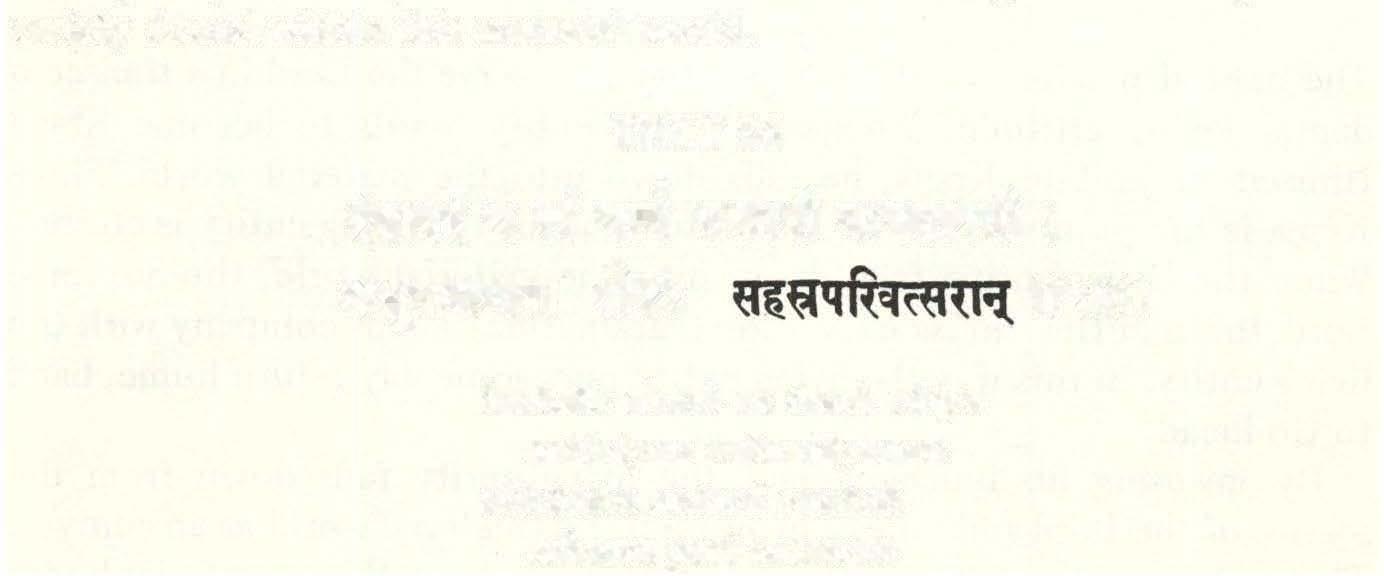
abhiitiim antarii vauka/:1
sahasra pari vatsariin

1350 Snmad-Bhagavatam [Canto 4, Ch. 28
t«Nt � � � ��¥fl0f('f14wf1 I �� en�: II�'JII
54
harhsau-two swans; aham-I; ca-and; tvam-you; ca-also; iirya-0 great soul; sakhayau-friends; manasayanau -together in the Manasa Lake; abhutiim-became; antarii-separated; vii-indeed; oka�-from the original home; sahasra- thousands; pari- successively; vatsaran-years.
TRANSLATION
My dear gentle friend, both you and I are exactly like two swans. We live together in the same heart, which is just like the Manasa lake. Although we have been living together for many thousands of years, we are still far away from our original home.
PURPORT
The original home of the living entity and the Supreme Personality of Godhead is the spiritual world. In the spiritual world both the Lord and the living entities live together very peacefully. Since the living entity remains engaged in the service of the Lord, they both share a blissful life in the spiritual world. However, when the living entity wants to enjoy himself, he falls down into the material world. Even while he is in that position, the Lord remains with him as the Supersoul, his intimate friend. Because of his forgetfulness, the living entity does not know that the Supreme Lord is accompanying him as the Supersoul. In this way the living entity remains conditioned in each and every millennium. Although the Lord follows him as a friend, the living entity, because of forgetful material existence, does not recognize Him.
TEXT 55

sa tvam vihiiya miim bandho
gato gramya-matir mahim
vicaran padam adriik�i1_t
kayiicin nirmitam striyii
sa�- that swan; tvam- yourself; vihaya-le aving; mam-Me; bandho-0 friend; gatafr.- went; griimya-material; mati�-whoseconsciousness; mahim -to earth; vicaran-traveling; padam-position; adriik§i/f-you saw; kayiicitby someone; nirmitam-manufactured; striyii-by a woman.
Text 55] Purarijana Becomes a Woman in the Next Ufe 1351
�
������
� �f«t���
!tl¥4t'4Rr�il'( I �q<(+ts(l�(:m"it��df�
My dear friend, you are now My very same friend. Since you left Me, You have become more and more materialistic, and, not seeing Me, you have been traveling in different forms throughout this material world, which was created by some woman.
PURPORT
When the living entity falls down, he goes into the material world, which was created by the external energy of the Lord. This external energy is described herein as "some woman," or prakrti. This material world is composed of material elements, ingredients supplied by the mahat-tattva, the total material energy. The material world, created by this external energy, becomes the so-called home of the conditioned soul. Within this material world the conditioned soul accepts different apartments or different bodily forms and then travels about. Sometimes he travels in the higher planetary systems and sometimes in the lower systems. Sometimes he travels in higher species of life and sometimes in lower species. He has been wandering within this material universe since time immemorial. As explained by
Sri Caitanya Mahaprabhu:
brahmii1Jpa bhramite kona bhiigyaviin ]iva guru-knJJa-prasade piiya bhakti-latii-bija
(Cc. Madhya 19.151)

The living entity wanders into many species of life, but he is fortunate when he once again meets his friend, either in person or through His representative.
Actually, it is Kr��Ja who personally advises all living entities to return home, back to Godhead. Sometimes Kr�r:ta sends His representative, who, delivering Kr��Ja's very message, canvasses all living entities to return home, back to Godhead. Unfortunately the living entity is so greatly attached to material enjoyment that he does not take the instructions of Kr��Ja or His representative very seriously. This material tendency is mentioned in this verse as griimya-matil;t (sense gratification). The word mahim means "within this material world." All living entities within this material world are sensually inclined. Consequently they become entangled in different types of bodies and suffer the pangs of material existence.
TEXT


1352 Srimad-Bhagavatam [Canto 4, Ch. 28
TRANSLATION
56 q�� ;m:H:ififNI� ��I �� q�� q�fu �liH(������
Text 57) Puraiijana Becomes a Woman in the Next Life
paficiiriimam nava-dviiram
eka-piilam tri-ko�thakam
§af-kulam pafica-vipa1Jam
pafica-prak.rti stn-dhavam
pafica-iiriimam- five gardens; nava-dviiram- nine gates; eka- one; piilamprotector; tri-three; ko�thakam-apartments; �at-six; kulam-families; parica-five; vipapam- stores; pafica- five; prakrti- material elements; striwoman; dhavam-master.
TRANSLATION
In that city [the material bodyJ there are five gardens, nine gates, one protector, three apartments, six families,five stores,five material elements, and one woman who is lord of the house.
TEXT 57

3tRlll1 m: srtiJfl WR
paficendriyiirthii iiriimii
dviira� prii1Jii nava prabho
tejo-'banniini ko.s.thiini
kulam indriya-sangraha�
pafi.ca-five; indriya-arthii�- sense objects; iiriimii�-the gardens; dviira�gates; prii1Jiift-apertures of the senses; nava-nine; prabho-0 King; teja�ap- fire, water; anniini-food grains or earth; ko§fhiini- apartments ; kulam -families; indriya-sangrahaft-five senses and the mind.
TRANSLATION
My dear friend, the five gardens are the five objects of sense enjoyment, and the protector is the life air, which passes through the nine gates. The three apartments are the chief ingredients-fire, water, and earth. The six families are the aggregate total of the mind and five senses.
PURPORT
The five senses that acquire knowledge are sight, taste, smell, sound and touch, and these act through the nine gates-the two eyes, two ears, one
1353
q��
!Pit
�s;r� itm �tf{��m:: ������
I
mouth, two nostrils, one genital and one rectum. These holes are compared to gates in the walls of the city. The principal ingredients are earth, water and fire, and the principal actor is the mind, which is controlled by the intelligence (buddhi).
TEXT 58

vipa�Jas tu kriya-saktir
bhuta-prakrtir avyaya sakty-adhiSa}J pumams tv atra pravi§to navabudhyate
viparwft-stores;tu-then;kriyii-sakti{l-the energy for activities, or the working senses; bhUta-the five gross elements; prakrti{l-the material elements;avyaya-eternal;sakti-the energy;adhiSa{l-controller;pumanman;tu-then;atra-here;pravi.s.ta{l-entered;na-does not;avabudhyatebecome subjected to knowledge.
TRANSLATION
The five stores are the five working sensory organs. They transact their business through the combined forces of the five elements, which are eternal. Behind all this activity is the soul. The soul is a person and an enjoyer in reality. However, because he is now hidden within the city of the body, he is devoid of knowledge.
PURPORT
The living entity enters the material creation with the aid of the five elements-earth, water, fire, air and ether-and thus his body is formed. Although the living entity is working from within, he is nonetheless unknown. The living entity enters the material creation, but because he is bewildered by the material energy, he appears to be hidden. The bodily conception of life is prominent because of ignorance (navabudhyate). Intelligence is described in the feminine gender, but owing to her prominencein all activities,she is described inthis verse as adhiSa�, the controller. The living entity lives by means of fire, water and foodgrain. It is through the combination of these three that the body is maintained. Consequently the body is called prakrti, material creation. All the elements gradually
1354 Srimad-Bhagavatam [Canto 4, Ch. 28
Nqo1� fsf;��asttf6(044411 1
�:�� !lftit wtl€1�� 11�(;11
combine to form flesh, bone, blood and so on. All these appear as various apartments. It is said in the Vedas that the digested foods are ultimately divided into three. The solid portion becomes stool, and the semi-liquid portionturns into flesh. The liquid portionturns yellow and is againdivided into three. One of these liquid portions is called urine. Similarly, the fiery portion is divided into three, and one is called bone. Out of the five elements, fire, water and foodgrains are very important. These three are mentioned in the previous verse, whereas sky (ether) and air are not mentioned. This is all explained in Bhagavad-gitii:
prakrtirh puru�arh caiva
viddhy aniidiubhav api
vikararhi ca gurtarhi caiva viddhi prakrti-sambhavan
"Material nature and the living entities should be understood to be beginningless. Their transformations and the modes of matter are products of material nature." (Bg. 13.20)
Prakrti, material nature, and puru�a, the living entity, are eternal. When they both comein contact, thereare differentreactions and manifestations. All of them should be considered the results of the interaction of the three modes of material nature.
TEXT 59

mm�
uq;;nm)�)Sl(6\ftf<t: I
m('t'fla,'hAn31ltft�qrft�ijl3ill1 ������
tasminis tvarn riimayii spr�to ramamiiiJO 'sruta-smrti�
tat-saTigiid idrsfrh priipto dasiini piipiyasirh prabho
tasmin-in that situation; tvam-you; riimayii-with the woman; spntal;t -being in contact; ramamiirtafl-enjoying; a-sruta-smrt*-without remembrance of spiritual existence; tat-with her; sangat-by association; tdrs'im -like this; priiptal;t-you have attained; dasiim-a state; piipiyasim-full of sinful activities; prabho-my dear friend.
Text 59) Puraiijana Becomes a Woman in the Next Life 1355
TRANSLATION
My dear friend, when you enter such a body along with the woman of material desires, you become overly absorbed in sense enjoyment. Because of this, you have forgotten your spiritual life. Due to your material conceptions, you are placed in various miserable conditions.
PURPORT
When a person becomes materially engrossed, he has no capacity to hear about spiritual existence. Forgetfulness of spiritual existence entangles a man more and more m material existence. Such is the result of sinful life. Various bodies are developed with the material ingredients because of different types of sinful activities. King Puraiijana assumed the body of a woman, Vaidarbhi, as a result of his sinful activities. Bhagavad-gttii clearly says (striyo vaisyiis tathii sudrii�) that such a body is lowborn. If one takes shelter of the Supreme Personality of Godhead, however, he can be elevated to the highest perfection, even thoughhe be lowborn. One acquires lower births when one's spiritual intelligence is reduced.
TEXT 60




na tvam vidarbha-duhitii
niiyam vira� suhrt tava
na patis tvam puraiijanyii
ruddho nava-mukhe yayii
na- not; tvam- you; vidarbha-duhitii- daughter of Vidarbha; na-not; ayam- this; virafl-hero; su-hrt-well-wishing husband; tava-your; na-not; pati�- husband; tvam-you; puraiijanyii�- of Purafijani; ruddha�- captured; nava-mukhe-in the body having nine gates; yayii-by the material energy.
TRANSLATION
Actually, you are not the daughter of Vidarbha, nor is this man, Malayadhvaja, your well-wishing husband. Nor were you the actual husband of Puraiijani. You were simply captivated in this body of nine gates.
1356 Srimad-Bhagavatam [Canto 4, Ch. 28
;r �� fcf� ;wi �:�I ;r qf� �U,W041 � ;rq@ � II� o II
In the material world many living entities come into contact with one another, and, increasing their attachment to a particular type of body, become related as father, husband, mother, wife, etc. Actually every living entity is a separate individual being, and it is because of his contact with matter that he comes together with other bodies and becomes falsely related. False bodies create various associations in the name of family, community, society and nationality. Actually every living entity is part and parcel of the Supreme Personality of Godhead, but the living entities are overly engrossed in the material body. The Supreme Personality of Godhead, K.r�l).a, appears and gives instructions in the form of Bhagavadgitii and Vedic literatures. The Supreme Lord gives these instructions because He is the eternal friend of the living entities. His instructions are important because by them the living entity can obtain liberation from bodily engagement. As water passes down a river, many straws and grasses are carried from the shore. These straws and grasses come together in the river's current, but when the waves toss this way and that, they are separated and carried somewhere else. Similarly, the innumerable living entities within this material world are being carried by the waves of material nature. Sometimes the waves bring them together, and they form friendships and relate to one another on a bodily basis of family, community or nationality. Eventually they are thrown out of association by the waves of material nature. This process has been going on since the creation of material nature. In this regard, Srila Bhaktivinoda Thakura smgs,
(miche) miiyiira vase, yiiccha bhese', khiiccha hiibut)ubu, bhiii
(jiva) kr�TJa-diisa, e viSviisa, karle ta' iira du�kha niii
"My dear living entities, you are being carried away by the waves of material nature. Sometimes you are on the surface, sometimes you are being drowned. In this way your eternal life is being spoiled. If you simply catch hold of K:gu;ta and take shelter of His lotus feet, you will once again get free from all the miserable material conditions."
In this verse the words suhrt (well-wisher) and tava (your) are very significant. One's so-called husband, relative, son, father, or whatever can not actually be a well-wisher. The only actual well-wisher is K.r�t:ta Himself, as Kr�t:ta confirms in Bhagavad-gitii: suhrdam sarva-bhiitiiniim (Bg. 5.29).

Text 60] Puranjana Becomes a Woman in the Next Life 1357
PURPORT
Society, friendship, love and well-wishers are all simply results of being packed in different bodies. One should know this well and try to get out of this bodily encagement into which one is thrown birth after birth. One should take shelter of the Supreme Personality of Godhead, K{�l).a, and return home, back to Godhead.
TEXT 61




maya hy e§a maya mta yat pumamsarh striyam satim manyase nobhayam yad vai hamsau pa.Syavayor gatim
maya-illusory energy; hi-certainly; e§a-this; maya-by Me; s��tacreated; yat-from which; pumamsam-a male; striyam-a female; satimchaste; manyase-you think; na-not; ubhayam- both; yat-because; vaicertainly; hamsau-freed from material contamination; pasya-just see; avayo�-our; gatim-factual position.
TRANSLATION
Sometimes you think yourself a man, sometimes a chaste woman, and sometimes a neutral eunuch. This is all because of the body, which is created by the illusory energy. This illusory energy is My potency, and actually both of us-you and 1-are pure spiritual identities. Now just try to understand this. I am trying to explain our factual position.
PURPORT
The factual position of both the Supreme Personality of Godhead and the living entity is qualitatively one. The Supreme Lord is the Supreme Spirit, the Supersoul, and the living entity is the individual spiritual soul. Even though both of them are original spiritual identities, the living entity forgets his identity when he comes in contact with material nature and becomes conditioned. At such a time he identifies himself as a product of the material nature. Because of the material body, he forgets that he is the eternal (sanatana) part and parcel of the Supreme Personality of Godhead.
1358 Srimad-Bhagavatam [Canto 4, Ch. 28
��"'���Rt��l
��d M tmm�u�tu
This isconfirmed in this way: mamaivamso ]iva-lokefiva-bhuta� sanatana�. The word sanatana is found in several places in Bhagavad-gita. Both the Lord and the living entity are sanatana (eternal), and there is also a place known as sanatana beyond this material nature. The real residence of both the living entity and God is the domain of sanatana, not this material world. The material world is the temporary external energy of the Lord, and the living entity is placed in this material world because he wanted to imitate the position of the Supreme Personality of Godhead. In this material world he tries to enjoy his senses to his best capacity. All the activities ofthe conditioned soul within this material world are perpetually takingplace indifferent typesof bodies,hutwhen the living entityacquires developed consciousness, he should try to rectify his situation and again become a member of the spiritual world. The process by which one can return home, back to Godhead, is bhakti-yoga, sometimes called sanatanadharma. Instead of accepting a temporary occupational duty based on the material body, one should take to the process of sanatana-dharma, or bhakti-yoga, so that he can put an end to this perpetual bondage in material bodies and once again return home, back to Godhead. As long as human society works on the basis of false material identification, all the so-called advancements of science and philosophy are simply useless. They only serve to mislead human society. Andha yathandhair upaniyamana�. In the material world, the blind simply lead the blind.
TEXT 62

31{�"\!41;:tt���ft"\!4�
lit:I
WI wn q�f.:ij+4�fasi iil1{i '4wtl•lfffII��II
aham bhavan na canyas tvam tvam evaham vicak�va bho/;1. na nau pasyanti kavayas chidramjatu manag api
aham-I; bhaviin- you; na-not; ca-also ; anya�-different;tvam-you; tvam-you; eva-certainly; aham-as I am; vicak�va-just observe; bho�My dear friend; na- not; nau- of us; pasyanti- do observe; kavaya�learned scholars; chidram-faulty differentiation;jiitu-at any time; manak -in a small degree; api-even.
Text 62) Puraiijana Becomes a Woman in the Next Life 1359
My dear friend, I, the Supersoul, and you, the individual soul, are not different in quality, for we are both spiritual. In fact, My dear friend, you are qualitatively not different from Me in your constitutional position. Just try to consider this subject. Those who are actually advanced scholars, who are in knowledge, do not find any qualitative difference between you and Me.
PURPORT
Both the Supreme Personality of Godhead and the living entity are qualitatively one. There is no factual difference between the two. The Mayavii.di philosophers are again and again defeated by the illusory energy because they think that there is no separation between the Supersoul and the individual soul or that there is no Supersoul. They are also misled in thinking that everything is the Supersoul. However, those who are kavaya�, learnedscholars,actuallyknow the facts. They do not commit such mistakes. They know that God and the individual soul are one in quality, but that the individual soul falls under the clutches of miiyii, whereas the Supersoul, the Supreme Personality of Godhead, is the controller of miiyii. Miiyii is the creation of the Supreme Lord (maya sr§tii); therefore the Supreme Lord is the controller of miiyii. Although one in quality with the Supreme Lord, the individual soul is under the control of miiyii. Mayii.vii.di philosophers cannot distinguish between the controller and the controlled.
TEXT 63




�if�qF(�: I ��
� �
�..(l(+(lq�: 11��11
yathii puru�a iitmiinam ekam iidarsa-cak�u�o�
dvidhiibhiitam avek�eta
tathaiviintaram iivayolJ
yatha-as; puru§a�-the living entity; iitmiinam-his body; ekam- one; iidarsa-in a mirror; cak§U§O �-by the eyes; dvidhii-O.bhUtam-existing as two; avek§eta-sees; tatha-similarly; eva-certainly; antaram-difference; iivayo�- between ourselves.
1360 Srimad-Bhagavatam [Canto 4, Ch. 28
TRANSLATION
TRANSLATION

As a person sees the reflection of his body in a mirror to be one with himself and not different, whereas others actually see two bodies, so in our material condition, in which the living being is affected and yet not affected, there is a difference between God and the living entity.
PURPORT
Being affected by the conditioning of matter, Miiyiiviidi philosophers cannot see the difference between the Supreme Lord and the living entity. When the sun is reflected in a pot of water, the sun knows that thhe is no difference between him and the reflected sun in the water. Those in ignorance, however, perceive that there are many small suns reflected in each and every pot. As far as the brilliance is concerned, there is brilliance both in the original sun and in the reflections, but the reflections are small, whereas the original sun is very large. Vai�Qava philosophers conclude that theliving entity issimply asmall sample of the original Supreme Personality of Godhead. Qualitatively, God and the living entities are one, but quanti· tatively the living entities are small fragments of the Supreme Personality of Godhead. The Supreme Lord is full, powerful and opulent. In the previousverse,the Lordsays,"Mydear friend, you and I are not different." This nondifference refers to qualitative oneness, for it was not necessary for the Paramiitmii, the Supreme Personality, to remind the conditioned soul that he is not one in quantity. The self-realized soul never thinks that he and the Supreme Personality of Godhead are one in every respect. Although he and the Supreme Personality of Godhead are one in quality, the living entity is prone to forget his spiritual identity, whereas the Supreme Personality never forgets. This is the difference between lipta and alipta. The Supreme Personality of Godhead is eternally alipta, uncontaminated by the external energy. The conditioned soul, however, being in contact with material nature, forgets his real identity; therefore when he sees himself in the conditioned state, he identifies himself with the body. For the Supreme Personality of Godhead, however, there is no difference between the body and the soul. He is completely soul; He has no material body. Although the Supersoul,Paramatma, and the individual soul are both within the body, the Supersoul is devoid of designation, whereas the conditioned soul is designated by his particular type of body. The Supersoul is called antaryiimt, and He is extensive. This is confirmed in Bhagavad-gitii:
Text 63] Puranjana Becomes a Woman in the Next Life 1361
k�etrajfiam capi mam viddhi sarva-k§etre§u bharata
k§etra-k�etrajfiayor jfianam

yat taj jnanam matam mama
"0 scion of Bharata, you should understand that I am also the knower in all bodies, and to understand this body and its owner is called knowledge. That is My opinion." (Bg.l3.3)
The Supersoul is present in everyone's body, whereas the individual soul is conditioned in one particular type of body. The individual soul cannot understand what is taking place in another's body, but the Supersoul knows very well what is happening in all bodies. In other words, the Supersoul is always present in His full spiritual position, whereas the individual soul is prone to forget himself. Nor is the individual soul present everywhere. Generally in his conditioned state the individual soul cannot understand his relationship with the Supersoul, but sometimes, whenheisfreefromall conditional existence, he can see the real difference between the Supersoul and himself. When the Supersoul tells the conditioned soul, "You and I are one and the same," it is to remind the conditioned soul of his spiritual identity as being qualitatively one. In the Third Canto of Srimad-Bhagavatam, it is said:
yatholmukad visphulingad dhumad vapi sva-sambhavat apy atmatvenabhimatad yathagn* prthag ulmukat (Bhag. 3.28.40)

Fire has different features. Th�re is flame, the sparks and the smoke. Although these are one in quality, there is still a difference between the fire, the flame, the spark and the smoke. The living entity becomes conditioned, but the Supreme Personality of Godhead is different because He does not become conditioned at any point. In the Vedas it is stated: iitmii tathii prthag dra§ta bhagaviin brahma-samjfiital].. Atmii is the individual soul as well as the Supreme Personality of Godhead, who is the seer of everything. Although both are spirit, still there is always a difference. In the smrti it is also said: yathiignefl k�udrii visphulingii vyuccaranti. Just as sparks manifest in a large fire, similarly the small individual souls are present in the big spiritual flame. In Bhagavad-gUii Lord 1\.r�J).a says:

1362 Srimad-Bhagavatam
[Canto 4, Ch. 28
Text 64] Puranjana Becomes a Woman in the Next Life
mayii tatam idani sarvarh jagad avyakta-murtinii mat-sthiini sarva-bhutiini na ciiharh te�v avasthital}.
"By Me, in My unmanifested form, this entire universe is pervaded. All beings are in Me, but I am not in them." (Bg. 9.4)
Although all living entities are resting in Him, as small fiery sparks rest on a large flame, both are differently situated. Similarly, in the Vi�TJ-U PuriiTJ-a it is said:
eka-desa-sthitasyiigner jyotsnii vistariTJ-i yatha parasya brahmaTJ-a� saktis tathedam akhilarh jagat
"Fire is situated in one place, but it distributes heat and light. Similarly, the Supreme Personality of Godhead is distributing His energies in different ways." The living entity is but one of these energies (marginal energy). The energy and the energetic are one in one sense, but they are differently situated as energy and the energetic. Similarly, the sac-cid-iinanda form confirmed in Brahma-sarhhitii (isvara� paramal}. kr�TJ-aiJ. sac-cid-anandavigraha�) is different from that of the living entity in both his conditioned and liberated states. Only atheists consider the living entity and the Personality of Godhead equal in all respects. Caitanya Mahaprabhu therefore says, mayiiviidi-bhii�ya sunile haya sarva-nasa. "If one follows the instructions of Mayavadi philosophers and believes that the Supreme Personality of Godhead and the individual soul are one, his understanding of real philosophy is forever doomed."
TEXT 64
evarh sa miinaso harhso harhsena pratibodhital), sva-sthas tad-vyabhiciirel)a na�tiim iipa punal}. sm_rtim

1363
I ���lRJ�
l{�:�f�l�'dll
� « lfA«f � m SIMillN�r:
tmlfl
evam-thus; sa�-he (the individual soul); manasa�-living together within the heart; hamsa�-like the swan; hamsena-by the other swan; pratibodhita�-being instructed; sva-stha�-situated in self-realization; tatvyabhiciirer_ta-by being separated from the Supersoul; na§tam- which was lost;iipa-gained; puna�- again; smrti m-real memory.
TRANSLATION
In this way both swans live together in the heart. When the one swan is instructed by the other, he is situated in his constitutional position. This means he regains his original Kr�I;ta consciousness, which was lost because of his material attraction.
PURPORT

Here it is clearly stated: hamso hamsena pratibodhital].. The individual soul and the Supersoul are both compared to swans (hamsa) because they are white or uncontaminated. One swan, however, is superior and is the instructor of the other. When the inferior swan is separated from the other swan, he is attracted to material enjoyment. This is the cause of his falldown. When hehears the instructions of the other swan, he understands his real position and is again revived to his original consciousness. The Supreme Personality of Godhead, Kreyl}a, comes down (avatiira) to deliver His devotees and kill the demons. He also gives His sublime instructions in the form of Bhagavad-gitii. The individual soul has to understand his position by the grace of the Lord and the spiritual master because the text of Bhagavadgitii cannot be understood simply by academic qualifications. One has to learn Bhagavad-gitii from a realized soul.
tad viddhi pra7J-ipiitena pariprasnena sevayii upadek�yanti te jfiiinam jliiininas tattva-darsinal].
"Just try to learn the truth by approaching a spiritual master. Inquire from him submissively and render service unto him. The self-realized soul can impart knowledge unto you because he has seen the truth." (Bg. 4.34)
Thus one has to select a bona fide spiritual master and become enlightened to his original consciousness. In this way the individual soul can understand that he is always subordinate to the Supersoul. As soon as he declines to remain subordinate and tries to become an enjoyer, he begins
1364 Srimad-Bhagavatam [Canto 4, Ch. 28
his material conditioning. When he abandons this spirit of being an individual owner or enjoyer,he becomes situated inhis liberated state. The word sva-sthalf, meaning "situated in one's original position," is very significant in this verse. When one gives up his unwanted attitude of superiority, he becomes situated in his original position. The word tad-vyabhiciirerJ-a is also significant, for it indicates that when one is separated from God due to disobedience, his real sense is lost. Again, by the grace of l(r�qa and guru, he can be properly situated in his liberated position. These verses are spoken by Srila Narada Muni, and his purpose in speaking them is to revive our consciousness. Although the living entity and the Supersoul are one in quality, the individual soul has to pursue the instruction of the Supersoul. That is the state of liberation.
TEXT 65

barhi�mann etad adhyiitmam piirok�yer:w pradarsitam yat parok�a-priyo devo bhagaviin visva-bhiivanal,t
barhi§man-0 King Pracinabarhi; etat- this; adhyiitmam- narration of self-realization; piirok§yer;w- indirectly ; pradarsitam- instructed; yatbecause; parok§a-priya�-interesting by indirect description; deva�-the Supreme Lord; bhagaviin-Personality of Godhead; visva-bhiivana�-the cause of all causes.
TRANSLATION
My dear King Pracinabarhi, the Supreme Personality of Godhead, the cause of all causes, is celebrated to be known indirectly. Thus I have described the story of Puranjana to you. Actually it is an instruction for self-realization.
PURPORT
There are many similar stories in the Puriil}as for self-realization. As stated in the Vedas: parok�a-priyii iva hi deviilf. There are many stories in the PuriirJ-as that are intended to interest ordinary men in transcendental subjects, but actually these refer to real facts. They are not to be considered
Text 65] Purattj ana Becomes a Woman in the Next Life 1365
'I���� �� Sl<diRt'(I ��wit � �R'Ef�l�wt:
II��II
stories without a transcendental purpose. Some of them refer to real historical facts. One should be interested, however, in the real purport of the story. Indirect instructipn is quickly understandable for a common man. Factually the path of bhakti-yoga is the path of hearing directly about the pastimes of the Supreme Personality of Godhead (sravary,arit kirtanarit vi§IJO� ), but those who are not interested in hearing directly about the activities of the Lord, or who cannot understand them, can very effectively hear such stories and fables like this one narrated by Narada Muni.
Thefollowing is a glossary of some of theimportant words in this chapter.


Adesakiiri. The actions resulting from sinful activities.
Agastya. The mind.
Amatya. The governor of the senses, the mind. Arbuda-arbuda. Various types of sravara and kirtana of the Supreme Lord's name, quality, form and so on. Ari. Impediments like disease.
Bhoga. Enjoyment. Herein this word refers to real enjoyment in spiritual life.
Bhrtya. The servants of the body, namely the senses.
Dravipa-raja. Devotional service or a person eligible to act in devotional service.
Dviira. The doors of the body, such as the eyes and ears.
Grha. Home. For spiritual cultivation one requires an undisturbed place or the good association of devotees.
Idhmaviiha. The devotee who approaches the spiritual master. Idhma refers to wood that is taken to burn as fuel for a fire. A brahmacari is supposed to take this idhma to ignite the fire used in performing sacrifices. By spiritual instruction a brahmacari is trained to ignite a fire and offer oblations in the morning. He is supposed to go to the spiritual master to take lessons on transcendental subject matter, and the Vedic injunction is that when approaching the spiritual master one must carry
1366 Srimad-Bhagavatam [Canto 4, Ch. 28
withhim fuelto perform yajfias, or sacrifices. The exact Vedic injunction is as follows:
tad-vijfiiinartharhsagurumevabhigacchet samit-par-* srotriyarhbrahma-n�.tham

"To learn transcendental subject matter, one must approachthe spiritual master. Indoing so, he should carryfuel to bum in sacrifice.The symptom of such a spiritual master is that he is expert in understanding the Vedic conclusion and therefore he constantly engages in the service of the Supreme Personality of Godhead." (Mur,P.aka Upan�ad 1.2.12) By serving such a bona fide spiritual master, gradually a conditioned soul becomes detached from material enjoyment and invariably makes prog· ress in spiritual realization under the direction of the spiritual master. Those who are misled by the illusory energy are never interested in approaching a spiritual master to make life successful.
Jaya. Intelligence. ]trr-a-sarpa. The fatigued air of life.
Kalakanya. The invalidity of old age. Kama. A high fever. Kulacala. The place where there is no disturbance. Ku.tumbint. Intelligence.
Madirek.sar-a. Madirek.sar-a refers to one whose eyes are so attractive that one who observes them becomes maddened by her. In other words, madirek.sar-a means a very beautiful young girl. According to Jiva Gosvami, madirek.sar-a means thepersonifieddeity of bhakti. If one is attracted by the bhakti cult, he becomes engaged in the service of the Lord and the spiritual master, and thus his life becomes successful. Vaidarbhi, the woman, became a follower of her husband. As she left her comfortable home forthe service of her husband, so a serious student of spiritual understanding must give up everything for the service of the spiritual master. As stated by Visvanatha Cakravarti 'fhakura, yasya prasadiid bhagavat-prasada�: if one wants actual success in life, he must strictly follow the instructions of the spiritual master.By following such instructions, one is sure to make rapid progress in spiritual life. This statement by ViSvanatha Cakravarti is in pursuance of the following injunction from the Svetasvatara Upan�ad:
Purarijana Becomes a Woman in the Next Life 1367
Srimad-Bhagavatam
yasya devepara bhaktir
yatha deve tathtigurau

tasyaite kathita hyarthtifl
praka§ante mahtitmanafl


"Only unto those great souls who have implicit faith in both the Lord and the spiritual master are all the imports of Vedic knowledge automatically revealed." ($vet. Up. 6.23) In the Chtindogya Upaniflad it is said, acaryavan puru.so veda: "One who approaches a bona fide spiritual master can understand everything about spiritual realization."
Malayadhvaja. A nice devotee who is like sandalwood.
Pancala. The five sense objects.
Paricchada. The total aggregate of the senses.

Paura-jana. The seven elements that constitute the body.
Pautra. Patience and gravity.
Prajvara. A kind of fever called viflr-u-jvara.
Pratikriya. Counteracting agents such as mantras and medicines.

Pura-piilaka. The life air.
Putra. Consciousness.
Sainika. The condition of threefold miseries.
Sapta-suta. The seven sons, namely hearing, chanting, remembering, offering prayers, serving the lotus feet of the Lord, worshiping the Deity, and becoming a servant of the Lord.
Sauhrdya. Endeavor.
Suta. The son of Vaidarbhi, or, in other words, one who is somewhat advanced in fruitive activities and who comes in contact with a devotee spiritual master. Such a person becomes interested in the subject matter of devotional service.
Vaidarbht The woman who wasformerly a man buttook birth as a woman in his next life because of too much attachment to woman. Darbha means kusa grass. In fruitive activities, or karma-kar-fliya ceremonies, one requires kusa grass. Thus vaidarbhi refers to one who takes birth in a family of karma-kiirtfliya understanding. However, if by karma-kiirtfla activities one by chance comes in contact with a devotee, as Vaidarbhi did when she married Malayadhvaja, his life becomes successful. He then pursues the devotional service of the Lord. The con-
1368
[Canto 4, Ch. 28
ditioned soul becomes liberated simply by following the instructions of the bona fide spiritual master.
Vidarbha-rajasimha. The best of persons who are expert in fruitive activities.
Virya. One who has mercy.
Yavana. The servant of Yamaraja.
Thus end the Bhaktivedanta purports of the Fourth Canto, Twentyeighth Chapter, of the Srimad-Bhagavatam, entitled ''Puraiijana Becomes a Woman in the Next Life."

Puranjana Becomes a Woman in the Next Life 1369
priicinabarhir
bhagavarhs te vaco 'smiibhir na samyag avagamyate kavayas tad vijiinanti na vayarh karma-mohitiifl
priicinabarhifl uviica-King Pracinabarhi said; bhagavan-0 my lord; teyour; vaca[l - words; asmiibhifl-by us; na-never; samyak-perfectly; avagamyate-are understood; kavayafl-those who are expert; tat-that; vijiinanti-can understand; na-never; vayam-we; karma-by fruitive activities; mohitiifl-enchanted.
TRANSLATION
King Pracinabarhi replied: My dear lord, we could not appreciate completely the purport of your allegorical story of King Puraiijana. Actually those who are perfect in spiritual knowledge can understand, but for us, who are overly attached to fruitive activities, to realize the purpose of your story is very difficult.

PURPORT
In Bhagavad-gitii Lord Kw).a says:
tribhir gurwmayair bhiivair
ebhifl sarvam idam jagat
1371
TEXT 1 W"i/trt¢�ft� 11�ij �SWIM� ('(440141�41¥=4� I 4W4«tf§:��ij WI � ih�+tlWtt: II � II
CHAPTER TWENTY-NINE TalksBetweenNarada andKing PracTnabarhi
uviica
mohitarh nabhijanati
mam ebhya� param avyayam
"Deluded by the three modes [goodness, passion and ignorance], the whole world does not know Me, who am above the modes and inexhaustible."
(Bg. 7.13)
Generally people are enchanted by the three modes of material nature and therefore practically unable to understand that behind all materialistic activities in the cosmic manifestation is the Supreme Personality of Godhead, Kr�qa. Generally when people are engaged in sinful or pious activities, they are not perfect in knowledge of devotional service. The allegorical story narrated by Narada Muni to King Barhi�manis especially meant to engage conditioned souls in devotional service. The entire story, narrated allegorically, is easily understood by a person in devotional service, but those who are engaged not in devotional service but in sense gratification cannot perfectly understand it. That is admitted by King Barhipman.
This Twenty-ninth Chapter describes that by too much attachment for women onebecomes a woman in the next life, but a person who associates with the Supreme Personality of Godhead or His representative becomes free from all material attachments and is thus liberated.
TEXT2


� \11!/T"'' �
�qqli\li6'(
narada uvaca
puru.sarh puranjanarh vidyad
yad vyanakty atmana� puram
eka-dvi-tri-catu.s-padarh
bahu-padam apadakam
narada� uvaca-Nii.rada said; puru�am-the living entity, the enjoyer; puranjanam-King Puranjana;vidyat-one should know;yat-inasmuch as; vyanakti-he produces;atmana�-of himself;puram-dwelling place;ekaone;dvi-two;tri-three;catu�-padam-with four legs;bahu-piidam-with many legs;apadakam-without legs.
13 72 Srimad-Bhagavatam [Canto 4, Ch. 29
���ot[;r�q�: �
l!\�fi::f,t��
II � II
The great sage Narada Muni continued: You must understand that Puraiijana, the living entity, transmigrates according to his own work into different types of bodies, which may be one-legged, two-legged, threelegged, four-legged, many-legged or simply legless. Transmigrating into these various types of bodies, the living entity, as the so-called enjoyer, is known as Puraiijana.
PURPORT
How the spirit soul transmigrates from one type of body to anotheris nicely described here. The word eka-piida, one-legged, refers to ghosts, for it is said that ghosts walk on one leg. The word dvi-piida, meaning biped, refers to human beings. When he is old and invalid, the human being is supposed to be a triped, or three-legged, because he walks with the help of a stick or some kind of cane. Of course the word catu�-piida refers to quadrupeds or animals. The word bahu-piida refers to those creatures who have more than four legs. There are many insects, such as the centipede, and also many aquatic animals that have many legs. The word apiidaka, meaning without legs, refers to serpents. The name Puraii.jana indicates one who enjoys possessing different types of bodies. His mentality for enjoyment in the material world is accommodated by differenttypes ofbodies.
TEXT3

�SWijlijl��� �� �@�: I
�f�tt' ����fsfi�: II� II
yo 'vijniitiihrtas tasya
puru�asya sakhesvara[l yan na vijniiyate pumbhir niimabhir vii kriyii-gul}ai[l
ya{l-he who; avijniita-unknown; ahrta[l-described; tasya-of him; puru.sasya-of the living entity; sakhii-eternal friend; tsvara[l-the master; yat-because; na-never; vijniiyate- is understood; pumbhi[l-by the living entities; niimabhi[l- bynames; vii- or; kriyii-gur-aifl- byactivitiesorqualities.
TRANSLATION
The person I have described as unknown is the Supreme Personality of Godhead, the master and eternal friend of the living entity. Since the
Text3] Talks Between Narada and King Pracinabarhi 1373
TRANSLATION
living entities cannot realize the Supreme Personality of Godhead by material names, activities or qualities, He remains everlastingly unknown to the conditioned soul.
PURPORT




Because the Supreme Personality of Godhead is unknown to the conditioned soul, He is sometimes described in Vedic literatures as niriikiira, avijniita, or aviinmanasa-gocara. Actually it is a fact that the Supreme Personality of Godhead cannot be perceived by material senses as far as Hisform, name, quality,pastimesorparaphernalia are concerned. However, when one is spiritually advanced, one can understand the name, form, qualities, pastimes and paraphernalia of the Supreme Lord. This is confirmed in Bhagavad-gitii:
bhaktyii miim abhijiiniiti yiiviin ya� ciismi tattvataft tato miirh tattvato jniitvii vUate tad-anantaram
"One can understand the Supreme Personality as He is only by devotional service. And when one is in full consciousness of the Supreme Lord by such devotion, he can enter into the kingdom of God." (Bg. 18.55)
One can understand in truth the Supreme Personality of Godhead only when one is engaged in devotional service. Ordinary persons engaged in pious and impious activities cannot understand the form, name and activities of the Lord. The devotee, however, can know the Personality of Godhead in many respects. He can understand that K.:r�:qa is the Supreme Personality of Godhead, that His address is Goloka Vrndavana and that His activities are all spiritual. Because the Lord's form and activities cannot be understood by materialistic people, He is described by the Siistras as niriikiira, that is, one whose form cannot be ascertained by a materialistic person. This does not mean that the Supreme Personality of Godhead has no form; it means that it is not understood by the karmis or fruitive actors. His form is described in Brahma-samhitii as sac-cid-iinanda vigraha. As confirmed by the Padma Purii!J-a:
ataft �ri-knTJa-niimiidi
na bhaved griihyam indriyaift
sevonmukhe hi jihviidau
svayam eva sphuraty adaft
1374 Srimad-Bhagavatam [Canto 4, Ch. 29
"No one can understand Kr�IJ.a as He is by utilizing the blunt material senses. However, the Lord reveals Himself to His devotees, being pleased with them because of their transcendental loving service rendered unto Him."
Since the name,form, qualities and activities of the SupremePersonality of Godhead Kr�IJ.a cannot be understood by the material senses, He is also called adhok�aja, meaning beyond sense perception. When the senses are purified by devotional activity, the devotee understands everything about the Lord by the Lord's grace. In this verse the words pumbhir niimabhir va kriya-gu!'-a* are especially significant because God, K.r�IJ.a, the Supreme Personality of Godhead, has many names, activities and qualities, although none of them are material. Despite the fact that all these names, activities and pastimes are mentioned in the �astras and understood by the devotees, the karmis (fruitive laborers) cannot understand them. Nor can the jiianis (mental speculators) understand them. Although there are thousands of names of Lord Vi��u, the karmis and jiiiinis intermingle the names of the Supreme Godhead with the names of demigods and human beings. Because they cannot understand the actual name of the Supreme Personality of Godhead, they take for granted that any name can be accepted. They believe that since the Absolute Truth is impersonal, they can call Him by any name. Otherwise, they maintain, He has no name. This is not a fact. Here it is clearly stated: niimabhir vii kriyii-gur-a*. The Lord has specific names such as Rama, K.r�IJ.a, Govinda, Naray�a, Vi�u and Adhok�aja. There are indeed manynames, but the conditioned soulcannot understand them.


TEXT 4
yadii jighrk�an puru�a�
kiirtsnyena prakrter gur-an nava-dvararh dvi-hastiinghri
tatriimanuta siidhv iti
yadii-when; jighrk. san-desiring to enjoy; puru,sa�-the living entity; kiirtsnyena-in total; prakrteft- of material nature; gur.an- the modes; nava-dvaram- having ninegates; dvi- two; hasta- hands; anghri- legs; tatrathere; amanuta-he thought; siidhu-very good; iti-thus.
Text 4) Talks Between Narada and King Pracinabarhi 1375
When the living entity wants to enjoy the modes of material nature in their totality, he prefers, out of many bodily forms, to accept that body which has nine gates, two hands and two leg�. Thus he prefers to become a human being or a demigod.
PURPORT
This is a very nice explanation of how the spiritual being, the part and parcel of Kr��a, God, accepts a material body by virtue of his own desires. Accepting two hands, two legs, and so on, the living entity fully enjoys the modes of material nature. Lord Kr��a says in Bhagavad-gitii:
icchii-dve,sa samutthena dvandva-mohena bhiirata sarva-bhiitiini sarhmoharh sarge yiinti parantapa

"0 scion of Bharata [ Arjuna] , 0 conquerer of the foe, all living entities are born into delusion, overcome by the dualities of desire and hate." (Bg. 7.27)
Originally the living entity is a spiritual being, but when he actually desires to enjoy this material world, he comes down. From this verse we can understand that the living entity first accepts a body that is human in form, but gradually, due to his degraded activities, he falls into lower forms of life-into the animal, plant and aquatic forms. By the gradual process of evolution, the living entity again attains the body of a human being and is given another chance to get out of the process of transmigration. If he again misses his chance in the human form to understand his position, he is again placed in the cycle of birth and death in various types of bodies.
The desire of the living entity to come into the material world is not very difficult to understand. Although one may be born in a family of Aryans, where there are restrictions against meat-eating, intoxication, gambling and illicit sex, still one may want to enjoy these forbidden things. There is always someone who wants to go to a prostitute for illicit sex ortoahotel to eat meat and drink wine. There is always someone who wants to gamble at nightclubs or enjoy so-called sports. All these propensities are already within the hearts of the living entities, but some living entities stop to enjoy these abominable activities and consequently

1376 Srimad-Bhagavatam [Canto 4, Ch. 29
TRANSLATION
fall down to a degraded platform. The more one desires a degraded life within his heart, the more he falls down to occupy different forms of abominable existence. This is the process of transmigration and evolution. A particular type of animal may have a strong tendency to enjoy one kind of sense enjoyment, but in the human form one can enjoy all the senses. The human form has the facility to utilize all the senses for gratification. Unless one is properly trained, he becomes a victim of the modes of material nature, as confirmed by Bhagavad-gttii:
prakrte{l kriyamar-ani gur-ai{l karmii[Li sarvasa{l ahmikiira-vimu!lhiitmii kartiiham iti manyate
"The bewildered spirit soul, under the influence of the three modes of material nature, thinks himself the doer of activities that are in actuality carried out by nature." (Bg. 3. 27)
As soon as one desires to enjoy his senses, he puts himself under the control of material energy and automatically or mechanically is placed into the cycle of birth and death in various life forms.
TEXTS
buddhirh tu pramadiirh vidyan
mamiiham iti yat-krtam
yam adhi�,thaya dehe 'smin
puman bhuhkte 'kfiabhir gu[Lan

buddhim-intelligence; tu-then; pramadam-the young woman (Puraiijani); vidyat-one should know; mama-my ; aham-1; iti-thus; yat-krtam-done by intelligence; yam-which intelligence; adhi,s,thiiyataking shelter of; dehe-in the body; asmin-this; puman- the living entity; bhUiikte-suffers and enjoys; ak§abh*- by the senses; g u '!an-the modes of material nature.
TRANSLATION
The great sage Narada continued: The word pramada mentioned in this regard refers to material intelligence, or ignorance. It is to be understood
Text 5] Talks Between Narada and King Pracinabarhi 1377
��
��s���risaJ�tJTfolll�ll
ij �FmTP'f11WffiJ ��11:_ I �fl{f�
as such. When one takes shelter of this kind of intelligence, he identifies himself with the material body. Influenced by the material consciousness of "I'' and "mine," he begins to enjoy and suffer through his senses. Thus the living entity is entrapped.
PURPORT

In material existence so-called intelligence is actually ignorance. When intelligence is cleared up, it is called buddhi-yoga. In other words, when intelligence is dovetailed with the desires of Kr�':la, it is called buddhi-yoga or bhakti-yoga. Therefore in Bhagavad-gitii Kr�':la says:
te.siirh satata-yuktiiniirh bhajatiirh priti-pilrvakam dadiimi buddhi-yogarh tarh yena miim upayiinti te
"To those who are constantly devoted and worship Me with love, I give theunderstanding by which they can come to Me." (Bg. 10.10)
Real intelligence means linking with the Supreme Personality of Godhead. When this is done, the Supreme Personality of Godhead from within gives one the real intelligence by which one can return home, back to Godhead. Intelligence in the material world is described in this verse as pramadii because in material existencethe living entityfalselyclaimsthings to be his. He thinks, "Iam the monarch of allI survey." This is ignorance. Actually nothing belongs to him. Even the body and the senses do not belongtohim, for theyare given to him by the grace of the Lord to satisfy his different propensities through the material energy. Nothing actually belongsto thelivingentity,buthe becomes madafter everything, claiming, "This is mine. This is mine. This is mine." ]anasya moho 'yam aharh mameti. This iscalled illusion. Nothing belongs tothe living entity, but he claims that everything belongs to him. Lord Caitanya Mahiiprabhu recommends that this false intelligence be purified (ceto-darpa!l-amiirjanam). When the mirror of intelligence is polished, the real activities of the living entity begin. This means that when a person comes to the platform of Kr�':la consciousness, his real intelligence acts. At that time he knows that everything belongs to Kr�':la and nothing belongs to him. As long as one thinks that everything belongs to him, he is in material consciousness, and when he knows perfectly that everything belongs to Kr�':la, he is in Kr�':la consciousness.
1378 Srimad-Bhagavatam [Canto 4, Ch. 29
TEXT6 �t( ��i(t!Oll �;f� � ��" I
Q(.Oif(iji{f*til:
3111JT! 'l�iRr:Nl�: II�II
sakhiiya indriya-garii
jiiiinarh karma ca yat-krtam sakhyas tad-vrttaya� priira�
panca-vrttir yathoraga�
sakhiiya�-the male friends; indriya-garii�-the senses; jniinam- knowledge; karma-activity ; ca-also; yat-krtam-done by the senses; sakhya�female friends; tat-of the senses; vrttaya�-engagements; priira�- life air; panca-vrttifl-having five processes; yathii-like; uragafl-the serpent.
TRANSLATION
The five working senses and the five senses that acquire knowledge are all male friends of Puraffjani. The living entity is assisted by these senses in acquiring knowledge and engaging in activity. The engagements of the senses are known as girl friends, and the serpent, which was described as having five heads, is the life air acting within the five circulatory processes.

PURPORT
kr.sra-bahirmukha
Because of his desire to enjoy the material world, the living entity is dressed with the material gross and subtle bodies. Thus he is given a chance to enjoy the senses. The senses are therefore the instruments for enjoying the material world; consequently the senses have been described as friends. Sometimes, because of too much sinful activity, the living entity does not get a material gross body, but hovers on the subtle platform. This is called ghostly life. Because of his not possessing a gross body, he creates a great deal of trouble in his subtle body. Thus the presence of a ghost is horrible for those who are living in the gross body. As stated in Bhagavad-gitii:
utkriimantarh sthitarh viipi bhunjiinarh vii guriinvitam
Text6] Talks Between Narada and King Pracinabarhi
1379
hanii bhoga-viinchii kare nika,ta-stha miiyii tiire jiipa,tiyii dhare (Prema-vivarta
6.2)
"The foolish cannot understand how a living entity can quit his body, nor can they understand what sort of body he enjoys under the spell of the modes of nature. But one whose eyes are trained in knowledge can see all this."
(Bg. 15.10)

The living entities are merged into the air of life, which acts in different ways for circulation. There is priirw, apiina, udiina, vyiina, and samiina, and becausethelifeairfunctionsin this fivefold way, it is compared to the fivehooded serpent. The soul passes through the kurpjalintcakra like a serpent crawling on the ground. The life air is compared to uraga, the serpent. Pafica-vrtti is the desire to satisfy the senses, attracted by five sense objects-namely, form, taste, sound, smell and touch.
brhad-balam mano vidyiid ubhayendriya-niiyakam paficiiliifl, pafica v�ayii
yan-madhye nava-kham puram
brhat-balam-very powerful; mana[t-the mind; vidyiit-one should know; ubhaya-indriya-of both groups of senses; nayakam- the leader; pa iic ala{t - the kingdom named Paiicala; pafica-five; v(sayii{l.-sense objects; yat-of which; madhye-in the midst; nava-kham-having nine apertures; puram-the city.
TRANSLATION
The eleventh attendant, who is thecommanderof the others,is known as the mind. He is the leader of the senses both in the acquisition of knowledge and in the performance of work. The Paricala kingdomis that atmosphere in which the five sense obj ects are enjoyed. Within that Pariciilakingdomis the cityof thebody, whichhas nine gates.
PURPORT
The mind is the center of all activities and is described here as brhadbala, verypowerful. To get out of the clutches of miiyii, material existence,
1380 Srimad-Bhagavatam
[Canto 4, Ch. 29
vimiiflhii niinupa�yanti pa�yanti jfiiina-cak�u.safl,
� � ftm��;;r'11�"-h4{ I q�:q�f?Atlt;;r�'-it��II � II
TEXT7
one has to control his mind. According to training, the mind is the friend and the enemy of the living entity. If one gets a good manager, his estate is very nicely managed, but if the manager is a thief, his estate is spoiled. Similarly, in his material conditional existence, the living entity gives power of attorney to his mind. As such, he is liable to be misdirected by his mind into enjoying sense objects. Srila Ambari�a Maharaja therefore first engaged his mind upon the lotus feet of the Lord. Sa vai mana� kr,sr-apadaravindayo�. When the mind is engaged in meditation on the lotus feet of the Lord, the senses are controlled. This system of control is called yama, and this means subduing the senses. One who can subdue the senses is called a gosvami, but one who cannot control the mind is called go-dasa. The mind directs the activities of the senses, which are expressed through different outlets, as described in the next verse.
TEXT8

ak�ir-i nasike karr-au mukharh siSna-gudav iti dve dve dvarau bahir yiiti yas tad-indriya-sarhyuta�
ak.sir-i-two eyes; nasike-two nostrils; karr-au-two ears; mukhammouth; s isna-genitals; gudau-and rectum; iti-thus; dve-two; dve-two; dvarau-gates; bah*-outside; yati-goes; ya�-one who; tat-through the gates; indriya-by the senses; sarhyuta{l- accompanied.
TRANSLATION
The eyes, nostrils and ears are pairs of gates situated in one place. The mouth, genital and rectum are also different gates. Being placed into a body having these nine gates, the living entity acts externally in the material world and enjoys sense objects like form and taste.
PURPORT
Not being aware of his spiritual position, the living entity, directed by the mind, goes out through the nine gates to enjoy material objects. Because of long association with material objects, he forgets his real
Text8] Talks Between Narada and King Pracinaharhi 1381
�;nfijifi�r �fu�m 1 tt ml 'l�lflftr �����:
II � II
spiritual activities and is thus misled. The entire world is going on being misled by so-called leaders like scientists and philosophers who have no knowledge of the spirit soul. Thus the conditioned soul becomes more and more entangled.
TEXT 9

�;nffi311�fitRtq�: 'fm: I
��:.ot���:�: I
..t'trit � !R ftt�fit(l:;:;qijII�II
ak�irt niisike iisyam
iti panca purafl krtiifl dak.sirtii dak.sirafl karra
uttarii cottarafl smrtafl
pascime ity adho dviirau gudarh siSnam ihocyate
ak.sirt-two eyes; niisike-two nostrils; asyam-the mouth; iti-thus; panca-five; purafl-on the front; krtafl -made; dak�ira-southern gate; dak�irtafl-right; karpafl-ear; uttara-northern gate; ca-also; uttarafl-left ear; smrta[L-understood; pascime-on the west; iti-thus; adhafl-downwards; dvarau-two gates; gudam-rectum; siSnam-genital; iha-here; ucyate-is said.
TRANSLATION
Two eyes, two nostrils and a mouth-all together five-are situated in the front. The right ear is accepted as the southern gate, and the left ear as the northern gate. The two holes or gates situated in the west are known as the rectum and genital.
PURPORT
Of all the sides, the eastern is considered most important, primarily because the sun rises from that direction. The gates on the eastern sidethe eyes, nose and mouth-are thus very important gates in the body. TEXT
1382 Srimad-Bhagavatam [Canto 4, Ch_ 29
10
:qr;r � � �I � NWI�d�����: II� o II
(tlql(IIS���
khadyotiivirmukhtciitra netre ekatra nirmite
riiparh vibhriijitarh tiibhyiirh vica�.te cak�u�esvara[t
khadyotii-named Khadyota; iivirmukht-named Avirmukhi; ca-also; atra-here; netre-the two eyes; ekatra-in one place; nirmit e -created; riipam-form; vibhriijitam-named Vibhrajita (brilliant); tiibhyiim-through the eyes; vica�,te-perceives; cak�u.sii-with the sense of sight; tsvara[t-the master.
TRANSLATION
The two gates named Khadyota and A.virmukhi, which have been spoken of, are the two eyes side by side in one place. The town named Vibhrajita should be understood as form. In this way the two eyes are always engaged in seeing different kinds of forms.
PURPORT
The two eyes are attracted by brilliant things like light. Sometimes we find that little insects are attracted by the brightness of fire and thus enter into it. Similarly, the two eyes of the living entity are attracted by bright and beautiful forms. They are entangled in these forms, exactly as the insect becomes attracted to fire.
�;uM;ft
TEXT ll

�f!(ot�lwf%qofttmm�:ll����
nalini niilini niise gandha[t saurabha ucyate
ghriirw 'vadhuto mukhyiisyarh
vipapo viig rasavid rasa[t
nalini-named Nalini; niilini-named Nlilini; nase-the two nostrils; gandha[l-aroma; saurabha[t -Saurabha (fragrance); ucyate-is called; ghriipa[l-the sense of smell; avadhuta[l-called Avadhiita; mukhyiicalled Mukhya (principal); iisyam-the mouth; vipapa[l-named Vipapa; viik-the faculty of speech; rasa-vit-named Rasajna (expert in tasting); rasa[!.-the sense of taste.
Text ll] Talks Between Narada and King Pracinabarhi
1383
��: m� I
The two doors named Nalini and Nalini should be known as the two nostrils, and the city named Saurabha represents aroma. The companion spoken of as Avadhiita is the sense of smell. The door called Mukhyii is the mouth, and Vipru;ta is the faculty of speech. Rasajna is the sense of taste.
PURPORT
The word avadhuta means "most free." A person is not under the rules and regulations of any injunction when he has attained the stage of avadhiita. In other words, he can act as he likes. This avadhiita is exactly like air, which does not care for any obstruction. In Bhagavad-gttii it is said:
cancalarh hi mana[l krnw pramiithi balavad d[!lham tasyiiharh nigraharh manye viiyor iva sudu.skaram
"For the mind is restless, turbulent, obstinate and very strong, 0 Kr�l).a, and to subdue it is, it seems to me, more difficult than controlling the wind." (Bg. 6.34)
Just as the air or wind cannot be checked by anyone, the two nostrils, situated in one place, enjoy the sense of smell without impediment. When the tongue is present, the mouth continually tastes all kinds of relishable foodstuffs.
TEXT 12

� �itiil�s:;r
il(��( I
fqq:a(�: � � �: ��: ������
iipapo vyavahiiro 'tra
citram andho bahudanam
pitrhiir dakfiipa[l karpa
uttaro devahu[l smrtafl
apapafl-named Apal).a; vyavaharafl-business of the tongue; atra-here; citram-of all varieties; andha[l-eatables; bahiidanam-named Bahii.dana; pitr-hii[l-named Pitrhu; dak§i�w�-right; kan:w�-ear ; uttara�- left; devahu[l- Devahii; smrta[l- is called.


1384 Srimad-Bhiigavatam [Canto 4, Ch. 29
TRANSLATION
TRANSLATION
The city called Apat;ta represents engagement of the tongue in speech, and Bahii.dana is the variety of foodstuffs. The right ear is called the gate of Pitrhii, and the left ear is called the gate of Devahii.
TEXT 13

pravrttarh ca nivrttarh ca §iistrarh paiiciila-sarhjiiitam pitr-yiinarh deva-yiinarh §rotriic chruta-dhariid vrajet
pravrttam-the process of sense enjoyment; ca-also; nivrttam- the process of detachment; ca-also; siistram-scripture; paiiciila-Paiica.la; sarhjnitam-is described as; pitr-yiinam- going to Pit.rloka; deva-yanamgoing to Devaloka; srotriit-by hearing; sruta-dhariit-by the companion named Srutadhara; vrajet-one can be elevated.
TRANSLATION
Narada Muni continued: The city spoken of as Da�it;ta-paiicala represents the scriptures meant for directing pravrtti, the process of sense enjoyment in fruitive activities. The other city, named Uttara-panciila, represents the scriptures meant for decreasing fruitive activities and increasing knowledge. The living entity receives different kinds of knowledge by means of two ears, and some living entities are promoted to Pitrloka and some to Devaloka. All this is made possible by the two ears.
PURPORT
The Vedas are known as sruti, and the knowledge received from them through aural reception is called srutadhara. As stated in Bhagavad-gitii, one can be promoted to the planets of the demigods or to the planets of the pitiis (forefathers), or even to the Vaikut;�.tha planets, simply through the process of hearing. These things have already been explained in previous chapters.
Text 13) Talks Between Narada and King Pracinaharhi 1385
� � � � � 'i�IWi�€1'( I At�tf � �ihii���(IJ:�d\ II��II
TEXT 14

��ll��GII�'41�l mfii1J1i mr: I
� �: fi f.tstRlg� � 11�\lll
iisurt me!fhram arvtig-dviir vyaviiyo griimi[tiirh rati[t upastho durmada[l prokto nirrtir guda ucyate
iisurt-calledAsuri; me!fhram-the genital; arvak-of the fools andrascals; dvii�-gate; vyaviiya[l- performing sexual affairs; griimir-am-of common men; rati[t-attraction; upastha[l-the faculty of procreation; durmada[lDurmada; proktaf!-is called; nirrtif!-Nirrti ; gudaf!-rectum; ucyateis called.
TRANSLATION
The city called Gramaka, which is approached through the lower gate of Asuri [the genital) , is meant for sex, which is very pleasing to common men who are simply fools and rascals. The faculty of procreation is called Durmada, and the rectum is called Nirrti.
PURPORT
When the world becomes degraded, civilization becomes demoniac, and for the common man the rectum and the genital are taken very seriously as the centers of all activity. Even in such a sacred place as V rndavana, India, unintelligent men pass off this rectal and genital business as spiritual activity. Such people are called sahajiya. According to their philosophy, through sexual indulgence one can elevate oneself to the spiritual platform. From these verses of Srtmad-Bhagavatam, however, we understand that the desires for sexual satisfaction are meant for the arvtik, the lowest among men. To rectify these rascals and fools is very difficult. After all, the sex desires of the common man are condemned in these verses. The word durmada means "wrongly directed," and nirrti means "sinful activity." Although this clearly indicates that sex indulgence is abominable and misdirected even from the ordinary point of view, the sahajiyiis nonetheless pass themselves off as devoteesconducting spiritual activities. For this reason, Vrndavana is no longer visited by intelligent men. Sometimes we are often asked why we have made our center in Vrndavana.
1386 Srimad-Bhagavatam [Canto 4, Ch. 29
From the external point of view, it can be concluded that Vrndavana has become degenerate due to these sahajiyii activities, yet from the spiritual point of view, Vrndavana is the only place where all these sinful persons can be rectified by means of taking birth in the forms of dogs, hogs and monkeys. By living in Vrndavana as a dog, hog or monkey, the living entity can be elevated to the spiritual platform in the next life.
TEXT 15
���II��II
vaisasarh narakarh piiyur lubdhako 'ndhau tu me srru hasta-piidau pumiirhs tiibhyam yukto yiiti karoti ca
vaisasam-named Vaisasa; narakam-hell; piiyu�-the working sense in the rectum; lubdhaka�-named Lubdhaka (very greedy); andhau-blind; tu-then; me-to me; srru-listen; hasta-piidau-hands and legs; pumiinthe living entity; tiibhyam- with them; yukta�-being engaged; yati- goes; karoti-works; ca-and.
.TRANSLATION
When it is said that Puraiijana goes to Vaisasa, it is meant thathe goes tohell. He is accompanied by Lubdhaka, which isthe working senseinthe rectum. Formerly I have also spoken of two blind associates. These associates should be understood to be the hands and legs. Being helped by the hands and legs, the living entity performs all kinds of work and moves hither and thither.
TEXT 16

anta�-purarh ca hrdayarh
vi§ilcir mana ucyate
tatra moharh prasiidarh vii
har.sarh priipnoti tad-gura*
Text 16] Talks Between Narada and King Pracinabarhi 1387
;mi qt��·�Sfl11
mf
� it � I («tqt�1�+d(ijlpU�
�:� 'if � �'l � I
� � 'fi' �� �: II�G.II
\ft
antaft-puram- private residence; ca-and; hrdayam-the heart; visuci[lthe servant named Visn:icina; manaft-the mind; ucyate-is said; tatra-there; moham-illusion; prasadam- satisfaction; va-or; har;sam-jubilation; pra� noti-obtains; tat-of the mind;guflaift-by the modes of nature.





TRANSLATION
The word anta}:lpura refers to the heart. The word vi�fi.cina, meaning "going everywhere," indicates the mind. Within the mind the living entity enjoys the effects ofthe modes of material nature. These effects sometimes cause illusion, sometimes satisfaction and sometimes jubilation.
PURPORT
The mind and intelligence of the living entity in material existence are affected by the modes of material nature, and according to the association of the material modes, the mind is habituated to go here and there. The heart feels satisfaction, jubilation or illusion according to the effects of the modes of material nature. Actually the living entity in his material condition remains inert. It is the modes of material nature that act on the mind and heart. The results are enjoyed or suffered by the living entity. This is clearly stated in Bhagavad-gtta:
prakrteft kriyama[lani
guflaift karma[li sarvasaft
ahankara-vimuflhatma
kartaham iti manyate
"The bewildered spirit soul, under the influence of the three modes of material nature, thinks himself the doer of activities that are in actuality carried out by nature." (Bg. 3.27)
TEXT
yatha yatha vikriyate gu[liikto vikaroti vii
tatha tathopadra.s{iitma tad-vrtttr anukaryate
1388 Srimad-Bhagavatam [Canto 4, Ch. 29
17
1I1ft A gun�A+tit� "' 1
ij.{1qJ:!ISS�I(Jfi'l')(i!�II�"II
�
�
yathii yathii-just as; vikriyate-is agitated; gupa-akta�- associated with the modes of nature; vikaroti-as it does; vii-or; tathii tathii-similarly; upadr�. tii-observer; atmii-the soul; tat-of the intelligence; vrtttfl,-occupations; anukaryate-imitates.


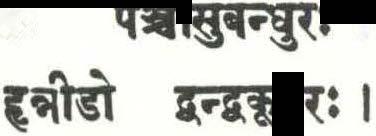
TRANSLATION
Formerly it was explained that the Queen is one's intelligence. While one is awake or asleep, that intelligence creates different situations. Being influenced by contaminated intelligence, the living entity envisions something and simply imitates the actions and reactions of his intelligence.
PURPORT
The Queen of Puraiijana is described herein as intelligence itself. Intelligence acts both in the dream state and in the waking state, but it is contaminated by the three modes of material nature. Since the intelligence is contaminated, the living entity is also contaminated. In the conditioned state, the living entity acts according to his contaminated intelligence. Although he simply remains an observer, he nonetheless acts, being forced by a contaminated intelligence, which in reality is a passive agent.
TEXTS 18-20

QtNMd��t\(;6�«4(00Si(Rt:I
l\wM¥�!JUIE4�: ..1(:II��II
¥t;\1(�if4:+1«1 �'lRT ..,'t'((:I
�: ijftiifltriM�11��11
311'ff�M¥4fl�t•l<t'*'1iSl1ifrd�I
1(1U(iJ�'+{: qlli?llAwfl«:id\II� o II
deho rathas tv indriyiisvafl, sarhvatsara-rayo 'gatifl, dvi-karma-cakras tri-guradhvajafl, pancasu-bandhuraf!,
mana rasmir buddhi-suto hrn ntf[o dvandva-kubarafl,
Texts 18-20] Talks Between Niirada and King Pracinabarhi 1389
paiicendriyiirtha-prak�epa�
sapta-dhiitu-varuthaka�

iikutir vikramo biihyo mrga-tr�lfiirh pradhiivati ekiidasendriya-camu� paiica-sunii vinoda-krt


dehaft- body; rathaft- chariot; tu- but; indriya- the knowledge-acquiring senses; asvaft- the horses; sanivatsara-total years; raya�-duration of life; agatift- without advancing; dvi-two; karma-activities; cakra�- wheels; trithree; gu[w- modes of nature; dhvaja�-flags; paiica-five; asu-life airs; bandhura�-bondage; mana�- themind; rasmi�l- rope; buddhi-intelligence; suta�-chariot driver; hrt-heart; nifla�-sitting place; dvandva-duality; kubara�- the posts for the harness; paiica-five; indriya-artha-sense objects; prak�epa�- weapons; sapta-seven; dhatu- elements; varuthakaftcoverings; akuti�-attempts of the five working senses; vikrama�-prowess or processes; bahya�- external; mrga-tr. sriim- false aspiration ; pradhavatiruns after; ekiidasa- eleven; indriya-senses; camu�-soldiers; paiica-five; sunii- enviousness; vinoda-pleasure; krt-doing.
TRANSLATION
Narada Municontinued: WhatIreferredtoas the chariot was in actuality the body. The senses are the horses that pull that chariot. As time passes, year after year, these horses run without obstruction, but in fact they make no progress. Pious and impious activities are the two wheels of the chariot. The three modes of material nature are the chariot's flags. The five types of life air constitute the living entity's bondage, and the mind is consideredtobetherope. Intelligence is the chariot driver. The heart is the sitting place in the chariot, and the dualities of life, such as pleasure and pain, are the knotting place. The seven elements are the coverings of the chariot, and the working senses are the five external processes. The eleven senses are the soldiers. Being engrossed in sense enjoyment, the living entity, seated on the chariot, hankers after fulfillment of his false desires and runs after sense enjoyment life after life.
PURPORT
The entanglement of the living entity in sense enjoyment is very nicely explained in these verses. The word samvatsara, meaning the progress of time, is significant. Day after day, week after week, fortnight after fort-

1390 Srimad-Bhagavatam
[Canto 4, Ch. 29
night, month after month, year after year, the living entity becomes entangled in the chariot's progress. The chariot rests on two wheels, which are pious and impious activities. The living entity attains a certain position in life in a particular type of body according to his pious and impious activities, but his transmigration into different bodies should not be taken as progress. Real progress is explained in Bhagavad-gtta.
janma karma ca me divyam evarh yo vetti tattvata� tyaktva deharh punar janma naiti mam eti so 'rjuna
"One who knows the transcendental nature of My appearance and activities does not, upon leaving the body, take his birth again in this material world, but attains My eternal abode, 0 Arjuna." (Bg. 4.9)
One makes real progress when he does not have to take on another material body. As stated in Caitanya-caritamrta:
eita brahmapfla bhari' ananta jtva-gapa
cauraH-lak�a yonite karaye bhramaTJ-a
(Cc. Madhya 19.138)

The living entity is wandering throughout the entire universe and taking birth in different species on different planets. Thus he moves up and down, but that is not real progress. Real progress is getting out of this material world altogether. As stated in Bhagavad-gtta:
abrahma-bhuvanal loka� punar avartino 'rjuna mam upetya tu kaunteya punar janma na vidyate
"From the highest planet in the material world down to the lowest, all are places of misery wherein repeated birth and death take place. But one who attains to My abode, 0 son of Kunti, never takes birth again." (Bg. 8.16)
Even if one is promoted to Brahmaloka, the highest planet in the universe, he has to come down again to the lower planetary systems. Thus he is wandering up and down perpetually under the influence of the three modes of material nature. Being illusioned, he thinks he is making progress. He is like an airplane encircling the earth day and night, incapable of leaving the earth's gravitational field. Factually there is no progress because the airplane is conditioned by the earth's gravity.
Texts 18-20] Talks Between Narada and King Pracinabarhi 1391
Just as a king is seated on a chariot, the living entity is seated in the body. The sitting place is the heart, and the living entity sits there and engages in the struggle for existence, which goes on without progress perpetually. In the words of Narottama dasa 'fhakura:
karma-kap,�a, jiiana-kap,�a, kevala vi�era bhap,�a, amrta baliya yeba khaya
nana yoni sada phire, kadarya bhak�ap,a kare, tara janma adhaf!.-pate yaya
The living entity struggles very hard due to the influence of fruitive activity and mental speculation and simply gets a different type of body life after life. He eats all kinds of nonsense and is condemned by his activities of sense enjoyment. If one really wants to progress in life, he must give up the ways of karma-kap,�a and jnana-kap,�a, fruitive activities and mental speculation. Being fixed in l(r�qa consciousness, one can become free from the entanglement of birth and death and the vain struggle for existence. In these verses the words mrga-tn1Jarh pradhavati are very significant because the living entity is influenced by a thirst for sense enjoyment. He is like a deer that goes to the desert to search out water. In a desert an animal simply searches in vain for water. Of course there is no water in the desert, and the animal simply sacrifices his life in an attempt to find it. Everyone is planning for future happiness, thinking that somehow or other, if he can reach a certain point, he will be happy. In actuality, however, when he comes to that point, he sees that there is no happiness. He then plans to go further and further to another point. This is called mrga-tnTJti, and its basis is sense enjoyment in this material world.
TEXT 21

(fq€ij(lf0'6�•u
dQI(i4\(�i�(f.A:�: I
Wflli9;:q�4�1'H!�(q\f.t�(II��II
samvatsaras cap,�a-vegaf!. kiilo yenopalak�itaf!.
tasyiihiintha gandharvii
gandharvyo riitrayaf!. smrtaf!.
haranty iiyuf!. parikriintyii
.sa�thy-uttara-sata-trayam
1392 Srimad-Bhagavatam [Canto 4, Ch_ 29
R �;flqef?4�:u 1
samvatsarafl-year; carzfla-vegafl-called Cap�avega; kiilafl-time; yenaby which; upalak,sitafl- symbolized; tasya- of the duration of life; ahiinidays; iha-in this life; gandharviifl-Gandharvas; gandharvyafl-Gandharvis; riitrayafl-nights; smrtiifl-are understood; haranti- they take away; iiyuflduration of life; parikriintyii-by traveling; . sa . s,thi-sixty; uttara-above; §ata- hundred; trayam- three.

TRANSLATION
What was previously explained as Cru;u.J.avega, powerful time, is covered by days and nights, named Gandharvas and Gandharvis. The body's life span is gradually reduced by the passage of days and nights, which number 360.
PURPORT
The word parikrantyii means "by traveling." The living entity travels on his chariot day and night during a year consisting of 360 (or more) days and nights. Life's progress is taken for the unnecessary labor required to cover these 360 days and nights of life.
TEXT 22


•RJl..-.tt��rntuitwi
� � �: � �qi{lQ�: ������
kiila-kanyii jarii siik,siil lokas tiirh niibhinandati svasiirarh jagrhe mrtyufl. kfiayiiya yavanesvara�
kiila-kanyii-the daughter of Time; jarci-old age; siikfiiit-directly; lokaf.zall living entities; tam- her; na-never; abhinandati-welcome; svasiiram-as his sister; jagrhe-accepted; mrtyu�-death; k,sayiiya-for destruction; yavana-isvara�-the King of the Yavanas.
TRANSLATION
What was described as Kalakanya should be understood as old age. No one wants to accept old age, but Yavanesvara [Yavana-raja], who is death, accepts jara [old age] as his sister.
Text 22] Talks Between Narada and King Pracinabarhi 1393
PURPORT
Encaged within the body, the living being accepts Kiilakanya, old age, just before death. Yavanesvara is the emblem of death, Yamaraja. Before going to the place of Yamaraja, the living entity accepts jara, old age, the sister of Yamaraja. One is subjected to the influence of Yavana-raja and his sister due to impious activity. Those who are in KHI}a consciousness and are engaged in devotional service under the instructions of Narada Muni are not subjected to the influence of Yamaraja and his sister jara. If one is K.f�l}a conscious, he conquers death. After leaving the material body, he does not accept another body that is material but returns home, back to Godhead. This is verified by Bhagavad-gtta (4.9).
TEXTS 23-25
Sli�Ps::��wttlil'fiwtl<:�


� q�nt{l{Rt qi�11�'-\11
adhayo vyadhayas tasya
sainika yavaniis cariift
bhutopasargiisu-rayaft
prajviiro dvi-vidho jvaraft
evarh bahu-vidhair duftkhair
daiva-bhutiitma-sambhavaift
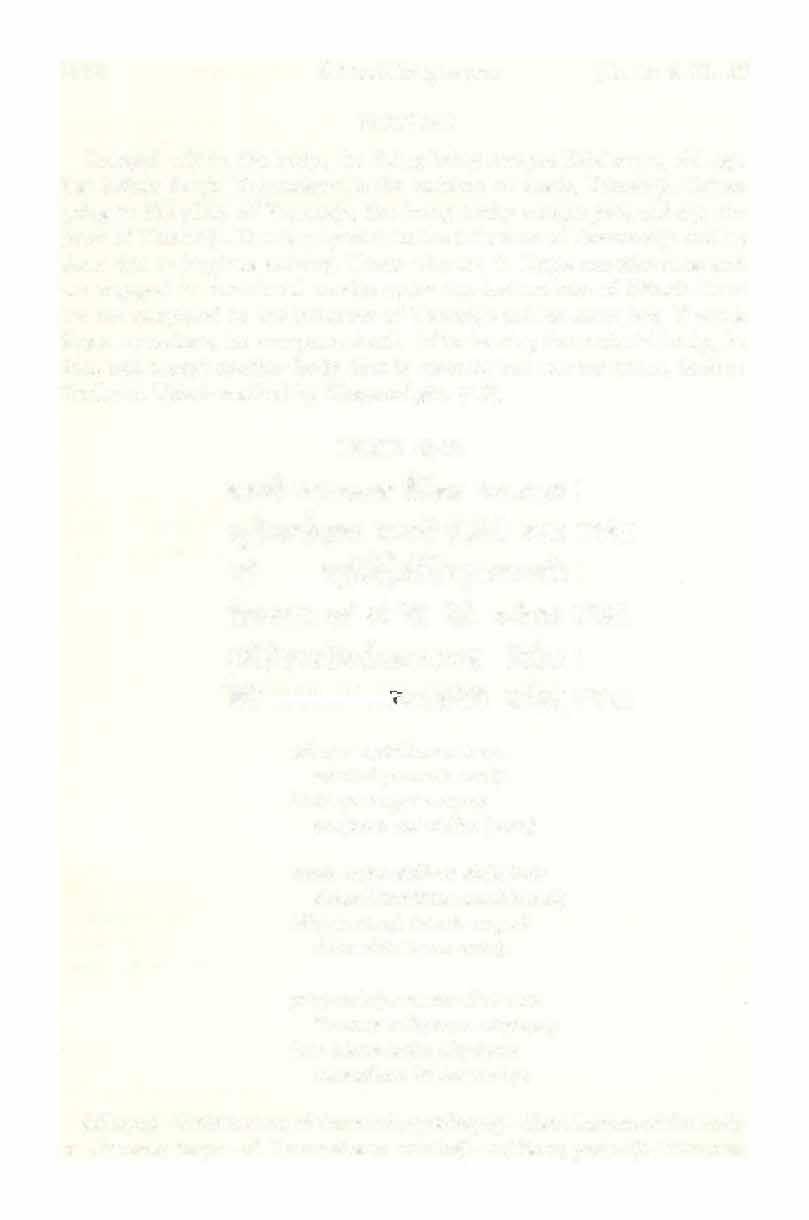
klisyamiinaft satarh var�arh
dehe dehi tamo-vrtaft
priir-endriya-mano-dharmiin
iitmany adhyasya nirgur-aft
sete kiima-laviin dhyiiyan
mamiiham iti karma-krt
iidhayaft- disturbances of the mind; vyiidhayaft-disturbancesof thebody or diseases; tasya-of Yavanesvara; sainikaft-soldiers ; yavaniift- Yavanas;
1394 Srimad-Bhagavatam [Canto 4, Ch. 29
�04NCIR� ��:I \fflq(t41'i?J;�: �ft:ftit �: II��II
� "lflf�i:��44((1k�: I fti�+uwt: �;rl �� �� ��: 11�-JII
rit� �uu I
cara[l- followers;bhuta-of living entities;upasarga-at the time of distress; asu-very soon; raya[l-very powerful; prajvarafl-named Prajvara; dvividha[l-two kinds;jvara[l- fever;evam-thus; bahu-vidhai[l-of different varieties; duflkhai[l-by tribulations; daiva-by providence; bhuta-by other living entities;atma-by the body and mind;sambhavai[l-produced; klisyamanafl-subjected to sufferings; satam-hundred; var_sam-years; dehe-in the body; deht-the living entity;tamafl-vrtafl-covered by material existence;prarw- of life; indriya-of the senses;mana[l- of the mind; dharman-characteristics; atmani-unto the soul; adhyasya-wrongly attributing; ni rgurwfl-although transcendental;sete-lies down;kama-of sense enjoyment;lavan-onfragments;dhyayan-meditating;mama-mine; aham-I; iti-thus; karma-krt-the actor.
TRANSLATION
The followers of Yavanesvara [ Yamaraja] are called the soldiers of death, andtheyare known as the various types of disturbances that pertain to the body and mind. Prajviira represents the two types of fever: extreme heat and extreme cold-typhoid and pneumonia. The living entity lying down within the body is disturbed by many tribulations pertaining to providence, to other living entities and to his own body and mind. Despite all kinds of tribulations, the living entity, subjected to the necessities of the body, mind and senses and suffering from various types of disease, is carried away by many plans due to his lust to enjoy the world. Although transcendentalto this material existence, the living entity, out of ignorance, accepts all these material miseries under the pretext of false egoism (I and mine). In this way he lives for a hundred years within this body.
PURPORT
ln the Vedas it is stated: asango 'yam puru§a{t. The living entity is actually separate from material existence, for the soul is not material. In Bhagavad-gtta it is also said that the living entity is the superior energy, andthematerial elements-earth, water, fire, air and so on-are the inferior energy. The material elements are also described as bhinna, or separated energy. When the internal or superior energy comes in contact with the external energy, it is subjected to so many tribulations. In Bhagavad-gtta the Lord also says:
miitra-sparsiis tu kaunteya
stto�ra-sukha-du.hkha-dii.h

iigamapiiyino 'nityiis
tams titik�asva bhtirata
Texts 23-25] Talks Between Narada and King Pracinaharhi 1395
"0 son of Kunti, the nonpermanent appearance of happiness and distress, and their disappearance in due course, are like the appearance and disappearance of winter and summer seasons. They arise from sense perception, 0 scion of Bharata, and one must learn to tolerate them without being disturbed." (Bg. 2.14)

Because of the material body, the living entity is subjected to many tribulations brought about by air, water, fire, extremeheat, extreme cold, sunshine, excessive eating, unhealthy food, maladjustments of the three elements of the body (kapha, pitta and vayu), and so on. The intestines, the throat, the brain and the other parts of the body are affected by all kinds ofdiseasesthat are so powerful that they become sources of extreme suffering for the living entity. The living entity, however, is different from all these material elements. The two types of fever described in this verse can be explained in contemporary language as pneumonia and typhoid. When there is an extreme fever in the body, there is typhoid and pneumonia, and they are described as Prajvara. There are also other miseries created by other living entities. The state exacts taxes, and there arealsomany thieves, rogues and cheaters. Miseries brought about by other living entities are called adhibhautika. There are also miseries in the form of famine, pestilence, scarcity, war, earthquakes and so on. These are caused by the demigods or other sources beyond our control. Actually there are many enemies of the living entities, and these are all described to point out how miserable this material existence is.
Knowing the basic misery of material existence, one should be induced to get out of the material clutches and return home, back to Godhead. Actually the living entity is not at all happy in this material body. Because of the body, he suffers thirst and hunger and is influenced by the mind, by words, by anger, by the belly, by the genitals, by the rectum, and so on. Manifold miseries encircle the transcendental living entity simply because he desires to satisfy his senses in this material world. If he simply withdraws from activities of sense gratification and applies his senses in the service of the Lord, all the problems of material existence will immediately diminish, and, with the advancement of Kr�q.a consciousness, he will be freed from all tribulation and, after giving up the body, will return home, back to Godhead.
1396 Srimad-Bhagavatam [Canto 4, Ch. 29
TEXTS 26-27 �SS€'(1Wf+{��·q �;:([�g� I � � � �: �,11��11
�«��Uf�mnl WRtpt tit� q(�� ll�\911
yadiitmiinam avijiiiiya
bhagavantam param gurum puruflas tu viflajjeta gur-eflu prakrte� sva-drk
gu[liibhimiint sa tadii
karmiir-i kurute 'vasa�
suklarh kr.sr-ani lohitani vii

yathii-karmiibhijiiyate
yadii-when; iitmiinam-the Supreme Soul; avijiiiiya-forgetting; bhagavantam- the Supreme Personality of Godhead; param-supreme; gurumthe instructor; purufla�-the living entity; tu-then; vi_sajjeta-gives himself up; gur-eflu-to the modes; prakrte�-of material nature; sva-drk-one who can see his own welfare; gur-a-abhimiint-identified with the modes of nature; saft-he; tadii-at that time; karmiir-i- fruitive activities; kuruteperforms; avasa�- spontaneously; suklam- white; kr�7Jam- black; lohitamred; vii-or; yathii- according to; karma-work; abhijiiyate-takes birth.
TRANSLATION
The living entity by nature has minute independence to choose his own good or bad fortune, but when he forgets his supreme master, the PersonalityofGodhead,hegiveshimselfupunto the modes of material nature. Being influenced by the modes of material nature, he identifies himself with the body and, for the interest of the body, becomes attached to various activities. Sometimes he is under the influence of the mode of ignorance, sometimes the mode of passion, and sometimes the mode of goodness. The living entity thus gets different types of bodies under the modes of material nature.
PURPORT
These different types of bodies are explained in Bhagavad-gitii:
purufla� prakrti-stho hi bhunkte prakrti-jan gur-an karar-am gur-a-saligo 'sya
sad-asad-yoni-janmasu
Texts 26-27] Talks Between Narada and King Pracinabarhi
1397
"The living entity in material nature thus follows the ways of life, enjoying the three modes of nature. This is due to his association with that material nature. Thus he meets with good and evil amongst various species." (Bg. 13.22)
Because of associating with the modes of nature, the living entity gets a variety of bodies from the 8,400,000 forms. It is clearly explained herein that the living entity has a little independence, indicated by the word sva-drk, meaning "one who can see his own welfare." The living entity's constitutional position is very minute, and he can be misled in his choice. He may choose to imitate the Supreme Personality of Godhead. A servant may desire to start his own business and imitate his master, and when he chooses to do so, he may leave the protection of his master. Sometimes he is a failure, and sometimes he is successful. Similarly, the living entity, part and parcel of Kr�!J.a, starts his own business to compete with the Lord. There are many competitors out to attain the Lord's position, but to become like the Lord is not at all possible. Thus there is a great struggle for existence within the material world as different parties try to imitate the Lord. Material bondage is caused by deviation from the service of the Lord and attempts to imitate Him. The Lord is imitated by Mayavadi philosophers who try to become one with the Lord in an artificial way. When the Mayavadi philosophers think of themselves as liberated, they are under the delusion of mental concoction. No one can become one with or equal to God. To imagine this is to continue one's bondage in materialexistence.
TEXT 28
sukliit-by goodness; prakiiSa-by illumination; bhii yi.sthtin-characterized; lokiin-planets; iipnoti-achieves; karhicit-sometimes; duftkhadistress; udarkiin-having as the end result; kriyii-iiyiisiin-full of laborious activities; tamaft-darkness; soka-in lamentation; utka_tan-abounding; kvacit- sometimes.

1398 Srimad-Bhagavatam [Canto 4, Ch. 29
I �;���fSiittltiR1i(ijf{;��� II�� II I.:.
�-kst�I�I�BiW�lwttmRf��Rt(
sukliit prakiiSa-bhUy(s.thiil lokiin iipnoti karhicit duftkhodarkiin kriyiiyiisiirhs tamaft sokotka_tiin kvacit
Those who are situated in the mode of goodness act piously according to Vedic injunctions. Thus they are elevated to the higher planetary systems where the demigods live. Those who are influenced by the mode of passion engage in various types of productive activities in the planetary systems where human beings live. Similarly, thoseinfluenced by the mode of darkness are subjected to various types of misery and live in the animal kingdom.
PURPORT
There are three planetary systems-upper, middle and lower. Those influenced by the mode of goodness are given places in the upper planetary systems-Brahmaloka (Satyaloka), Tapoloka, Janaloka and Maharloka. Those influenced by the mode of passion are given places in the Bhurloka and Bhuvarloka. Those influenced by the mode of ignorance are given places in Atala, Vitala, Sutala, Taliitala, Mahiitala, Rasiitala, Patiila or the animal kingdom. Qualitatively the living entity is the same as the Supreme Personality of Godhead, but because of his forgetfulness he gets different bodies in different planetary systems. At the present moment human society is overly influenced by the mode of passion, and consequently people are engaged in working in big factories. They forget how distressful it is to live in such places. In Bhagavad-gitii such activities are described as ugra-karma, that is, distressful activities. Those who utilize the energies of the worker are called capitalists, and those who actually perform the work are called laborers. In actuality they are both capitalists, and the workers are inthe modes of passion and ignorance. The result is that there is always a distressfulsituation. In contrast to these men are those influenced by the mode of goodness-the karmts and jiiiinis. The karmis, under the direction of Vedic instructions, try to elevate themselves to higher planetary systems. The jniinis try to merge into the existence of Brahman, the impersonal feature of the Lord. In this way all classes of livingentities in various species oflife are existing within this material world. This explains superior and inferior life forms within the material world.

Text 29] Talks Between Narada and King Pracinabarhi 1399
TRANSLATION
TEXT 29 ���'fi��T'fi�: I �) +{��ffit�;€11 ��gut ll�: ������
kvacit pumiin kvacic ca strt
kvacin nobhayam andha-dhi[l devo manuflyas tiryag vii
yathii-karma-gur-arit bhavafl
kvacit-sometimes; pumiin-male; kvacit-sometimes; ca-also; strifemale; kvacit-sometimes; na-not; ubhayam-both; andha-blind; dht[lhe whose intelligence; devaft -demigod; manuflya[l-human being; tiryakanimal, bird, beast; vii-or; yathli-according to; karma-of activities; guram -the qualities; bhava[l-birth.




TRANSLATION
Covered by the mode of ignorance in material nature, the living entity is sometimes a male, sometimes a female, sometimes a eunuch, sometimes a human being, sometimes a demigod, sometimes a bird, an animal, and so on. In this way he is wandering within the material world. His acceptance of different types of bodies is brought about by his activities under the influence of the modes of nature.
PURPORT


Actuall� the living entity is part and parcel of the Lord; therefore he is spiritual in quality. The living entity is never material, and his material conception is simply a mistake due to forgetfulness. He is as brilliant as the Supreme Personality of Godhead. Both the sun and the sunshine are very brilliant. The Lord is like the full shining sun, and the living entities are like the small particles of that sun which constitute the all-pervasive sunshine. When these small particles are covered by the cloud of maya, they lose their shining capacity. When the cloud of maya is gone, the particles again become brilliant and shining. As soon as the living entity is covered by the ignorance of maya or darkness, he cannot understand his relationship with the Supreme God. Somehow or other, if he comes before the Lord, he can see himself as shining as the Supreme Lord, although he is not as extensive as the Lord. Because the living entity desires to imitate the Supreme Lord, he is covered by maya. We cannot imitate the Lord, nor can we become the supreme enjoyer. This is not possible, and when we think it is, we become conditioned by maya. Thus the encagement of the living entity under the clutches of maya is brought about by forgetfulness of his relationship with the Supreme Lord.
Under the influence of maya, the living entity becomes exactly like a person haunted by a ghost. Such a person speaks all kinds of nonsense.
1400
Srimad-Bhagavatam
[Canto 4, Ch. 29
When the living entity is covered by the influence of maya, he becomes a so-called scientist, philosopher, politician or socialist, and at every moment presents differentplans forthe benefit of human society_ All these plans are ultimatelyfailures because theyare illusory.In this waytheliving entityforgetshis position as an eternal servant of the Lord. Heinstead becomes a servant of mtiyti. In any case he remains a servant. It is his misfortune that by forgetting his real contact with the Supreme Lord,he becomes a servant of mtiyii. As servant of miiyti, he sometimes becomes a king, sometimes an ordinary citizen, sometimes a brtihmarw, a sudra, and so on.Sometimes he is a happy man, sometimes a prosperous man, sometimes a small insect. Sometimes he is in heaven, and sometimes in hell. Sometimes he is a demigod, and sometimes he is a demon. Sometimes he is a servant, and sometimes he is a master. In this way the living entity wanders all over the universe. Only when he comes in contact with the bona fide spiritual master can he understand his real constitutional position. He then becomes disgusted with material existence. At that time, in full Kr�l).a consciousness, he regrets his past experiences in material existence. This regret is very beneficial because it purifies the living entity of material conditional life. He then prays to the Lord to engage in His service, and, at that time, Kr�l).a grants liberation from the clutches of maya. Lord Kr�l).a explains this in Bhagavad-gitti:
daivi hy e�ti gup,amayi
mama miiyii duratyayii mtim eva ye prapadyante miiyiim ettim taranti te
"This divine energy of Mine, consisting of the three modes of material nature, is difficult to overcome. But those who have surrendered unto Me can easily cross beyond it." (Bg. 7.14)
Only by the grace of Kr�J}.a can one get out of the clutches of mtiyti. It is not possible to get out by mental speculation or other activities. When the living entity understands his real position by the grace of Kr�l).a, he keeps himself always fit in Kf�l).a consciousness and acts accordingly. Thus he gradually becomes completely free from the clutches of mtiyti. When he is strong in Kr�l).a consciousness, mtiyti cannot touch him. In this way, in the association of Kr�I;J.a conscious devotees, the living entity can get free from the contamination of material existence. In this connection, Srila Kr�I;J.adasa Kaviraja Gosvami says:
tiite kr�ra bhaje, kare gurura sevana miiyii-jtila chu_te, piiya kr.sflera carap,a

Text 29] Talks Between Narada and King Pracinabarhi 1401
"In the Kr�Qa conscious state, the living entity engages in devotional service under the direction of the spiritual master. Inthis way he gets out of the clutches of maya and takes shelter under the lotus feet of Lord Kr�Qa." (Cc. Madhya 22.25)
TEXTS 30-31

w-mffl trqt �: (11�� � � 1 � � tf� �� qt ll�oll
(NT �� iiiR �1'-r:CCq?.fT �'fwlI
kfiut-parito yathii dina[t
siirameyo grharh grham
caran vindati yad-di_s.tarh
dap,flam odanam eva vii
tatha kiimasayo jiva
uccavaca-patha bhraman
upary adho vii madhye vii
yati difi.tarh priyapriyam
k.sut-paritaft- overcome by hunger; yathli-as; dina[t-poor; sarameya[tadog; grham-fromonehouse ; grham-toanother house; caran-wandering ; vindati-receives; yat- whose ; di.fi.tam-according to destiny; dar-flampunishment; odanam-food; eva-certainly; va- or ; tatha-similarly; kiimaasayaft -pursuing different types of desires; jiva[t-the living entity; uccahigh; avaca-low; patha-on a path; bhraman- wandering; upari-high; adhaft-low; vii-or; madhye-in the middle; vii-or; yati-goes towards; difi.tam-according to destiny; priya-pleasing; apriyam-not pleasing.
TRANSLATION
The living entity is exactly like a dog, who, overcome with hunger, goes from door to door forsome food. Accordingto hisdestiny, hesometimes receives punishment and is driven out and at other timesreceivesa little food to eat. Similarly, the livingentity, being influenced by so many desires, wanders in different species of life according to destiny. Some-
1402 Srimad-Bhagavatam [Canto 4, Ch. 29
���qt��irqt�f�fst�1fi1�4(II��II
times he is high, and sometimes he is low. Sometimes he goes to the heavenly planets, sometimes to hell, sometimes to the middle planets and so on .
PURPORT

The living entity's position is herein likened to a dog's. By chance a dog may have a very rich owner, and by chance he may become a street dog. As thedog of a rich man, he will live very opulently. Sometimes in Western countries we hear of a master leaving millions of dollars to a dog in his will. Of course there are many dogs loitering in the street without food. Therefore, to liken the conditional existence of the living entity to that of a dog is very appropriate. An intelligent human being, however, can understand that if he has to live the life of a dog, he had best become Kw1-a's dog. In the material world a dog is sometimes elevated and is sometimes on thestreet, but in the spiritual world, Kwp's dog is perpetually, eternally happy. Srila Bhaktivinoda Thakura has therefore sung: vai�rwva .thiikura tomiira kukura baliyii jiinaha more. Inthis wayBhaktivinoda Thakura offers to become a V�!lava's dog. Adog always keeps himself at his master's door and does not allow any person unfavorable to the master to enter. Similarly, one should engage in the service of a Vaig1ava and try to please him in every respect. Unless one does so, he does not make spiritual advancement. Apart from spiritual advancement, in the material world if one does not develop his qualities in goodness, he cannot be promoted to the higher planetary system. As confirmed by Bhagavad-gttii:
urdhvarh gacchanti sattva-sthii madhye t�thanti rajasii�
jaghanya-gur-a-vrtti-stha adho gacchanti tamasii�
"Those situated in the mode of goodness gradually go upward to the higher planets; those in the mode of passion live on the earthly planets; and those in the mode of ignorance go down to the hellish worlds."(Bg. 14.18)
There are many varieties of life in the different planetary systems, and these come about due to the living entity's developing his qualities in goodness, passion and ignorance. If one is in goodness, he is promoted to the higher systems; if in passion, he remains in the middle systems; and, if in ignorance, he is pushed down to the lower species of life.
Texts 30-31) Talks Between Narada and King Pracinabarhi 1403
TEXT 32


�:�w'(uufq ��6k'll�
��WIot(ii4-"ik: II�'<II
du�khefiv ekatareru"ipi daiva-bhiitiitma-hetufiU jtvasya na vyavaccheda� syiic cet tat-tat-pratikriyii
du�khe.su-in the matter of distresses; ekatarepa-from one kind; apieven; daiva-providence; bhiita-other living entities; iitma-the body and mind; hetufiu-on account of; jtvasya-of the living entity; na-never; vyavaccheda�-stopping; syat- is possible; cet- although; tat-tat-of those miseries; pratikriyii-counteraction.


TRANSLATION
The living entities are trying to counteract different miserable conditions pertaining to providence, other living entities, or the body and mind. Still, they must remain conditioned by the laws of nature, despite all attempts to counter these laws.
PURPORT
Justas a dog wanders here and there for a piece of bread or punishment, the living entity perpetually wanders about trying to be happy and planning in so many ways to counteract material misery. This is called the struggle for existence. We can actually see in our daily lives how we are forced to make plans to drive away miserable conditions. To get rid of one miserable condition, we have to put ourselves in another kind of miserable condition. A poor man suffers for want of money, but if he wants to become rich, he has to struggle in so many ways. Actually that is not a valid counteracting process but a snare of the illusory energy. If one does not endeavor to counteract his situation but is satisfied with his position, knowing that he has obtained his position through past activities, he can instead engage his energy to develop Kr�IJ.a consciousness. This is recommended in all Vedic literature.
tasyaiva heto[t prayateta kovido
na labhyate yad-bhramatam upary adhaft
tal-labhyate du{lkhavad anyata[t sukharh
kiilena sarvatra gabhtra-rarhhasa
1404 Srimad-Bhagavatam [Canto 4, Ch. 29
"Persons who are actually intelligent and philosophically inclined should endeavor only for that purposeful end which is not obtainable even by wandering from the topmost planet [Brahmaloka] down to the lowest planet [Patala] . As far as happiness derived from sense enjoyment is concerned, it can be obtained automatically in course of time, just as in course of time we obtain miseries even though we do not desire them." (Bhiig. 1.5.18) One should simply try to develop his Kr�l}a consciousness and not waste his time trying to improve his material condition. Actually the material condition cannot be improved. The process of improvement means accepting another miserable condition. However, if we endeavor to improve our Kr�l}a consciousness, the distresses of material life will disappear without extraneous endeavor. Kr�l}a therefore promises:
k§iprarh bhavati dharmiitmii sasvac-chiintirh nigacchati kaunteya pratijanihi na me bhaktaQ- prar;wsyati
"He quickly becomes righteous and attains lasting peace. 0 son of Kunti, declare it boldly that My devotee never perishes." (Bg. 9.31)
One who takes to the path of devotional service will never be vanquished, despite all miseries of the body and mind and despite all misery brought about by other living entities and providence, miseries which are beyond our control.
TEXT 33

q\{1 � � �� ftmn ��'ll
ij�����:3lf�: 11��11
yathii hi puru.so bhiirarh sirasii gurum udvahan
tam skandhena sa iidhatte
tathii sarvii[l pratikriyii[l
yathii-as ; hi-certainly; pur u . sa[l-a man; bhiiram-a burden; sirasii-on the head; gurum-heavy; udvahan-carrying; tam-that; skandhena-on the shoulder; sa[l-he; iidhatte-puts; tathii-similarly; sarvii[l-all; pratikriyii[lcounteractions.
TRANSLATION
A man may carry a burden on his head, and when he feels it to be too heavy, he sometimes gives relief to his head by putting the burden on his
Text 33] Talks Between Niirada and King Priiclnabarhi 1405
shoulder. In this way he tries to relieve himself of the burden. However, whatever process he devises to counteract the burden does nothing more than put the same burden from one place to another.
PURPORT
This is a good description of an attempt to transfer a burden from one place to another. When one gets tired of keeping aburden onhis head, he will place it on his shoulder. This does not mean that he has become freed from the strains of carrying the burden. Similarly, human society in the name of civilization is creating one kind of trouble to avoid another kind of trouble. In contemporary civilization we see that there are manyautomobiles manufactured to carry us swiftly from one place to another, but at the same time we havecreated other problems. We have to construct so many roads, and yet these roads are insufficient to cope with automobile congestion and trafficjams. There arealsotheproblemsofairpollutionand fuel shortage. The conclusion is that the processes we manufacture to counteract or minimize our distresses do not actually put an end to our pains. It is all simply illusion. We simply place the burden from the head to the shoulder. The only real way we can minimize our problems is to surrender unto the Supreme Personality of Godhead and give ourselves up to His protection. The Lord, being all-powerful, can make arrangements to mitigate our painful life inmaterial existence.
TEXT 34

��a'�n sm�rn ��01t �� � 1
� ��q�d � �R �en;rq 11��11
naikantataf!, pratikara�
karma[liirh karma kevalam
dvayarh hy avidyopasrtarh
svapne svapna iviinagha
na-never; ekiintata�-ultimately; pratikiiraf!,-counteraction; karmaram -of different activities; karma-another activity; kevalam-only; dvayamboth; hi-because; avidya-due to illusion; upasrtam-accepted; svapnein a dream; svapna�-a dream; iva-like; anagha-0 you who are free from sinful activities.
1406 Srimad-Bhagavatam [Canto 4, Ch. 29
Narada continued: 0 you who are free from all sinful activity! No one can counteract the effects of fruitive activity simply by manufacturing a different activity devoid of Kr�l).a consciousness. All such activity is due to our ignorance. When we have a troublesome dream, we cannot relieve it with a troublesome hallucination. One can counteract a dream only by awaking. Similarly, our material existence is due to ignorance and illusion. Unless we awaken to Kr�l).a consciousness, we cannot be relieved of such dreams. For the ultimate solution to all problems, we must awaken to Kr�l).a consciousness.
PURPORT
There are two kinds of fruitive activity. We can place the burden on the head, or we can place it on the shoulder. Actually, keeping the burden in either place is the same. The transferral, however, is taking place under the name of counteraction. In this connection Prahlada Maharaja said that fools and rascals in the material world plan so gorgeously for bodily comfort without knowing that such arrangements, even if successful, are only miiyii. People are working hard day and night for the illusory happiness of the body. This is not a way to achieve happiness. One has to get out of this material entanglement and return home, back to Godhead. That is real happiness. The Vedas therefore enjoin: "Don't remain in the darkness of this material world. Go to the light of the spiritual world." To counteract the distress of this material body, one has to take on another distressed condition. Both situations are only illusion. There is no gain in taking on one trouble to counteract another trouble. The conclusion is that one cannot be perpetually happy as long as one exists in this material world. The only remedy is to get out of this material world altogether and return home, back to Godhead.

Text 35] Talks Between Niirada and King Pracinabarhi 1407
TRANSLATION
TEXT 35 � ��qRsfq �� f;r�ij I �ijf f��ifuf �it f-"F-�cif �� II�'-\ II arthe hy avidyamiine 'pi samsrtir na nivartate manasii liliga-rilpera svapne vicarato yathii
arthe-factual cause; hi-certainly; avidyamane-not existing; api- although; samsrt*-material existence; na- not; nivartate-ceases; manasaby the mind; linga-rilpera-by subtle form; svapne-in a dream; vicarata�acting; yathii-as.
TRANSLATION
Sometimes we suffer because we see a tiger in a dream or a snake in a vision, but actually there is neither a tiger nor a snake. Thus we create some situation in a subtle form and suffer the consequences. These sufferings cannot be mitigated unless we are awakened from our dream.
PURPORT
As stated in the Vedas, the living entity is always separate from two kinds of material bodies-the subtle and the gross. All our sufferings are due to these material bodies. This is explained in Bhagavad-gttii:
miitra-sparsas tu kaunteya sito�ra-sukha-du�kha-da� iigamiipiiyino 'nityiis tams titik�asva bhiirata
"0 son of Kunti, the nonpermanent appearance of happiness and distress, and their disappearance in due course, are like the appearance and disappearance of winter and summer seasons. They arise from sense perception, 0 scion of Bharata, and one must learn to tolerate them without being disturbed."(Bg. 2.14)
Lord Kr�J}.a thus informed Arjuna that all the distresses brought about by the body come and go. One has to learn how to tolerate them. Material existence is the cause of all our sufferings, for we do not suffer once we are out of the material condition. The Vedas therefore enjoin that one should factually understand thathe is not material butis actually Brahman, (aharh brahmasmi). This understanding cannot be fully realized unless one is engaged in Brahman activities, namely devotional service. To get free from the material conditions, one has to take to Kr�J}.a consciousness. That is the only remedy.
TEXTS 36-37

1408 Srimad-Bhagavatam [Canto 4, Ch_ 29
��t;fts���� �s;N� I �+t��nJR�t�tWt 11��11
athiitmano 'rtha-bhutasya yato 'nartha-paramparii samsrtis tad-vyavacchedo bhaktyii paramayii gurau
viisudeve bhagavati bhakti-yoga[t samiihita[t sadhrtcinena vairiigyam
jiiiinarh ca janay(syati
atha-therefore; iitmana[t-of the living entity; artha-bhUtasya-having his real interest; yata[L-from which; anartha-of all unwanted things; paramparii-a series one after another; samsrti[L-material existence; tat-of that; vyavaccheda[L-stopping; bhaktyii-by devotional service;paramayiiunalloyed;gurau-unto theSupreme Lord or His representative; viisudeveVasudeva; bhagavati-the Supreme Personality of Godhead; bhaktiyoga[L-devotional service; samiihita[L-applied; sadhricinena-completely; vairiigyam-detachment; jiiiinam-fullknowledge; ca-and; janay�yati-will cause to become manifest.
TRANSLATION
The real interest of the living entity is to get out of the nescience that causes him to endure repeated birth and death. The only remedy is to surrender unto the Supreme Personality of Godhead through His representative. Unless one renders devotional service unto the Supreme Personality of Godhead, Vasudeva, he cannot possibly become completely detached from this material world, nor can he possibly manifest real knowledge.

PURPORT
This isthe waytobecome detached fromthe artificialmaterialcondition. The only remedy is to take to Kr�J;J.a consciousness and constantly engage in the devotional service of Lord Vasudeva, the Supreme Personality of Godhead. Everyone is trying to be happy, and the process adopted to achieve that happiness is called self-interest. Unfortunately the conditioned soul hovering within this material world does not know that his ultimate
Texts 36-37] Talks Between Narada and King Pracinabarhi � �q;ffi( +tRti�•t: ��: I �'f.R �� � :q :jf;rf'�
�\911
II
1409
goal of self-interest is Vasudeva. Samsrti, or material existence, begins with the illusioned bodily conception of life, and on the basis of this conception there ensues a series of unwanted things (anarthas). These unwanted things are actually mental desires for various types of sense gratification. In this way one accepts different types of bodies within this material world. One first has to control the mind so that the desires of the mind can be purified. This process is described in the Niirada-paficariitra as sarvopiidhivinirmuktarh tat-paratvena nirmalam. Unless one purifies his mind, there is no question of getting free from the material condition. As stated in Srimad-Bhiigavatam:
anarthopasamarh siik.siid
bhakti-yogam adhok�aje lokasyiijiinato vidviirhs
cakre siitvata-samhitiim
"The material miseries of the living entity, which are superfluous to him, can be directly mitigated by the linking process of devotional service. But the mass of people do not know this, and therefore the learned Vyasadeva compiled this Vedic literature, which is in relation to the Supreme Truth."

(Bhiig. 1.7.6) Anarthas, unwanted things, come down from one bodily life to another. To get out of this entanglement, one has to take to the devotional service of Lord Vasudeva, Kr�l).a, the Supreme Personality of Godhead. The word guru is significant in this connection. The word guru may be translated as "heavy," or "the supreme." In other words, the guru is thespiritual master. Srila ��abhadeva advised his sons: gurur na sa syat ... na mocayed ya[l samupeta-mrtyum. "One should not take up the post of spiritual master unless is able to lead his disciple from the cycle of birth and death." (Bhiig. 5.5.18) Material existence is actually a chain of action and reaction brought about by different types of fruitive activities. This is the cause of birth and death. One can stop this process only by engaging oneself in the service of Vasudeva.
Bhakti refers to those activities performed in the service of Lord Vasudeva. Because Lord Vasudeva is the Supreme, one should engage himself in His service, not in the service of the demigods. Devotional service begins from the neophyte stage-the stage of observing the rules and regulations-and extends to the point of spontaneous loving service to the Lord. The purpose of all stages is to satisfy Lord Vasudeva. When one is perfectly advanced in the devotional service of Vasudeva, he becomes completely detached from the service of the body, that is, his designated
1410 Srimad - Bhagavatam [Canto 4, Ch. 29
position in material existence. After becoming so detached, one becomes actually perfect in knowledge and engages perfectly in the service of Lord Vasudeva. Sri Caitanya Mahaprabhu says: jtvera 'svarupa' haya--kr.srera 'nitya-dasa'. "Every living entity is by constitutional position an eternal servant of Kr�l).a." As soon as one engages in the service of Lord Vasudeva, he attains his normal constitutional position. This position is called the liberated stage. Muktir hitvanyatha ruparh svariipe1J.a vyavasthitift: in the liberated stage one is situated in his original Kr�Q.a conscious position. He gives up all engagement in the service of matter, engagements concocted under the names of social service, national service, community service, dog service, automobile service, and so many other services conducted under the illusion of "I" and "mine."
As explained in the Second Chapter of the First Canto:
vasudeve bhagavati
bhakti-yoga� prayojita�
janayaty asu vairagyarh
jiianarh ca yad ahaitukam
"By rendering devotional service unto the Personality of Godhead, Sri Kr�J}.a, one immediately acquires causeless knowledge and detachment from the world." (Bhag. 1.2.7) Thus one must engage in the service of Vasudeva without material desire, mental speculation or fruitive activity.
TEXT 38

msf:qu� �q ���il��: I
�: ��� ��1 �'hrn: ������
so 'cirad eva riijarfle
syad acyuta-kathasraya�
srrwata[t sraddadhiinasya nityadii syad adhtyata�
sa�-that; aciriit-very soon; eva-certainly; raja-r�e-0 best of kings; syat- becomes; acyuta-of the Supreme Personality of Godhead; kathiinarrations; iisraya�-depending on; srrwata�-of one who is hearing; sraddadhanasya-faithful; nityada-always; syat-becomes; adhtyata�-by cultivation.
Text 38] Talks Between Narada and King Pracinabarhi 1411
0 best of kings, one who is faithful, who is always hearing the glories of the Supreme Personality of Godhead, who is always engaged in the culture of K{�r;Ia consciousness and in hearing of the Lord's activities, very soon becomes eligible to see the Supreme Personality of Godhead face to face.
PURPORT
Constant engagement in the transcendental loving service of Vasudeva means constantly hearing the gloriesof the Lord. The principles of bhaktiyoga-sravarwrh kirtanarh vi_sr-o� smarar-arh piida-sevanam/ arcanarh vandanarh diisyarh sakhyam iitma-nivedanam-are theonly means by which perfection can he attained. Simply by hearing of the glories of the Lord, one is elevated to thetranscendental position.
TEXTS 39-40
� �•rrm u� ijWifM��t�n 1
�gulT���ClOiotH'I�{l�t: II��II
ijt �Nil���tmqi�yatra bhiigavatii riijan siidhavo visadiisayii�
bhagavad-gur-iinukathanasravar-a-vyagra-cetasa�

tasmin mahan-mukharitii madhubhic- caritrapiyiiflaSefla-sarita� parita� sravanti
tii ye pibanty avitr.so nrpa giipha-karr-ais
tan na sprsanty a5ana-trp-bhaya-soka-mohii�
yatra-where; bhiigavatii�- great devotees; riijan-0 King; siidhava�saintly persons; viSada-iisayii�-broad-minded; bhagavat-of the Supreme Personality of Godhead; gur-a-the qualities; anukathana-to regularly
1412 Srimad-Bhagavatam [Canto 4, Ch. 29
TRANSLATION
{1�WO¥tti--�Rffl �fil�ft;rtfttq�"(tR{H qftq:�;r�q I
recite; srava{la-to hear; vyagra-eager; cetasa�-whose consciousness; tasmin-there; mahat-of great saintly persons; mukharitii�-emanating from the mouths; madhu-bhit-of the killer of the Madhu demon; caritra -the activities or the character; piyu�a-of nectar; se . sa-surplus; sarita�rivers; paritafl-all around; sravanti-flow; taft-all of them;ye-they who; pibanti-drink; avitr�a�- without being satisfied; nrpa-0 King; gaf/haattentive; karr-a*-with their ears; tan-them; na-never; sprsanti-touch; a§ana-hunger;tr.t-thirst;bhaya-fear; soka-lamentation; mohii�-illusion.
TRANSLATION
My dear king, in the place where pure devotees live, following the rules andregulations and thuspurely conscious and engaged with great eagerness in hearing and chanting the glories of the SupremePersonalityof Godhead, in that place if one gets a chance to hear their constant flow of nectar, which is exactly like the waves of a river, one will forget the necessities of life-namely hunger and thirst-and become immune to all kinds of fear, lamentation and illusion.
PURPORT
The cultivation of J<.r�qa consciousness is possible where great devotees live together and constantly engage in hearing and chanting the glories of the Lord. In a holy place like Vrndavana, there are many devotees constantly engaged in chanting and hearing the glories of the Lord. If one gets the chance to hear from pure devotees in such a place, allowing the constant flow of the river of nectar to come from the mouth of pure devotees, then the cultivation of Kp�qa consciousness becomes very easy. When one is engaged in constantly hearing the glories of the Lord, he certainly rises above the bodily conception. When one is in the bodily conception, he feels the pangs of hunger and thirst, fear, lamentation and illusion. But when one is engaged in hearing and chanting the glories of the Lord, he transcends the bodily conception.
The word bhagavad-gurziinukathana-sravarza-vyagra-cetasa�, meaning "always eager to find the place where the glories of the Lord are being heard and chanted," is significant in this verse. A businessman is always very eager to go to a place where business is transacted. Similarly, a devotee is very eager to hear from the lips of liberated devotees. As soon as one hears the glories of the Lord from the liberated devotees, he immediately becomes impregnated with Kr�qa consciousness. This is also confirmed in another verse:

Texts 39-40] Talks Between Narada and King Pracinabarhi 1413
satiirh prasangiin mama virya-sarhvido
bhavanti hrt-karr-a-rasiiyanii� kathii�
taj-jo.sar-iid iisv apavarga-vartmani
sraddhii ratir bhaktir anukrami�yati
"In the association of pure devotees, discussion of the pastimes and activities of the Supreme Personality of Godhead is very pleasing and satisfying to the ear and to the heart. By cultivating such knowledge one gradually becomes advanced on the path of liberation, and thereafter he is freed, and his attraction becomes fixed. Then real devotion and devotional service begin." (Bhiig. 3.25.25) In the association of pure devotees, one becomes attached to hearing and chanting the glories of the Lord. In this way one can cultivate Kr�qa consciousness, and as soon as this cultivation is advanced, one can become faithful to the Lord, devoted to the Lord and attached to the Lord, and thus one can very quickly attain full Kr�qa consciousness. The secret of success in the cultivation of Kr�qa consciousness is hearing from the right person. A Kr�qa conscious person is never disturbed by the bodily necessities-namely, eating, sleeping, mating and defending.

etair upadruto nityarh
jiva-loka[l. svabhiivajai[l. na karoti harer nilnarh
kathiimrta-nidhau ratim
etai[l. -by these; upadruta[l.-disturbed; nityam-always; jtva-loka[l.-the conditioned soul in the material world; sva-bhiiva- jai[l.-natural; na karotidoes not do; hare[l.-of the Supreme Personality of Godhead; nilnamcertainly; kathii-of the words; amrta-of nectar; nidhau-in the ocean; ratim-attachment.

TRANSLATION
Because the conditioned soul is always disturbed by the bodily necessities such as hunger and thirst, he has very little time to cultivate attachment to hearing the nectarean words of the Supreme Personality of Godhead.
1414
Srimad-Bhagavatam
[Canto 4, Ch. 29
PURPORT
Unless one is associated with devotees, he cannot cultivate Kreyqa consciousness. Nirjana-bhajana -cultivating Kreyqa consciousness in a solitary place-is not possible for the neophyte, for he will be disturbed by the bodily necessities (eating, sleeping, mating and defending). Being so disturbed, one cannot cultivate Kreyqa consciousness. We therefore see that devotees known as sahajiya, who make everything very easy, do not associate with advanced devotees. Such persons, in the name of devotional activities, are addicted to all kinds of sinful acts-illicit sex, intoxication, gambling, and meat-eating. There are also many so-called devotees passing themselves off as devotees while engaging in these sinful activities. In other words, one who is influenced by sinful activity cannot be accepted as a person in Kr�qa consciousness. A person addicted to sinful life cannot develop Kreyqa consciousness, as indicated in this verse.
sr�rm�: ��;mttfirtm �: 1
�:q: Sf�'«� �f�: �;:r�y�: llt/�11
���r��: ��: $fiij: 1
�m13 � �;:en iffR'€11�"1:llt��ll � �\'\4ijq(6q��: I wt �;:ij�d'"� llt�t�ll

prajtipati-pati� stik�tid
bhagavan giriso manu� dak§adayafl, prajadhyak�d naifl.thikti[L sanakiidayafi.


maricir atry-ahgirasau
pulastya� pulaha� kratu�
bhrgur vasifl_tha ity ete
mad-antii brahma-vadinah
adyiipi vticas-patayas
tapo-vidya-samadhibhi�
pasyanto 'pi na pasyanti
pasyantarh paramesvaram
Texts 42-44] Talks Between Narada and King Pracinabarhi 1415
TEXTS 42-44
prajiipati-pat*-Brahma, the father of all progenitors; siik§iit-directly; bhagaviin-the most powerful; girisa[t-Lord Siva; manu[t-Manu; dak§aadaya[t-headed by KingDalq;a; prajii-adhyak,sii�-the rulers of humankind; nai,s_thika[t-the strong brahmacaris; sanaka-iidaya[t-headed by Sanaka; maric*-Marici; atri-angirasau-Atri and Angira; pulastya[t-Pulastya; pulaha[t-Pulaha; kratu[t-K.ratu; bhrgu�-Bhrgu; vasi§tha�-Vasi�tha; itithus; ete-all of them; mat-antii�-ending with me; brahma-vadina[tbriihmarws, speakers on Vedic literature; adya api-up to date; vlica�pataya[t-masters of speaking; tapa[l.-austerities; vidya-knowledge; samadhibhi{t-and by meditation; pasyanta[t-observing; api-although; na pasyanti-do not observe; pasyantam-the one who sees; paramaiSvaram-the Supreme Personality of Godhead.
TRANSLATION
The most powerful Lord Brahma, the father of all progenitors; Lord Siva, Manu, Da�a and the other rulers of humankind; the four saintly first-class brahmacaris headed by Sanaka and Sanatana; the great sages Marici, Atri, Arigira, Pulastya, Pulaha, Kratu, Bhrguand Vasi�tha;andmy humble self [Narada] are all stalwartbrahmal_laswhocanspeakauthoritatively on Vedic literature. We are very powerful because of austerities, meditation and education. Nonetheless, even after inquiring about the Supreme Personality of Godhead, whom we always see, we do notknow perfectlyaboutHim.
PURPORT
According to the foolishDarwinian theory of the anthropologists, it is said that 40,000 years ago Homo sapiens had not appeared on this planet because the process of evolution had not reached that point. However, the Vedic histories-thePurar-as and Mahiibhiirata-relate human histories that extend millions and millions of years into the past. In the beginning of creation, there was a very intelligent personality, Lord Brahma, and from him emanated all the Manus, the brahmaciiris like Sanaka and Sanatana, as well as Lord Siva, the great sages and Narada. All these personalities underwent great austerities and penances and thus became authorities in Vedic knowledge. Perfect knowledge for human beings, as well as all living entities, is contained in the Vedas. All the above-mentioned great personalities are not only powerful-being cognizant of past, present and future-but are also devotees. Still, in spite of their great education in knowledge,and despite their meeting the Supreme Personality of Godhead, Lord Vigm, they cannot actually understand the perfection of the living

1416 Srimad-Bhagavatam [Canto 4, Ch. 29
entity's relationship with Lord Vigm. This means that these personalities are still limited as far as their knowledge of the unlimited is concerned. The conclusion is that simply by advancing one's knowledge, one cannot be accepted as an expert in understanding the Supreme Personality of Godhead. The Supreme Personality of Godhead can be understood not by advanced knowledge but by pure devotional service, as confirmed in Bhagavad-gitii:

bhaktyii miim abhijiiniiti
yiiviin yas ciismi tattvata{l tato miirh tattvato jniitvii visate tad-anantaram
"One can understand the Supreme Personality as He is only by devotional service. And when one is in full consciousness of the Supreme Lord by such devotion, he can enter into the kingdom of God." (Bg. 18.55)
Unless one takes to pure transcendental devotional service, he cannot understand the Supreme Personality of Godhead in truth. Everyone has some imperfect ideas about the Lord. So-called scientists and philosophical speculators are unable to understand the Supreme Lord by virtue of their knowledge. Knowledge is not perfect unless one comes to the platform of devotional service. This is confirmed by the Vedic version:
athiipi te deva padiimbuja-dvayaprasiida-lesiinugrhita eva hi
jiiniiti tattvarh bhagavan mahimno na ciinya eko 'pi cirarh vicinvan (Bhiig. 10.14.29)
The speculators, the jniinis, go on speculating about the Supreme Personality of Godhead for many many hundreds of thousands of years, but unless one is favored by the Supreme Personality of Godhead, one cannot understand His supreme glories. All the great sages mentioned in this verse have their planets near Brahmaloka, the planet where Lord Brahma resides along with four great sages-Sanaka, Sanatana, Sanandana and Sanat-kumara. These sages reside in different stars known as the southern stars, which circle the pole star. The pole star, called Dhruvaloka, is the pivot of this universe, and all planets move around this pole star. All the stars are planets, as far as we can see, within this one universe. According to Western theory, all the stars are different suns, but according to Vedic information, there is only one sun within this universe. All the so-called stars are but different planets. Besides this universe, there are many mil-
Texts 42-44] Talks Between Narada and King Pracinabarhi 1417
lions of other universes, and each of them contains similar innumerable stars and planets.
TEXT 45


\t�illMfUI � �� � I
�;ffl Wf A!:� II�'-\II
sabda-brahmari du§piire caranta uru-vistare
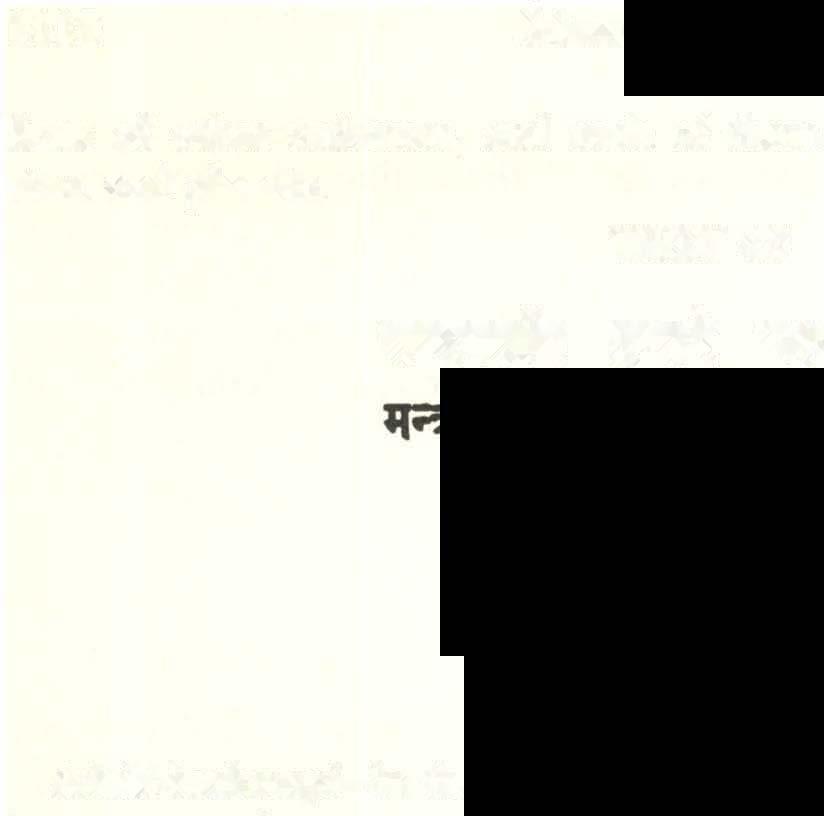
mantra-lingair vyavacchinnarh bhajanto na vidu� param
sabda-brahmari-in the Vedic literature; du�piire- unlimited; caranta�being engaged; uru-greatly; vistare-expansive; mantra-of Vedic hymns; lingai{t-by the symptoms; vyavacchinnam-partially powerful (the demigods); bhajanta�- worshiping; na vidu�- they do not know; param- the Supreme.

TRANSLATION
Despite the cultivation of Vedic knowledge, which is unlimited, and the worship of different demigods by the symptoms of Vedic mantras, demigod worship does not help one to understand the Supreme Powerful Personality of Godhead.
PURPORT
As stated in Bhagavad-gttii:


kiimais tais tair hrta-jfiiiniif:t
prapadyante 'nya-devatiif:t
tarh tarh niyamam iisthiiya prakrtyii niyatiif:t svayii
"Those whose minds are distorted by material desires surrender unto demigodsand follow the particular rules and regulations of worship according to their own natures." (Bg. 7.20)
Most people are interested in worshiping demigods to acquire powers. Each demigod has a particular power. For instance, the demigod Indra, the King of heaven, has power to shower rain on the surface of the globe to give sufficient vegetation to the earth. This demigod is described in the Vedas: vajra-hasta� purandara�. lndra rules the water supply with a thun-
1418 Srimad-Bhagavatam [Canto 4, Ch. 29
derboltinhis hand. The thunderbolt itself is controlled by Indra. Similarly, other demigods-Agni, Varul).a, Candra, Surya-have particular powers. All these demigods are worshiped in the Vedic hymns through a symbolic weapon. Therefore it is said here: mantra-lingair vyavacchinnam. By such worship, karmis may obtain the benediction of material opulence in the form of animals, riches, beautiful wives, many followers, and so on. By such material opulence, however, one cannot understand the Supreme Personality of Godhead.
TEXT 46

yada yasyanugrhrpiti bhagavan atma-bhavita[t sa jahati matim loke vede ca parini�.thitam
yada-when; yasya- whom ; anug[hT}titi-favors by causeless mercy; bhagavan-the Supreme Personality of Godhead; atma-bhavita[t-realized by a devotee; sa , h-such a devotee; jahati-gives up; matim-consciousness; lakein the material world; vede-in the Vedic functions; ca-also;parini�_thitam -fixed.
TRANSLATION
When a person is fully engaged in devotional service, he is favored by the Lord, who bestows His causeless mercy. At such a time, the awakened devotee gives up all material activities and ritualistic performances mentioned in the Vedas.
PURPORT
In the previous verse, those who are in knowledge have been described as unable to appreciate the Supreme Personality of Godhead. Similarly, this verse indicates that those who are followers of the Vedic rituals, as well as those who are followers of fruitive activities, are unable to see the Supreme Personality of Godhead. In these two verses both the karmis and jnanis are described as unfit to understand Him. As described by Srila Rupa Gosvami, only when one is completely free from mental speculation and fruitive activity (anyabhiltifiita-sunyam jnana-karmady-anavrtam) can one engage in pure devotional service without being polluted Ly material

Text 46) Talks Between Narada and King Pracinabarhi 1419
� ���liM �•lctl"'l�¥t¥ttf�: I
��'If«����qftf.tfU\11(������
desires. The significant word atma-bhavitaft indicates that the Lord is awakened in one's mind if one constantly thinks of Him. A pure devotee is always thinking of the lotus feet of the Lord (sa vai manaft kH'!apadaravindayoft). A pure devotee cannot remain a moment without being absorbed in thoughts of the Supreme Personality of Godhead. This constantthinkingofthe Lordis described in Bhagavad-gita as satata-yuktanam, always engaging in the Lord's service. Bhajatam priti-pilrvakam: this is devotional service in love and affection. Because the Supreme Personality of Godhead dictates to the pure devotee from within, the devotee is saved from all material activities. Even the Vedic ritualistic ceremonies are considered material activities because by such activities one is simply elevated to other planetary systems, the residential abodes of the demigods. Lord Kr�I}a says in Bhagavad-gita:
yanti deva-vrata devan pit[n yanti pitr-vrataft bhiltani yanti bhiltejya yanti mad-yiijino 'pi miim

"Those who worship the demigods will take birth among the demigods; those who worship ghosts and spirits will take birth among such beings; those who worship ancestors go to the ancestors; and those who worship Me will live with Me." (Bg. 9.25)

The word atma-bhavitaft also indicates that a devotee is always engaged in preaching to deliver conditioned souls. It is said of the six Gosvamis: ruina-siistra-vicarar-aika-nipurwu sad-dharma-samsthiipakau lokaniim hitakarir-au. A pure devotee of the Supreme Personality of Godhead is always thinking of how fallen conditioned souls can be delivered. The Supreme Personality of Godhead, influenced by the merciful devotees' attempt to deliver fallen souls, enlightens the people in general from within by His causelessmercy. If a devotee is benedicted by another devotee, he becomes freefrom karma-kiir-pa and jiiiina-kiir-pa activities. As confirmed in Brahmasamhita, vede�u durlabham: the Supreme Personality of Godhead cannot be realized through karma-kar-pa and jiiiina-kar-pa. Adurlabham iitmabhaktau: the Lord is realized only by a sincere devotee. This materialworld, thecosmicmanifestation, is created by the Supreme Personality of Godhead, and the living entities have come here to enjoy themselves. The Vedic instructions guide them according to different regulative principles, andintelligent people take advantage of these instructions. They thusenjoymaterial lifewithoutbeing disturbed. This is actually illusion, and to get out of this illusion by one's own endeavor is very

1420 Srimad-Bhagavatam [Canto 4, Ch. 29
difficult. The general populace is engaged in material activities, and when people are a little advanced, they become attractedby the ritualistic ceremonies mentioned in the Vedas. However, when one is frustrated in the performance of these ritualistic ceremonies, he again comes to material activities. In this way both . the followers of the Vedic rituals and the followers of material activities are entangled in conditional life. These people get the seed of devotional service only by the good will of the guru and Kr�!la. This is confirmed in Caitanya-caritamrta: guru-kr�r-aprasiide piiya bhakti-latii-btja.
When one is engaged in devotional service, he is no longer attracted to material activities. When a man is covered by different designations, he cannot engage in devotional service. One has to become freed from such designative activities (sarvopiidhi-vinirmuktam) and become pure in order to serve the Supreme Personality of Godhead through purified senses. Hr�tker;ta hr.stkesa-sevanarh bhaktir ucyate: the service of the Lord through purified senses is called bhakti-yoga or devotional service. The sincere devotee is always helped by the Supersoul, who resides within the heart of every living entity,as Lord Kr�!la confirms in Bhagavad-gttii:

te�iirh satata-yuktiiniirh
bhajatiirh prtti-purvakam
dadiimi buddhi-yogarh tam
yena miim upayiinti te
"To those who are constantly devoted and worship Me with love, I give the understanding by which they can come to Me." (Bg. 10.10)
Thisisthestageofbecomingfreefrom the contamination of the material world. At such a time a devotee makes friends with another devotee, and his engagement in material activities ceases completely. At that time,he attains the favor of the Lord and loses his faith in material civilization, which begins with varr-asrama-dharma. Sri Caitanya Mahaprabhu speaks clearly of one's becoming liberated from the varr-asrama-dharma, the most exalted system of human civilization. At such a time one feels himself to be perpetually the servant of Lord Kr�!la, a position taken by SriCaitanya Mahaprabhu Himself.
niiharh vipro na ca nara-patir niipi vaisyo na sudro
niiharh varr-t na ca grha-patir no vana-stho yatir vii'
kintu prodyan nikhila-paramiinanda-purr-amrtabdher
gopt-bhartufl pada-kamalayor diisa-diisiinudiisafl
(Padyiivalt 63)
Text 46] Talks Between Narada and King Praclnabarhi 1421
"I am not a briihmara, kfiatriya, vaiSya or sudra. I am not a brahmaciirt, grhastha, viinaprastha or sannyiist. What am I? I am the eternal servant of the servant of the servant of Lord J<.r�J)a." Through the disciplic succession, one can attain this conclusion, which is perfect elevation to the transcendental platform.
TEXT 47


64tl�ij
;rf(\¥4'5((11wtli(�IP-8! I


� �: �wf{tcqw:t�\0! 11�\911
tasmiit karmasu barhifimann ajfiiiniid artha-kiis(su miirtha-dr.s.tirh krthiift srotrasparSifiV aspr.s.ta-vastufiu
tasmiit-therefore; karmasu-in fruitive activities; barhifiman-0 King Pracinabarhi�at; ajniiniit-out of ignorance; artha-kiisifiu-in the matter of glittering fruitive result; mii-never; artha-dr.s.tim- considering as the aim of life; krthiift-do; srotra-sparsi_su-pleasing to the ear; asprfi. ta-without touching; vastu}u-real interest.
TRANSLATION
My dear King Barh�man, you should never out of ignorance take to the Vedic rituals or to fruitive activity, which may be pleasing to hear about or which may appear to be the goal of self-interest. You should never take these to be the ultimate goal of life.
PURPORT
In Bhagavad-gttii it is said:
yam imiirh pufipitiirh viicarh
pravadanty avipascitaft
veda-viida-ratiift piirtha
niinyad asttti viidinaft
kiimiitmiinaft svarga-parii
janma-karma-phala-pradiim kriyii-visefia-bahuliirh
bhogaisvarya-gatirh prati

1422 Srimad-Bhagavatam [Canto 4, Ch. 29
"Men of small knowledge are very much attached to the flowery words of the Vedas, which recommend various fruitive activities for elevation to heavenly planets, resultant good birth, power, and so forth. Being desirous of sense gratification and opulent life, they say that there is nothing more than this." (Bg. 2.42-43)

Generally people are very much attracted to the fruitive activities sanctioned in the Vedic rituals. One may be very much attracted to becoming elevated to heavenly planets by performing great sacrifices, like those of King Barhi�man. Sri Niirada Muni wanted to stop King Barhi�man from engaging in such fruitive activities. Therefore he is now directly telling him, "Don't be interested in such temporary benefits." In modern civilization people are very much interested in exploiting the resources of material nature through the methods of science. Indeed, this is considered advancement. This is not actually advancement, however, but is simply pleasing to hear. Although we are advancing according to such concocted methods, we are nonetheless forgetting our real purpose. Bhaktivinoda Thakura therefore says: ja�a-vidyii yata miiyiira vaibhava tomiira bhajane biidhii. "Materialistic studies are the glare of miiyii only, for they are an obstacle to spiritual progress."
The temporary comforts of life experienced either on this planet or on other planets are all to be taken as illusory because they do not touch the real purpose of life. The real purpose of life is to go back home, back to Godhead. Ignorant of the real purpose of life, people take to either gross materialistic activities or ritualistic activities. King Barhi�man is herein requested not to be attached to such activities. In the Vedas it is stated that the performance of sacrifice is the actual purpose of life. A section of the Indian population known as the Arya Samajists lay too much stress on the sacrificial portion of the Vedas. This verse indicates, however, that such sacrifices are to be taken as illusory. Actually the aim of human life should be God realization, or Kg;t;J.a consciousness. The Vedic performances are, of course, very glittering and pleasing to hear about, but they do not serve the real purpose of life.
Text 48] Talks Between Narada and King Pracinabarhi 1423
TEXT48 �� .. �����:1 � it'< ijCfi�Efi44(1flGJ 11\l�ll
svam lokarh na vidus te vai yatra devo janiirdana[l.
svam-own; lokam-abode; na-never; vidu[l-know; te-such persons; vai-certainly; yatra-where; deva[l-the Supreme Personality of Godhead; janiirdanafl.-1\.r�pa or Vi�pu; 1i hu� -speak; dhumra-dhiyafl,-the less intelligent class of men; vedam-the four Vedas; sa-karmakam-full of ritualistic ceremonies; a- tat- vidafl,-persons who are not in knowledge.
TRANSLATION
Those who are less intelligent accept the Vedic ritualistic ceremonies as all in all. They do not know that the purpose of the Vedas is to understand one's own home, where the Supreme Personality of Godhead lives. Not being interested in their real home, they are illusioned and search after other homes.
PURPORT

Generally people are not aware of their interest in life-to return home, back to Godhead. People do not know about their real home in the spiritual world. 1n the spiritual world there are many Vaikul)tha planets, and the topmost planet is Kr�l)aloka, Goloka Vrndavana. Despite the so-called advancement of civilization, there is no information of the Vaikul)thalokas, the spiritual planets. At the present moment so-called advanced civilized men are trying to go to other planets, but they do not know that even if they go to the highest planetary system, Brahmaloka, they have to come back again to this planet. This is confirmed in Bhagavad-gttii:
iibrahma-bhuvaniil lokiifl, punar iivartino 'rjuna miim upetya tu kaunteya punar janma na vidyate
"From the highest planet in the material world down to the lowest, all are places of misery wherein repeated birth and death take place. But one who attains to My abode, 0 son of Kunti, never takes birth again." (Bg. 8.16)
If one goes to the highest planetary system within this universe he still has to return after the effects of piousactivities are finished. Space vehicles may go very high in the sky, but as soon as their fuel is finished, they have to return to this earthly planet. All these activities are performed in illusion. The real attempt should now be to return home, back to Godhead. The process
1424
iihur dhumra-dhiyo vedam sakarmakam atad-vida[l [Canto 4, Ch. 29
Srimad-Bhagavatam
is mentioned in Bhagavad-gitii. Yiinti mad-yiijino 'pi miim: those who engage in the devotional service of the Supreme Personality of Godhead return home, back to Godhead. Human life is very valuable, and one should not waste it in vain exploration of other planets. One should be intelligent enoughto return to Godhead. One should be interested in information about the spiritual Vaikut;J.tha planets, and in particular the planet known as Goloka Vrndavana, and should learn the art of going there by the simple method of devotional service, be nning with hearing (srava[larh kirtanarh vi.fl!'-ofl). This is also confirmed in Srimad-Bhiigavatam:


kaler do�a-nidhe riijann
asti hy eko mahiin gu[la{l kirtaniid eva k[�[lasya
mukta-sanga{lpararh vrajet (Bhiig. 12.3.51)
One can go to the supreme planet (pararh vrajet) simply by chanting the Hare Kr�J?a mantra. This is especially meant for the people of this age (kaler do.sa-nidhe). It is the special advantage of this age that simply by chanting the Hare Krwa mahii-mantra one can become purified of all material contamination and return home, back to Godhead. There is no doubt about this.
iistirya darbhai{l priig-agrai{l

kiirtsnyena kfliti-ma[l_p.alam
stabdho brhad-vadhiin miini
karma niivaifli yatparam
tat karma hari-toflarhyat
sii vidyii tan-matir yayii
iistirya-having covered; darbhai{l-by kusa grass; priik-agrai{l -with the points facing east; kiirtsnyena- altogether; k�iti-ma!'-9-alam-the surface of the world; stabdha{l-proud upstart; brhat-great; vadhiit-by killing; miini -thinking yourself very important; karma-activity; na avaifli-you do not know; yat-which; param-supreme; tat-that; karma-activity; hari-
Text 49] Talks Between Narada and King Pracinabarhi 1425
mtti:••�wwftlRI&Na'( 1
USII�'Ir.ft�� � I ��mm �m fctm ��q{ 11'1�11
TEXT49 ••�4�:
�
tofiam-satisfying the Supreme Lord; yat- which; sa -that ; vidya- education; tat-unto the Lord; mati!z-consciousness;yaya- by which.
TRANSLATION
My dear King, the entire world is covered with the sharp points of kusa grass, andon the strength of this you have become proud because you have killed various types of animals in sacrifices. Because of your foolishness, you do not know that devotional service is the only way one can please the Supreme Personality of Godhead. You cannot understand this fact. Your only activities should be those that can please the Personality of Godhead. Our education should be such that we can become elevated to Kr�t;J.a consciousness.
PURPORT
In this verse the great sage Narada Muni directly insults the King because he was engaged in performing sacrifices that entail the killing of a great number of animals. The King was thinking that he was great for having performed so many sacrifices, but the great sage Narada directly chastises him, informing him that his animal killing only leads to his being puffed up with false prestige. Actually anything that is done which does not lead to Kr�t;J.a consciousness is a sinful activity, and any education that does not lead one to understand Kr�t;J.a is false education. If Kr�t;J.a consciousness is missing, one is simply engaged in false activities and false educational pursuits.
TEXT 50


�
� SliRtUJfi�: I
ij�IC(&((if � �: � idll� ll�oll

harir deha-bhrtam iitmii
svayarh prakrtir tsvara�

tat-piida-miilarh sararwm
yata� k,semo nrruim iha
hari�-Sri Hari; deha-bhrtiim-of living entities who have accepted material bodies; atma-the Supersoul; svayam-Himself; prakr ti!z-material nature; isvara�- the controller; tat- His; pada-mulam- feet; sararamshelter; yata�- from which; k ,sema�- good fortune; nrram-of men; ihain this world.
1426 Srimad-Bhagavatam [Canto 4, Ch. 29
Sri Hari, the Supreme Personality of Godhead, is the Supersoul and guide of all living entities who have accepted material bodies within this world. He is the supreme controller of all material activities in material nature. He is also our best friend, and everyone should take shelter at His lotus feet. In doing so, one's life will be auspicious.
PURPORT

In Bhagavad-gttii it is said:
tsvara{L sarva-bhutiiniirh hrd-dese 'rjuna t�.thati bhriimayan sarva-bhutiini yantriiru�hiini miiyayii
"The Supreme Lord is situated in everyone's heart, 0 Arjuna, and is directing the wanderings of all living entities, who are seated as on a machine, made of the material energy." (Bg. 18.61)
The living entity is within the body, and the Supersoul, the Supreme Personality of Godhead, is also there. He is called antaryiimt and caityaguru. As Lord Kr�r;ta states in Bhagavad-gttii, He is controlling everything.
sarvasya ciiharh hrdi sannivi�.to mata{L smrtir jiiiinam apohanarh ca vedaiS ca sarvair aham eva vedyo vediinta-krd veda-vid eva ciiham
"I am seated in everyone's heart, and from Me come remembrance, knowledge andforgetfulness. By all the Vedas, I am to be known; indeed I am the compiler of Vedanta, and I am the knower of the Vedas." (Bg. 15.15)
Everything is being directed by the Supersoul within the body; therefore the better part of valor is to take His direction and be happy. To take His directions,oneneeds tobe a devotee, and thisis also confirmed in Bhagavadgttii.
te�arh satata-yuktanarh
bhajatarh prtti-purvakam
dadami buddhi-yogarh tam
yena mam upayiinti te
Text 50] Talks Between Narada and King Pracinabarhi 1427
TRANSLATION
"To those who are constantly devoted and worship Me with love, I give the understanding by which they can come to Me." (Bg. 10.10) Although the Supersoul is in everyone's heart (tsvara� sarva-bhiitaniirh hrd-dese 'rjuna t�.thati), He talks only to the pure devotees who constantly engage in His service. In Caitanya-bhagavata it is said:
tahare se bali vidya, mantra, adhyayana kr.sr-a-pada-padme ye karaye sthira mana


"One who has fixedhis mind on the lotus feet of Kr�9a is to be understood as having the best education and as having studied all the Vedas." (Cb. Antya 3.45) There are also other appropriate quotes in Caitanya-bhagavata:
sei se vidyara phala janiha niscaya kr.sr-a-pada-padme yadi citta-vrtti raya
"The perfect result of an education is the fixing of one's mind on the lotus feet of Kr�Q.a." (Cb. Adi 13.178)
'dig-vijaya kariba,'- vidyiira kiirya nahe tsvare bhajile, sei vidya 'satya'kahe
"Conquering the world by means of material education is not desirable. If one engages himself in devotional service, his education is perfected." (Cb. Adi 13.173)
pape kene loka--knTJa-bhakti janibare se yadi nahila, tabe vidyiiya ki kare
"The purpose of education is to understand Krsna and His devotional service. If one does not do so, then education is false." (Cb. Adi 12.49)
tiihiire se bali dharma, karma sadaciira tsvare se prtti janme sammata sabiira
"Being cultured, educated, very active and religious means developing natural love for Kw].a." (Cb. Antya 3.44) Everyone has dormant love for Kr�I}a, and by culture and education that has to be awakened. That is the purpose of this Kr�I}a consciousness movement. Once Lord Caitanya asked SriRamananda Raya what the best part of education was, and Ramananda

1428 Srimad-Bhagavatam [Canto 4, Ch. 29
Raya replied that the best part of education is advancement in Kr�I].a consciousness.
TEXT 51

6 � fii�Hfillillffll� il 4t�illli4fq I
�-C: 6 �fiii:Ftq)Ru-f.6 �: II��II
sa vai priyatamas ciitmii yato na bhayam a[tv api iti veda sa vai vidviin yo vidviin sa gurur hari[t
saft-He; vai-certainly; priya-tamaft-the most dear; ca-also; iitmiiSupersoul; yata{t-from whom; na-never; bhayam-fear; a[tu- little; apieven; iti- thus; veda-(one who) knows; saft-he; vai-certainly ; vidviineducated;yaft-he who; vidviin- educated; saft-he; guruft- spiritual master; harift-not different from the Lord.
TRANSLATION
One who is engaged in devotional service has not the least fear in material existence. This is because the Supreme Personality of Godhead is the Supersoul and friend of everyone. One who knows this secret is actually educated, and one thus educated can become the spiritual master of the world. One who is an actually bona fide spiritual master, representative of Kr�I].a, is not different from Kr�I].a.
PURPORT
Srila Visvanatha Cakravarti Thakura says: siikfiiid-dharitvena samastasastrair uktas tathii bhiivyata eva sadbhift. The spiritual master is described in every scripture as the representative of the Supreme Personality of Godhead. The spiritual master is accepted as identical with the Supreme Personality of Godhead because he is the most confidential servant of the Lord (kintu prabhor ya[t priya eva tasya). The purport is that both the Supersoul and the individual soul are very dear to everyone. Everyone loves himself, and when he becomes more advanced, he loves the Supersoul also. A person who is self-realized does not recommend the worship of anyone but the Supersoul. He knows that to worship the
Text 51] Talks Between Niirada and King Pracinabarhi 1429
Supreme Personality of Godhead is easier than to worship various demigods under the influence of lust and the desire for material enjoyment. The devotee is therefore always engaged in the loving devotional service of the Lord. Such a person is a true guru. In Padma Puriir-a it is said:
�af-karma-nipuT,lO vipro mantra-tantra-visiiradaf!.
avaiHtavo gurur na syiid vai�r-avaf!. sva-paco guruf!.
"Even if a briihmar-a is very learned in Vedic scriptures and knows the six occupational duties of a briihmar-a, he cannot become a guru or spiritual master unless he is a devotee of the Supreme Personality of Godhead. However, if one is born in a family of dog-eaters but is a pure devotee of the Lord, he can become a spiritual master." The conclusion is that one cannot become a spiritual master unless he is a pure devotee of the Lord. One who is a spiritual master in accordance with the above descriptions of devotional service is to be understood as the Supreme Personality of Godhead personally present. According to the words mentioned here (gurur hari� ), consulting a bona fide spiritual master means consulting the Supreme Personality of Godhead personally. One should therefore take shelter of such a bona fide spiritual master. Success in life means accepting a spiritual master who knows J<rppa as the only supreme beloved personality. One should worship such a confidential devotee of the Lord.
TEXT 52



!At f(ii " 9ft 1m�: - I 3N it�� f.t�l+tt�

nr"irada uviica
prasna evam hi sanchinno bhavataf!. puru�ar.sabha atra me vadato guhyam
ni§iimaya suniScitam
niiradaf!. uviica- N arada said;pra§na�-question;evam-thus;hi-certainly; sanchinnaf!.-answered ; bhavata[i-your; puru�a-r�abha-0 great personality; atra-here; me vadataf!.-as I am speaking; guhyam- confidential; niSiimaya- hear; su-niscitam- perfectly ascertained.
1430 Srimad-Bhagavatam [Canto 4, Ch. 29
���
�� ������
The great saint Narada continued: 0 great personality, I have replied properly about all that you have asked me. Now hear another narration that is accepted by saintly persons and is very confidential.
PURPORT
Sri Narada Muni is personally acting as the spiritual master of King Barhi�miin. It was Narada Muni's intention that through his instructions the King would immediately give up all engagement in fruitive activity and take to devotional service. However, although the King understood everything, he was still not prepared to give up his engagements. As the following verses will show, the King was contemplating sending for his sons, who were away from home executing austerities and penances. After their return, he would entrust his kingdom to them and then leave home. This is the position of most people. They accept a bona fide spiritual master and listen to him, but when the spiritual master indicates that they should leave home and fully engage in devotional service, they hesitate. The duty of the spiritual master is to instruct the disciple as long as he does not come to the understanding that this materialistic way of life, fruitive activity, is not at all beneficial. Actually one should take to devotional service from the beginning of life, as Prahlada Maharaja advised: kaumiira iicaret priijno dharmiin bhiigavatiin iha (Bhiig. 7.6.1). According to all the instructions of the Vedas, we can understand that unless one takes to Kreyqa consciousness and devotional service, he is simply wasting his time engaging in the fruitive activities of material existence. Niirada Muni therefore decided to relate another allegory to the King so that he might be induced to give up family life within material existence.

Text 53] Talks Between Narada and King Pracinabarhi 1431
TRANSLATION
TEXT 53 �tat«�m�f�'«Cll �'RffiiUiftlqti�I " Q '!ifilifij�S�iiUIU4 � riJPf��WIIOiilt'ilt{ ll'-\�11 k§udran cararh
raktarh .safl-anghri-gapa-siimasu lubdha-karpam
sumanasarh saraT)e mithitva
agre vrkiin asu-trpo 'vigaT}-ayya yiintarh
P!�!he mrgarh mrgaya lubdhaka-bii[ta-bhinnam
k�udram-on grass; caram- grazing; sumanasiim-of a beautiful flower garden; sarar-e-undertheprotection; mithitvii-being united with a woman; raktam-attached; .sa_t-anghri-of bumblebees; gar-a-of groups; siimasu-to the singing; lubdha-karr-am-whose ear is attracted; agre-in front; vrkiintigers; asu-trpaft-who live at the cost of another's life; avigar-ayya-neglecting; yiintam-moving; Pr. s . the-behind; mrgam-the deer; mrgayasearch out; lubdhaka-of a hunter; bar-a-by the arrows; bhinnam-liable to be pierced.

TRANSLATION
My dear King, please search out that deer who is engaged in eating grass in a very nice flower garden along with his wife. That deer is very much attached to his business, and he is enjoying the sweet singing of the bumblebees in his garden. Just try to understand his position. He is unaware that before him is a tiger which is accustomed to living at the cost of another's flesh. Behind the deer is a hunter, who is threatening to pierce him with sharp arrows. Thus the deer's death is imminent.
PURPORT
Here is an allegory in which the King is advised to find a deer that is always in a dangerous position. Although threatened from all sides, the deer simply eats grass in a nice flower garden, unaware of the danger all around him. All living entities, especially human beings, think themselves very happy in the midst of families. As if living in a flower garden and hearing the sweet humming of bumblebees, everyone is centered around his wife, who is the beauty of family life. The bumblebees' humming may be compared to the talk of children. The human being, just like the deer, enjoys his family without knowing that before him is the factor of time, which is represented by the tiger. The fruitive activities of a living entity simplycreateanotherdangerouspositionandoblige him to accept different types of bodies. For a deer to run after a mirage of water in the desert is not unusual. The deer is also very fond of sex. The conclusion is that one who lives like a deer will be killed in due course of time. Vedic literatures therefore advise that we should understand our constitutional position and take to devotional service before death comes. According to the Bhiigavatam:
1432 Srimad-Bhagavatam [Canto 4, Ch. 29
labdhviisudurlabhamidambahu-sambhaviinte miinu�yamarthadamanityamapthadhtra�
turrwmyatetanapatedanumrtyuyiivan n*sreyasayavi�aya�khalusarvata�syiit (Bhiig. 11.9.29)

After many births we have attained this human form; therefore before death comes, we should engage ourselves in the transcendental loving serviceofthe Lord. Thatisthefulfillmentofhumanlife.
TEXT
�pcT•:ttti;:JlS"tt:�. crofft�RI ttfil¥t¥tk¥tl� �'l �41«4
S(t!¥t(4\Rr 11'-\\lll
sumana[t-sama-dharmar-am strt[liirh sarar-a iiSrame pu.spa-madhugandhavat k.sudratamam kiimya-karma-vipiikajam kiima-sukha-lavam jaihvyaupasthyiidi vicinvantam mithuni-bhuyatad-abhinivesita-manasam .sa!i-anghri-gal)a-siima-gita-vadati-manohara-vanitiidi-janiiliipeflVatitarcimatipralobhita-karr-amagrevrka-yuthavadatmanaiiyurharato'ho-riitriintiin kiila-lava-viSe.siin aviga1fayya grhe�u viharantani pr.s.thata eva parok.sam anupravrttolubdhalca[tkrtiinto 'nta[l sarerwyam ihapariividhyatitam imamiitmiinamahoriijanbhinna-hrdayamdra.s.tumarhasiti.
sumana[t-flowers; sama-dharmar-iim-ex actly like; str(niim-of women; sarar-e-in the shelter; iisrame-household life; puflpa-in flowers; madhu-





Text 54] Talks Between Nirada and King Pracinabarhi
1433
��
ff4M;q�"'��
,. 'twtl,(itMttl�wtR�I�'itMtt(t'tMstitfilttEPfq� mectfft�•nww�•taturm�
�
54 WR: Q'tii.ttiulf �f � �
"fitRidfftqt'fNi ��iil«�q�
'RfWttut(uq•ftttctd(t-
wr
.::)
of honey; gandha-the flavor;vat-like;k}udra-tamam-most insignificant; kiimya-desired; karma-of activities; vipaka-jam-obtained as a result; kama-sukha-of sense gratification;lavam-a fragment;jaihvya-enjoyment of the tongue;aupasthya-sex enjoyment;iidi-beginning with;vicinvantam -always thinking of;mithunt-bhuya-engaging in sex life;tat-in his wife; abhinivesita-always absorbed;manasam-whose mind;}a.t-anghri-of bumblebees; gazw-of crowds; sama-gentle;gtta-the chanting; vat-like; ativery; manohara-attractive; vanita-adi-beginning with the wife; jana-of people; alape}u-to the talks; atitaram-excessively; ati-very much; pralobhita-attracted;karrtam-whose ears;agre-in front;vrka-yutha-a group of tigers; vat-like; atmana�-of one's self; ayu�-span of life; harata�taking away; aha�-ratran-days and nights; tan-all of them; kala-lavavise.san-the moments of time; av,gartayya-without considering; grhe}Uin household life; viharantam-enjoying; Pr.s.thata�-from the back; eva -certainly;parok.sam-without being seen;anupravrtta�- following behind; lubdhaka�-the hunter;krta-anta�-the superintendent of death;anta�-in the heart;sarerta-by an arrow;yam-whom;iha-in this world;paravidhyati -pierces; tam-that; imam-this; atmanam-yourself; aho rajan-0 King; bhinna-hrdayam-whose heart is pierced; dra.s.tum-to see; arhasi-you ought; iti-thus.
TRANSLATION
My dear King, woman, who is very attractive in the beginning hut in the end very disturbing, is exactly like the flower, which is attractive in the beginning and detestable at the end. With woman, the living entity is entangled with lusty desires and sex. He thus enjoys a life of sense gratification-from his tongue to his genitals-and in this way the living entity considers himself very happy in family life. United with his wife, he always remains absorbed in such thoughts. He feels great pleasure in hearing the talks of his wife and children, which are like the sweet humming of humblebees that collect honey from flower to flower. He forgets that before him is time, which is taking away his life span with the passing of day and night. He does not see the gradual diminishing of his life, nor does he care about the superintendent of death, who is trying to kill him from behind. Just try to understand this. You are in a precarious position and are threatened from all sides.
PURPORT
Materialistic life means forgetting one's constitutional position as the eternal servant of K��f!a, and this forgetfulness is especially enhanced in the grhastha-asrama. In the grhastha-asrama a young man accepts a young wife who is very beautiful in the beginning, but in due course of time,

1434 Srimad-Bhagavatam [Canto 4, Ch_ 29
after giving birth to many children and becoming older and older, she demands many things from the husband to maintain the entire family. At such a time the wife becomes detestable to the very man who accepted her in her younger days. One becomesattached to the grhastha-asrama for two reasons only-the wife cooks palatable dishes for the satisfaction of her husband's tongue, and she gives him sexual pleasure at night. A persop attached to the grhastha-asrama is always thinking of these two thingspalatablefoodand sexenjoyment. The talks of the wife, which are enjoyed as a family recreation, and the talks of the children both attract the living entity. He thus forgets that he has to die someday and has to prepare for the next life if he wants to be put into a congenial body.
Thedeerintheflowergardenisan allegoryused by the great sage Narada to point out to the King that the King himself is similarly entrapped by such surroundings. Actually everyone is surrounded by such a familylife, which misleads one. The living entity thus forgets that he has to return home, back to Godhead. He simply becomes entangled in family life.
Prahlada Maharaja has therefore hinted: hitvatma-patarh grham andhakiipam vanamgato yad dharim asrayeta. Familylifeisconsideredablindwell (andha-kiipam) into which a person falls and dies without help. Prahlada Maharaja recommends that while one's senses are there and one is strong enough, he should abandon the grhastha-asrama and take shelter of the lotus feet of the Lord, going to the forest of Vrndavana. According to Vedic civilization, one has to giveup family life at a certain age (the age of fifty),take vanaprastha andeventuallyremainalone as a sannyast. That is the prescribed method of Vedic civilization known as varr-airama-dharma. Whenonetakes sannyasa after enjoyingfamily life, he pleases theSupreme Lord Vi��u.
One has to understand one's position in family or worldly life. That is called intelligence. One should not remain always trapped in family life to satisfy his tongue and genitals in association with a wife. In such a way, one simply spoils his life. According to Vedic civilization, it is imperative togiveupthefamilyatacertain stage, by force if necessary. Unfortunately, so-calledfollowers of Vedic life do not give up their familyeven at the end of life, unless they are forced by death. There should be a thorough overhauling of the social system, and society should revert to the Vedic principles, that is, the four varr-as and the four asramas.

Text 55] Talks Between Narada and King Pracinabarhi 1435
� ��"1f��(f'm'i;it�fq�f;rr� ��� �f�� I
TEXT 55
sa tvarh vicak�ya mrga-ce.s.titam iitmano 'nta� cittarh niyaccha hrdi karra-dhuntrh ca citte jahy anganii�ramam asattama-yutha-giitharh prtr-thi harhsa-sarar-arh virama kramer-a
sa�- that very person; tvam-you; vicak�a- considering; mrga-ce.spitamthe activities of the deer; iitmana[l-of the self; anta[l- within; cittamconsciousness; niyaccha-fix; hrdi-in the heart; kar[ta-dhunim-aural reception; ca-and; citte-unto the consciousness; jahi-give up; anganaiiSramam-household life; asat-tama-most abominable; yutha-giithamfull of stories of man and woman; pr�nihi- just accept; harhsa-sararamthe shelter of the liberated souls; virama-become detached; kramer-agradually.
TRANSLATION
My dear King, just try to understand the allegorical position of the deer. Be fully conscious of yourself and give up the pleasure of hearing about promotion to heavenly planets by fruitive activity. Give up household life, which is full of sex, as well as stories about such things, and take shelter of the Supreme Personality of Godhead through the mercy of the liberated souls. In this way, please give up your attraction for material existence.
PURPORT
In one of his songs, Srila Narottama dasa 'fhakura writes:

karma-kiifl!la, jiiiina-kar!la, kevala vi�era bhiir-!la, amrta baliyii yebii khiiya
nana yoni sada phire, kadarya bhakfiara kare, tara janma adha[l-piite yiiya
"Fruitive activities and mental speculation are simply cups of poison. Whoever drinks of them, thinking them to be nectar, must struggle very hard life after life,in different types of bodies. Such a person eats all kinds of nonsense and becomes condemned by his activities of so-called sense enjoyment."
1436 Srimad-Bhagavatam [Canto 4, Ch. 29
�q�� � «t\r(oj fcm{ m ������
People are generally enamored of the fruitive results of worldly activity and mental speculation. They generally desire to be promoted to heavenly planets, merge into the existence of Brahman, or keep themselves in the midst of family life, enchanted by the pleasures of the tongue and genitals. The great sage Narada clearly instructs King Barhi�man not to remain his entire life in the grhastha-asrama. Being in the grhastha-asrama means being under the control of one's wife. One has to give up all this and put himself into the asrama of the paramahamsa, that is, put himself under the control of the spiritual master. The paramahamsa-asrama is the asrama of the Supreme Personality of Godhead, under whom the spiritual master has taken shelter. The symptoms of the bona fide spiritual master are stated in Srimad-Bhiigavatam:
tasmad gurum prapadyeta
jijnasu[L sreya uttamam sabde pare ca ni,sr-atam
brahmar-y
upasamasrayam
"Any person who is seriously desirous of achieving real happiness must seek out a bona fide spiritual master and take shelter of him by initiation. The qualification of a spiritual master is that he must have realized the conclusion of the scriptures by deliberation and arguments and thus be able to convince others of these conclusions. Such great personalities who have taken complete shelter of the Supreme Godhead, leaving aside all material considerations, are to be understood as bona fide spiritual masters." (Bhiig. 11.3.21)
A paramahamsa is one who has taken shelter of the Parabrahman, the Supreme Personality of Godhead. If one takes shelter of the paramahamsa spiritual master, gradually, through training and instruction, he will become detached from worldly life and ultimately return home, back to Godhead. The particular mention of anganasramam asattama-yiltha-gatham is very interesting. The whole world is in the clutches of maya, being controlled by woman. Not only is one controlled by the woman who is one's wife, but one is also controlled by so many sex literatures. That is the cause of one's being entangled in the material world. One cannot give up this abominable association through one's own effort, but if one takes shelter of a bona fide spiritual master who is a paramahamsa, he will gradually be elevated to the platform of spiritual life.
The pleasing words of the Vedas that inspire one to elevate oneself to theheavenlyplanets or merge into the existence of the Supreme are for the

Text 55] Talks Between Nirada and King Pracinabarhi 1437
less intelligent who are described in Bhagavad-gtta as mayayiipahrta-jfiana� (those whose knowledgeis taken away by the illusory energy). Real knowledge means understanding the miserable condition of material life. One should take shelter of a bona fide liberated soul, the spiritual master, and gradually elevate himself to the spiritual platform andthus become detached fromthe material world. According to Srila Visvanatha Cakravarti 'fhakura, harhsa-sararam refers to the cottage in which saintly persons live. Generally asaintly person lives in a remote place in the forest or in a humble cottage. However, we should note that the times have changed. It may be beneficial for a saintly person's own interest to go to the forest and live in a cottage, but if one becomes a preacher, especially in Western countries, he has to invite many classes of men who are accustomed to living in comfortable apartments. Therefore in this age a saintly person has to make proper arrangements to receive people and attract them to the message of Kr�!fa consciousness, SrTia Bhaktisiddhanta Sarasvati 'fhakura, perhaps for the first time, introduced palatial buildings and motor cars for the residence of saintly persons just to attract the general public in big cities. The main fact is that one has to associate with a saintly person. In this age people are not going to search out a saint in the forest, so the saints and sages have to come to the big cities to make arrangements to receive the people in general, who are accustomed to the modern amenities of material life. Gradually such persons will learn that palatial buildings or comfortable apartments are not at all necessary. The real necessity is to become free from material bondage in whatever way possible. According to the orders of Srna Rupa Gosvami:

anasaktasya vi_sayan yatharham upayunjata� nirbandha� kr.sra-sambandhe yuktarh vairagyam ucyate
"When one is not attached to anything, but at the same time accepts everythingin relationto Kr�!fa, oneis rightly situated above possessiveness."
One should not be attached to material opulence, but material opulence may be accepted in the Kr�'!a consciousness movement to facilitate the propagation of the movement. In other words, material opulence may be accepted as yukta-vairagya, that is, for renunciation.
1438 Srimad-Bhagavatam [Canto 4, Ch. 29
(Bh.r.s. 1.2.255)
TEXT 56 ��"'! �;�f�
iflR'llltlffi. t�� I
��A�'{l�Ilfn tt ;r i{_��A� 11����
riijovaca
srutam anvtk,sitarh brahman
bhagavan yad abhii,sata
naitaj jananty upadhyaya[£
kirh na bruyur vidur yadi
raja uvaca-the King said; srutam-was heard; anvtk§itam-was considered; brahman-0 brahma[la; bhagavan-the mostpowerful;yat-which; abha§ata-you have spoken; na-not; etat-this; jananti-do know; upadhyaya[l-the teachers of fruitive activities; kim-why; na bruyu[lthey did not instruct; vidu[l-they understood; yadi- if.
TRANSLATION
The King replied: My dear brahmal).a, whatever you have said I have heard with great attention, and, considering all of it, have come to the conclusion that the acaryas [teachers] who engaged me in fruitive activity did not know this confidential knowledge. If they were aware of it, why did they not explain it to me?

PURPORT
Actually the so-called teachers or leaders of material society do not really know the goal of life. They are described in Bhagavad-gitii as mayayapahrta-jfiana[l. Theyappearto beverylearnedscholars, but actually the influence of the illusory energy has taken away their knowledge. Real knowledge means searching out Kr�J).a.
sarvasya ciiharh hrdi sannivi,sJo
matta[l smrtir jnanam apohanarh ca
vedais ca sarvair aham eva vedyo
vedanta-krd veda-vid eva caham
Text 56] Talks Between Niirada and King Priicinabarhi
1439
"I am seated in everyone's heart, and from Me come remembrance, knowledge and forgetfulness. By all the Vedas, I am to be known; indeed, I am the compiler of Vedanta, and I am the knower of the Vedas." (Bg. 15.15)
All Vedic knowledge is meant for searching out K{�J}.a because Kr�J}.a is the origin of everything. ]anmady asya yata�. In Bhagavad-gita K{�J}.asays:
na me vidu� sura-gapii� prabhavarh na mahar.saya� aham adir hi devanarh mahar.strarh ca sarvasa�
"Neither the hosts of demigods nor the great sages know My origin, for, in every respect, I am the source of the demigods and the sages." (Bg. 10.2)
originandbeginningofalldemigods, including Lord Brahma, Lord Siva and all others. The Vedic ritualistic ceremonies are concerned with satisfying different demigods, but unless one is very advanced, he cannot understand that the original personality is Sri Kr�ra. Govindam adi-purufiarh tam aharh bhajami. After hearing the instructions of Narada, King Barh�man came to his senses. The real goal of life is to attain devotional service to the Supreme Personality of Godhead. The King therefore decided to reject the so-called priestly orders that simply engage their followersinthe ritualistic ceremonies without giving effective instructions about the goal of life. At the present moment the churches, temples and mosques all over the world are not attracting people because foolish priests cannot elevate their followers to the platform of knowledge. Not being aware of the real goal of life, they simply keep their congregation in ignorance. Consequently those who are well educated have become uninterested in the ritualistic ceremonies. At the same time, they are not benefited with real knowledge. This Krwa consciousness movement is therefore very important for the enlightenment of all classes. Following in the footsteps of Maharaja Barhi�man, everyone should take advantage of this Kr�v.aconsciousnessmovement and abandon the stereotyped ritualistic ceremonies that go under the garb of so many religions. The Gosvamis from the very beginning differed from the priestly class that was engaged in ritualistic ceremonies.Indeed, SrilaSanatanaGosvami compiled his Haribhakti-vilasa for the guidance of the Va�J}.avas. The Vai�J}.avas, not caring for the lifeless activities of the priestly classes, take to full Kr�J}.a consciousness and become perfect in this very life. That is described in the previous verse as paramharhsa-sara[tam, taking shelter of the paramharhsa, the liberated soul, and becoming successful in this life.

1440 Srimad-Bhagavatam [ Canto 4, Ch. 29
K{�J}.aisthe
TEXT 57

�� u ij FcrstdMO$\(ij<:� �I ¥fitsfq-ft u�f;:� � �f;.S(�'!*ttt: 11�\911
samsayo 'tra tu me vipra sanchinnas tat-krto mahan r�ayo 'pi hi muhyanti yatra nendriya-vrttaya[t
sanis'ayu�- doubt; atra- here; tu-but; me-my; vipra-0 brahmar-a; san chinna[t- cleared; tat-k,rta[t-done by that; mahan- very great; r.saya[tthe great sages; api- even; hi-certainly; muhyanti-are bewildered; yatrawhere; na-not; indriya-of the senses; v,rttaya[t-activities.
TRANSLATION
My dear brahmai;J.a, there are contradictions between your instructions and those of my spiritual teachers who engaged me in fruitive activities. I now can understand the distinction between devotional service, knowledge and renunciation. I had some doubts about them, but you have now very kindly dissipated all these doubts. I can now understand how even the great sages are bewildered by the real purpose of life. Of course, there is no question of sense gratification.
PURPORT
King Barhi�man was engaged in different types of sacrifice for elevation to the heavenly planets. People generally are attracted by these activities, and very rarely is a person attracted to devotional service, as Sri Caitanya Mahaprabhu confirms. Unless one is very very fortunate, he does not take to devotional service. Even the so-called learned Vedic scholars are bewildered by devotional service. They are generally attracted to the rituals for sense gratification. In devotional service there is no sense gratification but only transcendental loving service to the Lord. Consequently the socalledpriestsengagedin sense gratification do not very much like devotional service. The brahmar-as, the priests, have been against this Kr�l).a consciousness movement sinceit began with Lord Caitanya Mahaprabhu. When Caitanya Mahaprabhu started this movement, the priestly class lodged complaints to the Kazi, the magistrate of the Mohammedan government. Caitanya Mahaprabhu had to lead a civil disobedien�e movement against
Text 57) Talks Between Narada and King Pracinabarhi
1441
the propaganda of the so-called followers of Vedic principles. These people are described as karma-jafla-smiirtas, which indicates that they are priests engaged in ritualistic ceremonies. It is here stated that such people become bewildered (J�ayo 'pi hi muhyanti). To save oneself from the hands of these karma-jafla-smiirtas, one should strictly follow the instructions of the Supreme Personality of Godhead.
sarva-dharmiin parityajya miim ekam sararwm vraja aham tviim sarva-piipebhyo mok�ayi�yiimi mii suca�
"Abandon all vanehes of religion and just surrender unto Me. I shall deliver you from all sinful reaction. Do not fear." (Bg. 18.66)
TEXT 58

karmii[Ly iirabhate yena pumiin iha vihiiya tam amutriinyena dehena ju�.tiini sa yad asnute
karmiir-i-fruitive activities; iirabhate- begins to perform; yena-by which; pumiin-a living entity; iha-in this life; vihiiya- giving up; tamthat; amutra-in the next life; anyena-another; dehena-by a body; ju�.tiini-the results; sa�- he; yat- that; asnute- enjoys.
TRANSLATION
The results of whatever a living entity does in this life are enjoyed in the next life.
PURPORT
A person generally does not know how one body is linked with another body. How is it possible that one suffers or enjoys the results of activities in this body in yet another body in the next life. This is a question the King wants Narada Muni to answer. How may one have a human body in this life and not have a human body in the next? Even great philosophers
1442 Srimad-Bhagavatam [Canto 4, Ch. 29
Ch+il1H"II(.re �;{ �� N� Q� I 31Wtl--�� � � � ��� ����"
and scientists cannot account for the transferral of karma from one body to another. As we experience, every individual soul has an individual body, and one person's activities, or one body's activities, are not enjoyed or suffered by another body or another person. The question is how the activities of one body are suffered or enjoyed in the next.
TEXT 59

iti veda-vida1n vada[l. sruyate tatra tatra ha karma yat kriyate proktam parok�am na prakasate
iti- thus; veda-vidam-of persons who know the Vedic conclusions; vadaft- the thesis; sruyate-is heard; tatra tatra- here and there; ha-certainly; karma-the activity; yat- what; kriyate-is performed; proktam- as it was said; parok�am -unknown ; na praktisate-is not directly manifested.
TRANSLATION
The expert knowers of the Vedic conclusions say that one enjoys or suffers the results of his past activities. But practically it is seen that the body that performed the work in the last birth is already lost. So how is it possible toenjoy or suffer the reactionsof that work in a different body?
PURPORT
Atheists want evidence for the resultant actions of past activities. Therefore they ask, "Where is the proof that I am suffering and enjoying the resultant actions of past karma?" They have no idea how the subtle body carries the results of the present body's actions down to the next gross body. The present body may be finished grossly, but the subtle body is not finished; it carries the soul to the next body. Actually the gross body is dependent on the subtle body. Therefore the next gross body must suffer and enjoy according to the subtle body. The soul is carried by the subtle body continuously until liberated from gross material bondage.
Text 59] Talks Between Niirada and King Pracinabarhi 1443
�� lfm� � �
� �m:f ��: �tr� � � � I
W{ �m� ������
narada uvaca
yenaivarabhate karma
tenaivamutra tat puman bhUiikte hy avyavadhanena
lingena manasa svayam

narada[L uvaca-Niirada said; yena-by which; eva-certainly; iirabhatebegins; karma-fruitive activities; tena-by that body; eva-certainly; amutra-in the next life; tat-that; puman-the living entity; bhunkteenjoys; hi-because; avyavadhanena-without any change; lingena-by the subtlebody; manasa-by the mind; svayam- personally.
TRANSLATION
The great sage Narada continued: The living entity acts in a gross body in this life. This body is forced to act by the subtle body, composed of mind, intelligence and ego. After the gross body is lost, the subtle body is still there to enjoy or suffer. Thus there is no change.
PURPORT
The living entity has two kinds of body-the subtle body andthe gross body. Actually he enjoys through the subtle body, which is composed of mind, intelligence and ego. The gross body is the instrumental outer covering. When the gross body is lost, or when it dies, the root of the gross body-the mind, intelligence and ego-continue and bring about another gross body. Although the gross bodies apparently change, the real root of the gross body-the subtle body of mind, intelligence and ego-is alwaysthere. Thesubtlebody's activities-be they pious or impious-create another situation for the living entity to enjoy or suffer in the next gross body. Thus the subtle body continues whereas the gross bodies change oneafter another.
Since modern scientists and philosophers are toomaterialistic,andsince their knowledge is taken away by the illusory energy, they cannot explain
1444 Srimad-Bhagavatam
��'<{ [Canto 4, Ch. 29
TEXT 60
� � �� �'1_1 ii�� f� ��tn{_ll�oll
how the gross body is changing. The materialistic philosopher Darwin has tried to study the changes of the gross body, but because he had no knowledge of either the subtle body or the soul, he could not clearly explain how the evolutionary process is going on. One may change the gross body, but he works in the subtle body. People cannot understand the activities of the subtle body, and consequently they are bewildered as to how the actions of one gross body affect another gross body. The activities of the subtle body are also guided by the Supersoul, as explained in Bhagavad-gitii:
saroasya ciiham hrdi sannivi�Jo
matta� smrtir jniinam apohanam ca vedai.S ca sarvair aham eva vedyo vediinta-krd veda-vid eva ciiham
"I am seated in everyone's heart, and from Me come remembrance, knowledge and forgetfulness. By all the Vedas, I am to be known; indeed I am the compiler of Vedanta, and I am the knower of the Vedas." (Bg. 15.15)
Because the Supreme Personality of Godhead as Supersoul is always guiding the individual soul, the individual soul always knows how to act according to the reactions of his past karma. In other words, the Supersoul reminds him to act in such a way. Therefore although there is apparently a change in the gross body, there is a continuation between the lives of an individual soul.
TEXT 61

�91f+t'4U��
� � � I
� fflt��ij�OI qt II��II
sayiinam imam utsrjya
svasantam purufiO yathii
karmiitmany iihitam bhUiikte
tadrsenetarerw vii
sayiinam-lying down on a bed; imam-this body; utsrjya-after giving up; svasantam- breathing; purufiaft-the living entity; yathii-as; karmaactivity; iitmani-in the mind; iihitam-executed; bhUiikte-enjoys; tiidrsena-by a similar body; itare[la- by a different body; vii-or.


Text 61] Talks Between Narada and King Pracinabarhi 1445
The living entity, while dreaming, gives up the actual living body. Through the activities of his mind and intelligence, he acts in another body, either as a god or a dog. After giving up this gross body, the living entity enters either an animal body or a demigod's body on this planet or on another planet. He thus enjoys the results of the actions of his past life.
PURPORT
Although the root of distress and happiness is the mind,intelligence and ego, a gross body is still required as an instrument for enjoyment.The gross body may change, but the subtle body continues to act. Unless the living entity gets another gross body, he will have to continue in a subtle body, or a ghostly body. One becomes a ghost when the subtle body acts without the help of the instrumental gross body. As stated in this verse, sayiinam imam utsrjya svasantam. Thegross body may lie on a bed and rest, and even though the machinery of the gross body is working, the living entity may leave, go into a dream, and return to the gross body. When he returns to the body, he forgets his dream. Similarly, when the living entity takes on another gross body, he forgets the present gross body. The conclusion is that the subtle body-mind, intelligence and ego-creates an atmosphere with desires and ambitions that the living entity enjoys in the subtle body. Actually the living entity is in the subtle body, even though the gross body apparently changes and even though he inhabits the gross bodyon various planets. All the activities performed by the living entity in the subtle bodyare called illusory because they are not permanent. Liberation means getting out of the clutches of the subtle body. Liberation from the gross body simply involves the transmigration of the soul from one gross body to another. When the mind is educated in Kr�l).a consciousness, or higher consciousness in the mode of goodness, one is transferred either to the upper heavenly planets or to the spiritual world, the Vaikul).tha planets. One therefore has to change his consciousness by cultivating knowledge received from Vedic instructions from the Supreme Personality of Godhead through the disciplic succession. If we train the subtle body in this life byalwaysthinking about Krwa, we will transfer to Kr�J;taloka after leaving the gross body. This is confirmed by the Supreme Personality of Godhead.
janma karma ca me divyam
evarh yo vetti tattvata�
tyaktvii deharh punar janma
naiti miim eti so 'rjuna

1446 Srimad-Bhagavatam [Canto 4, Ch. 29
TRANSLATION
"One who knows the transcendental nature of My appearance and activities does not, upon leaving the body, take his birth again in this material world, but attains My eternal abode, 0 Arjuna." (Bg. 4.9)
Thus the change of the gross body is not very important, but the change of the subtle body is important. The Kr�':la consciousness movement is educating people to enlighten the subtle body. The perfect example in this regard is Ambari�a Maharaja, who always engaged his mind on the lotus feet of Lord Kr�':la. Sa vai manah kr.srw-padiiravindayof!,. Similarly, in this life we should always fix our mind on the lotus feet of Kr�':la, who is present in His arcii-vigraha, the incarnation of the Deity in the temple. We should also always engage in His worship. If we engage our speech in describing the activities of the Lord and our ears in hearing about His pastimes, and if we follow the regulative principles to keep the mind intact for advancing in Kr�':la consciousness, we shall certainly be elevated to the spiritual platform. Then at the time of death the mind, intelligence and ego will no longer be materially contaminated. The living entity is present, and the mind, intelligence and ego are also present. When the mind, intelligence and ego are purified, all the active senses of the living entity become spiritual. Thus the living entity attains his sac-cid-iinanda-vigraha form. The Supreme Lord is always in His sac-cid-iinanda-vigraha form, but the living entity, although part and parcel of the Lord, becomes materially contaminated when he desires to come to the material world for material enjoyment. The prescription for returning home, back to Godhead, is given by the Lord Himself in Bhagavad-gitii:



man-manii bhava mad-bhakto mad-yiijtmiirh namaskuru miim evai�yasi yuktvaivam iitmiinarhmat-pariiyarw�
"Always think of Me and become My devotee. Worship Me and offer your homage unto Me. Being completely absorbed in Me, surely you will come to Me." (Bg. 9.34)
Text 62] Talks Between Narada and King Pracinabarhi 1447
TEXT 62 � 1Rm tft4il\�li!4&f'mf ?l�'l. I m: d �;r ��: II�'< II mamaitemanasii yad yad asiivaham iti bruvan
grhriyat tat puman raddharh
karma yena punar bhava[t
mama-mine; ete-all these; manasa-by the mind; yat yat-whatever; asau-that; aham-I (am); iti-thus; bruvan- accepting : grhr-iyat-takeswith him; tat-that; pumiin-theliving entity; riiddham-perfected;karma-work; yena- by which; puna[t-again; bhava[t-material existence.
TRANSLATION

The living entity labors under the bodily conception of "I am this, I am that. My duty is this, and therefore I shall do it." These are all mental impressions, and allthese activities are temporary; nonetheless, by the grace of the Supreme Personality of Godhead, the living entity gets a chance to execute all his mental concoctions. Thus he gets another body.
PURPORT
As long as one is absorbed in the bodily conception, his activities are performed on that platform. This is not very difficult to understand. In the world, wesee that everynation is trying to supersede every other nation and that every man is trying to advance beyond his fellow man. All these activities are going on under the name of advancement of civilization. There are many plans for making the body comfortable, and these plans are carried in the subtle body after the destruction of the gross body. It is notafact thatafterthe gross body is destroyed the living entity is finished. Although manygreat philosophers and teachers in this world are under the impression that after the body is finished everything is finished, this is not a fact. Narada Muni says in this verse that at death one takes his plans with him (grhl'}iyat), and to execute these plans he gets another body. This is called punar bhava[t. Whenthe gross body is finished, the plans of the living entity are taken by the mind, and, by the grace of the Lord, the living entitygets achanceto give these plans shape in the next life. This is known as the law of karma. As long as the mind is absorbed in the laws of karma, a certain type of body must be accepted in the next life.
Karma istheaggregate of fruitive activities conducted to make this body comfortable or uncomfortable. We have actually seen that when one man was about to die he requested his physician to give him a chance to live four more years so that he could finish his plans. This means that while dying he was thinking of his plans. After his body was destroyed, he doubtlessly carried his plans with him by means of the subtle body com-
1448 Srimad-Bhagavatam
[Canto 4, Ch. 29
posed of mind, intelligence and ego. Thus he would get another chance by the grace of the Supreme Lord, the Supersoul, who is always within the heart.
sarvasya ciiham hrdi sanniv�.to matta� smrtir jiiiinam apohanam ca vedais ca sarvair aham eva vedyo vediinta-krd veda-vid eva ciiham
"I am seated in everyone's heart, and from Me come remembrance, knowledge and forgetfulness. By all the Vedas, I am to be known; indeed I am the compiler of Vedanta, and I am the knower of the Vedas." (Bg. 15.15)
In the next birth, one acquires remembrance from the Supersoul and begins to execute the plans begun in the previous life. This is also explained in Bhagavad-gitii in another verse:
tsvara� sarva-bhutiiniim hrd-dese 'rjuna tift.thati bhriimayan sarva-bhutani yantriimflhiini miiyayii
"The Supreme Lord is situated in everyone's heart, 0 Arjuna, and is directing the wanderings of all living entities, who are seated as on a machine, made of the material energy." (Bg. 18.61)
Situated on the vehicle given by material nature and reminded by the Supersoul within the heart, the living entity struggles all over the universe to fulfill his plans, thinking, "I am a briihma[W, I am a kftatriya. I am an American, I am an Indian," and so on. All these designations are of the same essence. There is no point in becoming a briihmar-a in preference to an American or becoming an American in preference to a Negro. After all, these are all bodily conceptions under the modes of material nature.
yathanumtyate cittam

ubhayair indriyehita*
evam priig-dehajam karma
lakftyate citta-vrttibhi{l
Text 63) Talks Between Narada and King Pracinabarhi 1449
63 ���ij' f�'!�fu¥tftij: 1 �� sm«ili � ��� f*l*1tf�f4:11��11
TEXT
yathii-as; anumiyate-can be imagined; cittam-one's consciousness or mental condition; u bhayaift-both; indriya- of the senses; ihitaift-by the activities; evam-similarly; priik-previous; deha-jam-performed by the body; karma- activities; lakflyate-can be perceived; citta- of consciousness; vrttibhift-by the occupations.
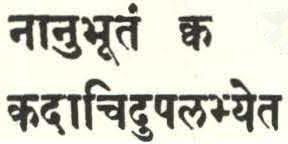
TRANSLATION
One can understand the mental or conscious position of a living entity by the activities of two kinds of senses-the knowledge-acquiring senses and the executive senses. Similarly, by the mental condition or consciousness of a person, one can understand his position in the previous life.
PURPORT
There is an English proverbthat says, "Theface is the indexof the mind." If one is angry, his anger is immediately expressed in his face. Similarly, other mental states are reflected by the actions of the gross body. In other words, the activities of the gross body are reactions of the mental condition. The mind's activities are thinking, feeling and willing. The willing portion of the mind is manifest by the activities of the body. The conclusion is that by the activities of the body and senses, we can understand the condition of the mind. The condition of the mind is affected by past activities in the past body. When the mind is joined with a particular sense, it immediately becomes manifest in a certain way. For instance, when there is anger in the mind, the tongue vibrates so many maledictions. Similarly, when the mind's anger is expressed through the hand, there is fighting. When it is expressed through the leg, there is kicking. There are so many ways in which the subtle activities of the mind are expressed through the various senses. The mind of a person in Kr�Q.a consciousness also acts in a similar way. The tongue chants Hare Kr�Q.a, the mahii-mantra, the hands are raised in ecstasy, and the legs dance in Kr�Q.a consciousness. These symptoms are technically called afl.ta-siittvika-vikiira. This is transformationof thementalconditionin goodness or sometimes transcendental ecstasy.

1450 Srimad-Bhagavatam [Canto 4, Ch. 29
TEXT64 � �{��ij�l �q �lUll� IIG.'dll
ntinubhiltam kva ctinena dehenadr.s.tam a§rutam kadticid upalabhyeta yad rilparh yadrg iitmani

na- never; anubhutam-experienced; kva-at any time; ca-also; anena dehena- bythisbody;adn�am- never seen; asrutam-never heard; kadiicitsometimes; upalabhyeta-may be experienced; yat-which; rilp am-form; yiidrk-whatever kind; iitmani-in the mind.
TRANSLATION
Sometimes we suddenly experience something thatwas never experienced in the present body by sight or hearing. Sometimes we see such things suddenly in dreams.
PURPORT
We sometimes see things in dreams that we have never experienced in the present body. Sometimes in dreams we think that we are flying in the sky, although we have no experience of flying. This means that once in a previous life, either as a demigod or astronaut, we flew in the sky. The impression is there in the stockpile of the mind, and it suddenly expresses itself. It is like fermentation taking place in the depths of water, which sometimes manifests itself in bubbles on the water's surface. Sometimes we dream ofcoming to a place we have never known or experienced in this lifetime, but this is proof that in a past life we experienced this. The impression is kept within the mind and sometimes becomes manifest either in dream or in thought. The conclusion is that the mind is the storehouse of various thoughts and experiences undergone during our past lives. Thus there is a chain of continuation from one life to another, from previous lives to this life, and from this life to future lives. This is also sometimes proved by saying that a man is a horn poet, a born scientist or a born devotee. If, like Maharaja Ambari�a, we think of Kr�Q.a constantly in this life (sa vai mana{!. kr.sr-a-padiiravindayoft ), we will certainly be transferred to the kingdom of God at the time of death. Even if our attempt to be Kr�Q.a conscious is not complete, our Kr�Q.a consciousness will continue in the next life. This is confirmed in Bhagavad-gitti:
priipya purzya-krtiirh lokiin
ufiitvii sii§vati[L samii{l
Text 64) Talks Between Narada and King Pracinabarhi
1451
suciniirh srimatiirh gehe yoga-bhra�.to 'bhijiiyate
"The unsuccessful yogt, aftermany, manyyears ofenjoyment on the planets of the pious living entities, is born into a family of righteous people, or into a family of rich aristocracy." (Bg. 6.41)
If we rigidly follow the principles of meditation on Kr�va, there is no doubt that in our next life we will be transferred to Kr�valoka, Goloka Vrndavana.
TEXT

�
teniisya tiidrsarh riijal lingino deha-sambhavam sraddhatsviinanubhuto 'rtho na manaft spr�.tum arhati
lena-therefore; asya-of the living entity; tiidrsam-like that; riijan-0 King; linginafl-who has a subtle mental covering; deha-sambhavam-produced in the previous body; sraddhatsva-accept it as fact; ananubhutaflnot perceived; arthaft-a thing; na-never; manafl-in the mind; spra.stumto manifest; arhati-is able.
TRANSLATION
My dear King, the living entity, who has a subtle mental covering, develops all kinds of thoughts and images because of his previous body. Take this from me as certain. There is no possibility of concocting anything mentally without having perceived it in the previous body.
PURPORT
k[.SI}a-bahirmukha hafiii bhoga-viifichii kare
nika.ta-stha miiyii tiire jiipa,tiyii dhare
(Prema-vivarta 6.2)
Actually the Supreme Personality of Godhead, Kr�va, is the supreme enjoyer. When a living entity wants to imitate Him, he is given a chance to satisfy his false desire to lord it over material nature. That is the beginning
1452 Srimad-Bhagavatam
[Canto 4, Ch. 29
" i{O{: •a
65 � � mmrw;n �� 1 �sm
uG.4.11
of his downfall. As long as he is within this material atmosphere, he has a subtle vehicle in the form of the mind, which is the stockpile of all kinds of material desires. Such desires become manifest in different bodily forms. Srila Narada Muni requests the King to accept this fact from him because he is an authority. The conclusion is that the mind is the storehouse of our past desires, and we have this present body due to our past desires. Similarly, whatever we desire in this present body will be expressed in a future body. Thus the mind is the source of different kinds of bodies.

If the mind is purified by KHI).a consciousness, one will naturally in the future get a body that is spiritual and full of Kr�l).a consciousness. Such a body is our original form, as Sri Caitanya Mahaprabhu confirms: jivera 'svarupa' haya--kr�r-era 'nitya-diisa'. "Every living entity is constitutionally an eternal servant of Kr�l).a." If a person is engaged in the devotional service of the Lord, he is to be considered a liberated soul even in this life. This is confirmed by Srila Rupa Gosvami:
ihiiyasyaharerdiisye
karmar-ii manasiigirii
nikhiliisvapyavasthiisu
]ivan-mukta{lsaucyate
"One who engages in the transcendental service of the Lord in body, mind, and word is to be considered liberated in all conditions of material existence." (Bh.r.s. 1.2.187) The Kr�l).a consciousness movement is based on this principle. We must teach people to absorb themselves always in the service of the Lord because that position is their natural position. One who is always serving the Lord is to be considered already liberated. This is also confirmed in Bhagavad-gitii:
miim cayo 'vyabhiciirer-a bhakti-yogenasevate sagur-iinsamatttyaitiin brahma-bhuyiiyakalpate
"One who engages in full devotional service, who does not fall down in any circumstance, at once transcends the modes of material nature and thus comes to the level of Brahman." (Bg. 14.26)
The devotee is therefore above the three modes of material nature and is even transcendental to the brahmar-a platform. A briihmar-a may be infected by the two baser modes-namely rajo-gur-a and tamo-gur-a. A pure
Text 65] Talks Between Narada and King Pracinabarhi 1453
devotee, who is free from all material desires experienced on the mental platform and who is also free from empiric philosophical speculation or fruitive activity, is always above material conditioning and is always liberated.
TEXT66






� � 11�� �Tfllf :tieRt 1
1f�Q{d� � a m � m�: n����
mana eva manu.syasya pilrva-mpii[ti §arhsati bhavi_syatas ca bhadrarh te tathaiva na bhav�yata[l.
mana[l.-the mind; eva- certainly; manu.syasya-of a man; pilrva-past; mpii[li-forms; sarhsati- indicates;bhavinata[l.-ofonewho will takebirth; ca-also; bhadram-good fortune;te-untoyou;tathii-thus; eva-certainly; na-not; bhav�yata[l.-of onewho will takebirth.
TRANSLATION
0 King, all good fortune unto you! The mind is the cause of the living entity's attaining a certain type of body in accordance with his association with material nature. According to one's mental composition, one can understand what the living entity was in his past life as well as what kind of body he will have in the future. Thus the mind indicates the past and future bodies.
PURPORT
The mind is the index of information about one's past and future life. If a man is a devotee of the Lord, he cultivated devotional service in his previous life. Similarly, if one's mind is criminal, he was criminal in his last life. In the sameway, according tothemind,we can understandwhat willhappenin afuturelife. In Bhagavad-gttii itis said:
ilrdhvarh gacchanti sattva-sthii madhye t�.thanti riijasii{l
jaghanya-gur-a-vrtti-sthii adho gacchanti tiimasii[l.
"Those situated in the mode of goodness gradually go upward to the higher planets; those in the mode of passion live on the earthly planets;
1454 Srimad-Bhagavatam [Canto 4, Ch. 29
and those in the mode of ignorance go down to the hellish worlds."
(Bg. 14.18)


If a person is in the mode of goodness, his mental activities will promote him to a higher planetary system. Similarly, if he has a low mentality, his future life will be most abominable. The lives of the living entity, in both the past and the future, are indicatedby the mental condition. Narada Muni is herein offering the King blessings of all good fortune so that the King will n_ot desire anything or make plans for sense gratification. The King was engaged in fruitive ritualistic ceremonies because he hoped to get a better life in the future. Narada Muni desired him to give up all mental concoctions. As explained before, all bodies in heavenly planets and hellish planets arise from mental concoctions, and the sufferings and enjoyments of material life are simply on the mental platform. They take place on the chariot of the mind (mano-ratha). It is therefore said:
yasyiisti bhaktir bhagavaty akincanii sarvair gu[lais tatra samasate sura[! hariiv abhaktasya kuto mahad-gu[Lrl mano-rathenasati dhavato bahif!
"One who has unflinching devotion for the Personality of Godhead has all the good qualities of the demigods. But one who is not a devotee of the Lord has only material qualifications that are of little value. This is because he is hovering on the mental plane and is certain to be attracted by the glaring material energy." (Bhiig. 5.18.12)
Unless one becomes a devotee of the Lord or becomes fully Kr�I;J.a conscious, he willcertainly hover on the mental platform and be promoted and degraded in different types of bodies. All qualities that are considered good according to the material estimation actually have no value because these so-called good qualities will not save a person from the cycle of birth and death. The conclusion is that one should be without mental desire. Anyabhilii.sita-sunyam jiiana-karmady-anavrtam: one should be fully free from material desires, philosophical speculation and fruitive activity. The best course for a human being is to favorably accept the transcendental devotional service of the Lord. That is the highest perfection of human life.
Text 67] Talks Between Narada and King Pracinabarhi 1455
TEXT 67 � :;mr �� {fttirl 41n ij"�•m!q"'do4 �?(l�tw!Sf?tim� 11�\911
adr§(am-never experienced; asrutam-never heard;ca-and;atra-in this life; kvacit-at some time; manasi-in the mind; drsyate-is visible; yatha-as; tathti-accordingly; anumantavyam-to be understood; desa-place; kala-time; kriyii- activity; iisrayam-depending on.
TRANSLATION
Sometimes in a dream we see something never experienced or heard of in this life, but all these incidents have been experienced at different times, in different places and in different conditions.
PURPORT
In the previous verse it was explained that in dreams we see thatwhich was experienced during the day. But why is it that we sometimes in our dreams see what we have never heard of or seen at any time during this life? Here itis stated that even thoughsuch events maynot be experienced in this life, they were experienced in previous lives. According to time and circumstance,they combine so that in dreams we see something wonderful that we have never experienced. For instance, we may see an ocean on the peak of a mountain. Or we may seethat the ocean has dried up. These are simply combinations of different experiences in time and space. Sometimes we may see a golden mountain, and this is due to our having experienced gold and mountains separately. In the dream, under illusion, we combine these separate factors. In this way we are able to see golden mountains or stars during the day. The conclusion is that these are all mental concoctions, although they have actually been experienced in different circumstances. They have simply combined together in a dream. This fact is further explained in the following verse.

1456 Srimad-Bhagavatam
[Canto 4, Ch. 29
adrfl.tam asrutarh ctitra kvacin manasi drsyate yathti tathtinumantavyarh desa-ktila-kriytisrayam
68 � stilfr�� ���•iHm: I llt�tfktq��w.fe¥twt«��:������
TEXT
sarve kramanurodhena manasindriya-gocara[l. iiyiinti bahuso yiinti sarve samanaso janii[l.
sarve-all; krama-anurodhena-in order of chronology; manasi-in the mind; indriya- by the senses; gocara[l.- experienced; ayiinti- come; bahusaf!. -in many ways; yanti-go away; sarve-all; sa-manasa[l.-with a mind; janii,h -living entities.
TRANSLATION
The mind of the living entity continues to exist in various gross bodies, and according to one's desires for sense gratification, the mind records different thoughts. In the mind these appear together in different combinations; therefore these images sometimes appear as things never seen or never heard.

PURPORT
Theactivities of the living entity in the body of a dog may be experienced in the mind of a different body; therefore those activities appear never to have been heard or seen. The mind continues, although the body changes. Even in this lifespan we can sometimes experience dreams of our child· hood. Although such incidents now appear strange, it is to be understood that they are recorded in the mind. Because of this, they become visible in dreams. The transmigration of the soul is caused by the subtle body, which is the storehouse of all kinds of material desires. Unless one is fully absorbed in K.r�qa consciousness, material desires will come and go. That is the nature of the mind-thinking, feeling and willing. As long as the mind is not engaged in meditation on the lotus feet of the Supreme Personality of Godhead, Kr�qa, the mind will desire so many material enjoyments. Sensual images are recorded in the mind in chronological order, and they become manifest one after another; therefore the living entity has to accept one body after another. The mind plans material enjoyment, and the gross body serves as the instrument to realize such desires and plans. The mind is the platform onto which all desires come and go. Srila Narottama dasa 'fhiikura therefore sings:
guru-mukha-padma-vakya, cittete kariyii aikya, ara na kariha mane asa
Text 68) Talks Between Narada and King Pracinabarhi
1457
Narottama dasa 'fhakura advises everyone to stick to the principle of carrying out the orders of the spiritual master. One should not desire anything else. If the regulative principles ordered by the spiritual master are followed rigidly, the mind will gradually be trained to desire nothing but the service of Kr�qa. Such training is the perfection of life.
TEXT 69
(1�4if.t..a �� ¥t•I�N1�'4f�I
�!if�¥1(1'1�d\fH�I'4¥11� II��II
sattvaika-n�_the manasi bhagavat-piirsva-vartini tamaS candramasivedam uparajyiivabhiisate
sattva-eka-n(s{he-in full Kr�l}a consciousness; manast-m a mind; bhagavat- with the Supreme Personalityof Godhead; parsva-vartini- being constantly associated; tama� - the dark planet; candramasi-in the moon; iva-like; idam-this cosmic manifestation; uparajya-being connected; avabhiisate-becomes manifest.
TRANSLATION
Kr�11-a consciousness means constantly associating with the Supreme Personality of Godhead in such a mental state that the devotee can observe the cosmic manifestation exactly as the Supreme Personality of Godhead does. Such observation is not always possible, but it becomes manifest exactly like the dark planet known as Rahu, which is observed in the presence of the full moon.

PURPORT
It has been explained inthe previous versethat alldesires on the mental platform become visible one after another. Sometimes, however, by the supreme will of the SupremePersonality of Godhead, the whole stockpile can be visible all at one time. In Brahma-sarhhita it is said, karma[Li nirdahati kintu ca bhakti -bhajam (5.54). When a person is fully absorbed in Kr�qa consciousness, his stockpile of material desires is minimized. Indeed, the desires no longer fructify in the form of gross bodies. Instead,
1458 Srimad-Bhagavatam [Canto 4, Ch. 29
the stockpile of desires becomes visible on the mental platform by the grace of the Supreme Personality of Godhead.
In this connection, the darkness occurring before the full moon, the lunar eclipse, can be explained as being another planet, known as Rahu. According to Vedic astronomy, the Rahu planet, which is not visible, is accepted. Sometimes the Rahu planet is visible in the presence of full moonlight. Itthen appears that this Rahu planet exists somewhere near the orbit of the moon. The failure of modern moon excursionists may be due to the Rahu planet. In other words, those who are supposed to be going to the moon may actually be going to this invisible planet Rahu. Actually they are not going to the moon but to the planet Rahu, and after reaching this planet, they come back. Apart from this discussion, the point is that a living entity has immense and unlimited desires for material enjoyment, and he has to transmigrate from one gross body to another until these desires are exhausted.
No living entity is free from the cycle of birth and death unless he takes to Kw).a consciousness; therefore in this verse it is clearly stated (sattvaikanififhe) that when one is fully absorbed in Kr�qa consciousness, in one stroke he is freed of past and future mental desires. Then, by the grace of the Supreme Lord, everything becomes simultaneously manifest within the mind. In this regard, Visvanatha Cakravarti Thakura cites the example of mother Yasoda's seeing the whole cosmic manifestation within the mouth of Lord Kr9p.a. By the grace of Lord Kr9qa, mother Yasoda saw all the universes and planets within the mouth of Krwa. Similarly, by the grace of the Supreme Personality of Godhead, Kr�p.a, a Kr�p.a conscious person can see all his dormant desires at one time and finish all his future transmigrations. This facility is especially given to the devotee to make his path clear for returning home, back to Godhead.
Why we see things not experienced in this life is explained herein. That which we see is the future expression of a gross body or is already stocked in our mental stockpile. Because a Kr�p.a conscious person does not have to accept a future gross body, his recorded desires are fulfilled in a dream. We therefore sometimes find things in a dream never experienced in our present life.

Text 70] Talks Between Narada and King Pracinabarhi 1459
TEXT 70 ;nt � �S(j � �.,fttffi I ��f4q011��"11R'il1 II \Soli
niiham mameti bhiivo 'yam puru.se vyavadhtyate yiivad buddhi-mano- 'k.siirthagu"{la-vyilho hy aniidimiin
na-not; aham- I; mama-mine; iti-thus; bhiiva�-consciousness; ayamthis; puru . se-intheliving entity; vyavadh1yate-is separated; yiivat-so long; buddhi-intelligence; mana�-mind; ak�a-senses;artha-sense objects; gu'!a -ofthematerial qualities; vyilha�-amanifestation; hi- certainly; aniidimiin -the subtle body (existing since time immemorial).
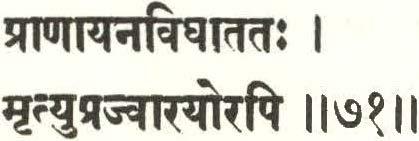

TRANSLATION
As long as there exists the subtle material body composed of intelligence, mind, senses, sense objects and the reactions of the material qualities, the consciousness of false identification and its relative objective, the gross body, exist as well.
PURPORT
The desires in the subtle body of mind, intelligence and ego cannot be fulfilled without a gross body composed of the material elements earth, water,air, fire and ether. When the grossmaterialbodyis not manifest, the living entity cannot factually act in the modes of material nature. In this verse it is clearly explained that the subtle activities of the mind and intelligence continue due to the sufferings and enjoyments of the living entity's subtle body. The consciousness of material identification (such as "I and mine") still continues because such consciousness has been extant from time immemorial. However, when one transfers to the spiritual world by virtue of understanding l<.f�J;J.a consciousness, the actions and reactions of both gross and subtle bodies no longer bother the spirit soul.
TEXT 71

��\Cii!ti(4l(filll\9� II
supti-milrcchopatiipe!u prii[Uiyana-vighiitata� nehate 'ham iti jniinam mrtyu-prajviirayor api
1460
Srimad-Bhagavatam
[Canto 4, Ch. 29
supti-in deep sleep; murccha- fainting; upatiipe.su-or in great shock; prii[Liiyana-of the movement of the life air; vighiitata�-from prevention; na-not; ihate-thinks of; aham-I; iti-thus; jfiiinam-knowledge; mrtyuwhile dying; prajviirayo�- or during high fever; api-also.
TRANSLATION
When the living entity is in deep sleep, when he faints, when there is some great shock on account of severe loss, at the time of death, or when the body temperature is very high, the movement of the life air is arrested. At that time the living entity loses knowledge of identifying the body with the self.

PURPORT
Foolish people deny the existence of the soul, but it is a fact that when we sleep we forget the identity of the material body and when we awake, we forget the identity of the subtle body. In other words, while sleeping we forget the activities of the gross body, and when active in the gross body we forget the activities of sleeping. Actually both states-sleeping and waking-are creations of the illusory energy. The living entity actually has no connection with either the activities of sleep or the activities of the so-called wakened state. When a person is in deep sleep or when he has fainted, he forgets his gross body. Similarly, under chloroform or some other anesthetic, the living entity forgets his gross body and does not feel pain or pleasure during a surgical operation. Similarly, when a man is suddenly shocked by some great loss, he forgets his identification with the gross body. At the time of death, when the temperature ofthe body rises to 107 degrees, the living entity falls into a coma and is unable to identify his gross body. In such cases, the life air that moves within the body is choked up, and the living entity forgets his identification with the gross body. Because of our ignorance of the spiritual body, of which we have no experience, we do not know of the activities of the spiritual body, and, in ignorance, we jump from one false platformto another. We act sometimes in relation to the gross body and sometimes in relation to the subtle body. If, by J<.r��a's grace, we act in our spiritual body, we can transcend both the gross and subtle bodies. In other words, we can gradually train ourselves to act in terms of the spiritual body. As stated in the Niiradapaficariitra, h_r�fkel}a h!§fkesa-sevanam bhaktir ucyate: devotional service means engaging the spiritual body and spiritual senses in the service of the Lord. When we are engaged in such activities, the actions and reactions of the gross and subtle bodies cease.
Text 71] Talks Between Narada and King Pracinabarhi 1461
TEXT 72

tN�s-tqc(tQMitl�l«:�fcl\:f ij«:f I
Bi wt �f':m :q�+t�l � ll\9�11
garbhe balye 'py apau�kalyiid
ekiidasa-vidharh tadii
lingarh na drsyate yilna�
kuhviirh candramaso yathii
garbhe-in the womb; biilye-in boyhood; api-also; apau�kalyiit- because of immaturity; ekiidasa-the ten senses and the mind; vidham-in the form of; tada-at that time; lingam- the subtle body or false ego; na- not; drsyate -is visible; yilna�-of a youth; kuhviim- during the dark-moon night; candramasa�- the moon; yathii-as.
TRANSLATION
When one is a youth, all the ten senses and the mind are completely visible. However, in the mother's womb or in the boyhood state, the sense organs and the mind remain covered, just as the full moon is covered by the darkness of the dark-moon night.
PURPORT
When a living entity is within the womb, his gross body, the ten sense organs and the mind are not fully developed. At such a time the objects of the senses do not disturb him. In a dream a young man may experience the presence of a young woman because at that time the senses are active. Because of undeveloped senses, a child or boy will not see a young woman in his dreams. The senses are active in youth even when one dreams, and although there may be no young woman present, the senses may act and there may be a seminal discharge (nocturnal emission). The activities of the subtle and gross bodies depend on how developed conditions are. The example of the moon is very appropriate. On a dark-moon night,the full shining moon is still present, but it appears not to be present due to conditions. Similarly, the senses of the living entity are there, but they only become active when the gross body and the subtle body are developed. Unless the senses of the gross body are developed, they will not act on the subtle body. Similarly, because of the absence of desires in the subtle body, there may be no development in the gross body.
1462 Srimad-Bhagavatam [Canto 4, Ch. 29
11��11
arthe hy avidyamiine 'pi sarhsrtir na nivartate dhyiiyato vifiayiin asya svapne 'narthiigamo yathii
arthe-sense objects; hi- certainly ;avidyamiine- not being present; apialthough; sarhsrti�-material existence; na-never; nivartate-ceases; dhyiiyata�-meditating;vi§aylin- onsense objects; asya-of the living being; svapne-in dream; anartha-of unwanted things; iigama[l-appearance; yathii-as.

TRANSLATION
When the living entity dreams, the sense objects are not actually present. However, because one has associated with the sense objects, they become manifest. Similarly, the living entity with undeveloped senses does not cease to exist materially, even though he may not be exactly in contact with the sense objects.


PURPORT
It is sometimes said that because a child is innocent he is completely pure. Actually this is not the fact. The effects of fruitive activities reserved in the subtle body appear in three concurrent stages. One is called bija (the root), another is called ku_tastha (the desire), and another is called phalonmukha (about to fructify). The manifest stage is called priirabdha (already in action). In a conscious or unconscious state, the actions of the subtle or gross bodies may not be manifest, but such states cannot be called the liberated state. A child may be innocent, but this does not mean that he is a liberated soul. Everything is held in reservation, and everything will become manifest in due course of time. Even in the absence of certain manifestations in the subtle body, the objects of sense enjoyment may act. The example has been given of a nocturnal emission in whichthe physical senses act even when the physical objects are not manifest. The three modes of material nature may not be manifest in the subtle body, but the contamination of the three modes remains conserved, and, in due course of time, it becomes manifest. Even if the reactions of the subtle and gross
Text 73] Talks Between Narada and King Pracinabarhi
TEXT 73 -.r . � I �Mt4�����s-1¥tt•l+it �
1463
bodies are not manifest, one does not become free from the material conditions. Therefore it is wrong to say that a child is as good as a liberated soul.
TEXT 74

evarh panca-vidharh lingarh
tri-vrt �oflasa-vistrtam
esa cetanayii yukto
jiva ity abhidhtyate
evam-thus ; panca-vidham-the five sense objects; liligam-the subtle body; tri-vrt-influenced by the three modes; �oflasa-sixteen; vistrtamexpanded; e�a[l-this; cetanaya- with the living entity; yukta[l-combined; jiva[l-the conditioned soul; iti- thus; abhidhiyate-is understood.
TRANSLATION
The five sense objects, the five sense organs, the five knowledge-acquiring senses, and the mind are the sixteen material expansions. These combine with the living entity and are influenced by the three modes of material nature. Thus the existence of the conditioned soul is understood.
PURPORT
Lord Kr�l}a says in Bhagavad-gtta:
mamaivarhso jtva-loke
jtva-bhata[l sanatana[l mana[l �asthantndriyar-i prakrti-sthani kar�ati
"The living entities in this conditioned world are My eternal, fragmental parts. Due to conditioned life, they are struggling very hard with the six senses, which include the mind." (Bg. 15.7)
Here it is also explained that the living entity comes in contact with the sixteen material elements and is influenced by the three modes of material nature. The living entity and this combination of elements combine to form what is called jiva-bhuta, the conditioned soul that struggles hard within
1464 Srimad-Bhagavatam [Canto 4, Ch. 29
�
00W��tft��IN€iJt( I ���� �ll\9�11
material nature. The total material existence is first agitated by the three modes of material nature, and these become the living conditions of the living entity. Thus the subtle and gross bodies develop, anp. the ingredients are earth, water, fire, air, sky, and so on. According to Sri Madhvaciirya, when consciousness, the living force in the heart, is agitated by the three modes of material nature, then the subtle body of the living entity, consistingofthemind,thesenseobjects, thefivesensesthat acquire knowledge, and the five senses for acting in the material condition, becomes possible.
TEXT
anena puru�o dehiin upiidatte vimuiicati har�arh sokarh bhayam dufl.kharh sukharh ciinena vindati
ane na-by this process; puru�afl.-the living entity; dehiin-gross bodies; upiidatte-achieves; vimuiicati-gives up; har . sam-enjoyment; sokamlamentation; bhayam-fear; dufl.kham-unhappiness; sukham-happiness; ca-also; anena-by the gross body; vindati-enjoys.

TRANSLATION
By virtue of the processes of the subtle body, the living entity develops and gives up gross bodies. This is known as the transmigration of the soul. Thus the soul becomes subjected to different types of so-called enjoyment, lamentation, fear, happiness and unhappiness.
PURPORT
According tothis explanation, one can clearly understand that originally the living entity was as good as the Supreme Personality of Godhead in his pure spiritual existence_ However, when the mind becomes polluted by desires for sense gratification in the material world, the living entity drops into the material conditions, as explained in this verse. Thus he begins his material existence, which means that he transmigrates from one body to another and becomes more and more entangled in materialexistence. The process of Kr�tta consciousness, by which one always thinks of

Text 75) Talks Between Narada and King Pracinabarhi 1465
NUilffl
ri � � i:� � � � II\S�.11
75 � �
I
Kg;Q.a, is the transcendental process by which one can revert to his original spiritual existence. Devotional service means always thinking of K{�Q.a.

man-manii bhava mad-bhakto mad-yiijt miirh namaskuru miim evai�yasi satyarh te pratijiine priyo 'si me
"Always think of Me and become My devotee. Worship Me and offer your homage unto Me. Thus you will come to Me without fail. I promise you this because you are My very dear friend." (Bg. 18.65)
One should always engage in the Lord's devotional service. As recommended in the arcana-miirga, one should worship the Deity in the temple and constantly offer obeisances to the spiritual master and the Deity. These processes are recommended to one who actually wants to become free from material entanglement. Modern psychologists can study the actions of the mind-thinking, feeling and willing-but they are unable to go deep into the matter. This is due to their lack of knowledge and to their not being associated with a liberated iiciirya.

As stated in Bhagavad-gttii:


evarh paramparii-priiptam imam riijar�ayo vidu� sa kiileneha mahatii yogo na�.ta� parantapa
"This supreme science was thus received through the chain of disciplic succession, and the saintly kings understood it in that way. But in course of time thesuccessionwas broken, and therefore the science as it is appears to be lost." (Bg. 4.2)
Guided by so-calledpsychologists and philosophers, people inthe modern age do not know of the activities of the subtle body and thus cannot understand what is meant by the transmigration of the soul. In these matters we have to take the authorized statements of Bhagavad-gttii:
dehino 'smin yathii dehe kaumiirarh yauvanarh jarii tathii dehiintara-priiptir dhtras tatra na muhyati
1466 Srimad-Bhagavatam [Canto 4, Ch. 29
"As the embodied soul continually passes, in this body, from boyhood to youth to old age, the soul similarly passes into another body at death. The self-realized soul is not bewildered by such a change." (Bg. 2.13)
Unless all human society understands this important verse in Bhagavadgitii, civilization will advance in ignorance, not in knowledge.
TEXTS 76-77
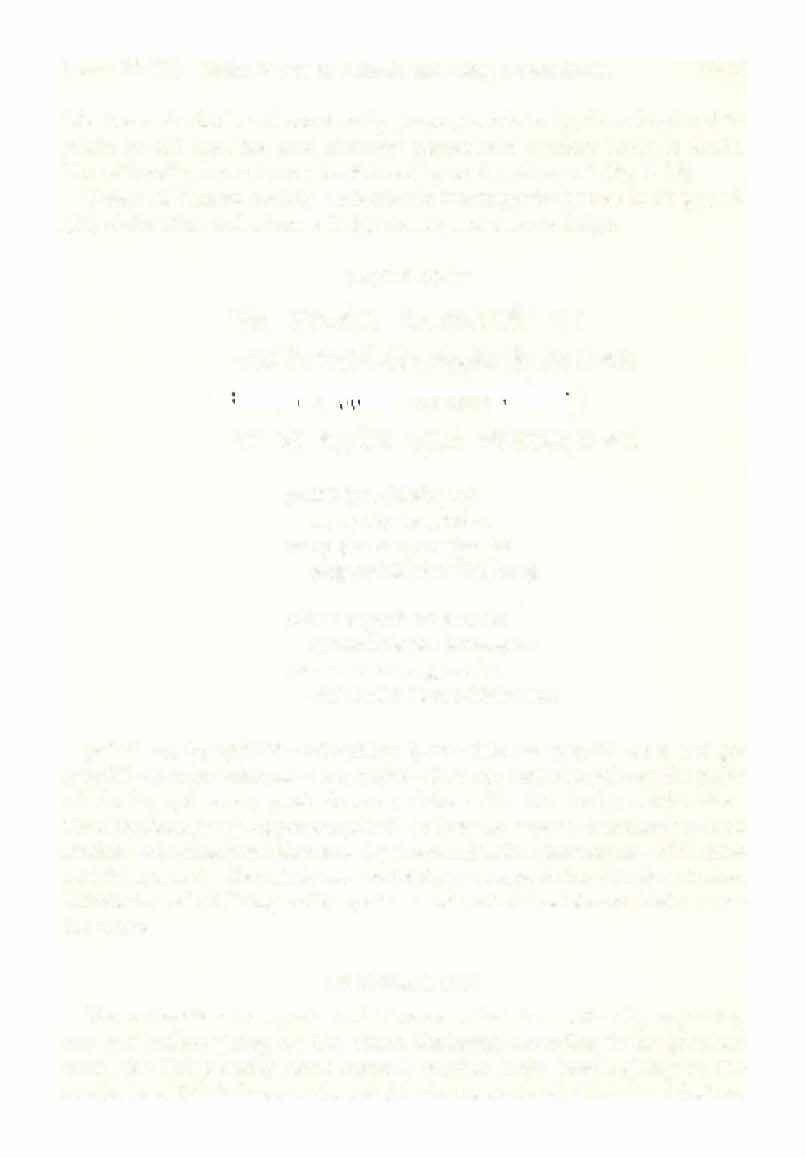
if�\llf414411Uftsfq��:11\S�II

"' if 04'i4f.f1'1� I 'fif � &t�� � �11\S\SII
yathii trrw-jaliikeyarh
niipayiity apayiiti ca na tyajen mriyamii[W 'pi priig-dehiibhimatirh jana�
yiivad anyarh na vindeta
vyavadhiinena karmar-iim mana eva manu.syendra bhutiiniirh bhava-bhiivanam
yathii-as; trr-a-jaliikii- caterpillar; iyam- this; na apayiiti-does not go; apayati-goes; ca-also; na- not; tyajet-gives up; mriyamar-a�-at the point of death; api-even ; priik-former; deha-with the body; abhimatimidentification;jana�-aperson; yiivat-so long as; anyam-another; na-not; vindeta-obtains; vyavadhanena-bythetermination;karmmyam-of fruitive activities; mana{l-themind; eva-certainly; manu_;Sya-indra-0 ruler of men; bhutiiniim-of all living entities; bhava-of material existence; bhavanamthe cause.



TRANSLATION
The caterpillar transports itself from one leaf to another by capturing one leaf before giving up the other. Similarly, according to his previous work, the living entity must capture another body before giving up the one he has. This is because the mind is the reservoir of all kinds of desires.
Texts 76-77] Talks Between Narada and King Pracinabarhi 1467
� qoUt.sf(i� �N4t�:tN4tfd :q I
A living entity too much absorbed in material activity becomes very much attracted to the material body. Even at the point of death, he thinks of his present body and the relatives connected to it. Thus he remains fully absorbed in the bodily conception of life, so much so that even at the point of death he abhors leaving his present body. Sometimes it is found that a person on the verge of death remains in a coma for many days before giving up the body. This is common among so-called leaders and politicians who think that �ithout their presence the entire country and all society will be in chaos. This is called maya. Political leaders do not like to leave their political posts, and they either have to be shot by an enemy or obliged to leave by the arrival of death. By superior arrangement a living entity is offered another body, but because of his attraction to the present body, he does not like to transfer himself to another body. Thus he is forced to accept another body by the laws of nature.
prakrte� kriyamap.ani
gur-a* karmap.i sarvasa� ahankara-vimu(lhtitma kartaham iti manyate

"The bewildered spirit soul, under the influence of the three modes of material nature, thinks himself the doer of activities that are in actuality carried out by nature." (Bg. 3.27)
Material nature is very strong, and the material modes force one to accept another body. This force is visible when the living entity transmigrates from a superior body to an inferior one. One who acts like a dog· or hog in the present body will certainly be forced to accept the body of a dog or hog in the next life. A person may be enjoying the body of a prime minister or a president, but when he understands that he will be forced to accept the body of a dog or hog, he chooses not to leave the present body. Therefore he lies in a coma many days before death. This has been experienced by many politicians at the time of death. The conclusion is that the next body is already determined by superior control. The living entity immediately gives up the present body and enters another. Sometimes in the present body the living entity feels that many of his desires and imaginations are not fulfilled. Those who are overly attracted to their life situation are forced to remain in a ghostly body and are not allowed to accept another gross body. Even in the body of a ghost, they create
1468 Srimad-Bhagavatam [Canto 4, Ch. 29
PURPORT
disturbances for neighbors and relatives_ The mind is the prime cause of such a situation. According to one's mind, different types of bodies are generated, and one is forced to accept them. As confirmed in Bhagavadgftii:
yam yam viipi smaran bhiivam
tyajaty ante kalevaram tam tam evaiti kaunteya sadii tad-bhiiva-bhiivita�
"Whatever state of being one remembers when he quits his body, that state he will attain without fail." (Bg. 8.6)
Within one's body and mind, one can think as either a dog or a god, and the next life is offered to him accordingly. This is explained in Bhagavadgitii:
puru�a[l prakrti-stho hi bhwikte prakrti-jan guran kiiraram gur-a-smigo 'sya sad-asad-yoni-janmasu
"The living entity in material nature thus follows the ways of life, enjoying the three modes of nature. This is due to his association with that material nature. Thus he meets with good and evil amongst various species."
(Bg. 13.22)

The living entity may transmigrate to either a superior or inferior body according to his association with the modes of material nature. If he associates with the mode of ignorance, he gets the body of an animal or an inferior man, but if he associates with the mode of goodness or passion, he gets a body accordingly. This is also confirmed in Bhagavad-gita:
iirdhvam gacchanti sattva-sthii madhye t�,thanti riijasii[t jaghanya-gu[ta-vrtti-stha adho gacchanti tamasa[t
"Those situated in the mode of goodness gradually go upward to the higher planets; those in the mode of passion live on the earthly planets; and those in the mode of ignorance go down to the hellish worlds."
(Bg. 14.18)
The root cause of one's association is the mind. This great Kr�J;ta consciousness movement is the greatest boon to human society because it is
Texts 76-77) Talks Between Niirada and King Pracinabarhi 1469
teaching everyone to think always of Kr�J].a by executing devotional service. In this way, at the end of life, one may be transferred to the association of Kr�J].a. This is technically called nitya-lila-prav(s.ta, entering into the planet Goloka Vrndavana. Bhagavad-gtta explains:
bhaktya mam abhijanati yavan yas casmi tattvata{l tato marh tattvato jnatva visate tad-anantaram
"One can understand the Supreme Personality as He is only by devotional service. And when one is in full consciousness of the Supreme Lord by such devotion, he can enter into the kingdom of God." (Bg. 18.55)
After the mind is completely absorbed in Kr�J].a consciousness, one can enter the planet known as Goloka Vrndavana. To enter the association of the Supreme Personality of Godhead, one has to understand Kr�J].a. The process of understanding Kr�J].a is devotional service.
After understanding Kr�J].a as He is, one can become eligible to enter Kr�J].aloka and associate with Him. The mind is the cause of such an exalted position. The mind can also get one a body like dogs and hogs. To absorb the mind always in Kr�J].a consciousness is therefore the greatest perfection of human life.
TEXT 78

df4f(ijf'{��IOtiiN�S(1f�I
m 4\�W.t(�tjjtjj�: .4ot�'1i€41'1: 11�11
yadiik�ais caritan dhyiiyan
karmary iicinute 'sakrt sati karmary avidyayarh bandha{l karmary anatmanafl.
yada-when; ak�aifl.- by the senses; caritan-pleasures enjoyed; dhyayanthinking of; karmari-activities; acinute-performs; asakrt-always; sati karmari-when material affairs continue; avidyayam-under illusion; bandhafl.- bondage; karmari-in activity; anatmana[l.-of the material body.
TRANSLATION
As long as we desire to enjoy sense gratification, we create material activities. When the living entity acts in the material field, he enjoys the
1470 Srimad-Bhagavatam [Canto 4, Ch. 29
senses, and while enjoying the senses, he creates another series of material activities. In this way the living entity becomes entrapped as a conditioned soul.
PURPORT
While in the subtle body we create many plans to enjoy sense gratification. These plans are recorded in the spool of one's mind as btja, the root of fruitive activities. In conditional life the living entity creates a series of bodies one after another, and this is called karma-bandhana. As explained in Bhagavad-gita: yajniirthiit karmarw 'nyatra
loko 'yam karma-bandhana� tad-artharh karma kaunteya mu,kta-sa�iga� samiicara
"Work done as a sacrifice for Vi�J}.u has to be performed, otherwise work binds one to this material world. Therefore, 0 son of Kunti, perform your prescribed duties for His satisfaction, and in that way you will always remain unattached and free from bondage." (Bg. 3.9)
If we act only for the satisfaction of Vi�J}.u, there is no bondage due to material activity. If we act otherwise, we become entrapped by one materialactivityafter another. Under these circumstances, it is to be supposed that by thinking, feeling and willing, we are creating a series of future material bodies. In the words of Bhaktivinoda 'fhakura, anadi karamaphale, pafli' bhavrir7Java-jale. The living entity falls into the ocean of karmabandhana as a result of past material activities. Instead of plunging oneself into the ocean of material activity, one should accept material activity only to maintain body and soul together. The rest of one's time should be devoted to engaging in the transcendental loving service of the Lord. In this way one can attain relief from the reactions of material activity.
TEXT
atas tad apavadiirtharh
bhaja sarvatmanii harim
pa§yarhs tad-atmakarh vi§varh
sthity-utpatty-apyayii yata�

Text 79] Talks Between Nlirada and King Pracinabarhi 1471
79
� \1'i4t�wtl � I
����II
::Jiijti(qellt\N
q�(df(AA;imi��'N4q�1lRJ:
ata[l- therefore; tat- that; apavada-artham-to counteract; bhaja- engage in devotional service; sarva-iitmanii-with all your senses; harim-unto the Supreme Personality of Godhead; pasyan-seeing; tat-of the Lord; iitmakam-under the control; viSvam-the cosmic manifestation; sthitimaintenance; utpatti- creation; apyaya[z- and annihilation; yata[l-from whom.
TRANSLATION
Youshould always know that this cosmic manifestation is created, maintained and annihilated by the will of the Supreme Personality of Godhead. Consequently everything within this cosmic manifestation is under the control of the Lord. To be enlightened by this perfect knowledge, one should always engage himself in the devotional service of the Lord.
PURPORT
Self-realization, understanding oneself as Brahman or spirit soul, is very difficult in the material condition. However, if we accept the devotional service of the Lord, the Lord will gradually reveal Himself. In this way the progressive devotee will gradually realize his spiritual position. We cannot see anything in the darkness of night, not even our own selves, but when there is sunshine we can see not only the sun but everything within the world as well. Lord Kr�Q.a explains in the Seventh Chapter of the Bhagavad-gita:
mayy iisakta-manii.h piirtha
yogarh yufijan mad-iisraya[l
asarhsayarh samagrarh miirh

yathii jfiasyasi tac chrrm
"Now hear, 0 son of Prtha [Arjuna], how by practicing .yoga in full consciousness of Me, with mind attached to Me, you can know Me in full, free from doubt." (Bg. 7.1)
When we engage ourselves in the devotional service of the Lord to become Kr�Q.a conscious, we understand not only Kr�Q.a but everything related to Kr�Q.a. In other words, through Kr�Q.a consciousness we can understand not only Kr�Q.a and the cosmic manifestation but also our constitutional position. In Kr�Q.a consciousness we can understand that the entire material creation is created by the Supreme Personality of Godhead,maintainedby Him, annihilatedby Him, and absorbed in Him. We are also part and parcel of the Lord. Everything is under the control of the
1472 Srimad-Bhagavatam [Canto 4, Ch. 29
Lord, and therefore our only duty is to surrender unto the Supreme and engage in His transcendental loving service.
TEXT80 ���fiT

lf111�HI8(6ql �� I
maitreya uviica bhiigavata-mukhyo bhagaviin niirado harhsayor gatim pradarsya hy amum iimantrya siddha-lokarh tato 'gamat
II�oil
maitreyafl uvaca- Maitreya said; bhagavata-of the devotees; mukhyaflthe chief; bhagavan-the most powerful; naradaf!-Narada Muni; harhsayoflof the living entity and the Lord;gatim-constitutional position; pradarsyahaving shown; hi-certainly; amum-him (the King); iimantrya- after inviting; siddha-lokam-to Siddhaloka; tata[l.-thereafter; agamat- departed.


TRANSLATION
The great sage Maitreya continued: The supreme devotee, the great saint Narada, thus explained to King Pracinabarhi the constitutional position of the Supreme Personality of Godhead and the living entity. After giving an invitation to the King, Narada Muni left to return toSiddhaloka.
PURPORT
Siddhaloka and Brahmaloka are both within the same planetary system. Brahmaloka is understood to be the highest planet within this universe. Siddhaloka is considered to be one of the satellites of Brahmaloka. The inhabitants of Siddhaloka have all the powers of yogic mysticism. From this verse it appears that the great sage Narada is an inhabitant of Siddhaloka, although he travels to all the planetary systems. All the residents of Siddhaloka are spacemen, and they can travel in space without mechanical help. The residents of Siddhaloka can go from one planet to another individually by virtue of their yogic perfection. After giving instructions
Text80] Talks Between Narada and King Pracinabarhi 1473
��fl'tli(;;Rf ftl;a:Jlttt m�
to the great King Prllcinabarhi, Narada Muni departed and also invited him to Siddhaloka.
TEXT 81




sti�""tt mfif: �•(4•1ifit�� 1 anfa.*l !"'lwt•lii'Etq� �������

priicinabarhi riijar.si{t praja-sargiibhirak.sare iidisya putriin agamat tapase kapiliisramam
priicinabarhi{t- King Prii.cinabarhi;riija-r§ift-thesaintlyking; praja-sargathe mass of citizens; abhirak§a'!e-to protect; iidisya-after ordering; putriin-his sons; agamat-departed; tapase-for undergoing austerities; kapila-iisramam-to the holy place known as Kapilasrama.
TRANSLATION
In the presence of his ministers, the saintly King Praclnabarhi left orders for his sons to protect the citizens. He then left home and went off to undergo austerities in a holy place known as Kapilasrama.
PURPORT
The word prajii-sarga is very important in this verse. When the saintly King Pracinabarhi was induced by the great sage Narada to leave home and take to the devotional service of the Lord, his sons had not yet returned from their austerities in the water. However, he did not wait for their return but simply left messages to the effect that his sons were to protect the mass of citizens. According to Viraraghava Acarya, such protection means organizing the citizens into the specific divisions of the four varras andfour iisramas. Itwasthe responsibility of the royal order to see that the citizens were following the regulative principles of the four varras (namely the briihmaras, kflatriyas, vaisyas and sudras) andthe iisramas (brahmacarya, grhastha, viinaprastha and sannyiisa). It is very difficult to rule citizens in a kingdom without organizing this varruiSrama-dharma. To rule the mass of citizens in a state and keep them in a complete progressive order is not possible simply by passing laws every year in a legislative assembly. The varriisrama-dharma is essential in a good government. One class of men (the briihmaras) must be intelligent and brahminically qualified, another
1474 Srimad-Bhagavatam [Canto 4, Ch. 29
class must be trained in administrative work (k�atriya), another in mercantile business (vaisya) and another simply in labor (sudra)_ These four classes of men are already there according to nature, but it is the government's duty to see that all four of these classes follow the principles of their varras methodically. This is called abhirak.sara, or protection.
It is significant that when Maharaja Pracinabarhi was convinced of the goal of life through the instructions of Narada, he did not wait even a moment to see his sons return, but left immediately. There were many things to be done upon the return of his sons, but he simply left them a message. He knew what his prime duty was. He simply left instructions for his sons and went off for the purpose of spiritual advancement. This is the system of Vedic civilization.

Sridhara Svami informs us that Kapilasrama is located at the confluence of the Ganges and the Bay of Bengal, a place known now as Gariga-sagara. This place is still famous as a place of pilgrimage, and many millions of people gather there every year on the day of Makara-sarikranti and take bath. It is called Kapilasrama because of Lord Kapila's living there to perform His austerities and penances. Lord Kapila propounded the Sarikhya system of philosophy.
TEXT
tatraikagra-mana dhtro govinda-cararambujam vimukta-smigo 'nubhajan
bhaktya tat-samyatam agat
tatra- there; eka-agra-manii[l-with full attention; dhtra[l-sober; govinda -of I<J�p.a; carara-ambujam-unto the lotus feet; vimukta-freed from; sahgafl-material association; anubhajan -continuously engaging in devotional service; bhaktyii-by pure devotion; tat-with the Lord ; samyatiimqualitative equality; agiit- achieved.
TRANSLATION
Having undergone austerities and penances at Kapilasrama, King Pracinabarhi attained full liberation from all material designations. He constantly engaged in the transcendental loving service of the Lord and
Text 82] Talks Between Narada and King Pracinabarhi 1475
82 6flma¥t;wt � •nfit�:q._.n'!iiil'(' Nflitrt1��4SF\\lflt6«1t¥Oq6t¥1•11(11����
attained a spiritual position qualitatively equal to that of the Supreme Personality of Godhead.
PURPORT

There is special significance in the words tat-samyatamagat. The King attained the position of possessing the same status or the same form as that of the Lord. This definitely proves that the Supreme Personality of Godhead is always a person. In His impersonal feature, He is the rays of His transcendental body. When a living entity attains spiritual perfection, he also attains the same type of body, known as sac-cid-ananda-vigraha. This spiritual body never mixes with the material elements. Although in conditional life the living entity is surrounded by material elements (earth, water, fire, air, sky, mind, intelligence and ego), he remains always aloof from them. In other words, the living entity can be liberated from the material condition at any moment, provided that he wishes to do so. The material environment is called maya. According to Kr�l).a:

daivihye.sagurwmayt mamamiiyiiduratyayii miimevayeprapadyante miiyiimetiirhtarantite
"This divine energy of Mine, consisting of the three modes of material nature, is difficult to overcome. But those who have surrendered unto Me can easily cross beyond it." (Bg. 7.14)
As soon as the living entity engages in the transcendental loving service of the Lord, he immediately attains freedom from all material conditions.
marhcayo'vyabhiciirerw
bhakti-yogenasevate
saguransamatttyaitiin
brahma-bhiiyayakalpate
"One who engages in full devotional service, who does not fall down in any circumstance, at once transcends the modes of material nature and thus comes to the level of Brahman." (Bg. 14.26)
In the material state the living entity is on the jiva-bhiita platform, but when he renders devotional service to the Lord, he is elevated to the brahma-bhiita platform. On the brahma-bhilta platform the living entity is liberated from material bondage, and he engages in the service of the

1476 Srimad-Bhagavatam [Canto 4, Ch. 29
Lord. In this verse the word dhira is sometimes read as vtra. Actually there is not verymuch difference. The word dhira means "sober," and vira means "hero." One who is struggling against miiyii is a hero, and one who is sober enough to understand his position is a dhtra. Without becoming sober or heroic, one cannot attain spiritual salvation.
TEXT 83

C(�(\lqkteql(l� lfut �Mullwt't I
�: �: �� �MJM� ����II
etad adhyiitma-piirok,syarh gitarh devarfli[tiinagha yaft sriivayed yaft S[[I-Uyiit sa lingena vimucyate
etat-this; adhyiitma-spiritual ; piirokflyam-authorized description; gitam- narrated; deva-r.si[tii-by the great sage Narada; anagha-0 spotless Vidura; yaft-anyone who; sriivayet- may describe; yaft-anyone who; srr-uyiit- may hear; saft-he; lingena-from the bodily concept of life; vimucyate-becomes delivered.
TRANSLATION
My dear Vidura, one who hears this narration concerning the understanding of the living entity's spiritual existence, as described by the great sage Narada, or who relates it to others, will be liberated from the bodily conception of life.
PURPORT
This material creation is the spirit soul's dream. Actually all existence in the material world is a dream of Maha-Vi�I).U, as the Brahma-samhitii describes: yaft kiirar-arr-ava-jale bhajati sma yoga-nidriim ananta-jagadarflasaroma-kilpalt. This material world is created by the dreaming of MahaViJ>p.u. The real factual platform is the spiritual world, but when the spirit soul wants toimitate the Supreme Personality of Godhead,he is put intothis dreamland of material creation. After being in contact with the material modes of nature, the living entity develops the subtle and gross bodies. When the living entity is fortunate enough to associate with Sri Narada Mahamuni or his servants, he is liberated from this dreamland of material creation and the bodily conception of life.
Text 83) Talks Between Narada and King Pracinabarhi 1477
etan mukunda-ya.Sasa bhuvanam punanam
devar�i-varya-mukha-n(hsrtam iitma-s'aucam
yafl ktrtyamanam adhigacchati piirame�_thyam



nasmin bhave bhramati mukta-samasta-bandhafl
etat-this narration; mukunda-yasasa-with the fame of Lord K.f�pa; bhuvanam-this material world; punanam-sanctifying; deva-r.si-of the great sages; varya-ofthechief; mukha-fromthemouth; n(hsrtam-uttered; atma-saucam-purifying the heart; ya�-anyone who; ktrtyamanam-being chanted; adhigacchati-goes back; piirame.s_thyam-to the spiritual world; na-never; asmin-in this; bhave-material world; bhramati-wanders; mukta-being liberated; samasta-from all; bandhafl-bondage.
TRANSLATION
This narration spoken by the great sageNarada is full of thetranscendental fame of the Supreme Personality of Godhead. Consequently this narration, when described, certainly sanctifies this material world. It purifies the heart of the living entity and helps him attain his spiritual identity. One who relates this transcendental narration will be liberated from all material bondage and will no longer have to wander within this material world.

PURPORT
As indicated in verse 79, Niirada Muni advised King Priicinabarhi to take to devotional service rather than waste time performing ritualistic ceremonies and fruitive activities. The vivid descriptions of the subtle and gross bodies in this chapter are most scientific, and because they are given by the great sage Niirada, they are authoritative. Because these narrations are full of the glory of the Supreme Personality of Godhead, they constitute the most effective process for the purification of the mind. As Sri Caitanya Mahiiprabhu confirmed: ceto-darpm;w-marjanam. The more we
1478 Srimad-Bhagavatam
[Canto 4, Ch. 29 �����ij¥f{d'l;ol;f:II�VII
TEXT 84 *«11��\1(41 wR � «oqfifq.fl(tlf.i:qd¥tt�4fl:qf( I �: 4d�twt¥triPt"S�qi(�Jj�
talk of Kr�l).a, think of Kr�l).a, and preach for Kr�l).a, the more we become purified. This means we no longer have to accept a hallucinatory gross and subtle body but instead attain our spiritual identity. One who tries to understand this instructive spiritual knowledge is delivered from this ocean of nescience. The word piirame�fhyam is very significant in this connection. Parame.sfhyam is also called Brahmaloka; it is the planet on which Lord Brahma lives. The inhabitants of Brahmaloka always discuss such narrations so that after the annihilation of the material world, they can be directly transferred to the spiritu.al world. One who is transferred to the spiritual world does not have to go up and down within this material world. Sometimes spiritual activities are also called parame�fhyam.
TEXT 85

31W41�4tql(t\"44fitt{
adhyiitma-piiroknam idarh mayiidhigatam adbhutam evarh striya 'sramafl purhsas chinno 'mutra ca sarhsayafl
adhyatma-spiritual; parok.syam-described by authority; idam-this; maya-byme; adhigatam- heard; adbhutam-wonderful; evam-thus; striya -with a wife; asramafl-shelter; purhsaft-of the living entity; chinnaftfinished; amutra-about life after death; ca-also; sarhsayafl-doubt.
TRANSLATION
The allegoryof King Puraiijana, described herein according to authority, was heard by me from my spiritual master, and it is full of spiritual knowl· edge. If one can understand the purport of this allegory, he will certainly be relieved from the bodily conception and will clearly understand life after death. Although one may not understand what transmigration of the soul actually is, one can fully understand it by studying this narration.
PURPORT
Theword striyii, meaning "along with the wife," is significant. The male and female living together constitute the sum and substance of material
Text 85) Talks Between Narada and King Pracinabarhi 1479
I �ft41SS»JA:i�f*NSIPli(m:ll��ll
4Aiflti1Q¥tgij4(
existence. The attraction between male and female in this material world is very strong. In all species of life the attraction between male and female is the basic principle of existence. The same principle of intermingling is also in human society but is in a regulative form. Material existence means living together as male and female and being attracted by one another. However, when one fully understands spiritual life, his attraction for the opposite sex is completely vanquished. By such attraction, one becomes overly attached to this material world. It is a hard knot within the heart.
purhsa� striya mithunt-bhavam etarh
tayor mitho hrdaya-granthim ahu� ato grha-k.setra-sutapta-vittair
janasya moho 'yam aharh mameti (Bhag. 5.5.8)
Everyone comes to this material world attracted to sense gratification, and the hard knot of sense gratification is the attraction between male and female. By this attraction, one becomes overly attached to the material world in terms of grha-k�etra-suta-apta-vitta-that is, home, land, children, friends, money, and so forth. Thus one becomes entangled in the bodily conception of "I and mine." However, if one understands the story of King Puraiijana and understands how, by sexual attraction, Puraiijana became a female in his next life, one will also understand the process of transmigration.
SPECIAL NOTE: According to Vijayadhvaja Tirtha, who belongs to the Madhviiciirya-sampradiiya, the first two of the following versesappearafter the forty-fifth verse of this chapter, and the remaining two verses appear after the seventy-ninth verse.
TEXTS la- 2a

sarve.sam eva jantunarh
satatarh deha-po.sare
asti prajna samayatta
ko viSe.sas tada nrram
lnbdhvehante manu.syatvarh
hitva dehady-asad-graham
iitma-srtyii vihiiyedarh
jivatma sa vis�yate
1480 Srimad-Bhagavatam [Canto 4, Ch. 29
sarve.sam-all; eva-certainly; jantiinam-of animals; satatam-always; deha-po.sar-e-to maintain the body; asti-there is; prajii&-intelligence; samayatta-resting on;ka[l-what;viSe.sa[l-difference;tada-then;nrr-iimof the human beings;labdhva-having attained;iha-here;ante-at the end of many births;manu�yatvam-a human life;hitva-after giving up; dehaadi-in the gross and subtle body;asat-graham-an incorrect conception of life; atma-of spiritual knowledge; srtya-by the path; vihiiya-having abandoned;idam-this body;jiva-atma-the individual spirit soul; safl-that; viS�yate-becomes prominent.
TRANSLATION
A desire to maintain body, wife and children is also observed in animal society. The animals have full intelligence to manage such affairs. If a human being is simply advanced in this respect, what is the difference between him and an animal? One should be very careful to understand that this human life is attained after many, many births in the evolutionary process. A learned man who gives up the bodily conception of life, both gross and subtle, will, by the enlightenment of spiritual knowledge, become a prominent individual spirit soul, as the Supreme Lord is also.
PURPORT
It is said that man is a rational animal, but from this verse we can also understand that rationality exists even in animal life. Unless there is rationality, how can an animal maintain its body by working so hard? That the animals are not rational is untrue; their rationality, however, is not very advanced. In any case, we cannot deny them rationality. The point is that one should use one's reason to understand the Supreme Personality of Godhead, for that is the perfection of human life.
TEXT lh

bhakti[l. k.r�r-e dayii jive�v akur-.tha-jnanam iitmani yadi syiid atmano bhiiyiid apavargas tu samsrte[l.
bhakti[l-devotional service; k.r§r-e-unto Kr�pa; dayii-mercy; jive.suunto other living entities;akur-.tha-jniinam-perfect knowledge;atmani-of the self; yadi-if; syiit-it becomes;atmana[l.-of one's self;bhuyiit-there must be; apavarga�-liberation; tu-then;sanisrte[l-from the bondage of material life.
Text 1b) Talks Between Narada and King Pracinabarhi 1481
If a living entity is developed in Kr�?a consciousness andis merciful to others, and if his spiritual knowledge of self-realization is perfect, he will immediately attain liberation from the bondage of material existence.
PURPORT
Inthisversetheword dayii jtve.su, meaning mercy to other living entities, indicates that a living entity must be merciful to other living entities if he wishes to make progress in self-realization. This means he must preach this knowledge after perfecting himself and understanding his own position as an eternal servant of J<.r�qa. Preaching this is showing real mercy to living entities. Other types of humanitarian work may be temporarily beneficialforthe body, butbecause aliving entity is spiritsoul, ultimately one can show him realmercy only by revealing knowledge ofhis spiritual existence. As Caitanya Mahaprabhu says, jtvera 'svaropa' haya-k[§T}era 'nitya-diisa'. "Every living entity is constitutionally a servant of J<.r�qa." One should know this fact perfectly and should preach it to the mass of people. If one realizes that he is an eternal servant of Kr�qa but does not preach it, his realization is imperfect. Srila Bhaktisiddhanta Sarasvati Thakura therefore sings, du.sta mana, tumi kisera vai§TJava? prat(sthiira tare, nirjanera ghare, tava hari-niima kevala kaitava. "My dear mind,whatkindofVai�!)avaareyou? Simplyforfalseprestigeandamaterial reputation you are chanting the Hare Kr�qa mantra in a solitary place." In this way people who do not preach are criticized. There aremany Vai�J)avas in Vrndavana who do not like preaching; they chiefly try to imitate Haridasa Thakura. The actual result of their so-called chanting in a secluded place, however, is that they sleep and think of women and money. Similarly, one who simply engages in temple worship but doesnot see to the interests of the mass of people, or cannot recognize devotees, is called a kani�tha-adhikari:
arciiyiim eva haraye piijiim ya� sraddhayehate na tad-bhakte.su ciinye.su sa bhakta� prakrta� smrta� (Bhiig. 11.2.47).
TEXT 2b
adr.s_tarh dr.s_tavan nank.sed bhiitarh svapnavad anyathii

1482 Srimad-Bhagavatam [Canto 4, Ch. 29
TRANSLATION
bhutarh bhavad bhav�yac ca suptarh sarva-raho-raha{l
adr.s. tam-future happiness; dr.sta-vat-like direct experience; nmik�etbecomes vanquished; bhutam-the material existence; svapna-vat-like a dream; anyatha-otherwise;bhUtam-which happened inthepast; bhavatpresent; bhavinat-future; ca-also; suptam-a dream; sarva-of all; raha{lraha{l-the secret conclusion.
TRANSLATION
Everything happening within time, which consists of past, present and future, is merely a dream. That is the secret understanding in all Vedic literature.
PURPORT

Factually all of material existence is only a dream. Thus there is no question of past, present or future. Persons who are addicted to karmakii[lpa-viciira, which means "working for futurehappiness through fruitive activities," are also dreaming. Similarly, pasthappiness andpresenthappiness are merely dreams. The actual reality is K.f�rya and service to Kr�rya, which can save us from the clutches of miiyii, for the Lord says in Bhagavad-gttii (7.14), miim eva ye prapadyante miiyiim etiirh taranti te: "Thosewho surrender untoMecaneasilycrossbeyond My illusoryenergy."
Thus end the Bhaktivedanta purports of the Fourth Canto, Twentyninth Chapter, ofthe Srimad-Bhagavatam, entitled "Talks Between Niirada and KingPriicinabarhi_"
2h] Talks
Text
Between Narada and King Pracinaharhi
1483
CHAPTER THIRTY
The Activities of the Pracetas
vidura uvaca
ye tvayabhihita brahman sutaf!, practnabarhi�a� te rudra-gttena harim siddhim apuf!, prato.sya kiim
viduraf!, uvaca-Vidura said; ye-those who; tvaya-by you; abhihita[lwere spoken about; brahman-0 brahmarw; sutaf!,-sons;practnabarh�af!,of King Pracinabarhi; te-all of them; rudra-gitena-by the song composed by Lord Siva; harim-the Lord; siddhim-success;apuf!,-achieved;prato.sya -having satisfied; kam-what.

TRANSLATION
Vidura inquired from Maitreya: 0 brahmru;ta, you formerly spoke about the sons of Pracinabarhi and informed me that they satisfied the Supreme Personality of Godhead by chanting a song composed by Lord Siva. What did they achieve in this way?
PURPORT
In the beginning, Maitreya ��i narrated the activities of the sons of Pracinabarhi. These sons went beside a great lake, which was like an ocean, and, fortunately finding Lord Siva, they learned how to satisfy the Supreme Personality of Godhead by chanting the songs composed by Lord
1485
1 rw� �� Qr.{wn:sn4ft+tfi'l: 1 �W:•O�Wflftfitf4:fu�: ��II� II
TEXT
Siva. Now their father's attachment for fruitive activities was disapproved by Narada, who therefore kindly instructed Pracinabarhi by telling him the allegorical story of Purai'ijana. Now Vidura again wanted to hear about his sons, and he was especially inquisitive to know what they achieved by satisfying the Supreme Personality of Godhead. Here the words siddhim apu[!, or "achieved perfection," are very important. Lord l<.t!ll).a says in Bhagavad-gtta:
manu.syaparh sahasrefiu kascid yatati siddhaye yatatam api siddhlinarh kascin marh vetti tattvata[!
"Out of many thousands among men, one may endeavor for perfection, andofthose whohave achieved perfection, hardly one knows Me in truth." (Bg. 7.3)
Out of many many millions of people, one may be interested in learning how to attain success in spiritual matters. The supreme success is mentioned also in Bhagavad-gitii:
mlim upetya punar janma du[!khlilayam asasvatam napnuvanti mahatmana[! sarhsiddhirh paramarh gata[!



"Afterattaining Me, the great souls, who are yogts in devotion, never return to this temporary world, which is fullof miseries, because theyhave attained the highest perfection." (Bg. 8.15)
And what is that highest perfection? That is also explained in that verse. The highest perfection is to return home, back to Godhead, so that one will not have to return again to this material world and transmigrate from one body to another in the dream of material existence. By the grace of Lord Siva, the Pracetiis actually attained perfection and returned home, back to Godhead, after enjoying material facilities to the highest extent. Maitreya will now narrate that to Vidura.

1486 Srimad-Bhagavatam [Canto 4, Ch. 30
TEXT2 � ill(��( � C\'N 3IRm � fi1fuj �t�l �: tR � �: II � II
kim biirhaspatyeha paratra viitha
kaivalya-niitha-priya-piirsva-vartina�
iisiidya devarh girisarh yadrcchayii
priipu� pararh nilnam atha pracetasa�
kim-what; biirhaspatya-0 disciple of Brhaspati; iha- here; paratrain different planets;vii-or;at/w-as such; kaivalya-niitha-to the bestower of liberation;priya-dear;piirsva-vartina�-being associated with;iisiidyaafter meeting;devam-the great demigod;giriSam-the lord of the Kailasa Hill; yadrcchayii-by providence;priipu�-achieved;param-the Supreme; nilnam-certainly;atha-therefore;pracetasa�-the sons of Barhi�at.

TRANSLATION
My dear Barhaspatya, what did the sons of King Barhi�at, known as the Pracetis, obtain after meeting Lord Siva, who is very dear to the Supreme Personality of Godhead, the hestower of liberation? Certainly they were transferred to the spiritual world, hut apart from that, what did they obtain within this material world, either in this life or in other lives?
PURPORT
All types of material happiness are obtained in this life or in thenext life, on this planet or on another. The living entity wanders within this material universe in so manyspecies of life and so many planetarysystems. The distress and happiness obtained during the span of life are called iha, and the distress and happiness obtained in the next life are called paratra. Actually Lord Mahadeva (Siva) is one of the great demigods within this material world. Generally his blessings bestowed on ordinary people mean material happiness. The predominating deity of this material world, Durga, is under the control of Lord Maha:deva, GiriSa. Thus Lord Mahiideva can offer anyone any kind of material happiness. Generally people prefer to become devotees of Lord Girisa to obtain material happiness, but the Pracetiis met Lord Mahiideva by providential arrangement. Lord Mahadeva instructed them to worship the Supreme Personality of Godhead, and he personally offered a prayer. As stated in the previous verse (rudra-gftena), simplyby chanting the prayers offered by Lord Siva to Vi�ru, the Pracetiis were transferred to the spiritual world. Sometimes devotees desireto enjoy material happiness also; therefore, by the arrangement of the Supreme Personalityof Godhead, the devotee is given a chance to enjoy the material worldbeforehisfinal entranceintothe spiritual world. Sometimesa devotee is transferred to a heavenly planet, to Janaloka, Maharloka, Tapoloka,
Text 2] The Activities of the Pracetis
1487
Siddhaloka, andsoon. However,apuredevoteeneveraspiresforanykind of material happiness. The pure devotee is consequently transferred directly to Vaikm;1thaloka, which is described here as param. Inthisverse ViduraasksMaitreya,thediscipleofBrhaspati,aboutthedifferentachievementsofthePracetas.
TEXT3 m� f���:l
�(�"fttffl� II � II
maitreya uviica
pracetaso 'ntar udadhau
pitur iidesa-kiirirwft
japa-yajfiena tapasii
purafijanam ato�ayan
maitreyaft uviica- Maitreyasaid; pracetasaft- thePracetiis; antaft- within; udadhau-thesea;pitu[t-of theirfather;iidesa-karir-a�-theordercarriers; japa-yajfiena-bychanting mantras; tapasii- undersevereausterities; puramjanam-the SupremePersonalityofGodhead;ato�ayan-satisfied.

TRANSLATION
The great sage Maitreya said: The sons of King Pracinabarhi, known as the Pracetas, underwent severe austerities within the seawater to carry out the order of their father. By chanting and repeating the mantras given by Lord Siva, they were ableto satisfy Lord Vi�J}.u,theSupreme Personality of Godhead.

PURPORT
Onecan offer prayers to theSupremePersonalityofGodheaddirectly, butifonerepeatstheprayersofferedbygreatdevoteeslikeLordSivaand Lord Brahma, or if onefollowsinthefootstepsofgreatpersonalities,one can please the Supreme Personality of Godhead veryeasily. Forinstance, wesometimeschantthis mantra of Brahma-samhitii:
cintiimar-i-prakara-sadmasu kalpa-vrk.sa
lak�avrte�u surabhtr abhipiilayantam
lak,smi-sahasra-sata-sambhrama-sevyamiinam govindam iidi-puru�ani tam ahani bhajiimi
1488 Srimad-Bhagavatam [Canto 4, Ch.30
"I worship Govinda, the primeval Lord, the first progenitor, who is tending the cows, yielding all desires, in abodes built with spiritual gems and surrounded by millions of purpose-trees. He is always served with great reverence and affection by hundreds of thousands of lak.smfs, or gopis." (Bs. 5.29) Because this prayer was offered by Lord Brahma, we follow him by reciting this prayer. That is the easiest way to satisfy the Supreme Personality ofGodhead. Thepure devotee neverattempts to reach the Supreme Lorddirectly. Themost importantway to worship the Lord isto gothrough the disciplic succession of devotees. The prayers offered by Lord Siva to the Supreme Personality of Godhead were thus repeated by the Pracetas, who were thus very successful in pleasing the Supreme Lord. Here the Supreme Personality of Godhead is described as puranjana. According to Madhvacarya, the living entity is called puranjana because he has become aninhabitant ofthis materialworld,and, under theinfluence of the three modes of material nature, he is forced to live within it. The Supreme Personality of Godhead creates this material world (pura), and He also enters within it. Arfliintara-stha-paramiiru-cayiintara-stham. The Lord enters within the heart of the living entity and within the atom; therefore both the living entity and the Lord are called puranjana. One puranjana, the living entity, is subordinate to the supreme puranjana; therefore the duty of the subordinate puranjana is to satisfy the supreme puranjana. That is devotional service. Lord Rudra, or Lord Siva, is the original iiciirya of the Vai�!lava sampradiiya called the Rudra-sampradaya. Rudra-gitena indicates that under the disciplic succession of Lord Rudra, the Pracetiis achieved spiritual success.
TEXT
dasa-var.sa-sahasriinte
puru.sas tu saniitana[l, te§iim iivirabhiit krcchrarh
siintena samayan rucii
dasa-varsa-ten years; sahasra-ante-at the end of a thousand;puru§a[l,the Supreme Person;tu-then; saniitana[l,-eternal; te§iim-of the Pracetas; iivirabhiit-appeared; krcchram-the severe austerity; siintena-satisfying; samayan-mitigating;ruca-by His beauty.

Text 4] The Activities of the Pracetiis 1489
��
I �����ll'dll
4 i(�lit'tthi(ll�
�:
TRANSLATION
At the end of ten thousand years of severe austerities performed by the Pracetas, the Supreme Personality of Godhead, to reward their austerities, appeared before them in His very pleasing form. This appealed to the Pracetas and satisfied the labor of their austerities.

PURPORT
Performing ten thousand years of severe austerities does not seem a happy endeavor. Yet the devotees, the serious students of spiritual life, undergo such austerities to attain the favor of the Supreme Personality of Godhead. At that time, when the duration of life was very long, people could undergo severe austerities for thousands of years. It is said that Valmiki, the author of Ramayal)a, underwent meditational austerities for 60,000 years. The Supreme Personality of Godhead appreciated the austerities undergone by the Pracetas, and He finally appeared before them in a pleasing form. Thus they all became satisfied and forgot the austerities they underwent. In the material world, if one is successful after hard labor, he is very pleased. Similarly, the devotee forgets all his labors and austerities as soon as he contacts the Supreme Personality of Godhead. Although Dhruva Maharaja was only a five-year-old boy, he underwent severe austerities by eating simply dry foliage, drinking only water and taking no food. In this way, after six months, he was able to see the Supreme Personality of Godhead face to face. When he saw the Lord, he forgot all his austerities and said, svamin krtiirtho 'smi: "My dear Lord, I am very pleased."
Of course, these austerities were performed in the Satya-yuga, Dvaparayuga and TreHi-yuga, but not in this age of Kali. In this Kali-yuga, one can attain the same results simply by chanting the Hare Kr�:t;J.a mahii-mantra. Because the people of this age are fallen, the Lord is kind enough to give them the easiest method. Simply by chanting the Hare Kr�:t;J.a mantra, one can attain the same results. However, as Lord Caitanya Mahaprabhu points out, we are so unfortunate that we are not even attracted to chanting the maha-mantra-Hare Kr�:t;J.a,Hare Kr�:t;J.a, Kr�:t;�.a Kr�:t;J.a,HareHare/Hare Rama, Hare Rama, Rama Riima, Hare Hare.
1490 Srimad-Bhagavatam [Canto 4, Ch. 30
TEXTS ���� q�t·f+leti+*lJ I tU�Rff�q!fi�wt:Rftlfim�: ll �II
suparrta-skandham arn!Iho
meru-srngam ivambuda�
pita-vasa marti-griva�
kurvan vitimira diSa�
suparrta-of Garw;la, the carrier of Lord Vi�!J.u; skandham-the shoulder; aru!Iha�- sitting on; meru-of the mountain named Meru; srngam-on the summit; iva-like; ambuda�-a cloud ; pita-vasii � - wearing yellow garments; mar:ti-griva�-His neck decorated with the Kaustubha jewel; kurvanmaking; vitimira�- free from darkness; disa�-all directions.
TRANSLATION
The Personality of Godhead, appearing on the shoulder of GarU(}.a, seemed like a cloud resting on the summit of the mountain known as Meru. The transcendental body of the Personality of Godhead was covered by attractive yellow garments, and His neck was decorated with the jewel known as Kaustubha·mru;ri. The bodily effulgence of the Lord dissipated all the darkness of the universe.
PURPORT

As stated in Caitanya-caritamrta, k[,S[ta--surya-sama; maya haya andhakara/ yahan kr.sfta, tahan nahi mayara adhikara (Cc. Madhya 22.31). The Lord isjust like the effulgent sun. Consequently whenever the Supreme Personality of Godhead is present, there cannot be darkness or ignorance. Actually this dark universe is illuminated by the sun, but the sun and moon simply reflect the bodily effulgence of the Supreme Lord. In Bhagavad-gita the Lord says:
yad iiditya-gatam tejo
jagad bhiisayate 'khilam
yac candramasi yac cagnau
tat tejo viddhi miimakam
"The splendor of the sun, which dissipates the darkness of this whole world, comes from Me. And the splendor of the moon and the splendor of fire are also from Me." (Bg. 15.12)
The conclusion is that the origin of all life is the bodily effulgence of the SupremePersonalityof Godhead. This is also confirmed in Brahma-samhitii:
yasya prabhii prabhavato jagad-art!Ia-kopi. Being illuminated by the bodily effulgence of the Supreme Personality of Godhead, everything is freed from all darkness.
Text 5] The Activities of the Pracetas
1491
����aiR� m�itW�G\;{t�('IR4iUt: I
��: «t.=i-
OO!'m��'Rte€tffl: II � II
kiis�r-unii kanaka-varr-a-vibhiifiar-ena bhriijat-kapola-vadano vilasat-kir�ta�

Ufl_tiiyudhair anucarair munibhift, surendrair iisevito garu!la-kinnara-gita-kirt*
kiisifir-unii- shining; kanaka- gold; varr-a-colored; vibhiifiar-ena-with ornaments; bhriijat-shining;kapola-forehead;vadana�-His face; vilasatdazzling; kin'fa�-His helmet; a.s.ta-eight; iiyudha*-with weapons; anucarai�-by followers; munibh*-by great sages; surendra*-by demigods; iisevita�-served; garu!la-by Garu9-a; kinnara-inhabitant of the Kinnara planet;gita-sung;kirti�-His glories.
TRANSLATION
The Lord's face was very beautiful, and His head was decorated with a shining helmet and golden ornaments. The helmet was dazzling and was very beautifully situated on His head. The Lord had eight arms, which each held a particular weapon. The Lord was surrounded by demigods, great sages and other associates. These were all engaged in His service. Garu«;J.a, the carrier of the Lord, glorified the Lord with Vedic hymns by flapping his wings. Garu«;J.a appeared to be an inhabitant of the planet known as Kinnaraloka.
PURPORT
Generally the Vi{;J;J.u form is manifested with four hands holding four objects (a conchshell, disc, club and lotus flower). However, here Lord Vi�J;J.U is described as possessing eight arms with eight kinds of weapons. According to Viraraghava Acarya, the conchshell and lotus flower are also accepted as weapons. Since the Lord is the supreme controller, whatever is in His hand can be considered a weapon. Four hands hold four kinds of weapons, and the extra four hands hold an arrow, bow, trident and snake. Sri Viraraghava Acarya describes the eight weapons as sankha, cakra, gada, padma, siirnga, sara, etc. .
1492 Srimad-Bhagavatam
TEXT6
[Canto 4, Ch. 30
A king is always accompanied by his ministers, secretaries and commanders, and Lord Vi�p.u is also accompanied by His followers, the demigods, great sages, saintly persons, and so on. He is never alone. Consequently there is no question of the Lord's being impersonal. He is always Himself, the Supreme Personality of Godhead, and His associates are also persons. From the description given in this verse, Garuga appears to have belonged to the Kinnara planet. The inhabitants of the Kinnara planet have the same features as Garw�.a. Their bodily features are like those of a human being, but they have wings. The word gita-ktrti[l. indicates that the inhabitants of Kinnaraloka are very expert in singing the glories of the Lord. In Brahmasamhita it is said: jagad-ar-9-a-ko.ti-ko.t�v a§e�a-vasudhadi-vibhilti-bhinnam. In each and every universe there are different types of planets, and each planet has distinctive features. On the strength of this verse, we can understand that in Kinnaraloka the inhabitants can fly with their wings. There is also a planet, known as Siddhaloka, where the inhabitants can fly even without wings. Thus each and every planet has some distinctive facility. That is the beauty of the varied creation of the Supreme Personality of Godhead.
TEXT 7

�:�"3TT�wnif.
�ri49\li(Wli1 �iiJfT�: II \9 II
piniiyata.s.ta-bhuja-mar-pala-madhya-lak§mya spardhac-chriya parivrto vana-malayadya�
barhi�matal] puru�a aha sutan prapanniin parjanya-niida-rutayii saghrr-avaloka{t
ptna-stout; ayata-long; a.s. ta-eight; bhuja- arms; ma��ala-encirclement; madhya- in the midst of; lak�mya-with the goddess of fortune; spardhat- contending; sriya-whose beauty; parivrtafl-encircled; vanamalaya-by a flower garland; adyafl-the original Personality of Godhead; barhi�mata�-of King Pracinabarhi; puru�a�-the Supreme Personality of Godhead; aha-addressed; sutan-the sons; prapannan-surrendered; parjanya-like a cloud; nada-whose sound; rutaya- by a voice; sa-ghrr-awith mercy; avaloka� - His glancing.
Text 7) The Activities of the Pracetas 1493
tft911tt�lt��"'RtT ��qftrit�9\+tR'SttiS�: I
�
TRANSLATION
Around the neck of the Personality of Godhead hung a flower garland that reached to His knees. His eight stout and elongated arms were decorated with that garland, which challenged the beauty of the goddess of fortune. With a merciful glance and a voice like thunder, the Lord addressed the sons of King Pracinabarhi�at, who were very much surrendered unto Him.
PURPORT

The word iidya[l in this verse is verysignificant.The SupremePersonality of Godhead is the origin even ofParamatma and Brahman.As confirmed in Bhagavad-gttii:
brahmar-o hi pratif.thiiham
amrtasyiivyayasya ca
siisvatasya ca dharmasya
sukhasyaikiintikasya ca
"And I am the basisof the impersonalBrahman, which is the constitutional position of ultimate happiness, and which is immortal, imperishable and eternal." (Bg. 14.27)
The Absolute Truth thus begins not with the impersonal Brahman but with the original Personality of Godhead, Kr�l}-a. When Arjuna realized Kn;l}-a's greatness, he addressed Him in this way:
arjuna uviica
pararh brahma pararh dhiima
pavitrarh paramarh bhaviin
puru�arh siiSvatarh divyam
iidi-devam ajarh vibhum
ahus tviim r�aya[l sarve
devar�ir naradas tatha
asito devalo vyasa[l
svayarh caiva brav�i me
"Arjuna said: You are the Supreme Brahman, the ultimate, the supreme abode and purifier, the Absolute Truth and the eternal divine person. You are the primal God, transcendental and original, and You are the unborn and all-pervading beauty. All the great sages such as Narada, Asita, Devala, and Vyasa proclaim this of You, and now You Yourself are declaring it to me." (Bg. 10.12-13)
1494 Srimad-Bhagavatam [Canto 4, Ch. 30
The Brahma-samhitii also says, aniidir iidir govinda� sarva-kararwkarar-am: "The Supreme Lord is not caused by anything [anadi] , but He is the cause of all causes." The Vediinta-siitra says, janmady asya yata�: "The Absolute Truth is that from which everything emanates." The Absolute Truthisdescribedas iidi-puru�a. The Absolute Truth istherefore a person and isnotimpersonal.
TEXTS
sri bhagaviin uviica varam vrr-tdhvam bhadram vo yiiyam me n.rpa-nandaniifl sauhiirdeniiprthag-dharmiis tu�to 'ham sauh_rdena va�

sri bhagaviin uviica-the Supreme Personality of Godhead said; varam- · benediction; vrr-tdhvam-ask; bhadram-good fortune; va�-of you;yiiyam -you; me-from Me; nrpa-nandanii�-0 sons of the King; sauhiirdenaby friendship; aprthak-nondifferent; dharmii�-occupation; tu�.ta�pleased; aham-I; sauhrdena-by friendship; va�- of you.
TRANSLATION
The Supreme Personality of Godhead said: My dear sons of the King, I am very much pleased by the friendly relationships amongst you. All of you are engaged in one occupation-devotional service. I am so pleased with your mutual friendship that I wish you all good fortune. Now you may ask a benediction of Me.
PURPORT
Since the sons of King Pracinabarhifjat were all united in Kr�va con· sciousness, the Lord was very pleased with them. Each and every one of the sons of King Pracinabarhi�at was an individual soul, but they were united in offering transcendental service to the Lord. The unity of the individual souls attempting to satisfy the Supreme Lord or rendering service to the Lord is real unity. In the material world such unity is not
Text 8] The Activities of the Pracetas 1495
�WF!fTTn"T �t i'Jft�� � it Tf it "r';r�: I 6iiil�'111l��qt�� m�;J �n II� II
possible. Even though people may officially unite, they all have different interests. In the United Nations, for instance, all the nations have their particular national ambitions, and consequently they cannot be united. Disunity between individual souls is so strong within this material world that even in a society of Kr��a consciousness, members sometimes appear disunited due to their having different opinions and leaning toward material things. Actually in Kr��a consciousness there cannot be two opinions. There is only one goal: to serve Kr��a to one's best ability. If there is some disagreement over service, such disagreement is to be taken as spiritual. Those who are actually engaged in the service of the Supreme Personality of Godhead cannot be disunited in any circumstance. This makes the Supreme Personality of Godhead very happy and willing to award all kinds of benediction to His devotees, as indicated in this verse. We can see that the Lord is immediately prepared to award all benedictions to the sons of King Pracinabarhi�at. TEXT9
yo 'nusmarati sandhyiiyiirh

yu.smiin anudinarh nara{! tasya bhriit,r.sv iitma-siimyarh
tathii bhute.su sauh,rdam
ya{l-one who; anusmarati- always remembers; sandhyayam-in the evening; yu.smiin-you; anudinam-every day; nara{!-human being; tasya bhrat.rflu- with his brothers; iitma-samyam-personal equality; tatha-as also; bhute.su-with all living beings; sauhrdam-friendship.
TRANSLATION
The Lord continued: Those who remember you everyevening of every day will become friendly with their brothers and with all other living entities.
1496 Srimad-Bhagavatam [Canto 4, Ch. 30
����woqFJt9;&1tl'G� �: 1 �m(t��ij��m�� II� II
10 it � Itt��ij1tf smn e�t1oom 1 ��( €fillti!4(1;a;l��lil�����oll
TEXT
The Activities of the Pracetas
ye tu miim rudra-gitena
siiyarh priitafl samiihitiifl stuvanty aharh kiima-variin diisye prajniirh ca sobhaniim
ye-those persons who; tu-but; mam-unto Me; rudra-grtena-by the song sung by Lord Siva; siiyam-in the evening; prata{L-in the morning; samiihitiifl-being attentive; stuvanti-offer prayers; aham-I; kiima-variinall benedictions to fulfill desires; diisye-shall award; prajnam-intelligence; ca- also; sobhaniim-transcendental.
TRANSLATION
Those who will offer Me the prayers composed by Lord �iva, both in the morning and in the evening, will be given benedictions by Me. In this way they can both fulfill their desires and attain good intelligence.
PURPORT

Good intelligence means going back home, back to Godhead. This is confirmed in Bhagavad-gitii:
te�iirh satata-yuktanam
bhajatiim prtti-purvakam dadami buddhi-yogam tam yena mam upayiinti te
"To those who are constantly devoted and worship Me with love, I give the understanding by which they can come to Me." (Bg. 10.10)
One who offers prayers to the Lord to fulfill his different desires must knowthat the highestperfectional fulfillment of desire is to go back home, back to Godhead. In this verse it is indicated that those who remember the activitiesofthe Pracetas, the sons of King Pracinabarhi�at, will be delivered and benedicted.So what to speak of the sons of King Pracinabarh�at, who are directly connected with the Supreme Personality of Godhead? This is the way of the paramparii system. If we follow the iicaryas, we attain the samebenefit as our predecessors. If one follows the decisions of Arjuna, he shouldbeconsidered to be directly hearingBhagavad-gtta from the Supreme Personality of Godhead. There is no difference between hearing Bhagavadgtta directly from the Supreme Lord and following a personality like Arjuna, who formerly heard Bhagavad-gtta directly from the Lord. Sometimes foolish people argue that since Kr�Q.a is not present at the moment,
Text 1 0 ]
1497
one cannot take direct instructions from Him. Such foolish people do not know that there is no difference between directly hearing Bhagavad-gttii and reading it, as long as one accepts Bhagavad-gttii as it is, spoken by the Lord. However, if one wants to understand Bhagavad-gttii by his imperfect interpretations,onecannotpossibly understand the mysteries of Bhagavadgttii, even though one may be a great scholar according to mundane estimation.
TEXT ll

yad yiiyam pitur iidesam agrah�ta mudiinvitiilJ. atho va usatt ktrtir lokiin anu bhav(syati
yat- because; yiiyam-you; pitu�-of your father; adesam-the order; agrah(s.ta-accepted; mudii-anvitii�-in great happiness; atho-therefore; va�-your; usati-attractive; ktrtift- glories; lokiin anu-throughout the universe; bhav(syati-will become possible.
TRANSLATION
Because you have with pleasure accepted within your hearts the orders of your father and have executed those orders very faithfully, your attractive qualities will be celebrated all over the world.
PURPORT
Since every living entity is part and parcel of the Supreme Personality of Godhead, he has small independence. Sometimes unintelligent men ask why one is put into a miserable condition, even though everyone is under the control of the Supreme Personality of Godhead. Because of his minute independence, the living entity can obey or disobey the orders of the Supreme Lord. If he obeys the Supreme Lord's orders, he becomes happy. If he does not, he becomes unhappy. Therefore the living entity creates his own happiness or unhappiness. The Supreme Lord does not enforce these on anyone. The Supreme Lord praised the Pracetas because they all faithfully obeyed the orders of their father. The Lord thereforeblessedthe sons of King Pracinabarhi�at because they obeyed their father's orders.
1498 Srimad-Bhagavatam [Canto 4, Ch. 30
�� Nd{l��••n4it!
aa:•��m 1 31'� CT �eft �ffl�� ll�ffl' II��II
TEXT
12
� �: �it�� ;mail g�: I tr���ar bi�ttf ������II
bhavitii visrutaft putro 'navamo brahma[lO gu[laifl, ya etiim iitma-virye[la tri-lokirh purayi§yati
bhavitii-there will be; viSrutaft- very famous; putraft-son; anavamaftnotinferior; brahma[laft-to Lord Brahma;gu[laifl,-by qualifications; yaftwho; etiim-all this; iitma-virye[la-by his progeny; tri-lokim-the three worlds; purayi§yati-will fill.
TRANSLATION
You will have a nice son, who will be in no way inferior to Lord Brahma. Consequently, he will be very famous all over the universe, and the sons and grandsons generated by him will fill the three worlds.
PURPORT
As explained in the next verse, the Pracetas will marry the daughter of the great sage Kar;H;lu. It is suggested that the son's name will be Visruta and that he will glorify both his father and mother because of his good character. In fact, he would be greater than Lord Brahma. The great politician Ca�akya said that if there is a good tree within a garden or forest, its flowers will fill the forest with their fragrance. Similarly, a good son within a family makes the whole family famous all over the world. Kr�JJa took birth in the family of the Y adus, and consequently the Y adu dynasty is famous all over the world.

Text 13] The Activities of the Pracetas
1499
�:������;nl ffl :qwfqj ��{�T �qwtorG\•m II��II
TEXT 13
ka[lpoft pramlocayii labdhii kanyii kamala-locanii
tiirh ciipaviddhiirh jagrhur
bhiiruhii nrpa-nandarui[l
ka[lpo[l-of the sage Kart�u; pramlocayii-by a heavenly society girl named Pramloca; labdha-obtained; kanyii-daughter; kamala-locaniilotus-eyed; tiim-her; ca-also; apaviddhiim-given up; jagrhu[l-accepted; bhiiruhii[l-the trees; nrpa-nandana[l-0 sons of King Pracinabarhi�at.

TRANSLATION
0 sons ofKing Pracinaharhi�at, the heavenly society girl named Pramlocii kept the lotus-eyed daughter of Kru;u;J.u in the care of the forest trees. Then she went back to the heavenly planet. This daughter was born by the coupling of the Apsara named Pramloca with the sage Kat;1c;lu.
PURPORT
Whenever a great sage undergoes severe austerities for material power, the King of heaven, lndra, becomes very envious. All the demigods have responsible posts for the management of universal affairs and are very highly qualified with pious activities. Although they are ordinary living entities, they are nonetheless able to attain responsible posts, like Lord Brahma, Indra, Candra and VaruJ}.a. As is the nature of this material world, the King of heaven, lndra, is very anxious if a great sage undergoes severe austerities. The whole material world is filled with such envythat everyone becomes afraid of his neighbors. Every businessman is afraid of his associates because this material world is the field of activities for all kinds of envious people who have come here to compete with the opulence of the Supreme Personality of Godhead. Thus Indra was very much afraid of the severe austerities performed by the great sage Kal}.c;lu, and he sent Pramloca to break his vows and austerities. A similar incident took place in the case of Vi8vamitra. From other incidents in the sastras, it appears that lndra has always been envious. When King Prthu was celebrating various sacrifices, outdoing lndra, lndra became very envious, and he disturbed King Prthu's sacrifice. Thishasalready beendiscussed in previous chapters. King Indra became successful in.breaking the vow of the great sage Kat;1c;lu, who became attracted by the beauty of the heavenly society girl Prarnloca and begot a female child. This child is described herein as lotus-eyedandverybeautiful. Beingthus successfulinher mission, Pramloca returned to the heavenly planets, leaving the newborn child to the care of the trees. Fortunatelythe trees accepted the child and agreed to raise her.
1500
Srimad-Bhagavatam
4, Ch. 30
[Canto
TEXT 14

��oo�:W{qtlflfufh(1 � UC(+tl�lt41fwf� « ��: 11��11
k.sut-k.siimiiyii mukhe riijii soma[! piyu.sa-var_sirzim desinim rodamiiniiyii
nidadhe sa dayiinvitaf!
kflut-by hunger; k�iimiiyii�-when she was distressed; mukhe-within the mouth; riijii-the King; somaf!-the moon; piyu . sa-nectar; var§irzimpouring; desinim- forefinger; rodamiiniiyiif!-while she was crying; nidadhe -placed; saf!-he; dayii-anvitaf!-being compassionate.
TRANSLATION
Thereafter the child, who was left to the care of the trees, began to cry in hunger. At that time the King of the forest, namely the King of the moon planet, out of compassion placed his finger, which poured forth nectar, within the child's mouth. Thus the child was raised by the mercy of the King of the moon.
PURPORT
Although the Apsara left her child to the care of the trees, the trees could not take care of the child properly; therefore the trees handed the child over to the King of the moon. Thus Candra, King of the moon, put his finger within the mouth of the child to satisfy her hunger.
TEXT 15
!NUNe�t 3llf�: fq;n +tT�ffiI
VI � CluU� �� +tTf�II��II
prajii-visarga iid(s.tiif!
pitrii miim anuvartatii
tatra kanyiim variirohiim
tiim udvahata mii ciram
prajii-visarge-to create progeny; iid�. tiifi-being ordered; pitrii-by your father; miim-My direction; anuvartatii-following; tatra-there; kanyiim-
Text 15] The
Activities of the Pracetas
1501
the daughter; uanzroham-highly qualified and exquisitely beautiful; tamher; udvahata-marry; rna-without; ciram- wasting time.
TRANSLATION
Since all of you are very much obedient to My orders, I ask you to immediately marry that girl, who is so well qualified with beauty and good qualities. According to the order of your father, create progeny through her.
PURPORT
The Pracetiis not only were great devotees of the Supreme Personality of Godhead but were very obedient to the orders of their father. Therefore the Lord asked them to marry the daughter of Pramloca.
TEXT 16

II��II
aprthag-dharma-Siliiniim sarve.siim vafl sumadhyamii
aprthag-dharma-sileyarh bhiiyiit patny arpitiisayii
aprthak-without differences; dharma-occupation ; siliinam-whose character; sarve.siim-all; va�-of you; su-madhyamii-a girl whose waist is slender; aprthak-without differences; dharma-occupation; silii-wellbehaved; iyam-this ; bhilyiit-may she become; patni-wife; arpita-iisayiifully surrendered.



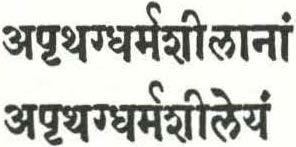

TRANSLATION
You brothers are all of the same nature, being devotees and obedient sons of your father. Similarly, that girl is also of the same type and is dedicated to all of you. Thus both the girl and you, the sons of Pracinabarhi�at, are on the same platform, being united on a common principle.
PURPORT
According to Vedic principles, a woman cannot have many husbands, although a husband can have many wives. In special instances, however, it is found that a woman has more than one husband. Draupadi, for
1502 Srimad-Bhagavatam [Canto 4, Ch. 30
3l'l�� ....,. . �qr q: ij�� I
instance, was married to all of the five Pal).�ava brothers. Similarly, the Supreme Personality of Godhead ordered all the sons of Pracinabarhi�at to marry the one girl born of the great sage Kal).�U and Pramloca. In special cases, a girl is allowed to marry more than one man, provided she is able to treat her husbands equally. This is not possible for an ordinary woman. Only one who is especially qualified can be allowed to marry more than one husband. In this age of Kali, to find such an equipoised woman is very difficult. Thus according to scripture, kalau panca vivarjayet. In this age a woman is forbidden to marry her husband's brother. This system is still practiced in some of the hilly tracts of India. The Lord says: aprthagdharma-stleyarh bhuyiit patny arpitiisayii. With the blessings of the Lord, all things are possible. The Lord especially benedicted the girl to surrender equally to all brothers. Ap;thag-dharma, meaning occupational duty without difference of purpose, is taught in Bhagavad-gttii. Bhagavad-gttii is divided into three primary divisions-karma-yoga, jniina-yoga, and bhaktiyoga. The word yoga means acting on behalf of the Supreme Personality of Godhead. As confirmed by Bhagavad-gttii:

yajniirthiit karmaro 'nyatra
loko 'yarh karma-bandhana� tad-artharh karma kaunteya
mukta-sa1iga{t samiicara
"Work done as a sacrifice for Vi�l).U has to be performed, otherwise work binds one to this material world. Therefore, 0 son of Kunti, perform your prescribed duties for His satisfaction, and in that way you will always remain unattached and free from bondage." (Bg. 3.9)
One may act according to his own occupational duty just to satisfy the yajna-puru.sa, the Supreme Personality of Godhead. That is called aprthagdharma. Different limbs of the body may act in different ways, but the ultimate objective is to maintain the entire body. Similarly, if we work for the satisfaction of the Supreme Personality of Godhead, we will find that we satisfy everything. We should follow in the footsteps of the Pracetas, whose only aim was to satisfy the Supreme Lord. This is called aprthagdharma. According to Bhagavad-gitii:
sarva-dharman parityajya
miim ekarh sarararh vraja
aharh tviirh sarva-piipebhyo
mok.sayiniimi mii suca�
Text 16] The Activities of the Pracetas 1503
"Abandon allvarieties of religion and just surrender unto Me.I shall deliver you from all sinful reaction. Do not fear." (Bg. 18.66)
This is the advice of Lord Kr�Qa. Our only aim should be to act in Kr�Qa consciousness for the satisfaction of the Lord. This is oneness, or aprthagdharma.
TEXT 17

�ottcc��f ��1��: 1
-_it��itilF{��t���� IIZ\911
divya-var_sa-sahasriipiim sahasram ahataujasa�
bhaumiin bhok.syatha bhogiin vai divyiims ciinugrahan mama
divya-of the heavenly planets; var_sa- years; sahasriipiim-of thousands; sahasram-a thousand; ahata-without being defeated; ojasa�-your power; bhaumiin-of this world; bhok.syatha-you will enjoy; bhogiin- enjoyments; vai-certainly; divyiin-of the heavenly world; ca-also; anugrahiit-by mercy; mama- My.
TRANSLATION
The Lord then blessed all the Pracetas, saying: My dear princes, by My mercy, you can enjoy all the facilities of this world as well as the heavenly world. Indeed, you can enjoy all of them without hindrance and with full strength for one million celestial years.
PURPORT
The durationoflife prescribed forthe Pracetas bythe Supreme Personality of Godhead is calculated by the time measurements of higher planetary systems. Our six earth months are said to equal one day (12 hours) in the higher planetary systems. Thirty days equal one month, and twelve months equal one year. In this way, for one million years according to the calculations of the higher planetary system the Pracetas were allowed to enjoy all kinds of material facilities. Although this lifespan was so long, the Pracetas were given full bodily strength by the grace of the Lord. In the material world, if one wants to live for many years, he must endure the difficulties of old age, invalidity and many other miserable conditions. The Pracetas, however, were given full bodily strength to enjoy material
1504 Srimad-Bhagavatam [Canto 4, Ch. 30
facilities. This special facility was given to the Pracetas so that they could continue rendering full devotional service. This will be explained in the following verse.
TEXT 18

m�?t � � f;H�Ii;\(1:II��II
atha mayy anapiiyinyii
bhaktyii pakva-guriisayiif!
upayiisyatha mad-dhiima
nirvidya nirayiid ataft
atka-therefore; mayi - unto Me; anapiiyinyii-without any deviation; bhaktyii-by devotional service; pakva-gura-free from material contamination; iisayiift-your mind; upayiisyatha-you will attain; mat-dhiimaMy abode; nirvidya-being completely detached; ni rayiit- from material existence; ataft - thus.
TRANSLATION
Thereafter you will develop unadulterated devotional service unto Me and be freed from all material contamination. At that time, being completely unattached to material enjoyment in the so-called heavenly planets as well as in hellish planets, you will return home, back to Godhead.
PURPORT
By the grace of the Lord, the Pracetas were given special facilities. Although they could live millions of years to enjoy material facilities, they still would not be deviated from the transcendental loving service of the Lord. Being thus fully engaged, the Pracetas would be completely freed from all material attachment. Material attachment is very strong. During one lifetime, a materialist engages in acquiring land, money, friends, society, friendship, love, and so on. He also wants to enjoy the heavenly planets after the annihilation of the body. If one is engaged in devotional serivce,however,he becomesunattached to all kindsof material enjoyment and suffering. In the material world, those who are elevated to the higher planetary systems are supposed to enjoy all material facilities, whereas those degraded to lower planetary systems are supposed to live in a hellish condition. A devotee, however, is transcendental to both heavenly and hellish conditions. According to Bhagavad-gttii, a devotee's position is described in this way:
Text 18) The Activities of the Pracetas 1505
3l?tfP-�-.ql�;::ql����nI
Srimad-Bhagavatam
miim ca yo 'vyabhiciirera bhakti-yogena sevate sa guriin samatttyaitiin brahma-bhiiyiiya kalpate
"One who engages in full devotional service, who does not fall down in any circumstance, at once transcends the modes of material nature and thus comes to the level of Brahman." (Bg. 14.26)
A devotee is always situated on the Brahman platform. He has nothing to do with material happiness or distress. When one is strongly fixed in devotional service and free from all material attachment, uncontaminated by the material modes of nature, he becomes fit to return home, back to Godhead. Although by special blessing the Pracetas would enjoy material facilities for millions of years, they would not be attached to them. Thus at the end of their material enjoyment they would be promoted to the spiritual world and return to Godhead.
The word pakva-gurasayii[l has special significance, for it means that by devotional service one is able to give up the influence of the three modes of material nature. As long as one is influenced by the modes of material nature, he cannot return to Godhead. It is clearly explained that all planets in the material world-beginning from Brahmaloka down to the hellish planets-are unfit places for a devotee. Padam padam yad vipadiim na te§iim. A place where there is danger at every step is certainly not a comfortable place. The Lord therefore says in Bhagavad-gita:

iibrahma-bhuvaniil lokii[l, punar iivartino 'rjuna miim upetya tu kaunteya punar janma na vidyate
"From the highest planet in the material world down to the lowest, all are places of misery wherein repeated birth and death take place. But one who attains to My abode, 0 son of Kunti, never take birth again." (Bg. 8.16) Thus there is no profit, even if one is promoted to the highest planet in the material universe, Brahmaloka. However, if one is somehow or other promoted to the abode of the Lord, he never returns to the material world.
1506
[Canto 4, Ch. 30
TEXT 19 �� :qrftr �j w;�umJ:, I '*"lijWRt4l+utti if if;l:fitr �� 1Rrl: II��II
grhe.sv iivisatiirh ciipi purhsiim kusala-karmaram mad-viirtii-yiita-yiimiiniirh na bandhiiya grhii matii[t
grhe. su-in family life; iiviSatiim-who have entered; ca-also; api-even; purhsiim-of persons; kusala-karmariim-engaged in auspicious activities; mat-viirtii- in topics ahout Me; yiita-is expended; yiimiiniim- whose every moment; na- not; bandhiiya-for bondage; grhiift-household life; matiiftconsidered.
TRANSLATION
Those who are engaged in auspicious activities in devotional service certainly understand that the ultimate enjoyer or beneficiary of all activities is the Supreme Personality of Godhead. Thus when one acts, he offers the results to the Supreme Personality of Godhead and passes life always engaged in the topics of the Lord. Even though such a person may be participating in family life, he is not affected by the results of his actions.
PURPORT

Generally a personliving in a family becomes overly attached to fruitive activity. In other words, he tries to enjoy the results of his activities. A devotee, however, knows that Kr�t;ta is the supreme enjoyer.
bhoktiiram yajna-tapasiim sarva-loka-mahesvaram suhrdam sarva-bhutiiniim jniitvii miirh siintim rcchati
"The sages, knowing Me as the ultimate purpose of all sacrifices and austerities, the Supreme Lord of all planets and demigods and the benefactor and well-wisher of all living entities, attain peace from the pangs of material miseries." (Bg. 5.29)
The Supreme Lord is the supreme proprietor; consequently the devotee does not consider himself the proprietor of any occupation. The devotee always thinks of the Supreme Personality of Godhead as the proprietor; therefore the results of his business are offered to the Supreme Lord. One who thus lives in the material world with his family and children never becomes affected by the contaminations of the material world. This is confirmed in Bhagavad-gitii (3. 9):
19]
Text
The Activities of the Pracetas
1507
yajniirthiit karmaro 'nyatra
loko 'yarh karma-bandhana�
tad-artharh karma kaunteya
mukta-sanga� samiicara
One who tries to enjoy the results of his activities becomes bound by the results. One who offers the results or profits to the Supreme Personality of Godhead, however, does not become entangled in the results. This is the secret of success. Generally people take sannyiisa to become free from the reactions of fruitive activity. One who does not receivetheresultsofhisactionsbutofferstheminsteadtotheSupremePersonality of Godhead certainly remains in a liberated condition. In Bhaktirasamrta-sindhu, Srila Riipa Gosviimi confirms this:
thii yasya harer diisye
karma[lii manasii girii
nikhiliisv apy avasthiisu
jtvan-mukta� sa ucyate
If one engages himself in the service of the Lord through his life, wealth, words,intelligence,and everything he possesses, he will always be liberated inanycondition. Suchapersonis called a jtvan-mukta, one who is liberated during this lifetime. Devoid of Kr�Q.a consciousness, those who engage in material activities simply become more entangled in material bondage. They have to suffer and enjoy the actions and reactions of all activity. This Kr�Q.a consciousness movement is therefore the greatest boon to humanity because it keeps one always engaged in Kr�l}a's service. The devotees think of Kr�Q.a, act for Kr�Q.a, eat for Kr�Q.a, sleep for Kr�Qa and work for Kr�Q.a. Thus everything is engaged in the service of Kr�Q.a. A total lifein Kr�Qa consciousnesssavesonefrommaterialcontamination. As stated by Bhaktisiddhanta Sarasvati Gosvami Maharaja, kr�ra bhajane yiihii haya anukula, vi§aya baliyii tyiige tiihii haya bhula. If one is so expert thathe can engage everything or dovetail everything in the service of the Lord, to give up the material world would be a great blunder. One should learn how to dovetail everything in the service of the Lord, for everything is connected to Kr�Q.a. Thatisthe real purpose of life and secret of success. As reiterated later in the Third Chapter of Bhagavad-gttii:
tasmiid asakta{l. satatarh
kiiryarh karma samiicara

1508
Srimad-Bhagavatam
[Canto 4, Ch. 30
"Therefore, without being attached to the fruits of activities, one should act as a matter of duty; for. by working without attachment, one attains the Supreme." (3.19)

The Third Chapter of Bhagavad-gttii specifically considers material activities for the purpose of sense gratification and material activities for the purpose of satisfying the Supreme Lord. The conclusion is that these are not one and the same. Material activities for sense gratification are the cause of material bondage, whereas the very same activities for the satisfaction of Kr�l).a are the cause of liberation. How the same activity can be the cause of bondage and liberation can be explained as follows. One may get indigestion due to eating too many milk preparationscondensed milk, sweet rice, and so on. But even though there is indiges· tion or diarrhea, another milk preparation-yogurt mixed with black pepper and salt-will immediately cure these maladies. In other words, one milk preparation can cause indigestion and diarrhea, and another milk preparation can cure them.
If one is placed in material opulence due to the special mercy of the Supreme Personality of Godhead, he should not consider that opulence a cause for bondage. When a mature devotee is blessed with material opulence, he does not become affected adversely because he knows how to employ material opulence in the service of the Lord. There are many such examples in the history of the world. There were kings like Prthu Maharaja, Prahlada Maharaja, Janaka, Dhruva, Vaivasvata Manu and Maharaja l�vaku. All of these were great kings and were especially favored by the Supreme Personality of Godhead. If a devotee is not mature, the Supreme Lord will take away all his opulence. This principle is stated by the Supreme Personality of Godhead: yasyiiham anugrhr-iimi hari_sye tad-dhanarh sanai[l. "My first mercy shown to My devotee is to take away all his material opulence." Material opulence detrimental to devotional service is taken away by the Supreme Lord, whereas a person who is mature in devotional service is given all material facilities.

Text 20] The Activities of the Pracetas asaktohyticarankarma paramiipnotipuru�a� 1509
TEXT 20 � � ;fmijMfqtf�: 1 � � � m:qf;ij � Rf';ij� r(ijt:JI� o II
Srimad-Bhagavatam
navyavad dhrdaye yaj jiio brahmaitad brahma-viidibhifi. na muhyanti na socanti na hr.syanti yato gatiift
navya-vat-ever increasingly fresh; hrdaye-in the heart; yat- as; jiia[lthe supreme knower, Paramatma; brahma-Brahman; etat-this; brahmavadibhi[l-by the advocates of Absolute Truth; na- never; muhyanti-are bewildered; na-never; socanti-lament; na-never; h[�yanti-are jubilant; yata[l-when; gatii[l-haveattained.
TRANSLATION
Always engaging in the activities of devotional service, devotees feel ever-increasingly fresh and new in all their activities. The all-knower, the Supersoul within the heart of the devotee, makes everything increasingly fresh. This is known as the Brahman position by the advocates of the Absolute Truth. In such a liberated stage [brahma-bhiita], one is never bewildered. Nor does one lament or become unnecessarily jubilant. This is dueto the brahma-bhiita situation.
PURPORT
A devotee is inspired by the Supersoul within the heart to advance in devotional service in a variety of ways. The devotee does not feel hackneyed nor stereotyped, nor does he feel that he is in a stagnant position. In the materialworld, if one engages in chanting a material name, he will feel tired after chanting a few times. However, one can chantthe Hare Kr�l).a mahii-mantra allday and nightand never feel tired. As chanting is increased, it will come out new and fresh. Srila Rupa Gosvamisaid if he could somehow get millions of ears and tongues, then he could relish spiritual bliss by chanting the Hare Kr�l).a mahii-mantra. There is really nothing uninspiring for a highly advanced devotee. In Bhagavad-gita the Lord says that He is situated in everyone's heart and that He helps the living entity forget and remember. By the grace of the Lord, the devotee gets inspiration.
te�am satata-yuktanam
bhajatiim priti-pilrvakam
dadiimi buddhi-yogam tam
yena mam upayanti te

1510 •
[Canto 4, Ch. 30
"Tothose whoare constantly devoted and worship Me with love, I give the understanding by which they can come to Me." (Bg. 10.10)
As stated (kusala-karma[u'im ), those engaged in auspicious activities in devotional service are guided by the Supersoul, described in this verse as fiia, one who knows everything past, present and future. The Supersoul gives instructions to the sincere unalloyed devotee on how he can progress more and more in approaching the Supreme Personality of Godhead. SrUa Jiva Gosvami in this connection says that the Supersoul, the plenary expansion of the Personality of Godhead, exists in everyone's heart, but in the heart of the devotee He reveals Himself as ever increasingly new. Being inspired by Him, the devotee experiences increased transcendental bliss in the execution of his devotional service.

TEXT 21
II��II
maitreya uviica
evarh bruviir-arh puru.siirtha-bhiijanarh janiirdanarh priinjalayaft pracetasaft
tad-darsana-dhvasta-tamo-rajo-malii giriigrr;.an gadgadayii suhrt-tamam
maitreya� uviica-Maitreya said; evam-thus; bruvap.am-speaking; puru.sa-artha-of the ultimate goal of life; bhnjanam-the bestower; janiirdanam-who takes away all the disadvantages of the devotee; priinjalaya[l-with folded hands; pracetasaf!,-the Praceta brothers; tatHim; darsana-by seeing; dhvasta-dissipated; tamafl,-of darkness; rajafl,of passion; maliift- whose contamination; girii-with a voice; agrp.anoffered prayers; gadgadayii-faltering; suhrt-tamam-unto the greatest of all friends.
TRANSLATION
The great sage Maitreya said: After the Personality of Godhead spoke thus, thePracetas began tooffer Himprayers. The Lordis thebestowerof
Text 21] TheActivitiesof thePracetas 1511
�5,lr i3<IR ����lUi � ill�� sn§t�: �:fll�'l. •IMtll ij�444(
all success in life and is the supreme benefactor. He is also the supreme friend who takes away all miserable conditions experienced by a devotee. In a faltering voice, due to ecstasy, the Pracetas began to offer prayers. They were purified by the presence of the Lord, who was before them face to face.
PURPORT
The Lord is herein described as puru.siirtha-bhiijanam (the bestower of the ultimate goal of life). Whatever success we want in life can be attained by the mercy of the Lord. Since the Pracetas had already attained the Lord's mercy, they were no longer subject to the contamination of the material modes. The material modes dissipated from them just as the darkness of night immediately dissipates when the sun rises. Because the Lord appeared before them, naturally all the contaminations of the material qualities of rajas and tamas completely disappeared. Similarly, when an unalloyed devotee chants the Hare Krt>l).a mahii-mantra, he is also purified of all material contamination because the name of the Lord and the Lord are identical. As stated in Srimad-Bhiigavatam:
srrwatiim sva-kathiift kmwft
pur.ya-sravar-a-kirtanaft hrdy anta[l.-stho hy abhadrar-i vidhunoti suhrt satiim
"SriK.rt>l).a, the Personality of Godhead, who is the Paramatma [Supersoul] in everyone's heart and the benefactor of the truthful devotee, cleanses desire for material enjoyment from the heart of the devotee who relishes his messages, which are in themselves virtuous when properly heard and chanted." (Bhiig. 1.2.17)
The holy name of the Lord is the Lord Himself. If one chants and hears, he becomes purified. Gradually all material contamination disappears. The Pracetiis were already purified due to the Lord's presence before them, and they could therefore offer the proper prayers with folded hands. In other words, as soon as devotees are engaged in devotional service, they become transcendental to all material contamination immediately. As confirmed in Bhagavad-gita:
mam ca yo 'vyabhicarer-a

bhakti-yogena sevate
sa gur-an samatityaitiin
brahma-bhuyiiya kalpate
1512 Srimad-Bhagavatam [Canto 4, Ch. 30
"One who engages in full devotional service, who does not fall down in any circumstance, at once transcends the modes of material nature and thus comes to the level of Brahman." (Bg. 14.26)
Sometimes the devotees are dissatisfied due to their not seeing the Supreme Personality of Godhead personally. When the Pracetas saw the Supreme Lord personally present, their unhappiness vanished.
TEXT 22

pracetasa ucu� namo nama� klesa-viniisaniiya nirupitodiira-gurahvayiiya mano-vaco-vega-puro-javiiya sarviik.sa-miirgair agatiidhvane nama[1
pracetasa� u cufz,-the Pracetas said; nama�-obeisances; nama�-obeisances; kle5a-material distress; vinasaniiya- unto one who destroys; nimpita -settled; udiira-magnanimous; guru-qualities; iihvayiiya-whose name; mana�-of the mind; vaca�-of speech; vega-the speed; pura�-before; javiiya-whose speed; sarva-ak§a-of all material senses; miirgai�-by the paths; agata-not perceivable; adhvane-whose course; nama[l-we offer our respects.
TRANSLATION
The Pracetas spoke as follows: Dear Lord, You relieve all kinds of material distress. Your magnanimous transcendental qualities and holy name are all-auspicious. This conclusion is already settled. You can go faster than the speed of mind and words. You cannot be perceived by material senses. We therefore offer You respectful obeisances again and again.
Text 22] The Activities of the Pracetas 1513
Jl�rm �� ;00 ;pf! ifilfi4'11�'11� nt�ftt«ta>l(gt�l1� 'ltlrcRt�� ��� ;pJ: ''��''
The word nirupita, meaning "concluded," is very significant in this verse. No one has to conduct research work to find God or make progress in spiritual knowledge. Everything is conclusively there in the Vedas. Therefore the Lord says in Bhagavad-gitii:
sarvasya ciiharh hrdi sanniv�.to matta[l smrtir jniinam apohanarh ca
vedaiS ca sarvair aham eva vedyo vediinta-krd veda-vid eva ciiham
"I am seated in everyone's heart, and from Me come remembrance, knowledge and forgetfulness. By all the Vedas, I am to be known; indeed, I am the compiler of Vedanta, and I am the knower of the Vedas." (Bg. 15.15)
Understanding the Supreme Personality of Godhead through the process of the Vedas is perfect and conclusive. The Vedas state, ata]l sri-kr.s[Laniimiidi na bhaved grahyam indriyai[l: the transcendental names, forms, qualities, paraphernalia and pastimes of the Lord cannot be understood by our blunt material senses. Sevonmukhe hi jihviidau svayam eva sphuraty ada[l: when a devotee engages his senses favorably in devotional service, the Lord, through His causeless mercy, reveals Himself to the devotee. This is the conclusive Vedic process. The Vedas also indicate that simply by chanting the holy names of the Lord one can without a doubt become spiritually advanced. We cannot approach the Supreme Personality of Godhead by the speed of mind or words, but if we stick to devotional service we can easily and quickly approach Him. In other words, the Supreme Lord is attracted by devotional service, and He can approach us more swiftly than we can approach Him with our mental speculation. The Lord has stated that He is beyond the range of mental speculation and the speed of thought, yet He can be approached easily by His causeless mercy. Thus only by His causeless mercy can He be attained. Other methods will not be effective.
TEXT 23
��119'ijlq;rq: (qf.taql

1514 Srimad-Bhagavatam [Canto 4, Ch. 30
PURPORT
��--�q·..} WiMt�iMlq I � �tl«"'lwtWollf\�! •OO�'IIqi!}UI� ll��ll
suddhayasantayanama�sva-ni§.thaya manasyapartharhvilasad-dvayaya
namojagat-sthiina-layodaye,su grhita-maya-gupa-vigrahaya
suddhaya- unto the unadulterated; santaya- unto the most peaceful; nama�- we offer our obeisances; sva-ni�.thaya-bybeingsituated in one'sposition; manasi-in the mind; apartham-without any meaning; vilasat-appearing; dvayaya-in whom the dual world; nama�-obeisances; jagat- of the cosmic manifestation; sthana- maintenance; laya-annihilation; udaye,su -and for creation; grhita-accepted; maya- material; gupa-of the modes of nature; vigrahaya-the forms.
TRANSLATION
Dear Lord, we beg to offer our obeisances unto You. When the mind is fixed upon You, the world of duality, although a place for material enjoyment, appears meaningless. Your transcendental form is full of transcendental bliss. We therefore offer our respects unto You. Your appearances as Lord Brahma, Lord Vi��u and Lord Siva are meant for the purpose of creating, maintaining and annihilating this cosmic manifestation.
PURPORT

A pure devotee whose mind is always engaged in the service of the Lord cancertainlyappreciate the impermanence of this material world. Although such a devotee may be engaged in executing material activities, this stage iscalled anasakti. As explained by Srila Rupa Gosvami, anasaktasyavi,sayan yatharham upayunjata�. A devotee is always unattached to material activities because in the liberated stage his mind is always fixed on the lotus feet of the Lord.
This material world is called dvaita, the world of duality. A devotee knows very well that everything within this material world is but a manifestation of the Supreme Lord's energy. To maintain the three modes of material nature, the Supreme Lord takes on different forms as Lord Brahma, Lord Vi��u and Lord Siva. Unaffected by the modes of material nature, the Lord takes on different forms to create, maintain and annihilate this cosmic manifestation. The conclusion is that although the pure devotee appears to engage in material activities in the service of the Lord, he knows very well that material enj oyment for sense gratification has no use whatsoever.
Text 23J The Activities of the Pracetas
1515
TEXT 24

� fcly.a:Q\\itltt m �I
C41ij�cUJ<t � � ri('tl€f4ijl4{11�'611
namo visuddha-sattviiya
haraye hari-medhase
viisudeviiya kr.sriiya
prabhave sarva-siitvatiim
nama[t-obeisances; visuddha-sattviiya-unto You, whose existenceisfree from all material influence; haraye-who takes away all miserable conditions of devotees;hari-medhase-whosebrainworks only for thedeliverance of the conditioned soul;viisudevaya-theall-pervading Supreme Personality of Godhead; kr.srtiiya-unto J<r�p.a;prabhave-who increases the influence; sarva-satvatiim-of all kinds of devotees.
TRANS LATION
Dear Lord, we offer our respectful obeisances unto You because Your existence is completely independent of all material influences. Your Lordship always takes away the devotee's miserable conditions, for Your brain plans how to do so. You live everywhere as Paramatma; therefore You are known as Vasudeva. You also accept Vasudeva as Your father, and You are celebrated by the name of 1\.r�J}.a. You are so kind that You always increase the influence of all kinds of devotees.
PURPORT
In the previous verse it has been said (grhtta-mliya-gura-vigrahiiya) that the Lord accepts three kinds of bodies (Vi�J}.U, Brahma and Siva) for the purposesofcreating, maintainingandannihilating thecosmic manifestation. The three predominating deities of the material universe (Bral1ma, Vi�Q.U and Siva) are called gu[ta-avatliras. There are many kinds of incarnations of the Supreme Personality of Godhead, and the firstincarnations within this material world are Brahma, Vi�Q.u and Mahesvara (Siva). Out of these three, Lord Brahma and Lord Siva acceptmaterial bodies, but Lord Vi�Q.U does not accept a material body. Lord V�Q.U is therefore known as visuddha-sattva. His existence is completely free from the contamination of the material modes of nature. One should therefore not think that Lord Vi�Q.U is in the same category with Lord Brahma and Siva. The slistras forbid us to think in this way.
1516 Srimad-Bhagavatam [Canto 4, Ch. 30
The Activities of the Pracetas
yas tu niiriiyaram devarh brahma-rudriidi-daivatai� samatvenaiva vik,seta sa pii�a[lpi bhaved dhruvam
One who considers Lord Vi�I)U to be in the same category with devas like Lord Brahma or Lord Siva or who thinks Lord Brahma and Siva to be equal to Lord Vi�I)U is to be considered as pii,sarfli(a faithless nonbeliever). Therefore in this verse Lord Vi�I)U is distinguished in the words namo viSuddha-sattviiya. Although a living entity like us, Lord Brahma is exalted due to his pious activities; therefore he is given the high post of Brahma. Lord Siva is not actually like a living entity, but he is not the Surpeme Personality of Godhead. His position is somewhere between Vi�I)U, the Supreme Personality of Godhead, and Brahma, the living entity. Lord Siva is therefore explained in Brahma-sarhhitii in this way:
k�irarh yathii dadhi vikiira-vise.sa-yogiit sanjiiyate na hi tata� prthag asti heto� ya� sambhutiim api tathii samupaiti kiiryiid govindam iidi-puru.sarh tam aharh bhajiimi
Lord Siva is considered to be like yogurt (dadhi). Yogurt is nothing but transformed milk; nonetheless yogurt cannot be accepted as milk. Similarly, Lord Siva holds almost all the powers of Lord Vi�I)U, and he is also above the qualities of the living entity, but he is not exactly like Vi�l)u, just as yogurt, although transformed milk, is not exactly like milk.
The Supreme Personality of Godhead is also described herein as viisudeviiya k[.S[liiya. Kr�l)a is the original Supreme Personality of God· head, and all Vi�ru expansions are His plenary portions or portions of His plenary portions (known as sviirhsa and kalii). The sviirhsa, or direct expansion, is also called arhsa. All vi,s.nu-tattvas are sviimsa, direct parts and parcels of the Supreme Personalityof Godhead, Kr�l)a. Kr�J;ta is known as Vasudeva because He appeared in this material world as the son of Vasudeva. Similarly, He is known as Devaki·nandana, Ya.Soda·nandana, Nanda-nandana, and so on.
Again and again the Lord is very much interested in increasing the influence of His devotees. Therefore He is described herein as prabhave sarva-siitvatiim. The siitvata community is a community of Vai�l)avas, pure devotees of the Lord. The Supreme Personality of Godhead.has unlimited powers, and He wants to see that His devotees are also entrusted with unlimited powers. Adevotee of the Lord is always, therefore, distinguished from all other living entities.

24]
Text
1517
The word hari means "Onewho takes away all miserable conditions," and hari-medhase means thatthe Lordisalwaysplanningwaystodeliver the conditioned soul from the clutches of maya. The Lord is so kind that He personally incarnates to deliver the conditioned souls, and whenever He comes, He makes His plans.
paritraraya sadhunarh
vinasaya ca du.skrtam
dharma-sarhsthapanarthaya
sambhavami yuge yuge
"To deliver the pious and to annihilate the miscreants, as well as to reestablish the principles of religion, I advent Myself millennium after millennium." (Bg. 4.8)
Since the Lord deliversall conditioned souls from the clutches of maya, He is known as hari-medha�. In the list of incarnations, Kr�v.a is described as the supreme and original Personality of Godhead.
ete carhsa-kala� purhsaft
kr.sras tu bhagavan svayam
indrari-vyakularh lokarh
mnlayanti yuge yuge (Bhag. 1.3.28)
Kr�J'.la, the original personality of Godhead, appears in this material world when the demigods, who are devotees of the Lord, are disturbed by the demons.
TEXT 25

WI'{: ��WflliN �: ��i{ I
�: ffi¥RJ;ql(\ltf '111� W� ����II
nama[!, kamala-ntibhaya
nama[!, kamala-maline
nama� kamala-padaya
namas te kamalekfiara
nama{t - we offer our respectful obeisances; kamala-nabhaya-unto the Supreme Personality of Godhead, from whose abdomen the original lotus flower originated; namafl- obeisances ; kamala-maline-who is always decorated with a garland of lotus flowers; nama�- obeisances; kamala-padaya-
1518 Srimad-Bhagavatam [Canto 4, Ch. 30
whose feet are as beautiful and fragrant as the lotus flower; nama� teobeisances unto You; karnala-ik§a[la-whose eyes are exactly like the petals of the lotus flower.
TRANSLATION
Dear Lord, we offer our respectful obeisances unto You because from Your abdomen sprouts the lotus flower, the origin of all living entities. You are always decorated with a lotus garland, and Your feet resemble the lotus flower with all its fragrance. Your eyes are also like the petals of a lotus flower. Therefore we always offer our respectful obeisances unto You.
PURPORT
The word karnala-nabhiiya indicates that Lord Vis;pu is the origin of the material creation. From the abdomen of Garbhodakasayi Vigm, a lotus flower sprouts. Lord Brahma, the first creature of the universe, is born from this lotus flower, and, subsequently, Lord Brahmii. creates the whole universe. The origin of all creation is therefore Lord Vi!'pu, and the origin of all the vi§[lu-tattvas is Lord Kr�pa. Consequently Kr�pa is the origin of everything. This is also confirmed in Bhagavad-gitii:
aharh sarvasya prabhavo rnatta[t sarvarh pravartate iti rnatvii bhajante rniirh budhii bhiiva-sarnanvitii[t
"I am the source of all spiritual and material worlds. Everything emanates from Me. The wise who perfectly know this engage in My devotional service and worship Me with all their hearts." (Bg. 10.8) Lord Kr�pa says: "I am the origin of everything." Therefore whatever we see emanates from Him. This is also confirmed in the Vediinta-siitra. ]anrniidy asya yata[t: "The Absolute Truth is He from whom everything emanates."
TEXT 26 �:

nama[!, karnala-kiiijalkapisatigiirnala-viisase sarva-bhiita-niviisiiya
namo 'yutik§rnahi siik§i[le
Text 26] The Activities of the Pracetis 1519
¥¥t�M(!m�'fi·l¥t�ctfij� I
;pit��������
ril((tf.tcti(1Pt
nama[l-obeisances; kamala- kiiijalka-like the saffron in a lotus flower; piSariga-yellowish; amala-spotless; vasase-unto Him whose garment; saroa-bhiita-of all living entities; nivasaya-the shelter; nama[l-obeisances; ayurik,smahi-let us offer; sak , si[!e-unto the supreme witness.
TRANSLATION
Dear Lord, the garment You have put on is yellowish in color like the saffron of a lotus flower, but it is not made of anything material. Since You live in everyone's heart, You are the direct witness of all the activities of all living entities. We offer our respectful obeisances unto You again and again.
PURPORT

In this verse the dress of the Supreme Personality of Godhead and His all-pervasive nature are described. The Lord puts on a dress that is yellow, but such a garment is never to be considered material. The garments of the Lord are also the Lord. They are nondifferent from the Lord because they are spiritual in nature.
The word saroa-bhilta-nivasaya further clarifies how Lord Vigm lives in everyone's heart and acts as the direct witness of all the activities of the conditioned soul. Within this material world the conditioned soul has desiresand acts in accordance with these desires. All these acts are observed by the Supreme Personality of Godhead. This is also confirmed in Bhagavad-gita:
saroasya ciiham hrdi sanniv�.to matta[l smrtir jiianam apohanam ca
"I am seated in everyone's heart, and from Me come remembrance,knowledge and forgetfulness." (Bg. 15.15) The Lord is present in everyone's heart, and He gives the living entity intelligence. According to the desires of the living entity, the Lord makes him remember or forget. If the living entity is demoniac and wants to forget the Supreme Personality of Godhead, the Lord gives him the intelligence to be able to forget the Supreme Lord forever. Similarly, when a devotee wants to serve the Supreme Lord, the Lord, as Paramatma, gives the devotee the intelligence to make progress in devotional service. The Lord directly witnesses our activities and experiences our desires. The Supreme Lord gives us the facilities to act in thP. way we wish.
1520 Srimad-Bhagavatam [Canto 4, Ch_ 30
TEXT 27 ����' anfil'i�;nftrietwwf�;:tta>�f+««<l{ll�\911
rilparh bhagavatii tv etad a5e.sa-klesa-sarik�ayam iiv(skrtarh naft kli.s.tiiniirh kim anyad anukampitam
rilpam- form; bhagavatii-by Your Lordship; tu-but; etat-this; ase.saunlimited; klesa-miseries; sank.sayam-which dissipates; iivi� krtam-revealed; na[l.-of us; kli.s.tiiniim-who aresufferingfrommaterial conditions; kim anyat-what to speakof; anukampitam-those towhomYouarealways favorably disposed_
TRANSLATION
Dear Lord, we conditioned souls are always covered by ignorance in the bodily conception of life. We therefore always prefer the miserable conditions of material existence. To deliver us from these miserable conditions, You have advented Yourself in this transcendental form. This is evidence of Your unlimited causeless mercy upon those of us who are suffering in this way. What, then, to speak of the devotees to whom You are always so favorably disposed?
PURPORT
When the Lordappearsin Hisoriginalform, He actsto deliverthepious and annihilate the miscreants (Bg. 4_8)- Although He annihilates the demons, He nonetheless benefits them. It is said that all the living entities who died on the Battlefield of Kurukt:Jetra attained their original constitutional position (svarupa) because they had the chanceto see Krt>va face to face riding in the chariot of Arjuna. On the Battlefield of Kurukt:Jetra, superficially two things were goingon-thedemonswerebeingkilled, and the devotee, Arjuna, was being protected. However, the results were the same for everyone. Thus it is said that the appearance of the Lord diminishes all kindsof miserable conditions caused by materialexistence.
It is clearly stated in this verse that this form (ase.sa-klesa-salikflayam) is meant to diminish all the miserable conditions experienced in life not only by the devotees but by all others. Av(skrtarh naft kli�.tiiniim. The

Text 27] The Activities of the Pracetas
1521
Pracetiis identified themselves as common men. Kim anyad anukampitam. The devotees are always favorably accepted by the Lord. The Lord shows all mercy not only to conditioned souls, but also to the devotees who are already liberated due to their devotional service.
The form of the Lord as worshiped in the temples is called arcii-vigraha or arciivatiira, the worshipable form, the Deity incarnation. This facility is offered to neophyte devotees so that they can see the real form of the Lord face to face and offer their respectful obeisances and sacrifices in the form of arcii. Through such facilities the neophytes gradually invoke their original Kr�J;J.a consciousness. Deity worship in the form of temple worship is the most valuable benediction given by the Lord to beginners. All neophytes must therefore engage in the worship of the Lord by keeping the arcii-vigraha (arciivatiira) at home or in the temple.
TEXT 28

etiivat tvarh hi vibhubhir bhiivyarh dine.su vatsalaift yad anusmaryate kiile
sva-buddhyiibhadra-randhana
etiivat-thus; tvam- Your Lordship; hi-certainly; vibhubhift-by expansions; bhiivyam-to be conceived; dine _ su- unto the humble devotees; vatsalai/1- compassionate; yat- which; anusmaryate- is always remembered; kiile-in due course of time; sva-buddhyii-by one's devotional service; abhadra-randhana-0 killer of all inauspiciousness.
TRANSLATION
Dear Lord, You are the killer of all inauspicious things. You are compassionate upon Your poor devotees through the expansion of Your arcavigraha. You should certainly think of us as Your eternal servants.
PURPORT
The form of the Lord known as arcii-vigraha is an expansion of His unlimited potencies. When the Lord is gradually satisfied with the service of a devotee, in due course of time He accepts the devotee as one of His
1522 Srimad-Bhagavatam [Canto 4, Ch. 30
*«tM¥4 ft: {qfu� ��:I �((?J414a cW �������
many unalloyed servants. By nature, the Lord is very compassionate; therefore the service of neophyte devotees is accepted by the Lord. As confirmed in Bhagavad-gitii:
patrarh pu§pam phalam toyarh yo me bhaktyii prayacchati tad aharh bhakty-upahrtam asniimi prayatiitmana�

"If one offers Me with love and devotion a leaf, a flower, fruit or water, I will accept it." (Bg. 9.26)
The devotee offers eatables in the form of vegetables, fruits, leaves and water to the arca-vigraha. The Lord, being bhakta-vatsala, compassionate upon His devotees, accepts these offerings. Atheists may think that the devotees are engaged in idol worship, but the fact is different. Janardana, the Supreme Lord, accepts bhiiva, the attitude of service. The neophyte devotee engaged in the worship of the Lord may not understand the value of such worship, but the Supreme Lord, being bhakta-vatsala, accepts His devotee and in due course of time takes him home.
In this connection there is a story about a brahmara who was offering sweet rice to the Lord within his mind. The briihmara had no money nor any means of worshiping the Deity, but within his mind he arrangedeverything nicely. He had gold pots to bring water from the sacred rivers to wash the Deity, and he offered the Deity very sumptuous food, including sweet rice. Once, before he offered the sweet rice, he thought that it was too hot, and he thought, "Oh, let me test it. My, it is very hot." When he put his finger in the sweet rice to test it, his finger was burned and his meditation broken. Although he was offering food to the Lord within his mind, the Lord accepted it nonetheless. Consequently the Lord in VaikuQ.tha immediately sent a chariot to bring the briihmara back home, back to Godhead. Thus it is the duty of every sincere devotee to accept the arca-vigraha at home or in the temple and worship the form of the Lord as advised in authorized scriptures and directed by the spiritual master.
Text 29) The Activities of the Pracetiis 1523
TEXT 29 ir.ft'mf�� �1'1t'Ammt_ I ��s;oa«� �I'll � wrrm: ����II yenopasantir bhiitanarh k�ullakiintim apihatam
[Canto
antarhito 'ntar-hrdaye
yena- bywhichprocess; upasanti{l- satisfaction of alldesires; bhutanamof the living entities; k§ullakiiniim-verymuchfallen; api-although; 1hatiim -desiring many things; antarhita{l-hidden; anta{l-hrdaye-in the core of the heart; kasmiit-why; na{l-our; veda-He knows; na- not; iiSi,sa�- desires.
TRANSLATION
When the Lord, out of His natural compassion, thinks of His devotee, by that process only are all desires of the neophyte devotee fulfilled. The Lord is situated in every living entity's heart, although the living entity may be very insignificant. The Lord knows everything about the living entity, including all his desires. Although we are very insignificant, why should the Lord not know our desires?
PURPORT
A very advanced devotee does not think himself advanced. He is always very humble. The Supreme Personality of Godhead in His plenary expansion as the Paramatma, or Supersoul, sits in everyone's heart and can understand the attitudes and desires of His devotees. The Lord also gives opportunity to the nondevotees to fulfill their desires, as confirmed in Bhagavad-gita (matta{l smrtir jniinam apohanam ca).
TEXT 30 3T� ��S�IEh+ftfim \iltRf: q� I � � �tf1'411il•G�Rt: II� o II

1524
Srimad-Bhagavatam
kasman no veda nas�a{l 4, Ch. 30
Whatever a living entity desires, however insignificant he may be, is noted by the Lord, who gives him a chance to fulfill his desires. If the desires of the nondevotees are fulfilled, why not those of the devotee? A pure devotee simply wants to engage in the service of the Lord without material desire, and if he wants this within the core of his heart, where the Lord is situated, and if he is without ulterior motive, why should the Lord not understand? If a sincere devotee renders service to the Lord or to the arcii-vigraha, the form of the Lord, all his activities prove successful because the Lord is present within his heart and understands his sincerity. Thus if a devotee, with all confidence, goes on discharging the prescribed duties of devotional service, he will ultimately attain success.
asav eva varo 'smakam
ipsito jagata[L pate
prasanno bhagavan ye.sam
apavarga-gurur gati[L
asau-that; eva-certainly; vara[L-benediction; asmakam-our; ipsita{Ldesired; jagata�-of the universe; pate-0 Lord; prasannafl-satisfied; bhagavan-the Supreme Personality of Godhead; ye.sam-with whom; apavarga-of transcendental loving service; guru[L-the teacher; gati[L-the ultimate goal of life.
TRANSLATION
0 Lord of the universe, You are the actual teacher of the science of devotional service. We are satisfied that Your Lordship is the ultimate goal of our lives, and we pray that You will be satisfied with us. That is our benediction. We do not desire anything other than Your full satisfaction.
PURPORT
In thisversethe words apavarga-gurur gati[L are very significant. According to $rimad-Bhiigavatam, the Supreme Lord is the ultimate fact of the Absolute Truth. Brahmeti paramatmeti bhagavan iti sabdyate (Bhiig. 1.2.11). The Absolute Truth is realized in three features-impersonal Brahman, localized Paramatma and ultimately the Supreme Personality of Godhead, Bhagavan. The word apavarga means liberation. Pavarga means material existence. In material existence, one always works very hard but is ultimately baffled. One then dies and has to accept another body to work very hard again. This is the cycle of material existence. Apavarga means just the opposite. Instead of working hard like cats and dogs, one returns home, back to Godhead. Liberation begins with merging into the Brahman effulgence of the Supreme Lord. This conception is held by the jnani-sampradaya, philosophical speculators,butrealizationof theSupreme Personality of Godhead is higher. When a devotee understands that the Lord is satisfied, liberation, or merging into the effulgence of the Lord, is notvery difficult. Onehastoapproachthe SupremePersonality of Godhead through the impersonal Brahman effulgence just as one has to approach the sun through the sunshine. It is not very difficult to merge into the impersonal effulgence of the Lord, Brahman, if one has satisfied the Supreme Personality of Godhead.

30]
Text
The Activities of the Pracetas
1525
TEXT 31 qt tuft�� efN �: �I ;r �d@.tf§:�f;rtm�{f�{f� II��II
varam vrr-tmahe 'thiipi niitha tvat parata� pariit na hy antas tvad-vibhuttniim so 'nanta iti gtyase
varam-benediction; vrrtimahe-we shallpray for; athiipi-therefore; niitha -0 _Lord; tvat-from You; parata� pariit-beyond the transcendence; nanot; hi-certainly; anta�-end ; tvat- Your; vibhiittniim-of opulences; sa[l,you; ananta[l,-unlimited; iti-thus; gtyase-are celebrated.
TRANSLATION
Dear Lord, we shall therefore pray for Your benediction because You are the Supreme beyond all transcendence and because there is no end to Your opulences. Consequently You are celebrated by the name Ananta.
PURPORT

There was no need for the Pracetas to ask any benediction from the Supreme Lord because the devotees are simply satisfied by the presence of the Supreme Personality of Godhead. Dhruva Maharaj a practiced severe austerities and penances to see the Supreme Lord, and his intention was to receive benediction from the Lord. He wanted to acquire the throne of his father-or attain an even better position-hut when he was actually in the presence of the Supreme Lord, he forgot everything. He said, "My dear Lord, I do not wish to ask any benediction." This is the actual position of the devotee. The devotee simply wants to he in the presence of the Supreme Lord-either in this world or in the next-and engage in His service. That is the ultimate goal and benediction for the devotees.
The Lord asked the Pracetas to pray for some benediction, and they said,"What kind of benediction should we pray for? The Lord is unlimited, and there are unlimited benedictions." The purport is that if one must ask for benediction, he must ask for unlimited benediction. The words tvat parata[l, are very significant in this verse. The Supreme Personality of Godhead is paratafl pariit. The word para means transcendental, beyond this material world. The impersonal Brahman effulgence is beyond this
1526 Srimad-Bhagavatam [Canto 4, Ch. 30
material world, and this is called param padam. Aruhya k,rcchrera param padam (Bhag. 10.2.32). Merging into the impersonal effulgence of the Lord is called param padam, but there is a higher transcendental position, which is the association of the Supreme Personality of Godhead. Brahmeti paramiitmeti bhagaviin iti sabdyate (Bhiig. 1.2.11). The Absolute Truth is realized first as impersonal Brahman, then as Paramatma, and finally as Bhagavan. Thus the Personality of Godhead, Bhagavan, is parata{l pariit, beyond Brahman and Paramatma realization. In this connection, Srila Jiva Gosvami points out that parata� pariit means "better than the best." The best is the spiritual world, andit is known as Brahman. The Supreme Personality of Godhead, however, is known as Parabrahman. Therefore parata{l pariit means "better than Brahman realization."
As will be explained in the next verse, the Pracetas planned to ask the Lord for something that has no limit. The Lord's pastimes, qualities, forms and names are all unlimited. There is no limit to His name,forms,pastimes, creation and paraphernalia. The living entity cannot conceive of the unlimitedness of the unlimited. However, if living entities are engaged in hearing about the unlimited potencies of the Supreme Lord, they are factually connected directly to the unlimited. Such understanding of the unlimited becomesunlimited by hearing and chanting.
TEXT 32 �l�S� �����I

�.f�H{�&mmlm�fttuftqft: II��II
piirijiite 'iijasa labdhe
sarango 'nyan na sevate tvad-anghri-miilam iisadya
siik.siit kim kim vrrtimahi
purijute-the celestial tree known as parijata; afijasri-completely; labdhe -having achieved; saranga{l-a bee; anyat-other; na sevate- does notresort to; tvat-anghri- Your lotus feet; miilam-the root of everything; iisiidyahaving approached; siik�iit- directly; kim- what; kim-what; vrrimahi- may we ask.
TRANSLATION
Dear Lord, when the bee approaches the celestial tree called the parijiita, it certainly does not leave the tree, because there is no need for such
Text 32] The Activities of the Pracetas 1527
action. Similarly, when we have approached Your lotus feet and taken shelter of them, what further benediction may we ask of You?
PURPORT
When a devotee is actually engaged in the service of the lotus feet of the Lord, his engagement in itself is so perfect that there is no need to ask for further benediction. When a bee approaches the piirijiita tree, it gets unlimited supplies of honey. There is no need to go to another tree. If one is fixed in the service of the lotus feet of the Lord, there is unlimited transcendental bliss, and as such there is no need to ask for further benediction. The piirijiita tree is not commonly found within this material world. The piirijiita tree is also known as kalpa-vrk.sa, or the wish-fulfilling tree. One can get anything he desires from such a tree. In the material world, one can get oranges from an orange tree or mangoes from a mango tree, but there is no possibility of getting oranges from a mango tree or vice versa. However, one can get whatever he wants from the piirijiita tree-oranges, mangoes, bananas, and so on. This tree is found in the spiritual world. Cintiimar-i-prakara-sadmasu kalpa-vrk.sa-lak�iivrte.su. The spiritual world, cintiimar-i-dhiima, is surrounded by these kalpa-vrk.sa trees, but the piirijiita tree is also found in the kingdom of lndra, that is, on lndra's heavenly planet. This piirijiita tree was brought by Kr�l).a to please Satyabhama, one of His queens, and this tree was implanted in the Dvaraka mansions constructed for the queens. The lotus feet of the Lord are exactly like the piirijiita trees, or wish-fulfilling trees, and the devotees are like bumblebees. They are always attracted by the lotus feet of the Lord.
TEXT 33

�� �Ttp.tt � JI'IPI � �fir: I
61Cfi#>CfdHt� q: �t.n lA ¥A II��II
yiivat te miiyayii spr.s_tii
bhramiima iha karmabhi[L
tiivad bhavat-prasangiiniirh
sangaf! syan no bhave bhave
yavat- as long as; te- Your; mayayii-by the illusory energy; spr.s.tiifl- contaminated; bhramiimaf!-we wander; iha-in this material world; karmabhi[L -by the reaction of fruitive activities; tiivat-so long; bhavat-prasanganiim-
1528 Srimad-Bhagavatam [Canto 4, Ch. 30
of Your loving devotees; s miga�-association; syat-let there be; na�-our; bhave bhave-in every species of life.
TRANSLATION

Dear Lord, as long as we have to remain within this material world due to our material contamination and wander from one type of body to another and from one planet to another, we pray that we may associate with those who are engaged in discussing Your pastimes. We pray for this benedictionlife afterlife, indifferentbodilyformsand on different planets.
PURPORT
This is the best benediction that a devotee can ask of theSupreme Lord. This is also confirmed by Sri Caitanya Mahaprabhu: sthane sthita� srutigatarh tanu-van-manobh* (Bhiig. 10.14.3). One may be in one position or another according to destiny, but in any case one must continue to hear about the activities and pastimes of the Supreme Lord, regardless of circumstances. A pure devotee does not pray for liberation or for cessation of thecycleof birthanddeath because hedoesnotconsider thatimportant. The most important thing for a devotee is getting a chance to hear about the pastimes and gloriesof the Lord.The devoteeswhoengage in theservice of the Lord in this world will have the same opportunity in the spiritual world also. Thus for a devotee, everything is in the spiritual world, for as long as he can hear about the pastimes of the Lord, or wherever he can chant, the Lord is personally present. Tatra tifi.thami narada yatra gayanti mad-bhakta�. When the pure devotees assemble to chant, hear and talk about theSupreme Personality of Godhead, the place where they assemble becomes Vaikul)tha. For the devotee there is no need to pray to the Lord for transferral to the Vaikul)tha world. A pure devotee can create Vaikul)tha or Vrndavana anywhere simply by chanting the glories of the Lord without offense.
The Pracetiis pray for an opportunity to hear of the glories of the Lord in every form of life (bhave bhave). A living entity transmigrates from one body to another. The devotee is not particularly eager to stop this process.
CaitanyaMahaprabhu prays, mama janmani janmanisvare bhavatiid bhaktir ahaituki tvayi: "My dear Lord, life after life may I be fixed in Your pure devotional service." Out of humility, a devotee considers himself unfit to be transferred to the spiritual world. He always thinks himself contaminated by the modes of material nature. Nor is there any need for a devotee to ask to be freed from the modes of material nature. Devotional service
Text 33] The Activities of the Pracetas 1529
itself is in the transcendental position; therefore there is no question of asking for this special facility. The conclusion is that a pure devotee is not anxious to stop the repetition of birth and death, but is always eager to associate with other devotees who are engaged in chanting and hearing about the glories of the Lord.
TEXT 34

� �;nfq ��·�I ll•l��(iR\«<1i·� �i;d fqffl�:11�\/11
tulayiima laveniipi na svargarh niipunar-bhavam bhagavat-sangi-sangasya martyiiniirh kim utiis4a�
tulayiima[L-we compare; lavena-with a moment; api-even; na-not; svargam- attainment of the heavenly planets; na- not; apunafl,-bhavammerging into the Brahmaneffulgence; bhagavat-of the SupremePersonality of Godhead; sangi-with associates; sangasya-of association; martyiiniimof persons who are destined to die; kim uta-how much less; iiS(safLbenedictions.

TRANSLATION
Even a moment's association with a pure devotee cannot be compared to being transferred to heavenly planets or even merging into the Brahman effulgence in complete liberation. For living entities who are destined to give up the body and die, association with pure devotees is the highest benediction.
PURPORT
The great saint Prabodhananda Sarasvati, a devotee of Lord Caitanya, has stated: kaivalyarh narakiiyate tridasa-pur iikasa-pu§payate. For a pure devotee, kaivalya, merging into the existence of Brahman, the Brahman effulgence, is no better than living in h�ll. Similarly, he considers promotion to heavenly planets (tridasa-pilr) just another kind of phantasmagoria. In other words, a pure devotee does not place much value in the destination of the karmts (the heavenly planets), nor in the destination of the jnii.nis (merging into the Brahman effulgence). A pure devotee considers a moment's association with another pure devotee to be far superior to residing in a heavenly planet or merging in the Brahman effulgence. The
1530 Srimad-Bhagavatam [Canto 4, Ch. 30
topmost benediction for those who are living in this material world and are subjected to the repetition of birth and death (transmigration) is association with pure devotees. One shouldsearch out such pure devotees and remain with them. That will make one completely happy, even though living within the material world. This Kr�l).a consciousness movement is started for that purpose. A person who is overlyaffected materiallymay take advantage of this movement and become intimatelyassociated with it. In this way the confused and frustrated inhabitants of this material world mayfind the highest happiness in association with devotees.
TEXT 35

yatrepyante kathii mr.s.tiis tr.sru"iyii� prasamo yata� nirvairam yatra bhute§u nodvego yatra kascana
yatra-where; t�yante- are worshiped or discussed; kathiift-words; mr.s.tiift-pure; tr.sr-iiyii�-of material hankerings; prasama�- satisfaction; yata�-by which; nirvairam-nonenviousness; yatra- where; bhute.suamong living entities; na-not; udvega�-fear; yatra- where; kascana-any.
TRANSLATION
Whenever pure topics of the transcendental world are discussed, the members of the audience forget all kinds of material hankerings, at least for the time being. Not only that, but they are no longer envious of one another, nor do they suffer from anxiety or fear.
PURPORT
Vaikul').tha means "without anxiety," and the material world means full of anxiety. As statedbyPrahlada Maharaja: sadii samudvigna-dhiyam asadgrahat (Bhag. 7.5.5). The living entities who have accepted this material world as a residence are full of anxiety. A place immediately becomes Vaikurtha whenever the holy topics of the Personality of Godhead are discussed by pure devotees. This is the process of sravarwm ktrtanam vi§[tO�, chanting and hearing about the Supreme Lord Visru. As the Supreme Lord Himself confirms:
Text 35] The Activities of the Pracetas 1531
����¥lete}mtt:q"(: ��: 1 �t � �a� ;itim � �� "�"'��
Srimad-Bhagavatam
niiharh tift.thiimi vaikur-.the yoginiirh hrdaye,su vii tatra ti§!hiimi niirada yatra giiyanti mad-bhaktii�
"My dear Narada, actually I do not reside in My abode, Vaikul).tha, nor do I reside within the hearts of yogts, but I reside in that place where My pure devotees chant My holy name and discuss My form, pastimes and qualities." Because of the presence of the Lord in the form of the transcendentalvibration,theVaikul).tha atmosphere is evoked. This atmosphere is without fear and anxiety. One living entity does not fear another. By hearing the holynames and glories of the Lord,a person executes pious activities. Sn:watiirh sva-kathii� kmw� puT}ya-sravar;w-kirtana� (Bhiig. 1.2.1 7). Thus his materialhankeringsimmediatelystop. This saftktrtana movement started by the Society for Krishna Consciousness is meant for creating Vaiku!].tha, the transcendental world that is without anxiety, even in this material world. The method is the propagation of the �ravar-am kirtanam process throughout the world. In the material world everyone is envious of his fellow man. Animalistic envy exists in human society as long as there is no performance of saftktrtana-yajrw, the chanting of the holy names-Hare Kr�t:la, Hare Kr�t:!a, Kr�t:!a Kr�t:!a, Hare Hare/ Hare Rama, Hare Rama, Rama Rama, Hare Hare. The Pracetas therefore decided to remain always in the society of devotees, and they considered that to be the highest benediction possible in human life.
TEXT 36

�;nuttur: �,.,..,,.,_�,ru�itffir: 1 �� ��?.}� �i: �:�:11��11
yatra niiriiyar-a� siik.siid bhagaviin nyiisiniirh gati� sarhstilyate sat-kathiisu
mukta-saftga* puna� puna�
yatra- where; niiriiyar-a�- Lord Narayap.a; siik�iit- directly; bhagaviinthe Supreme Personality of Godhead; nyiisiniim-of persons in the renounced order of life; gat*-theultimategoal; sarhstilyate-is worshiped; sat-kathiisu-by discussing the transcendental vibration; mukta-saftga*-
1532
r Canto 4, Ch. 30
by those who are liberated from material contamination; puna[! punaf!again and again.
TRANSLATION
The Supreme Lord, Nariiyal}a, is present amongst devotees who are engaged in hearing and chanting the holy name of the Supreme Personality of Godhead. Lord Narayal}a is the ultimate goal of sannyasis, those in the renounced order of life, and Narayana is worshiped through this sankirtana movement by those who are liberated from material contamination. Indeed, they recite the holy name again and again.
PURPORT
The Mayavadi sannyam are missing the real presence of Narayal).a. This is because they falsely claim to be Narayal).a Himself. According to the customary etiquette of Mayavadi sannyiisis, they address one another as Nariiyal).a. To say that everyone is a temple of Niirayal).a is correct, but to accept another human being as Niiriiyal).a is a great offense. The conception of daridra-niiriiyar-a (poor Niiriiyal).a), an attempt to identify the poor with Narayal).a, is also a great offense. Even to identify Niirayal).a with demigods like Lord Brahma and Lord Siva is an offense.
yas tu niiriiyar-am devarh brahma-rudriidi-daivataif! samatvenaiva vikfieta sa piiJ>a[lf[i bhaved dhruvam
"One who considers Lord Narayal).a on a level with great demigods like Lord Brahma and Lord Siva is immediately listed amongst nonbelievers." The fact is that byperformingsmikirtana-yajna one can immediately please the Supreme Personality of Godhead. Then Narayaoa Himself descends and immediately is present. In this age of Kali, Narayal).a is immediately present in the form of Lord Caitanya. Concerning Lord Caitanya, SrimadBhiigavatam states:

k_r.S[la-var[larh tvi§llk[.S[larh siingopiingastra-piir_sadam yajnaifl sankirtana-prllyair yajanti hi sumedhasafl
"In the age of Kali, intelligent persons perform congregational chanting to worship the incarnation of Godhead who constantly sings the name of
Text 36] The Activities of the Pracetas 1533
K.r�J;Ia. Although His complexion is not blackish, He is K.r�J;Ia Himself. He is accompanied by His associates, servants, weapons and confidential companions." (Bhiig. ll.5. 32)
After all, human life is meant for pleasing NariiyaJ;Ia, and this can easily be done by performing sankirtana-yajiia. Whenever there is congregational chanting of the holy names of the Lord, Gaura NarayaJ;Ia, the Supreme Personality of Godhead in His incarnation as Lord Caitanya, immediately appears and is worshiped by salikirtana-yajiia.
In this verse it is said that NiirayaJ;Ia is nyiisiniirh gat*, the ultimate goal of the sannyiisis. The goal of those who have renounced the material world is the attainment of NariiyaJ;Ia. A Vai�J;Iava sannyiisi therefore dedicates his life to servingNariiyaJ;Ia; he does not falselyclaim to be NarayaJ;Ia. Instead of becoming nirvaira (nonenvious of other living entities), one who triesto become NiirayaJ;Ia becomes envious of the Supreme Lord. Therefore the attempt to become NiirayaJ;Ia constitutes the greatest offense. Actually when one chants or discusses the transcendental activities of the Lord, he immediately becomes nonenvious. In this material world everyone is envious of everyone else, but by vibrating or discussing the holy name of the Lord, one becomes nonenvious and devoid of material hankering. Because of our envy of the Supreme Personality of Godhead, we have become envious of all other living entities. When we are no longer envious of the Supreme Personality of Godhead, there will be real peace, unity and fraternity in human society. Without NarayaJ;Ia or sankirtana-yajiia there cannot be peace in this material world.
TEXT 37

�Fi�t�·� a'htr.ri •u;c��0�1 1
� ft Wf �ij' m� ('l+ti•I'H 11�\911
te.siirh vicaratiirh padbhyiirh
tirthiiniirh piivanecchayii
bhitasya kim na roceta
tiivakiiniirh samiigamafr
te . siim-of them; vicaratiim-who travel; padbhyam-by their feet; tirthiiniim-the holy places; piivana-icchaya-with a desire to purify; bhitasya-to the materialistic person who is always fearful; kim-why; nanot; roceta-becomes pleasing; tavakanam-of Your devotees; samiigamafrmeeting.
1534 Srimad-Bhagavatam [Canto 4, Ch. 30
Dear Lord, Your personal associates, devotees, wander all over the world to purify even the holy places of pilgrimage. Is not such activity pleasing to those who are actually afraid of material existence?
PURPORT

There are two kinds of devotees. One is called gofl.thanandi and the other bhajananandi. The word bhajananandi refers to the devotee who does not move but remains in one place. Such a devotee is always engaged in the devotional service of the Lord. He chants the maha-mantra as taught by many acaryas and sometimes goes out for preaching work. The go.s_thanandi is one who desires to increase the number of devotees all over the world. He travels all over the world just to purify the world and the people residing in it. Caitanya Mahaprabhu advised: prthivite ache yata nagaradi grama sarvatra pracara haibe mora nama. Lord Caitanya Mahaprabhu wanted His followers to move all over the world and preach in every town and village. In the Caitanya-sampradaya those who strictly follow the principles of Lord Caitanya must travel all over the world to preach the message of Lord Caitanya, which is the same as preaching the words of J.<r�l).a-Bhagavad-gita-and Srimad-Bhiigavatam. The more the devotees preach the principles of kr.sra-katha, the more people throughout the world will benefit.
Devotees like the great sage Narada who travel all over to preach are called go.s.thiinandi. Narada Muni is always wandering throughout the universe just to create different types of devotees. Narada even made a hunter a devotee. He also made Dhruva Maharaja and Prahlada devotees. Actually all devotees are indebted to the great sage Narada, for he has wandered both in heaven and in hell. A devotee of the Lord is not even afraid of hell. He goes to preach the glories of the Lord everywhere-evenin hell-because there is no distinction between heaven and hell for a devotee.
narayara-para� sarve na kutascana bibhyati
svargapavarga-narake.sv api tulyartha-dar8in�
"A pure devotee of Narayal).a is never afraid of going anywhere and everywhere. For him heaven and hell are one and the same." (Bhag. 6.17.28) Such devotees, wandering all over the world, deliver those who are actu-
Text 37] The Activities of the Pracetiis 1535
TRANSLATION
ally afraid of this material existence. Some people are already disgusted with material existence, being confused and frustrated by material enjoyment,and some people, who are intelligent, are interested in understanding the Supreme Lord. Both may take advantage of the pure devotee who wanders throughout the world.
When a pure devotee goes to a place of pilgrimage, he desires to purify thatholyplace ofpilgrimage.Manysinfulmenbatheintheholy waters ofthe places of pilgrimage. They take their baths in the waters of the Ganges and Yamuna at places such as Prayag, Vrndavana and Mathura. In this way the sinful men are purified, but their sinful actions and reactions remain at the holy places ofpilgrimage. When a devotee comes to take his bath at those places of pilgrimage, the sinful reactions left by the sinful men are neutralized by the devotee. Tirthi-kurvanti tirthiini sviinta{l-sthena gadiibhrtii (Bhiig. 1.13.10). Because the devotee always carries the Supreme Personalityof Godhead within his heart, wherever he goes becomes a place of pilgrimage, a holy place for understanding the Supreme Personality of Godhead. It is therefore the duty of everyone to associate with a pure devotee and thus attain freedom from material contamination. Everyone should take advantage of the wandering devotees whose only business is to deliver conditioned souls from the clutches of miiyii
� � ttffi'tti.'ft: � ����II
vayarh tu siik,siid bhagavan bhavasya priyasya sakhyufl k,sa[ta-sangamena sudu5cikitsyasya bhavasya mrtyor

bh�aktamarh tviidya gatirh gatiifl sma
vayam-we; tu- then; siik , siit-directly; bhagavan-0 Lord; bhavasya-of Lord Siva ;priyasya-verydear; sakhyufl-Your friend; k,sarw-fora moment; sangamena-by association; suduscikitsyasya-very difficult to cure; bhavasya-of materialexistence; mrtyofl-of death; bhi,sak-tamam-the most expert physician; tvii- You; adya-today; gatim-destination ; gatiifz-have achieved; sma-certainly.
1536 Srimad-Bhagavatam [Canto 4, Ch. 30
TEXT 38 �ij��� f� ��: �!fltW� I w�r�� lf-1� �
Dear Lord, by virtue of a moment's association with Lord Siva, who is very dear to You and who is Your most intimate friend, we were fortunate to attain You. You are the most expert physician capable of treating the incurable disease of material existence. On account of our great fortune, we have been able to take shelter at Your lotus feet.
PURPORT
It has been said: harim vinii na srtim taranti. Without taking shelter of the lotus feet of the Personality of Godhead, one cannot attain relief from the clutches of miiyii, the repetition of birth, old age, disease and death. The Pracetii.s received the shelter of the Supreme Personality of Godhead by the grace of Lord Siva. Lord Siva is the supreme devotee of Lord Vi�I).U, the Supreme Personality of Godhead. Vai�T}aviiniim yathii sambhu�: The most exalted Vaig1ava is Lord Siva, and those who are actually devotees of Lord Siva follow Lord Siva's advice and take shelter at the lotus feet of Lord Vi!>Q.U. The so-called devotees of Lord Siva who are simply after material prosperity are in a way deceived by Lord Siva. He does not actually deceive them, because Lord Siva has no business deceiving people, but because the so-called devotees of Lord Siva want to be deceived, Lord Siva, who is very easily pleased, allows them all kinds of material benedictions. These benedictions might ironically result in the destruction of the so-called devotees. For instance, Raval).a took all material benediction from Lord Siva, but the result was that he was ultimately destroyed with his family, kingdom and everything else because he misused Lord Siva's benediction. Because of his material power, he became very proud and puffed up so that he dared kidnap the wife of Lord Ramacandra. In this way he was ruined. To get material benedictions from Lord Siva is not difficult, but actually these are not benedictions. The Pracetii.s received benediction from Lord Siva, and as a result they attained the shelter of the lotus feet of Lord Vi!>Q.U. This is real benediction. The gopis also worshiped Lord Siva in Vrndiivana, and the Lord is still staying there as Gopisvara. Thegopis, however, prayed that Lord Siva bless them by giving them Lord Kr!>Q.a as their husband. There is no harm in worshiping the demigods, provided that one's aim is to return home, back to Godhead. Generally people go to the demigods for material benefit, as indicated in Bhagavad-gitii:
kiimais tais tair hrta-jiiiinii{t prapadyante 'nya-devatiift

Text 38) The Activities of the Pracetas 1537
TRANSLATION
"Those whose minds are distorted by material desires surrender unto demigods and follow the particular rules and regulations of worship according to their own natures." (Bg. 7.20)
One enamored by material benefits is called hrta-jniina (one who has lost his intelligence). In this connection it is to be noted that sometimes in revealed scriptures Lord Siva is described as being nondifferent from the Supreme Personality of Godhead. The point is that Lord Siva and Lord Vigm are so intimately connected that there is no difference in opinion. The actual fact is: ekale tsvara kr.sra, iira saba bhrtya. "The only supreme master is Kr�Qa, and all others are His devotees or servants." (Cc. iidi 5.142) This is the real fact, and there is no difference of opinion between Lord Siva and Lord Visnu in this connection. Nowhere in revealed scripture does Lord Siva claim . to be equal to Lord Vi�{JU. This is simply the creation of the so-called devotees of Lord Siva, who claim that Lord Siva and Lord Vi�{IU are one. This is strictly forbidden in the vai_sravatantra: yas tu niiriiyarJ-arh devam. Lord Vi�{JU, Lord Siva and Lord Brahma are intimately connected as master and servants. Siva-virinci-nutam. Vi�{IU is honored and offered obeisances by Lord Siva and Lord Brahma. To consider that they are all equal is a great offense. They are all equal in the sense that Lord Vi�{IU is the Supreme Personality of Godhead and all others are His eternal servants.

1538
Srimad-Bhagavatam
[Canto 4, Ch.30
tarh tarh niyamam iisthiiya prakrtyii niyatii{l svayii
�'"ll�
�Htl� f�� �T� ('t<\l�"!"�:ql I 3TP.tt O{(f(: '"' ij� �RR� �tfur � +{Ql..,....rlf-n"'�TTr+:(������� �: wm Qq �ro f�'"l�d (fil��tij I � ij��� � "!UT'ht� ij qf�quntf II� o II
TEXTS 39-40 �:
�:
The Activities of the Pracetas

yan na[l, svadhttarh gurava[l, prasadita vipras ca vrddhas ca sad-anuvrttya arya nata[!, suhrdo bhratara§ ca sarvari bhiWiny anasuyayaiva
yan na[l, sutaptarh tapa etad tsa nirandhasarh kalam adabhram apsu sarvarh tad etat puru.sasya bhumno
V[!limahe te parito.sar-aya
yat-what; na[l,-by us; svadhttam-studied; gurava[l,-superior persons, spiritual masters; prasadita[l,-satisfied; vipra�-the brahmaras; ca-and; vrddha�-those who are elderly; ca- and; sat-anuvrttya-by our gentle behavior; arya�-those who are advanced in spiritual knowledge; nata[l,were offered obeisances; su-hrda�- friends; bhratara[l,-brothers; ca-and; sarvar-i-all; bhutani-living entities; anasuyaya-without any enviousness; eva-certainly; yat-what; na[t-of us; su-taptam-severe; tapa�-penance; etat-this; tsa-0 Lord; nirandhasam-without taking any food; kalamtime; adabhram-foralong duration; apsu- within the water; sarvam-all; tat-that; etat-this; puru.sasya-of the Supreme Personality of Godhead; bhumna�-the most exalted; vrrtmahe-we want this benediction; te-of You; parito.saraya-for the satisfaction.
TRANSLATION
Dear Lord, we have studied the Vedas, accepted a spiritual master, and offered respect to brahm�as, advanced devotees and aged personalities who are spiritually very advanced. We have offered our respects to them, and we have not been envious of any brother, friends or anyone else. We have also undergone severe austerities within the water and have not taken food for a long time. All these spiritual assets of ours are simply offered for Your satisfaction. We pray for this benediction only, and nothing more.
PURPORT
As stated in Srtmad-Bhagavatam, sarhsiddhir hari-to.saram: the real perfection of life is pleasing the Supreme Personality ofGodhead. Vedai.S ca sarvair aham eva vedya[l,: Inunderstandingthe Vedas, onehastounderstand the Supreme Personality of Godhead. One who has actuallyunderstood Himsurrendersunto Himaftermany, manybirths. We findallthese qualifications in the Pracetiis. They underwent severe austerities and
Texts 39-40]
1539
penances within the water, and they did not take any food for a very long time. They practiced these austerities not for material benediction but for the satisfaction of the Supreme Lord. One may engage in any businessmaterial or spiritual-but the purpose should be the satisfaction of the Supreme Personality of Godhead. This verse presents a perfect picture of Vedic civilization. People training to become devotees should be respectful not only to the Supreme Personality of Godhead but also to those who are elderly in knowledge, who are Aryans and actual devotees of the Lord. An Aryan is one who does not boast but is an actual devotee of the Lord. Aryan means advanced. Formerly, those who claimed to be Aryans had to be devotees of the Lord. For instance, in Bhagavad-gttii K.r�J;la chastised Arjuna by saying that he was speaking like a non-Aryan.
sri bhagaviin uviica kutas tvii kasmalam idam v�same samupasthitam aniirya-ju.stam asvargyam akirti-karam arjuna
"The Supreme Person [Bhagavan} said: My dear Arjuna, how have these impurities come upon you? They are not at all befitting a man who knows the progressive values of life. They do not lead to higher planets, but to infamy."
(Bg. 2.2)

Arjuna, the k,satriya, was refusing to fight despite being directly ordered by the Supreme Lord. He was thus chastised by the Lord as belonging to a non-Aryan family. Anyone who is advanced in the devotional service of the Lord certainly knows his duty. It does not matter whether this duty is violent or nonviolent. If it is sanctioned and ordered by the Supreme Lord, it must be performed. An Aryan performs his duty. It is not that the Aryans are unnecessarily inimical to living entities. The Aryans never maintained slaughterhouses, and they are never enemies of poor animals. The Pracetas underwent severe austerities for many, many years, even within the water. Accepting austerities and penances is the avowed business of those interested in advanced civilization.
The word nirandhasiim means without food. Eating voraciously and unnecessarily is not the business of an Aryan. Rather, the eating process should be restricted as far as possible. When Aryans eat, they eat only prescribed eatables. Regarding this, the Lord says in Bhagavad-gitii:
patram pu,sparh phalarh toyarh yo me bhaktyii prayacchati
1540 Srimad-Bhagavatam [Canto 4, Ch. 30
"If one offers Me with love and devotion a leaf, a flower, fruit or water, I will accept it." (Bg. 9.26)
Thus there are restrictions for the advanced Aryans. Although the Lord Himself can eat anything and everything, He nonetheless restricts Himself to vegetables, fruits, milk, and so on. Thisverse thus describes the activities of those who claim to be Aryans.
manu[! svayambhur bhagaviin bhavas ca ye 'nye tapo-jniina-visuddha-sattvii[! adr,s,ta-piirii api yan-mahimna[! stuvanty atho tviitma-samarh g,rr-ima[!
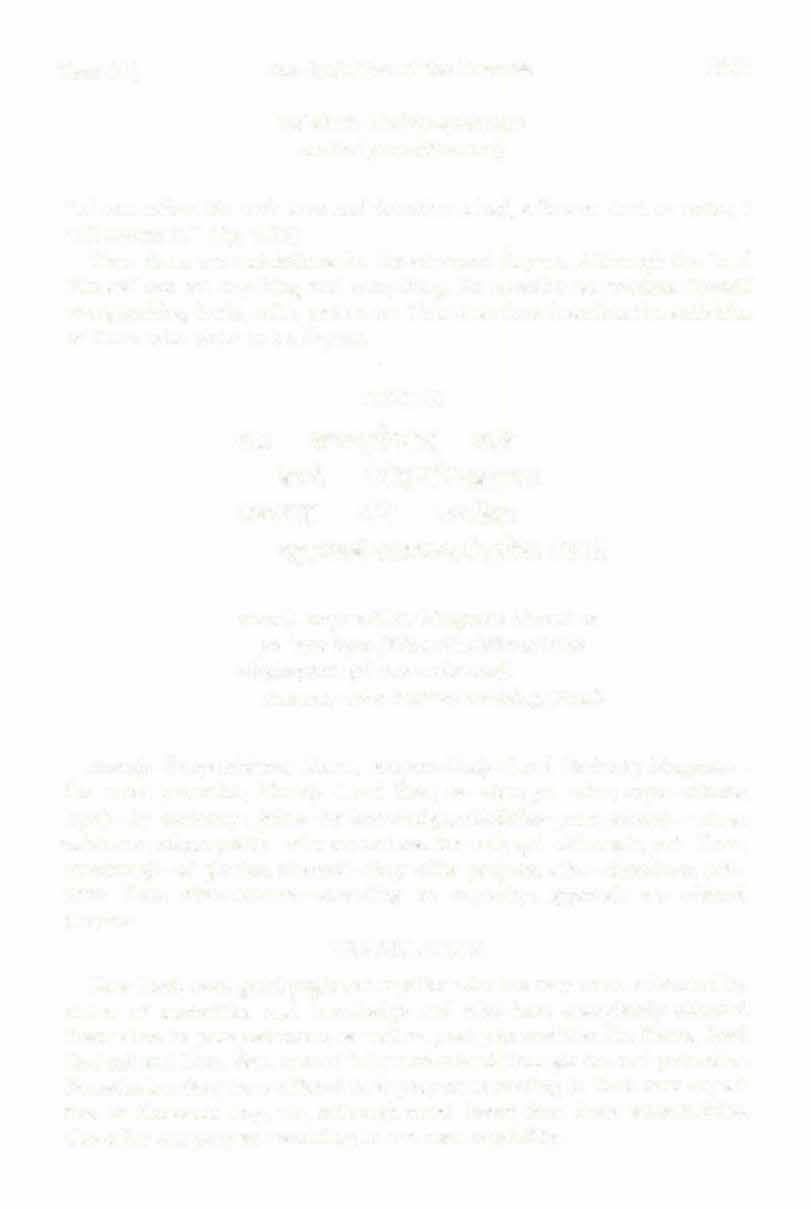
manu[!-Svayambhuva Manu; svayam-bhU�-Lord Brahma; bhagaviinthe most powerful; bhava[!-Lord Siva; ca-also; ye-who; anye-others; tapa[!-by austerity; jiiiina-by knowledge; vi�uddha-pure; sattvii[!-whose existence; adr,s,ta-piirii[!-who cannot see the end; api-although; yat- Your; mahimna[!-of glories; stuvanti-they offer prayers; atho-therefore; tvaunto You; atma-samam-according to capacity; grrimaft-we offered prayers.
TRANSLATION
Dear Lord, even great yogis and mystics who are very much advanced by virtue of austerities and knowledge and who have completely situated themselves in pure existence, as well as great personalities like Manu, Lord Brahma and Lord Siva, cannot fully understand Your glories and potencies. Nonetheless they have offered their prayers according to their own capacities. In the same way, we, although much lower than these personalities, also offer our prayers according to our own capability.
Text41) The
tad aharh bhakty-upahrtam asniimi prayatiitmana� 1541
Activities of the Pracetas
<:' �: �Pl��ql� �� �� ���;rr��;n: I 3R!'tRT 3TN �w: ����COSmfij��oftq: II\l �II
TEXT41
Lord Brahma, Lord Siva, Manu (the father of mankind), great saintly persons and also great sages who have elevated themselves to the transcendental platform through austerities and penance, as well as devotional service, are imperfect in knowledge compared to the Supreme Personality of Godhead. This is the case with anyone within this material world. No one can be equal to the Supreme Lord in anything, certainly not in knowledge. Consequently anyone's prayer to the Supreme Personality of Godhead is never complete. It is not possible to measure the complete glories of the Supreme Lord, who is unlimited. Even the Lord Himself in His incarnation as Ananta or Se�a cannot describe His own glories. Although Ananta has many thousands of faces and has been glorifying the Lord for many, many years, He could not find the limit of the glories of the Lord. Thus it is not possible to estimate the complete potencies and glories of the Supreme Lord.
Nonetheless, everyone in devotional service can offer essential prayers to the Lord. Everyone is situated in a relative position, and no one is
fect in glorifying the Lord. Beginning with Lord Brahma and Lord Siva down to ourselves, everyone is the servant of the Supreme Lord. We are all situated in relative positions according to our own karma. Yet every one of us can offer prayers with heart and soul as far as we can appreciate the Lord's glories. That is our perfection. Even when one is in the darkest region of existence, he is allowed to offer prayers to the Lord according to his own capacity. The Lord therefore says in Bhagavad-gttii:
miim hi piirtha vyapiisritya

ye 'pi syuft piipa-yonayaft
striyo vaiSyiis tathii siidriis
te 'pi yiinti pariim gatim
"0 son of Prtha, those who take shelter in Me, though they be of lower birth-woman, vaisyas [merchants], as well as siidras [workers]-can approach the supreme destination." (Bg. 9.32)
If one seriously accepts the lotus feet of the Lord, he is purified by the grace of the Lord and by the grace of the Lord's servant. This is confirmed by Sukadeva Gosvami: ye 'nye ca piipii yad apasrayiisraya� sudhyanti tasmai prabhavip;wve namaft (Bhiig. 2.4.18). One who is brought under the lotus feet of the Lord by the endeavor of the Lord's servant, the spiritual master, is certainly immediately purified, however lowborn he may be. He becomes eligible to return home, back to Godhead.
1542 Srimad-Bhagavatam [ Canto 4, Ch_ 30
PURPORT
J?er
Text42] The Activities of the Pracetas

TEXT42
wtfl: ijlfl1f
namafl samiiya suddhiiya
puru.siiya pariiya ca viisudeviiya sattviiya
tubhyarh bhagavate nama[l
namafl- we offer our respectful obeisances; samiiya-who is equal to everyone; suddhiiya-who is never contaminated by sinful activities; puru.siiya- unto the Supreme Person; pariiya-transcendental; ca-also; viisudeviiya- living everywhere; sattviiya-who is in the transcendental position; tubhyam-unto You; bhagavate-the Supreme Personality of Godhead; namafl- obeisances.
TRANSLATION
Dear Lord, You have no enemies or friends. Therefore You are equal to everyone. You cannot he contaminated by sinful activities, and Your transcendental form is always beyond the material creation. You are the Supreme Personality of Godhead because You remain everywhere within all existence. You are consequently known as Vasudeva. We offer You our respectful obeisances.
PURPORT
The Supreme Personality of Godhead is known as Vasudevabecause He lives everywhere. The word vas means "to live." As stated in Brahmasarhhitii, eko 'py asau racayiturh jagad-ar�a-ko.tim: the Lord, through His plenary portion, enters into each and every universeto create the material manifestation. He also enters into each and every heart in all living entities and into each and every atom also (paramaru-cayiintara-stham). Because the Supreme Lord lives everywhere, He is known as Vasudeva. Although He lives everywhere within the material world, He is not contaminated by the modes of nature. The Lord is therefore described in lsopan(sad as apiipa-viddham. He is never contaminated bythe modes of material nature. When the Lord descends on this planet, He acts in many ways. He kills demons and performs acts not sanctioned by the Vedic principles, that is, acts considered sinful. Even though He acts in such a way, He is never contaminated by His action. He is therefore described herein as suddha,
��Pi
���
��
�"fFf � � I
��r:r
� ;pt: ����II
1543
meaning always free from contamination. The Lord is also sama, equal to everyone. In this regard, He states in Bhagavad-gitii:
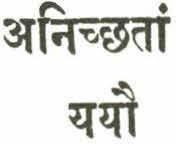
samo 'ham saroa-bhute�u na me dve,syo 'sti na priyaft ye bhajanti tu mlirh bhaktyii mayi te te§u ciipy aham
"I envy no one, nor am I partial to anyone. I am equal to all. But whoever renders service unto Me in devotion is a friend, is in Me, and I am also a friend to him." (Bg. 9.29) The Lord has no one as His friend or enemy, and He is equal to everyone.
The word sattviiya indicates that the form of the Lord is not material. It is sac-cid-iinanda-vigraha. lsvaraft paramaft kr.sraft sac-cid-iinanda-vigrahaft. His body is different from our material bodies. One should not think that the Supreme Personality of Godhead has a material body like ours.
maitreya uviica iti pracetobhir abh�.tuto harif!. pritas tathety iiha sararya-vatsalaft
anicchatiirh yiinam at,rpta-cak.sufliirh
yayau sva-dhamiinapavarga-virya[l
maitreyafl uviica- Maitreya said; iti-thus; pracetobh*-by the Pracetas; abhi,s,tutaft-being praised; har*- the Supreme Personality of Godhead; pritaft-being pleased; tathii-so; iti-thus; iiha-said; sararya-to the surrendered souls; vatsalafl,- affectionate ; anicchatiim-not desiring; yiinamHis departure; atrpta-not satisfied; cakfiu . slim-their eyes; yayau-He left; sva-dhiima-to His own abode; anapavarga-vii'yaft-whose prowess is never defeated.

1544 Srimad-Bhagavatam [Canto4,Ch.30
il�q� rl'� ��"'lW�fllgm m: �� �{OtFI«10: I ��� ��rt: ������
TEXT43
The great sage Maitreya continued: My dear Vidura, the Supreme Personality of Godhead, who is the protector of surrendered souls, being thus addressed by the Pracetas and worshiped by them, replied, "May whatever You have prayed for be fulfilled." After saying this, the Supreme Personality of Godhead, whose prowess is never defeated, left. The Pracetas were unwilling to be separated from Him because they had not seen Him totheir full satisfaction.
PURPORT
The word anapavarga-virya is significant in this verse. The word ana means "without," pavarga means "the materialistic way of life," and virya means "prowess." The prowess of the Supreme Personality of Godhead always contains six basic opulences, one of which is renunciation. Although the Pracetas desired to see the Lord to their full satisfaction, the Lordnonethelessleft_According to Srila Jiva Gosvami, this is an exhibition of His kindness to innumerable other devotees. Although He was being attracted by the Pracetas, He left. This is an example of His renunciation. This renunciation was also exhibited by Lord Caitanya Mahaprabhu when He stayed with Advaita Prabhu after taking sannyasa. All the devotees there wanted Him to stay a few days longer, but Lord Caitanya left without hesitation. The conclusion is that although the Supreme Lord has unlimited kindness for His devotees, He is not attached to anyone. He is equally kind to Hisinnumerabledevotees all over the creation.


atha niryiiya saliliit pracetasa udanvataf!
vik.syiikupyan dmmaiS channam gam giim roddhum ivocchritai{l
atka-thereafter; niryaya- after coming out; saliliit-from the water; pracetasaf!-all the Pracetas; udanvata[!-of the sea; vik .sya-havingobserved; akupyan- became very angry; dmmaif! -bytrees; channam- covered; giim-
Text 44] TheActivities of thePracetas 1545
TRANSLATION
the world; gam-the heavenly planets; roddhum-to obstruct; iva-as if; ucchritai[t-very tall.
TRANSLATION
Thereafter all the Pracetiis emerged from the waters of the sea. They then saw that all the trees on land had grown very tall as if to obstruct thepath of the heavenlyplanets. These trees had covered the entire surface of the world. At this time the Pracetiis became very angry.
PURPORT

King Pracinabarhi�at left his kingdom before his sons arrived after their execution of penance and austerity. The sons, the Pracetiis, were ordered by the Supreme Personality of Godhead to come out of the water and go to the kingdom of their father in order to take care of that kingdom. However, when they came out, they saw that everything had been neglected due to the King's absence. They first observed that foodgrains were not being produced and that there were no agricultural activities. Indeed, the surface of the world was practically covered by very tall trees. It seemed as though the trees were determined to stop people from going into outer space to reach the heavenly kingdoms. The Pracetas becamevery angry when they saw the surface of the globe covered in this way. They desired that the land be cleared for crops.
It is not a fact thatjungles and trees attract clouds and rain, because we find rainfall over the sea. Human beings can inhabit any place on the surface of the earth by clearing jungles and converting land for agricultural purposes. People can keep cows, and all economic problems can be solved in that way. One need only work to produce grains and take care of the cows. The woodfound in thejungles maybe used for constructing cottages. In this way the economic problem of humanity can be solved. At the present moment there are many vacant lands throughout the world, and if they are properly utilized, there will be no scarcity of food. As far as rain is concerned, it is the performance of yajna that attracts rain. As stated in Bhagavad-gitii:
anniid bhavanti bhiitiini
parjanyiid anna-sambhava�
yajiiiid bhavati parjanyo
yajiia� karma-samudbhava�
"All living bodies subsist on food grains, which are produced from rains. Rains are produced by performance of yajiia [sacrifice], and yajna is born of prescribed duties." (Bg. 3.14)
By performing sacrifice, man will have sufficient rainfall and crops.
1546 Srimad-Bhagavatam [Canto 4, Ch. 30
Text46] The Activities of the Pracetas
TEXT 45
�sfu'tt(im �ij��ijl �q'T 1 lfif ��(i'=i �� �� �;n�� ll'd�ll
tato 'gni-marutau rajann amuncan mukhato ru.sa mahtm nirvtrudham kartum samvartaka ivatyaye
tata�- thereafter; agni-fire; marutau- and air; rajan-0 King; amuncanthey emitted; mukhata[l-from their mouths; ru§a-out of anger; mahtmthe earth; nirvtrudham- treeless; kartum- to make; samvartaka[l- the fire of devastation; iva-like; atyaye-at the time of devastation.


TRANSLATION
My dear King, at the time of devastation, Lord Siva emits fire and air from his mouth out of anger. To make the surface of the earth completely treeless, the Pracetas also emitted fire and air from their mouths.
PURPORT
In this verse Vidura is addressed as rajan, which means "0 King." In this regard, Srila Vi8vanatha Cakravarti Thakura comments that a dhtra never becomes angry because he is always situated in devotional service. Advanced devotees can control their senses; therefore a devotee can be addressed as rajan. A king controls and rules in various ways amongst citizens; similarly, one who can control his senses is the king of his senses. He is a svamt or gosvamt. The svamts and gosvamts are therefore sometimes addressed as maharaja, or king.

3llml:�l'i�l'it«
bhasmasat kriyama[larhs tan druman vtk;5ya pita-maha[l iigata[l samayam asa putran barhi_smato nayai[l
1547
TEXT46 ��tuti�r.=�'il't.tr�""tlfirmtt&: 1 "' �
�'{ ;p;r: ����II
bhasmasat-into ashes; kriyamii[tiin-being made; tan-all of them; drumlin-the trees;vik.sya-seeing;pita-maha�-Lord Brahma;agata�-came there; samayam lisa-pacified; putran-the sons; barhi§mata�-of King Barhit>miin;nayai[l.-by logic.
TRANSLATION
After seeing that all the trees on the surface of the earth were being turned to ashes, Lord Brahma immediately came to the sons of King Bar�man and pacified them with words and logic.
PURPORT
Whenever there is some uncommon occurrence on any planet, Lord Brahma, being in charge of the whole universe, immediately comes to control the situation. Lord Brahmaalso came when Hira.r;1yakasipu underwent severe penances and austerities and made the whole universe tremble. A responsible man in any establishment is always alert to keep peace and harmony within the establishment. Similarly, Lord Brahma is also allowed to keep peace and harmony within this universe. He consequently pacified the sons of King Barhi�manwith good logic.
TEXT 47
tatriivas(spi ye vrk.sii
bhitii duhitararh tada
ujjahrus te pracetobhya
upadi§.ta[t svayambhuva

tatra-there; avasi§.taJ:t-remaining; ye-which; vrk�a[t-trees; bhtta[tbeing afraid; duhitaram-their daughter; tada-at that time; ujjahru�delivered; te-they; pracetobhyafr-unto the Pracetas; upadi§.tii[t-being advised;svayam-bhuva-by Lord Brahma.
TRANSLATION
Theremainingtrees,beingverymuchafraidof thePracetas, immediately delivered their daughterat theadvice of Lord Brahma.

1548 Srimad-Bhagavatam [Canto 4, Ch. 30
The daughter of the trees is referred to in text thirteen of this chapter. This daughter was born of Kal)�U and Pramlocii. The society girl Pramloca, after giving birth to the child, immediately left for the heavenly kingdom. While the child was crying, the King of the moon took compassion upon her and saved her by putting his finger into her mouth. This child was cared for by the trees, and when she grew up, by the order of Lord Brahma, she was delivered to the Pracetiis as their wife. The name of the girl was Miiri�a, as the next verse will explain. It was the predominating deity of the trees that delivered the daughter. In this connection Srila )iva Gosvami Prabhupiida states, vrk.siift tad-adhi,s.thiitr-devatiift: "The 'trees' means the controlling deity of those trees." In Vedic literatures we find that there is a controlling deity of the water; similarly, there is a controlling deity of the trees. The Pracetas were engaged in burning all the trees to ashes, and they considered the trees their enemies. To pacify the Pracetas, the predominating deity of the trees, under the advice of Lord Brahma, delivered the daughter Miiri�a.
TEXT 48

I
�t it«:i4iji�la>ill;:qill�ttlf.till: 11\l� II
te ca brahmar-a iidesiin miir¥iim upayemire
yasyiim mahad-avajniiniid ajany ajana-yonijaft
te-all the Pracetas; ca-also; brahmar-a/1- -of Lord Brahma; iidesiit-by the order; mari,siim-Mari:;;a; upayemire-married; yasyam- inwhom; mahat -to a great personality; avajfianat- on account of disrespect; ajani-took birth; ajana-yoni-jaf!-the son of Lord Brahma, Dalq>a.
TRANSLATION
Following the order of Lord Brahma, all the Pracetas accepted the girl as their wife. From the womb of this girl, the son of Lord Brahma named Dalq;a took birth. Dalq;a had to take birth in the womb of Ma�a due to his disobeying and disrespecting Lord Mahadeva [Siva] . Consequently he had to give up his body twice.
Text 48) The Activities of the Pracetas 1549
PURPORT
3Tl�mt=I{Tf��fi{�
� � ;mOT
PURPORT
In this connection the word mahad-avajnanat is significant. King Dak�a was the son of Lord Brahma; therefore in a previous birth he was a brahmarw, but because of his behaving like a non- brahmara (abrahmara) by insulting or disrespecting Lord Mahadeva, he had to take birth within the semen of a k.satriya. That is to say, he became the son of the Pracetas. Not onlythat, but because of his disrespecting Lord Siva, he had to undergo the tribulation of taking birth within the womb of a woman. In the Da�a-yajiia arena, he was once killed by Lord Siva's servant, Virabhadra. Because that was not sufficient, he again took birth in the womb of Mari�a. At the end of the Da�a-ya iia and the disastrous incidents there, Dak�a offered his prayer to Lord Siva. Although he had to give up his body and take birth in the womb of a woman impregnated by the semen of a k.satriya, he nonetheless received all opulence by the grace of Lord Siva. These are the subtle laws of material nature. Unfortunately, people in this modern age do not know how these laws are working. Having no knowledge of the eternity of the spirit soul and its transmigration, the population of the present age is in the greatest ignorance. Because of this, it is said inBhiigavatam: manda� sumanda-matayo manda-bhiigya hy upadruta� (Bhiig. l.l.lO). The total population in this age of Kali-yuga is very bad, lazy, unfortunate and disturbed by material conditions.



cak.su.se tv antare prapte priik-sarge kala-vidrute ya� sasarja praja ift.ta� sa dak.so daiva-codita�
cak.su.se-namedCak�u�a;tu-but; antare-the manvantara; prapte-when it happened;prak-previous;surge-creation;kala-vidrute-destroyed in due course of time; yaft-one who; sasarja-created; praja�-living entities; ift.taft-desirable; sa�-he;dak.sa�-Da�a; daiva-bythe Supreme Personality of Godhead; coditaft-inspired.
1550 Srimad-Bhagavatam [Canto 4, Ch_ 30
��I
� �� �: � � �i!(::citR<t: ������
TEXT49 ���3Wmif
�:
His previous body had been destroyed, but he, the same Dalq!a, inspired by the supreme will, created all the desired living entities in the Cakj!u!!a manvantara.
PURPORT
As stated in Bhagavad-gita:
sahasra-yuga-paryantam ahar yad brahmarw vidu�
ratrirh yuga-sahasrantam te 'ho-ratra-vido jana�
"By human calculation, a thousand ages taken together is the duration of Brahma's one day. And such also is the duration of his night." (Bg. 8.17)
Brahma's one day consists of one thousand cycles of the four yugasSatya, Treta, Dvapara and Kali. In that one day there are fourteen manvantaras, and out of these manvantaras this Calqm�a manvantara is the sixth. The various Manus existing in one day of Lord Brahma are as follows: (1) Svayambhuva (2) Svaroci�a (3) Uttama (4) Tamasa (5) Raivata (6) Cak�u�a (7) Vaivasvata (8) SavarQ.i (9) Dak�a-savarQ.i (10) BrahmasavarQ.i (ll) Dharma-siivarQ.i (12) Rudra-savarQ.i (13) Deva-savarQ.i and (14) Indra-savarQ.i.
Thus there are fourteen Manus in one day of Brahma. In a year there are 5,040 Manus. Brahma has to live for one hundred years; consequently the total of Manus appearing and disappearing during the life of one Brahma is 504,000. This is the calculation for one universe, and there are innumerable universes. All these Manus come and go simply by the breathing process of Maha-Vi�I).U. As stated in the Brahma-sarhhita:

yasyaika-ni.Svasita-kalam athiivalambya
jivanti loma-vilajii jagad-a[tfla-niithii{t
vi;;[tur mahan sa iha yasya kala-vi.Se.so
govindam adi-puru.sarh tam aharh bhajiimi
The word jagad-ar-fla-natha means Lord Brahma. There are innumerable jagad-a[tfla-natha Brahmas, and thus we can calculate the many Manus. The present age is under the control of Vaivasvata Manu. Each Manu lives 4,320,000 years multiplied by 71. The present Manu has already lived for 4,320,000 years multiplied by 28. All these long lifespans are ultimately ended bythe laws ofmaterial nature. The controversy of Dak�a-yajiia took
Text 49) The Activities of the Pracetas 1551
TRANSLATION
place in the Svayambhuva manvantara period. As a result, Da�a was punishedby Lord Siva, butbyvirtueof his prayers to Lord Siva he became eligible to regain his former opulence. According to Visvanatha Cakravarti Thakura, Dak�a underwent severe penances up to the fifth manvantara. Thus at the beginning of the sixth manvantara, known as the Cak�u�a manvantara, Dak�a regained his former opulence by the blessings of Lord Siva.
TEXTS 50-51
tit \itt�+nwt: �� "' 1
yo jiiyamiinafl sarve.siim tejas tejasviniim rucii svayopiidatta diik.syiic ca karmariim dak.sam abruvan
tam prajii-sarga-rak.siiyiim aniidir abhi�icya ca yuyoja yuyuje 'nyiims ca sa vai sarva-prajii-patin
ya[!,-one who; jiiyamana[!,-just after his birth; sarve.sam-of all; teja[!,the brilliance; tejasvinam-brilliant; ruca-by effulgence; svaya-his; upiidatta-covered; diik�yiit-from being expert; ca-and; karmaram-in fruitive activities; dak.sam-Dak!'a; abruvan-was called; tam-him ; prajliliving beings; sarga-generating; rak�ayam-in the matter of maintaining; aniidi[l,-the firstborn, Lord Brahmii.; abhifticya-having appointed; ca-also; yuy oja-engaged; yuyuje- engaged; anyiin-others; ca-and; safl-he; vaicertainly; sarva-all; prajii-patin- progenitors of living entities.

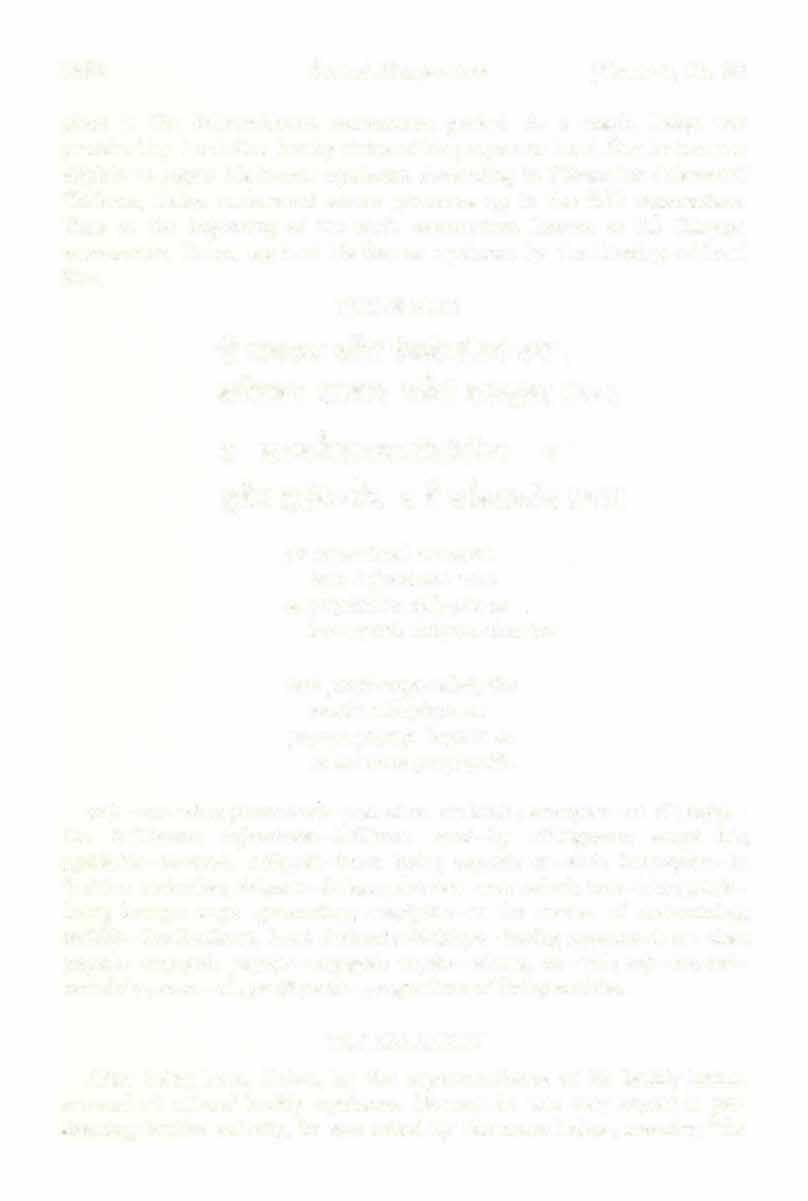
TRANSLATION
After being born, D�a, by the superexcellence of his bodily luster, covered all others' bodily opulence. Because he was very expert in performing fruitive activity, he was called by the name Da�a, meaning "the
1552 Srimad-Bhagavatam [Canto 4, Ch. 30
��
(C(4NIC(� �trN.
ll�oll
� 31\itle•i<�l�lq;f�� � I ���s�t� «�«4'st\itlqffiwtII��II
very expert." Lord Brahma therefore engaged Da�a in the work of generating living entities and maintaining them. In due course of time, Da�a also engaged other prajapatis [progenitors] in the process of generation and maintenance.
PURPORT

Da�a became almost as powerful as Lord Brahma. Consequently Lord Brahma engaged him in generating population. Da�a was very influential and opulent. In his own turn, Dak!)a engaged other prajiipatis, headed by Marici. In this way the population of the universe increased.
Thus end the Bhaktivedanta purports of the Fourth Canto, Thirtieth Chapter of the Srimad-Bhagavatam, entitled "The Activities of the Pracetiis."
Texts 50-51] The Activities of the Pracetas 1553
CHAPTER THIRTY-ONE

Narada Instructs the Pracetas
maitreya uviica tata utpanna-vijiiiinii
ii.Sv adhok.saja-bhii.sitam
smaranta iitmaje bhiirylirh
vis.rjya priivrajan g!hiit
maitreya[1 uvaca-Maitreya said; tata�-thereafter; utpanna-developed; vijiiiinii�-possessing perfect knowledge;iisu-very soon; adhok.saja-by the Supreme Personality of Godhead; bhii.sitam-what was enunciated; smaranta�-remembering; iitma-je-unto their son; bha:ryiim-their wife; vis_rjya- after giving; priivrajan- left; grhiit- from home.
TRANSLATION
The great saint Maitreya continued: After that, the Pracetas lived at home for thousands of years and developed perfect knowledge in spiritual consciousness. At last they remembered the blessings of the Supreme Personality of Godhead and left home, putting their wife in charge of a perfect son.
PURPORT
After the Pracetas had finished their penances, they were blessed by the Supreme Personality of Godhead. The Lord blessed them by telling them
....... "ll5f11 i3<(f"i1 mf ��� 3TT��firn'J_ I �..ij���smf��ll �II
TEXT I
1555
that after finishing their family life they would return home, back to Godhead, in due course of time. After finishing their family life, which lasted thousands of years according to the calculations of the demigods, the Pracetas decided to leave home, putting their wife in the charge of a son named Dak�a. This is the process of Vedic civilization. In the beginning of life, as a brahmacart, one has to undergo severe penances and austerities in order to be educated in spiritual values. The brahmaciiri is never allowed to mingle with women and is thus kept from learning about sex enjoyment. The basic flaw in modern civilization is that boys and girls are given freedom during school and college to enjoy sex life. Most of the children are varra-sankara, meaning born of undesirable fathers and mothers. Consequently the whole world is in chaos. Actually human civilization should be based on the Vedic principles. This means that in the beginning of life boys and girls should undergo penances and austerities. When they are grown, they should get married, live for some time at home and beget children. Whenthechildren are grown up, the man should leave home and search for Kr�va consciousness. In this way one can make one's life perfect by going home to the kingdom of God.

Unless one practices penances and austerities in his student life, he cannot understand the existence of God. Without realizing Kr�va, one cannot make his life perfect. The conclusion is that when the children are grown, the wife should be put in the children's charge. The husband may then leave home to develop Kr�va consciousness. Everything depends on the development of mature knowledge. King Pracinabarhi�at, the father of the Pracetas, left home before the arrival of his sons, who were engaged in austerity within the water. As soon as the time is ripe, or as soon as one has developed perfect Kr�va consciousness, he should leave home, even though all his duties may not be fulfilled. Pracinabarhi�atwas waiting for the arrival of his sons, but, following the instructions of Narada, as soon as his intelligence was properly developed, he simply left instructions for his ministers to impart to his sons. Thus without waiting for their arrival, he left home.
Giving up a comfortable home life is absolutely necessary for human beings and is advised by Prahlada Maharaja. Hitviitma-piitarh grham andhakiipam: To finish the materialistic way of life, one should leave his so-called comfortable home life, which is simply a means for killing the soul (iitmapiitam ). The home is considered to he a dark well covered by grass, and if one falls within this well, he simply dies without anyone's caring. One should therefore not he too much attached to family life, for it will spoil one's development of Kr�va consciousness.
1556 Srimad-Bhagavatam [Canto 4, Ch. 31
dikfiita brahma-satrerw
saroa-bhutatma-medhasa praticyarh disi velayarh
siddho 'bhud yatra jajal*
dik,sitiifl-being determined; brahma-satre[la- by understanding of the Supreme Spirit; saroa-all; bhilta- living entities; iitma-medhasa- considering as one's self; praticyiim- in the western; diSi-direction; veliiyamon the seashore; siddhaft- perfect; abhut- became; yatra- where; jiijal*the great sage Jajali.

TRANSLATION
The Pracetiis went to the seashore in the west where the great liberated sage Jajali was residing. After perfecting the spiritual knowledge by which one becomes equal to all living entities, the Pracetiis became perfect in Kr�t;ta consciousness.
PURPORT

The word brahma-satra means cultivation of spiritual knowledge. Actually both the Vedas and severe austerity are known as brahma. Vedas tattvarh tapo brahma. Brahma also means the Absolute Truth. One has to cultivate knowledge of the Absolute Truth by pursuing studies in the Vedas and undergoing severe austerities and penances. The Pracetas properly executed this function and consequently became equal to all other living entities. As Bhagavad-gitii confirms:
brahma-bhutaft prasanniitmii na socati na kiink,sati
samaft saroe.su bhute.su
mad-bhaktirh labhate pariim
"One who is thus transcendentally situated at once realizes the Supreme Brahman. He never laments nor desires to have anything; he is equally disposed to every living entity. In that state he attains pure devotional service unto Me." (Bg. 18.54)
When one actually becomes spiritually advanced, he does not see the
Text 2] Nirada Instructs
the Pracetas
1557
difference between one living entity and another. This platform is attained by determination. When perfect knowledge is expanded, one ceases to see the outward covering of the living entity. He sees, rather, the spirit soul within the body. Thus he does not make distinctions between a human being and an animal, a learned briihmarw and a ca7J{Jiila.
vidyii-vinaya-sampanne
briihmare gavi hastini
suni caiva svapiike ca par!Iitii{! sama-darsina{z
"The humble sage, by virtue of true knowledge, sees with equal vision a learned and gentle briihmara, a cow, an elephant, a dog and a dog-eater [outcaste] ." (Bg. 5.18)
A learned person sees everyone equally on a spiritual basis, and a learned person, a devotee, wants to see everyone developed in Kr�J]a consciousness. The place where the Pracetas were residing was perfect for executing spiritual activities, for it is indicated that the great sage Jajali attained mukti (liberation) there. One desiring perfection or liberation should associate with a person who is already liberated. This is called siidhu-sa�iga, associating with a perfect devotee.
TEXT 3

61NM6stiOI'i"'ltt�'lit
M6R1'11{�'{A� I
W+t� ;mfUT �W1�w:+t'1:
Wl�l�� � �: II �II
tiin nirjita-priira-mano-vaco-drso jitiisaniin siinta-samiina-vigrahiin pare 'male brahma[li yojitiitmana{t suriisure!lyo dadrse sma niirada{t
tiin-all of them; nirjita- completely controlled; prii[la- the life air (by the prii[liiyiima process); mana{t- mind; vaca{t- words; drsalz - and vision; jita-iisaniin- who conquered the yogic iisana, or sitting posture; santapacified; samiina- straight; vigrahiin- whose bodies; pare- transcendental; amale-free from all material contamination; brahmari-in the Supreme; yojita-engaged; iitmanalz-whose minds;sura-asura-iflyalz-worshiped by
1558 Srimad-Bhagavatam [Canto 4, Ch. 31
the demons and by the demigods; dadrse-saw; sma-in the past; niiradafzthe great sage Narada.
TRANSLATION
After practicing the yogasana for mystic yoga, the Pracetas managed to control their life air, mind, words and external vision. Thus by the prfu).ayama process they were completely relieved of material attachment. By remaining perpendicular, they could concentrate their minds on the uppermost Brahman. While they were practicing this prfu).ayama, the great sage Narada, who is worshiped both by demons and by demigods, came to see them.
PURPORT
In this verse the words pare amale are significant. The realization of Brahman is explained in Srimad-Bhiigavatam. The Absolute Truth is realized in three phases-impersonal effulgence (Brahman), localized Paramatma and the Supreme Personality of Godhead, Bhagavan. In his prayers, LordSivaconcentrateduponthe personalfeatures of Parabrahman, described in personal terms as snigdha-priivrr;l-ghana-syiimam (Bhiig. 4.24.45). Following the instructions of Lord Siva, the Pracetas also concentrated their minds on the Syamasundara form of the Supreme Brahman. Although impersonal Brahman, Paramatma Brahman and Brahman as the Supreme Person are all on the same transcendental platform, the personal feature of the Supreme Brahman is the ultimate goal and last word in transcendence.
The great sage Narada travels everywhere. He goes to the demons and the demigods and is equally respected. He is consequently described herein as suriisure1ya, worshiped both by demons and by demigods. For Niirada Muni, the door of every house is open. Although there is perpetual animosity between the demons and demigods, Narada Muni is welcomed everywhere. Narada is considered one ofthe demigods, of course, and the word devar_si means "the saintly person among the demigods." Not even the demons envy Narada Muni; therefore he is equally worshiped both by demons and by demigods. A perfect V ai�t;�.ava's position should be just like Narada Muni's, completely independent and unbiased.

Text4] Narada Instructs the Pracetiis 1559
TEXT4 � ij � stfUiq€41Riwta.� � I '@f� � {\(<41�'1¥Cqi?JCf.{ll � ll
Srimad-Bhagavatam
tam agatarh ta utthaya
pra[1ipatyiibhinandya ca pujayitvii yathiide�arh sukhiisinam athiibruvan
tam-to him; agatam- appeared; te-all the Pracetiis; utthiiya-after gettingup ;pra[1ipatya- offering obeisances; abhinandya- offering welcome; ca- also; pujayitVI1-worshiping; yathii ade�am-according to regulative principles; sukha-asinam- comfortably situated; atha-thus; abruvan-they said.
TRANSLATION
As soon as the Pracetas saw that the great sage Narada had appeared, they immediately got up even from their asanas. As required, they immediately offered obeisances and worshiped him, and when they saw that Narada Muni was properly seated, they began to ask him questions.
PURPORT
It is significant that all the Pracetas were engaged in practicing yoga to concentrate their minds on the Supreme Personality of Godhead.
TEXTS
'Sl�mi �:
�ij�str�;ft��: I
(R :qe�'ftJi �� � �: II � II ...
pracetasa ucu�
sviigatarh te surar�e 'dya difl.tyii no darsanarh gata�
tava cankrama[1arh brahmann abhayiiya yathii rave�
pracetasafl. ucufl.-the Pracetiis said; su-agatam-welcome; te-unto you; sura-r.se-0 sage among the demigods; adya- today; difl_tya-by good fortune; nafl.-of us; darsanam-audience; gatafl.- you have come; tava-your; cankrama[1am-movements; brahman-0 great briihma[1a; abhayaya - for fearlessness; yatha-as; ravefl.-of the sun.
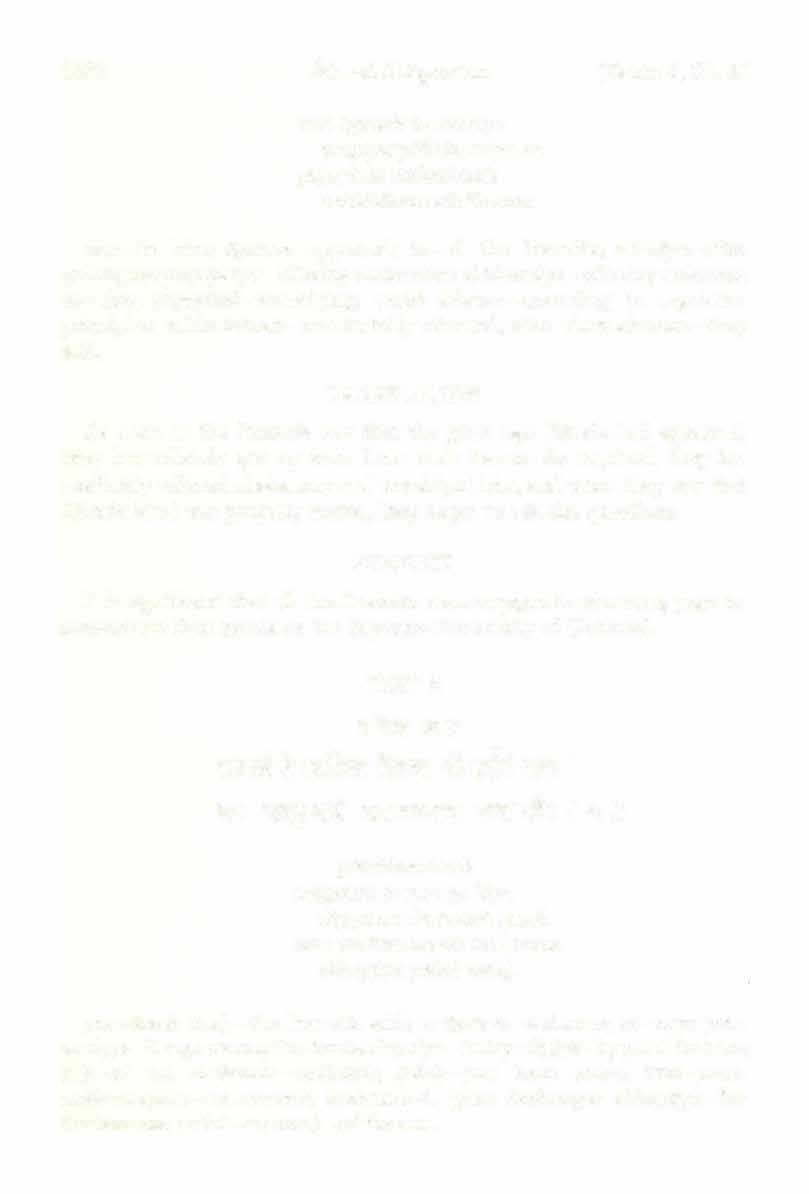
1560
[Canto 4, Ch. 31
All the Pracetlis began to address the great sage Narada: 0 great sage, 0 brahmar;ta, we hope you met with no disturbances while coming here. It is due to our great fortune that we are now able to see you. By the traveling of the sun, people are relieved from the fear of the darkness of night-a fear brought about by thieves and rogues. Similarly, your traveling is like the sun's, for you drive away all kinds of fear.
PURPORT
Because of the night's darkness, everyone is afraid of rogues and thieves, especially in great cities. People are often afraid to go out on the streets, and we understand that even in a great city like New York people do not like to go out at night. More or less, when it is night, everyone is afraid, either in the city or in the village. However, as soon as the sun rises, everyone is relieved. Similarly, this material world is dark by nature. Everyone is afraid of danger at every moment, but when one sees a devotee like Narada, all fear is relieved. Just as the sun disperses darkness, the appearance of a great sage like Narada disperses ignorance. When one meets Narada or his representative, a spiritual master, he is freed from all anxiety brought about by ignorance.
TEXT6

�((IK� � r\1�;w114� �I
ij?{ m�;rt 31Fi�: �fut�II ' II yad ad�.tam bhagavata sivenadhokfiajena ca tad g_rhe.su prasaktanam priiyasaft kfiapitarh prabho
yat- what; iid�. tam- was instructed; bhagavata-by the exalted personality; sivena-Lord Siva; adhokfiajena-by Lord Viwu; ca- also; tatthat; grhefiu-to family affairs; prasaktaniim-by us who were too much attached; prayas£0-almost; kfiapitam-forgotten; prabho- 0 master.
TRANSLATION
0 master, may we inform you that because of our being overly attached to family affairs, we almost forgot the instructions we received from Lord Siva and Lord Vi!jit).U.
Text6] Narada Instructs the Pracetas 1561
TRANSLATION
PURPORT
Remaining in family life is a kind of concession for sense enjoyment. One should know that sense enjoyment is not required, but one has to accept sense enjoyment inasmuch as one has to live. As confirmed in Srtmad-Bhiigavatam (1.2.10): kiimasya nendriya-prit*. One has to become a gosviimi and control his senses. One should not simply use his senses for sense gratification; rather, the senses should be employed just as much as required for maintaining body and soul together. Srila Riipa Gosvami recommends: aniisaktasya vi�ayiin yathiirham upayuiijata�. One should not be attached to sense objects but should accept sense enjoyment as much as required,no more. If one wishes to enjoy the senses more than required, he becomes attached to family life, whichmeans bondage. All the Pracetas admitted their fault in remaining in household life.
TEXT7

tan naft pradyotayiidhyiitmajiiiinarh tattviirtha-darsanam
yeniiiijasii tari.syiimo dustararh bhava-siigaram
tat-therefore; na[l,-for us; pradyotaya- kindly awaken; adhyiitmatranscendental;jiiiinam-knowledge; tattva-Absolute Truth; artha-for the purpose of; darsanam-philosophy; yena-by which; aiijasii-easily; tari§yiimaft-wecancrossover; dustaram- formidable ; bhava-siigaram-the ocean of nescience.
TRANS LATION
Dear master, kindly enlighten us in transcendental knowledge, which may act as a torchlight by which we may cross the dark nescience of material existence.
PURPORT
The Pracetas requested Narada to enlighten them in transcendental knowledge. Generally when a common man meets a saintly person, he wishes to get some material benediction. However, the Pracetas were not interested in material benefit, for they had enjoyed all this sufficiently.
1562 Srimad-Bhagavatam [Canto 4, Ch. 31
6IMI+tt � 1(tf�
R: stQl6ql�l�'l$14��I �ill�«l
II \9II
Nor did they want the fulfillment of their material desires. They were simply interested in crossing the ocean of nescience. Everyone should be interested in getting out of these material clutches. Everyone should ap· proach a saintly person in order to be enlightened in this connection. One should not bother a saintly person to get blessings for material enjoyment. Generally householders receive saintly persons to get their blessings, but their real aim is to become happy in the material world. Asking such material benedictions is not recommended in the sastras.
TEXTS
maitreya uvaca iti pracetasarh P!§{O bhagavan narado munifi. bhagavaty uttama-sloka avi.s.tatmabravin nrpan
II� II
maitreya� uvrica-Maitreya said; iti-thus ; pracetasam-by the Pracetas; P!�Ja�-being asked; bhagavtin-thegreatdevotee ofthe Supreme Personality of Godhead; narada�-Narada; mun*-very thoughtful; bhagavati-in the Supreme Personality of Godhead; uttama-sloke-possessing excellent renown; avi�.ta-absorbed; atma-whose mind; abravit- replied; nrpan-to the Kings.
TRANSLATION
The great sage Maitreya continued: My dear Vidura, being thus peti· tioned by the Pracetas, the supreme devotee, Narada, who is always absorbedin thoughtsoftheSupremePersonalityofGodhead, began toreply.
PURPORT
In this verse bhagaviin naradal], indicates thatNarada is always absorbed in thoughts of the Supreme Personality of Godhead. Bhagavaty uttamasloka avif;.tatma. Narada has no other business than thinking of Kn>pa, talking of K19Qa and preaching about Kr�I)a; therefore he is sometimes called bhagavtin. Bhagaviin means "one who possesses all opulences." When a person possesses Bhagavan within his heart, he is also sometimes called

Text8] Narada InstructsthePracetas 1563
��<1� m 3Rc:mt m ll•l'4l"'<aJ uf.l: 1 �•lf4!::�'{· 31tfccet�'{lilit�
bhagavan. Srila Visvanatha Cakravarti 'fhakura said, siik§iid-dharitvena samasta-sastraift: in every siistra the spiritual master is accepted directly as the Supreme PersonalityofGodhead. This does not mean that the spiritual master or a saintly person like Narada has actually become the Supreme Personality of Godhead, but he is accepted in this way because he possesses the Supreme Personality of Godhead within his heart constantly. As described here (iivi§Jiitma), when one is simply absorbed in the thought of Kr�Q.a, he is also called bhagavan. Bhagavan possesses all opulence. If one possesses Bhagavan within his heart always, does he not automatically possess all opulence also? In that sense a great devotee like Narada can be called bhagavan. However, we cannot tolerate when a rascal or imposter is called bhagaviin. One must possess either all opulences or the Supreme Personality of Godhead, Bhagavim, who possesses all opulences.
nt"irada uviica
taj janma tiini karmii[li tad iiyus tan mana vaca[l, nrr-am yena hi viSviitmii sevyate harir isvara[l, niirada[l, uviica- Narada said; tat janma-thatbirth; tiini- those; karmiirifruitive activities; tat-that; iiyuft-span of life; tat-that; manaft- mind; vacaft- words; nrriim- of human beings; yena-by which; hi-certainly; visva-iitmU:-the Supersoul; sevyate-is served; hari{l.-the Supreme Personality of Godhead; isvara[l-the supreme controller.
TRANSLATION
The great sage Narada said: When a living entity is born to engage in the devotional service of the Supreme Personality of Godhead, who is the supreme controller, his birth, all his fruitive activities, his lifespan, his mind and his words are all factually perfect.
PURPORT
In this verse the word nrram is very important. There are many other births besides human birth, but Narada Muni is herein especially speaking

1564 Srimad-Bhagavatam [Canto 4, Ch. 31
on��ffl � mf.r � ij�1�'"'4-it ": 1 WfJif ir.rft R��tt �otffl' 001�: ll � lI
TEXT9
of human birth. Amongst human beings there are different types of men. Of these, those who are advanced in spiritual consciousness or Kr.spa con· sciousness are called Aryans. Amongst Aryans, one who engages in the devotional service of the Lord is most successful in life. The word nr[tiim indicates that lower animals do not engage in the devotional service of the Lord. In perfect human society everyone should engage in the devotional service of the Lord. It does not matter whether one is born poor or rich, black or white. There may be so many material distinctions for one who takes birth in human society, but everyone should engage in the Lord's devotional service. At the present moment civilizednationshave given up God consciousness for economic development. They are actuallyno longer interested in advancing in God consciousness. Formerly their forefathers were engaged in executing religious principles. Whether one is Hindu, Moslem, Buddhist, Jewish or whatever, everyone has some religious insti· tution. Real religion, however, means becoming God conscious. It is par· ticularly mentioned herein that birth is successful if an interest in Kr�J)a consciousness is taken. Activity is successful if it results in serving the Lord. Philosophical speculation or mental speculation is successful when engaged in understanding the Supreme Personality of Godhead. The senses are worth possessing when engaged in the service of the Lord. Actually, devotional service means engaging the senses in the service of the Lord. At the present moment our senses are not purified; therefore our senses are engaged in the service of society, friendship, love, politics, sociology, and so on. However, when the senses are engaged in the service of the Lord, one attains bhakti, or devotional service. In the next verse these matters will be more clearly explained.
When one great devotee of Lord Caitanya Mahaprabhu saw the Lord, he said that all his desires were fulfilled. He said, "Today everything is auspicious. Today my birthplace and neighborhood are completely glorified. Today my senses, from my eyes down to my toes, are fortunate. Today my life is successful because I have been able to see the lotus feet that are worshiped by the goddess of fortune."

Text 10] Narada Instructs the Pracetas 1565
TEXT 10 I*��{ �PrntW':4tttf\t�: I dflMi st�'hn�: �sN� II� oil kim janmabhis tribhir veha saukra-savitra-yiijnikai[l
Srimad-Bhagavatam
karmabhir vii trayi-proktai[t pumso 'pi vibudhiiyu,sii
kim-what is the use; janmabhi�-of births; tribhi[t- three; va-or; ihain this world; saukra- by semina; savitra-by initiation; yajiiikai[t-by becoming a perfect brahmarta; karmabhi�- by activities; va- or; trayt- in the Vedas; proktai[t-instructed; pumsa�-of a human being; api- even; vibudha-of the demigods; ayu�a- with a duration of life.
TRANSLATION
A civilized human being has three kinds of births. The first birth is by a pure father and mother, and this birth is called birth by semina. The next birthtakes place when one is initiated by the spiritual master, and this birth is called savitra. The third birth, called yajiiika, takes place when one is given the opportunity to worship Lord Vi�f.lU. Despite the opportunities for attaining such births, even if one gets the lifespan of a demigod, if one does not actually engage in the service of the Lord, everything is useless. Similarly, one's activities may be mundane or spiritual, but they are useless if they are not meant for satisfying the Lord.
PURPORT
The word saukra-janma means taking birth by seminal discharge. Animals can take their birth in this way too. However, a human being can be reformed from the saukra-janma, as recommendedin the Vedic civilization. Before the birth takes place, or before father and mother unite, there is a ceremony called garbhadhana-samskara, which must be adopted. This garbhiidhiina-samskiira is especially recommended for higher castes, especially the brahmarw caste. It is said in the sastras that if the garbhadhiinasamskiira is not practiced amongst the higher castes, the entire family becomes siidra. It is also stated that in this age of Kali, everyone is sudra due to the absence of the garbhiidhiina-samskiira. This is the Vedic system. According to the piincariitrika system, however, even though everyone is a siidra due to the absence of the garbha dhana-samskiira, if a person has but a little tendency to become Kr�va conscious,he should be given the chance to elevate himself to the transcendental platform of devotional service. Our Kr�va consciousness movement adopts this pancariitrika-vidh� as advised by SrTia Sanatana Gosvami, who says:

1566
[Canto 4, Ch. 31
yatha kancanatam yati kiimsyam rasa-vidhanata�
tathii dik.sii-vidhiinena dvijatvarh jiiyate n[[Liim

"As bell-metal, when mixed with mercury, is transformed to gold, a person, even though not golden pure, can betransformedinto a briihmara or dvija simply by the initiation process." Thus if one is initiated by a proper person, he can be accepted as twice-born immediately. In our Kr�Q.a consciousness movement,we thereforeoffer the studenthis first initiation and allow him to chant the Hare K.f�Q.a mahii-mantra. By chanting the Hare K.f�Q.a mahii-mantra regularly and following the regulative principles, one becomes qualified to be initiated as a briihmara because unless one is a qualified brahmara he cannot be allowed to worship Lord Vi�Q.U. This is called ylijfiika-janma. In our K.f�Q.a consciousness society, unless one is twice initiated-first by chanting Hare Kr�q.a and second by the Gayatri mantra-he is not allowed to enter the kitchen or Deity room to execute duties. However, when one is elevated to the platform on which he can worship the Deity, his previous birth does not matter.
ca[L�tilo 'pi dvija-sre�.tho
hari-bhakti-pariiya[La[t hari-bhakti-vihinas ca dvijo 'pi svapaciidhama{1
"Even if one is born in the family of a Ca[L�tila, if one engages in the devotional service of the Lord, he becomes the best of briihma[LaS. But even a brahma[La who is devoid of devotional service is on the level of the lowest dog-eater."
If a person is advanced in devotional service, it does not matter whether he was born in a car�ala family. He becomes purified. As Sr1 Prahlada Maharaja said:
vipriid dvi�a�-gu[La-yutad aravinda-niibhapadaravinda-vimukhac chvapacarh vari�.tham (Bhiig. 7.9.10)
Even if one is a brahma[La and is qualified with all the brahminical qualifications, he is considered degraded if he is averse to worshiping the Supreme Personality of Godhead. But if a person is attached to the service of the Lord, he becomes glorified even if he is born in a Ca[L�tila family. Indeed, such a ca[L�tila can deliver not only himself but all his family predecessors. Without devotional service, even a proud brahma[La cannot deliver himself, and what to speak of his family. In many instances in the sastras it is seen that even a brahma[La has become a k�atriya, vaisya, siidra, mleccha or non-briihma[La. And there are many instances of one's being
Text 10] Narada Instructs the Pracetas 1567
born a k�atriya or vaisya or even lower, and, in the eighteenth year, attaining elevation to the brahminical platform by the process of initiation. Therefore Narada Muni says:
yasya yal lak�ararh proktarh
purhso varrabhivyanjakam yad anyatrapi drsyeta tat tenaiva vinirdiSet (Bhtig. 7.11.35)
It is not a fact that because one is born in a brahmara family he is automatically a brahmara. He has a better chance to become a brahmara, but unless he meets all the brahminical qualifications, he cannot be accepted as such. On the other hand, if the brahminical qualifications are found in the person of a sudra, he should immediately be accepted as a brahmara. To substantiate thisthereare many quotationsfrom Bhtigavatam, Mahtibhiirata, Bharadvaja-sarhhita and the Paiicaratra, as well as many other scriptures.
As far as the duration of life of the demigods, concerning Lord Brahma it is said:
sahasra-yuga-paryantam ahar yad brahmaro vidu�
riitrirh yuga-sahasriintiirh te 'ho-riitra-vido janii� (Bg. 8.17)

The duration of one day of Brahma is one thousand times greater than the four yugas aggregating to 4,300,000 years. Similarly, Brahma's one night. Brahma lives for one hundred years of such days and nights. The word vibudhiiyu�a indicates that even if one gets a long life span, his life span is useless if he is not a devotee. A living entity is the eternal servitor of the Supreme Lord, and unless he comes to the platform of devotional service, his life span, good birth, glorious activities and everything else are null and void.
srutena tapasa vii kim vacobhiS citta-vrttibhifr buddhyii va kim nipurtaya balenendriya-radhasa
1568 Srimad-Bhagavatam [Canto 4, Ch. 31
��tnft���: I '.:» �tnFfiR�il�i\�(II:Mlll��II
TEXT 11
srutena-by Vedic education; tapasa-by austerities; va-or; kim-what is the meaning; vacobh*-by words; citta-of consciousness; vrttibh*bythe occupations; buddhya-by intelligence; va-or; kim-what is the use; nipu[taya- expert; balena-by bodily strength; indriya-radhasa-by power of the senses.
TRANSLATION
Without devotional service, what is the meaning of severe austerities, the process of hearing, the power of speech, the power of mental speculation, elevated intelligence, strength and the power of the senses?
PURPORT
From the Upani�ads we learn:
nayam atma pravacanena labhyo na medhaya na bahuna srutena yam evaifla V[[I-Ute tena labhyas tasyaifla atma vivrrmte taniim svam
(Mu[tflaka Upaniflad 3.2.3)
Our relationship with the Supreme Lord is never advanced by simple study of the Vedas. There are many Mayavadi sannyasts fully engaged in studying the Vedas, Vedanta-sutra and Upani_sads, but unfortunately they cannot grasp the real essence of knowledge. In other words, they do not knowtheSupremePersonalityof Godhead.What, then,istheuseinstudying all the Vedas, if one cannot grasp the essence of the Vedas, Kg>l).a? The Lord confirms in Bhagavad-gtta, vedaiS ca sarvair aham eva vedya�: "By all the Vedas, I am to be known." (Bg. 15.15)
There are many religious systems wherein penances and austerities are greatly stressed, but at the end no one understands Kr�va, the Supreme Personality of Godhead. There is therefore no point in such penance (tapasya). If one has actually approached the Supreme Personality of Godhead, he does not need to undergo severe austerities. The Supreme Personality of Godhead is understood through the process of devotional service. In the Ninth Chapter of Bhagavad-gtta devotional service is explained as raja-guhyam, the king of all confidential knowledge. There are many good reciters of Vedic literatures, and they recite works such as the Ramaya[ta, Srtmad-Bhiigavatam and Bhagavad-gita. Sometimes these professional readers manifest very good scholarship and exhibit wordjugglery. Unfortunatelytheyare never devotees of the Supreme Lord. Consequently

Text II] Narada Instructs the Pracetas 1569
they cannot impress upon the audience the real essence of knowledge, Krer;ta. There are also many thoughtful writers and creative philosophers, but despite all their learning, if they cannot approach the Supreme Personality of Godhead, they are simply useless mental speculators. There are many sharply intelligent people in this material world, and they discover so many things for sense gratification. They also analytically study all the material elements, but despite their expert knowledge and expert scientific analysis of the whole cosmic manifestation, their endeavors are useless because they cannot understand the Supreme Personality of Godhead.
As far as our senses are concerned, there are many animals, both beasts and birds, who are very expert in exercising their senses more keenly than human beings. For example, vultures or hawks can go very high in the sky but can see a small body on the ground very clearly. This means that their eyesight is so keen that they can find an eatable corpse from a great distance. Certainly their eyesight is much keener than human beings', but this does not mean that their existence is more important than that of a human being. Similarly, dogs can smell many things from a far distance. Many fish can understand by the power of sound that an enemy is coming. All these examples are described in Srimad-Bhiigavatam. If one's senses cannot help him attain the highest perfection of life, realization of the Supreme, they are all useless.
TEXT 12

f* ill tfti\•n:ri�'f�((lf\:qf�p(l(fq I
'* qt�����m: ������
kirh vii yogena siihkhyena nyiisa-sviidhyiiyayor api kirh vii sreyobhir anyais ca na yatriitma-prado har*
kim-what is the use;va-or;yogena-bymystic yoga practice;siihkhyena -by study of Sahkhya philosophy; nyasa-by accepting sannyasa; svadhyayayo[l,-and by study of Vedic literature;api-even; kim-what is the use;va-or;sreyobhi[l,-by auspicious activities;anyai[l,-other;ca-and; na-never; yatra-where; atma-prada[l,-full satisfaction of self; hari[l,-the Supreme Personality of Godhead.
1570 Srimad-Bhagavatam [Canto 4, Ch. 31
Transcendental practices that do not ultimately help one realize the Supreme Personality of Godhead are useless, he they mystic yoga practices, the analytical study of matter, severe austerity, the acceptance of sannyasa, or the study ofVedic literature. All these may he very important aspects of spiritual advancement, hut unless one understands the Supreme Personality of Godhead, Hari, all these processes are useless.
PURPORT
In Caitanya-caritamrta it is said:
bhakti vinii kevala jiiiine 'mukti' niihi haya
bhakti siidhana kare yei 'priipta-brahmalaya' (Cc. Madhya 24.109)

1mpersonalists do not take to devotional service hut take to other practices, such as the analytical study of the material elements, the discrimination between matter and spirit, and the mystic yoga system. These are beneficial only insofar as they are complementary to devotional service. Caitanya Mahaprahhu therefore told Sanatana Gosvami that without a touch of devotional service, jniina, yoga and siihkhya philosophy cannot give one the desired results. The impersonalists wish to merge into the Supreme Brahman; however, merging into the Supreme Brahman also requires a touch of devotionalservice. The Absolute Truth is realized in three phasesimpersonal Brahman, Paramatma and the Supreme Personality of Godhead All these require a touch of devotional service. Sometimes it is actually seen that these Mayavadis alsochant the Hare Krl?.Q.a mahii-mantra, although their motive is to merge into the Brahman effulgence of the Absolute. The yogis also at times take to chanting the Hare Kr�?.Q.a maha-mantra, hut their purpose is different from that of the bhaktas. In all processeskarma, jniina or yoga-bhakti is required. T�at is the purport of this verse.
TEXT 13

Text 13] Narada Instructs the Pracetas 1571
TRANSLATION
sreyasiim api sarve.siim iitmii hy avadhir arthata�
Srimad-Bhagavatam
sarve.siim api bhutiiniirh harir iitmiitmadafl. priya{l


sreyasiim-of auspicious activities; api-certainly; sarve�iim-all; iitmiithe self; hi-certainly; avadhi{l-destination; arthata{l-factually; sarve§limof all; api-certainly; bhiitiiniim-living entities; hari{l-the Supreme Personality of Godhead; iitmii-the Supersoul; iitma-da{l-who can give us our original identity; priya{l-very dear.
TRANSLATION
Factually the Supreme Personality of Godhead is the original source of all self-realization. Consequently the goal of all auspicious activities-karma, jnana, yoga and bhakti-is the Supreme Personality of Godhead.
PURPORT
The living entity is the marginal energy of the Supreme Personality of Godhead, and the material world is the external energy. Under the circumstances, one must understand that the Supreme Personality of Godhead is factually the original source of both matter and spirit. This is explained in the Seventh Chapter of Bhagavad-gitii:
bhumir iipo 'nalo viiyu{l
kharh mano buddhir eva ca ahankiira ittyarh me bhinnii prakrtir afifadhii

apareyam itas tv anyiirh
prakrtirh viddhi me pariim
jiva-bhutiirh mahii-biiho
yayedarh dhiiryate jagat
"Earth, water, fire, air, ether, mind, intelligence and false ego-all together these eight comprise My separated material energies. Besides this inferior nature, 0 mighty-armed Arjuna, there is a superior energy of Mine, which consists of all living entities who are struggling with material nature and are sustaining the universe." (Bg. 7.4-5)
The entire cosmic manifestation is but a combination of matter and spirit. The spiritual part is the living entity, and these living entities are described as prakrti, or energy. The living entity is never described as purufia, the Supreme Person; therefore to identify the living entity with
1572
[Canto 4, Ch. 31
the Supreme Lord is simply ignorance. The living entity is the marginal potency of the Supreme Lord, although there is factually no difference between the energy and the energetic. The duty of the living entity is to understand his real identity. When he does, K.r.sra gives him all the facilities to come to the platform of devotional service. That is the perfection of life. This is indicated in the Vedic Upanifiad:
yam evaifiaV[[lUtetena labhyas tasyai§aiitmii viV[[lUtetanurh sviim
Lord KtsiJ.a confirms this in Bhagavad-gitii:
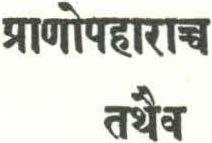

te.siirh satata-yuktiiniirh bhajatiirhprtti-pilrvakam dadiimibuddhi-yogarh tam yena miim upayiintite
"To those who are constantly devoted and worship Me with love, I give the understanding by which they can come to Me." (Bg. 10.10) The conclusion is that one must come to the platform of bhakti-yoga, even though one may begin with karma-yoga, j;iiina-yoga or afi!iinga-yoga. Unless one comes to the platform of bhakti-yoga, self-realization or realization of the Absolute Truth cannot he achieved.
TEXT 14

yathii taror milla-ni§ecanena
t,rpyanti tat-skandha-bhujopa§iikhii� prii[lopahiiriiccayathendriyiir-iim tathaiva sarviirhar-am acyutejyii
yathii-as; taro�-of a tree; mula-the root; nifiecanena-by watering; trpyanti-are satisfied; tat-its; skandha-trunk; bhuja-branches; upasiikhiil}.-and twigs; prii[la-the life air; upahiiriit-by feeding; caand ; yathii-as; indriyii[liim-of the senses; tathii eva- similarly; sarva-of all
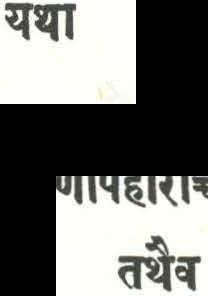
Text 14] Narada Instructs the Pracetas 1573
�
��t:
�� q��qiUif (t!!tttor'MO�Iiql
q:;q(;ij
I
II��JII
demigods; arharam- worship; acyuta-of the Supreme Personality of Godhead; ijya-worship .
TRANSLATION
As pouring water on the root of a tree energizes the trunk, branches, twigs and everything else, and as supplying food to the stomach enlivens the senses and limbs of the body, so simply worshiping the Supreme Personality of Godhead through devotional service automatically satisfies the demigods, who are parts of that Supreme Personality.
PURPORT

Sometimes people ask why this K.r.sfla consciousness movement simply advocates worship of Krl?J).a to the exclusion of the demigods. The answer is given in this verse. The example of pouring water on the root of a tree is very appropriate. In Bhagavad-gitii it is said:
sri bhagaviin uviica
iirdhva-miilam adha�-siikham
asvattharh priihur avyayam
chandiirhsi yasya par[Liini
yas tarh veda sa veda-vit
"The blessed Lord said: There is a banyan tree that has its roots upward and its branches down and whose leaves are the Vedic hymns. One who knows this tree is the knower of the Vedas." (Bg. 15.1)
This cosmic manifestation has expanded downward and the root is the Supreme Personality of Godhead. As the Lord confirms in Bhagavad-gitii:
aharh sarvasya prabhavo
matta[l, sarvarh pravartate iti matva bhajante miirh
budhii bhiiva-samanvita�
"I am the source of all spiritual and material worlds. Everything emanates from Me. The wise who perfectly know this engage in My devotional service and worship Me with all their hearts." (Bg. 10.8)
Krf?J).a is the root of everything; therefore rendering service to the Supreme Personality of Godhead, Krf?l).a (k[§[La-sevii), means automatically serving all the demigods. Sometimes it is argued that karma and jiiiina require a mixture of bhakti in order to be successfully executed, and sometimes it is argued that bhakti also requires karma and jiiiina for its
1574 Srimad-Bhagavatam [Canto 4, Ch. 31
successful termination. The fact is, however, that although karma and jiiana cannot be successful without bhakti, bhakti does not require the help of karma and jiiana. Actually, as described by Srila Riipa Gosvam1, anyabhila§ita-sunyarh jiiana-karmady-anavrtam: pure devotional service should not be contaminated by the touch of karma and jiiana. Modern society is involved in various types of philanthropic works, humanitarian works, and so on, but people do not know that these activities will never be successful unless Kr�l).a,theSupremePersonality ofGodhead, is brought into the center. One may ask what harm there is in worshiping Kr�l).a and the different parts of His body, the demigods, and the answer is also given in this verse. The point is that by supplying food to the stomach, the indriyas, the senses, are automatically satisfied. If one tries to feed his eyes or ears independently, the result is only havoc. Simply by supplying food to the stomach, we satisfy all of the senses. It is neither necessary nor feasible to render separate service to the individual senses. The con· elusion is that by serving Kr�l).a (k!§!La-seva), everything is complete. As confirmed in Caitanya-caritamrta: k[§!Le bhakti kaile sarva-karma krta haya (Cc. Madhya 22.62). If one is engaged in the devotional service of the Lord, the Supreme Personality of Godhead, everything is automatically accomplished.
TEXT 15

yathaiva suryiit prabhavanti varafl. punas ca tasmin praviSanti kiile bhUtiini bhumau sthira-jatigamani tathii hariiv eva gul}a-praviihafl.
yatha-as;eva-certainly;suryat-fromthe sun ;prabhavanti- is generated; viiraf!.-water; puna[l-again ; ca-and; tasmin-unto it; pravisanti-enters; kiile-in due course of time; bhutani-all living entities; bhumau-to the earth;sthira-notmoving ; jatigamani- and moving;tathii-similarly; harauunto the Supreme Personality of Godhead; eva-certainly ; gu[la-pravahafl.emanation of material nature.
Text 15] Narada Instructs the Pracetas 1575
• «.�dl+t€4Mt em: �� �� stN�MI m , ���� � �� gtJISICfht: ������
TRANSLATION
During the rainy season, water is generated from the sun, and in due course of time, during the summer season, the very same water is again absorbed by the sun. Similarly, all living entities, moving and inert, are generated from the earth, and again, after some time, they all return to the earth as dust. Similarly, everything emanates from the Supreme Personality of Godhead, and in due course of time everything enters into Him again.
PURPORT
Because of their poor fund of knowledge, impersonalist philosophers cannot understand how everything comes out from the Supreme Person and then merges into Him again. As Brahma-sarhhitii confirms:
yasya prabhii prabhavato jagad-ar-fla-ko,tiko.ti�v asefia-vasudhiidi-vibhuti-bhinnam tad brahma ni�kalam anantam ase.sa-bhutarh govindam iidi-purufiarh tam aharh bhajiimi (Bs. 5.40)
Transcendental rays emanate from the body of Kr�!J.a, and within those rays, which are the Brahman effulgence, everything is existing. This is confirmed in Bhagavad-gitii. Mat-sthiini sarva-bhiitiini (Bg. 9.4).
Although Kr�l).a is not personally present everywhere, His energy is nonetheless the cause of all creation. The entire cosmic manifestation is nothing but a display of Kr�l).a's energy. The two examples given in this verse are very vivid. During the rainy season, the rain, by rejuvenating the production of vegetables on earth, enables man and animals to obtain living energy. When there is no rain, food is scarce, and man and animal simply die. All vegetables, as well as moving living entities, are originally products of the earth. They come from the earth, and again they merge into the earth. Similarly, the total material energy is generated from the body of Kr�l).a, and at such a time the entire cosmic manifestation is visible. When Kr�l).a winds up His energy, everything vanishes. This is explained in a different way in Brahma-samhita:
yasyaika-nisvasita-kiilam athiivalambya jivanti loma-vilajii jagad-arfla-niithii�
vifittur mahiin sa iha yasya kalii-visefiO
govindam iidi-purufiarh tam aharh bhajiimi (Bs. 5.48)

1576 Srimad-Bhagavatam [Canto 4, Ch. 31
This entire material creation comes from the body of the Supreme Personality of Godhead and at the time of annihilation again enters into Him. This process of creation and dissolution is made possible by the breathing of the Maha-Vi�l}U, who is only a plenary portion of Kr�J).a.
TEXT 16

('(%5\tlG\I€41;c: tR
etat padam taj jagad-titmana� param sakrd vibhiitarh savitur yathii prabhii yathiisavo jiigrati supta-saktayo dravya-kriya-jnana-bhida-bhramiityaya�
etat-this cosmic manifestation; padam-place of habitation; tat- that; jagat-atmana�-of the Supreme Personality of Godhead;param-transcendental;sakrt-sometimes; vibhatam-manifested ; savitu�-of the sun;yathti -as; prabha- sunshine ;yathii-as;asava�-the senses ;jagrati-become manifest; supta- inactive; saktaya�-energies; dravya-physicalelements; kriyiiactivities; jniina-knowledge; bhidii-bhrama-differences from misunderstanding; atyaya�-passing away.
TRANSLATION
Just as the sunshine is nondifferent from the sun, the cosmic manifestation is also nondifferent from the Supreme Personality of Godhead. The Supreme Personality is therefore all-pervasive within this material creation. When the senses are active, they appear to be part and parcel of the body, but when the body is asleep, their activities are unmanifest. Similarly, the whole cosmic creation appears different and yet nondifferent from the Supreme Person.
PURPORT
This confirms the philosophy of acintya-bhediibheda-tattva (simultaneously one and different) propounded by Lord Sri Caitanya Mahaprabhu. The Supreme Personality of Godhead is simultaneously different and non-

Text 16] Narada Instructs the Pracetiis 1577
�
m� �� 31¥nl ��
different from this cosmic manifestation. 1n the previous verse it has been explained that the Supreme Personality of Godhead, as the root of a tree, is the original cause of everything. It was also explained how the Supreme Personality of Godhead is all-pervasive. He is present within everything in this material manifestation. Since the energy of the Supreme Lord is nondifferent from Him, this material cosmicmanifestation is also nondifferent from Him, although it appears different. The sunshine is not different from the sun itself, but it is simultaneously also different. One may be in the sunshine, but he is not on the sun itself. Those who live in this material world are living on the bodilyrays of theSupreme Personality of Godhead, but they cannot see Him personally in the material condition.
In this verse the word padam indicates the place where the Supreme Personality of Godhead resides. As confirmed in lsopani�ad, tsiiviisyam idarh sarvam. The proprietor of a house maylive in one room of the house. but the entire house belongs to him. A king may live in one room in Buckingham Palace, but the entire palace is considered his property. It is not necessary for the king to live in every room of that palace for it to be his. He may be physically absent from the rooms, but still the entire palace is understood to be his royal domicile.

The sunshine is light, the sun globe itself is light, and the sun-god is also light. However, the sunshine is not identical with the sun-god, Vivasviin. This is the meaning of simultaneously one and different (acintyabhedabheda-tattva). All the planets rest on the sunshine, and because of the heat of the sun, they all revolve in their orbits. On each and every planet, the trees and plants grow and change colors due to the sunshine. Being the rays of the sun, the sunshine is nondifferent from the sun. Similarly, all the planets, resting on the sunshine, are nondifferent from the sun. The entire material world is completely dependent on the sun, being produced by the sun, and the cause, the sun, is inherent in the effects. Similarly, Kn;l).a is the cause of all causes, and the effects are permeated by the original cause. The entire cosmic manifestation should be understood as the expanded energy of the Supreme Lord.
When one sleeps, the senses are inactive, but this does not mean that the senses are absent. When one is awakened, the senses become active again. Similarly, this cosmic creation is sometimes manifest and sometimes unmanifest. As stated in Bhagavad-gita:
bhiita-grama� sa evayarh
bhiitva bhutvii praliyate
ratry-agame 'vasa� partha
prabhavaty ahar-agame
1578 Srimad-Bhagavatam [Canto 4, Ch. 31
"Again and again the day comes, and this host of beings is active, and again the night falls, 0 Partha, and they are helplessly dissolved" (Bg. 8.19) When the cosmic manifestation is dissolved, it is in a kind of sleeping condition, an inactive state. Whether the cosmic manifestation is active or inactive, the energy of the Supreme Lord is always existing. Thus the words "appearance" and "disappearance" apply only to the cosmic manifestation.
TEXT 17

yathii nabhasy abhra-tamaft-prakiisii bhavanti bhupii na bhavanty anukramtit evarh pare brahmar,ti saktayas tv amu rajas tamaft sattvam iti praviihaft
yathii-as; nabhasi-in the sky; abhra-clouds; tamaft-darkness;prakiistift -and illumination; bhavanti-exist; bhu-ptift-0 Kings; na bhavanti-do not appear; anukramtit-consecutively; evam-thus; pare-supreme; brahma[tiin the Absolute; saktaya[t- energies; tu-then; amuft- those; raja[!-passion; tamaft-darkness ; sattvam-goodness; iti- thus; praviihaft-emanation.
TRANSLATION
My dear Kings, sometimes in the sky there are clouds, sometimes there is darkness, and sometimes there is illumination. The appearance of all these take place consecutively. Similarly, in the Supreme Absolute, the modes of passion, darkness and goodness appear as consecutive energies. Sometimes they appear, and sometimes they disappear.
PURPORT
Darkness, illumination and clouds sometimes appear and sometimes disappear, but even when they have disappeared, the potency is still there, always existing. In the sky sometimes we see clouds, sometimes rainfall and sometimes snow. Sometimes we see night, sometimes day, sometimes illumination and sometimes darkness. All these exist due to the sun, but
Text 17] Narada Instructsthe Pracetas 1579
��WI�'4Rtt�sti+tl(lI � � illtfUI �l'ffi�'*iil{ ���:���RI sm{:II��II
v:p.[1 �:�
the sun is unaffected by all these changes. Similarly, although the Supreme Personality of Godhead is the original cause of the total cosmic manifestation, He is unaffected by the material existence. This is confirmed in Bhagavad-gitii:
bhumir iipo 'nalo viiyu�
kharh mano buddhir eva ca ahankiira ittyarh me
bhinnii prakrtir a�.tadhii
"Earth, water, fire, air, ether, mind, intelligence and false ego-all together these eight comprise My separated material energies." (Bg. 7.4)
Although the material or physical elements are the energy of the Supreme Personality of Godhead, they are separate. The Supreme Personality of Godhead is therefore not affected by material conditions. The Vediinta-siltra confirms (janmiidy asya yata�) that the creation, maintenance and dissolution of this cosmic manifestation are due to the existence of the Supreme Lord. Nonetheless the Lord is unaffected by all these changes in the material elements. This is indicated by the word praviiha (emanation). The sun always shines brilliantly and is not affected by clouds or darkness. Similarly, the Supreme Personality of Godhead is always present in His spiritual energy and is not affected by the material emanations. Brahma-sarhhitii confirms:

tsvara� parama� k[�[W� sac-cid-iinanda-vigraha� aniidir iidir govinda� sarva-karara-kararam
"Kr�tla, who is known as Govinda, is the Supreme Godhead. He has an eternal, blissful, spiritual body. He is the origin of all. He has no other origin, and He is the prime cause of all causes." (Bs. 5.1)
Although He is the supreme cause, the cause of all causes, He is still parama, transcendental, and His form is sac-cid-iinanda, eternal, spiritual bliss. �!?l).a is the shelter of everything, and this is the verdict of all scripture. �!?l).a is the remote cause, and material nature is the immediate cause of the cosmic manifestation.In the Caitanya-caritiimrta it is said that understanding prakrti, or nature, to be the cause of everything is like understanding the nipples on the neck of a goat to be the cause of milk. Material nature is the immediate cause of the cosmic manifestation, but the original cause is Narayal).a, �!?l).a. Sometimes people think that the
1580 Srimad-Bhagavatam [Canto 4, Ch. 31
cause of an earthen pot is the earth. We see on a potter's wheel a sufficient amount of earth to produce many pots, and although unintelligent men will say that the earth on the wheel is the cause of the pot, those who are actually advanced will find that the original cause is the potter, who supplies the earth and moves the wheel. Material nature may be a helping factor in the creation of this cosmic manifestation, but it is not the ultimate cause. In Bhagavad-gttii the Lord therefore says:
mayiidhyak§erw prakrt* siiyate sa-cariicaram
"This material nature is working under My direction, 0 son of Kunti, and producing all moving and unmoving beings." (Bg. 9.10)
The Supreme Lord casts His glance over material energy, and His glance agitates the three modes of nature. Creation then takes place. The conclusion is that nature is not the cause of the material manifestation. The Supreme Lord is the cause of all causes.
TEXT 18 �I
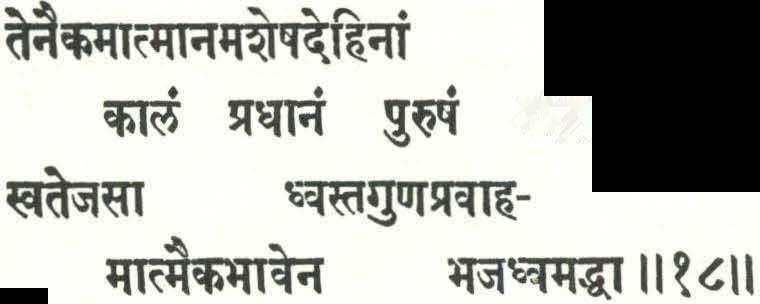

tenaikam iitmiinam ase,sa-dehiniim kiilam pradhanam puru.sam paresam
sva-tejasii dhvasta-gupa-praviiham iitmaika-bhiivena bhajadhvam addhii
tena-therefore; ekam-one; iitmiinam-unto the Supreme Soul; ase.saunlimited; dehiniim-of the individual souls; kiilam-time; pradhiinam-the material cause; puru§atn-the SupremePerson; paresam-thetranscendental controller; sva-tejasii-by His spiritual energy; dhvasta- aloof; gupapraviiham-from material emanations; iitma-self; eka-bhiivena-accepting as qualitatively one; bhajadhvam-engage in devotional service; addhiidirectly.
Text 18] Niirada Instructs the Pracetiis 1581
TRANSLATION
Because the Supreme Lord is the cause of all causes, He is the Supersoul of all individual living entities, and He exists as both the remote and immediate cause. Since He is aloof from the material emanations, He is free from their interactions and is Lord of material nature. You should therefore engage in His devotional service, thinking yourself qualitatively one with Him.
PURPORT
According to Vedic calculations, there are three causes of creationtime, the ingredient and the creator. Combined, these are called tritaytitmaka, the three causes. Everything in this material world is created by these three causes. All of these causes are found in the Personality of Godhead. As confirmed in Brahma-samhitti: sarva-ktira[La-ktirarwm. Narada Muni therefore advises the Pracetas to worship the direct cause, the Supreme Personality of Godhead. As stated before, when the root of a tree is watered, all the parts are energized. According to the advice of Narada Muni, one should directly engage in devotional service. This will include all pious activity. Caitanya-carittimrta states: k[�[!e bhakti kaile sarva-karma krta haya. When one worships the Supreme Lord Kmu in devotional service, he automatically performs all other pious activity. In this verse the words sva-tejasa dhvasta-gu[!a-praviiham are very significant. The Supreme Personality of Godhead is never affected by the material qualities, although they all emanate from His spiritual energy. Those who are really conversant with this knowledge can utilize everything for the service of the Lord because nothing in this material world is unconnected to the Supreme Personality of Godhead.
TEXT 19

�4:41
dayayii sarva-bhilte�u
santu�.tyti yena kena vii sarvendriyopastintyii ca tu�yaty iisu janiirdanafl-
dayayii- by showingmercy; sarva-bhute�u- toall livingentities;santu�.tyii -by being satisfied; yena kena vii-somehow or other; sarva-indriya-all


1582 Srimad-Bhagavatam [Canto 4, Ch. 31
�� � ��'?U �� �� ({1 I
:q�tJl� ����: II� �II
the senses; upasiintyii-by controlling; ca-also; tu�yati-becomes satisfied; asu-very soon;janiirdana�-the Lord of all living entities.
TRANSLATION
By showing mercy to all living entities, being satisfied somehow or other, and controlling the senses from sense enjoyment, one can very quickly satisfy the Supreme Personality of Godhead, Janiirdana.
PURPORT
These are some of the ways in which the Supreme Personality of Godhead can be satisfied by the devotee. The first item mentioned is dayay'ii sarva-bhilte�u, showing mercy to all conditioned souls. The best way to show mercy is to spread K{�I).a consciousness. The entire world is sufferingforwant of this knowledge. People should knowthat theSupreme Personality of Godhead is the original cause of everything. Knowing this, everyone should directly engage in His devotional service. Those who are actually learned, advanced in spiritual understanding, should preach Kr�I).a consciousness all over the world so that people may take to it and make their lives successful.

The word sarva-bhute§u is
significant because it applies not only to human beings but to all the living entities appearing in the 8,400,000 species of life. The devotee can do good not only to humanity but to all living entities as well. Everyone can benefit spiritually by the chanting of the Hare Kr�!la mahii-mantra. When the transcendental vibration of Hare Kr�!la is sounded, even the trees, animals and insects benefit. Thus when one chants the Hare Kr�!la mahii-mantra loudly, he actually shows mercy to all living entities.To spread the Kr�!la consciousness movement through· out the world, the devotees should be satisfied in all conditions.
nariiya[ta-parti[l sarve na kutascana bibhyati
svargiipavarga-narake§v api tulyartha-darsina� (Bhiig. 6.17.28)
It does not matter to the pure devotee if he has to go to hell to preach. The Supreme Lord lives in the heart of a hog, although the Lord is in Vaiku!J.tha. Even while preaching in hell, a pure devotee remains a pure devotee by his constant association with the Supreme Personality of God·
Text 19] Narada Instructs the Pracetas 1583
head. To attain this state, one has to control his senses. The senses are automatically controlled when one's mind is engaged in the service of the Lord.
TEXT 20


apahata-sakalai§a[uimalatmany aviratam edhita-bhiivanopahuta[l nija-jana-vasa-gatvam iitmano 'yan na sarati chidravad ak§ara[l satiim hi
apahata- vanquished; sakala- all; e§arw-desires; amala-spotless; iitmanito the mind; aviratam-constantly; edhita- increasing; bhiivanii-with feeling; upahUta[l-being called; nija-jana-of His devotees; vasa-under the control; gatvam-going; iitmana[l-His; ayan-knowing; na-never; saratigoes away; chidra-vat-like the sky; ak§araf1-the Supreme Personality of Godhead; satiim-of the devotees; hi-certainly.
TRANSLATION
Being completely cleansed of all material desires, the devotees are freed from all mental contamination. Thus they can always think of the Lord constantly and address Him very feelingly. The Supreme Personality of Godhead, knowing Himself to be controlled by His devotees, does not leave them for a second, just as the sky overhead never becomes invisible.
PURPORT
It is clear from the previous verse that the Supreme Personality of Godhead, Janiirdana, is very quickly satisfied by the activities of His devotees. The pure devotee is always absorbed in the thought of the Supreme Personality of Godhead. As stated, snwatiim sva-kathiifl kr.sr-aft. By always thinking of Kr�I].a, the pure devotee's heart is freed from all kinds of desires. In the material world, the heart of the living entity is filled with material desires. When the living entity is cleansed, he does not think of anything material. As the mind is completely cleansed, one attains the
1584 Srimad-Bhagavatam [Canto 4, Ch. 31
3fq((jijifK�i1UII���feR�itf�-Tijl{lq�: I f'il!iil!iiwt�������+{k+t.USlf��fu����:�(If�
ll�oU
perfectional stage of mystic yoga, for then the yogi always sees the Supreme Personality of Godhead within his heart. As soon as the Lord is seated within theheart of the devotee, the devotee cannot be contaminated bythe material modes of nature. As long as one is under the control of the material modes, he desires so many things and makes so many plans for material sense enjoyment. As soon as the Lord is perceived in the heart, all material desires vanish. When the mind is completely free from material desire, the devotee can think of the Lord constantly. In this way he becomes completely dependent upon the lotus feet of the Lord. Caitanya Mahaprabhu prays: ayi nanda-tanuja kilikararh patitarh miirh viflame bhaviimbudhau krpayii tava piida-pankajasthita-dhiili-sadrsarh vicintaya
"My dear Lord, I am Your eternal servant, but somehow or other I have fallen into the ocean of this material world. Kindly pick me up and fix me as a speck of dust at Your lotus feet." Similarly, Srila Narottama dasa Thakura prays: hii hii prabhu nanda-suta, V[§abhiinu-suta-yuta, karurtti kara ha ei-bara narottama-dasa kaya, na theliha ratigii-pliya, tomii vine ke ache amara

"My dear Lord, You are now present with the daughter of King Vr�abhanu, Srimati Radhara�i. Now both of You please be merciful upon me. Don't kick me away, because I have no shelter other than You."
In this way the Supreme Personality of Godhead becomes dependent on His devotee. The Lord is invincible, yet He is conquered by His pure devotee. He enjoys being dependent on His devotee, just as Kr��a enjoyed being dependent on the mercy of mother Yasoda. Thinking Himself dependent on the.devotee gives the Supreme Lord great enjoyment. Sometimes a king may engage a joker, and in the process of joking, the king is sometimes insulted. The king, however, enjoys these activities. Everyone worships the Supreme Lord with great reverence; therefore the Lord sometimes wants to enjoy the chastisement of His devotees. In this way the relationship eternally existing between the Lord and His devotees is fixed, just like the sky overhead.
Text 21) Narada Instructs the Pracetas 1585
21 ;r � �+t4lfttart � � ��'lfw:il �:
TEXT
A-� 'm'lfiti� � 11��11

na bhajati kumani§iruirh sa ijyiirh harir adhaniitma-dhana-priyo rasa-jna[l sruta-dhana-kula-karma[liirh madair ye vidadhati piipam akincane§U satsu
na-never; bhajati-accepts; ku-man(sir_ufm-of persons with a dirty heart; sa[l-He; ijyiim-offering; hari[l-theSupreme Lord; adhana-tothose who have no material possessions; iitma- dhana-simply dependent on the Lord; priyal]_-whoisdear; rasa-jna[t-whoacceptstheessenceoflife; srutaeducation; dhana-wealth; kula-aristocracy; karma[liim-and of fruitive activities; madai[t-bypride; ye- all thosewho; vidadhati-perform; piipam -disgrace; akincane . su-without material possessions; satsu-unto the devotees.
TRANSLATION
The Supreme Personality of Godhead becomes very dear to those devotees who have no material possessions but are fully happy in possessing the devotional service of the Lord. Indeed, the Lord relishesthedevotional activities of such devotees. Those who are puffed up with material education, wealth, aristocracy and fruitive activity are very proud of possessing material things, and they often deride the devotees. Even if such people offer the Lord worship, the Lord never accepts them.
PURPORT
TheSupremePersonalityofGodheadisdependentonHispuredevotees. He does not even accept the offerings of those who are not devotees. A pure devotee is one who feels He does not possess anything material. A devotee is always happy in possessing the devotional service of theLord. Devotees may sometimes appear materially poor, but because they are spiritually advanced and enriched, they are most dear to the Supreme PersonalityofGodhead.Suchdevoteesarefreefromattachmenttofamily, society, friendship, children and so on. They abandon affection for all these material possessions and are always happy in possessing the shelter of the lotusfeetoftheLord. TheSupremePersonalityofGodheadunderstands the position of His devotee. If a person derides apuredevotee, he is never recognized by the Supreme Personality of Godhead. In other words, the Supreme Lordnever excuses one who offendsapuredevotee.
1586 Srimad-Bhagavatam
[Canto 4, Ch. 31
��� �if
There are many examples of this in history. A great mystic yog� Durvasa Muni, offended the great devotee Ambari�a Maharaja. The great sage Durvasa was to be chastised by the Sudarsana cakra of the Lord. Even though the great mystic directly approached the Supreme Personality of Godhead, he was never excused. Those on the path of liberation should be very careful not to offend a pure devotee.
TEXT 22


sriyam anucaratirh tad-arthinas ca dvipada-pattn vibudhiirhs ca yat sva-pilr[La[l na bhajati nija-bhrtya-varga-tantra[l katham amum udvisrjet pumiin krta-jna[l

sriyam-the goddess of fortune; anucaratrm-who follows Him; tat-of her; arthina[l.-those who aspire to get the favor; ca-and; dvi-pada-pattnrulers of the human beings; vibudhiin-demigods; ca-also; yat-because; sva-pilrf.la[l-self-sufficient; na-never; bhajati-cares for; nija-own; bhrtyavarga-on His devotees; tantra[t-dependent; katham-how; amum-Him; udvis_rjet-can give up; pumiin-a person; k_rta-jna[l-grateful.
TRANSLATION
Although the Supreme Personality of Godhead is self-sufficient, He hecomes dependent on His devotees. He does not care for the goddess of fortune, nor for the kings and demigods who are after the favors of the goddess of fortune. Where is that person who is actually grateful and will not worship the Personality of Godhead?
PURPORT
Lak�mi, the goddess of fortune, is worshiped by all materialistic men, including big kings and demigods in heaven. Lak�mi, however, is always after the Supreme Personality of Godhead, even though He does not require her service. Brahma-sarhhitii says that the Lord is worshiped by
Text 22) Narada Instructs the Pracetas 1587
�� �� fg:q�qffi{f���\CI'{'Ji:I " «:' ;r Ft�4!�:4'4•1��: cti70C�UUfl���!!llf.l �: ����II
hundreds and thousands of goddesses of fortune, but the Supreme Lord does not require service from any of them because if He so desires He can produce millions of goddesses of fortune through His spiritual energy, the pleasure potency. This very Personality of Godhead, out of His causeless mercy,becomesdependentonthedevotees. How fortunate, then, is a devotee who is thus favored by the Personality of Godhead. What ungrateful devotee will not worship the Lord and enter into His devotional service? Actuallya devotee cannot forget his obligation to the Supreme Personality of Godhead even for a single moment. Srila Vi8vaniithaCakravarti Thakura says that both the Supreme Lord and His devotee are rasa-jfia, full of transcendental humor. The mutual attachment between the Supreme Lord and His devotee is never to be considered material. It always exists as a transcendental fact. There are eight types of transcendental ecstasy (known as bhiiva, anubhiiva, sthaytbhiiva and so on), and these are discussed in The Nectar of Devotion. Those who are unaware of the position of the living entity and the Supreme Person, Kr�I)a, think that the mutual attachment between the Lord and His devotees is a creation of the material energy. Factually such attachment is natural both for the Supreme Lord and for the devotee, and it cannot be accepted as material.
TEXT 23

maitreya uvaca
iti pracetaso rajann anyas ca bhagavat-kathii�
sravayitva brahma-lokarh
yayau svayambhuvo mun*
maitreyaZ, uviica-Maitreya said; iti-thus; pracetasaZ,-the Pracetas; riijan-0 King; anyiift-others; ca-also; bhagavat-kathaZ,-topics about the relationship with the Supreme Personality of Godhead; sriivayitvii-after instructing; brahma-lokam-to Brahmaloka; yayau-went back; sviiyambhuvaft-the son of Lord Brahmii; munift-the great sage.

1588 Srimad-Bhagavatam [Canto4, Ch. 31
� mit ��� �rr�iti�: I �tih�Jlq\���IR:II��II
TRANSLATION
The great sage Maitreya continued: My dear King Vidura, Sri Narada Muni, the son of Lord Brahma, thus described all these relationships with the Supreme Personality of Godhead to the Pracetas. Afterwards, he returned to Brahmaloka.
PURPORT
One has to hear about the Supreme Personality ofGodheadfrom a pure devotee. The Pracetas got this opportunity from the great sage Narada, who told them of the activities of the Supreme Personality of Godhead and His devotees.
TEXT 24

te 'pi tan-mukha-niryiitarh yaso loka-maliipaham harer niSamya tat-piidarh dhyiiyantas tad-gatirh yayu{t
te-the Pracetiis; api-also; tat-of Narada; mukha-from the mouth; niryiitam- gone forth; ya5aft- glorification; loka-of the world;mala-sins; apaham-destroying; hare{t- of Lord Hari; niSamya- having heard; tat-of the Lord; piidam-feet; dhyiiyantaft- meditating upon; tat-gatim- unto His abode; yayuft- went.
TRANSLATION
Hearing from Narada's mouth the glories of the Lord, which vanquish all the ill fortune of the world, they also became attached to the Supreme Personality of Godhead. Meditating on His lotus feet, they advanced to the ultimate destination.
PURPORT
Here it is seen that by hearing the glories of the Lord from a realized devotee the Pracetas easily attained strong attachment for the Supreme Personality ofGodhead. Then, meditating on the lotus feet of the Supreme Lord at the end of their lives, they advanced to the ultimate goal, Vi�l).Uloka. It is sure and certain that anyone who always hears the glories of the
Text 24] Niirada Instructs the Pracetas 1589
� w*l{ccf.t4l� �<!Sl4i+telqii� 1 ii{r.\�1+4�� \itll4�tijl'Jij�: ����II
Lord and thinks of His lotus feet will reach that supreme destination. As Kr��a says in Bhagavad-gita:
man-mana bhava mad-bhakto mad-yaji mam namas-kuru
mam evainasi satyam te pratijane priyo 'si me
"Always think of Me and become My devotee. Worship Me and offer your homage unto Me. Thus you will come to me without fail. I promise you this because you are My very dear friend." (Bg. 18.65)
TEXT 25

etat te 'bhihitam k§attar yan mam tvam parip[§.tavan pracetasam naradasya samvadam hari-kirtanam
etat-this; te-unto you; abhihitam-instructed; k.sattaf!-0 Vidura; yatwhatever; mam-unto me; tvam- you; paripr.s.tavan-inquired; pracetasam -of the Pracetas; naradasya-of Narada; samvadam-conversation; harikirtanam-describing the glories of the Lord.
TRA NSLATION
My dear Vidura, I have told you everything you wanted to know about the conversation between Narada and the Pracetas, the conversation describing the glories ofthe Lord. I have related this as far as possible.
PURPORT
$rimad-Bhiigavatam describes the glories of the Lord and His devotees. Because the whole subject matter is the glorification of the Lord, naturally the glorification of His devotees automatically follows.
1590 Srimad-Bhagavatam [Canto 4, Ch. 31
��
� �� (i(�d�'(������
��4ati � qMAAI'll �
sri sukaft uvaca-Sri Sukadeva Gosvami; said; yafl-which; e.safl-this dynasty; uttanapadafl-of King Uttiinapada; manavasya-the son of Svayambhuva Manu; anuvar[titafl-described following the footprints of previous iiciiryas; vamsafl-dynasty; priya-vratasya-of King Priyavrata; api-also; nibodha-try io understand; nrpa-sattama-0 best of kings.
TRANSLATION
Sukadeva Gosvami continued: 0 best of kings [King Pari�it], I have nowfinished telling about the descendantsofthe first son of Svayambhuva Manu, Uttanapada. I shall now try to relate the activities of the descendants of Priyavrata, the second son of Svayambhuva Manu. Please hear them attentively.
PURPORT
Dhruva Maharaja was the son of King Uttiinapada, and as far as the descendants of Dhruva Maharaja or King Uttanapada are concerned, their activities are described up to the point of the Pracetas. Now Sri Sukadeva Gosvami desires to describe the descendants of Maharaja Priyavrata, the second son of Svayambhuva Manu. TEXT

27] Narada
26 �<ti i3<IR � � '3�1i:rtq(\ fll:rt!:t�t�fURI: I ei�: tw.r� f� i't«*lflll��ll srisuka uvaca ya e§a uttanapado manavasyanuvar[tita{t vamsa{t priya-vratasyapi nibodha nrpa-sattama 1591
Text
Instructs the Pracetas TEXT
27 ;.it ;m��� $1�it'( I �� A��tt� �q�ll�\911 yo naradad atma-vidyiim adhigamya punar mahtm
bhuktva vibhajya putrebhya
aigvaram samagat padam
yaft-one who; niiradiit-from the great sage Narada; iitma-vidyiim;piritual knowledge; adhigamya-after learning; punaft-again; mahimthe earth; bhuktvii-aftec enjoying; vibhajya-after dividing; putrebhyaflunto his sons; aiSvaram-transcendental; samagiit-achieved; padamposition.
TRANSLATION
Although Maharaja Priyavrata received instructions from the great sage Narada, he still engaged in ruling the earth. After fully enjoying material possessions, he divided his property amongst his sons. He then attained a position by which he could return home, back to Godhead.
TEXT 28

imam tu kaufiiiravi[wpavarritiim k§attii nisamyiijita-viida-sat-kathiim pravrddha-bhiivo 'sru-kaliikulo muner dadhiira milrdhnii cararam hrdii hare�
imiim-all this; tu-then; kau.siiravipii- by Maitreya; upavarritiimdescribed; k.sattii- Vidura; niSamya-after hearing; ajita-viida-glorification of the Supreme Lord; sat-kathiim-transcendental message; pravrddhaenhanced; bhiivaft-ecstasies; a8ru-of tears; kalii-by particles; iikulaftoverwhelmed; muneft-of the great sage; dadhiira-captured; milrdhnii-by the head; c arapam- the lotus feet; hrdii-by the heart; hareft-of the Supreme Personality of Godhead.
TRANSLATION
My dear King, in this way, after hearing the transcendental messages of the Supreme Personality of Godhead and His devotees from the great sage Maitreya, Vidura was overwhelmed with ecstasy. With tears in his eyes,
1592 Srimad-Bhagavatam
[Canto 4, Ch. 31
� {I �1·ud�uitqqfimri � MijRfl�<tf!41iW�I'( I �s�� u���� � � �: ����II
he immediately fell down at the lotus feet of his guru, his spiritual master. He then fixed the Supreme Personality of Godhead within the core of his heart.
PURPORT
This is a sign of associating with great devotees. A devotee takes instructions from a liberated soul and is thus overwhelmed by ecstasy from transcendental pleasure. As stated by Prahlada Maharaja:
nai�arh matis tavad urukramahghrirh sprsaty anarthapagamo yad-artha� mahtyasiirh piida-rajo 'bhi�ekarh n�kincaniiniirh na vrr-tta yiivat (Bhiig. 7.5.32)

One cannot become a perfect devotee of the Lord without having touched the lotus feet of a great devotee. One who has nothing to do with this material world is called ni§kincana. The process of self-realization and the path home, back to Godhead, means surrendering to the bona fide spiritual master and taking the dust of his lotus feet on one's head. Thus one advances on the path of transcendental realization. Vidura had this relationship with Maitreya, and he attained the results.
TEXT 29 m{�
vidura uviica so 'yam adya mahii-yogin bhavatii karu[tiitmanii darsitas tamasa� piiro yatriikincanago har*
viduraf! uviica- Vidura said; sa[!- that; ayam- this; adya- today; mahiiyogin-0 great mystic; bhavatii-by you; karu[ta-iitmanii-most merciful; darsitaf!-1 have been shown; tamasa�-of the darkness; piiraf!-the other side; yatra- where; akiiicana-ga[l-approachable by the materially free; hari�- the Supreme Personality of Godhead.
Text 29] Narada Instructs the Pracetas 1593
I
ms� 'i(l�fll'l � �011.;:¥41111
��(1�'t«: qffi �� m: ������
TRANSLATION
Sri Vidura said: 0 great mystic, 0 greatest of all devotees, by your causeless mercy I have been shown the path of liberation from this world of darkness. By following this path, a person liberated from the material world can return home, back to Godhead.
PURPORT
This material world is called tama�, dark, and the spiritual world is called light. The Vedas enjoin that everyone should try to get out ofthe darkness and go to the kingdom of light. Information of that kingdom of light can be attained through the mercy of a self-realized soul. One also has to get rid of all material desires. As soon as one frees himself from material desires and associates with a liberated person, the path back home, back to Godhead, is clear.

TEXT
sri suka uvaca
ity anamya tam amantrya viduro gaja-sahvayam svaniim didrk§ul]. prayayau
jnatinam nirvrtasaya�
sri sukaft uvaca- Sri Sukadeva Gosvamisaid;iti-thus;anamya-offering obeisances; tam-unto Maitreya; amantrya-taking permission; viduraf!Vidura; gaja-siihvayam-the city of Hastinapura; sviiniim-own; didrk§U�desiring to see; prayayau-left that place; jnatinam-of his kinsmen; nirvrta-iisaya[!-freefrom material desires.
TRANSLATION
Sukadeva Gosvami continued: Vidura thus offered obeisances unto the great sage Maitreya, and, taking his permission, started for the city of Hastinapura to see his own kinsmen, although he had no material desires.
1594 Srimad-Bhiigavatam [Canto 4, Ch. 31
�� �l¥4� � �ftl@�l{ I � ft:{�!�t�f.fimFt: ll�oll
30 �Cfi \1Cifif
PURPORT
When a saintly person wants to see his kinsmen, he has no material desire to see them. He simply wants to give them some instructions so that they can benefit. Vidura belonged to the royal family of the Kauravas, and although he knew that all the family members were destroyed at the Battle of Kurulq;etra, he nonetheless wanted to see his elder brother, Dhrtarii�tra, to see if he could deliver him from the clutches of maya. When a great saintly person like Vidura sees his relatives, he desires only to deliver them from the clutches of miiyii. Vidura thus offered his respectful obeisances to his spiritual master and departed for the city of Hastiniipura, the kingdom of the Kauravas.
TEXT 31


etad ya� srrtuyad rajan rajiiarh hary-arpitatmanam ayur dhanarh yasa� svasti gatim aisvaryam apnuyat
etat-this; ya�-one who; snw yat-hears ; rajan-0 King Parilq;it; rajnam -of kings; hari-unto the Supreme Personality of Godhead; arpitaatmanam- who have given their life and soul; ayu�-duration of life; dhanam-wealth; yasaf!- reputation; svasti-good fortune; gatim-the ultimate goal of life; aiSvaryam-material opulence; apnuyat- achieves.

TRANSLATION
0 King, those who hear these topics about kings who are completely surrendered to the Supreme Personality of Godhead obtain without difficulty a long life, wealth, good reputation, good fortune and, ultimately,the opportunitytoreturnhome,backtoGodhead.
Thus end the Bhaktivedanta purports of the Fourth Canto, Thirty-first Chapter of the Srimad-Bhagavatam, entitled "Niirada Instructs the Pracetas."
Text 31] NaradaInstructsthe Pracetas 1595
• �:Jf!!'QI,_hl1. � I •�:g rrR�a������''
OFTHE FOURTHCANTO
END


 Plate 1
a e 1135
Plate 1
a e 1135







 Plate 5 Consulting a bona fide spiritual master is the same as consulting the Supreme Person ality of Godhead personally. (page 1430
Plate 5 Consulting a bona fide spiritual master is the same as consulting the Supreme Person ality of Godhead personally. (page 1430






















































































































































































































































































































































































































































































































































































































































































































































